Previous blog posts from Equitise
Latest blog posts
Historical Blogs
September 29th 2024

for-companies
Breaking Down the Benefits of Equity Crowdfunding
There are numerous benefits of Equity Crowdfunding that make it an incredibly exciting industry compared to traditional investment opportunities. Equity Crowdfunding is democratising investing, making the investment in startups and early-stage businesses accessible to all whilst simultaneously offering an alternative route to raise capital for businesses looking to scale and grow. We've broken down below some of the top benefits to Equity Crowdfunding for both investors and companies raising.
September 11th 2024

success-stories
Equitise IPO Breakdown and Performance
An analysis of our five most recent IPO performances.
September 10th 2024

for-companies
What is Equity Crowdfunding?
Equity Crowdfunding is the process whereby everyday investors can invest in early stage businesses in return for equity (shares) in that business. The UK pioneered Equity Crowdfunding through legislation introduced in 2011, New Zealand passed the legislation in 2014 and the US in 2016, but it took Australia until September 2017. The first platforms received their crowd-sourced funding license (CSF) from ASIC several months later, in January 2018, with Equitise being among the first. Previous to this change, only wholesale investors could invest in unlisted businesses. Now any Australian citizens over 18 years of age (retail investors) are eligible to invest in unlisted companies.
July 25th 2024

for-investors
Earning A Return With Equity Crowdfunding
How do I make money from a private company investment? Aside from the other benefits of investing in startups and early-stage businesses, we understand that visibility on how you make a return is still key. There is uncertainty when it comes to making money from any investment in a company but even more so with ones not yet listed on the stock exchange. This is because equity crowdfunding investments are relatively ‘illiquid’ (meaning you can't easily sell your shares) so a return can’t be made until what we call an ‘exit event’ occurs whereby you can sell your shares. However, high school economics teaches us that with greater risk, comes greater returns, generally. It’s the same principle here. Early-stage investing in startups is usually seen to be riskier than investing in more established businesses as there are a lot more unknowns however because you’re getting in on the ground floor, there has the potential to be higher returns.
July 18th 2024

trends-and-insights
An interview with Reebok's co-founder
Equitise Managing Director Jonny Wilkinson sits down with Reebok co-founder Joe Foster
July 4th 2024

success-stories
tbh Skincare proves fruitful for investors
Disrupting the adult acne industry
June 25th 2024

for-companies
The Capital Raising Process for Companies
The Capital Raising Process If you’ve just submitted your application to raise with Equitise, congratulations! That’s a great step in what could be a very rewarding and beneficial stage in growing your company. Here we’ll discuss the next steps in our process so you have a better idea of what to expect in the coming days.
May 21st 2024
.jpg?ixlib=gatsbyFP&auto=format%2Ccompress&fit=max)
success-stories
Fractel sprints to success maxing out their raise
Premium, performance running hats and apparel
April 9th 2024

success-stories
Nature's Help natural approach entices investors
Created For Women By Women
March 5th 2024

for-investors
Face your Fear of Investing: What to avoid and what to look out for when investing
There is something about the world of investments that makes it look untouchable and incredibly dangerous. It might be the emotional fear of failure or the very rational fear of losing money. But equally, investing holds a lot of potential and opportunity and is one of only a handful of things you can do to increase your income, something which is a key objective for many investors. The only real way to minimise the risk, and therefore the fear, is to thoroughly understand the cause and effect of the investing decisions we make. So whether you’re looking to make your first investment, or have already built up a portfolio, we’ve listed below our 7 top tips to help you face your fears, and start investing today!
February 16th 2024

success-stories
FTN Motion's capital raise drives in investors
The ultimate urban electric motorcycle
January 10th 2024

for-investors
Investing in an Equity Crowdfund with a Self Managed Super Fund (SMSF)
*Before investing please seek independent advice on whether it is permissible for your SMSF to invest in CSF (crowd-source funding) offers. If you wish to invest in a company on Equitise using your SMSF, you can do so easily as part of the investment process. Your documents will need to be verified by our team which may take a few days, however, you can still go on to finalise your investment while this is pending. After clicking ‘INVEST NOW’ on the offer of interest, you will follow the usual steps on how to invest until you have signed the terms of the offer. It is at this point you will get the option to invest with your SMSF by clicking the toggle next to ‘Invest as a Company, Trust or SMSF’ to the right as shown below.
December 20th 2023

success-stories
Vitable turns subscribers into shareholders
Making feeling good an everyday thing.
November 27th 2023
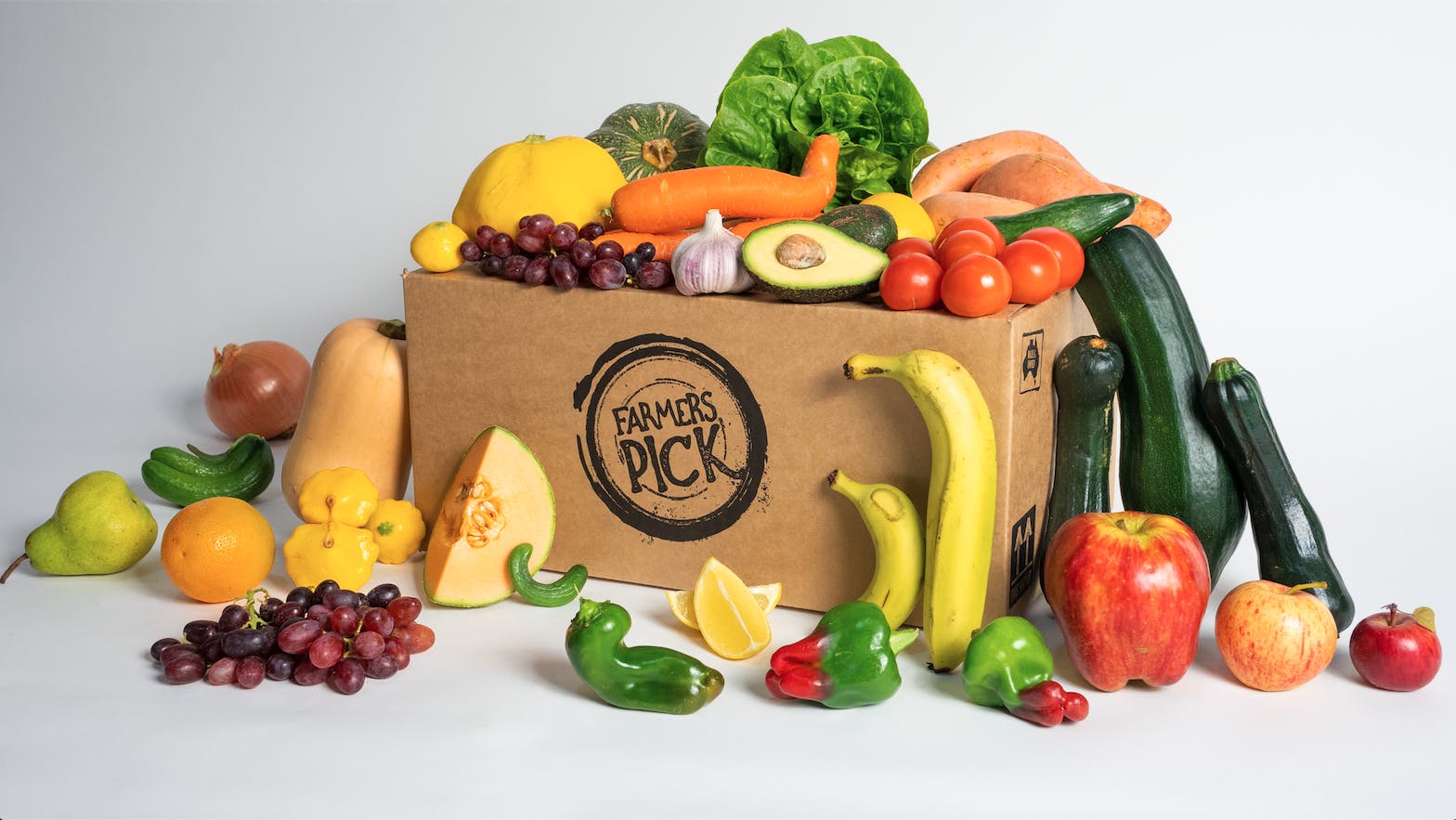
success-stories
Investors come together to help fight food waste
Farmers Pick offers a sustainable solution to unwanted produce.
November 8th 2023
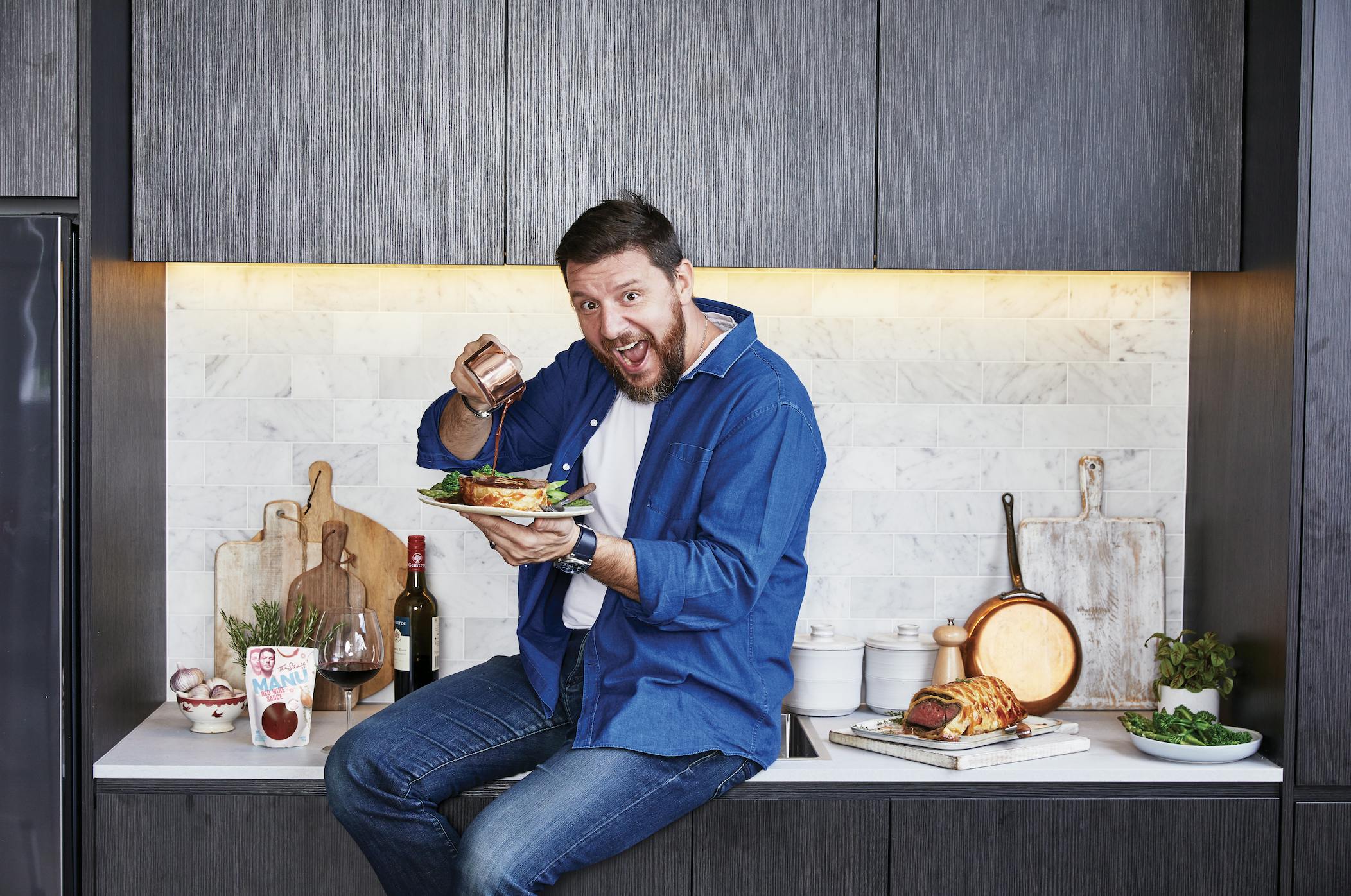
success-stories
By Manu serves up over $400k from its new shareholders
Founded by Chef, Manu Feildel, By Manu's offers fresh, preservative-free sauces.
September 1st 2023

for-investors
Who Can Invest
Equity Crowdfunding was created to make investing in private companies accessible for everyday people. While Equity Crowdfunding is a very inclusive investment method relatively speaking, there are still some restrictions about who can invest in different types of offers and how much each type of investor can commit.
August 22nd 2023

for-investors
How to Invest: Your Step-By-Step Guide
Investing in an innovative early-stage business on Equitise is super simple and only takes minutes.
June 27th 2023
.png?ixlib=gatsbyFP&auto=compress%2Cformat&fit=max)
for-companies
Mastering the Art of Seeking Investment from Close Networks for Your Equity Crowdfund Campaign
Securing investment is a critical milestone for start up founders, as it provides the necessary capital to fuel growth and scale your businesses. When it comes to seeking investment, tapping into your close networks can be a strategic approach. Friends, family, and acquaintances who know and trust you can become valuable sources of funding. However, it's essential to approach these connections in a professional and effective manner to maximise your chance of success. As part of your Equity Crowdfund campaign, we highly recommend you leverage these close networks for the ‘VIP’ investment phase to build some pre-funding before the campaign is opened more broadly. Pre-funding is an important aspect of the campaign and can even dictate the success of a raise. We leverage the pre-funding that companies secure to drive momentum in the raise right from the start, giving confidence to those who have expressed interest in the business ahead of investing. In this blog post, we'll explore 7 key strategies for asking for investment from your close networks. 1. Prepare and Refine Your Pitch: Crafting a compelling and concise pitch is crucial before approaching anyone for investment. Take the time to clearly articulate your business idea, its unique value proposition, market potential, and your plans for growth. Refine your pitch by practicing it repeatedly, incorporating feedback, and ensuring that it resonates with your target audience. A well-prepared and confident pitch will instil trust and increase the likelihood of attracting investment. 2. Clearly Define Your Funding Needs: Before reaching out to your close networks, determine the specific amount of funding required and the purpose it will serve. Outline how the investment will be used to accelerate business growth, develop products or services, expand market reach, or hire additional team members. By providing a clear breakdown of your funding needs, potential investors will have a better understanding of how their support can contribute to your success. 3. Identify the Right Timing: Choosing the right moment to approach your close networks for investment is vital. Making a financial investment, particularly a large one, will often require some lead time, so be sure to factor this in. It is useful to plant the seed at least a few weeks before you need them to invest, and be clear with timelines, so that when you do reach out they’re primed for the conversation. Opt for a time when they are more likely to be receptive to your request, noting that there might be several follow ups required after your initial meeting to get them over the line, and allow for this in your timeline. 4. Personalise Your Approach: When seeking investment from close networks, remember that you're dealing with individuals who know you personally. Tailor your approach to each person, highlighting how their support can make a meaningful impact. Emphasise shared values, common interests, or prior experiences that can create a personal connection and inspire confidence in your venture. Show that you genuinely value their involvement and are seeking a mutually beneficial partnership. 5. Present a Well-Structured Investment Proposal: Develop a comprehensive investment proposal that includes a clear executive summary, detailed business plan, financial projections, and potential return on investment (ROI). Your proposal should demonstrate your understanding of the market, competitive landscape, and potential risks, while also highlighting your unique advantages. Provide realistic timelines for achieving milestones and, where applicable, an indication of the exit strategy for investors. 6. Be Transparent and Manage Expectations: Honesty and transparency are essential when seeking investment. Clearly communicate the potential risks involved in investing in a startup, along with your plans to mitigate those risks. Manage expectations by discussing realistic growth projections, potential challenges, and the possibility of a longer return on investment timeline. Building trust through open and transparent communication will establish a strong foundation for a long-term investor relationship. 7. Follow up and Show Gratitude: After presenting your investment proposal, follow up with each potential investor to answer any questions or concerns they may have. Be proactive in providing additional information, scheduling meetings, or arranging discussions with your team. Regardless of the outcome, always express your gratitude for their time and consideration. Maintain the relationship even if they don't invest, as they may provide valuable feedback, referrals, or become investors in the future. By following the above steps you will get the campaign off to a solid start with great momentum, giving the rest of the campaign the best chance of success. With these steps in place, you’ll be confident and well-prepared to secure the investment you need to fuel your startup’s growth and achieve your business goals. To find out more about raising capital through an Equity Crowdfund, complete our enquiry form here or email [email protected].
June 19th 2023
.jpg?ixlib=gatsbyFP&auto=compress%2Cformat&fit=max)
success-stories
Savic Motorcycles rides away with $1.2M in equity crowdfunding!
June 5th 2023
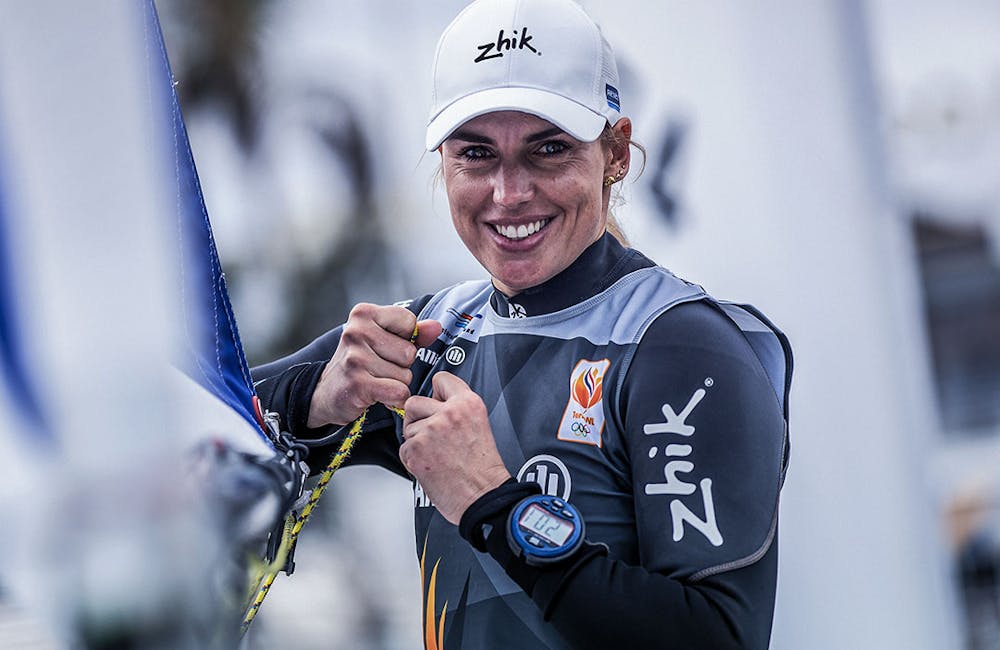
success-stories
Zhik sails away with $2M raised
Sailing apparel brand Zhik partner with Equitise to raise capital from both their Australian and international database.
May 3rd 2023

trends-and-insights
Grocery Industry Spotlight
Sam Wood (Equitise Investment Associate) breaks down the recent shifts seen in online and in-store grocery, and what investors should look for in 2023 and beyond.
February 22nd 2023

success-stories
Bushbuck's strong community backing raises over $1m!
New Zealand business, Bushbuck raise with Equitise to fuel them conquering the Australian market.
February 22nd 2023
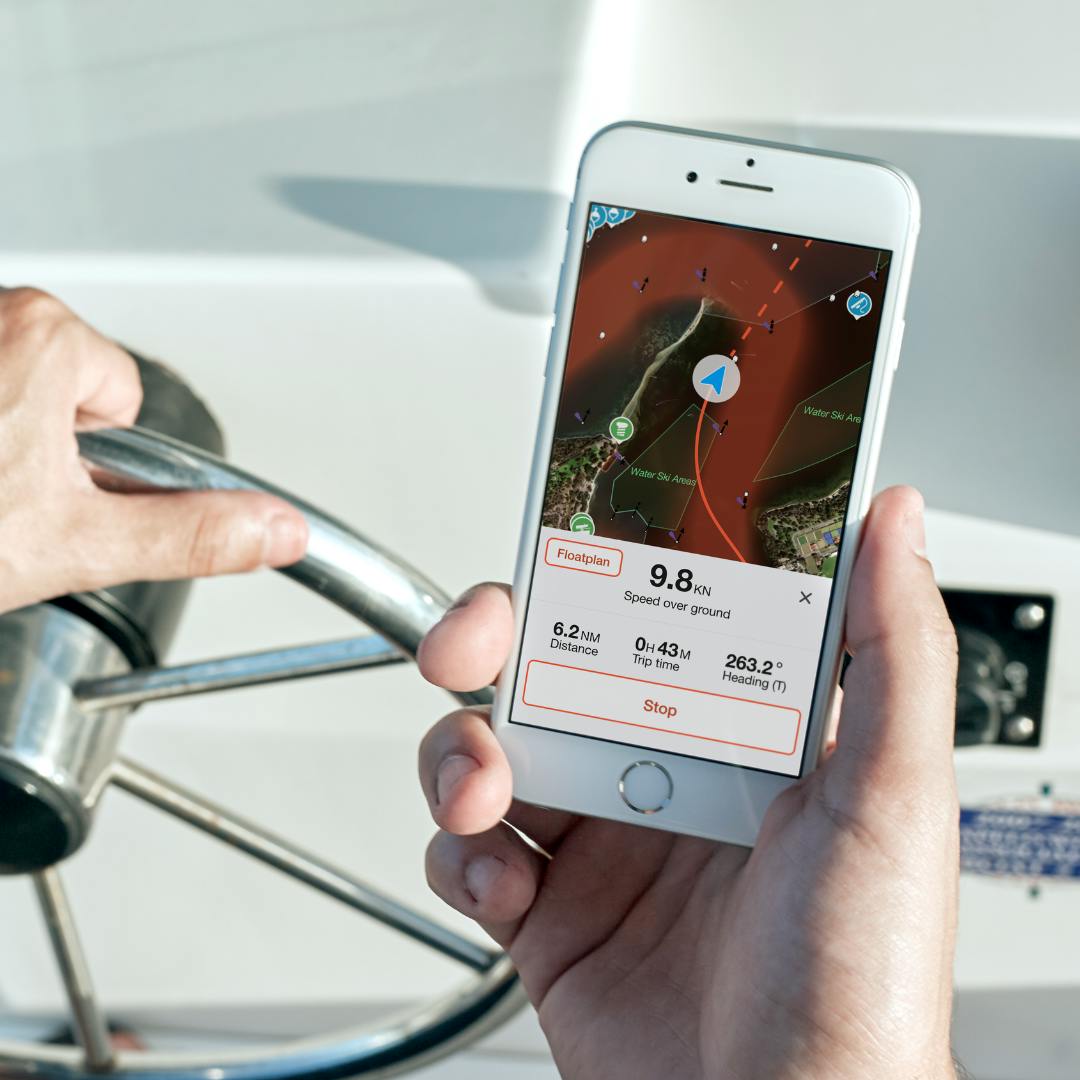
success-stories
Investors climb aboard Deckee
Deckee raise funds with Equitise as they look to global expansion.
February 21st 2023

success-stories
ReadiiTel Return for $1m+ Raise!
ReadiiTel return in 2022 for their second raise ahead of their intended IPO.
February 16th 2023

trends-and-insights
Apparel Industry Spotlight
Starting with the bold assumption that most readers wear clothes, Sam Wood (Equitise Investment Associate) breaks down the key drivers of growth in the apparel industry, and what investors should look for in 2023 and beyond.
January 20th 2023
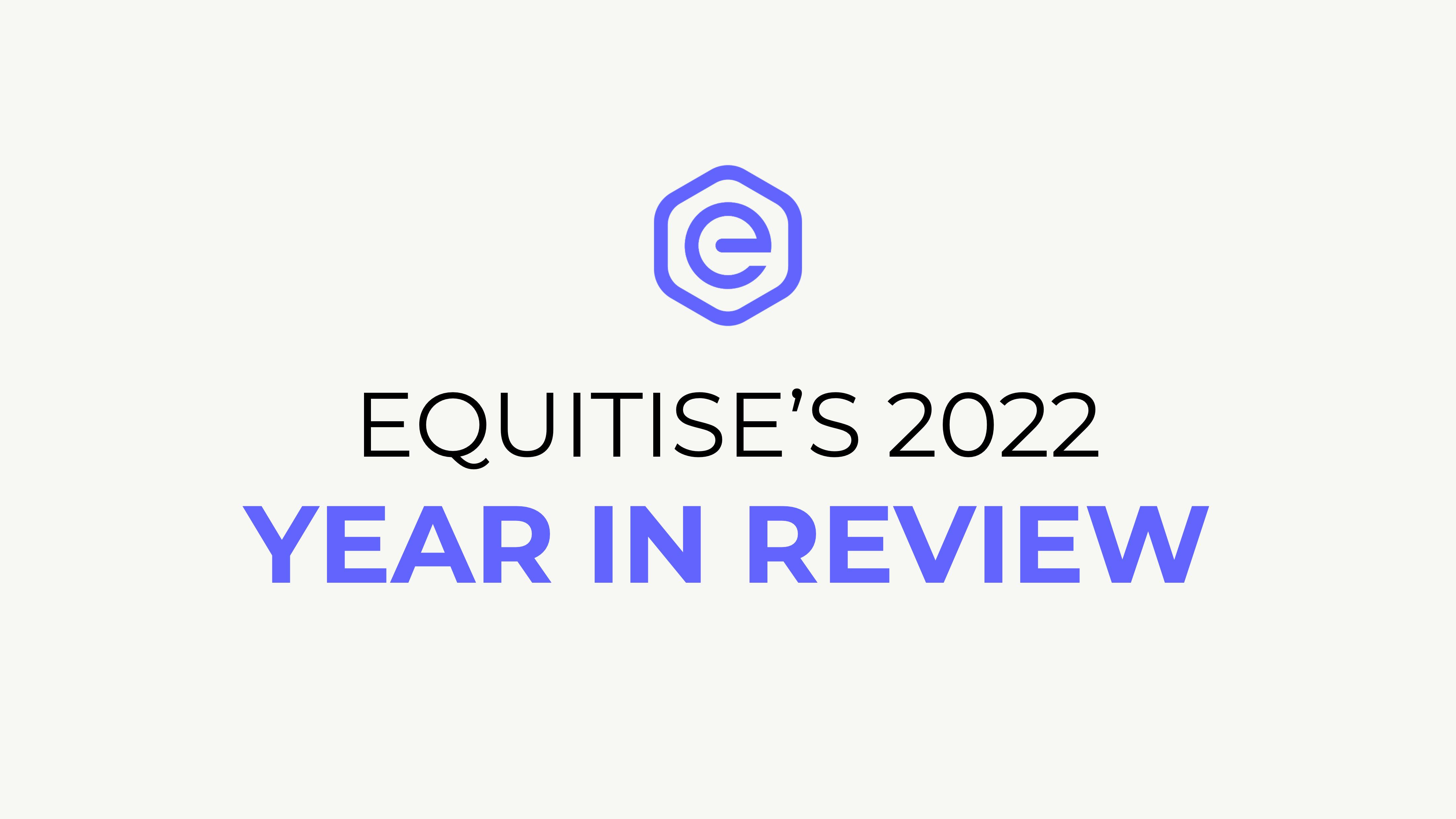
trends-and-insights
Equitise 2022 Year in Review
2022 was a massive year for us here at Equitise. We hired some fantastic people, worked with some inspirational businesses…and hit a few new PB’s! Although many of us are already knee deep into 2023, we just wanted to take a final moment to reflect on 2022 and share with you a little of what we got up to.
November 15th 2022

success-stories
Urban Plant Growers Raise $1m to empower indoor food production
UPG successfully raised over $1m with Equitise allowing them to expand into new markets and focus on product development.
September 12th 2022

success-stories
Monday Distillery closes Australia's largest non-alc CSF raise
Founders, Sam & Haydn, are one of the first to pursue the Australian Non-Alc RTD market!
August 23rd 2022

success-stories
Akasha Brewing Co raise $1.75m from 545 investors!
To fund their 5 year growth strategy, Akasha Brewing Co partner with Equitise to successfully raise $1.75m!
June 21st 2022
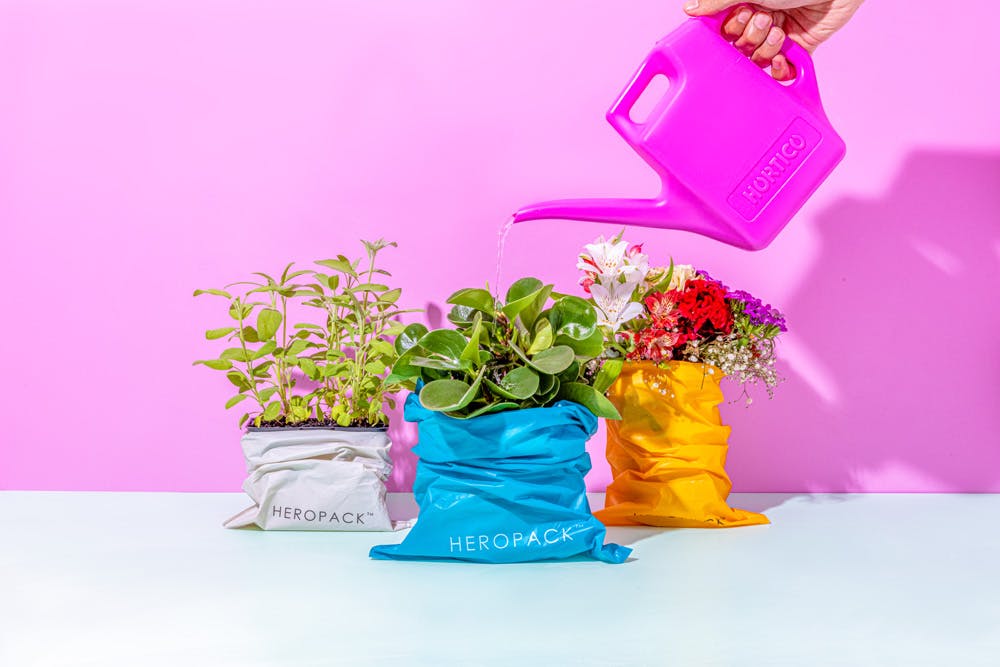
success-stories
Hero Packaging Raise $1.5m to Fuel Global Expansion
Leader in sustainable packaging for e-commerce brands hits its maximum raise target.
May 16th 2022

success-stories
Forcite Close $6m Series A Led by Uniseed
The Australian smart helmet technology company partnered with Equitise to successfully raise $1,304,695 from 531 investors. Overview In February 2022, the smart motorcycle helmet creator, Forcite, successfully closed a Series A round of $6m led by Uniseed. The round was supported by existing investors, and a $1.3m CSF raise through Equitise. This raise continues Equitise’s strong track record in the D2C, e-commerce space following successful raises with TBH Skincare and Tint. The funds from this equity crowdfund will help Forcite to focus on product development, establishing distribution channels across Europe and scale up manufacturing of their new MK1S helmet to meet a waitlist of over 13,000 customers. What is Forcite? Forcite has created a mass-produced smart motorcycle helmet with EU/Australian safety standard certification, patented visual alerting system, integrated camera and audio technology. Born out of the personal experience of founder Alfred Boyadgis, the team are leading the sector globally with game-changing technology delivering greater safety to riders. Forcite has achieved strong traction having shipped almost 1,380 smart helmets in Australia, and registering interest of over 13,000 individuals. Approximately 50% of these customers are Australian, and over 21% coming from the US, which provides a massive market opportunity as the company expands production capability. Within the global motorcycle market of USD 278 billion in 2020, consumers are rapidly opting for private mobility mode, with two-wheelers becoming a preferred choice owing to their affordability and convenience during COVID-19. Based on industry analysis, the global market is estimated to exhibit growth of 6.87% in 2022. Key Investment Highlights Rapid traction and market validation To date, Forcite has sold almost 1,380 helmets across three controlled releases, with their last release selling out in under 35 minutes. Having a unique and innovative design that addresses rider demand for quality, comfort and advanced technical ability, Forcite’s helmets have grown in popularity through word of mouth and private riding groups run by customers, establishing a strong community of loyal customers. Strategic partnerships driving scalability, distribution and sales Having partnered up with a leading helmet manufacturer, a Tier 1 motorcycle brand, industry experts and with Government support, Forcite has already built out the production line and quality control framework resulting in achieving a high quality product. Clear growth roadmap across verticals As part of the next phase of growth, Forcite is scheduled to release four new styles of helmets and their very own modular on-bike/in-bike computer vision/lidar/radar system that will communicate directly with the helmet. From developing commuter-styled motorbike helmets to racing helmets, Forcite will continue to be a competitive differentiator. Team, advisors and investors The Founders have 28 years of combined experience in technical design and commercializing products. They are supported by a dedicated team of software and hardware engineers along with advisors and production experts who have joined the shared vision. But more importantly, throughout the raise we saw the supportive community of motorbike enthusiasts, ready to invest and follow Forcite’s journey from the beginning. Building a community of fans, not just customers Forcite has built more than just a smart helmet motorcycle company, they have built a lifestyle brand that speaks to its audience. Through their community events, riding groups, social media groups they have built a core group of customers keen to transition to shareholders and co-owners. Key Takeaway from this Raise The raise demonstrates how institutional forms of capital work seamlessly alongside equity crowdfunds. Bringing on capital from VC/Private Equity and raising via an equity crowdfund are not mutually exclusive. In fact, more mature markets such as the UK demonstrate that these forms of capital work alongside each other regularly, serving very different purposes. As the Australian sector matures, we will continue to see more regular examples of this.
April 27th 2022
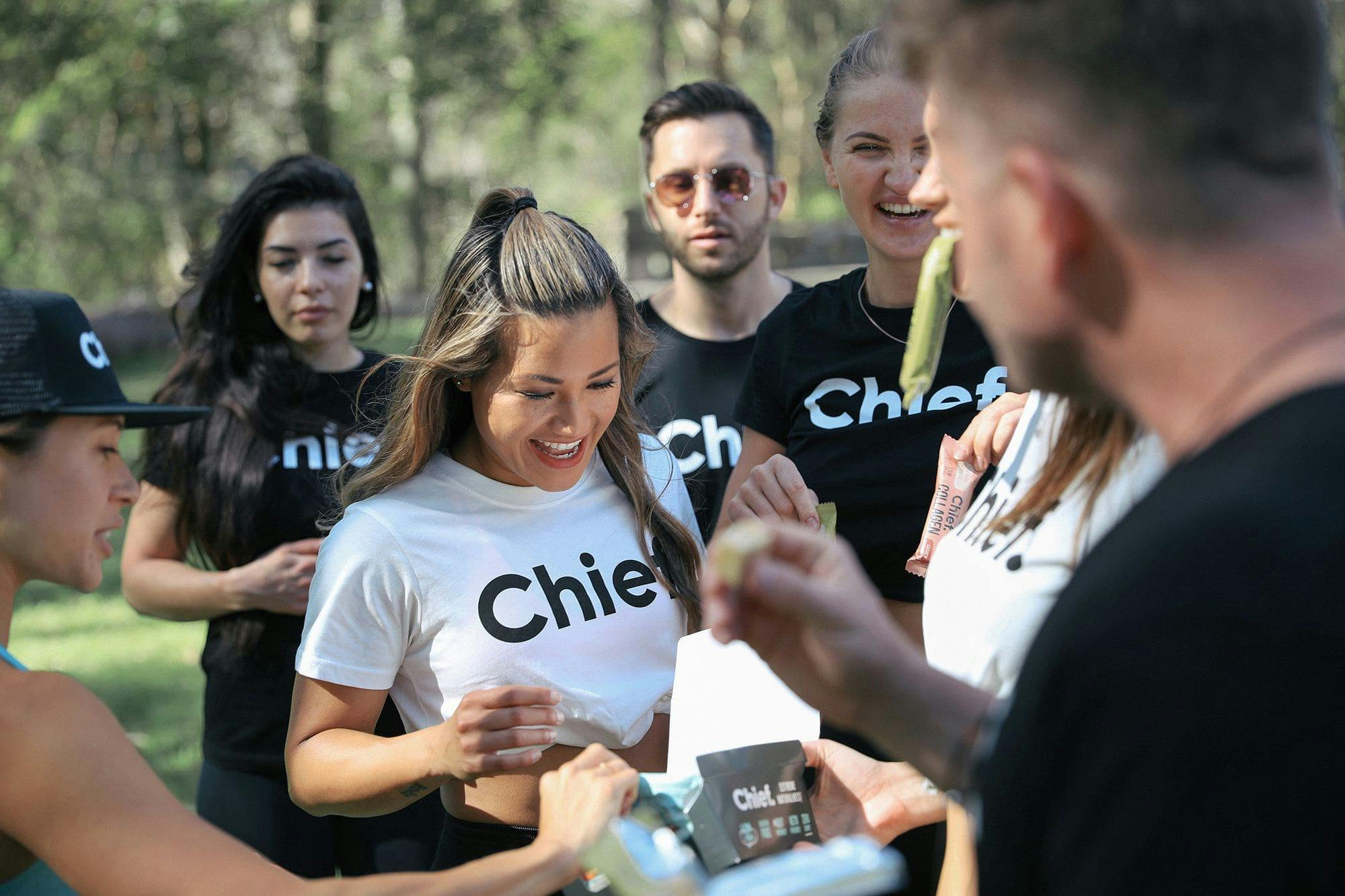
success-stories
Take a bite out of Chief! Bespoke, hybrid approach for Chief’s $1.3m Seed Round
Funding Round: Seed Total Round: $1,262,817 (CSF + Wholesale Investors + Existing Investors) CSF Portion: AUD $457,817 Total investors (CSF): 233 Average Investment (CSF): AUD $1,965 Overview In March 2022, “better for you” snack brand Chief successfully raised a Seed round of nearly $1.3m. This included support from existing investors, new wholesale investors, as well as a portion from CSF investors; a great example of Equitise helping to orchestrate a fundraise using different pools of capital (all at the same valuation of course!), for a bespoke result. This raise continues Equitise’s strong track record in the food and beverage space, and is another example of success working with a “mission-led” consumer brand. The funds from this equity crowdfund will help Chief increase brand awareness and build their strong community through marketing spending and sales & marketing hires. Chief will also use the raised funds for product expansion, and growth to new geographies, including the US. Who are Chief? Launched in 2015, Chief is a fast growing “better for you” snacking brand made up of the core Chief beef bar/ biltong and collagen bar range (80% revenue) and a complementary collagen brand, Beauty Food. The brand is sold across direct-to-consumer online (currently majority of sales) and wholesale channels in Australia and internationally. They are present in major retailers such as David Jones, IGA, BCF and Harris Farm, as well as gyms and fitness groups including Barry’s Bootcamp. During the campaign, Chief also successfully converted a trial with Woolworths and will be rolling out to 200 stores in May 2022 as a starting point. At the time of launch, Chief had an ARR of $1.6m, set to hit $10m by the end of 2023. Around 20% of online revenue is coming from customers on a monthly subscription. Importantly for emerging brands, the Company had a near term path to positive EBITDA (by mid 2022). This was due to growth marketing spend to date focused on building community around the brand, and new packaging suppliers going forward. Launched in 2015 by Brock Hatton and Justin Babet, alongside Libby Babet (health expert, author and former trainer on Channel 10’s “The Biggest Loser”) and Veronika Larisova (nutritionist and ultra marathon runner), the founders have used their passion and expertise to build Chief into the brand it is today. Within the c.$98bn global healthy snack market, consumers are moving away from big food companies with their perceived healthy snacks which are actually full of artificial ingredients and/or sugar. Consumers are instead looking towards alternative, “purpose led” brands which use genuinely healthy and sustainable ingredients. Investment Notes Why We Liked The Opportunity We first met Justin in late 2020 after reaching out when we saw a growing community online around the highly-marketable brand. We had also seen previous success in the “better for you” food space, with Food to Nourish. Challenger food brands have a great track record in crowdfunding both for investors (many of the best exits and returns have been in this space) and the brands themselves (the marketing and community building benefit is huge). HUGE target market, ripe for disruption We recognised the potential for growth in the c. $98bn global healthy snack market (growing at 6% pa), and saw Chief’s products as being a real disruptor in the Australian snacking space. Working from home in lockdown, we at Equitise team saw ourselves snacking more frequently or replacing proper meals with snacks, but often snack bags and bars aren’t as healthy as perceived. With sugar-filled snacks lining the shelves of most Aussie supermarkets, we expect to see a continuation of the big shift towards challenger, “purpose-led” brands which use genuinely healthy and sustainable ingredients. Unique, “Purpose-Led” Brand… We recognised Chief’s mission-led branding as one of its key highlights and key to building its loyal community of customers. As well as innovating and striving for genuinely healthy snack foods, the founders put great emphasis on sustainability of their Australian supply chain, which we viewed as especially important given they are beef-based. Justin and team are avid supporters of the “Regenerative Agriculture” movement, which is essentially about using a combination of farming practices (some ancient, some modern) that actively regenerates the land, rather than degrading or simply sustaining degraded land. Not only are these practices becoming widely recognised as one of the most important strategies to combat climate change, it’s also winning the hearts and minds of consumers. Through this, Chief also supported the not-for-profit Thankful For Farmers. Founders who have done it before… The first filter for any company we work with is the people: the founders’ vision, ability and leadership, and the skills and passion of the team who are all on the rider together. In the immediate term, we will be working on a time-intensive fundraise together and going forward we want the company to grow to new heights, do great things and ultimately achieve a liquidity event for investors. We loved working with the Chief team; they had a great mix of complementary skills and were all so passionate about the brand and the community around it. Their advisers were also world-class across the board. What impressed us the most, was that the team have had 5 successful scale-ups and exits between them so far; we can’t wait to see what happens with Chief! Multiple exit opportunities at attractive multiples The “better for you” snack space has seen a lot of attention from both private equity and large food groups, looking to snap up challenger brands. In particular, there are some great examples in meat-based jerky brands in the US in M&A and even IPOs (Stryve). Relevant M&A examples include: Chomps acquired by Stride Consumer Partners (US, Jan 2022, $300m, 3.0x revenue) Openway Food Co. acquired by Five V Capital (AUS, Sept 2021) Kind Bards acquired by MARS (US, Nov 2020, $5,000m, 3.3x revenue) Chefs Cut Beef Jerkey acquired by Sonoma Brands PE (US, Jun 2020) RxBar acquired by Kellogg (US, Oct 2017, $600m, 5.0x revenue) Epic Provisions acquired by General Mills (US, Jan 2016, $100m, 5.0x revenue) As Justin and team scale to a near term $20m target revenue, we see some very attractive exit opportunities for investors. What went well? Support of existing investors / hybrid approach Chief already had a very impressive roster of investors from earlier pre-Seed rounds. These included Ordinary Equity, a leading consumer growth equity fund founded by Alex Cornish and Chief’s Chairman, Gavin Ezekowitz, former Managing Director of Royal Bank of Canada (APAC). Existing investors committed almost $600k into this round, at the same valuation as all Equitise investors. There is no better show of confidence in the Company than the Chairman and existing investors committing in a follow on round. This also shows Equitise’s flexibility to tailor funding structures to suit the needs of the raising company, and draw on our large network of sophisticated and institutional investors. Broad community of customers and fans Chief has built a brand that has been seen by over 4M Australians in the past 12 months. Through the direct-to-consumer online channel, Chief has developed strong customer loyalty and a real sense of community. Investors in Chief ranged from health and fitness fans, to those interested in regenerative farming and involved in the beef industry. Positive newsflow throughout campaign The success of the Woolworths trail, announced during the fundraising campaigns was a great testament to the strength of the opportunity and the speed of the growth. Positive updates during the course of a campaign can really help to get people's attention and accelerate investment. “Equitise was great to work with. From day one we had a team of 4 experienced people supporting us on everything from valuation work to writing our offer document to promoting our campaign via social, advertising, EDMs and more. They provided a large amount of examples for everything which made an otherwise imposing job that much more achievable. It’s tough raising capital at the same time as your day job so the weekly WIP kept me on track and I'd often get texts out of hours as the team worked hard to help us secure some of our bigger investors. We did things a little differently than the norm with a hybrid investment round comprising two tranches, one for existing and significant new investors, and one for crowd investors. Equitise introduced us to some great contacts from their wholesale network. While this approach is probably not suitable for everyone, it ultimately delivered us a fantastic result beyond our stretch target.” - Justin Babet, CO-Founder & COO, Chief Nutrition Looking Ahead We are excited to follow Chief on their journey to expand operations and become one of one of Australia’s leading health food snack companies. Since completing their raise with us, they are focused on their rollout across Woolworths stores, and their wholesale channel which will be the key driver of growth. Once we’ve established ourselves in major retailers in Australia, we will shift focus to other international markets including the US, Asia and Europe with the goal of being a global business. New product launches will also feature in the growth plan. They will look to raise a Series A at the end of 2022 so we look forward to working with them again!
April 21st 2022

success-stories
Bundlfresh Offers Investors Sustainable Growth in the Last Mile Delivery Segment!
The Australian online marketplace Bundlfresh partnered with Equitise to successfully raise $1,000,000 from 217 investors. Bundlfresh aims to use the funds to expand its services across Greater Sydney, and continue on its mission to ‘make shopping local a big advantage’. What is Bundlfresh? As large grocery chains invested heavily into online shopping and convenience, many smaller independent, local retailers have been unable to participate meaningfully in this digital channel. Founded in 2019, Bundlfresh is an Australian online marketplace allowing consumers to bundle produce from their favourite local stores, butchers, bakers, greengrocers, delis and more, into a single order and delivery. Currently, Bundlfresh serves 47 suburbs across the Northern Beaches of Sydney, and has plans to expand across Greater Sydney Area, and other major Australian cities over the coming years. Why we liked the company Unique Value Proposition Bundlfresh has a unique value proposition for both customers and vendors: enabling local vendors to compete with big grocery chains through online sales; and allowing customers to flexibly bundle any item in a single order and delivery, saving time and money. A Massive Underserved Market Fresh Produce is a $50Bn market and Independent (non-supermarket retailers) have ~30% share ($15Bn). In such a massively underserved market, Bundlfresh is capitalising on the rise of online shopping, and riding off the megatrend of buying local to focus on a $2Bn market opportunity. Strong traction and growth potential In the past two years, Bundlfresh has grown at an annual growth rate (CAGR) of more than 300%, and is now serving 47 suburbs. Since May 2019, more than 120,000 vendor orders have been delivered to nearly 3,000 customers. Sustainable business model Unlike other last-mile delivery services such as Milkrun and Send, Bundlfresh has carved out its own niche with local vendors, and is able to have a clear road to profitability without suffering the intense price competition present in the industry. With strong customer satisfaction, high retention and ‘word of mouth’ referrals, Bundlfresh’s Customer Lifetime Value (CLV) currently sits at $2,825 and its online conversion rate is 18% compared to the industry average of only 3%. Looking Ahead In addition to launching into new regions across Sydney in the coming months, Bundlfresh is has been approached by a Tier 1 Independent Grocer seeking to be onboarded onto the platform. This will see the addition of 10,000 grocery lines allowing customers a ‘full service’ offer beyond fresh produce. With a commitment to supporting local communities and suppliers across Australia, the vendor has expressed an intention to price match Coles and Woolworths on more than 1,200 products. Key Takeaways from this Raise More sophisticated investors in CSF In recent raises, and particularly in this one, we are seeing higher participation from sophisticated investors who are driving up the investment average. With Bundlfresh, we observed a very high average investment of $4.6k vs our avg across most deals of $2.8k. In 2021, 11% of investors are wholesale investors, an increase from just 7% in 2018. This is a continuous trend that we expect to keep seeing as the crowdfunding space matures in Australia. Engagement over size A key contributor to Bundlfresh’s successful raise is its highly engaged audience - both customers and vendors. With hardly any marketing spend to date, the company's growth to over $3m in annualised revenue has come nearly entirely from word-of-mouth referrals. With 500 of its 3,000 customers having ordered more than 15 times, the company has built a platform with sticky and passionate customers with many jumping at the opportunity to invest. Whilst many other companies we have come across have had much larger databases to which they could market the offer, Bundlfresh's was unique in its 'stickyness'. This is a key thing for companies to consider when they are considering a CSF, and drives the likelihood of converting customers into investors.
March 30th 2022
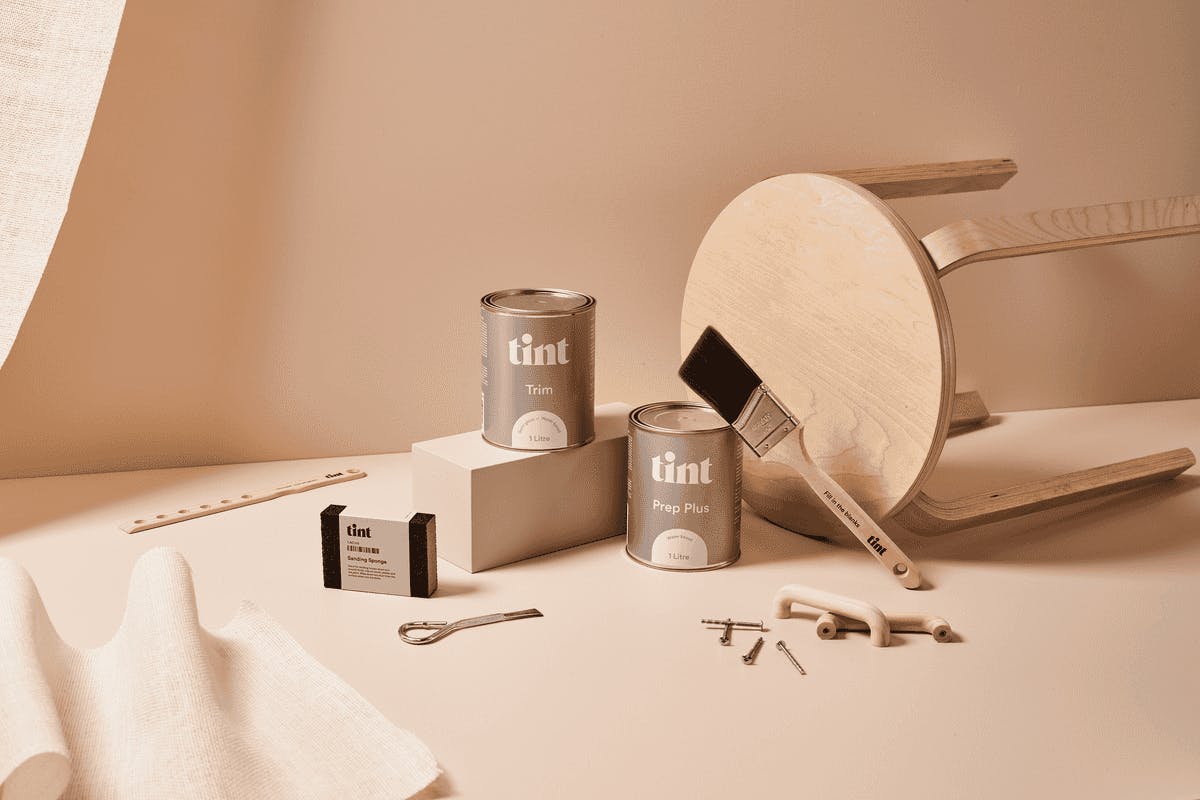
success-stories
Fast-growing Aussie e-commerce brand stirring up how we paint & decorate
Tint has raised $700,000+ within 2 weeks of launching, to fuel growth plans!
March 18th 2022

trends-and-insights
Industry Spotlight - E-Commerce
How many of us have ordered something online during lockdowns last year? E-commerce, the buying and selling of goods and services over the internet, has accelerated through COVID, growing at 57% over the last year alone! Supported by adoption and improvements in e-commerce services and technologies such as Shopify and Afterpay, Australia has seen a further shift online by traditional retailers, growth in online marketplaces as well as emergence of digitally-native, direct to consumer (“D2C”) brands. Concepts such as same-day delivery, that were once unheard of in Australia, are now commonplace thanks to improvements in delivery and logistics infrastructure and systems. Whilst the growth is impressive, Australian e-commerce activity is currently only ~16% of overall retail, compared to 20% of total retail in the US market. Here at Equitise, we predict that we will continue to see a shift online, fuelling fundraising activity in online-only startups, as well as complementary businesses such as packaging, payments or supply chain technologies. This convenience of online shopping has had a tremendous impact on the way we shop. Focus on the customer experience, distinctive branding and a subscription revenue model all create customer loyalty. Whilst COVID accelerated this trend, the real winners in the long term are those with an evergreen customer base and strong unit economics. E-Commerce has also been fuelled by the proliferation of online content across all media platforms such as Youtube, Instagram and TikTok, or the growth of the “creator economy”. This has accentuated a new form of marketing and selling products or services online, in a way that engages a ‘fan-base’ of customers. As e-commerce continues to dominate global markets fuelled by the COVID pandemic, it is time to take a look at why online and in particular, D2C businesses have boomed, and the key trends we look out for. The Australian E-Commerce Landscape As we emerge into a future led by spending more time at home, more and more Australians have shopped online than ever before in 2021. E-commerce has taken off in Australia with total revenue from the online shopping industry valued at $44 billion, as of the end of 2021. As Australian consumers have had no choice but to change their online spending habits, this has driven a dramatic shift in online shopping behaviour. As a result of the COVID-19 pandemic, this trend highlighted total online sales to have grown by 12%, as of June 2021, where businesses are rapidly ramping up digital sales capabilities. Despite the common trend towards rising e-commerce penetration globally, online spending in Australia has remained consistently below most international markets. But, as international players have entered the Australian market this past year, penetration has doubled in the last 5 years due to the impacts of COVID, reaching 13%, as of the beginning of 2021. We explore the key players: Hybrid Model: Existing retail brands transitioning to online. Driven by enforced lockdowns and a shift in consumer buying habits, many well-known Australian retailers have accelerated their online expansion. Technology has allowed established retailers to leverage their physical stores and distribution networks to meet customer expectations by offering “click-and-collect” services and home deliveries. For example, Woolworths is one of Australia’s earliest online innovators, particularly with the online offerings of Big W, Dan Murphy's, Cellarmasters and Woolworths. Holding a c.10% market share in online shopping in Australia, Woolworths have successfully expanded and streamlined its delivery options and click-and-collect services during the pandemic. To further cater for online demand, Woolworths launched an online marketplace, ‘Everyday Market’, in September 2021, a one-stop-shop for all everyday essentials, ranging from Health & Beauty to Pet Needs. Other retailers such as Bunnings, Myer, BWS, Coles, David Jones, Freedom and Harvey Norman are also transitioning to provide more efficient services online. Online Marketplaces: Aussie Home Grown Successes Australia has also had its own share of home grown e-commerce success stories, ranging from B2B and B2C marketplaces across fashion, homewares and trade supplies. These include Catch.com (founded 2011), The Iconic (founded 2011), Adore Beauty (founded 1999), Grays.com (current format founded 2000) and Kogan (founded 2006). These have evolved the Australian buying experience, disrupting traditional business models and taking increasing market share from bricks and mortar retailers. COVID accelerated this disruption, as retail stores had to close and shoppers had to look online. "We're definitely seeing a transformation in terms of how people shop.. E-commerce in Australia has advanced several years in the space of a few months…We will continue to take more market share. People are shifting because they see how easy it is. They don't have to find a parking spot and deal with a pushy sales assistant. People have changed the way they shop. We are seeing it across the board.'' Ruslan Kogan, quoted in the AFR Online retailers are continuingly tapping into a range of features such as managing delivery options (click-and-collect or home delivery), customer email services, and personalised apps and website experiences, to consistently engage with their growing online customer base. International Marketplaces Alongside the home grown ecommerce platforms, Australia has also seen the entry of global ecommerce powerhouses, including eBay and Amazon. eBay entered the Australian market in 1999, and alone is used by 12 million Australians on a monthly basis to shop and sell goods online. Amazon, entered later in 2017, but has already hit $1.2 billion sales (as of Dec 2021), and is forecasted to account for approximately 25% of the Australian online retail sales. They remain a strong competitive force in the Australian market, providing the consumer with more options to shop online. Digitally Native & Subscription Brands Another category is online-only platforms that focus on a specific category or product and drastically disrupt the buying experience for the customer. Given the relative nascency of e-commerce in Australia, this often includes categories disrupted in more mature markets and then approached here in Australia. Koala was one of the early movers in the Australian direct-to-consumer movement, targeting the outdated and user-unfriendly experience of buying mattresses and furniture. Taking this a step further, for more perishable goods such as groceries, toiletries and toilet paper, D2C brands can operate on a subscription basis. This creates recurring revenue and customer loyalty for business and increased convenience, personalisation and improved experience for the customer. Some examples include: Lyka, subscription premium dog food (raised $6.5m in July 2021) Who Gives a Crap, toilet paper with purpose (raised $41.5m in September 2021) Eucalyptus, subscription telehealth/ healthcare products (Series B raise of $30.0m in July 2021) D2C and subscription businesses are becoming increasingly competitive with increasing costs of marketing and customer acquisition as consumers have more choice. Focus is therefore on increasing customer LTV and growing and keeping a strong user base. This comes down to building a strong community of fans around a brand and superior customer experience. The Supporting Acts: Complementary service & technologies. Supporting the boom in online retail is a breadth of players covering the full infrastructure chain from funding of ecommerce business models, cloud services, payments technology (such as Shopify), logistics/supply chain management and packaging & last mile delivery. On top of this there are also technologies driving the customer experience including digital and behavioral marketing and customer insight companies. These are seeing huge growth, a range of examples from the past 18 months: Sendle, delivery and logistics for SMEs (raised $20m in Jan 2019) Carted, application programming interface (API) tool for online businesses (raised $13m in May 2021) Clearco, revenue-based financing for E-Commerce brands, raised $215m through a growth equity round, in July 2021 Particular Audience, an Aussie E-Commerce startup, that focuses on machine learning technology, raised $7.5 million in Series A funding in November 2021 Here, at Equitise, we are seeing some great investment opportunities in this space, for example, Hero Packaging, which is launching a fundraise in March 2022. Finally there are also complementary services for consumers. For example, one of Australia’s latest tech unicorns (and current target of a huge acquisition from Square), Afterpay, is an installment payment service provider that enables its customers to buy products on a ‘buy now, pay later’ basis. Most Interesting Trends in Australian E-Commerce As more and more Aussies resort to online shopping measures, the growth of e-commerce has propagated across both metropolitan and regional areas in Australia. Spending more time at home than ever before, we continue to see phenomenal growth in the e-commerce industry. Here, we will discuss key trends that have been witnessed this past year. Lockdown habits are here to stay. COVID-19 has changed the way Aussies approach the online marketplace. Due to the convenience of browsing products online and efficiency of home-deliveries, the e-commerce market will see sustained growth, even after the pandemic. In the ABS Household Impacts of COVID-19 Survey, one-third of respondents indicated they prefer to shop online now more than they did before the pandemic. So, how is Australia’s e-commerce increasingly catering to new online shoppers? In 2021, 1.36 million Aussie households made an online purchase for the first time. With COVID-19 restrictions closing non-essential services, Aussies took to shopping online, surging sales for online retailers. More importantly, these restrictions had a significant impact on how often Australians shop online. According to Australian Post’s eCommerce Industry Report 2022, those who made a purchase less than four times between March and December in 2020, 52% shopped online more frequently in 2021. Bricks and mortar retail is not done yet! During the pandemic, an increasingly familiar experience for many Australians included visiting different online and physical stores, browsing and comparing competitive prices online, and choosing the most convenient way to get the products they need and want. This resulted in Australian omni-channel online expenditure to grow by 71.6% from 2019 to 2020. Omni-channel retail involves consumers combining physical and online channels, often within the same purchase journey. For example, a customer may search for a product in-store (physically or online), pay for it online but pick it up at a store (including through ‘click and collect’ or ‘curbside pickup’), buy online or buy through a peer-to-peer or social media platform and have it delivered to their home. As a result, businesses must consider their omni-channel strategy to deliver a convenient shopping experience across channels. Buying online still means buying local. According to a study conducted by Shopify, 47% of consumers value the local presence of brands from which they shop from. The ‘buy local’ trend gathered momentum during the height of the lockdown, further perpetuated by Australia’s natural disasters and economic upheaval, to show support for local Aussie businesses in remote areas. With the help of social media campaigns urging Australians to shop in local communities, attention turned to these communities to reinvigorate the local economy. #ClickforVic was a powerful campaign launched by the State Government, designed to support local businesses. During the height of the Victorian lockdown, this hashtag received traction through 31,000 posts! Other such hashtags included: #BuyFromTheBush #SpendWithThem #WhereYouShopMatters #BuyRegional This noticeable uptake in social media campaigning allowed regional businesses to promote their businesses for free via these campaigns, allowing Aussies to support the local businesses they wanted to see encouraged. Crowdfunding and E-Commerce Equity crowdfunding allows startups to raise significant funds from a wide range of investors instead of relying on an angel investor or other restrictive investment channels whilst building a community of brand advocates. This in turn helps these startups build brand awareness and loyalty which is key to the success of any business. We have recently been working with some exciting ecommerce brands, such as Tint (D2C Paints and Interiors) and tbh Skincare (D2C Skincare) as they look to scale in Australia and internationally. In 2022, we predict more fundraising in activity in sectors supporting the e-commerce infrastructure, such as Hero Packaging, which creates sustainability. Conclusion The Australian e-commerce landscape is constantly evolving, adapting to new consumer preferences and behaviours that have been forever changed, even as we look beyond COVID. As e-commerce continues to grow, we predict Australian penetration to increase to levels seen in the US or UK. The role of supporting infrastructure, what we call ‘picks-and-shovels’ businesses, such as packaging companies to online website development platforms, will become more vital than ever in supporting e-commerce businesses. To reach this growing base of online consumers, equity crowdfunding becomes a great way to connect retail investors with the consumer brands they buy from or use. Feel free to reach out and get involved! If you are a D2C brand and are considering fundraising in 2022, reach out to the Equitise team and we can walk you through how a process might look like. Equally, if you are an investor looking to own a share in our next D2C, e-commerce raise, reach out to us and keep an eye on your emails!
February 23rd 2022

trends-and-insights
Industry Spotlight - Craft Beer
First, in the series of blog articles on the Australian drinks industry, we explore the craft beer phenomenon and why our investors love owning shares in the hottest craft beer brands… Key Takeaways The craft beer industry in Australia growing at 10% CAGR, represents an almost a billion dollar industry, and still has room to grow when compared to markets such as the US and UK Growth drivers include the continued experimentation of styles, the push into taprooms, growth of low/ no alcohol and potential international expansion Crowdfunding and craft beer work well together; all its about engaging a community around a product and passion Australia has recently seen some record-breaking craft beer fundraises (Batch Brewing, Spinifex) including in non-alcoholic beers (Sobah, Heaps Normal) We see continued activity in the space, as well as broader infrastructure Introduction In spite of years of strong growth and some impressive exits, the craft beer revolution in Australia is still on an upwards trajectory and there’s never been a better time to get behind your favourite craft beers. The story of how the craft revolution began is well known; beer-lovers turned home-brew enthusiasts experimenting with their own flavour combinations and brewing methods and evolving into small-scale and low volume breweries. The result? Unique and innovative flavour combinations and styles, using local ingredients and traditional brewing methods. Craft beer in Australia is now almost a billion-dollar industry, with up to 1,000 breweries nationwide (although some value the wider industry at over $2bn, given the high labour intensity and employment). Craft beer is now part of mainstream culture, with events such as GABS100, seeing huge press attention and following. Whilst some of the larger craft breweries have since been acquired over the past decade (including Stone and Wood last year), there is a tail end of independent breweries building communities around beers — the essence of the craft movement. In a market where drinking in moderation is favoured, a combination of heavy marketing spend by the corporate-backed craft beer brands (we won’t get into a debate whether that still makes them craft…) and a loyal following from fans of the independents is driving the strong market growth in the craft beer segment. That said, the market is still in a relatively early stage (c.14% craft beer revenue penetration out of the total beer market, 10% of volume) versus more mature markets such as the US (c. 24%). This article covers some of the main themes in the Australian craft beer landscape and what Equitise looks for in its record-breaking fundraises for craft beer brands. The Craft Beer Landscape in Australia Traditionally, the Australian beer market has been highly concentrated and largely produced for local taste and consumption. The major players in the industry include Asahi (owners of CUB), Lion Nathan (owned by Kirin) and Coopers. Whilst overall beer consumption in Australia has declined in recent years, the demand for independent beer brands is increasing, and craft beer continues to take market share. There are a number of craft breweries owned by larger groups, including multinational drinks companies and craft beer groups operating multiple labels such as Mighty Craft. Whilst they are able to capture most of the retail shelf space and on-premise tap space, they are also bringing in new enthusiasts to craft beer through big marketing budgets and awareness. As uniquely different brands, they serve to bring new enthusiasts to craft beer…as the saying goes, a “rising tide raises all ships”. The continued growth of craft beer is characterised by passionate craft beer makers and home brewers, together with more discerning beer drinkers and consumers who are demanding a more distinct, flavourful and higher quality product. This has increased focus on drinking for flavour and authenticity as well as “drinking local” and building personal relationships with preferred brands. The trend is evident in a long term shift in consumer tastes, which is driving an expected increase at a CAGR of up to 10% going forward. Craft brewing is all about experimentation and smaller, independent breweries are nimble enough to quickly work with new and different styles, raw materials, recipes and flavours. Indeed, there is a huge range of styles and flavours for consumers. Fruited sours, session IPAs and XPAs are popular go-to's in the craft space, with an ever-increasing demand for ‘sessionable’ beers, including the growing ‘no and low’ alcohol trend. Equally, high quality, independent versions of classic styles such as lager are seeing strong offerings from craft brands like Hawke’s, Yulli’s and White Bay. During the COVID-19 pandemic, the industry has faced unprecedented challenges as the forced closure of retail outlets, pubs and restaurants limited sales channels for many breweries. As home consumption rose sharply, there was a shift to long-standing value beer brands, as well as a major swing to beer cans (vs bottles). The pandemic emphasized the importance of having strong distribution channels, including an online presence. Nevertheless, the IBA grew in membership over the course of the last year, and with a supportive regulatory environment (such as the increase in excise rebate last year), the number of breweries looks set to increase further. Looking ahead we see 3 key themes shaping the industry… Trends Driving the Growth of Craft Beer 1. Continued expansion into venues Expanding into branded and proprietary venues, including brewpubs or taprooms, allows craft beer brands to build awareness, strengthen their customer loyalty as well as being a higher profit margin route to market. With crowded off-premise shelves and competitive tap space in on-premise locations, proprietary venues allow craft brands to showcase new releases as well as get closer to the customer, creating an easier, less intimidating experience. Peter Phillips, the former Chair of Independent Brewers Association (IBA) recognises this and says: “The growth of indie brewers is testament to the fact that consumer demand is driving growth … Australians want greater connections to community, to the people that make beer and to their local meeting places.” This will also drive beer tourism in areas with several breweries or those of particular standing that can attract visitors from afar, such as in Marrickville in Sydney or around Hahndorf in South Australia. 2. No and low-alcohols A broader moderation trend and the ‘better for you’ movement is driving demand for low carb, low calorie, gluten free and also low and no alcohol options. It is telling that in January 2022, Heaps Normal broke records by coming in at #20 on the GABS 100 countdown, as the first no/ low alcohol beer to do so. The category is certainly booming, according to the 2021 IWSR Drinks Market Report, ‘no and low’ alcohol volume is expected to grow by 16% between 2020 and 2024, with a study revealing 71% of Aussies intend to increase or maintain their no- or low-alcohol consumption this year. Other brands such as Nort (Modus Operandi) and low alcohol beers such as Brick Lane Brewing’s Sidewinder, a low ABV hazy pale ale, are also doing exceptionally well. 3. Taking Australian craft beer global Mirroring the arguable success of other Australian beer exports such as Fosters, Australian craft beer is ready for the global stage. Currently, the industry has a low export rate (around 5% of sales) primarily because relatively few of the brewers have achieved the scale to make export cost-effective and more mature markets such as Uk and US already have homegrown beer brands with local presence. However, there is a huge potential opportunity to export, in particular to Asia Pacific. For example, Mountain Goat (backed by AB InBev) has been exporting to Asian markets for over 5 years, and Moondog, the Melbourne based craft brewer, has also opened up a venue in Singapore. Spinifex Brewing, who raised with Equitise in 2021, saw export as a big growth channel, and was already shipping to markets in Europe, Japan and South America. Craft Beer M&A Activity Craft beer M&A has been driven by the traditional beer and alcohol players trying to capitalise on market growth and adding brands to their portfolios, in a trend that has been seen in other markets such as the US and UK. In Australia, multinational alcohol giants such as Carlton & United Breweries (owned by Asahi) and AB InBev have made a number of acquisitions of successful craft breweries including Balter, 4 Pines, Pirate Life, Green Beacon and Mountain Goat. These transactions typically see attractive multiples paid to buy up the culture and ethos of smaller brands that the big players can’t create themselves, such as the beachside community identity of Balter, founded by 4 professional surfers including Mick Fanning. Whilst there are many critics of such transactions, the marketing and distribution benefits bring an overall net benefit to the craft beer movement. In Sept 2021, Lion (owned by Japanese multinational, Kirin) paid more than $500m for Australia’s largest independent craft brewer — the Byron Bay-based Fermentum, parent to brands including Stone & Wood, Two Birds and Fixation. This shows even the biggest craft brewer has a suitor and can be convinced to give up its independent roots for a price!
January 27th 2022

success-stories
Successful Crowdfund Exit: Car Next Door
Campaign Year: 2017 Campaign Type: AU - Wholesale Campaign Duration: 69 days Amount Invested: A$770,000 Number of investors: 24 Average Investment: A$32,678.67 Percentage Funded: 156.9% What is Car Next Door? Car Next Door is an online peer-to-peer car-sharing platform operating in four cities, with 50,000 members sharing 1,200+ vehicles. The company lets Australians access cars on demand, without the costs and upkeep associated with ownership. Access to cars is secure and unattended through a patent-pending method utilising an electronic lockbox with a plug-in GPS tracker and an online booking and payment platform. Rapid growth since an early pilot scheme in 2013 has seen Car Next Door become the second-largest provider of car share services in Australia. The Founders of Car Next Door became highly aware that a lot of people own a car but often don’t use it. They wanted to find an environmentally and financially friendly solution by creating a car-sharing platform allowing owners to rent their vehicle(s) to borrowers who need it. The Car Next Door idea is driven by "green motivations" as they work to reduce the amount of carbon emissions released into the atmosphere. One car produces 44.3 tonnes of carbon dioxide over 10 years. An even higher amount of emissions are created during the manufacturing process. The sharing of underutilised cars reduces the number of vehicles on the road. Research also shows that with car-sharing both borrowers and lenders become more aware of the cost of driving so tend to drive less Moreover, the emissions created by Car Next Door borrowers are offset by long-term emission reduction projects run by the environmental not-for-profit organisation Greenfleet. The organisation works to restore native forests and biodiversity in Australia. Having a working and highly scalable platform that was quickly gaining traction, Car Next Door partnered with Equitise to raise A$770,000 from 24 investors, overshooting the initial target by 56.9%. Funds raised were largely allocated to fuel customer acquisition through marketing efforts and enhancing the existing platform, as well as optimising customer conversion, obtaining parking spaces in high demand areas and creating a corporate offering. Quote from Will Davies, CEO at Car Next Door "We have worked with Equitise a couple of times now to support the Car Next Door business in its capital raising strategy. Over both engagements we found the Equitise team to be professional and genuinely passionate in assisting our team yield the results we were looking for. We hope that one day we may be able to utilise their platform to conduct a full retail offer to the public through equity crowdfunding." Investor Exit - Car Next Door gets acquired by Uber It was announced on January 19 2022 that ride-sharing giants Uber had acquired Car Next Door. This means that Equitise investors who participated in Car Next Door's 2018 and 2019 rounds with us were able to get a return on their investment. This acquisition builds on Uber's ongoing investments in electric vehicles, micromobility, and public transportation in order to reduce dependency on private automobiles and contribute to the creation of greener, more liveable communities. Car Next Door will report to Uber's Australian team after the acquisition, but will otherwise operate independently, with its current leadership team focusing on growing and scaling its technology in other cities across Australia.
January 6th 2022

for-investors
Meet the founder of Forcite
Forcite is a technology company that has created a mass-produced smart motorcycle helmet with ECE 22.05 (EU/Australian safety standard) certification, patented visual alerting system, integrated camera and audio technology. The company was born out of firsthand experience, when in 2013, motorbike enthusiast Alfred Boyadgis took a fall going through an oil slick, injuring his knee. It transpired that the camera mount had smashed the side of his helmet compromising the protection to his head. Aside from bolt-on devices not being designed for helmets, the thought did strike him that given modern sophisticated camera, sensor and tracking technology like we see in luxury cars, we should be able to anticipate such hazards. This would allow riders to take evasive action before those hazards become a danger. We had a chat with co-founder Alfred Boyadgis to get to know more about Forcite and its revolutionary technology.
December 24th 2021
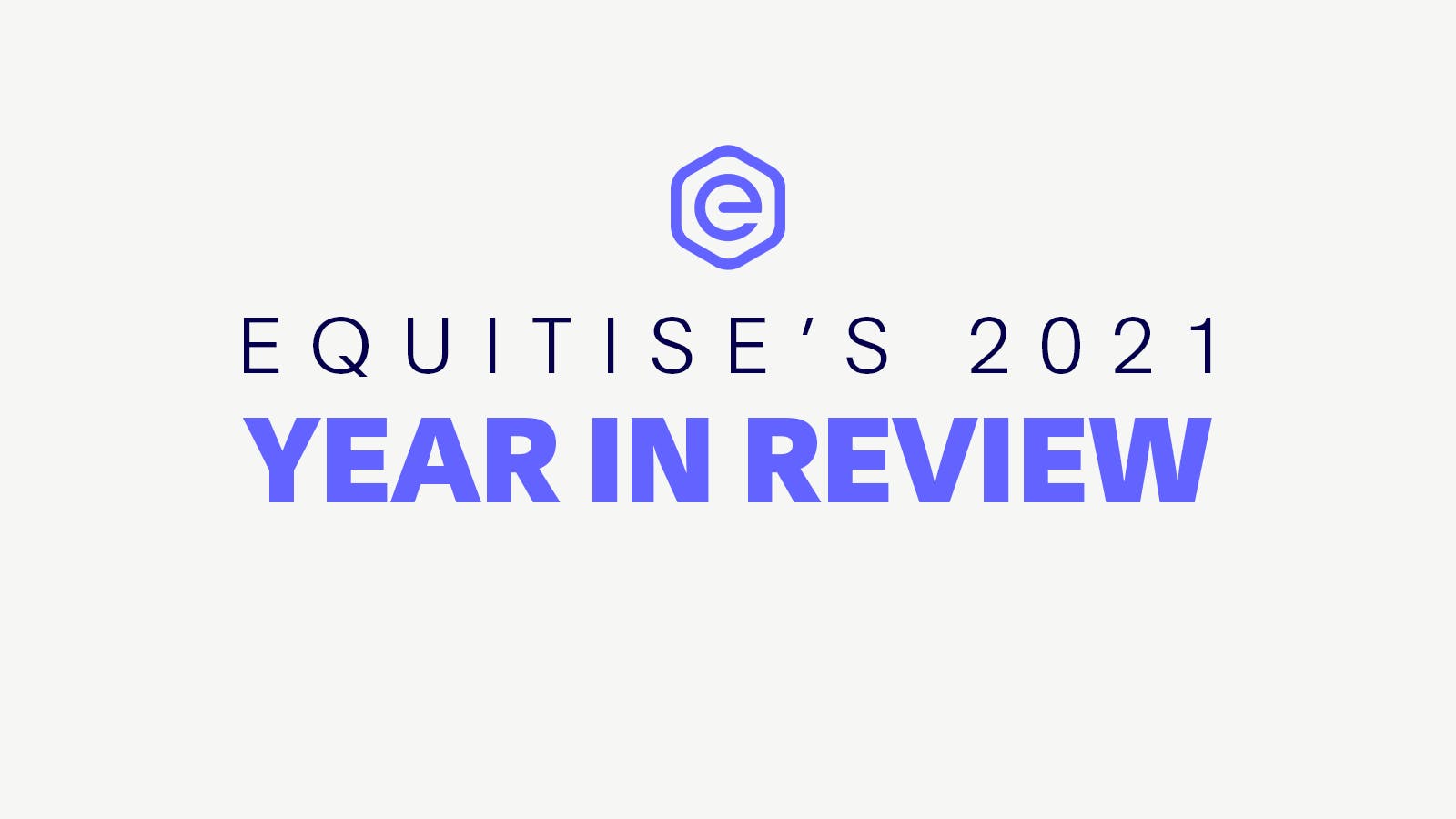
for-investors
2021 Year in Review
We’ve wrapped up another record-breaking year at Equitise, and what a year it has been for both us and for equity crowdfunding in general! We thought you might like to hear a little bit about our biggest moments — so here goes… This year we broke the Australian record for the largest craft beer raise not once, but TWICE. Across the border, we saw two Equitise alumni, Greenfern Industries (GFI) and Tradewindow (TWL) complete successful listing on the New Zealand Stock Exchange (NZX), representing strong returns for our investors. In 2021 we have also seen our Equitise family grow. We welcomed a bunch of new members including Ben on the fundraising team, Al on the marketing team, and Lisa, our new graphic designer. We’re also excited to welcome three new interns who will be joining us early next year! Read on for a full breakdown of 2021 at Equitise.
November 29th 2021
.jpg?ixlib=gatsbyFP&auto=compress%2Cformat&fit=max)
success-stories
D2C fresh food disruptor Your Food Collective raises $644k
Female-founded fresh-food disruptor Your Food Collective successfully raised over $644k from 232 new investors last month. With aims to reach $28m in FY24 revenue, YFC plans to use these funds to grow the commercial operations by expanding their product range and developing a white label product range that will help to support even more local and regenerative growers.
October 22nd 2021
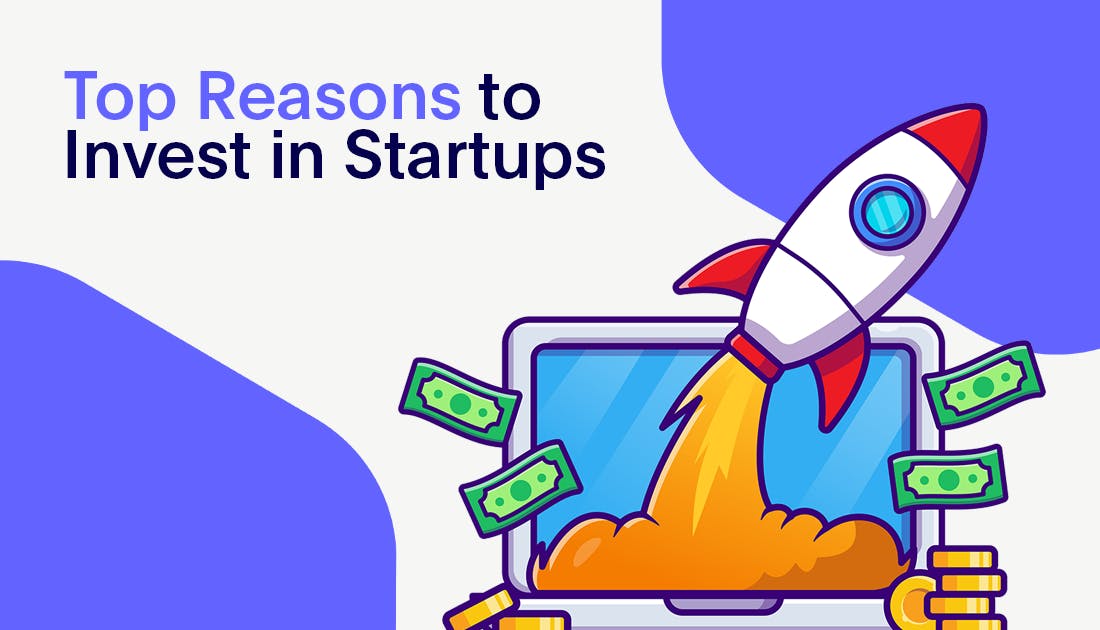
for-investors
Top 5 Reasons To Invest In Startups
Why Invest in Startups? We’ve all heard the statistic that 90% of startups fail with only 50% of businesses making it past their 5th year. So why invest in startups? In reality, despite carrying greater risk, startups have always presented an alluring investment opportunity for both new and seasoned investors alike. Similar to many financial instruments, in exchange for higher risk, they offer the potential of huge returns.
October 8th 2021
.png?ixlib=gatsbyFP&auto=compress%2Cformat&fit=max)
success-stories
Spinifex Brewing Co. Leads Another Record-Breaking Raise
Last month, WA based brewer Spinifex Brewing Co made equity crowdfunding history with Australia’s largest ever craft beer raise, hitting its maximum funding target of $2.0 million in just over two days of being public. This comes off the back of our previous record-breaking craft beer raise with Batch Brewing who raised $1.5 million earlier this year. The raise made regional and national press and television, creating a huge buzz around simultaneous venue and product launches. Spinifex plans to use the funds to support the development of its 24HL Nambeelup Brewery and flagship North Beach Ale House along the pristine WA coast to drive domestic and international growth.
August 5th 2021
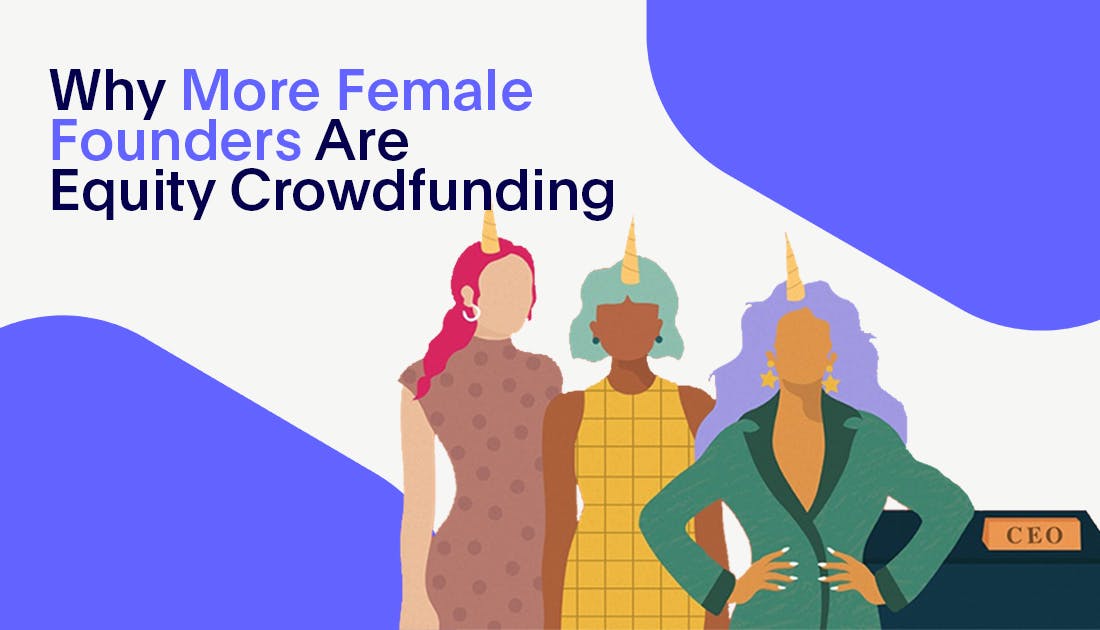
trends-and-insights
Why More Female Founders Are Equity Crowdfunding
There’s been a lot of talk in the Australian media lately about the lack of funding for female founders, with many female-led startups looking at alternative sources of capital and steering away from venture capital firms. In particular, equity crowdfunding has risen in popularity amongst startups run by women, allowing them to raise capital with lower barriers to entry whilst also building a loyal and passionate customer base in the process. The numbers are there to show this, with a significant decline in venture capital investment globally for women-led firms. In fact, women-led businesses in Australia and New Zealand only received 5.3% of the $2.7b in venture capital funding in the first half of this year. Furthermore, just approximately 12% of decision makers at VC companies are women, and most businesses still don't have a single female partner. 12% of decision makers at VC companies are women
July 2nd 2021
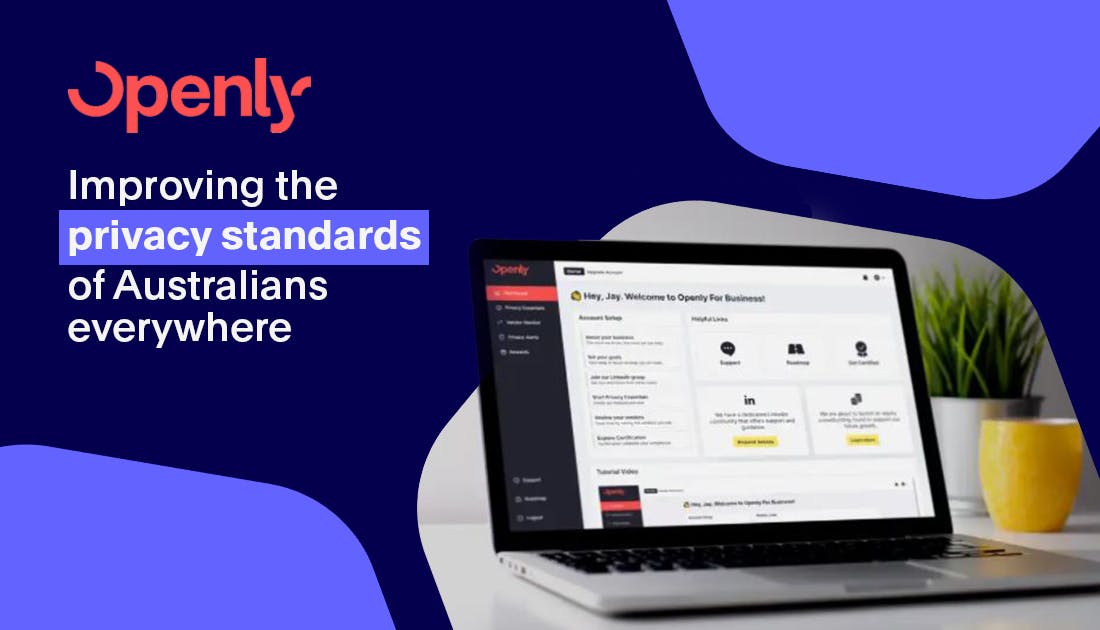
offer-news
Openly - Improving the privacy standards of Australians everywhere
If you store sensitive personal information on your cell phone or internet provider's servers, as many of us do, there is a very good chance that some organisation, government agency or company will have access to that data. Your privacy is no longer a theoretical risk; it's a reality whose impacts you can see and feel. It's time to take action to improve the privacy standards of Australians everywhere. Australian consumers want greater choice and control, stronger privacy protections, and zero friction. The 2020 Australian Community Attitudes to Privacy Survey showed:
June 24th 2021

for-investors
The Complete Guide To Equity Crowdfunding
This is a complete guide to equity crowdfunding. Learn about what it is, the benefits, how to invest and more. Equitise is the leading equity crowdfunding platform giving you the opportunity to invest in Australian startups and early-stage businesses.
June 18th 2021
.png?ixlib=gatsbyFP&auto=compress%2Cformat&fit=max)
trends-and-insights
Top 5 Trends Shaping Fashion Tech Startups
Technology trends are defining the future of how consumer brands interact with their consumers. They provide established fashion brands and emerging startups and entrepreneurs an opportunity to take advantage of new technologies to create unique customer experiences, drive digital engagement, as well as generate additional revenue streams. As one of the biggest industries in the world, it’s surprising to learn that the way fashion operates today hadn’t changed that much in the past few decades until recently. Generating an estimated $1.5 trillion a year, technological innovation in this industry was stalled due to the abundance of low-cost manual labour as a means of reducing pricey production costs. However, nowadays fashion trends are being pushed to the masses faster than ever because of social media, training customers to want instant access to the latest trends. At the same time, younger generations are showing an increased preference for products that are tailored to their specific needs and tastes. This coupled with a more socially conscious consumer base has paved the way for exciting new technologies to disrupt one of the biggest e-commerce sectors. In fact, fashion is the largest e-commerce sector in the world, with a global market value of $759.5 billion in 2021 and expected to hit $1+ trillion by 2025.
June 15th 2021

offer-news
Lumiant - The Future of Financial Advice
The Australian Financial Advice industry is going through significant change. Technology is disrupting the status quo and transforming how financial advice is delivered, and who delivers it. Since 2019, the sector has been shaken by the Royal Commission. Regulatory changes have placed requirements on the industry for true customer-centricity and Best Interest Duty. Where Advisers are required to put the client, not the product, at the centre of advice.
June 9th 2021

offer-news
Here Comes The (Luxury Travel) Boom
Travel fans and adventurers are adjusting to the “new normal”. Folks are beginning to find their way back out onto the open road… even if only for a weekend. They’re making old and new friends, getting out of town for face-to-face socializing and rediscovering their appetite for indulgence. That said,this is still a heavily guarded recovery, and in some parts still socially-distanced. However, as appetite for, and ability to, travel returns, the luxury travel sector is emerging as the most resilient and fastest growing post-pandemic.
June 3rd 2021

for-investors
How to Time the Market
When to buy and when to sell, the two fundamental questions any investor will come across in their investing journey. Timing the market is a problem as old as investing itself, a problem even the most prolific investors, statisticians and researchers have put their minds to. At the end of the day, however, nobody actually knows which way the market will go. There are billion dollar algorithms crunching every data point imaginable, and there are big market makers controlling and influencing prices, yet none actually know with 100% certainty if things are going to go up or down. When it comes to everyday investors, we’re even more disadvantaged than the institutions. There is research you can partake in to improve your odds, but there is no way to accurately predict the future every time! We’ve detailed a few options below to give yourself the best shot. Macroeconomic Factors Macroeconomic factors are broad, economy-wide influences such as GDP, inflation and employment levels. These factors are generally well predicted by government institutions, such as the ABS, and can provide a good indication of where the economy, and thus the markets, are headed. If it’s looking like strong economic growth and smooth sailing, it’s quite likely markets will head in the same direction. However, everything is interrelated and nuanced too. For example, strong economic growth might also cause inflation to rise, requiring central banks to increase interest rates that tend to drive funds out of markets and into bonds. Many smart investors will look for opportunities in crisis, such as at the onset of the pandemic. Those who backed Zoom early were rewarded for this foresight, although so much so that unrelated company Zoom Technologies also saw their share price skyrocket 1800%... The Crowd Another great way to predict the market’s next move is by considering what everyone else thinks. Since markets are just a reflection of the demand and supply of participants, if everyone thinks the market will go up, it probably will! The problem with this approach is how to accurately assess what everyone is thinking. Key press sources such as the Australian Financial Review can provide a good indicator of general mood, but there will always be big money from institutions playing a heavy role in the direction prices go. The weight of opinion is most clearly seen when public figures get involved. With the rise of social media and everyday investors participating in markets, a simple tweet from a figure such as Elon Musk can send a stock to the moon, or crashing down. Other Markets Other markets can provide a fairly empirical source of market prediction. Foreign markets such as the USA’s’ Nasdaq have such a major impact on the global economy that they tend to influence other markets. Most days, the Australian ASX200 will generally go in the same direction as the Nasdaq from the night before. However, this isn’t always the case, especially if there are factors at play that are highly specific to Australia. Playing the Long vs. Short Game Overall, we’re all playing the same game. While short-term movements can be hard to predict, the one thing we can say with near certainty is that the market will go up in the long-run. Through all sorts of peaks and troughs, wars, crises and more, almost every market in a developed economy has gone up over time. Most markets fall between 5% and 10% annually on average, which over a long time horizon equates to quite a bit of compound interest! With this in mind, the best strategy is often not timing the market, but time in the market. The best way to go about this is through dollar cost averaging, which involves investing small amounts at regular intervals over time. So rather than investing $10,000 at once and trying to time the market, you invest $1,000 every month regardless of whether the market is up or down. This allows you to minimise short-term movements and focus on the long-term value of your investment. It’s also a great way to save money! Equity crowdfunding is a longer term investment strategy and less sensitive to the market. Also, by investing in a range of exciting Australian startups, it’s a good way to diversify your portfolio with investment being fee free.
June 3rd 2021

educational-resources
The Stages of a Private Company from Founding to Floating
When speaking about private companies, we often find ourselves using all sorts of industry jargon. To the uninitiated, the financial terminology used when discussing investment opportunities can be confusing and often prohibitive. On top of that, even the most seasoned investors may only have experience limited to one area of finance. Many Australians have at least dabbled in the ASX in some capacity, but very few have been actively involved with early-stage companies. In this article, we go through the full life cycle of a startup, from founding, to hopefully one day floating! Founding A stage most are familiar with but fewer have touched. The founding of a company is the first official stage of an entrepreneur’s journey. Of course, for most, the work would have already started long before the official founding of the company. This might include market validation, research and development, and capital raising. Depending on the company, some founders will need to raise capital before they even get off the ground, such as a technology product a long way from revenue or profit generation. While many are able to bootstrap a business from their own pocket, most founders will need an initial injection of funds to keep the lights on. At this stage, investors will generally have nothing more to invest in beyond the team and the vision. As a result, friends and family are a common source of funds, in addition to angel investors with a keen eye for opportunity. Seed Stage After a young company has gotten off the ground and has started to kick goals, it enters the seed stage of its life cycle. At this point, the company will have made some achievements, and had its fair share of setbacks. It might have an MVP (minimum viable product), a few trial customers, or maybe some pre-orders. Seed rounds are usually when things start to get serious, and the company raises capital in order to execute on all of its preparation and plans. Seed rounds are still considered highly risky, so investors will still be backing a big idea, a strong team, and some early achievements, and will be rewarded by substantial gains should the business make it to the next stage. Capital raised here generally goes towards market entry, final tech development or key hires to help the company grow. Equitise often facilitates wholesale capital raises for companies at the seed stage, and even some equity crowdfunding campaigns where the opportunity is suitable. Growth Stage The growth stage is one of the most exciting times for an early stage company. At this stage, the company has validated its idea, generated some revenue or successfully executed on its initial launch plans. Now it's ready to go full steam ahead with its plans to grow and scale, and can generally attract a wider range of investors now that the opportunity has been derisked sufficiently. Companies in their growth stage will look to spend hard on marketing or in making key hires that can bring some experience to the table in bridging the gap between a startup and a growth company. The company will also have started to make enough noise to attract most institutional investors, like venture capitalists and angels, in addition to presenting an acquisition opportunity for larger incumbents in the market who might be concerned with its progress! Equity crowdfunding through platforms such as Equitise plays its best role at this stage. Series A, B… Many investors would have read about Series A, B, C and onwards rounds in the news for the various private company unicorns in Australia. These letters are simply used to categorise capital raises between seed/growth stages and IPOs. Some companies may only have a Series A round. Others may choose to stay private longer, such as Elon Musk’s SpaceX which is well beyond Series M! These rounds are when private companies begin to raise serious capital from large, institutional investors from within Australia and further abroad. Hiring and development really start to ramp up and valuations continue to climb. Generally, rounds are large enough that multiple investors will be involved often with a lead investor from a venture capital fund or institution. Pre-IPO For the companies that choose to go public, the first step is a pre-IPO raise. Many investors simply assume that when a company is large enough it will list on an exchange, but this is often not the case. Some companies prefer to stay private, and raise their capital off market. There are a number of reasons to do so, and importantly investors can still see a return through dividends, buybacks, acquisitions and off-market transactions. Listing on a stock exchange is a costly process. This means many companies will need to raise simply to afford the fees involved with going public. Often this is called a bridging round, and might involve a smaller raise from existing investors to allow the company to complete the listing transaction. IPO An IPO, or initial public offering, is where a company floats on a stock exchange such as the ASX. This is a costly and time consuming process that rewards the company with a publicly traded status allowing investors to buy and sell their shares with relative ease. Generally, a company will use a broker or investment bank to facilitate the bookbuild, which is the process of securing investors for the IPO round. There are some more complex ways to list on an exchange without raising capital, but most go for the simple route. Once a company is interested in listing publicly, a wide range of new investors generally become interested due to the increased liquidity. This also often represents an exit opportunity for the very early stage investors. One important consideration is that companies listing on the ASX need at least 300 shareholders. Even more is often recommended, which will allow for healthy trading upon listing rather than having just a few large shareholders. Equitise plays a valuable role in this space, facilitating what is known as ‘retail spread’. Since we have a large database of investors, brokers will often enlist our help to close out an IPO round with a few hundred investors, allowing the company to meet its listing requirements. These companies often have plenty of capital available to them, but simply need a range of investors on the register. Equitise is able to use technology to do so in a far more efficient way than traditional retail brokers. Equitise offers a range of early stage investment opportunities, including equity crowdfunding, wholesale and IPO! The companies we work with for equity crowdfunding are generally doing their Seed, Series A, B and C rounds and can go all the way through to IPO’ing with us. Learn more here.
June 3rd 2021

for-companies
Should I Use Debt or Equity for Growth Capital?
The choice between debt or equity is an age-old question for companies looking to grow. Both represent forms of capital, which can in turn provide the funding required for a company to execute on its growth plans. The choice between debt and equity funding can however make a significant difference to eventual business outcomes. As such, it’s imperative that the company chooses the best path forward. What’s the Difference? The most basic form of debt is a loan, where one person, or entity, lends money to another. Attached to this loan are terms, including a principal, interest and maturity date. The principal is the original amount that was borrowed, the interest rate is the percentage of that amount that needs to be paid each period, and the maturity date is when the principal needs to be repaid. There are an infinite number of variations on how a debt instrument is structured, but almost all of us will touch debt in one form or another, such as a credit card, mortgage, or bank loan. Equity in its simplest form represents ownership in a company. When you buy shares in Telstra on the ASX, you are buying part of the company’s equity. Companies can raise funds by issuing new shares, or selling existing shares, in exchange for cash or other consideration. When an investor buys equity, they are entitled to a number of rights alongside other shareholders, such as a share of profit distributions, voting rights and more. They can also sell their shares at a later date for a capital gain if the value of the company increases. The key difference between debt and equity is that a company must repay its debt at the maturity date. On the other hand, funds raised through selling shares is the company’s to keep. For larger, more mature companies, debt generally far outweighs equity in terms of benefits. This is partly known as the debt tax shield benefit where leveraging through debt can allow a company to enjoy additional tax benefits alongside company growth. Furthermore, larger more stable companies are able to take on more debt and better rates, since banks can be more assured of their ability to pay back any loans. Large companies will still raise capital through equity, especially during difficult periods or when a large amount of funding is required. In this article, we’ll focus on the choice for earlier stage companies. Why Debt? Debt often has a taboo surrounding it given all the horror stories. There is definitely a level of risk attached to debt, but equally the benefits of leverage to accelerate growth are large. The main consideration with debt is if the company is in a suitable position. Some businesses are lucky to have shareholders or directors who can make interest-free loans, meaning the company can take its time to pay them back until it's in a position to do so. For others though, the range of debt available to early stage businesses is limited. Most banks will steer away unless the debt can be secured by an asset such as a piece of machinery or land. Some will also let the debt be secured against the wealth of a director, but this presents potential downside should the company fail to meet its objectives. At an early stage, many debt providers will also require strict terms with high interest rates that can derail a business when things don’t go exactly as planned. For businesses that are pre-revenue or pre-profit, debt is generally extremely risky and can upend not only the company, but people’s livelihoods. As a general principle, only borrow what you are certain you can repay, even if things don’t go to plan. If there’s one certainty in the start-up world, it’s that things never turn out exactly how you think they will! Why Equity? Many founders stray away from equity financing because it means giving part of your business away. Be that as it may, a smaller slice of a large pie is worth a lot more than a large slice of no pie! For most early stage ventures, equity financing is the only viable option until the business has reached a level of stability and profitability. The other key benefit of equity is that you don’t need to pay it back, or pay interest, meaning you are free to use the cash to grow aggressively without worrying about an impending due date. Bringing on shareholders can also have its benefits, such as strategic investors who can help steer the business in the right direction, or an army of brand advocates that can be achieved through equity crowdfunding with Equitise. An important consideration is not raising more than you need at any given point, as this would mean giving away more equity than necessary, which can reduce your control and stake in the business down the line. There are also other types of funding instruments out there. Hybrid securities, such as convertible notes, are a combination of debt and equity that can be particularly useful for certain companies in certain situations. Equitise facilitates raises for alternative instruments through our wholesale offers, but we can only raise via ordinary shares for equity crowdfunding opportunities.
June 3rd 2021

for-investors
Why Don’t Companies Use Venture Capital Instead?
We are often asked why a company would choose to use equity crowdfunding or wholesale capital raising instead of venture capital. There are a variety of reasons for this, which we discuss below. Notably, the answer, at Equitise at least, will never be because they weren’t good enough for venture capital. We prefer to raise for companies that have chosen not to go down the traditional path of VC investment for specific reasons. Awareness & Advocacy The most common reason a company will choose equity crowdfunding over VC investment is the benefits of awareness and advocacy. For certain companies, the benefits of raising $1 million from 500 investors far outweigh raising $1 million from one investor, even if that one investor is a venture capitalist with strong experience and connections. Of course, some companies benefit more from the latter, but those that derive value from a large community of supporters can use equity crowdfunding to their benefit. The investors gained through equity crowdfunding can provide strong ongoing value beyond their initial investment. They act as marketing advocates for the company, themselves often becoming customers and promoting the business to their own network. These investors also provide a great sounding board for feedback on where the company is, and how it should grow. On top of that, many of these investors are still well-connected investors or business individuals who can provide the traditional benefits a VC investor might. Business Control A common issue with VC is the desire to take some form of control in the business. This will often mean voting control or veto rights to ensure the business is partially controlled by the VC investor. While some founders prefer to have this controlling influence from an experienced and talented investor, there are plenty of horror stories of losing control over a company’s direction because of ulterior motives. By raising capital through equity crowdfunding or wholesale raising on Equitise, founders can rest assured that they will remain in charge of the company’s overall direction. When making decisions they don’t need to worry about arbitrary red tape or competing perspectives. When you have multiple smaller investors rather than one large investor, company control is not threatened by an individual with significant voting power. Industry Alignment Some VC funds have highly specific target industries and company stages for their investments, meaning many early stage companies simply don’t align with VC preferences. Particularly in Australia where there is limited VC funding around, many companies will simply never be a fit for VC investment, no matter how impressive they may be. Allow Customers to Benefit Companies often work with us because they want their customers and followers to join them on the journey. If anyone should benefit from the company’s success it’s those who supported them in the first place by buying the product or engaging with the business in the very early days. Many founders want to give back to their community of loyal supporters, and equity crowdfunding allows them to share in any success. The beauty of equity crowdfunding is that any industry can raise capital if there’s enough interest from the crowd and the offer hits our quality standards. We’ve raised funds for fintechs, medtechs, retail, food products, breweries and more. Of course, there are certain industries and types of businesses which have performed strongly in equity crowdfunding to date (such as B2C products, breweries and fintechs) but we analyse every opportunity on its own merits in terms of quality and suitability to our platform. All of this isn’t to say that equity crowdfunding and VC can’t coexist. We’ll often raise capital in conjunction with a VC fund that may be leading or cornerstoning a round. Furthermore, VC funds can also invest in an equity crowdfunding deal or wholesale offer alongside retail and sophisticated investors. Equitise does not exist to disrupt venture capital, but rather gives founders a much needed alternative for raising capital and investors the opportunity to get involved in early stage businesses. 9/10 startups will fail and a major reason is a lack of funding. This flows on to mean less jobs and less innovation for Australia as a whole.
May 25th 2021

offer-news
How to Survive Any Crypto Crash
The Rise and Fall of Crypto Cryptocurrency isn’t for the faint of heart, and if you are invested in it, be prepared for the rollercoaster ride of a lifetime. The true volatility of cryptocurrency has come to light in these recent weeks with more than 50% of Bitcoin’s value being wiped after fears that China would be cracking down hard on bitcoin operations. On the other end of the spectrum, a recent tweet from Elon Musk saw Bitcoin shoot up 17.12 per cent over 24 hours after he spoke to some “North American Bitcoin miners” about where their energy came from.
April 9th 2021
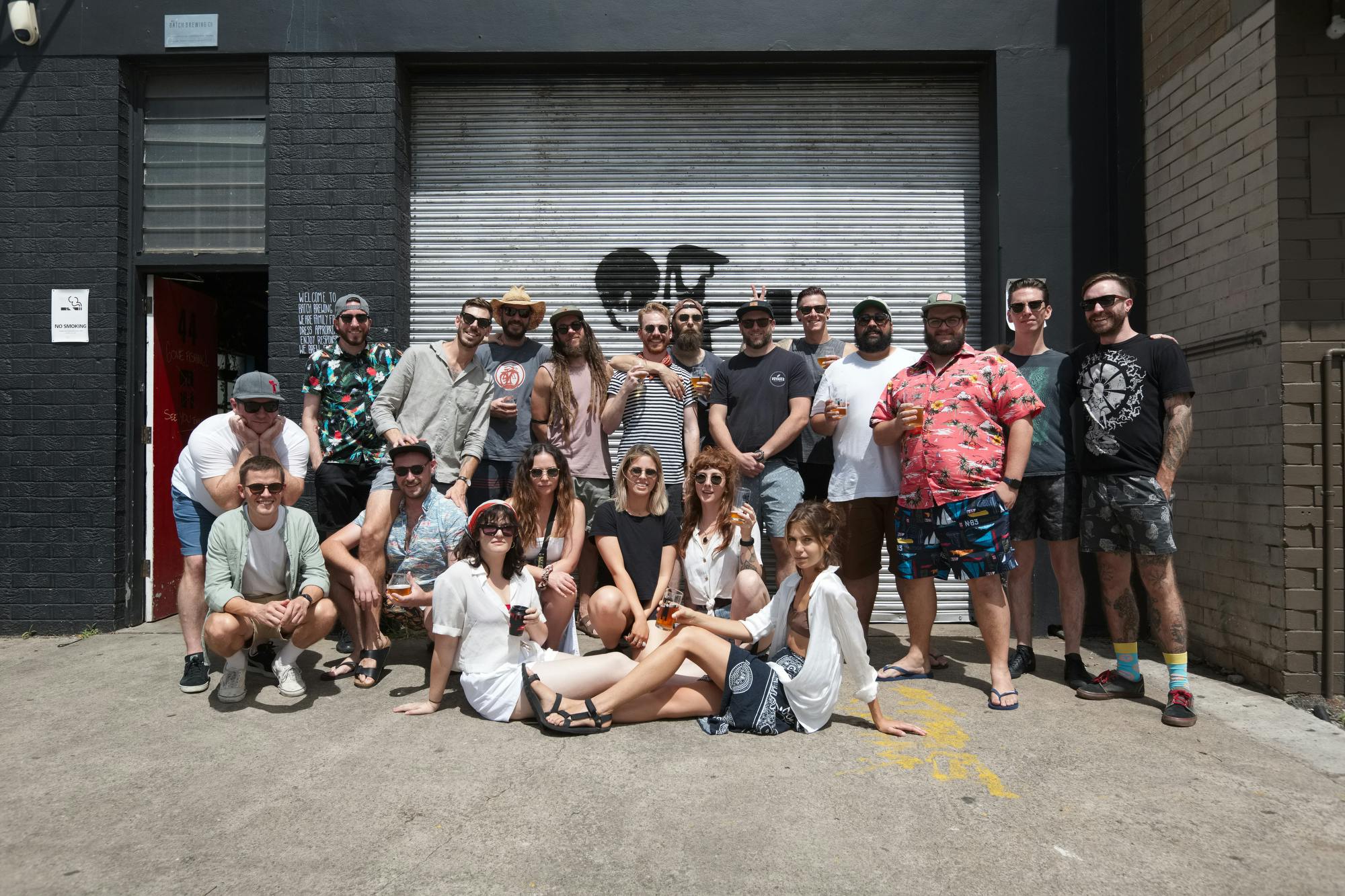
success-stories
Craft Brewery Batch Breaks Several Equity Crowdfunding Records
Batch's equity crowdfunding campaign hit its maximum funding target of $1.5 million in just over a day after its public launch. Along with this came several equity crowdfunding records, including being the largest and fastest alcohol raise in Australia. This surpasses our own raise for The West Winds Gin back in 2018 which successfully closed after raising $932,000. Batch plans to use the funds raised to initiate its two-phase growth strategy, involving expansion through a unique hub and spoke model across NSW before looking further across the country.
March 19th 2021
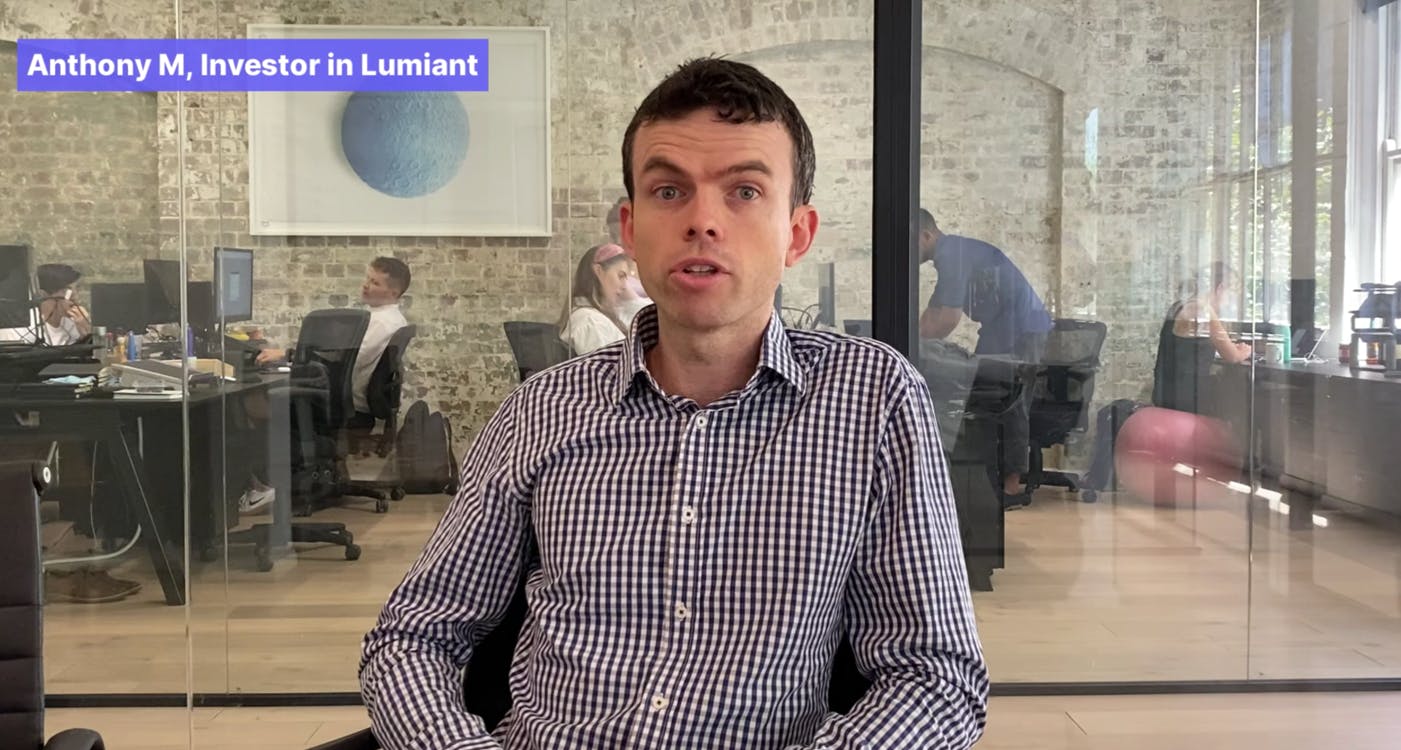
testimonials
Investor Testimonial - Lumiant
Anthony M invested in Lumiant - a disruptor in the Financial Advice industry who developed a platform that transformed the traditional financial advice process, driving better outcomes for advisers and their clients. As a regular investor in equity crowdfunding and Equitise, Anthony talks about his experience with equity crowdfunding. Lumiant raised $1,167,474 in just over a month, which was over 4x their minimum funding target.
March 17th 2021
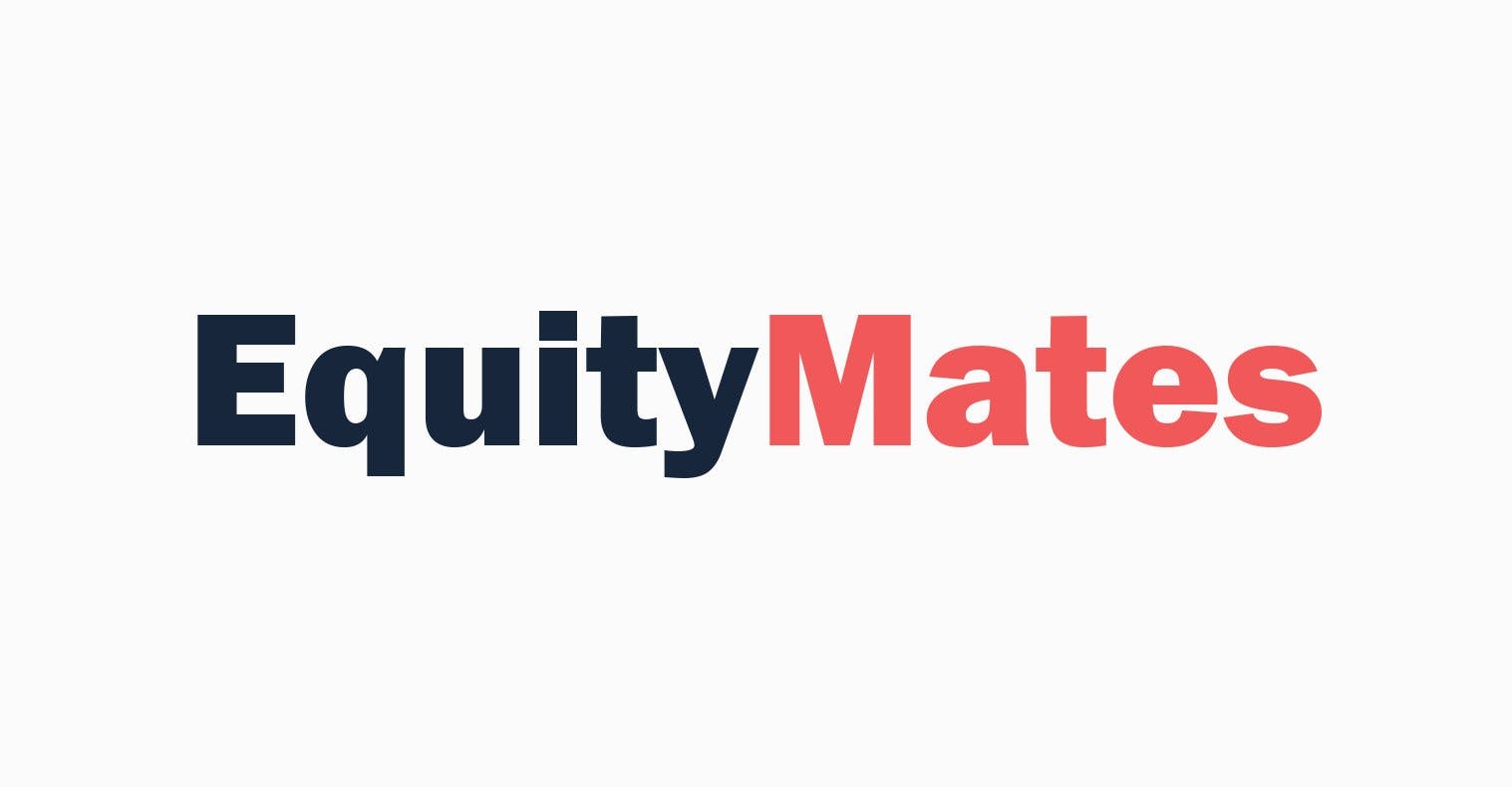
trends-and-insights
Equitise Founder Jonny Wilkinson Chats to Equity Mates Podcast
Back in 2019, our founder Jonny Wilkinson sat down with the Equity Mates Investing Podcast to discuss investing, venture capital and how Equitise fits in. Since then, Equity Mates have enjoyed roaring success, particularly fuelled by growing retail investment amongst younger investors throughout the pandemic (not to mention high-quality content!). We thought we'd revisit the chat they had with Jonny where they discussed: What is Equitise and what is equity crowdfunding Why a business would choose to crowdfund over debt or venture capital How to buy into a company through Equitise The Pro's and con's of crowdfunding The major success stories that have come through Equitise The current state of the Australian VC market Plus much more! Taken from the podcast summary: "We love investing in companies at Equity Mates, and normally this is done through the public markets and stock exchanges. However, there is a whole other world of private markets that retail investors, like us, rarely get access to. It's in these markets, for example, that you get to invest in innovative, early-stage companies before they potentially exit with IPO. The good news is that there are businesses set up to make the private markets accessible to the retail investor. One of the businesses is Equitise. In this episode, we chat with the Co-founder and Director of Equitise, Jonny Wilkinson. Equitise is an equity crowdfunding platform, allowing Australian and New Zealanders to invest in early-stage companies in return for equity. It has the potential to be an exciting addition to your investment portfolio!" You can listen below:
March 16th 2021
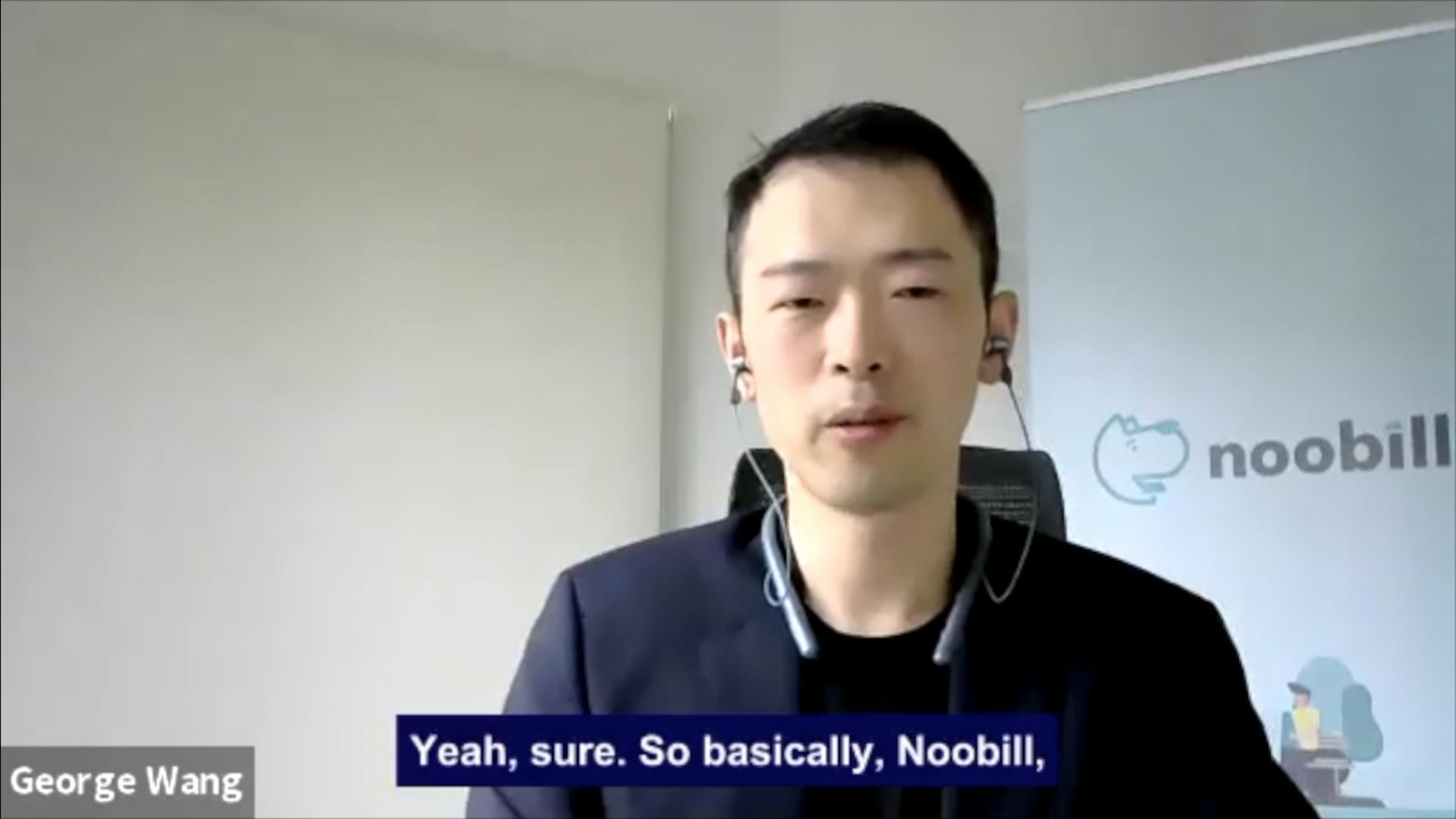
testimonials
Founder Testimonial - noobill
George Wang, founder of noobill, talks about his platform and his experience with equity crowdfunding and Equitise. Noobill is an Australian fintech that is empowering people by allowing them to take control of their household finances through their AI powered smart account platform. This platform allows for price-comparison, management and payment of all essential services within the one mobile app. Noobill raised $391,000 over a 20-day campaign, which was nearly 4x their minimum funding target.
March 12th 2021
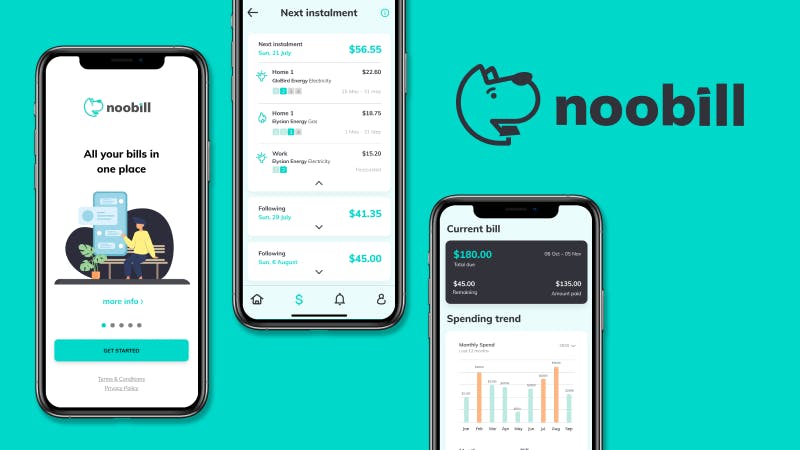
success-stories
AI-Powered Utilities Fintech noobill Raises Over 3x Its Target
It’s no surprise that noobill has just closed out a successful raise well above their minimum. After impressive beta phase validation, the AI-powered smart account platform is ready to use the $391,000 raised towards launch and rapid scale. noobill raced past its minimum in a relatively short equity crowdfunding campaign to kick off 2021 as the first successful Australian offer.
March 8th 2021

for-companies
4 Things To Do Right Now Before Expanding Your Business
Are you ready to take your self-owned business to the next level? Expanding your organisation could mean more customers, more money, more responsibility. It’s an exciting time, and there are plenty of things to think about. Let’s take a look at some of the things you’ll need to consider as you expand your operation: 1. Set up a web presence Having a website is the number-one way to get information about your business in front of potential customers. Ninety-three percent of online experiences begin with someone inputting terms into a search engine, and if you have your content game on point and have the right keywords on your site, your business is more likely to appear on the first page of a Google search. Set up a website with these things in mind, so you can help potential customers see the value in the goods and services you offer. For an engaging and functional website, consider hiring a freelance web designer for the job. You can find qualified web professionals though online job boards, and you can easily filter by budget and job delivery time. 2. Form a business entity When expanding your business, you should consider forming a business entity, which basically sets up your company legally. First, you’ll need to ensure that the name you choose for your entity is not already in use. Second, you should familiarise yourself with the different kinds of business structures and their benefits: companies, partnerships, sole traders, and trusts are the major players in this space. Before filing to form your business structure, no matter which you choose, become knowledgeable with the requirements and filing fees. 3. Don’t forget marketing and networking! If you’re expanding your business financially, you’re going to need more customers. Having (or not) a savvy marketing strategy can make or break an organisation. Creating a website is the first step, but a competent marketing plan has many layers, including a website, social media, local ads, and even events. Create a plan that identifies your target market, a plan for social media sites like Twitter and Instagram, and concrete business goals beyond “make more money.” When writing your marketing plan, don’t forget to include how you will collect the data for this and what metrics you will be using. Being able to look at data and parse potential success is a critical part of creating a marketing strategy. 4. Ask for help One of the key things you should remember when creating your business expansion strategy is: Don’t be afraid to ask for help! Consulting a strategic business coach or advisor is a great way to improve your business’s chances of success. A business coach will learn your business inside and out and will be able to tailor their recommendations based specifically on your company. What’s more, they will help you make your business goals (the ones you made in the previous step) a reality because they know how to get it done. They can help you better define those goals, as well. Get moving! Once you consider all of the above, you just might be ready to take the next step and begin expanding your business. You’ve dotted your I’s and you’ve crossed your T’s — now it’s time to get moving on up. Need to raise capital for your business? Partner with Equitise to build a campaign and raise funds fast so you can achieve your business goals!
February 26th 2021

success-stories
Financial Advice Disruptor Lumiant Raises Over $1m on Equitise
In our last equity crowdfund of 2020, Lumiant finished the year in a strong fashion, raising A$1,167,474 in just over one month. 264 investors joined Lumiant in its mission to transform the financial advice industry, investing an average of $4,422.25 - more than 3x the overall average investment. With over 4x the minimum target raised, Lumiant is well-positioned to execute its go-to-market strategy and scale.
January 15th 2021
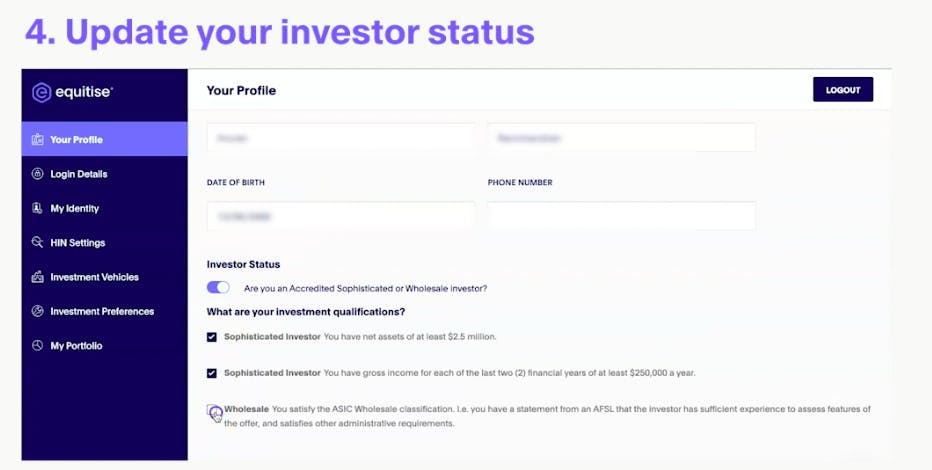
for-investors
Video: How to Verify Your Accredited Investor Status
How to Verify Your Investor Status
January 15th 2021
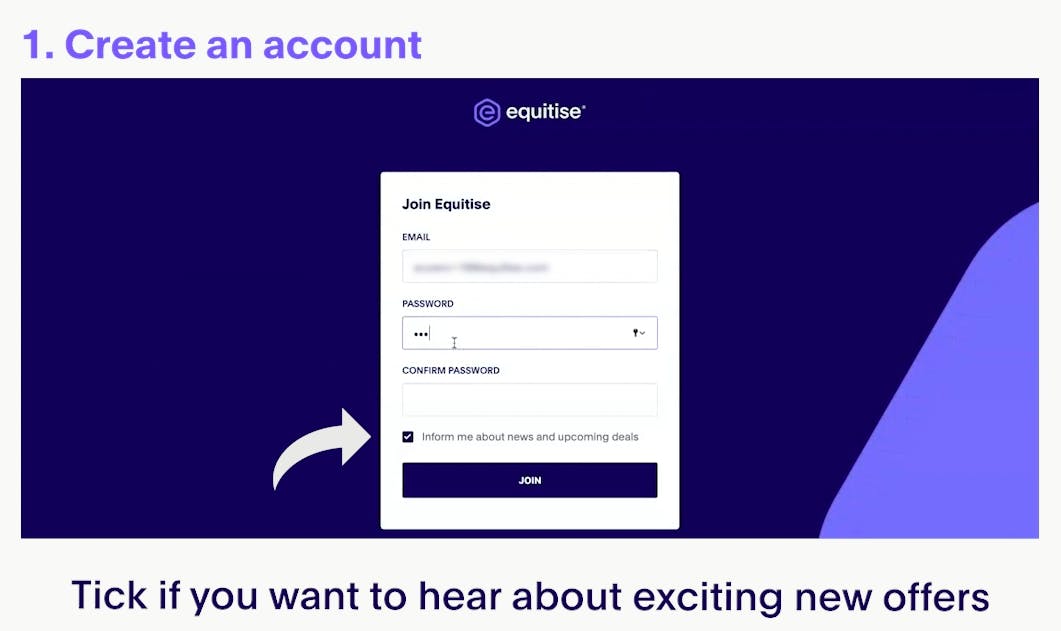
for-investors
Get Ready to Invest: How to Sign Up & Verify Your Identity
Signing up to Equitise means you'll be all ready to invest when the right opportunity comes along. You also have the option to sign up to our newsletters which means you'll be kept up to date on new and exciting investment opportunities every few weeks.
January 15th 2021
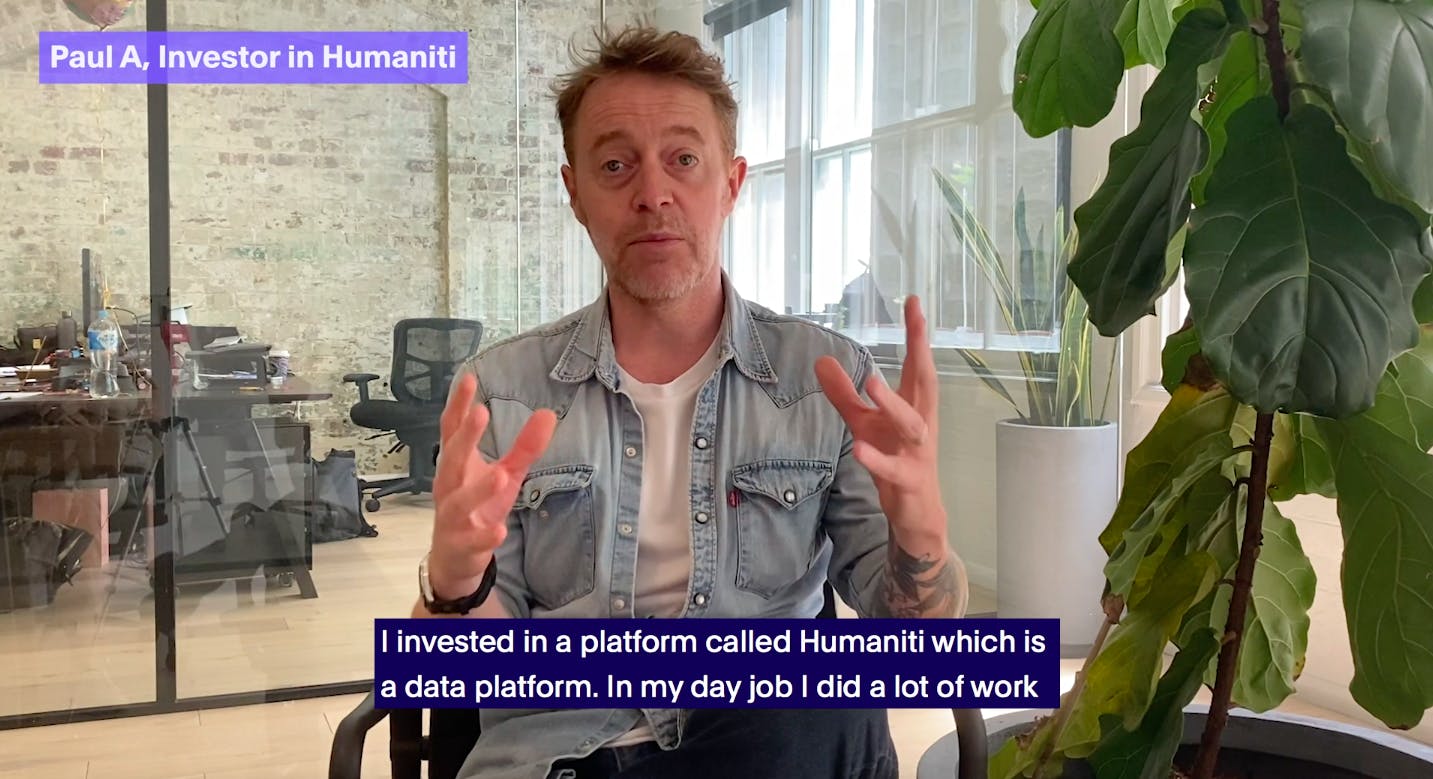
testimonials
Investor Testimonial - Humaniti
Paul A invested in Humaniti - a disruptive fintech offering consumer insights from data and marketing research like never before. As a first time investor on Equitise, Paul talks about his experience. Humaniti raised $429,800 in the middle of 2020 despite COVID-19 which was well above its minimum fundraising target of $200,000.
December 21st 2020
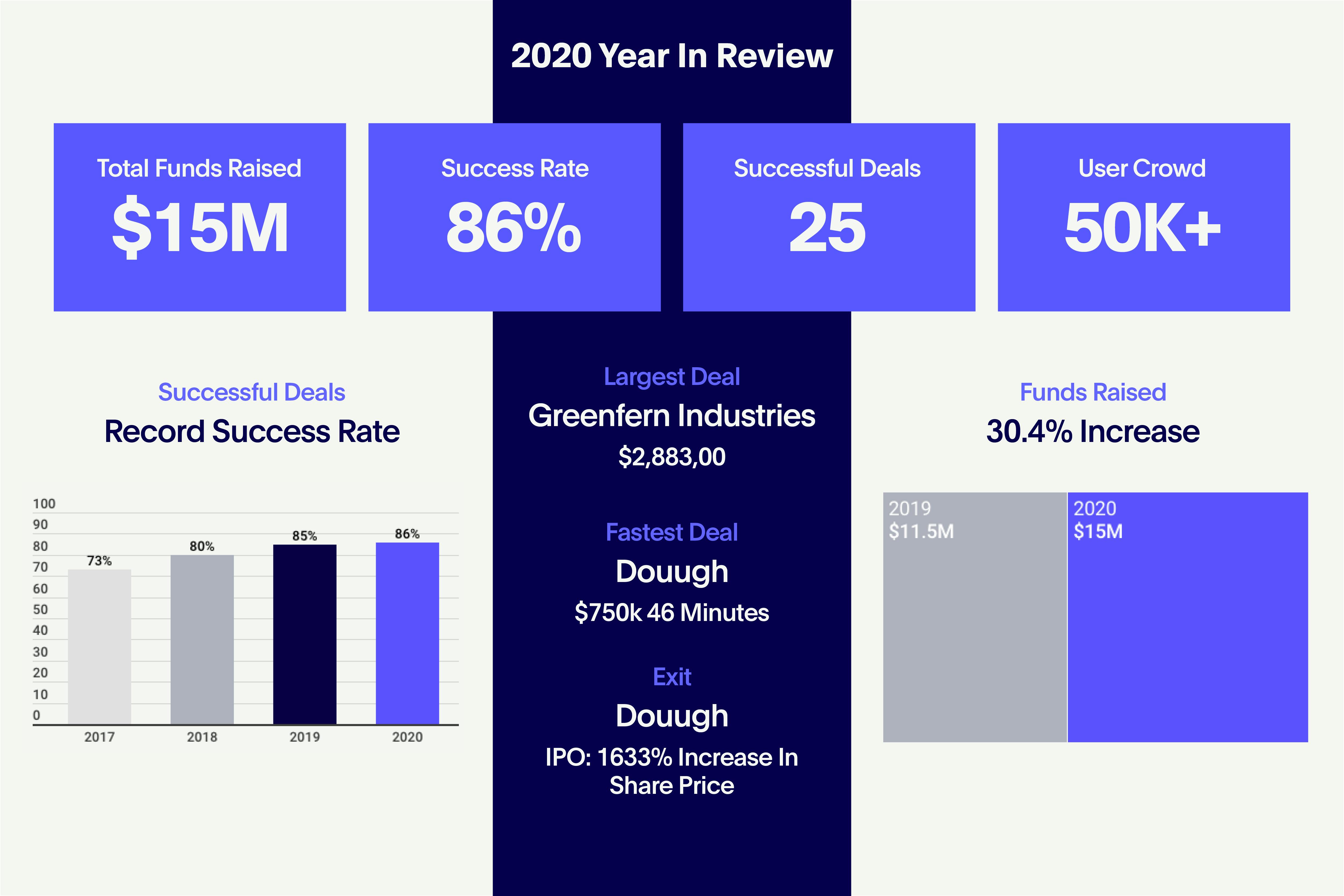
trends-and-insights
Equitise 2020 Year in Review
2020 is finally coming to a close and we’re thankful that we, and all the companies we've partnered with, have more than weathered the storm. We came into this year with a very optimistic outlook, looking to really ramp up our growth and help more companies than ever before raise the capital they need. As a nation, we were first met with what’s being called the Black Summer. And then the largest global pandemic in recent history, which thrust our country, and economy, into lockdown, bringing pretty much all investment to a halt. Offers were put on hold indefinitely as businesses went into survival mode. We even went our longest period on record without an equity crowdfund. As a relatively young company, we consider ourselves lucky to have emerged from the lockdown with our full team intact. And yet despite everything that happened, there were still a lot of highlights to take from this year. We managed to increase our offer volume from 2019 (including a record NZ equity crowdfund) raising the most we ever have, launched our new branding and platform, saw some crazy returns for investors (looking at you Douugh) and have fortunately returned to our office. Our portfolio companies continued to kick goals, with some emerging even stronger than before. We welcomed a bunch of new team members too, including Hayden and Jack on the offers team, and Esther and Ryan on the tech team. Intern turned part-time deals team member, Nick, is also making the jump to full-time in the new year. We’re more excited than ever for what’s to come in 2021, and can’t wait to bring you even more highly vetted investment opportunities so you can support the companies you love. Read on for a full breakdown of our 2020.
November 30th 2020

success-stories
Greenfern Breaks Equitise NZ Crowdfunding Record
After a blockbuster campaign, New Zealand based Greenfern Industries has raised a whopping NZ$2,883,000 through Equitise, smashing the record for our highest ever New Zealand equity crowdfunding campaign. The offer actually hit the retail investment limit of NZ$2,000,00 for New Zealand, with the remaining NZ$883,000 coming from wholesale investors. Over 1,000 investors got behind the innovative company, backing its mission to produce sustainable products that genuinely improve the lives of its customers.
November 27th 2020
.png?ixlib=gatsbyFP&auto=compress%2Cformat&fit=max)
success-stories
Goodments Becomes a Certified B Corp
One of our past equity crowdfunding companies, Goodments, has some exciting updates from its journey to make the world a better place! Goodments is a share investing platform with a focus on investing for the social good. The application allows investors to easily screen opportunities based on their positive impact on the world across a range of indicators such as the environment and human rights. It also allows investors to easily access global shares and ETFs focused on sustainability, with super low brokerage fees starting at just $3 per trade. Over the last few years, Goodments has been on a journey to deliver an experience that changes how people think about investing. Empowering individuals from every skill level to invest to make money and do good. Goodments successfully raised capital twice with Equitise, first in a wholesale round of $80,000, and then through an equity crowdfunding campaign of $239,000. The company was able to use this funding to help continue to develop its product and reach a wider investor audience. B Corp Certification This month, Goodments was proud to announce that it became a certified B Corporation! B Corp certification is awarded to select companies with a business model that balances success and doing good. B Corps are rigorously screened on a number of key criteria that reflect their commitment to making the world a better place. Goodments’ inclusion on this list is a testament to the team’s positive impact on the world, through their own actions and through their investors’ choices. The B Corp movement is huge internationally, only gaining momentum in Australia within the last few years. Well known international companies like Patagonia, Ben & Jerry’s and Allbirds are B Corps and part of a new breed of companies who share the desire to reduce inequality, lower the levels of poverty, create a healthier environment, and build stronger communities. Some notable Australian B Corps include KeepCup, Koala and Stone & Wood. Goodments was built with positive impact in mind, from the outset. The company is making it easy for everyday people to access impactful investment opportunities, and avoid those that are involved in undesirable areas through its filtering capabilities. The company will use its B Corp certification to remain on track with its impact commitments, and to hold itself to an even higher standard. Certified B Corps have a legal requirement to continue to meet the rigorous standards imposed by the organisation that span across all aspects of the business, from its workers and suppliers, to its customers and environmental outcomes. And Goodments isn’t done there - the company has more plans to continue to improve the world around it, so stay tuned for any exciting developments to come.
November 24th 2020

success-stories
2.5x Growth During COVID-19 for Revl - an Equitise Wholesale Raise
It’s been a rough year for most companies, with everyone affected by this pandemic in one way or another. Some companies have ridden the storm better than others, however, with the best being able to pivot their focus and position themselves even better for the future. One of our past wholesale raises, Revl, has done just that. Revl raised $150,250 from a few wholesale investors back in 2017, and has since used those funds to further develop its technology and offering. Revl makes video camera technology for experience companies such as rollercoasters, ziplines and skydiving. The cameras and their AI software allow operators to easily capture and provide video experiences to their customers, creating additional revenue streams and value. Based on the revenue Revl can generate for ride operators, it presents a very attractive proposition to strengthen existing offerings. The company generates revenue through the set-up and ongoing operation of video solutions, meaning that during the COVID-19 shutdowns across the globe, its revenue dropped to zero. However, having finalised its series A and after securing a $264,000 grant, Revl was able to ride the storm and focus its efforts on RnD. The most notable development was the completion of its Flow 2.0 system that combines Bluetooth beacon technology, radio-frequency identifications (RFIDs) and a self-checkout kiosk – lowering the cost of the entire Revl X system by 50%. These technologies have combined to create a magical experience for end customers whilst easing the strain placed on ride operators by efficiently managing a high-throughput system that can timely process and sell thousands of videos per ride per day. These developments alongside strong underlying management have accelerated Revl’s 2020 growth predictions. With sales and deployments rising quickly and its current pipeline worth $3.5m in annual recurring revenue (ARR), Revl could see 2-2.5x growth for the year, despite the pandemic. Revl also expects to be profitable in Q4 2020 – Q1 2021 having recorded over 85% profitability margins on its recent video sales in coasters and ziplines, and even higher in its driving experiences. In fact, in September, three of Revl’s coaster/zipline rides each generated over $245,000 in video sales for their customers in Zip world. Revl is able to generate $150,000-200,000 ARR per coaster – placing the company 8 coaster installations away from profitability. With experiences around the world reopening and the pandemic coming to an end soon (fingers crossed!), Revl is looking to continue going from win to win. Having focused on long-term initiatives and strengthened the underlying business throughout the pandemic period, Revl is now primed to scale and rapidly expand its innovative offering around the world. You can visit Revl's website here.
November 23rd 2020

offer-news
How Lumiant Uses Technology to Deliver More Comprehensive Financial Advice
The following article was written by CEO of Lumiant, Santiago Burridge. Lumiant is currently live on the Equitise platform - click here to view the offer. The need to personalise while you digitise has increased ten-fold in 2020 as COVID-19 continues to change the way we interact with each other on a professional and personal level. The financial advice sector is no exception. The fallout from the Hayne Royal Commission has put significant pressure on advisers to improve the advice experience for consumers. The financial advice industry seems to be the last frontier when it comes to integrating technology. The process to date has been anchored in product with no evidence to back up the proposition that an adviser can pick the next winning investment. There has never been a better time to re-think the way that financial advice is offered and delivered. Despite the challenges wrought by a once-in-100-year pandemic, the latest EY Fintech Australia Census shows that the Australian fintech industry is sustaining its revenue base, with more paying customers and plans for future global expansion. In fact, this moment of crisis is driving a step-change in digital adoption and has adapted quickly to grasp new opportunities, with the consumer digital payments and transactions sector in particular seeing a huge uptick. Here at Lumiant, we are seeing structural change taking place in our industry that is ensuring clients of financial advisers not only comprehend the advice they are receiving, but engage with it. We believe that financial advisers have a great passion for the client, but until now have had their technology solutions anchor the conversation to product. We believe there is a sizeable gap in the current suite of financial planning solutions on the market, preventing advisers from being able to offer a deeply personalised and individualised experience at scale. And so, we are responding to that gap with a new technology solution. In the past, tech innovation in the wealth management industry has largely focused on meeting compliance and regulatory requirements, on middle to back-office efficiency and Statement of Advice generation. And while these facets are certainly crucial, there is still ample scope to evolve the financial advice process to include the client's personal life circumstances and goals, so they can truly plan for their own future and track their plans over time. What we’ve built does not centre around the Statement of Advice (incidentally, the most meaningless piece of advice for the consumer), but around uncovering the client’s relationship with and to money, their values, their goals -- what living their “best life” means to them. A dynamic planning process that brings to life what really matters, enabling a continuous advice process not a static six-monthly or annual meeting antiquated structure. Advisers can connect their financial strategies to the things that matter most to their clients. And the solution we’ve built makes it seamless and easy to do so. With the right tech, advisers can provide clients with a more engaging investment experience - one that goes far beyond the common offering of managed funds or core/satellite approach and still delivers a huge reduction in administration and time. Because what is often missing (or rather perceived to be missing) from the financial sector is the heart, the raison de rigueur underpinning the need for financial security. As the husband in a couple who recently went through the Lumiant process with their Adviser, said: “I think it was a magnificent process… I wanted my wife to get more out of life for herself, to be more rewarded with some of the things that she deserves. I don't think our [Financial Adviser] can be their best without doing that. Because unless they know everything there is to know about our lives, it would be an arduous task to mould our financial situation and help our decisions moving forward without understanding exactly what we're about as a couple”. Our platform offers just that: a way to uncover through a series of modules and via a human-centred design process, the ‘things’ that truly matter to people and how most money ‘things’ are actually life ‘things’. Globally, every industry and business is on the cusp of a generational change. The pandemic has only forced what was already happening: the unravelling of the one-size-fits-all service and the ushering in of a more personalised approach not just to advice, but to everything. But we can’t ask financial advisers to find a way to connect the numbers and decimal points to the desires and lives of their clients, without equipping them with the right solutions to do so. That’s where we’re aiming to help. (Lumiant’s interactive client engagement platform for advisers and their clients goes live in early 2021).
October 19th 2020

success-stories
Douugh IPO Investors See 1633% Return on ASX Listing
Douugh's Successful IPO After an oversubscribed IPO round that closed in just a matter of hours, fintech startup Douugh listed on the ASX (asx: "dou") on Tuesday 6 October 2020 and has rewarded early investors with a return of up to 1633% if they managed to sell at its high. Hitting an intra-day high of $0.49 per share on Friday 16 October, Douugh’s share price increased by 16x after just 10 days. Over 2,500 people had registered their interest on Equitise to participate in the IPO, purchasing shares at just $0.03. Before its September IPO, Douugh had also run a wholesale raise on Equitise in 2019 rewarding those earlier backers as well. The stock is currently trading at 30 cents a share, reflecting a 10x return for those still holding. There's no denying that, especially in the wake of the Royal Commission, the neobank sector has been hot in the investment community. We've completed three raises for the first-cab-off-the rank Xinja - breaking equity crowdfunding records as investors line up to own a piece of the pie. This excitement around the disruption of the traditional banking industry is most likely a major reason for Douugh's listing success. However, Douugh Founder, Andy Taylor, explains in a recent article with Business Insider that it might be more than that. Another reason for the skyrocketing share price could be that Douugh's taken a different route to other neobanks, partnering with local banks and skipping the lengthy process of obtaining banking licenses and the need to dive into lending on the mortgage side. Taylor sees the opportunity, instead, in taking advantage of Australia’s new open banking regime and artificial intelligence (AI) to help customers. “It has always been about asking how can we help people better manage their money and live financially healthier,” he said. “We’ll input all this data, train up the AI system to make your money work for you.” “We have built that underlying platform and the next stage of that is for us to introduce wealth management into that and invest that money for you. And that’s what’s coming in the next six months.” What is Douugh? Douugh is an Australian purpose-led fintech startup, taking a proprietary artificial intelligence (AI) first approach to disrupting the business model of banking, helping customers live financially healthier. It operates a subscription-based financial wellness platform, which helps customers spend wisely, save more and build wealth via a smart bank account and Mastercard debit card. Douugh is not a licenced bank, therefore it is not forced into operating a traditional balance sheet model which is typically reliant on competing on price through the offering of traditional deposit and lending products such as credit cards, personal loans and mortgages. Instead, the company operates as a software and services business, charging end consumers fixed and variable fees. Just a handful of wholesale investors were able to get in early for Douugh’s private round in 2019, where the company raised $130,000. This year, our limited IPO allocation of $750K filled in just a few hours with 75 lucky investors getting in early, reflecting the high demand to back this Aussie fintech trying to change the way we bank. At Equitise, we’ve been fans of Douugh’s innovation for a number of years now. Led by Andy Taylor (Co-Founder of SocietyOne), Douugh is an exciting fintech prospect with a bright future ahead. With the funds raised from its IPO, Douugh is continuing to develop its market-leading technology with an intended US launch in the near future. If the first few days of trading are anything to go by, the company is certainly one to watch. Don't miss out on opportunities like Douugh. You can view live equity crowdfunding campaigns here.
October 19th 2020

success-stories
Humaniti Raises 215% of its Minimum Target
Humaniti recently closed a successful equity crowdfunding campaign during a difficult time of the year, raising $429,800, well above its minimum fundraising target of $200,000, reflecting 215% in overfunding. These funds will go towards scaling the business to a wider audience to rapidly grow the platform. With its technology already heavily invested in, the company is perfectly positioned to grow and expand. Ben Dixon, CEO of Humaniti, said, ‘’Humaniti is disrupting the consumer data and marketing research industries by offering what we refer to as the ‘holy grail’ of consumer insight - the ‘what’ and the ‘why’ all seamlessly connected on one platform. Alongside this, we give everyday Australians the tools to budget better and the opportunity to earn extra cash.’’ He continued, ‘’We’re called Humaniti because we provide benefit to individuals, companies and the wider community (via our charitable donations). Undertaking an equity crowdfund is just an extension of this as we wanted to give our members the opportunity to share in our success.’’
October 19th 2020

success-stories
Botanic Wellness Raises Over $400K Prior to Planned IPO
Botanic Wellness launched a very quick campaign through Equitise, with an intended IPO planned for November 2020. Despite only 18 days to complete the raise, the company smashed through its minimum target of $250,000 to raise $406,000. It plans to immediately put the funding towards a new crop plantation, in addition to preparing for an IPO on the ASX. What differentiates Botanic Wellness from other cannabis companies is that rather than operating its own farms, Botanic Wellness established joint-ventures with existing farmers of other crops, and provides them with the expertise and seeds required to transition to cannabis farming. The two entities then share the profits, thus reducing Botanic Wellness’ exposure to risk factors and diversifying their operations. This also means the company can scale much faster than a traditional farming operation. Our top reasons for investing in Botanic Wellness were: The company’s unique streaming business model allows it to keep risks low and expand fast The planned IPO for November provides a potential exit opportunity for investors in the raise Botanic Wellness was already generating strong revenues with big growth potential, including a highly scalable approach to farming
September 11th 2020
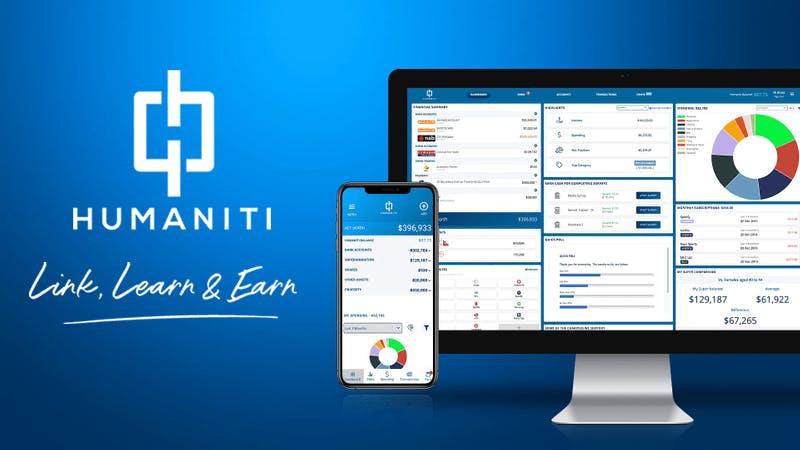
offer-news
Top Reasons to Invest in Humaniti
Humaniti is a next-generation technology platform connecting consumers and businesses like never before. For members, Humaniti is the first personal finance app where members can not only link key accounts to handy dashboards for help with budgeting but also earn extra cash through surveys. For businesses, Humaniti is a revolutionary data platform providing deeply insightful decision-making tools by providing a 360 degree view of a consumer based on completely de-identified, aggregated data. Humaniti is free to use for consumers, and generates revenue through its ability to provide unparalleled insights to businesses. Having already passed its minimum funding target of $200,000, Humaniti will close successfully at the end of its campaign. Here are some of the reasons why you should consider an investment in Humaniti. Innovative Tech Venture Humaniti has built a next-generation consumer data platform that utilises enterprise-grade technology solutions with best-in-class privacy measures. The proprietary platform has been significantly invested in to-date, and continues to iterate and improve on an ongoing basis. It seamlessly integrates with businesses’ data analytics, while providing consumers with an easy to understand means of managing their finances. This means that it combines the ‘what’ and the ‘why’ of consumer data, marrying a range of industries that together represent a market opportunity of over $80 billion worldwide. This market continues to expand as businesses, both small and large, realise the importance of insightful data to help inform key decision making. Four Examples of Humaniti Can Change the Data Game Humaniti provides a large range of potential applications for its business clients that have previously been highly inaccessible. By leveraging its proprietary technology, the company is able to make a genuine difference for its clients in improving their decision making by combining the ‘what’ with the ‘why’. In a recent webinar (which you can view here), CEO Ben Dixon explained some of the unique ways Humaniti can be used: More accurate reporting: In a recent survey it was found that people under-report what they spend on groceries by 29% and over-report their spend on fast food by 37%. If you were to therefore rely on qualitative data alone, marketers would be acting on inaccurate information which is why it's so beneficial that Humaniti actually taps into transactional data. Measuring above-the-line marketing: Humaniti can help marketers understand the effects of initiatives such as sponsorships which in the past have been hard to measure. For instance, KFC sponsored the Big Bash and Humaniti identified through surveys and transactional data that the group who watched the Big Bash had a 35% uplift in spend on KFC during that time period. This demonstrated to KFC that their marketing was effective, particularly when they could also compare it to the spend on their competitors. Targeting trigger behaviours. If someone switches from UberEats to Deliveroo, Humaniti can trigger a survey within 48 hours to understand why the consumer might have shifted, resulting in more accurate insights. Understanding category shifts: Humaniti gives insight into how much market share a company has compared to competitors and can trace what happens to that category over time, such as what happened during COVID. Linked To Over 240 Institutions The Humaniti platform links to over 240 financial institutions including banks, superannuation funds, share trading platforms and more. This means that members can easily link their key accounts, securely, to the Humaniti platform, allowing them to sort and track transactions to provide insights into spending patterns. Rapid Membership Growth Humaniti already has over 10,000 happy customers, with this number growing every day, supported by Australia’s largest media partners. With the proceeds of this equity crowdfunding campaign, the company plans to ramp up its marketing efforts to quickly scale its user levels. Transactions Categorised At Scale At the start of its campaign, the platform had already captured and organised over 16 million transactions ($5.6 billion) across more than 2,000 merchants. That number continues to grow every day, supported by Humaniti’s media partners and high level of service and functionality. Raised $4.981m Over 3 Years The company has successfully raised a substantial level of capital in recent years, with investors including Founders, VC Firms, Media Agencies, HNWs, CEOs and Business Owners. This investment opportunity is on the same terms as existing shareholders. Humaniti is now going down the path of equity crowdfunding to ramp up its marketing efforts and build wider exposure and awareness for the platform. In addition to the above, the company has successfully raised over $300,000 so far in its campaign with Equitise. Major Media Partners Significant equity investment by ScaleUp Media Fund (News Corp, Network Ten, Nova, Foxtel, REA Group) will drive Humaniti's brand awareness and member acquisition over the next 2 years. The company will be able to access unique media opportunities through its investment partners to boost its awareness and rapid customer acquisition intentions. Community Impact Humaniti gets its name because it benefits its members, clients and the wider community. It provides its users with access to optional surveys for real monetary rewards, rather than credit or tokens. The company also purifies 4 litres of water through UNICEF every time a Humanitirian responds to a poll. It also adds a further 10% to everything its members earn from surveys and donates that to charity. Humaniti is a member of Pledge 1%, and also gives members the option to donate some or all of the money they earn from surveys to a charity of their choice. If you want to know more, download the offer document or watch our webinar with CEO Ben Dixon. These are just a few of the reasons why our fundraising team selected Humaniti for the Equitise platform. When investing, be sure to consider the information provided in the deal room and offer document, as well as the risk warning. If you have questions, you can ask the company directly through the Q&A functionality. Remember to invest early so you don’t miss out! You can view the offer here.
September 7th 2020

success-stories
Parpera Case Study
Parpera is an Australian fintech company seeking to build an ecosystem of fair and transparent products and services that helps people to effectively set up, manage and grow their business in the new economy. Parpera is developing a digital solution that will initially seek to provide digital wallet, card, payment, and money management capabilities. These features are co-designed with a community of Australian businesses to help them improve the way they do business. Parpera is not a bank, and is therefore not incentivised to make money off its members' money, but rather aims to make it easier for its members to setup, manage their money. Guided by international precedents of similar success stories in foreign markets, Parpera is hoping to change the way we do business.
July 20th 2020
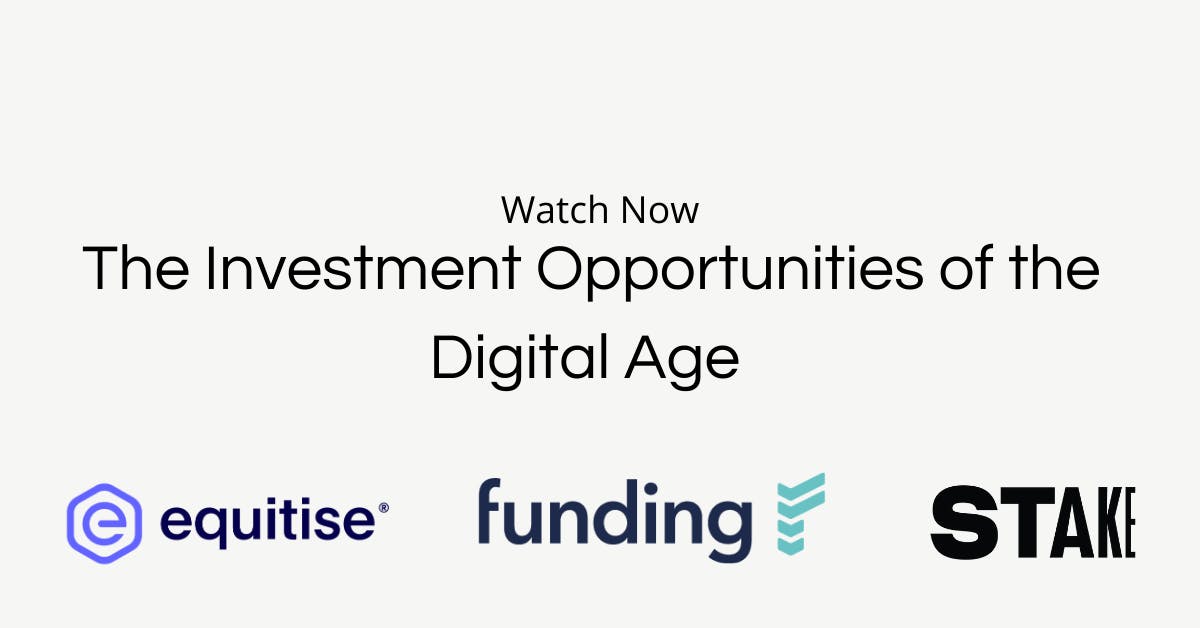
trends-and-insights
The Investment Opportunities of the Digital Age
Check out the recording of our recent The Investment Opportunities of the Digital Age event.
July 20th 2020

trends-and-insights
Venture Investment During & Post Covid-19
Check out the recording of our recent Venture Investment During & Post Covid-19 event!
July 3rd 2020
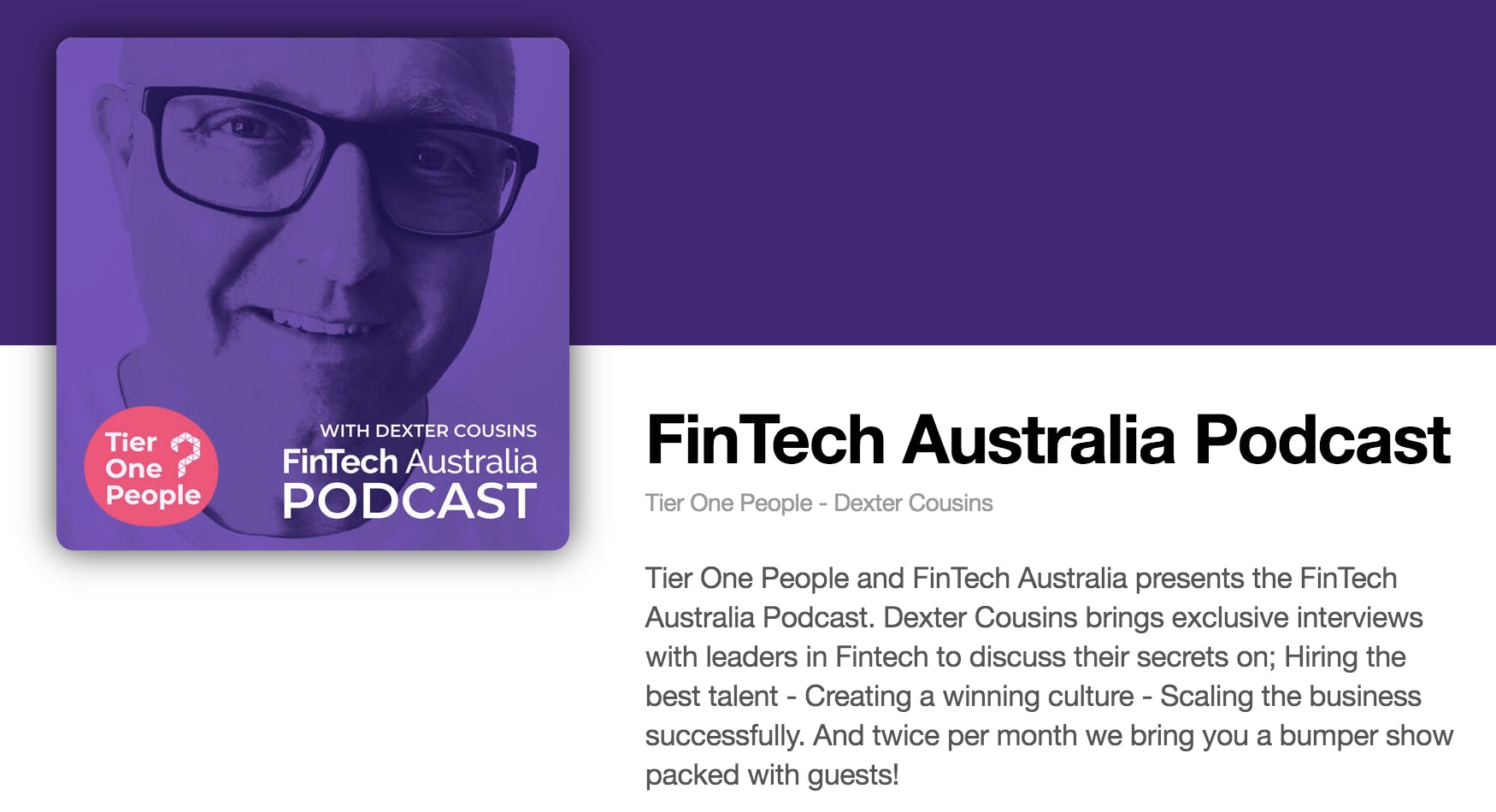
trends-and-insights
Our Founder Jonny on the FinTech Australia Podcast
Our Founder & CEO Jonny Wilkinson appeared on the FinTech Australia podcast recently. You can listen for free through the link below, or read on for the full transcript. Transcript Dexter Cousins 0:03 Welcome to the FinTech Australia Podcast, brought to you in partnership with Tier One People, Australia's leading FinTech executive search consultants. I'm your host, Dexter Cousins. This is Episode 22 and I'm joined by Jonny Wilkinson, co-founder of Equitise. Equitise is a crowdfunding platform that simplifies the investment marketplace. It removes traditional barriers to investing in sourcing capital by making the process quick, easy and safe. And it enables your average Aussie to invest in early stage startups like Xinja. Johnny shares his personal journey of launching the business and gives his views on the investment market. Before the show, I want to say thanks to our partners FinTech Australia. They're a member driven organisation, building an ecosystem of Australian FinTechs to advance the global economy. They share the same mission as Tier One People, in that we look to build a strong community, foster connections and support innovation. If you'd like to find out about membership, go to fintechaustralia.org.au/join-now/ Johnny, Welcome to the show. Jonny Wilkinson 1:21 Thanks Dexter. Thanks for having me Dexter Cousins 1:23 Could you tell our listeners a little bit about what you do and who you are? Jonny Wilkinson 1:27 Sure. Equitise is an investment platform for unlisted companies. We primarily use equity crowdfunding. Which is a concept of every day investors being able to put a relatively small amount of money into supporting, venture capital and other startup businesses. We've been going since 2014. My co founder and I, Chris Gilbert, were sitting in a pub at mates birthday. We're both chatting about wanting to get out of our corporate gigs, we knew what was happening in the space, regionally and globally. There was potential changes that was opening up equity crowdfunding and figured we'd go for it. We both woke up with sore heads the next day and weren't sure what was going to happen. But literally, there was something that came up on my newsfeed, I used to work in stock broking at Citibank, and we talked about basically, that what is now the precursor to the H 2 accelerate. Dexter Cousins 2:30 I guess you've been waking up with sore heads ever since. Have you? Jonny Wilkinson 2:34 Yes, the store has changed its from problems and stress rather than the alcohol Dexter Cousins 2:42 You've had some really great successes. I go back two years ago, I think a lot of listeners would be aware of Xinja. You actually helped Xinja with, at the time was a record, equity fund raise. What was that experience like? Jonny Wilkinson 3:02 Xinja was the very first retail, equity crowdfunding deal done after the laws changed., the day we actually got our licence. On the 11th January 2018 we launched with Xinja. It went gangbusters. It went beyond our wildest expectations, planning and preparation that our team and Xinja had put in to get it ready. It really paid off. I didn't leave my desk other than go to the bathroom a couple times for the ensuing 12 hours after we launched. It was a huge success. We ended up raising about $2.5 - $3 million for them as the first equity crowdfunding deal, which we were pretty impressed by. Dexter Cousins 3:46 I guess you've continued that relationship, there was a second and a third fundraise. Could you tell us a little bit more some of the other businesses that you work with? Jonny Wilkinson 3:56 Definitely. As you pointed out it's an ongoing relationship. That's a big part of our DNA and how we operate. We want to be the trusted partner and advisor that works with these businesses. And makes it easy for them to continue to grow. So we definitely want to be there and help them raise money a second and third time. Some other companies we raised money for, that the viewers might know about, Car Next Door. We've helped them raise money a couple times. There have been wholesale raises that we've helped with. Things like GoCatch, you may have heard of, we've helped them raise money. We did a retail raise last year that went out to their drivers. Endeavour Brewing, the boutique beer label that has the pub down in The Rocks. We've helped them raise money. Westman's Gin, a Perth gin distillery, we've helped them raise money. We've now helped, I think we've done 74 raises for 65 companies over the past few years and raised about $45 million. Dexter Cousins 5:08 You touched on this before. You're not just helping startups raise money, but you're helping your average Aussie tap into an investment opportunity that they've never had access to up until a couple of years back. What have you found from the customer side? As in the investor side? What's been the feedback? Jonny Wilkinson 5:32 It's been amazing. We set out with this mission to make early stage capital markets more efficient. In doing that, it's a two sided marketplace, we need companies and we need investors. Part of equity crowdfunding, and what we do is trying to make it more open and transparent for everyone to be involved. Traditionally, venture capital is an asset class that everyday investors can't readily access because you either need to be a wholesale sophisticated investor or the minimum cheque size is something in the order of $250,000 to buy into a VC fund. Most of our deals there is a minimum $250. We think it's an amazing way of allowing everyday investors the opportunity to build up a portfolio of some of these companies and that they can back some amazing, exciting businesses that have the potential to grow tremendously and potentially get great returns. It's something that we're very passionate about. Oviously, allowing everyone to be able to support and invest in these types of businesses is not only beneficial for the companies and the investors, but overall for the economy. It does tremendous things because these are the companies that are innovating, they're driving growth and employment. If we're gonna have a positive outcome, and we're gonna have innovation and things that mean the Aussie economy. Then having something like equity crowdfunding help underpin early stage capital markets is a great way of doing that. Dexter Cousins 7:07 Talking about the economy, I think everybody's been surprised by the performance of the stock market. It seems to be doing things that are contradictory to what might suggests we're in a economic slowdown. What do you put that down to Johnny? Have you got any kind ideas or theories as to why we're seeing this huge rise in stock markets? Jonny Wilkinson 7:33 I think there's a number of factors. Obviously, stock markets are trying to predict the future. People aren't sure of what's going to happen with Corona. Unlike previous downturns or going back to the GFC, which was a top down structural issue that unwound and devalued a whole lot of assets. This is a supply/ demand, bottom up driven outcome and the opportunity for the economy and the world to turn things back on and get back to normal is much greater. There's people trying to assess that and factor that pricing you. More to the point, particularly with a lot of the quantitative easing and other government plans, things that have been happening in western economies and other places around the world. There's literally never been more money in the world today than ever before. Right? People are probably reassessing, people are probably getting more comfortable with lower yields and returns on assets. People that can't put money in a bank and generate any real returns or wanting to invest it. Then, specifically in Australia, we're very lucky to have superannuation, which is now extremely mature. I can't remember what the current figure, is there's $2.6 trillion in superannuation. And that is a tremendous amount of money to underpin the economy with. More to the point, nine and a half percent of the gross national income is coming into superannuation each month. There's money that needs to be invested. If there aren't any new issuances on the ASX, most of the focus and allocation of a lot of these assets is towards Australian stocks. The asset prices will just get pushed up. Which means the ASX keeps on growing even if there isn't commensurate, actual growth in the underlying companies on the ASX. Dexter Cousins 9:59 With technology certainly advanced since the GFC. I remember sitting at my desk with a Comm Sec account, putting on trades and it taking four days to settle. We're in a bit of a different world now where I could be anywhere with a smartphone and can invest. Having invested through the Equitise platform, a very, very simple process. Do you think the actual ease now with which the average investor has access to all of these opportunities, makes it a bit of a different paradigm that we're dealing with now. Jonny Wilkinson 10:40 Without a doubt, obviously it's much quicker and easier for people to take these opportunities at the moment. If you can get up an account and get AML/KYC'd and link it to your account within a few minutes get access. The stock market, whether it be a fund or an alternative asset, getting access to gold or investing in unlisted venture capital assets like ours. The ability to do that means that people can move quick. People can take benefit of the opportunities that present themselves with volatility. If you're sitting on cash or you have money that you can invest or you can rotate your asset allocation from other things into these opportunities, then yeah, it's a tremendous time to be alive and investing and using FinTech and all these other things. To have access is pretty tremendous. I do remember being similarly back in the day on a PC on CommSec, buying things around the GFC. As you say, you couldn't really have done that today. Businesses like Stake that now give you very quick and easy access. Automate the US W8 tax forms and those sorts of things, for relatively low cost, is actually a tremendous opportunity as well that you couldn't even contemplate back in the day. At Citibank, when we were trying to set up some Australian institutional clients the steps and the forms and the things we'd need to go through to actually set them up to trade in the US was quite involved. Whereas these days individuals can do it in a matter of days. Dexter Cousins 12:32 I want to talk a little bit more about the Equitise business, Johnny. Particularly the journey that you've been on. I consider us as being good mates, it's been fantastic to see the growth of the business and the journey that you've been on. I guess for our listeners, what's that actually been like? You mentioned that you got a sore head when you woke up and it's been challenge after challenge. What have been some of the highlights for you as you've gone through that journey? Jonny Wilkinson 13:07 Thanks. and yes, we are good mates. AWe have had sore heads together. It has been a long journey. We started the business with an expectation that the laws were going to change to allow for equity crowdfunding in Australia. So in 2014, when we got accepted into the H2 accelerator and we quit our jobs, it was slated to change in a relatively short period of time after. Within six to 12 months. Not long after that all happened there was a change of government and we realised it was going to be delayed by considerable amount. Having quit our jobs, taken on some money, and had begun building the investment platform, we didn't know what to do. We quickly got on a plane and went to New Zealand. There was always an idea of doing Australia and New Zealand and then taking on Asia Pac. We got to New Zealand, we spread out our wings, went through our networks. We cold called people, we sent everyone emails, LinkedIn connections, and proceeded to have meetings with all the venture capitalists, angels, lawyers, accountants and people in the early stage capital markets that we could. We met with the regulator, the regulator was very encouraging in what we're doing. Then we came back to Australia, we had a board meeting, there was only Chris and I on the board at the time, but we had a couple of advisors. We quickly made the decision that New Zealand was what we needed to do. The next day I got on a plane and moved to New Zealand Ffor 18 months. We got the business quickly set up and licenced over there. The process of moving to a new country, we lived in a youth hostel for a long period while over there getting set up. Living off savings and sniff of an oily rag. Having to do that to get the business going and navigating all those challenges was difficult. Very lucky to have good family and friends and other people around me for support to allow that, which was great. From there the process of actually getting the legislation changed to allow for equity crowdfunding was pretty arduous,. It took a lot of time, took us pushing from a lot of different angles. We had to lobby the government and the opposition. We went to Canberra a few times. I have a funny story about James Bond, who was the head of the Financial Services Council for Economics and me going down to Canberra right after the there was a big security scare. Each of the offices of Senators and parliamentarians we went to go meet, their guy at the front desk had to call them up and announce who was coming. He was calling up and saying I got James Bond and Jonny Wilkinson to see Senator Sinodinos. You can tell he was getting some pretty bemused responses. Dexter Cousins 16:16 Massive disappointment when they turned up the reception and you were standing there Jonny Wilkinson 16:23 Even more James Bond wasn't there. It was a very difficult process. We spent a lot of time and a lot of shoe weather trying to get people involved and decision makers looking at it. There was a lot of things happening that were diverting the government's agenda and policy focus at the time. That was really difficult. We were lucky to be a part of some of the founding people involved with FinTech Australia. FinTech Australia has been an amazing platform for us to help get access and lobby the government. By virtue of that I was lucky enough to be put on a FinTech advisory panel to the government. Which again was another avenue we were able to use. We just have to go about getting the laws changed, which is no mean feat. I'm never going to try and start another business where I need to do that ever again. That was obviously a lot of time and energy and difficulty. We had to work with ASIC and make sure that we got regulations in place and then get licenced again in Australia and get going. Look, there's been a fair bit to do. We also had the usual growing pains of businesses, working out to get get funded. Paradoxically, it's harder for us to raise money for ourselves than clients a lot of the time. We've been through the usual travails that are all startups get to. While we like to think we're still startup in some ways, we've been going for a while. It's been fun. It's been a roller coaster, but there's plenty more to do and we're pretty excited. Dexter Cousins 18:13 How many people do you have in the business? Jonny Wilkinson 18:15 So we're a team of 10. Split pretty equally across technology, marketing, deals and management. We work pretty collaboratively. We've got our own proprietary technology. Our marketing team works with each of the companies we are raising money for, as well as doing the broader Equitise marketing. We've got of great guys and some juniors that help out in the running of the deals. Then there's the management side. It's a decent size. We're hopefully looking to grow a little bit in the next little while and it's exciting. Dexter Cousins 18:54 You touched on this a little earlier, Johnny, I guess around the significant impact a business like Equitise can actually have on the economy. We've mentioned Xinja, that was your first cab off the rank. Two years on from that they're out there raising a huge amount $400 million AUD. It must be really satisfying to sit back and see the level of impact you're having on the industry. Jonny Wilkinson 19:27 Definitely, it is amazing. It's something that we're very proud of. One of the things that kind of gets us going and out of bed every day is not only do we get to speak to amazing people doing tremendous things, but a lot of the companies we help go on and do well and keep on growing and give people jobs and all that sort of stuff. It's very rewarding, and it does deliver a reasonable amount of impact, I think. Private companies are the lifeblood of the economy, and they do drive growth and employment. For instance, not only Xinja but actually the second company we ever raised money for out in New Zealand works in a pretty niche space in funds management and life insurance. They are variable annuity provider, which doesn't sound sexy at all, but they provide financial products to retirees, that gives them certainty in life and they will get a annuity for the rest of their lives. They credit us, we help them with their first raise, if we hadn't helped them, they don't think they would have got that money and may not have been able to go on. We've now raised money for them four or five times and they're looking as though they're gonna potentially list or do something pretty interesting next year or so. To have watched them grow, they now have more than $250 million funds under management. They weren't even licenced when we first raised some money. All therse sorts of things that you see happen over time and the impact and what that brings is tremendous. As I said with these guys, they're the only licenced provider of this sort of product in New Zealand. They're doing a great job of providing a pretty essential service and product that does give these retirees some certainty and peace of mind in retirement. Dexter Cousins 21:27 Have you got any exciting deals in the pipeline that you can mention at the stage? Jonny Wilkinson 21:33 Yeah, we've got lots of exciting things, actually. With COVID and where everything's been of late, we've been holding off a little bit. We also have an exciting new platform, we've rebuilt the technology from scratch. That's quite exciting. Coming up, we have Bricklet, which is a fractionalized property play, which is quite exciting. You can now actually be on title rather than buying units and a fund or some sort of product and own part of the property. So that's quite exciting. We've got another little business that are doing authentic, certified organic, whole food. They're a bakery that are doing quite well. We've got a couple of exciting sort of the tech businesses coming through. Humaniti a personal finance up where you can actually earn money. Yeah, there's a lot of exciting things coming through in the short term and then were stacking of the pipe and there's some exciting stuff coming for the second half of the year. Dexter Cousins 22:54 Johnny, it's been fantastic to have you on the show and mate a little bit different a chat you over a microphone rather then over a beer. Nonetheless, I never get sick of hearing about, not only the story of Equitise, but all the great work that you're doing. I think people often underestimate the importance and the role that you guys play and hence why we're just massive supporters of everything that Equitise do. Jonny Wilkinson 23:21 Thanks a lot mate. That means a lot. We do do take a lot from that. It's nice to hear that and have people understand that. I look forward to having a beer and talking more sometime soon. Dexter Cousins 23:36 Well, that's the end of the show, folks. Thanks for tuning in. And thanks to our partners FinTech Australia. Remember to subscribe we're on iTunes, Spotify, Amazon, Google and all of your favourite players. Check out the show notes for additional info on our current opportunities. If you'd like to sponsor the show, or you're looking to hire game changing FinTech talent, check out tieronepeople.com or contact talent@tier onepeople.com
June 3rd 2020

for-companies
The Wholesale Offer Guide
What is a wholesale offer Equitise facilitates investment opportunities that are only accessible by accredited investors. We enable our investor community to invest “deal-by-deal” in specific, highly sought after growth businesses that are ordinarily quite difficult to secure firm allocations for. A wholesale offer is a traditional form of private company capital raising. Wholesale refers to the exclusivity of the deal to wholesale investors, as opposed to an equity crowdfund or IPO that is open to retail investors. Wholesale offers can involve ordinary shares in addition to alternative instruments such as convertible notes. These offers are generally less restricted by financial regulations owing to the classification hurdles faced by wholesale investors.
June 2nd 2020

for-investors
How to Get Started On Equitise
Investing with Equitise Investing in exciting early-stage businesses on Equitise is easy, transparent and fun. We launch new equity crowdfunds, wholesale offers and IPOs on the platform every month so here are a few tips to get you started on your journey. How to register your interest New offers are featured on the website, in our fortnightly newsletter and on our social media channels. When you see an offer you like, register your interest. Only those companies who receive enough interest will go on to raise capital, so make sure you signup. You'll also get exclusive early access when the offer does go live. How to Invest When the company opens for investment, head to the offer page to access all the important information relating to the offer and to invest. Investing is free and can be completed in a few minutes. 1. Click invest on the offer you wish to back & choose the amount 2. Create an account 3. Verify your identity online (name, DOB & residential address). You may need to upload an identification document 4. Invest using either direct debit or debit card For an equity crowdfund, Australian retail investors can invest anything from the minimum amount (usually around $250) up to $10,000 per company per year. Wholesale investors are not limited in their investment. For an IPO offer, there is no limit for both retail and wholesale investors. See here for our step-by-step guide on how to invest. When is an offer successful? Once the minimum funding target is hit an offer is successful and you officially become a shareholder. If it doesn't reach the target your investment is returned in full. You can find out more about the minimum and maximum funding targets here. If you like a business, ensure you invest early to give that business the best shot at succeeding. What type of investor am I and what can I invest in? A retail investor is any Australian resident over 18 years old. They are eligible to invest in retail equity crowdfunds from their own country and IPOs. A wholesale, accredited or qualified investor varies between countries. If you think you qualify you can often invest more than a retail investor, plus access overseas and exclusive wholesale offers. In Australia, it's anyone who has earned over $250,000 for the past two years or has more than $2.5 million in net assets. Find out more on each of the definitions here, and if you qualify, update your investor status within your dashboard here. View current offers.
May 29th 2020
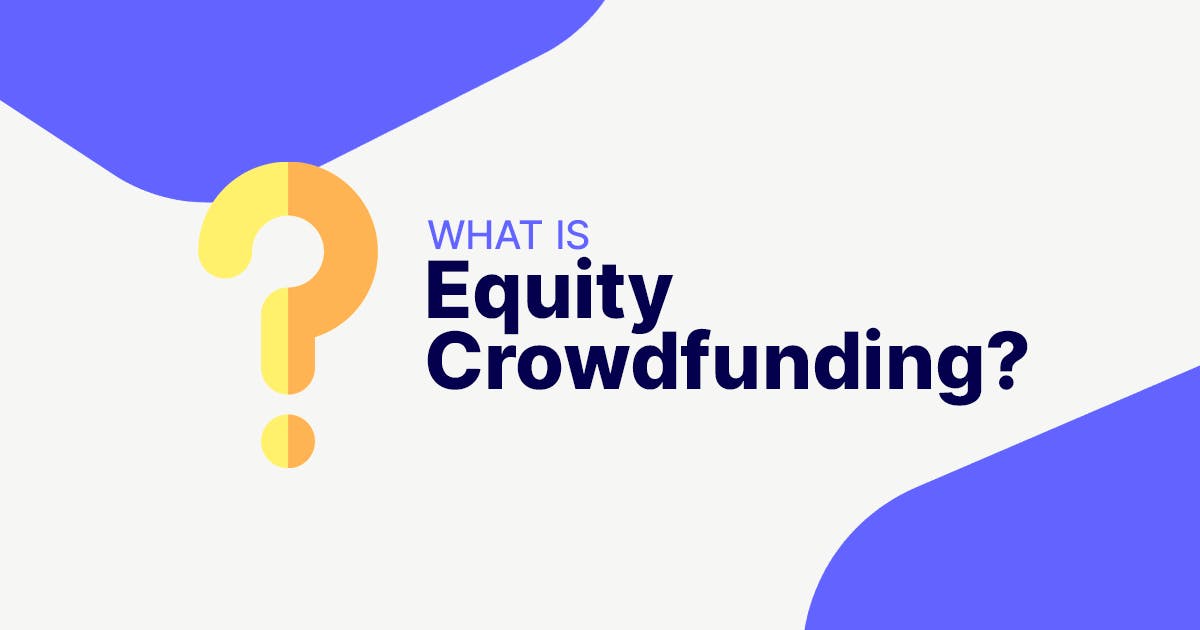
for-investors
What is Equity Crowdfunding?
You’ve heard of Kickstarter? Equity crowdfunding is similar, but when you fund projects on Equitise, you get a stake in the business. It's a great way to throw your support behind amazing businesses. Equitise is the leading investment platform in Australia which partners with innovative early-stage businesses running equity crowdfunds or wholesale offers and IPOs.
May 29th 2020

for-investors
What is an Accredited Investor?
A to Z of equity crowdfunding Throughout the Equitise platform, we mention quite a few industry-specific terms that you might be wondering about. For a full breakdown of the a to z of equity crowdfunding, check out our glossary here. One of the most important terms you’ll come across is accredited investor. There are a few different names for accredited investors which vary from country to country including wholesale, sophisticated, eligible and qualified. The criteria that need to be satisfied for each also differ so it's important you understand what the requirements are in your country - for some it's based on wealth, others more on knowledge and experience.
May 29th 2020

for-investors
Minimum, Maximum, Overfunding - What Does It All Mean?
When you first click onto an equity crowdfunding deal room it all might look a bit foreign at first. Perhaps you’ve engaged in traditional forms of crowdfunding before, but even then the implications of certain terms differ quite significantly when equity is involved. Here’s a quick breakdown of three key terms right at the top of equity crowdfunding deal rooms.
May 29th 2020

for-companies
Equity Crowdfunding vs. The Stock Market vs. Crowdfunding
Having only been introduced in Australia in late 2017, equity crowdfunding is still a relatively unknown area for most. Some have never even heard of it, despite being involved with the stock market or traditional forms of crowdfunding. The name itself can be quite confusing. After all, most associate the concept of crowdfunding with a donation or rewards-based initiatives, and the idea of buying shares in a private company seems foreign. Below, we break down the key differences between these three areas.
May 29th 2020

for-companies
Crowd-Sourced Funding (CSF) Glossary
Whether you’re new to investing or a seasoned financial professional, the world of equity crowdfunding comes with a wide range of unique terms that you may not have come across before. Admittedly, a lot of the jargon used in the finance industry can be at times unnecessary and restrictive to newcomers. Here at Equitise, we’re trying to democratise the venture capital industry and provide unique opportunities to everyday investors. So while we will still use the technical terms where relevant, education is a top priority of ours, and here’s a quick breakdown of some of the key terms.
May 29th 2020

for-investors
How / why we need to validate your identity
We’re required by law to perform AML/KYC checks on all our investors. AML/KYC stands for anti-money laundering/know your customer. These are standard checks against government databases that many types of companies must perform to comply with specific regulations. We legally must perform these checks before we can allow you to invest. When you enter a form of identification to complete the verification process, that information is only used to complete the safe and secure AML/KYC checks. It’s all done online using documents such as your passport or driver's license. It only takes a minute, after which you’re all set to get involved with the very exciting opportunity that is equity crowdfunding.
May 29th 2020

for-investors
Is Equity Crowdfunding Safe?
We are sometimes asked about the safety and legitimacy of equity crowdfunding. It’s a reasonable concern, given the relative youth of the industry and lack of widespread knowledge of the practice. There are concerns over the legal protections, as well as the safety of investments themselves. Below, we break down the key components that contribute to the safe and well-regulated area of equity crowdfunding.
May 29th 2020
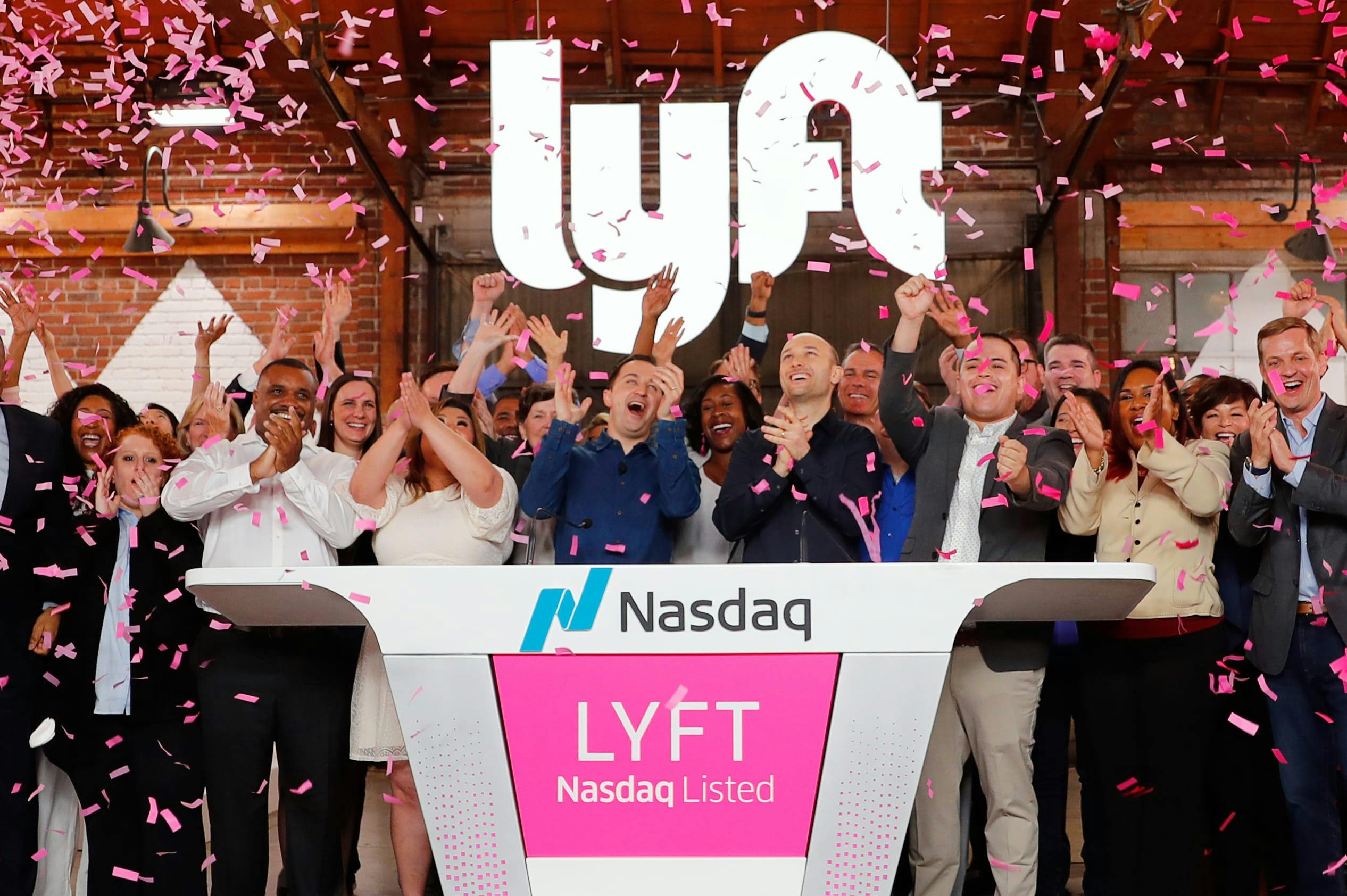
for-investors
Initial Public Offering Guide
What is an IPO IPO stands for Initial Public Offering. This is when a company lists on a public stock exchange such as the ASX, also known as floating or going public. An IPO occurs when a sufficiently mature company wishes to raise capital from public investors. Becoming a listed company means that those investors can buy and sell their shares on the exchange. Shares are issued through a prospectus, enabling individuals to apply to make a purchase of a parcel of securities (also known as equity or shares). Prior to this process, the company must convert to a public entity. What’s the difference between IPOs and equity crowdfunding Both involve the sale of shares in exchange for capital to fund company growth and operations. Both are also accessible by retail investors (any Australian resident over 18 years), although equity crowdfunding has a maximum investment of $10,000. All information about an IPO will be housed in the Prospectus Document which is similar to the Offer Documents of equity crowdfunding. The key differences between the two are stage of company and future outcomes. Since IPOs are quite a costly process and often involve raising significant amounts of capital, they are usually only undertaken by mature, larger companies. After an IPO, the company is traded on a public stock exchange, meaning investors can buy and sell their shares. On the other hand, equity crowdfunds are often companies that are earlier in their journey. The shares are still private, meaning there are fewer options to sell, however the aim of a lot of companies that undertake an equity crowdfund is to go on to IPO, providing this option to their shareholders. Benefits of IPOs The key benefit of IPOs for businesses is capital raised. On a public stock exchange, businesses have access to millions of investors and therefore have the opportunity to raise significant capital. For investors, IPOs carry benefits of liquidity and maturity. Since a stock exchange is a secondary market, investors can buy and sell their shares immediately, potentially making a return which decreases the risk of investment. However on the flip side, whilst equity crowdfunds can be riskier there is also a potential for higher returns as you're investing at the beginning of the journey. How we select IPOs Our rigorous vetting process also applies to our IPO selection process. We ensure that every part of the business is in order, complies with regulations and presents an attractive investment opportunity for our community. Fortunately, there are significant disclosure requirements for companies choosing to go public, meaning that there will be sufficient information for even the most seasoned of investors to analyse.
April 8th 2020

trends-and-insights
Companies That Have Pivoted with Covid-19
In times of crisis, true innovators and dreamers are often the ones to rally, finding creative solutions to our problems or identity opportunities that weren’t there before. It shows us that as humans we are resilient and adaptive, creative and courageous. Even in the last few weeks we’ve seen many examples of fantastic innovation in business, from startups to larger companies alike. Some of these businesses must adapt to stay afloat, while others simply seize an opportunity. It’s more important than ever to think outside the box by leveraging existing capabilities and pivoting to new areas. Below we take a look at twelve examples of business ingenuity and persistence. Mercedes F1 team In light of the cancellation of the Formula One season, the talented engineers in the Mercedes High Performance Powertrains team worked alongside engineers and clinicians at University College London to reverse engineer and develop a Covid-19 ventilator ready for mass production. These items are essential for more serious cases but are in short supply worldwide. This clever solution has been approved by the UK’s National Health Service. The efforts, dubbed Project Pitlane, are also being assisted by the other UK-based teams Red Bull, Racing Point, Haas, McLaren, Renault and Williams. Nice to see even the strongest of rivals ban together! Restaurants and cafes With social distancing laws in full effect worldwide, and at home, we’ve seen the hospitality and dining industries hit particularly hard. We’ve also seen some great ingenuity from all sorts of local institutions in converting their offerings to accommodate these new restrictions. Even the fanciest of high-end restaurants are offering takeaway options (including cocktails, yes), online cooking classes and DIY food packages. This enables these businesses to stay in business, and help keep at least some of their staff onboard. For our team, getting a special takeaway has also become the highlight of our week. $5 tacos and $12 margaritas from Bondi’s Carbon come highly recommended. Atomo HIV Testing Rapid blood-testing startup Atomo is an HIV testing company looking to soon list on the ASX. They’re funded by some big names including The Global Health Investment Fund, backed by Bill Gates. With the onset of the Covid-19 crisis, the company is repurposing its technology and capabilities to develop self-testing kits for Coronavirus. Not only is it looking to provide accurate testing, but also accessible and user-friendly systems that other solutions are currently lacking. Founder John Kelly hopes to have the tests ready in weeks, before proceeding with clinical studies and regulatory approvals. Read more here. LVMH Hand Sanitiser Louis Vuitton Moet Hennessy (LVMH) is usually known for their high-end fashion items, perfumes and alcohol products. The french conglomerate, with 76 portfolio companies, pivoted in just 72 hours after the French Government called on industry to help meet the needs of doctors and nurses. The 71-year-old billionaire quickly approved the pivot from luxury goods to hand sanitiser which is produced and donated to hospitals to bolster their supplies. Using existing capabilities and connections, the company is able to produce tonnes of the product, resulting in this truly impressive act of generosity. Bravo! Detmold Face Masks Adelaide-based business Detmold normally produces packaging for companies such as Subway. It’s now working to create 145 million face masks for medical staff in-need, with 45 million for South Australia and the rest shared across the country. Not only does this move provide a massive boost for those on our medical frontlines, it also means the company is employing an additional 160 staff for mask production, saving lives and stimulating the economy simultaneously. Breweries Hand Sanitiser Owing to their capabilities in alcohol production and products, an increasing number of Aussie breweries are answering the call to help bolster Australian supplies of hand sanitiser. They’re using existing capabilities and resources to produce the new liquid gold. CEO of Carlton and United Breweries, who are producing 30,000 litres of hand sanitiser, said: “for more than 150 years we’ve helped Australians come together over a beer. Now it’s time to lend a helping hand as they stay apart to fight the virus.” Other household names chipping in include Archie Rose, Four Pillars Gin, Canberra Distiller and Manly Spirits. Calumino Thermal Imaging Calumino has been preparing to launch its new product Eve Care, a thermal imaging device to monitor falls in aged care facilities without compromising privacy. With the onset of the virus, the company put its plans on hold to pivot its technology to building compact, AI equipped devices that can rapidly measure temperature for screening purposes. In just a few weeks the company has secured contracts with airports and governments to help in an area characterised by high cost and cumbersome technology solutions. RapidWard Importing Renewable energy entrepreneur Milton Zhou recently set up not-for-profit company RapidWard out of his own pocket. The company’s purpose is to import and export testing kits of surgical masks for Covid-19 from China to the rest of the world without marking up the price. He’s doing his best to help secure and bolster shaky supply lines for the benefit of the wider community. Zhou has been working 19-hour days, and has brought on six volunteers to provide assistance. His goal is to help Australia become one of the first countries to flatten the curve of the virus. Cork and Canvas Online Australia’s first paint and sip studio, having spawned a wave of similar offerings, has now taken its service online! With the virus preventing in-studio sessions, the team at Cork and Canvas is providing virtual sessions from the comfort of your own home, perfect for a stay-at-home date night or family fun! It’s also offering creativity kits for home delivery for those without a large stockpile of art supplies that come with canvases, paints and brushes. Isol-Aid Music Festival Isol-Aid is a clever take on the music festival industry, using Instagram live streaming to bring together artists and fans. Having now held three separate online festivals, Isol-Aid has featured dozens of artists and reached hundreds of thousands of fans in their own homes. It might not be the same as an in-person festival, but these performances have allowed artists to interact with their audience and create a somewhat surprisingly more intimate experience. The live streams are free, providing fans around the world with some much needed entertainment, while festival organisers are encouraging donations to struggling musicians. Art Galleries Online Another in-person experience disrupted by the Covid-19 crisis is art. While it’s always been possible to have a squiz at your favourite artist online, there’s something special about seeing their work in person at a gallery. Art Basel Hong Kong is Asia’s largest contemporary art exhibition, and was recently and understandably cancelled. Fortunately, the organisation is providing a panoramic virtual gallery experience with over 90% of its line-up (231 galleries) opted in. That means over 2,000 works of art worth over $270 million are on display for a quarter of the original fee. The Sydney Dance Company Online Finally, we come to the Sydney Dance Company, who have quickly converted their traditional dance classes to online form. Through their virtual studio, participants can access an unlimited range of dance classes for all levels for just $28 a week. The dance classes offer a great way to stay fit, improve your skills, or just have some fun, with classes including tap dancing, conditioning, hip hop and ballet! An excellent initiative keeping people entertained at home while allowing instructors and the company to stay in business. Unfortunately, being able to pivot and adapt your business like the ones above is not a reality for everyone. The fact of the matter is that the vast majority of companies will be hit hard by this crisis. The Australian government is doing its role in helping to stimulate the economy and help as many as possible to stay afloat. Read more about our summary of government initiatives here to find out if you might be eligible for assistance. In times of crisis we’ve also historically seen new companies founded that go on to achieve big things. You’d be surprised at some of the names that came out of the 2008 GFC - check out our blog post here. Equity crowdfunding remains a great way to support startups that are innovating and creating growth from the ground up. With longer term investment horizons and a lower correlation to public stock markets, these also present a great opportunity to diversify your portfolio holdings. Read more about why investors are turning to equity crowdfunding here. Social distancing wave
April 8th 2020

offer-news
Reasons to Invest in BRICKLET
Despite everything going on in the world, we continue to launch new and exciting startups looking to raise capital to fast track their growth. These companies are the true innovators and drivers of our economy and retail equity crowdfunding presents an excellent way to support them directly and share in any success. Our newest retail offer is BRICKLET, a revolutionary fragmented property platform that is truly disrupting property investing. It offers a world-first model that makes investing in property accessible, easy and fast. It does this by breaking up a piece of property into ‘bricklets’ which are bought by investors at a fraction of the cost. Bricklet owners are a registered owner of that fragment on the land title and receive all the benefits that come with owning an investment property – such as rental and capital yields. We’ve summarised some key points which impressed us about the company below. Disrupting an age-old industry Property investing is nothing new, in fact it’s one of the oldest options out there recognised for its stability and ability to offer tax benefits, rental income and capital gains. Nonetheless, it’s an area that hasn’t seen much innovation for a long time. A major pain investing in property is the high cost of entry with the average house deposit in Australia being $161,800 (based on 20% of the average house price). This is true for both first time investors and more seasoned investors who wish to diversify their portfolio by buying several properties. Other pains include how much time it takes to buy an investment property as well as the issues associated with rental management. In contrast, BRICKLET enables investors to become landlords within days at a fraction of the cost whilst also receiving hassle-free asset management. World-first concept and platform There’s fractional property investing and then there’s fragmented. Confusing we know, but the difference is significant. Fractional property involves the purchase of a given property funded by a number of fractional smaller investors. However individual investors are not included on the land title, but rather own a fraction of the trust that owns the property. This limits direct exposure and control, meaning that if the entity ceases to exist, so too does the value of the investment. Another similar model to fractional investing is Real Estate Investment Trusts (REITs) which function like a managed fund of stock market investments. Investors gain exposure to the trust itself, rather than individual properties within the trust. As such, the choice in the buying and selling of specific assets is limited, with these decisions instead made by a manager. BRICKLET divides properties into a set number of “bricklets”, each with a value proportional to the overall investment. The investors are on the land title which means that the asset will never cease to exist like a trust and they have complete control over selling the asset. Whilst there are several examples in Australia of fractional investing platforms, the founding team of BRICKLET have never come across another fragmented investing platform making it a world-first. Backed by the best Don’t believe us? BRICKLET’s approach has been validated by big names in the real estate industry. Property giants Mirvac and Stockland joined the company on the journey as initial investors to fund its development and growth. Both companies conducted extensive due diligence and legal review and believe there’s a strong future for fragmented property. BRICKLET was also named by the Australian Financial Review as a top prop-tech company to watch in 2020. Plus Accounting firm BDO said “fragmented property investing could be ground-breaking for SMSFs by giving investors all the benefits of property without many of the risk and compliance drawbacks”. Traction to date BRICKLET has sold just under $9 million in bricklets in the first quarter of 2020 after launching in September last year. This is even more impressive when you consider the launch was only to wholesale investors - the group that fragmented property investing is currently limited to given its relative youth as a financial instrument. The Company is working with regulators to provide the opportunity to all Australians. Check out the coverage of the launch on Channel 9 and the ABC. Track record BRICKLET’s unique solution was entirely developed in-house by leading software development and commercialisation company Lakeba Group. Lakeba has successfully commercialised a number of software platforms including Shelfie, which was also a success story for Equitise with a current valuation of 8 times the original price in the 2018 raise. Proprietary technology This technology developed by Lakeba Group enables the company to provide a fast, seamless and highly user friendly investment experience in addition to ongoing property and portfolio management. The platform enables investors to purchase and trade securities hassle-free. This approach also enables BRICKLET to continue to develop additional revenue streams through the platform such as detailed analytics and finance. We see a lot of great ideas in our line of work but it’s really exciting when you come across one that’s not only a world-first but has already been built and received impressive traction. BRICKLET also has the benefit of not just operating but disrupting the property market - an industry at the heart of the ‘Great Australian Dream’ and one that has long since been recognised as a stable investment class. Marry the above points with the backing of two industry giants, as well as proprietary technology, and you’ve got an offer that’s pretty beefy! A few points to consider in this current crazy world we find ourselves in: Equity crowdfunding is a longer term investment as the equity is currently ‘illiquid’, which means the shares can’t readily be sold until an exit event like an ASX listing or a buy-out occurs. This means that the value of the investment is less prone to the fluctuations in the market like we’re currently experiencing as it gives the market time to recover Market correlation and investment returns aside, one of the best things about equity crowdfunding is the ability to support the Australian startups driving the economy from the bottom floor. Startup communities are becoming increasingly important in the modern economic era, and these opportunities allow you to make your investment mean something, whilst also potentially making a return, with funds going straight into growth and job creation. The property market isn't always correlated with ASX downturns and market crashes which means that BRICKLET might be less sensitive to the current climate. For instance in the 2008 GFC, the share market dropped a whopping -40% whilst the national property market rose +7.5%, and then in the following years went up +1.9%, +13.7%. Continue reading here. You can view our other equity crowdfunds here.
April 5th 2020

trends-and-insights
Opportunities in Crisis - Startup Success Stories that Emerged from the GFC
At times like this it can be hard to look beyond the horizon. There is no doubt that the Covid-19 pandemic is and will continue to have devastating effects on the economy, on people’s livelihoods and on their health. These things happen, and it’s important to remain positive where possible and look ahead to the future. But before we do, we’ll look back to the past for just a brief moment to acknowledge what did emerge out of the very tough climate of the GFC. The GFC was sparked by the collapse of a number of financial institutions with flow-on effects reaching all parts of the global economy and plunging many of the world’s markets into recession. Australia was one of the lucky few to avoid a technical recession, but nonetheless we felt the full impact of the crisis on our economy and livelihoods. Yet, despite the far-reaching impacts of the crisis, entrepreneurs and innovators remembered that when there are so many things we can’t do, we should never forget what creativity can do. Below are some of those success stories that emerged from the 2008/09 GFC. Uber - Founded in 2009 after founders Travis Kalanick and Garrett Camp weren’t able to find a taxi on a cold night in Paris. This highlights the point that when consumers have a need, and businesses can solve it, an opportunity exists. Uber has since become a mainstay on most phones, it’s even used as a verb these days, and is valued at over $45 billion. Slack - This work messaging platform was founded in 2009 by co-founder of Flickr, Stewart Butterfield. We ourselves use Slack to communicate at Equitise, and the application is perfectly positioned to grow even more during the current crisis, given the vast majority of companies working at home. It’s now valued at over $15 billion. WhatsApp - Founded in 2009 by Jan Koum and Brian Acton, this messaging application changed the way people communicated over the phone. It found particular success in countries with limited cellular capabilities, given its ability to operate on Wi-Fi. The application was purchased by Facebook in 2014 for $19 billion. The potential success of startups founded in times of recession is not just limited to the GFC. Looking further back you’ll find even more companies rising out of the ashes. One example is General Electric (founded in 1892) which persisted through The Panic of 1893 to become one of the original 12 companies listed on the Dow Jones Industrial Average, where it has since remained. Or how about Disney (founded in 1929), a company that went head-first into The Great Depression, now a household name covering everything from superheroes to jedi knights. We've already seen great examples of companies pivoting in just the last few weeks from our local restaurants who now do takeaway (including cocktails!) to anything from gyms to wine clubs taking their offerings online. Now whilst not all businesses can pivot as quickly or as well (our local massage place is offering conference calls to teach us self-massage), what we have seen has been truly amazing. There's even a HIV self-testing startup who has already pivoted to help testing for covid-19. Smart Company wrote a great article on how global entrepreneurship will shift into overdrive as those who are wired to solve complex global problems lean right in to deliver solutions that create positive change. The article also outlined that: ''Future-focused investors will back those opportunities, as they always have, and the base of people rallying behind these worthwhile projects will expand to include everyday investors via equity crowdfunding. This will be particularly helpful for B2C companies, allowing them to raise capital and engage their consumers simultaneously.'' Crowd-sourced funding is one way to support these exciting businesses from the ground up, and to potentially share in any success they might encounter. It’s also a great way to diversify your portfolio and protect against crises such as this, you can read more about this here. So keep a look out as to what comes on the platform in the coming months. The human spirit and drive for innovation and progress is resilient. We’re sure that in a decade or so we’ll all be looking back at the world-changing startups founded during the Covid-19 crisis. Until then, stay safe, look after those around you, and be kind. Socially distant hugs, Equitise
April 1st 2020

for-companies
Covid-19 & Government Support
In the last couple of weeks, the Australian government has announced three separate stimulus packages aimed at helping those impacted by the ongoing COVID-19 crisis. The team at Equitise has put together a summary of the government support being offered to small and medium businesses. We hope this information is helpful in navigating these uncertain times. 1. JobKeeper Payment (Wage Subsidy) As one of the latest announcements, the JobKeeper payment is a subsidy to businesses that will keep more Australians in jobs throughout the course of the coronavirus outbreak. Affected businesses can claim a fortnightly payment of $1500 per eligible employee from 30 March 2020. This payment is for a maximum of 6 months. To be eligible: A business (with a turnover less than $1 billion) must have lost at least 30 percent of their turnover over a month long-period compared to last year All workers (including self-employed) can access this money, but casuals would need to have been with their employer for at least a year. Workers who have been stood down can access this payment, but those who have been made redundant cannot For further information click here and register your interest on ato.gov.au. 2. Boosting Cash Flow for Employer Available from 28 April 2020, the Boosting Cash Flow for Employer measure will allow eligible businesses to receive up to $100,000 for operating expenses. This would help cover rent, pay bills and retain staff. To provide this relief, the government will pay 100% of the PAYG Withholding ($10,000 minimum to $50,000 maximum) on wages lodged in the March 2020 and June 2020 Business Activity Statement. Any refunds will be processed within 14 days of lodgement. To be eligible: A business must have an aggregate annual turnover under $50 million, established prior to 12 March 2020 and employ workers Click here for further information. 3. Temporary Relief for Financially Distressed Businesses The government has temporarily increased the threshold at which creditors can issue a statutory demand on a company and initiate bankruptcy proceedings. Individuals and companies will also be given more time to respond to these statutory demands, and directors will have temporary relief from any personal liability for trading whilst insolvent. The package also includes temporary relief for directors from any personal liability for trading while insolvent, and providing temporary flexibility in the Corporations Act 2001 to provide temporary and targeted relief from provisions of the Act to deal with unforeseen events that arise as a result of the Coronavirus health crisis. The ATO will also tailor solutions for owners or directors of business that are currently struggling due to the Coronavirus, including temporary reduction of payments or deferrals, or withholding enforcement actions including Director Penalty Notices and wind-ups. Find out more. 4. Increasing the instant asset write-off To support Australian Businesses, the government has increased the instant asset write-off threshold from $30,000 to $150,000 and expanded the eligibility criteria to cover businesses with an aggregated turnover of less than $500 million. This would help businesses claim a tax deduction and will be in place until 30 June 2020. Find out more 5. Backing Business Investment The government has introduced a time-limited 15 month investment incentive (until 30 June 2021) that will allow businesses to deduct the cost of depreciating assets at an accelerated rate. To be eligible for the accelerated rate of deduction, a business must have an aggregated turnover of less than $500 million and the depreciating asset must: Be new and not previously held by another entity (other than as trading stock) Not be an asset to which an entity has applied depreciation deductions or the instant asset write-off rules Be first held on or after 12 March 2020, and used before 30 June 2021 Click here for more information. 6. Supporting Apprentices and Trainees In a move to support small businesses retain their apprentices and trainees, eligible employers can apply for a government wage subsidy that will cover 50% of the apprentice’s wage or trainee’s wage up to 30 September 2020. In the event a small business cannot retain an apprentice, the subsidy will be available to a new employer that employs that apprentice. Employers will be reimbursed up to a maximum of $21,000 per eligible apprentice or trainee ($7000 per quarter). Find out more. 7. Tax Relief The ATO has decided to provide administrative relief for businesses impacted by the Coronavirus. This would be assessed on a case-by-case basis. To find further information talk to your accountant and contact the ATO’s emergency support and Infoline on 1800 806 218. 8. SME Guarantee Scheme The government has announced that it will guarantee 50% of new short-term unsecured loans issued by eligible lenders to small and medium businesses. With businesses across the economy experiencing disrupted cash flow and unable to meet existing obligations, this scheme can provide a business up to $250,000 to be used for working capital. To apply for this scheme, you will need to contact your current financial institution. Find out more here. 9. Financial Institutions As a result of the new measures implemented by the Government, the Reserve Bank of Australia and the Australian Prudential Regulation Authority, there has been an increase in the ability of lenders to provide credit in a timely and accessible manner. Below is a summary of some of the initiatives introduced by the Big 4 Banks as a response to the COVID-19 health crisis. ANZ All impacted customers can request a 6-month payment deferral on loan repayments for term loans, with interest being capitalised. Temporarily increased access to overdraft facilities for the next 12 months Reduced variable interest small business loan rates by 0.25% Westpac All impacted customers can defer the principal and interest payments of their business term loans, business auto loans, equipment finance facilities and equipment loans, for six months Reduced the interest on overdrafts and small business cash-based loans by 2% and 1% respectively, effective Monday 6 April 2020 For 3 months, Westpac will automatically refund all eligible merchant service customers their merchant terminal fee Offering a 12 month, 1.7% p.a interest loan of up to $500,000 for personal, business and SMSF customers Customers who are experiencing financial hardship can defer the repayment to their business credit cards Commonwealth Bank Automatically defer their customers business and equipment loan principal and interest repayments for 3 months, and allow customers to extend it to 6 months. Until May, Commbank will waive certain merchant fees for eligible business customers Reduced interest rates by 1% on small business loans, effective 3 April 2020 NAB Reduced the variable rates on their small business loans by an additional 100-basis points. This is on top of a 25-basis point reduction earlier in March. Allow customers to apply to defer their principal and interest payments for up to 6 months on a range of business loans.
March 31st 2020
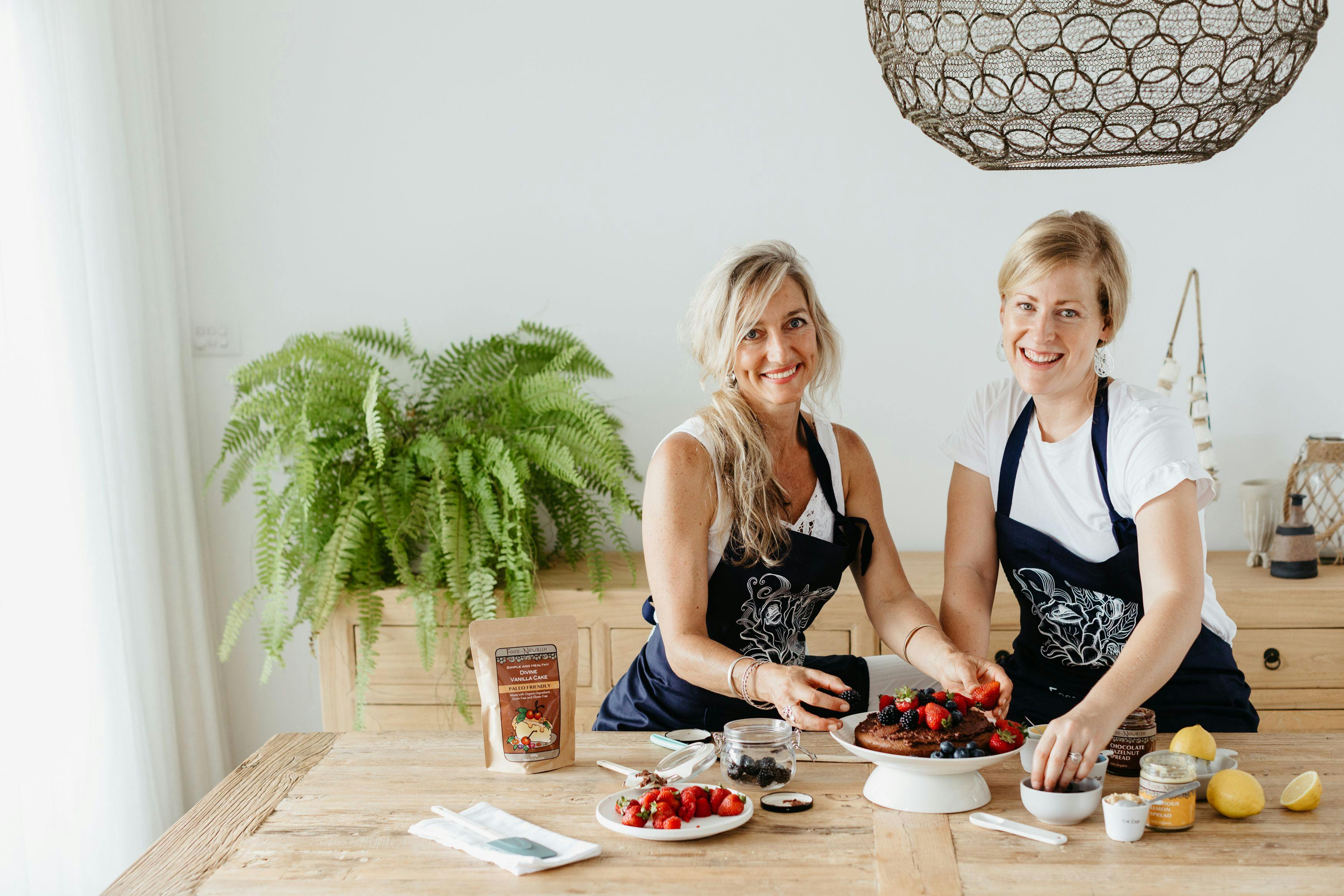
success-stories
Food to Nourish Case Study
Food to Nourish (FTN) launched in 2013 in co-founder Danielle Minnebo's kitchen. As a nutritionist, she saw a major gap in the Australian market for whole food products that are nutrient-dense and made with integrity and love. Now in a custom-built 600m2 production facility in West Gosford, NSW, FTN produces a wide range of high-quality snacks and food products from nut butter to cake mixtures. The company also provides contract manufacturing services which currently takes up 50% of its revenue supplying to competitors as well as companies looking to enter the health food space.
March 31st 2020

success-stories
Kitfit Case Study
Kitfit is a revolutionary retail technology company founded by a deeply experienced management team. It provides proprietary software that results in an online shopping experience that is 50 times faster, 20 times more personalised and 10 times the fit accuracy of existing systems. The company is addressing the issue of misfit - whereby customers return goods that aren’t right - a problem that is costing retailers hundreds of millions each year in returns, loss of brand advocacy and category abandonment.
March 31st 2020
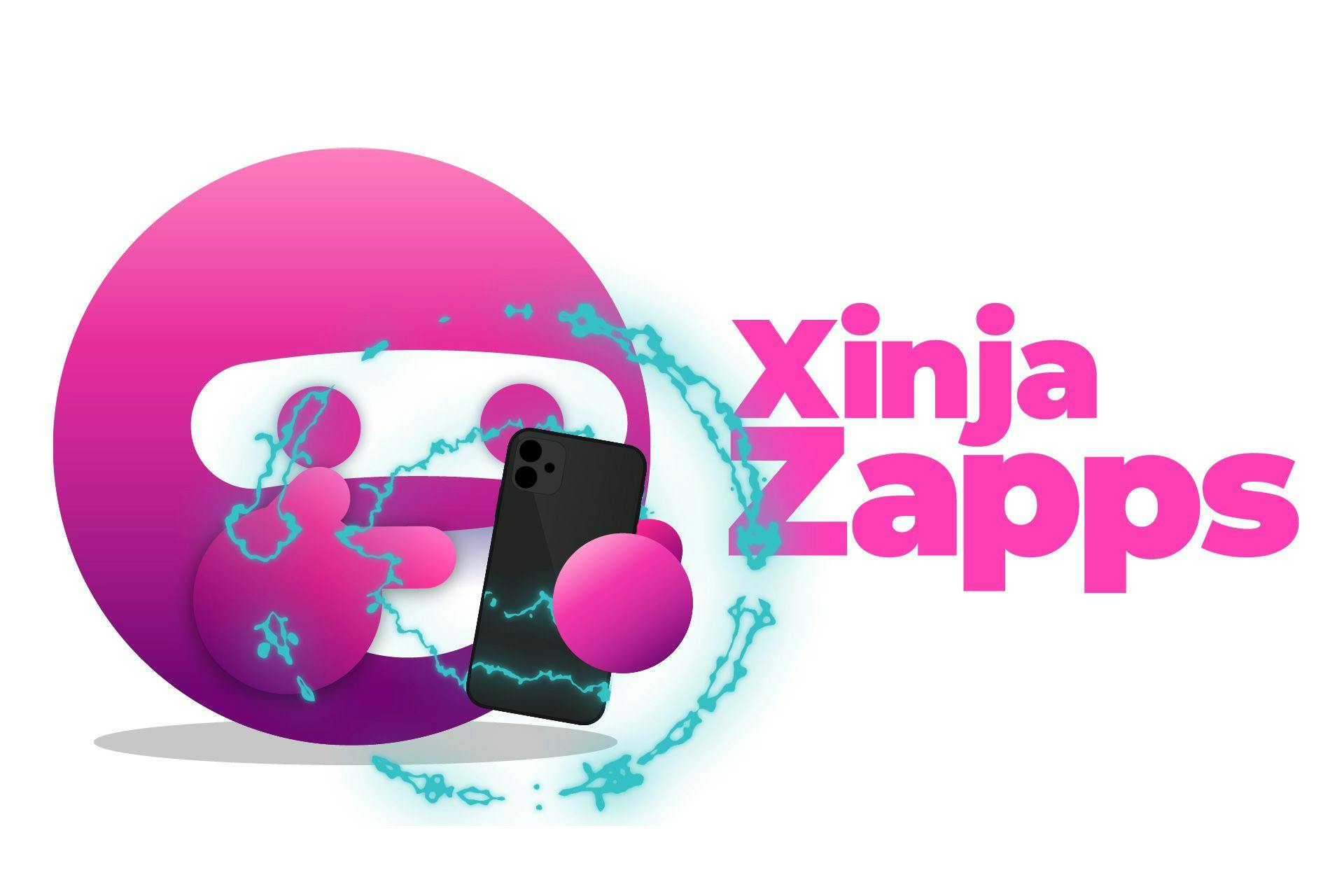
success-stories
Xinja Wholesale Offer Case Study
Overview Xinja is an independently owned and operated Australian neobank disrupting the age-old banking industry right at its core. As our first ever Australian retail equity crowdfunding company, Xinja has continued to kick a whole lot of goals over the past couple of years. It’s raised with us every year in fact, and most recently completed an exclusive wholesale round as it looks to ramp up growth even more. The reason for completing a wholesale round was that Xinja exceeded the CSF asset cap as defined by ASIC, and thus unfortunately weren’t able to expand their offering to our retail investors.
March 22nd 2020

trends-and-insights
Covid 19 Opinion Piece: Stock Markets Have Taken a Hit So What Do Investors Do Now?
Jonny Wilkinson, Co-Founder of Equitise, talks through options now the stock market is down 30% About a month ago the ASX200 index, the value of the 200 largest companies on the stock exchange, hit a record high, which is generally a good reflection of the health of our economy. Fast-forward a few weeks and with the spread of Covid-19, the market has plunged over 30% and is fast approaching the levels of the 2008 Global Financial Crisis. Part of this can be attributed to the economic impact of the virus, slowing down growth and consumption. Another part can be linked to panic selling, with many investors liquidating their assets to avoid further losses, and to have some cash reserves for rainy day scenarios. Where can investors look when traditionally stable sources of growth such as Qantas and CommBank are down over 70% and 30% respectively? The experts are all saying the market will recover and that continued investing will help it to recover quicker and I couldn’t agree more. However in the meantime, there are also alternative options other than the stock exchange which aren’t as sensitive to market conditions. This includes longer-term investment options which are currently ‘illiquid’ such as equity crowdfunding, private equity and infrastructure. Equity crowdfunding is a relatively new way to invest which is highly-regulated and secure. Whilst previously only available to wealthy investors, anyone can now invest in an early-stage company or ‘startup’ in exchange for shares. Whilst investing in early-stage companies carries greater risk, there is potential for greater return as you get in on the ground floor. It’s also highly accessible with investment starting from $50. Because the equity is currently ‘illiquid’, which means the shares can’t readily be sold until an exit event like an ASX listing or a buy-out occurs, it’s a lot less prone to the fluctuations in the market we’re currently experiencing. This week was evidence that some investors are turning to equity crowdfunding in these market conditions. We closed two offers successfully, raising nearly $1 million from 190 investors. The first one, Kitfit, is a really innovative RetailTech app which helps consumers find the products that fit them best when online shopping. The second, Food to Nourish, is one of Australia’s leading health food producers. More evidence was perhaps the launch of a new equity crowdfund this week - Bondi-born eyewear Pacifico Optical which already has $74,000 invested. With most of the market dominated by just a few massive conglomerates, prices for sunglasses and optical were historically very high. Pacifico wants to change that by offering high-quality, stylish and affordable eyewear and is raising capital to ramp up their operations and expand. With the majority of its revenue coming from its online store, Pacifico feels that despite current market conditions, their strong sales will continue. Market correlation and investment returns aside, one of the best things about equity crowdfunding is the ability to support the Australian startups driving the economy from the bottom floor - something that the market might desperately need right now. Startup communities are becoming increasingly important in the modern economic era, and these opportunities allow you to make your investment mean something, whilst also potentially making a return, with funds going straight into growth and job creation, rather than into the pocket of a senior executive. And for the reasons listed above, we believe the equity crowdfunding industry will remain robust throughout this period.
March 22nd 2020

trends-and-insights
Investors Turn to Equity Crowdfunding After Stock Exchange Plummets
The stock market has fallen 30% but Equitise has had one of its biggest weeks, raising nearly $1 million Leading equity crowdfunding platform Equitise last week closed two offers, raising nearly $1 million from 190 investors. This suggests that despite the stock exchange plunging 30%, investors are still participating in alternative investment options that are less sensitive to the current market fluctuations. The first offer was Kitfit - a RetailTech app. Global from day one and already attracting major interest, Kitfit is changing the game for how we shop online eliminating issues millions face daily. Its equity crowdfunding closed on Monday 16 March, raising a total of $502,000 from 116 investors. In the last day alone, over $65K was invested. Out of the total raised, $469,000 was from NSW with 35-44 year olds being the more frequent investors. The second equity crowdfund to also close on Monday was Australian-owned health food brand and manufacturing business Food to Nourish. The company raised $446,000 from 69 investors with 43 of those coming from NSW closely followed by 35 from Queensland. The most frequent age again was 35-44 year olds. Last week the stock market plunged over 30% and is fast approaching the levels of the 2008 Global Financial Crisis. Part of this can be attributed to the economic impact of the virus, slowing down growth and consumption. Another part can be linked to panic selling, with many investors liquidating their assets to avoid further losses, and to have some cash reserves in order to seek opportunities or for a rainy day. This is perhaps why investors are turning to alternative options which aren’t as sensitive to market conditions. This includes longer-term investment options which are ‘illiquid’ and won’t vary too much from the underlying asset value such as equity crowdfunding. Launching only in 2018, equity crowdfunding allows anyone to invest in an early-stage company that hasn’t listed on the stock exchange in return for equity. As unlisted companies, their returns are a lot less correlated to the market. Whilst investing in early-stage companies carries greater risk, there is potential for greater return and it’s widely been acknowledged that investing into these companies is a great way to diversify your portfolio. With volatile market conditions upon us, there might be no better time than to diversify your portfolio which is perhaps what some of the 190 investors were thinking who invested in Kitfit and Food to Nourish. Last week Equitise also launched Bondi-born eyewear label Pacifico Optical which already has $74,000 invested. With the market dominated by a few major players who keep prices high, Pacifico offers high-quality, stylish yet affordable eyewear and is raising capital to ramp up their operations and expand. With the majority of its revenue coming from its online store, Pacifico feels that despite current market conditions, their strong sales will continue. Market correlation and investment returns aside, one of the best things about equity crowdfunding is the ability to support the Australian startups driving the economy from the bottom floor - something that the market desperately needs right now as demonstrated by Scott Morrison’s stimulus package announced yesterday. Startup communities are becoming increasingly important in the modern economy, with funds going straight into company growth and job creation, rather than into the pocket of a senior executive. Founder of Equitise, Jonny Wilkinson, says: “We love giving everyday Australians the ability to get behind the companies that really are the engine room of our economy. It’s an uncertain and difficult time for many, but investing in longer-term options that don’t fluctuate as much with the market is a smart move. It also supports the economy helping these brave, innovative and exciting startups bolstering long-term growth. We believe the equity crowdfunding industry will remain robust throughout this period.” Kitfit Returns for online purchases are at 33% globally, costing retailers hundreds of millions of dollars annually and wasting 70-120 hours a year of consumers’ time. The Kitfit team has created breakthrough technology that is 50 times faster, 20 times more personalised with 10 times the fit accuracy of existing systems. Using a myriad of data, it identifies products in use by people like you from all over the world, only serving you products that actually fit your measurements and meet your needs and taste. Food to Nourish Food to Nourish launched in 2013 in Co-Founder Danielle’s Minnebo’s personal kitchen and quickly moved to its first commercial kitchen in early 2014 before relocating in 2018 to a custom-built 600m2 production facility in the Central Coast. Experiencing consistent and impressive sales growth, no other competitor company produces such an extensive range of health food products that are organic, gluten-free and sprouted with 37 product lines stocked in 800+ retail stores Australia-wide, and abroad in Singapore.
March 18th 2020

offer-news
5 Reasons to Invest in Pacifico Optical
From a travel-inspired business idea to over $1 million in sales, Pacifico Optical is revolutionising the eyewear industry one pair at a time. Chuck on your reading glasses for some reasons you might consider investing in Pacifico. Expansion Opportunities Pacifico is fortunate to have a number of expansion opportunities just waiting to be actioned. To date, the company has primarily focused on the Australian market, making sunglasses that were more male/unisex in design. While these products in this market have been highly successful, there are also opportunities for growth. International expansion: Pacifico has sold sunglasses to 56 countries without a focus on international marketing. In particular, the US market, which is 73x larger than the Australian market, makes up 15% of online sales. Imagine what Pacifico could do if they started to actively market and expand further globally Female-focused eyewear: Finally, with a 67% male customer base, the company is planning to launch a female-focused line to take advantage of a major segment which is currently largely untapped. It also offers a great potential in the prescription eyewear category with 65.2% of Australian women 18+ in need of prescription glasses/contact lenses, compared with 54.8% of men. Prescription eyewear: Sunglasses represent only one part of the larger eyewear industry. The business expanded into prescription eyewear in 2018 acknowledging the high demand in that area for high quality but affordable glasses. Approximately 7 million pairs of prescription glasses are purchased every year and are tipped to increase with our ageing population. Customers of Pacifico Optical can also claim their prescription eyewear on health insurance. Omni-Channel Retail Pacifico employs a variety of retail methods in order to best diversify its sales channels and access a larger customer base. The company’s primary sales channel is its online store, with no permanent physical locations keeping overheads low and efficiency high. Pacifico further leverages digital sales channels via third-party e-commerce stores including Amazon and THE ICONIC. These provide additional brand exposure and reach. Pacifico also employs brick-and-mortar pop-up stores in strategic locations, with the latest in Bondi and Paddington NSW, to build brand awareness and increase access to both warm and cold sales conversions. An Industry Primed for Disruption We all know how pricey a new pair of specs can be. The reason some companies can get away with charging so much is that the vast majority of the industry is controlled by just a few massive corporations. This means they can keep prices high and us consumers can’t do much about it. Pacifico is part of the revolution in the industry, disrupting the outdated big players by providing high-quality products and stylish designs for a much lower price hurdle. In the digital age, no industry is safe from disruption, and companies like Pacifico help create a better deal for everyday consumers. Brand Traction Pacifico has enjoyed some impressive brand traction to date, having featured in a multitude of publications and on the heads of plenty of famous people. Vogue, GQ, Men’s Style and The Australian Financial Review have all featured the brand. So too have Harry Styles, Liam Hemsworth and Dacre Montgomery just to name a few. This is not only great exposure for the company but it’s a proof of concept, showing that Pacifico’s designs are on-trend. Quality-Focused Supply Chain At less than $200 a pair, Pacifico does not compromise on quality. The company has worked hard to establish a strong and flexible multi-national supply chain that keeps costs low and keeps quality high. Pacifico has partnered with industry-leading suppliers and manufacturers. It sources acetate frames from Italy’s Mazzucchelli and Japan’s Daicel, combining them with European hinges and lenses from Carl Zeiss Vision in Germany. To own a piece of this sunglasses brand that’s disrupting the big players, head to the offer page. We always encourage you to review all relevant information on the Offer Page and Offer Document. If you have any questions, we encourage you to reach out to the Pacifico or Equitise teams through the platform’s Q&A facility. Always consider the risk warning before making an investment.
March 11th 2020

success-stories
Where Are They Now? 6 Innovative Companies That Raised With Equitise
As we look to start 2020 with a bang reaching the $40 million mark, we’ve decided to check in on some companies we’ve raised capital for, updating you on their amazing achievements since hitting their targets on the Equitise platform.
March 11th 2020

offer-news
Kitfit App Demo
Kitfit reveal a sneak peek of their app before launch in the next few months.
March 10th 2020

testimonials
Kitfit Investor Testimonial - Edward Mandla
Ed Mandla, Board Members of Several Tech Companies, tells us why he invested in Kitfit.
March 10th 2020
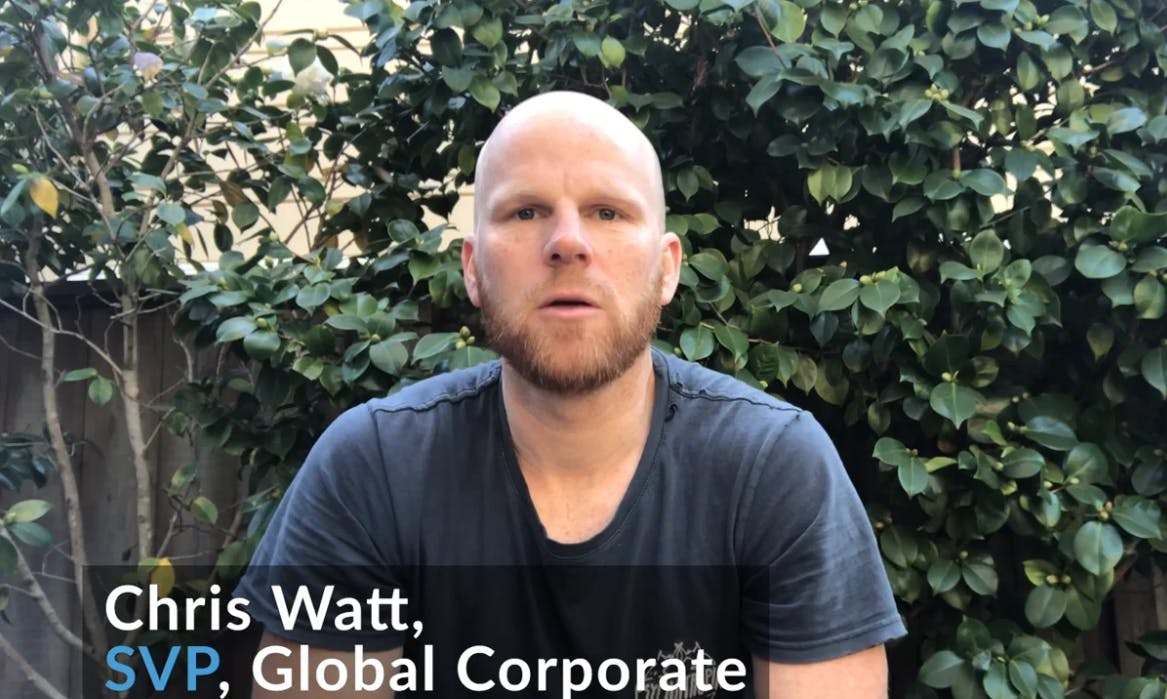
testimonials
Kitfit Investor Testimonial - Chris Watt
Chris Watt, SVP of Global Corporate Strategy of Tigerspike, explains why he invested in Kitfit.
March 3rd 2020

offer-news
Xinja Bank Launches Capital Raise for Sophisticated Investors as Part of Series D
MEDIA RELEASE 4 MARCH 2020 Xinja Bank launches capital raise amid unprecedented customer demand Australia's independent neobank has raised around $70 million to date It holds more than $300 million in deposits just 7 weeks after launching Stash savings account with 2.25% interest rate Offer open to sophisticated or wholesale investors: minimum investment $20,400 Xinja Bank, Australia's independent neobank built entirely for mobile, has launched a fund raise aimed at sophisticated investors, with a minimum of $20,400 to invest. The capital raise is part of Series D, and funds will be used to continue to build the lending side of the business, and regulatory capital. Xinja Bank launched a market-leading savings account, alongside its bank account, on January 15 2020. In just seven weeks, more than $300 million in deposits has flowed into the bank. Xinja now has 25,000 customers and more than 41,000 accounts. "This is a massive response from customers,” said Xinja Bank founder and chief executive Eric Wilson. “It’s a big vote of confidence in Xinja’s style of banking,” he said. Xinja was built from scratch to deliver better banking to customers. It uses the latest cloud-based banking technology. It has no costly, old-style IT to patch, no expensive bricks and mortar branches to run, and a tight team of Xinja-workers who help deliver the kind of banking Australians deserve: lower lending rates, higher savings rates and technology that helps them get the most from their money. "People expect seamless technology in almost everything they do daily: from ordering food, to booking holidays or a ride home," Mr Wilson said. "Xinja is in that category. We have built a bank from scratch, where the technology is intuitive and fun, and that offers a better way to bank." Xinja has raised around $70 million in total, from Australian and offshore investors through Series A, B, C and the first 40% of Series D. This includes two equity crowdfunding (ECF) rounds, held in January 2018 (Australia’s first ever equity crowdfund) and January 2019. Xinja still holds the record for the most raised from equity crowdfunding in Australia. It is now opening Series D to ‘sophisticated’ or ‘wholesale’ investors (as defined by ASIC and the Corporations Act) with a minimum of $20,400 to invest, via investment platform, Equitise. Equitise partnered with Xinja through its two ECF campaigns. Shares are priced at $4.08 a share and the minimum investment is $20,400. The 1,220 investors in the first ECF bought shares at $1.25 each. A year later, in January 2019, Xinja issued shares at $2.04 each, attracting another 1500 investors, with a minimum parcel of $255 for each investor. “We would like to have done another equity crowdfund to open this to all our customers,” Mr Wilson said. “However, equity crowdfunding regulation prevents us from doing that,” he said. “As part of our recent submission to the Australian Senate Select Committee on Financial Technology and Regulatory Technology, we recommended that this restriction be lifted.” Xinja was launched in May 2017. It built an app, launched a prepaid card, and then secured a full bank licence in September 2019, opening bank accounts for customers on the same day. It appointed former Tesla engineer Thomas Vikstrom to its Board, and banking futurist US-based Brett King as a Board advisor. Mr Wilson said Xinja Bank's purpose is to provide banking that helps customers make the most out of their money, and get out of debt faster. Its Stash account, which offers a market-leading interest rate at 2.25%, has no strings attached: it's a variable rate, with no minimum deposit, no minimum monthly investment, no intro period, and no demands around the number of account transactions each week or month. "It's an entirely transparent offer. It speaks to the Xinja Bank ethos of trying to do the best by our customers, no strings attached." Xinja Bank will offer personal and home loans later this year. "We have had a huge influx of customers and deposits, so much so we have met our target for deposits already,” Mr Wilson said. “We welcome each and every new customer who has made a decision to bank with us and will do our best to keep our promises.We are looking forward to continuing to grow the bank, with some really amazing banking experiences and features.” Fast facts: Xinja raised more than $17 million, $2.4 million via equity crowdfunding in Series A and B Series ‘B-C’ raised $6 million, with a further $27 million in Series C. This includes a second equity crowdfund, which raised more than $2.5 million Series D is 40% complete with $20 million raised so far Minimum investment parcel in current offer is $20,400
March 2nd 2020
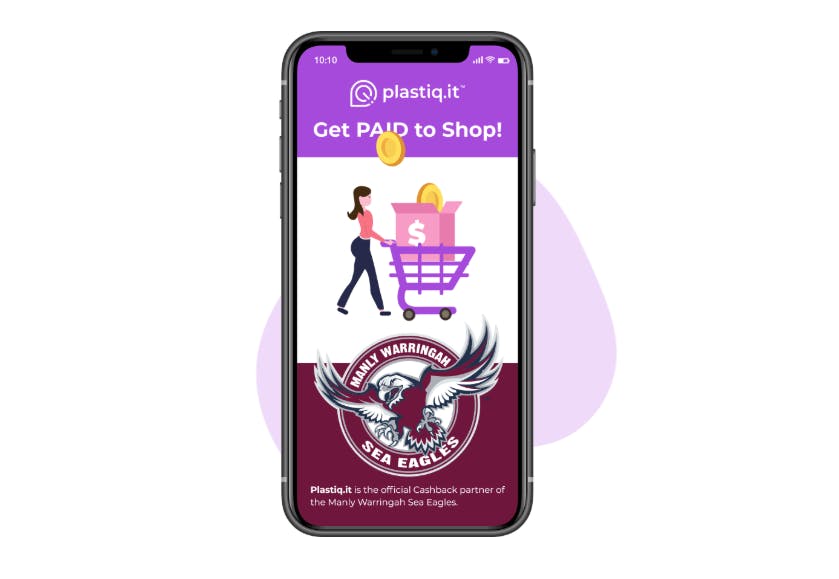
success-stories
Plastiq's Successful Raise
Plastiq is a revolutionary consumer cashback provider that leverages the monetary value of transactional data to reward consumers. Members automatically receive cashback to their Plastiq account on their online and in-store purchases at participating merchants, without the need for merchant integration, loyalty cards or receipts. With a world-class team, including Shark Tank’s Andrew Banks, Plastiq’s proprietary technology platform has streamlined the cashback experience for businesses and consumers, facilitating a mutually beneficial relationship for all involved. Minimum Funding Target: $50,000 Maximum Funding Target: $400,000 Public Launch: 29 January – 19 February Total Raised: $400,000 Average Investment: $1,260.28 Total Investors: 316
February 19th 2020

offer-news
Revolutionising Online Shopping One Kit at a Time
Having recently gone live on the platform, Kitfit is an exciting technology company looking to turn the retail industry on its head. This disruptor has built from scratch a range of patent-protected technological products that could change the way you shop online. Kitfit has already smashed its minimum funding target having raised well over $250,000 so far. You can invest from as little as $360 and share in the success of this Aussie innovation. Kitfit’s proprietary technology removes the uncertainty and inaccuracy from shopping to provide consumers with the optimal fitting options, resulting in 10 times the fit accuracy, 20 times more personalisation and 50 times faster shopping experiences! We could talk all day about the technological ecosystem and matching algorithms and AI bot automation and so on, but let’s focus on our top reasons to consider investing in Kitfit. Solving a massive problem by creating benefits for all We all know online shopping is the future of the retail industry, already comprising $2.8 trillion in sales globally and forecast to grow to $4.8 trillion by 2021. And yet there are still some major issues. How many times have you shopped online and had your search query return just a cool 40 pages of items to scroll through and after having picked one, had it arrive and it either doesn’t fit or it’s not what you expected, even though you consulted size charts and previous purchases? Not only does this waste your time (approximately up to 120 hour per year) and on occasions your money, it costs retailers hundreds of billions in returns, loss of brand advocacy and even category abandonment when we give up because it’s all too hard. It also has a terrible environmental impact from the shipping and also all the items that aren't returned that end up in landfill. This issue of ‘misfit’ and its flow on economical and environmental effects is one that needs to be addressed. Enter Kitfit - innovative, proprietary technology that changes the way you shop. Not only does it make sure your clothes fit better, it also can match you with products based on your personal preferences and interests - narrowing your options down to only the best options. For businesses, the technology can not only save them money but also drive sales and conversions. Highly scalable technology. Global business from day one You might have noticed a fair bit of cycling imagery currently in the deal room which will be the first vertical the Kitfit team launches in before it quickly expands into other activewear markets including gym, swimming, hiking, campaign and yoga to name a few. Without even needing an API to connect new retailers, Kitfit’s flexible proprietary technology can be implemented immediately, across markets which means the business can scale quickly and be global from day one. Cycling was just a good place to start, with a passionate community and clothing items where fit is extra important. And let’s face it, if the tech can get it right for skin-tight, aerodynamic, lycra-clad cyclists, then getting it right for a gym t-shirt will be a piece of cake. Huge social media following Another exciting part of this company is the team’s incredible marketing prowess. In just 8 months they were able to build and become the No. 1 Instagram account for premium road cycling kits, surpassing a lot of existing giants in the process. They now have over 100k followers reflecting the effectiveness of their network effect strategy, using a combination of influencers, industry professionals and enthusiasts to create viral content. Not only does this bode well for their full product launch and the potential traction, but is also a further sign of how rapidly the team will be able to scale the product into other activewear markets. A pretty awesome team at the helm Led by Founder and CEO Andrew Jacobs, the leadership team at Kitfit has been kicking goals for years. Andrew co-founded and grew a New Zealand startup to a listing on the NZX in 2013, ranking as the 62nd fastest growing technology business in APAC in the Deloitte Technology Fast 500 under his leadership. With a combined 45 years from a range of industries and startups, and 12 years together as a team, Andrew, Joe, Mikkel and David are the perfect people to head up this exciting product. They have worked at startups that have raised significant funding, been acquired and listed. Their experience ranges from Motorola Ventures to News Corp, Yahoo! and Hotels Combined. This history and experience will play an important role in scaling Kitfit to be the global player it can potentially be. Key strategic partnerships secured Another exciting part of this investment opportunity is the many partnerships and achievements that Kitfit has already secured. It partnered with cycling retailers Rapha, Biehler, The Heavy Pedal and Cycle Republica during its MVP phase, with 11 brands secured as launch partners and a further 87 on the waitlist for post-launch onboarding. Kitfit was also granted a $61,000 R&D Tax Incentive, the highly competitive Jobs for NSW MVP grant in 2018 and was included in the Google Startup Program in 2019 alongside only 9 other Australian technology startups. Kitfit went on to win the Customer Solutions Competition at Google. With this deal well on its way, we’re very excited to see what comes next for this Aussie innovator. While these are our top reasons to invest, they do not constitute investment advice, so please read through the deal room and offer document yourself. Always consider the risk warning before investing.
February 11th 2020

for-investors
How Do I Actually Make Money From Private Company Shares?
Let’s be frank, this is what most of you are probably thinking when looking to invest in one of the Equitise offers. In fact, we know so, that’s what you keep telling us in our post-raise surveys. There is definitely uncertainty when it comes to making money from companies not yet listed on the stock exchange, just as there's uncertainty with many listed companies. This is one of the reasons this new way to invest was only recently opened up to everyday Australians despite being legal in other countries for years. There is risk involved as currently, the investment is ‘illiquid’ (meaning you can't sell your shares as there is no exit opportunity just yet). High School economics teaches us that with greater risk, comes greater returns, generally. It’s the same principle here. Early-stage investing is usually seen to be riskier than investing in more established businesses as there is a lot more unknowns. However, with greater risk comes the potential for greater returns which is why we advise four things: Only invest what you can afford to lose If you can, invest in early-stage investments as a way to diversify your portfolio, evening out the risk, but also maybe the return, by investing in more established businesses as well Do your research. We do ours, but it’s still important you understand the business you are looking at investing in, which is why there is a comprehensive offer document Be prepared to be in for at least the slightly-longer term. These investments are not yet liquid and it can take several years before you might realise a return. Read on for how that might happen So how do you actually make money off these investments? There are a range of different ways investors can potentially earn a return on their investments. Here’s a quick breakdown of the options: IPO: An initial public offering, or float, is one of the more common and better-known exit opportunities. Generally, once a company reaches a certain size, they may wish to raise a larger amount of capital, and provide their shareholders with a way to exit their investment. In Australia, this usually takes place through the ASX. The company offers a new set of shares to investors, and in doing so also becomes a publicly listed company on the stock exchange. This means that existing shareholders and interested parties can buy and sell their shares relatively easily, for a market-determined share price. But not all private companies want to go public, so what are the other options? M&A: We’re sure you’ve seen this combo of letters before but what does it actually mean for you and your bank account? M&A stands for mergers and acquisitions, representing the range of business transactions that can occur between business entities, both private and public. A merger is where two businesses combine into a single entity, often so they can benefit from greater scale and work together. An acquisition is where another entity purchases a majority stake in the company and takes control. When this occurs, the impact on you can vary slightly depending on your shareholder agreement, but generally, you will have an option to sell your shares in the transaction, and usually, this is a good thing, as the company making the acquisition will have to pay a premium on the share price to complete its transaction. Share Buyback: A company might back itself to such an extent that it wants a greater degree of exposure to its own growth. In this scenario, management would facilitate an offer to purchase shares from existing shareholders at a determined price level. This provides investors that choose to take the deal an opportunity to exit their investment. Dividends: Distributions of company profits aren’t only limited to publicly listed companies. If a private company is profitable it may elect to return a proportion of these profits to its shareholders on a regular basis. Shareholders still maintain their holding of the company and receive dividend payments reflecting their share of company profit. Generally this happens later in a company’s lifecycle where it no longer needs to reinvest all profits into growth. Private Secondary Market: The ASX is an example of a public secondary market where existing shares can be traded between buyers and sellers. Private secondary markets allow private company shareholders to exchange shares between one another should they elect to exit their investment, or desire to increase their holding. Off-Market Transfer: Similar to a private secondary market but in a more manual sense, if two individuals decided to make an exchange of a shareholding and cash, they can do this privately in accordance with their relevant shareholder agreement. Why you might want to get involved in an early-stage business: Return on investment might be greater as you’re getting in on the ground floor when share prices are low. Imagine investing in a company like Apple or Google right from the get-go (sure beats 2% p.a. on a standard savings account!) Investment is accessible starting from as little as $100 for some deals, which is a nice break from other investment opportunities at the moment and allows you to diversify (invest in many) It’s also exciting being given the opportunity to become a co-owner in a business you’re passionate about. So far all of our companies have chosen equity crowdfunding because they want ‘the crowd’ around them, drawing on those shareholders for advice and feedback on new products etc Private company investment is a great way to diversify your portfolio. It can provide protection from market forces that might impact on public shares. Support something important! A lot of the companies we work with are doing genuinely amazing things for the world whether they’re helping to save the environment or providing opportunities to those in need. You might not make a difference with a Telstra investment but you can put your money towards a positive outcome with some of our clients If there’s anything in particular you’re curious about, send through an enquiry to [email protected]
February 11th 2020
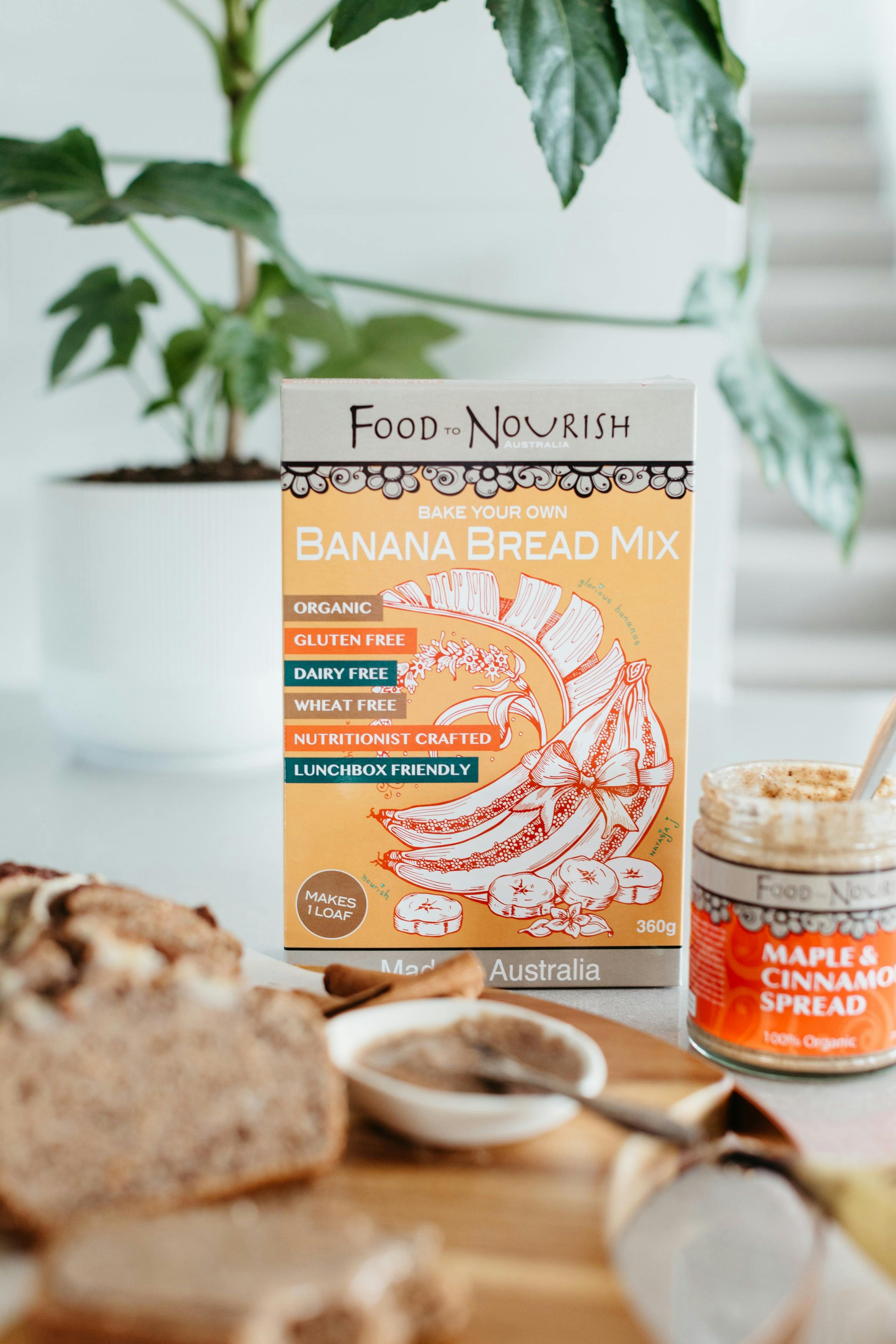
offer-news
Health Foods Just The Tip Of The Iceberg For Food To Nourish
There’s more than meets the eye for the exciting health food manufacturer, Food to Nourish (FTN). As an Australian-owned and operated organic and gluten-free food producer, here’s the lowdown on why we think this is an investment opportunity with a bright future. Profits: Unlike many early-stage businesses, FTN is already profitable with consistent and strong sales growth over the last three financial years. Profitable even back in FY18 and with a growing demand they could not meet, the company decided to upgrade to a new larger and custom built factory, resulting in a dip out of profitability in FY19. Now settled in the new home, the financial strength of the company is once again being demonstrated, reaching profitability and achieving the strongest sales month on record in Oct FY19. This consistently growing profit level can be attributed to an improvement on gross margins which are up from 50% in FY17 to 55% in FY19 reflecting a high degree of product efficiency stemming from strong vertical integration. Existing Traction: FTN is an established and validated business. Its products are already distributed in over 800 retail outlets nationally with another 5 outlets in Singapore. The demand has seen the team move to bigger premises twice and develop 37 product lines. No other Australian company produces such an extensive range of health food products that are organic, gluten-free and sprouted. And all this success is without significant investment into the online store, which in a world of e-commerce represents a massive opportunity to boost sales. Currently sitting at only 3% of the total revenue share, the team is aiming to grow this to 10%. Assets: FTN’s 600m2 West Gosford facility represents a solid fixed asset that further paints a picture of stability for the company. Unlike some competitors, FTN's custom machinery means it can take greater control of the production process and benefit from a range of scale factors. We’ve had a few queries about the negative asset balance, with $350,000 in non-current liabilities. However after our due diligence process we’re comfortable since this line item is almost entirely composed of an interest-free Regional Growth Loan from the NSW Government, alongside a smaller interest-free loan from company Directors in the startup process. As these loans are interest-free and therefore not urgent, the team has decided to remain focused on company growth first while gradually paying down the balances. This is further reflected as the Director loan is only able to be paid out with company profits and no more than 25% of profits in a year. Valuation: To get slightly more technical, another great reason to consider an investment is the valuation placed on the company for this raise. Despite being profitable and running a unique and well-equipped factory, FTN is currently valued at $1.4M, which was set by a cornerstone investor coming in on this round. Market Opportunity: FTN is perfectly poised to take advantage of a really exciting market opportunity both at home and overseas. It goes without saying that the health foods market is experiencing a period of rapid growth worldwide. The Australian Organic Market Report 2019 estimates a compound annual growth rate of 13% since 2012. The global organic packaged food market in 2017 topped close to US$30 billion. Australian brands, particularly in the health food industry, have a strong track record in expanding their offerings to Asian markets. FTN has already begun to expand overseas into Singapore. They can use this experience and the funds raised to further leverage existing capabilities to expand elsewhere into Asia and worldwide. Contract Manufacturing: Finally we come to what is potentially the most exciting reason to invest - contract manufacturing (CM). There’s a few reasons why CM is so important in this story: FTN has unique manufacturing capabilities that enable flexible and accessible minimum order quantities for burgeoning health food brands Rapidly growing market for health foods: FTN is not only benefiting by selling more of its own products, but can also capitalise on other businesses who need CM services for its products An increase in output for both the FTN brand, as well as current and potential CM clients, results in a decrease in cost of production, increasing margins and product efficiency for the company resulting from scale When other companies need to manufacture health food products, there might be a number of barriers to entry. It might be a smaller player without the required scale to run its own facility. Or a larger player just entering the market without the capabilities in its own factories to produce certified organic, gluten-free and vegan products. FTN’s CM service provides high levels of support, manufacturing and nutritional knowledge and accessible terms with third-parties. In two years the CM arm has doubled now comprising 50% of FTN’s revenue, and is forecast to grow to over 60% by 2022. Manufacturing over 40 product lines for 7 current clients, the company needs to upgrade the factory’s capacity with new equipment following this raise to meet current client requests and take on an additional 4 clients who wish to work with FTN. These clients provide stable, recurring revenue and allow FTN to receive further benefits from scale due to larger ingredient order quantities and efficiencies. So while it might seem counterintuitive, to gain from the success of your competitors, in FTN’s case its unique capabilities make this yet another source of growth. These are just a few of the reasons we think you should consider investing in FTN. Of course, it’s important that you review all relevant information yourself and make a careful assessment based on your own financial position. If you have any questions, we encourage you to reach out to the FTN team through the platform Q&A facility. Always consider the risk warning before making an investment.
January 20th 2020

success-stories
Equitise's Up Rounds
What is an Up Round? Unlike public listed companies, private company shares are not traded on a public stock exchange such as the ASX. Increases in company valuation and share price are reflected in ‘up rounds’, where the company revalues itself at a higher amount during a new capital raise. A higher valuation often reflects company growth and the potential for shareholder returns upon an exit opportunity such as an IPO. Equitise’s Up Rounds Over the past 12 months, 7 companies that have raised capital on Equitise have come back to raise capital again at a higher valuation: Xinja (+63%), Goodments (+104%), Car Next Door (+102%), GoCatch (+28%), Digital Classifieds Group (+257%), Maker&Son (+76%) and Retirement Income Group (+135%), averaging +109% across the raises. These companies have performed particularly well all having experienced up rounds within a few years of their first raise with Equitise. Furthermore, no company we’ve raised for over the last three years has experienced bankruptcy which is also another measure of success when working with early-stage companies. This is a great outcome for the companies and Equitise investors, which shows the focus and effort the Equitise team puts into sorting and selecting some great companies to raise on the platform. Two standout CSF up rounds were the social impact investment platform Goodments and the neobank Xinja, gaining 104% and 63% on their valuation respectively after their 2018 raises. Xinja’s 2018 raise was the first retail equity crowdfund in Australia and raised a staggering $2.4 million from 2,768 investors - an amazing feat given equity crowdfunding was largely an unknown investment channel. Xinja went on to raise another $2.6 million with Equitise in 2019. Its share price from round one to two rose from $1.25 to $2.04, reflecting the granting of a full banking licence, rapid customer base growth and a strong outlook. Equitise’s up rounds haven’t only been limited to CSF, with a number of wholesale raises also experiencing increased valuations. Digital Classifieds Group, a portfolio of online classifieds platforms, completed a raise in 2017 that experienced a 257% up round, increasing their valuation from $7 million to $25 million. Car Next Door raised $770,000 in 2018 from 24 sophisticated investors. The Shark Tank success story then raised another $210,000 on Equitise, having secured $7.7 million from Hyundai and Suncorp to facilitate further growth. Its valuation increased 102% from $27 million to $55 million. When do I see money back? Whilst these up rounds are extremely positive and a good sign that the business is doing well, it may still be some time before investors receive money back. This often comes through an acquisition by another company or an IPO on a stock exchange. So now is the time to keep an eye on the business and maybe an opportunity to invest some more if you think it will continue to do well but as always investing in startups is risky and you shouldn’t invest what you can’t afford to lose.
January 8th 2020

success-stories
ReadiiTel Case Study
ReadiiTel Pty Ltd is a 100% Australian-owned telecommunications and managed Information Technology (IT) services company providing clients with a fast, flexible and reliable private network, Australia-wide. Through a custom-built optic fibre network and personalised customer services, ReadiiTel enables businesses to achieve their maximum productivity and performance. The company believes that every business deserves the same level of care and customer support regardless of their monthly spend, understanding that some businesses live or die based on internet access and IT support. Australia has long suffered from sub-par internet connectivity – currently 62nd in the world for broadband speeds - and service as a result of outdated telcos that are too big and impersonal. ReadiiTel strives to change this, providing Australia with the necessary solution.
December 23rd 2019

trends-and-insights
Year in Review 2019
What a year it’s been here at Equitise! As the next decade fast approaches, we’re taking a look back on everything we’ve achieved over the last twelve months, and the lessons we can take with us into the new year. This year marks the first full year everyday Aussies could invest in early stage companies. In 2019 so far (ReadiiTel is still live until 9pm tonight) we’ve raised $12 million from more than 5,000 investors. $9.5 million came from equity crowdfunding in AU & NZ, while another $2.5 million was raised through wholesale deals. We’ve raised capital for 24 companies which is an increase of 100% compared to 2018, something we’re really proud of and a positive indication of where equity crowdfunding is heading in Australia. A few offer highlights: Xinja - In 2018, the neobank Xinja was the first company to raise capital through equity crowdfunding and in 2019, almost a year to the date, they returned and were the first company to undertake a second equity crowdfund. Xinja went on to raise another $2,573,970 (515% of the minimum funding target) at a share price of $2.04 on top of their initial $2,779,000 (556% of minimum) at $1.25. A whopping 1,543 investors got involved and helped Xinja to hit their minimum in the first day the offer was live! Rhinohide - Rhinohide was another double raise success story in 2019. The Perth-born 4x4 body armour startup hit their $500,000 maximum funding target. With numerous investors disappointed they missed out, the Shark Tank success story opened up a second round the following week, raising another $161,250 in seven days from the crowd, boosting them towards their USA and Asia expansions. Sofi Spritz - This Bondi-born ready-to-drink cocktail brand enjoyed a wildly successful raise with Equitise. Aiming to bring their Australian version of the Italian aperitivo to the wider market, Sofi raised $641,448 from 320 investors and was featured in over 50 press articles over the duration of the campaign. Expect to see this Summer beverage in a store near you soon! It was also great to see Equitise alumni Xinja, Goodments, Car Next Door, GoCatch, DCG and Maker&Son return to raise capital at higher valuations along with Retirement Income Group returning for its fourth time. Some businesses won’t raise the money they need via equity crowdfunding. This year it was three fantastic companies: Urbotanica, The Clean Collective and Purahealth. Like all forms of raising capital, success is never guaranteed, and ultimately with equity crowdfunding it’s up to ‘the crowd’ to decide. However Equitise and these three businesses have learnt from these failures, taking invaluable lessons on board for next year. Some of these include the importance of pre-funding to ensure there is momentum in the offer from day one, the presence of strong press and the benefit of launching an offer as quickly as possible to maintain the interest of those who have registered to hear more. So with that we wish you a very Merry Christmas and a Happy New Year! Thank you for being a part of the Equitise community and we look forward to bringing you more in 2020. Now for some fun. Businesses that only came about in the last decade... if you can believe it: Snapchat - Founded in 2011, this app is now worth over $20 Billion on the NYSE. Instagram - After this photo app’s founding in 2010, Facebook acquired it just a couple years later for $1 Billion. Canva - An Australian startup founded in 2012, Canva is now valued at over $3 Billion. Tinder - First released in 2012, the infamous dating app is worth around $10 Billion. Best articles of 2019 Best consumed on the beach with a cold drink in hand What AngelList learned from analysing over 1,000 deals LinkedIn’s thoughts on the big ideas of the next decade Draw inspiration from these successful Australian startups The best performing stocks of the decade
December 4th 2019
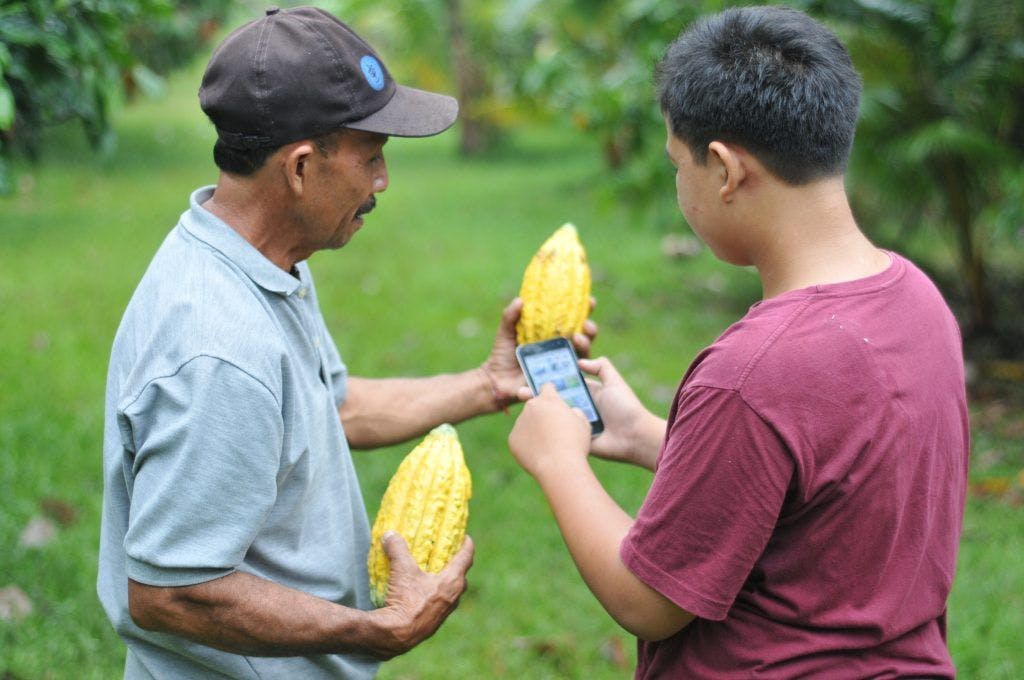
offer-news
Ag-tech impact company AgUnity partners with Equitise for Equity Crowdfunding campaign
MEDIA RELEASE 05 DECEMBER 2019 Former Goldman Sachs and Lehman Bros banker David Davies, founder of impact startup and AgTech business AgUnity, today announced the launch of its equity crowdfunding campaign with Equitise to raise $1.25 million. The disruptive AgTech is an innovative technology platform and app that connects organisations and service providers with the “last-mile”, defined by the business as the 2 billion smallholder farmers, fisherfolk and their communities in developing countries regions. The AgUnity business provides poverty stricken communities with an affordable smartphone and access to its super app, introducing farmers to services such as a digital identity, business insurance, a bank account and a trusted space to transact. The AgUnity app was first designed as a solution to overcome a lack of trust by enabling secure, immutable peer-to-peer transactions recorded on the blockchain. Farmers can sell and distribute their products through the online ledger that revolutionises the way they trade and communicate, bringing billions of non-digital transactions online, in a simple, transparent way. The AgUnity super app also helps farmers to plan for crop spoilage and overcome corruption, unreliable record keeping and restricted market access. The startup has evolved beyond recording farm and industry transactions through the deployment of hundreds of applet within its “Super App” ecosystem. This means the technology solves additional issues the western world takes for granted, such as access to a bank account. AgUnity has a unique value proposition and in three years, the impact company founded in Brisbane has grown from a startup to a business with a market capitalisation of $11 million. The business has a multi-stream revenue model and operates a multi-faceted business model. Revenue streams include subscriptions fees charged to service providers for each user, transaction fees and technology development and licencing fees. The businesses’ larger development contract fees come from corporations and organisations working with those in need of AgUnity's technology ecosystem. Future revenue opportunities for AgUnity exist in the white-labelling of the product plus data insights. With this multi-stream revenue model and massive target market on both the supply side (organisations) and demand side (farmers), there is a major growth opportunity for AgUnity. AgUnity, plans to become the first ag-tech super app to reach and meet the needs of millions of farmers globally. A super app is an emerging category of mobile application designed around a secured and safe ecosystem of many complementary applications and is created as a multitask tool intended for everyday use. AgUnity plans to follow in the footsteps of other dominant super apps such as WeChat and Go-Jek, tailored to the needs of the developing agricultural world that has traditionally been left behind by technological innovations. Brisbane-based founder David Davies has an extensive history working in technology for global investment banks and firms. He created AgUnity as a solution for the farmers in developing countries who don’t have access to simple services such as a digital identity, bank account and secure, online records of transactions. “Three and a bit years ago we stumbled across an idea that had the potential to change the lives of the 2 billion lowest-income people on the planet. We believe that AgUnity will be the missing piece of the puzzle that connects thousands of organisations to billions of smallholder farmers, fisherfolk and their communities,” says Davies. “We’ve rolled up our sleeves, travelled to and lived in remote and rural communities, conducted pilot projects, built up a highly talented team and continued our technology development and R&D. We’ve won global competitions, been published by the world’s largest financial and agricultural bodies, and secured contracts with multi-billion-dollar Non-Governmental Organisations (NGOs). Now it’s time to share the opportunity to own equity in our business with like-minded, everyday Aussies,” he says. “With AgUnity, I see an opportunity to bring more than 2 billion people into the digital and financial economy. This isn’t a ‘could happen’ scenario – it will happen - it’s simply a matter of time. Just like Apple changed the world for the top billion with the iPhone, my belief is AgUnity has the same potential to transform the lives of the 2 billion,” he said. AgUnity is a digital solution that deals with the immediate challenges including corruption, unreliable record keeping, restricted or no access to markets, bank accounts and financing in third world countries. As a philanthropic business venture, AgUnity works with service providers such as banks, insurance companies, commodity buyers, traders and NGOs to provide farmers with smartphone technology. AgUnity harnesses the latest technological innovations, such as distributed ledger technology, to provide the benefits of digitisation to those in need. AgUnity’s solution prioritises user experience, having been developed alongside key agricultural communities. It enables offline capability in core platform transaction functions (such as “Give Harvest” or “Receive Cash”). These peer-to-peer transactions can be completed without signal and later reconciled when signal connectivity resumes. Access to bank accounts then allows for the farmer to start saving and access insurance that might limit the devastation crop damage can cause. These examples and more all help to break the cycle of poverty. Co-founder of Equitise, Jonny Wilkinson, welcomes a business creating such a positive impact around the world onto the Equitise platform. “AgUnity is creating solutions to improve the lives of small farmers globally in developing countries. It’s not only going to potentially help millions, but it also has a strong revenue model, earning fees from both the supply side (service providers) and demand side (farmers). We therefore think it’s a great opportunity for like-minded investors to get behind such a great Australian Ag-tech,” he said. “Over 2 billion smallholder farmers, fisherfolk, and their communities are the most financially and technologically excluded people on the planet. They suffer on a daily basis due to trust issues that people in developed nations solved a century ago and nowadays take for granted. This is something AgUnity is working to solve and will be closer to achieving by raising capital with Equitise,” said Wilkinson. In 2018, AgUnity were selected as the exclusive technology provider for the world’s largest fresh-food supply-chain tracking project for a $50B retail chain. Since then they have built and deployed a complex software platform, integrated with IoT devices tracking temperature, location and trip time, from farm to retail store. AgUnity has also delivered solutions for the Wool industry, and has been approached by the Red Meat and Sustainable Fishing industries for technology services. AgUnity’s first of its kind smartphone technology provides the tools for large companies and NGOs to have the positive impact they often strive for and gives millions in poverty access to basic digital services that allow individuals to securely transact and sell goods through its super app. Retail and sophisticated investors will be able to purchase shares in AgUnity through the equity crowd fund with Equitise in the first stage of the company’s overall $5 million Series A capital raise. In early 2020, AgUnity will look to raise an additional $1.75 million from wholesale and sophisticated investors in a second round and a further $2 million from a third.
November 21st 2019
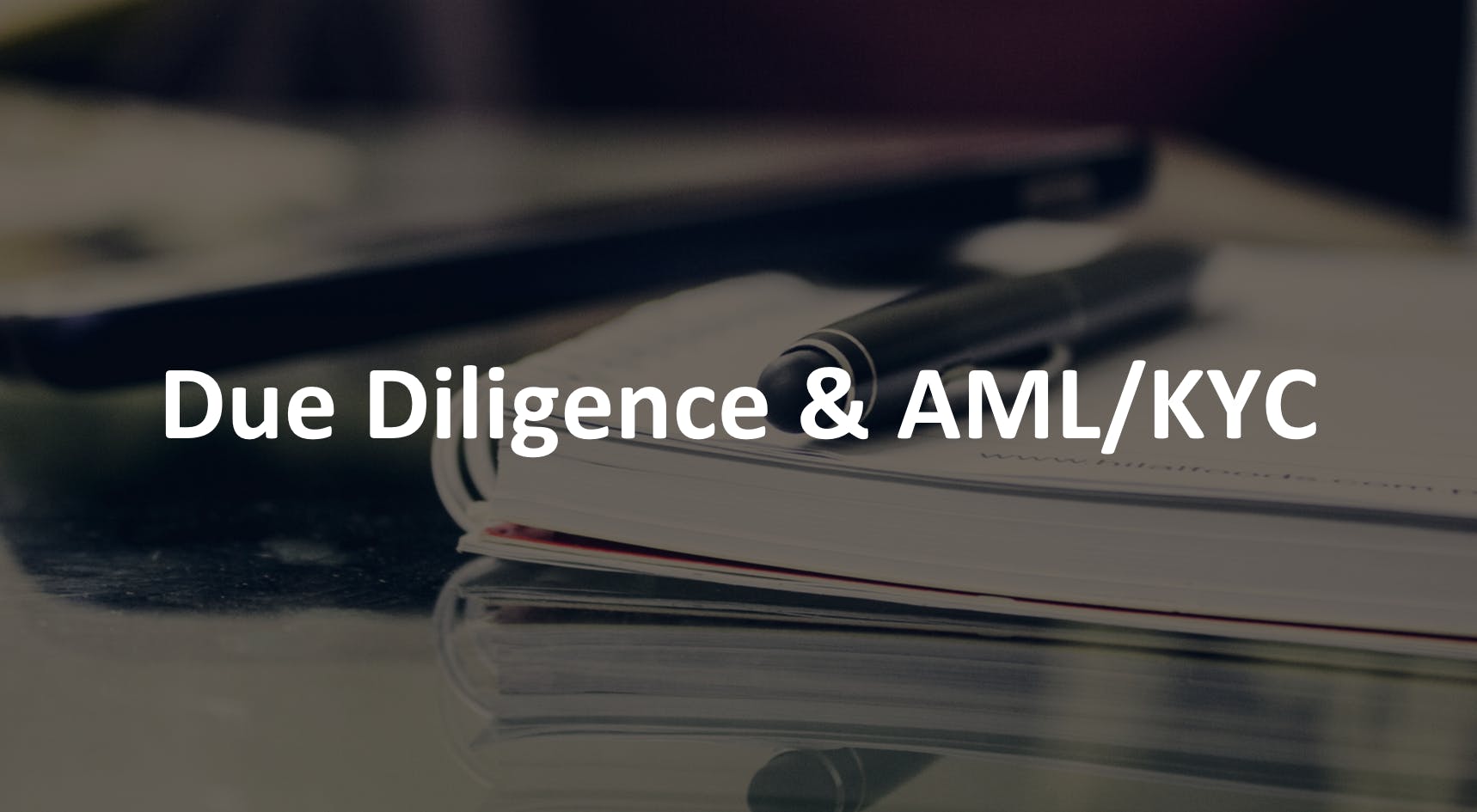
for-companies
DD & AML/KYC - What Does it All Mean?
What is Due Diligence? Equitise employs a thorough approach when deciding to conduct an equity crowdfund for a company. The core component of this is our rigorous due diligence and AML/KYC (Anti-Money Laundering / Know Your Customer) processes. In fact only a small number of the companies that we speak to go on to raise capital on our platform as we ensure we only promote high quality and highly vetted deals to our investors. Due diligence is a process of screening prospective companies in a number of respects. This can include anything from financial history, financial forecasts, key team members and the products themselves. ASIC and the Australian government have prescribed certain minimum levels of due diligence checks that Crowd-Source Funding (CSF) intermediaries are required to perform. These checks are largely technical in nature and determine whether a company is ‘eligible’ to engage in CSF. There aren’t, however, any requirements around company strength, performance or potential return to investors; these factors are up to the intermediary to evaluate. To satisfy ASIC, intermediaries must check details such as the company’s principal place of business, company structure as well as gross revenue and asset figures. While these checks are an important baseline, at Equitise, we set ourselves a higher benchmark. Our fundraising team go beyond the minimum standards, deep diving into all aspects of the company until we are completely satisfied from a high level overview to the granular details. This additional research can extend the due diligence process by weeks to even months, however, it’s important to us that we only put offers up that we think have the best chance at succeeding commercially. We understand that not everyone has the time or knowledge to perform their own extensive due diligence checks. Our focus is on quality rather than quantity of deals to best assist our investors in their decision making. The Due Diligence Process The Equitise due diligence process is a layered progression of screening, with the eventual goal of establishing comfort around all material parts of a business. This generally takes a number of weeks, beginning with an initial overview of a pitch deck or information memorandum. We assess the viability of the business itself, competition in the market as well as market potential, and many other high-level indicators of quality. If our Analysts are happy with this overview, we go on to meet and speak to company founders and key team members. If relevant, we organise product and technology demonstrations. We ensure that the people with the largest roles in a company have respectable backgrounds, good track records and are committed to the long run. This reflects one component of our AML/KYC checks. We use a reputable identity verification portal to check all directors and non-executive directors, all shareholders with more than 25% interest in the company and all senior managers. We then dig into historical performance, looking at any relevant traction statistics such as revenues, costs and customers. We delve into financial statements focusing on different aspects such as outstanding liabilities that may compromise the company down the track and scrutinise any potential red flag within the company itself. We analyse forecasts and ensure they are reasonable and achievable. We even verify key contracts and company agreements that may be material to performance. We ensure valuations are reasonable and take into account the profile of existing shareholders and past capital raises. It’s important to reach a valuation that is fair for both the business and for the investors. We want to help companies grow while also providing good deals with strong potential returns to our investors. If at any point during these checks our Analysts find any significant red flags that can’t be resolved, we will reject the prospective company. If we are satisfied, then the offer is discussed in our Investment Committee meeting where our highly experienced team ask the hard questions and assess whether it’s the right fit for equity crowdfunding. Beyond the fundamentals, Equitise also assess the potential strategic value-add of the “why” a company wants to raise capital with this mechanism. Equity crowdfunding has a proven ability to increase engagement from stakeholders to build a community around a business, increasing market awareness and driving product sales. Ultimately, we want to improve the commercial prospects of the business and deliver value to the bottom line (not just raise capital). Over the years we’ve seen a trend which helps us gauge the offers that will be interesting enough for the crowd to get behind. These factors include but are not limited to: a product/service that is clearly solving a need or improving the status quo, B2C companies over B2B companies and proven traction which has resulted in a loyal following in the form of a database or on social media. However there are always outliers which is why we meet with a range of different companies. Ultimately, we want to help as many companies as possible to access the capital they need to grow and scale, we also have a duty to our investors to ensure quality across all our deals. We also offer aftermarket support when needed to assist and advise business, creating a long term relationship between Equitise and our portfolio companies. Despite our due diligence processes, CSF is still an investment and therefore there is risk involved. We recommend that prospective investors conduct their own due diligence, with information included in the offer documents on the offer page, and only invest what they can afford. Use any industry specific insight you might have, consider whether you agree with the company’s forecasts or ask yourself if you’d buy the product or use the service. As illiquid assets have a low correlation to public equity markets, equity crowdfunding can provide a good form of diversification with exposure to a higher risk asset class. We also encourage investors to reach out through the platform’s Q&A found within the offer page, to ask any questions they might have. These will be answered by company founders themselves and can help provide additional clarity on key areas.
November 12th 2019

offer-news
Who are Urbotanica's Founders?
In any business the team acts as both the foundation and the glue that holds ‘it’ all together. Working with startups, we see this firsthand and it’s why we look very closely at the team during our due diligence phase. Founders not only have to pass a background check but we spend a lot of time with them discussing their plans for the business and how they see themselves achieving it. Our feelings are also mirrored in research. A study published in the Harvard Business review demonstrates that 60% of new ventures fail due to problems with the team. But it’s not simply a lack of experience (although that is important too) but a lack of passion and vision. The team therefore needs to be the perfect melting pot of skills, attributes and experience. Urbotanica’s co-founders luckily have it all with careers spanning 75 years, including roles in C suite positions. They also have demonstrated that they have the vision and passion being heavily involved in the startup environment and running their own businesses prior to Urbotanica. Here’s a little look at Urbotanica’s co-founders. Ray Hart - Manager Director and Co-Founder Ray Hart has 25 years experience spanning corporate advisory and executive CEO/CFO/CRO roles. Among them are roles at Air Malta and Caribbean Airlines in senior restructuring positions leading €240m and USD$400m restructures. Ray has been involved in the start-up environment in Australia since 2009, being the inaugural Chairman of the Perth Angels and committee member, which provides invaluable access to relevant industry and resources. He’s also launched and exited various businesses ranging from professional services, international airlines and technology enterprises. This experience underpins his role at Urbotanica, giving the business outstanding experience to grow with. In 2001 he launched his own international consulting and advisory firm, Catalise Plc, in Europe focused on delivering shareholder value through holistic business transformation, restructuring and turnaround assignments. Currently Managing Director of Urbotanica he is responsible for strategy and delivery, brand development, team building/performance, market development and Product/RandD. Ray and the two other co-founders, Neale and Greg, through their varied experiences recognised the opportunity that was beginning to appear in the combination of a few global trends: an increasingly urban population, increasing need and demand for sustainable products, and growing concern around the food we eat, where it comes from, and what is in it. Since the start of this journey in 2015 Ray continued to be inspired by the rapid growth of the AgTech industry however noted the focus remained on large scale projects such as urban farming and vertical garden, with very few concentrating on solving the problems for everyday people, giving them the tools to help themselves. The benefits of growing closer to home had become obvious which meant there was a gap in the market to bring this same technology straight to consumers. This opportunity manifested into the creation of the Urbotanica’s first product the UrbiPod which allows consumers to grow their own herbs, salads, chillies, flowers etc. Ray’s goal is that we all have the ability to grow some of our own food at home, and that in doing so we can be happier, healthier, and environmentally cleaner. Greg Wheeler Director and Co-Founder With extensive ‘C’ suite experience gained over 35+ years, Greg brings a wealth of experience to Urbotanica. His previous roles include Partner at Grant Thornton and Deloitte and CEO/CFO/Chairman roles at various ASX listed entities. He also owns his own consulting business giving advice to directors, shareholders and stakeholders on a range of business outcomes including business improvement, strategic issue identification and management, corporate governance, risk management and mitigation strategies. Greg is a past President, Councillor and Treasurer of the Western Australian division of the (then) Securities Institute of Australia (now Financial Services Institute of Australasia) and past Chairman of the Australasian CA Training Group. As Director of Urbotanica Greg oversees finance, risk management, compliance and team coordination. He sees the real opportunity in bringing high quality Australian products, especially agriculture related, to our close international neighbours like Hong Kong, Singapore, and Malaysia. Home to high density cities, Singapore for example only supplies 10% of its own food however are committed to seeing an increase in this area. Greg identities this huge opportunity to supply them with some of the tools to do to overcome the challenge of their high density living conditions and lack of agricultural space. Neale Anderson Chief Customer Officer and Co-Founder Neale has over 25 years experience in working with companies in Australia, Europe and the Caribbean, specialising in customer / business improvement programs across a number of industries. Neale and Ray have worked closely for 16 years at Catalise UK where Neale was a Director. Previously he worked with PwC in London and Direct Line Insurance in the UK, and in Australia, as well as with brands such as Caltex, Pepsi Co, Sony and Westpac. Responsible for community building and full service customer experience, Neale works closely with Urbotanica customers to provide the highest quality customer service. The feedback has been resounding with customers appreciating the support available, all from within Australia. Neale sees the opportunity of supporting people on their growing journey, and endeavoring to make it as effortless as possible with plans for introducing a subscription service and additional growing products to meet different consumer needs and give them the tools to continually grow more of their own food and favourite plants. Urbotanica's equity crowdfund is currently live. Check out the offer here.
November 12th 2019

offer-news
ReadiiTel's Investment Opportunity
With the national broadband network still rolling out across the nation, households and businesses have encountered a range of issues from delays to unusable internet speeds. Australia has long suffered under outdated infrastructure and large incumbent telcos with our broadband speeds ranked 62nd in the world. The Telecommunications Industry Ombudsman released their Quarter 1 report for the 2020 financial year stating, “Consumers are telling us problems with their bill and the customer service they are receiving continue to be problematic. Delays with getting connected and no working phone or internet service were also recorded as key issues.” ReadiiTel to the rescue! In a time where small-medium enterprises (SMEs) are booming and side hustles are becoming key to success, internet connectivity can be the difference between success or failure. With fast reliable internet powered by innovate technology, IT infrastructure management and exceptional, local customer service, ReadiiTel provides the internet solutions that Australia has been waiting for. You can currently invest in ReadiiTel for as little as $500 and so far, the response has been resounding. ReadiiTel hit its minimum funding target of $300,000 even before it went public. Closing on the 24th of December, these are some of the reasons why you should join the many others who are getting behind ReadiiTel’s journey. The game changer ReadiiTel is a disruptor in an outdated industry that lacks care and innovation. The big telcos have long gotten away with poor internet solutions and poor customer service. Smaller businesses have too often been left behind in favour of larger billing customers. ReadiiTel currently provides: Uniform Solution - ReadiiTel eliminates the inefficiencies associated with the traditional separation of ISP and MSP offerings by providing an end-to-end full solution for our customers Cost Effective - Since it doesn't need to realise a return on investment in outdated technology, such as the NBN, its customers are able to receive both the operational and financial efficiencies of innovative technology solutions Customer Service - Where most larger telcos outsource their customer service to call centres, ReadiiTel strives to provide a higher level of personalised and onsite support. As a single touchpoint for all ICT needs, we can provide service that Australia deserves. Since becoming operational, ReadiiTel has only churned one client. Fixed wireless - a better option The big telcos have spent the last several years investing in optic fibre technology, which while a source of fast internet, is cost inefficient. To make matters worse, the NBN, which was supposed to bring Australia’s Internet into the 21st century, had its own funding slashed, meaning it now combines outdated copper technology that prevents its potential benefits from being realised. ReadiiTel is developing a network of Fixed Wireless technology that provides speeds equivalent to private optic fibre connections, combined with higher reliability lower costs. Key achievements In little over a year, ReadiiTel has already expanded to most Australian capital cities and have reached over $70,000 in recurring monthly revenues. They have recently broken even on a monthly basis and are continuing to leverage existing capabilities while rapidly expanding and improving their technological solutions. Having only churned one customer in their operational lifetime, ReadiiTel’s approach has been validated and is primed to scale rapidly. A strong outlook ReadiiTel is undertaking a capital raise to facilitate its expansion plans Australia-wide. The construction of a fixed wireless network, a faster, cheaper and more reliable alternative to the technology currently employed by large telcos, is already underway in Melbourne. With the funds raised through this offering, ReadiiTel will be well-positioned to expand their superior service to further capital cities. ReadiiTel also intends to widen its target market to consumer households to enable all of Australia to benefit. More information can be found in the ReadiiTel offer page when the offer opens on Tuesday 19 November. Investment in early-stage companies is risky, so please consider the additional information and risk warnings before making an investment.
November 12th 2019

success-stories
Rhinohide Case Study
Rhinohide is a patented car body protection system born and bred in Perth, Australia. It’s an 'easy to install and use' form of body armour for 4x4s that keeps paintwork pristine in the harshest of environments. The technology has been extensively researched and designed to maximise effectiveness and ease of use, including rare neodymium magnets that make it easy to securely attach the panels to your vehicle. Since its first prototype, Rhinohide has expanded the range to include 12 vehicle variants covering 50% of the off-road vehicle market. Rhinohide drove onto the scene after a successful pitch to the Shark Tank, with both Glen Richards and Andrew Banks investing. Glen remains on the board as a Non-Executive Director and Andrew remains as an Advisor. Rhinohide had already generated revenue of $128,000 in FY2019 and was launching in the US before expanding further. Tranche 1
November 6th 2019

success-stories
Sofi Spritz Case Study
SOFI Spritz is Australia’s take on the classic Italian Aperitivo and is now on track to serve over 2 million cocktails this year. Inspired by a trip to Italy, the ready to drink cocktail blends the best aspects of Italian culture and Australian winemaking expertise. Using only quality, natural ingredients and no added sugar, SOFI is the perfect complement to the Australian sun.
October 22nd 2019

offer-news
SOFI Spritz – The Journey So Far. A Note from Founder Tom Maclean
With under a week left of our campaign, we’re over 80% funded and we thought it would be a great time to take a moment and say a massive thank you to our investors, fans and the media for supporting SOFI’s journey so far - we’ve been absolutely stoked by the incredible response. Equity Crowdfunding was a fairly obvious choice for us, as SOFI was originally created in close consultation with fans - starting out at the Bondi Farmers Markets where we received feedback in real-time. We then successfully completed 3 rewards based crowdfunding campaigns, which helped us to upgrade our original packaging, select our second recipe and develop an entire seasonal range, key development projects that wouldn’t have been possible without the support of our fans. So, the idea that we can now give our supporters the opportunity to own a stake in the business, its growth and future success is really exciting. The most exciting part for us, is that anyone can invest in equity crowdfunding and with a low barrier to entry of just $250, to become a SOFI Spritz shareholder, unlike other investment routes, it’s highly accessible. Similar to venture capital, investing in private companies with equity crowdfunding can carry greater risk, but it can also bring greater returns when SOFI is successful. As well as being a co-owner, we’re also offering a number of immediate and ongoing rewards for all investors, depending on the level of investment including, investor only discounts, SOFI Spritz merchandise including t-shirts and eskies and first access to new releases. We look forward to growing the crowd behind SOFI and we can’t wait to see what comes next. Cheers, Tom
October 22nd 2019

offer-news
How Micro-Gardens Can Help Close The Food Gap
The Food Gap is potentially one of the biggest impending disasters facing mankind. It’s one of the most alarming potential outcomes of climate change, whilst our agricultural industry is simultaneously one of the biggest contributors to greenhouse gas emissions. At Urbotanica we have realised that we need to drastically overhaul the ways in which we currently grow our food in order to be more sustainable. One of the ways in which we need to change is to start growing more of our own food at home, taking some pressure off the food supply chain (or "food-chain"). Micro-gardens allow for food to be grown at the closest possible point to where it will be consumed, with a fraction of the waste, avoiding deforestation, soil erosion and associated pollution, compared with traditional broad-acre farming methods. Among other great Agriculture and Food Technologies, we believe micro-gardens have a very important role to play in helping close the Food Gap. What exactly is the Food Gap? In the next 30 years there are going to be 10 billion people living on this planet, and our agriculture industry is not equipped to feed that population. In Australia alone, the food-chain wastes 7.3 million tonnes of food each year. For the food that you do eat, it has traveled an average of 70,000km (based on the average shopping basket). So, it's perhaps no surprise the IPCC (the UN’s scientific authority on climate science) has recently issued a damning report of the use of farmland around the world. This has been most notably demonstrated by the uncontrolled forest fires in the Amazon which were caused in part by unsustainable farming practises and the effects of climate change. The conclusion from the IPCC’s report is simple; the world is running out of food and polluting the environment while doing so. If we don’t overhaul our food-chain, the gap between what we can produce and what we need to produce is tipped to be around 30% by the year 2050. A snapshot of 2050 - what is contributing to its Food Gap? Our use of land accelerates the effects of climate change, and the effects of climate change drastically reduce our capacity to produce the food that we need. The pollution caused by the agriculture industry will continue to contribute around 22% of the worlds greenhouse gas emissions, contributing to a 2 degree rise in global temperatures. This increase in global temperatures will lead to more severe and more frequent drastic weather events, such as tropical storms, droughts and bushfires – causing massive crop failures. Soil erosion will continue as more and more nutrients are sucked out of the land and not replaced. More frequent and extreme storms and bushfires as a result of climate change will accelerate these affects. Soil erosion will lead to further crop failures in the Wheat Belt in Western Australia, whilst droughts in Queensland and NSW will continue to cripple the farming of cattle in the semi-arid areas of the country. There will be a 30% shortfall between the level of food produced around the planet, and the amount needed to feed the 10 billion people that will be living on it. This is assuming the current level of technological advancement continues and discounting the effects of climate change. If we factor in crop failures and the loss of farmable land as a result of climate change and current farming practises, then the gap could be even wider. Now while this all sounds bleak, the message is that there are people and companies working to change this outcome Recently, billions of dollars have been pouring into Agriculture Technology (AgTech) – which are essentially technologies that allow us to grow more with less, or to grow more sustainably. You would have heard about the developments in the meat industry in the media over the past couple of weeks – with the emergence of fake-meat products and the push to substitute meat-based diets with insect-based diets. These are essential technologies the media has been focusing on as potential part-solutions to climate change and the Food Gap. Whilst these are some of the greatest advancements in food technology, there are still two large problems left unsolved. Firstly, our food is still grown too far away from population centres, meaning there is a lot of pollution and waste associated with transportation. Secondly, so much of the food that is produced is wasted, whether it is produce being rejected by those who pick it, those who pack it, those who wholesale it, those who retail it, or eventually the end customer who goes to buy it. New farming techniques that allow for the growing of food in or around our major cities is essential for reducing the waste in the food-chain, and the pollution associated with transporting it. Challenges of growing in Urban Environments Urban dwellings are continuing to diminish in size and space as populations rise and we become more and more urbanised. 50% of new home starts in Australia were for apartments last year, and in the year 2050, 60% of the world’s population will be living in major cities. So, the stuff we grow to feed ourselves won’t be grown in the backyard or in community gardens (at least not in any serious way), but increasingly it will be grown indoors, in micro-gardens, on rooftops and often on multiple levels. Some of this food will be grown on major roof-top farms, like the 14,000m2 rooftop farm being built by AgriPolis in Paris, and more will be grown in major vertical farms, like the ones Grok Ventures have been pouring money into in Singapore. There will always be a place for traditional broad-acre farms to grow the things that are simply inappropriate to grow in Urban environments, however what we will begin to see is increasing investments into regenerative agriculture practises that allow our farmland to remain usable in a sustainable way. What exactly are Micro Gardens? At Urbotanica, we are targeting the last segment of this multi-factored approach to disrupting the food-chain - the consumer. We want to take all the indoor growing technology that is allowing large, commercial-sized vertical farms to become successful contributors to our food security, and scale down the technology into gardens that can fit on the kitchen bench-top. The idea is to have the exact same technology, just in much smaller units. This allows for the democratisation of growing and has a range of benefits: All the food you grow yourself takes pressure off the existing food-chain. There is far less waste associated with food that you grow yourself. Herbs and salads especially are much healthier and tastier when eaten fresh. You know the food grown in your micro-garden has travelled the least possible distance between paddock and plate, and your impact on the environment is minimal. Indoor gardens are protected from the weather and pests that can lead to growing failures. This further reduces the amount that is wasted. The first product from Urbotanica is called the UrbiPod – a smart indoor micro-garden that takes all of the guess work out of growing. Its tailor-made for those who have never grown anything in the past (or more commonly, those who have tried to start a veggie patch in spring, only to have everything die on them as they forgot to water their plants!). This is a great opportunity for everyone to start their own growing journey and begin to recapture some of the forgotten knowledge of horticulture. Support the Grow Your Own Revolution It’s never been more important to be aware of how and where the food you eat is produced. Experts have warned us that we should be eating food that is grown locally where possible, and what better way to do this than to start your own micro-garden. You can join Urbotanica’s “grow your own revolution” by become a co-owner in our innovative ag-tech. This allows you to own a part of our vision of micro-gardening becoming a part of every apartment block around the world. With the funds we raise, we will be investing into more product development, as well as exporting our vision to the most densely populated cities in the world throughout Asia. To find out more about our equity crowd funding campaign click here.
October 16th 2019
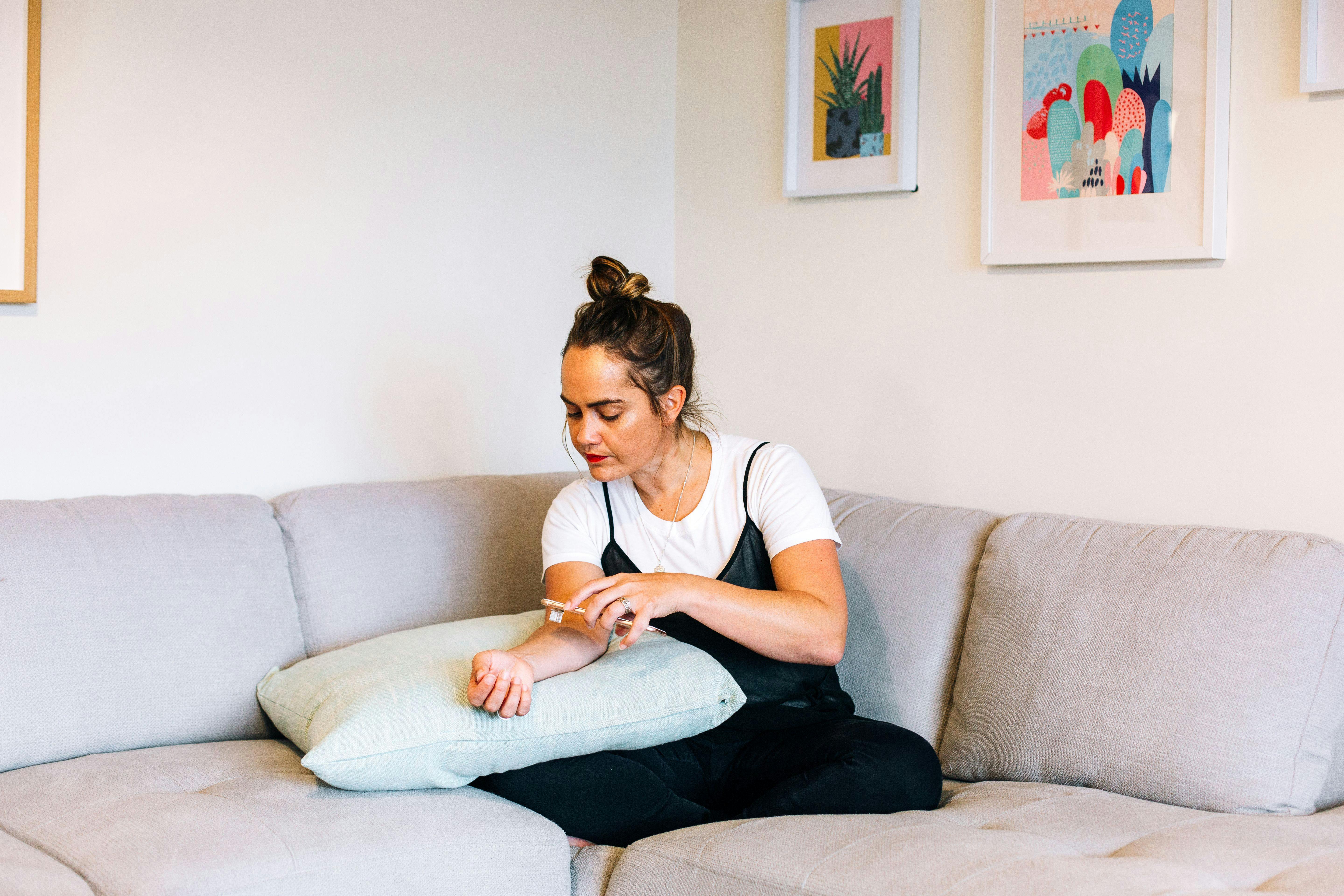
success-stories
Firstcheck Case Study
Firstcheck is the first product of its kind, providing a life-saving technological innovation that revolutionises skin cancer screening. Approximately two in three Australians will be diagnosed with skin cancer by the time they are 70, an epidemic that Firstcheck seeks to address by placing the ability to check and detect skin cancer in the hands of everyday people. By combining a unique and scalable platform with the revolutionary Firstcheck SkinScopeTM, customers are able to check their moles and spots via their smartphones. The specialised skin magnifier enables the capture of highly magnified photographs, through which doctors are able to potentially diagnose skin cancers and at-risk spots.
September 30th 2019

offer-news
5 Reasons to Invest in Urbotanica
Urbotanica is an innovative start-up that uses technology to help consumers grow fresh produce at home, empowering them to be sustainable and embrace the ‘grow your own’ revolution. The company is undertaking an equity crowdfund to access the capital it needs to take advantage of the growth opportunities at its doorstep. Urbotanica chose to raise capital via equity crowdfunding because it wants its customers and followers to join it on the ride becoming co-owners in the business. It makes sense that those who support the brand, and the ‘grow-your-own’ movement, are the ones to benefit from any growth. 5 Reasons to Invest Prior success Urbotanica launched its first product, the UrbiPod, in mid-2017. As an intelligent micro indoor garden the UrbiPod helps conscientious urban consumers who want to learn more about their food and how to grow in an urban environment. It’s success is a key indicator of customer and market demand and in two years the product has achieved: $350,000 in sales 100% year on year sales growth Designed and made 2,000 UrbiPods A portion of the funds raised will go towards commencing the next production run of the UrbiPod to meet increasing demand Market opportunities The Urban agtech consumer market is currently worth $210 billion dollars globally. In Australia, urban ag sales are valued at $750 million per year and it’s estimated that 4.7 million Australia households’ growth their own food. The demand for urban ag-tech products is only set to rise with the global population estimated to hit 10 billion people in the next 30 years with more than 50% living in urban cities. Asia alone will house 64% of the global middle class by 2030. This creates a massive opportunity for any urban ag-tech company especially one that is Australian founded and a product that is Australian made. Australia has a recognised agricultural heritage and reputation for high quality clean and green products as well as high levels of food & biosecurity controls. Urbotanica believes it’s very well placed to take a leadership position in the fast growing global urban agtech market. Established sales channels Urbotanica have tested and adopted a multi-channel sales approach that delivers an appropriate gross margin contribution including: E-retail - webstore with product info, how-to's and FAQ's Retail - UrbiPod product in expanding network of national retail Digital - digital/social media channels with over 1 million views Influencers - an understanding of the influencer cost and benefit Direct Channels - social and community engagement through word of mouth With these channels the company can effectively distribute current and new products as well as source and supply aligned 3rd party products. This means that whilst they have proven successful with UrbiPod sales to date there is significant potential to grow within. Plays within multiple global trends Urbanisation - As addressed above, the global population is growing with a substantial number of people living in urban areas. This means less space and often less time to ‘grow your own’ making the current UrbiPod a fantastic solution which is only going to become more relevant and in-demand. Sustainability - Each year Australians throw out $8 billion of useable food and the total distance travelled by an average Australian shopping basket is over 70,000kms which creates over 16,000 tonnes of CO2. Unquestionably consumers are becoming increasing conscious of their 'personal footprint' on the planet which is a major reason the ‘grow your own’ revolution is starting to take off. Health & Wellness - Consumers are seeking more information about the source and health impact of what they eat. Fresh produce plays a major part in this and the UrbiPod makes growing your own fresh produce so much easier. In this era of Netflix and Ubereats, it's also all about ease and convenience and what could be less demanding than a self-regulating indoor garden that sits on your bench? Tangible investors rewards If the other reasons weren't enough, exclusive rewards for investors are outlined below. Above we’re outlined 5 major reasons to invest in a business that lets you access the $210 billion urban agtech market. Urbotanica is harnessing multiple global trends (health and wellness, urbanisation, sustainability etc) in a market that is becoming increasingly important as the global population rises. The UrbiPod is the first of what the company predicts to be many products that give consumers solutions to growing fresh produce at home. Within the offer document (available when the deal opens) you’ll find many more reasons to invest.
September 11th 2019
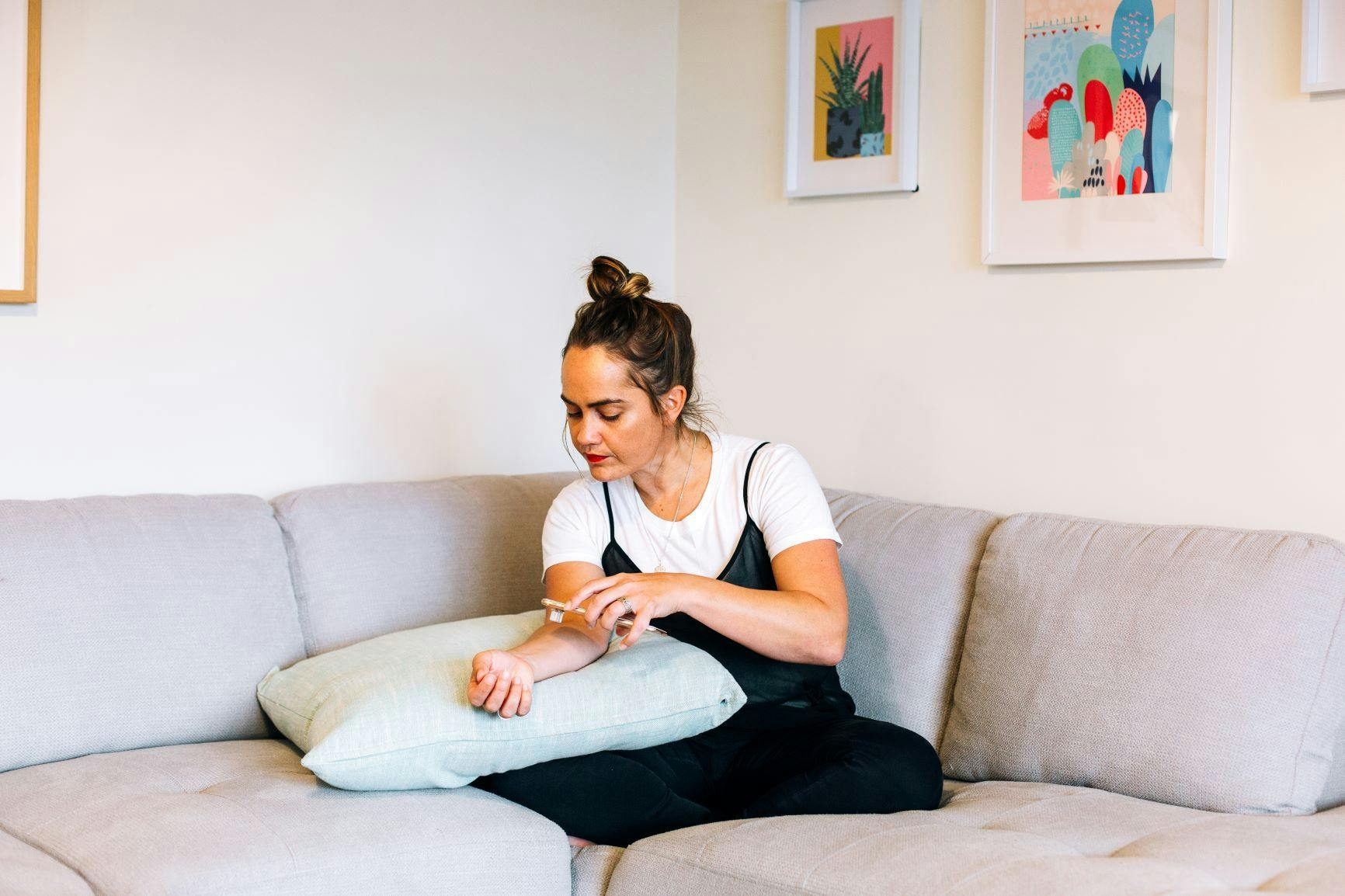
offer-news
5 Reasons to Invest in Firstcheck
A recap… Firstcheck’s technology is revolutionising skin cancer screening by placing game-changing innovation in the hands of everyday people. With a unique and scalable platform, Firstcheck provides affordable, convenient and reliable skin checks online - connecting patients with expert skin cancer doctors for reliable, rapid and convenient care. The Firstcheck offer has hit its minimum funding target – a whopping NZD $500K - however there is still equity available. If you’re still considering investing here’s a handy guide for 5 reasons to invest. Large & Active Target Market Large target market: Two out of three people in Australia and New Zealand are expected to develop skin cancer in their lifetime. This means it’s become an imperative that we all check and check regularly. As an online platform, Firstcheck can be utilised by millions of people across Australia and New Zealand. Active target market: A study showed that 85.4% of melanomas were detected by the patient and that most skin checks involve someone asking their GP about a spot the person is worried about. Firstcheck provides an affordable and convenient option for that process and, with additional brand awareness, could see mass adoption. Unlimited target market: As a scalable platform, Firstcheck is also not limited to Australia and New Zealand with growth plans involving expansion overseas. The market is already moving in that direction with teledermatology (online skin doctor consultations) expected to reach USD 8.6 billion globally by 2024. Multiple Revenue & Distribution Streams Firstcheck is a for profit and purpose business with multiple revenue streams already making returns. These include: In-app doctor consultation commissions which are collected before paying the doctor their fee Firstcheck SkinScope sales which retail at $29.95 Software/Integration/Platform fees for customisation of platform for strategic partners Insurance/corporate reimbursement when members or employees use Firstcheck as a health and wellbeing benefit The platform is certainly not one-dimensional when it comes to distribution channels and can be used and distributed by insurers, corporates, skin cancer clinics, pharmacies, public health programs and directly to customers. Traction Investment Firstcheck has secured NZ$800,000 in previous investment from strategic and Sophisticated Investors who have helped the company grow, including: Cure Kids Ventures (a high-profile health-tech fund), New Zealand Venture Investment Fund and New Zealand Angel Association angel investment groups. In this round, $220K was invested upfront by NZ angel investment group, Enterprise Angels, and NZ’s most recognised, trusted and innovative chain of skin health clinics, Skin Institute – which you can invest alongside. Awards Firstcheck has received notable recognition in the NZ Innovation Awards, New Zealander of the Year Awards, and the Ministry of Health’s MedTech Innovation Showcase. Skin specialists have presented, promoting Firstcheck’s technology, at melanoma and skin cancer conferences, GP conferences, nurse conferences, health technology conferences and public health organisation events. Firstcheck recently celebrated TAL’s SpotChecker program being named finalist for ‘Best Public Health Initiative’ in the 2019 Prime Awards celebrating contributions to improving the health of Australians. TAL introduced Firstcheck's personal skin check technology to TAL SpotChecker 2019 as part of TAL’s skin check initiative helping more Australians detect and prevent skin cancer. Partnerships Firstcheck has partnered with some big names in the health space, including insurers, skin specialist clinics, pharmacies and other health professionals: TAL Australia (leading life insurer). Leverages Firstcheck as part of TAL SpotChecker skin check campaign Skin Institute (dermatology and skin clinics nation-wide in NZ) use Firstcheck as part of a pharmacy skin check initiative all around New Zealand and also promote the Firstcheck service as a workplace/corporate screening solution. Pharmacy organisations (NZX-listed, Green Cross Health - including Unichem and Life Pharmacy brands) in connection with the pharmacy skin check initiative Skin cancer doctors across Australia and New Zealand embracing the platform to help people access a skin and spot check service. Growth Opportunities Strong customer acquisition plans to grow market share in Australia and New Zealand and capture more of the massive market of over 20 million people Expansion overseas Potential to leverage the unique dataset amassed by the platform Wider applications including other skin diseases Firstcheck Helps Save Lives We’re now at a point where deaths from skin cancer exceed the road death toll, despite being largely preventable through early detection. Currently there barriers to ensuring early detection including a shortage of dermatologists and high costs which can prevent widespread and timely access to screening services. This can result in significant patient delay, which is often the key determinant of the prognosis and can be the difference between life and death. Simply making it easier to have spots checked will ensure more suspect moles are checked and the dangerous spots being treated early, with good results all around. Firstcheck is that readily accessible early detection technology we need. It’s affordable, can be used from the comfort of your own home and is fast, with patients usually receiving a response within 24 hours. Plus, it’s already saving lives. The New Zealand Woman’s Weekly featured the story of Leah, wife and mother of two, who credits Firstcheck for saving her life when she was able to detect her malignant melanoma using the technology. With an unlimited, large and active target market, great traction to date in terms of investment and awards, big name partnerships and distribution channel already in place and, most importantly, the ability to save lives, there’s more than 5 reasons to invest in Firstcheck. The offer closes on September 30th, so ensure you invest early to avoid missing out.
August 5th 2019

offer-news
The Clean Collective: Five Reasons to Invest
Before investing in a company, every investor likes to know the answer to the basic question - why should I invest? The Clean Collective is the fastest growing marketplace in the Australian and New Zealand region for sustainable purchases. The online shop sells natural, organic and eco-friendly personal care, cleaning and reusable products that meet a new Australian standard that the team has developed - its Safety & Sustainability Standard (IP). In addition, the blog helps us to live a healthier, more sustainable life - uniting the latest information with the best solutions in one place. The Clean Collective is looking to raise $1.5 million through equity crowdfunding before Friday 16 August and investors can own a piece of this very exciting business from as little as $120. Here are 5 reasons to invest in The Clean Collective: 1) Great Traction and High Growth Potential The Clean Collective was launched in 2017. In less than 2 years they have turned over $600,000 in revenue from over 10,000 transactions. The team has also attracted 400,000 blog readers and 80,000 followers and subscribers. It has partnered with over 500 companies which are aligned in achieving the mission of helping us all to live a more sustainable life. Looking to the future, The Clean Collective forecasts a 300% year-on-year growth rate over the coming two financial years estimating revenues of $2.08 million in FY20 and $7.1 million in FY21. Apart from this, the company has secured an exclusive commercial partnership that will elevate the retail margin to 142% in upcoming years. 2) Favourable Market Conditions and Negligible Competitor Interference Currently, the organic industry is worth USD $89.7 billion and is growing at a CAGR of over 15%. In 2019, Australia’s organic market accounted for up to $2.6 billion and statistics show that 49% of shoppers say personal health is the top reason they prefer purchasing organic products. These statistics show us that more and more people are adopting a sustainable lifestyle which means the demand for organic products is surging to new heights. The three biggest Australian competitors turn over ~ $75 million annually and own only 15% of the market. Google data confirms that 85% of the market is available to acquire rapidly with the right expertise on board. The Clean Collective’s new standard means consumers can trust that the products are toxin free, organic, and the savviest source of zero-waste solutions. Its blog creates a one-stop-shop which helps demystify all the conflicting information on how to live more sustainably. Competitors are no match for this new standard, nor do they meet the charitable initiatives outlined below. 3) Charitable Initiatives - They Walk the Talk With every purchase, The Clean Collective’s sustainable products help consumers to reduce the level of toxins and plastics they release into the environment. At checkout, the team also offers customers the opportunity to remove additional plastic through their partnerships with Take 3 from the Sea. Here is what they’ve achieved to date: Diverted 1.9M single-use items from landfill; Planted 54K trees - off setting last year’s Christmas wrapping paper; Removed 6K pieces of plastic from the environment; and Prevented approximately 2M litres of toxic chemical products being consumed. 4) IP Protected Standard Which is Changing the Game The Clean Collective’s Safety & Sustainability Standard was developed in consultation with global experts and chemical databases. It’s already so respected that one major supplier removed an ingredient from its cleaning product so it could be sold on The Clean Collective. With the capital raised, the team plans on digitising and disseminated this standard as an app. The idea is for people to scan personal care and cleaning products to identify their true safety and sustainability status. Thus, the app will act like a personal assistant during shopping. Given the new standard is the heart of the machine, fuelling everything the company does, setting it apart from competitors and ensuring trust from customers, the digitisation of it will change the game for this industry – and The Clean Collective owns the IP. 5) The Team One of The Clean Collective’s greatest assets is their extraordinary team. The three Co-Founders, Charlie, Georgia and Charli, have vast experience in digital development, marketing, logistics and customer service. Beyond this is a digital acquisition and retention agency (that usually only works with Fortune 500s) and a third-party logistics provider, with an Amazon-style distribution model. While the digital agency works to drive sales into the business, the third-party logistics provider reduces payroll liability, customer service demand, and distribution errors via state-of-the-art technology, all while increasing parcel-to-customer speed and satisfaction. On the advisor committee is Robyn Frost, former Editor-in-Chief of The Australian Women’s Weekly, Lex Pederson, Founder of SurfStitch, and Clover Chambers, Co-Founder of PeriscoPe Commerce Consulting For these 5 reasons and more we’ve chosen to work with The Clean Collective. More and more people are adopting a healthier lifestyle which means the market is growing as evident by the traction to date. The team and its mission means that you’ll be investing in something that is not only for profit but for purpose, profiting if the company continues to grow. According to research the air in our homes is more polluted than outside, our babies are being born with over 200 chemicals in their umbilical cords and we have only 11.5 years until an unprecedented climate disaster. It’s time to change and The Clean Collective offers us a chance to do so. And if That Wasn’t Enough, There are Investors Rewards As well as discounts and exclusive early access, The Clean Collective is pledging to plant trees and remove plastic from the environment with every investment. The Clean Collective's equity crowdfund closes Friday 16 August. View the offer here. Always consider the offer doc & general risk warning before investing: http://pos.li/2ackai
July 30th 2019
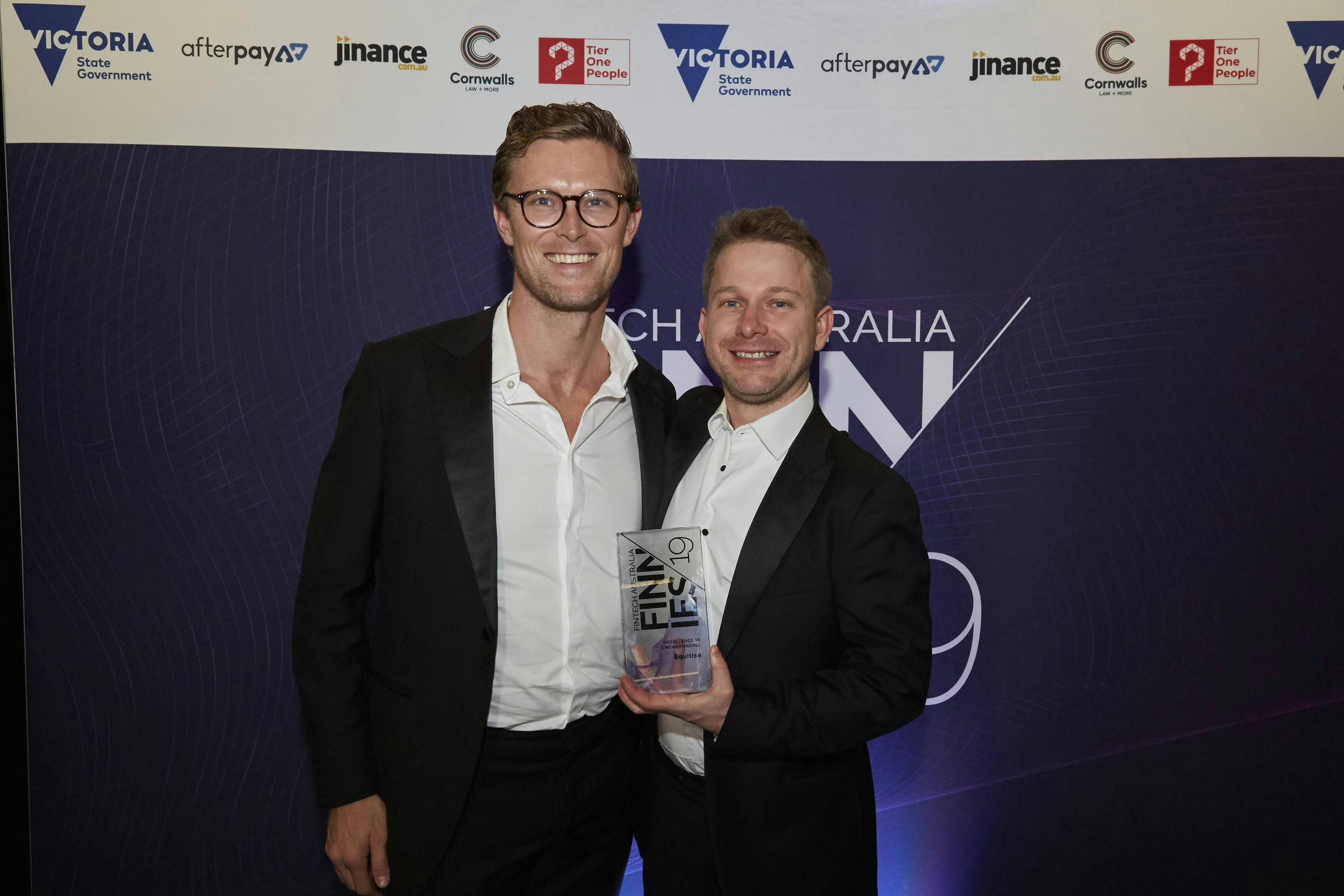
trends-and-insights
Press Release: Equity Crowdfunding sector reaches $30 million since new legislation passed
Media Release Quick Equitise Facts: Equitise has completed 54 successful raises totalling $25 million from 8,000+ investors through equity crowdfunding offers, wholesale offers and IPOs More than 20% of Equitise subscribers have already invested through the platform Industry is growing with Equitise having completed more deals in the past 6 months than in 2018. The company currently has 6 offers live on the platform and are forecasting 40 live offers on the platform in 2019 18 months since equity crowdfunding legislation passed in Australia, the industry has successfully raised over approximately $30 million for 40 companies from nearly 30,000 investments. Completing 54 raises, Equitise has cemented its place as the leading equity crowdfunding platform in Australia and New Zealand raising $25 million from 8,000 investors through equity crowdfunding offers, wholesale offers and IPOs. With a 75% success rate on its platform and an investment database of 30,000 potential investors, Equitise receives on average $3,100 per investor across its various investment channels. Winner of the 2019 Finnies Award for Excellence in Crowdfunding, Equitise is the largest platform in Australia and has been behind some of the most exciting and successful campaigns in the country. One of the first platforms to secure its equity crowdfunding license and the first to launch an equity crowdfunding offer, Equitise continues to be an innovator in the Australian fintech sector with plans for international expansion into new markets in the pipeline. With an investor split of 75% male and 25% female, the most popular sectors are fintech, food and beverage and consumer interest. For instance, Equitise has raised capital for three alcohol companies, Endeavour Brewing Co, Emperor Champagne and The West Winds Gin. Investors’ age between 18-87 years with the most active being between 30-40 years. Each raise has an average of 500 investors who overwhelmingly live in Sydney and Melbourne. Co-founder of Equitise, Jonny Wilkinson says whilst the equity crowdfunding industry is growing and maturing his mission to help innovative companies to access growth capital through new channels remains. “Equity crowdfunding in Australia has made significant strides since legislation passed in 2017. When we first launched there was doubt that equity crowdfunding would work and now its an early disruptor that’s raised over $9 million for 8 companies, no small achievement for a new fintech,” says Wilkinson. “We’re providing an alternative avenue to funding for a diverse range of founders and investors. We’re not just challenging VC firms but also giving early-stage companies a channel to engage further with their customers, users and future brand advocates. Data from our various raises shows that alcohol brands on the platform have a 100% success rate, raising over $2 million from 962 investors. This shows us that there’s a particular appetite for investing in consumer brands in industries that investors are passionate about. They also generally have more of a following which helps with traction in the initial stages of the campaign,” he said. Since launching in 2014, Equitise has completed its own successful funding rounds raising $3.6 million in five years with plans for a Series A in motion raising up to $3 million. Equitise is responsible for successful raises including neobank Xinja for $5.3 million over two raises, Ag-tech innovator DIT Technologies for $656K, Endeavour Brewing for $556K and several new exciting small-medium enterprises such as 4x4 body armour Rhinohide, sustainability marketplace The Clean Collective and Pacifico Optical which go-live on the platform in the coming weeks. Equitise offers support before, during and after capital raising to ensure businesses have the best opportunity for success and make it simple and accessible for everyone to invest in highly vetted innovative companies even if they’ve never invested before through an automated and scalable online investment platform.
July 29th 2019

trends-and-insights
The First 18 Months of Equity Crowdfunding in Australia
Equitise was among the first equity crowdfunding platforms in Australia to get their crowdsource funding (CSF) license after the legislation changed in September 2017. We're now eighteen months in and it's been fantastic to see so many Australian investors, 4,500 in fact, and early-stage companies embrace this new form of capital raising. At the end of the 2019 financial year we'd raised over $9 million - the most of any platform - and were also awarded the Finnies Excellence in Crowdfunding Award. The last six months has seen our success rate increase from 75% to 90%, closing Xinja, Endeavour, DIT, Goodments, Emperor Champagne and Credi successfully. We've also had the first companies, Xinja and DIT, come back to raise for a second time. As a team who has learnt so much over these 18 months, we're excited to continue to partner with innovative early-stage companies, offering the crowd the opportunity to invest, maybe more than once, in startups they obviously wish to back. Take a look at the statistics so far... Equitise's Australian Equity Crowdfunding Results January 2018 - June 2019 Equitise was founded in 2014 - well before the legislation for equity crowdfunding had changed in Australia. Whilst lobbying the Australian government for change, Co-Founders Chris Gilbert and Jonny Wilkinson headed to New Zealand. Offering retail equity crowdfunding in NZ and IPOs and wholesale investment opportunities across both countries, Equitise has therefore become the most comprehensive funding platform with 54 successful raises and raising a total $25 million. Here's a look at the last 5 years... Equitise's Results Since Launch Across Australia and New Zealand
July 29th 2019
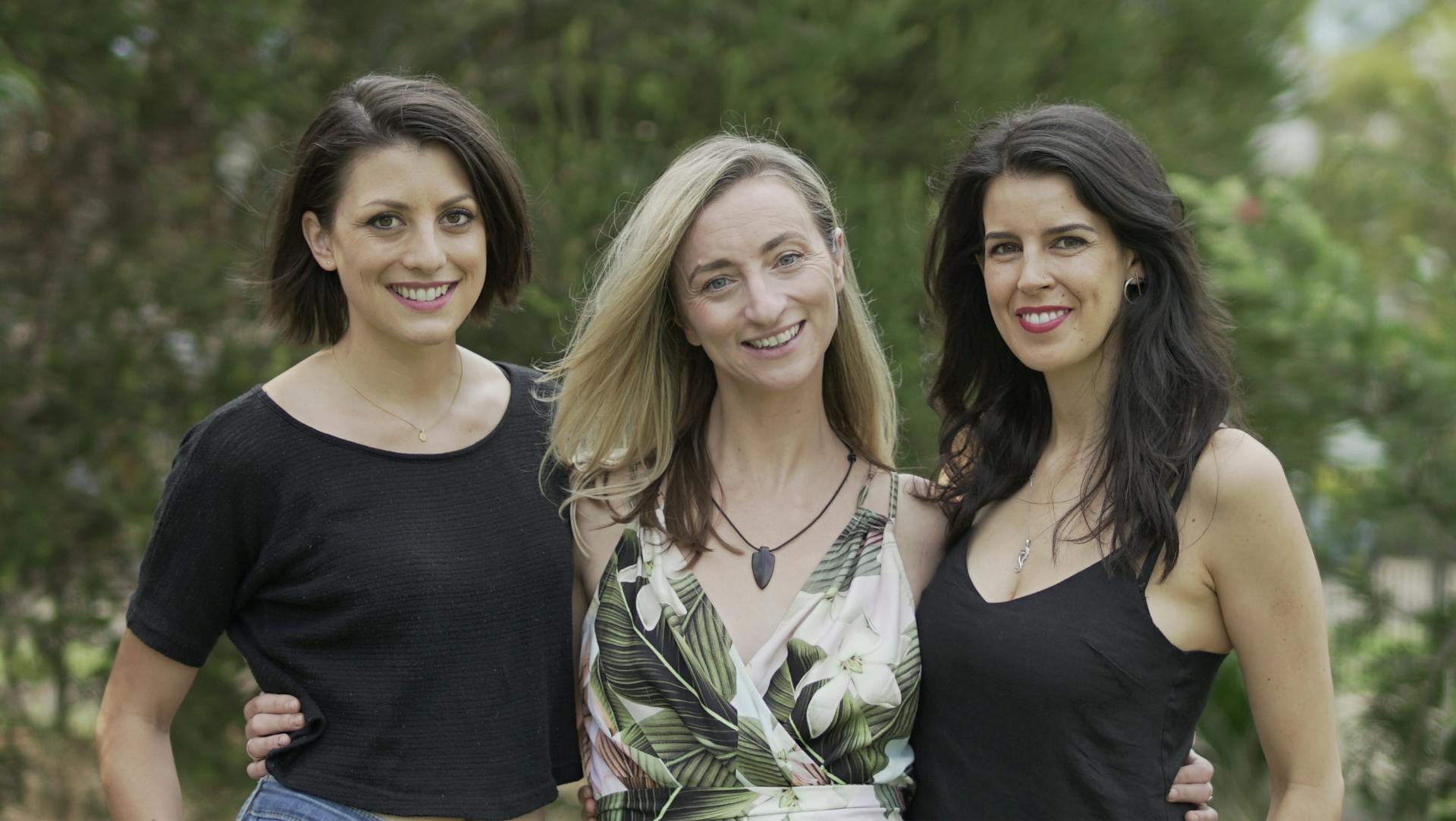
offer-news
Press Release: Three Aussie women on a mission to become the global watchdog invite all Australians to invest in their...
EMBARGOED MEDIA RELEASE 30th July 2019 9:00AM Aussie trailblazer, The Clean Collective (TCC), today announced the launch of its first Equity Crowdfunding campaign with Equitise, opening up equity to everyday Australians. TCC is the fastest growing marketplace for sustainable purchases in Australia and NZ. Delivering two sets of tools to support the population in addressing health and climate epidemics through day-to-day actions, The Clean Collective’s online shop sells natural, organic and eco-friendly personal care, cleaning and reusable products that set a new standard for Safety & Sustainability developed by the company. Its blog publishes information on how to live a healthier, more sustainable life, marrying the best products and information together on one platform. Looking to raise up to $1.5 million from the ‘crowd’, TCC is raising capital to fast-track its plans to create a digitised regulation app. The TCC app will be a consumer-friendly platform that will allow consumers to scan personal care and cleaning products to identify their true safety and sustainability status. The TCC app will become a personal shopping assistant for consumers seeking safe and sustainable options during their daily purchasing experiences in bricks and mortar stores. TCC will also introduce a series of personal development e-courses with leading experts focusing on sustainability for schools, individuals and businesses that will be accessible worldwide as part of the funding round. In addition to only stocking the most sustainable of products, every purchase results in a charitable initiative. In the last year alone, TCC has prevented almost $2 million litres of toxic-chemical products from coming into contact with people and the planet, diverted more than 1.9 million single use items from landfill and removed 6,090 pieces of plastic from the ocean. Achieving $600,000 in its first full year of operation, TCC is the fastest growing marketplace in Australia and NZ for sustainable purchases. TCC has attracted 400,000 readers, 80,000 followers and subscribers and 500 industry and brand partners. Identifying a gap in the market, Co-Founder Charlie Thompson, says there’s a pressing need for a more regulated way to check what products are actually sustainable and safe. “It’s estimated that we’ve got just 135 months until an unprecedented climate disaster takes place and that our babies are being born pre-polluted with 200 chemicals in their umbilical cords. What we’re leaving to the next generation is a crisis and threatened future,” says Thompson. “Never before has there been a more urgent need for a platform like The Clean Collective. Pretty labels and clever marketing has sold us on the short-term solutions instead of true and safe sustainable options. There’s growing health and environmental epidemics, but without a standard for consumption or umbrella body communicating that these two issues are born from the same problem: our consumption habits, consumers are largely uneducated in their choices. However, this is starting to change with 13 million searches a month on Google for the information and solutions hosted on TCC and the #zerowaste hashtag amassing 2.9 million posts on Instagram,” said Thompson. “We're so proud of what we have achieved with our customers, partners and supporters in just 20 months. We've seen an opportunity to drive much bigger impact for people and the planet and we need to raise capital to achieve it. The Clean Collective has never been ours - it's theirs. They give it energy. They give it a voice. They drive its mission forward,” she said. Research conducted by TCC shows the three biggest Australian competitors turn over $75 million annually and own only 15% of the market. Over 85% of the market is available to acquire rapidly with the right expertise on board. TCC’s competitors don’t match up to its new standard for sustainable purchasing or charitable initiatives. Co-Founder of Equitise, Chris Gilbert says he is very proud to be partnering with The Clean Collective in its first Equity Crowdfunding campaign. “We’re really excited to offer The Clean Collective equity crowd fund on Equitise, Equity crowdfunding is all about startups changing the game and in this case, it is change that needs to happen,” he said. To view the offer you can access the link here: https://equitise.com/offer/regular/the-clean-collective-1
July 29th 2019
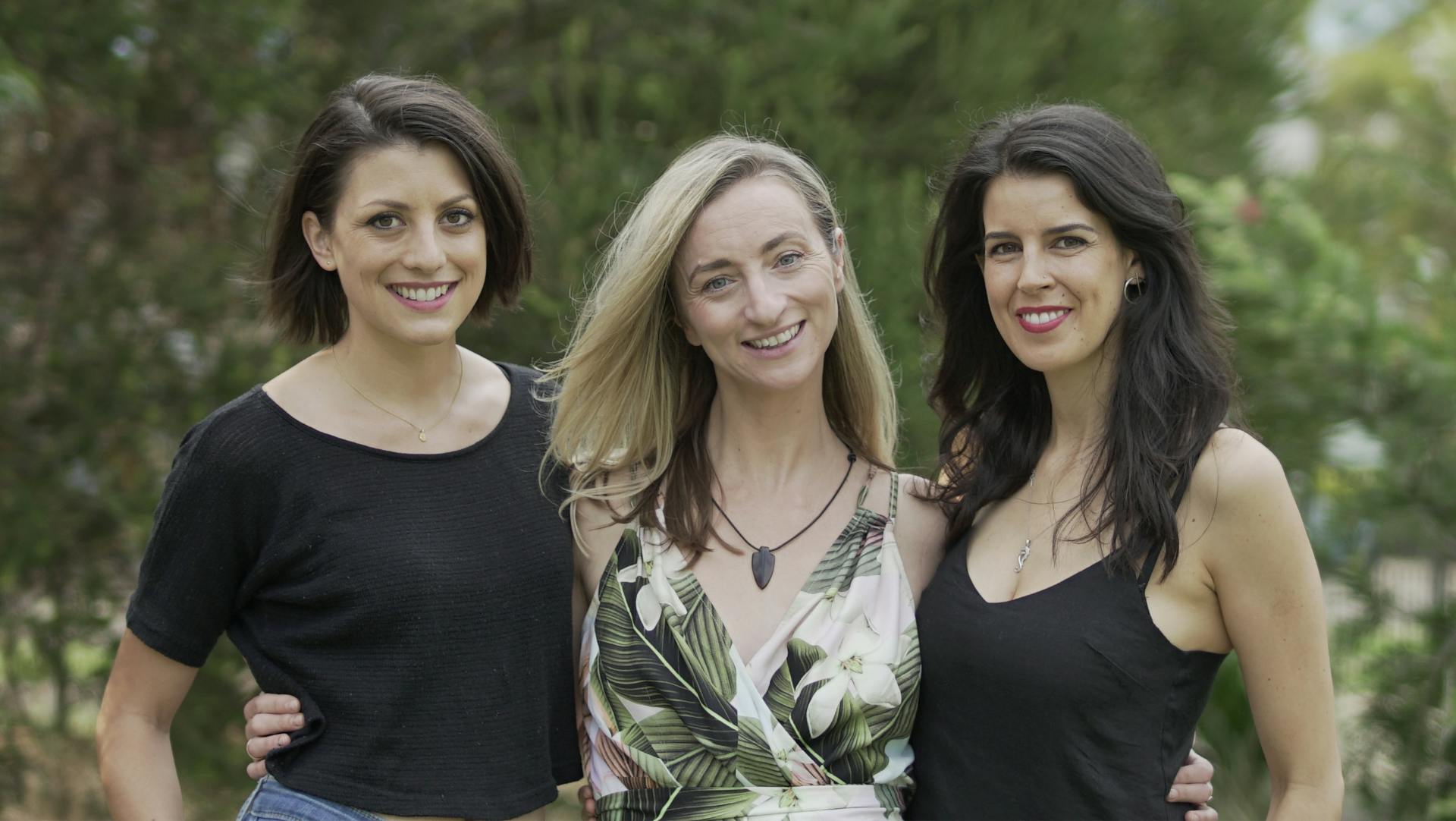
offer-news
Flying Cars and the Casting Couch in Silicon Valley. Both Exist. For Real
It’s no secret that raising funds as a female founder is tough. A Boston Consulting Group survey concluded that just two per cent of venture capital funding reaches female-led companies – a statistic made louder last week by Kim Jackson passionately speaking out (nice one, Kim). I’ve given myself an additional challenge in my funding mission in that I founded The Clean Collective to make a difference to human and planetary health, and finding investors that are interested in changing the world (not just their pockets) is like weeding a lawn of grass by hand. As the inspiring Catriona Wallace puts it, “you’ve got to get used to eating rejection for breakfast when capital raising.” Yep. Breakfast, sometimes followed too quickly by brunch. So, you can imagine my excitement to receive an invitation to attend an investment event in Silicon Valley, dedicated to social impact start-ups. What I left with wasn’t cash but something far more powerful. The start-up roller coaster I hit the first day of the event with a spring in my step from the possibility that was oozing from it. It kicked off with a presentation so powerful that I felt compelled to write and thank the speaker for the inspiration and for confirming there are VCs out there who believe in this planet’s need for double bottom line business. The next 48 hours were filled with strong chats and big pitches. Did you know someone already built a flying car? Legit, that James Bond stuff already exists. The bigger the ideas and the bigger the tech builds, the bigger the creeping sense that I was out of place here. Enter: the male protagonist In a true Moses moment, the crowd seemed to part as an engaged angel investor glided straight into my conversation. When he asked me how I found the event, my honesty spilled: “I don’t think I’m in the right place. I’m not building new technology or flying cars; I’m just trying to use existing technology to empower people to tackle climate change and take ownership of their health.” “Really?” he replied. “I have an interest in climate investments.” The conversation begins. A long and serious discussion ensues: the health and climate epidemics, the latest scientific research available, the solutions we’re building at The Clean Collective, how time is of the essence with just 134 months left on the Climate Change Clock. I left with a serious contact who’d confirmed serious interest in investing in The Clean Collective with further discussion, willing to connect me to further impact-concerned investors. I heard from him a few hours later. Lunch locked and loaded for tomorrow. Dining with the (angel) devil I’ve done coffee, lunch, dinner and wine with investors in rain and shine – even on crutches straight from a doctor’s surgery – to raise the funds I’ve needed to fuel my business. I felt prepared. Just another lunch… It started pleasantly enough. This guy had already expressed an interest in getting to know the person/s he was investing in. It’s not unusual. I played ball. We got chatting. Let’s call him Phil. It turns out Phil’s passion is photography and he’s got a studio just around the corner. The conversation turns – the horse bolts – and wrapped in some inappropriate comments, he tells me that he wants to “capture” me and asks if he can take my picture at his studio. As I wonder if I’ve understood the words that just casually fell out of his mouth, he’s already showing me a portfolio of images, cropped in a way that you’re left wondering if the women in them were wearing clothes. What he didn’t realise is the photos he tried not to show me were reflected in his wine glass, revealing a bit more skin. How does an Aussie start-up founder end up on a Silicon Valley casting couch? This man was practiced. He’d done this before. His words ducked around the subject in such a dance that I was left questioning myself at every sentence. In asking for clarification of his true interest and intentions, he revealed that he’d decided he wanted to take my picture the moment he saw me at the conference; that if I went to the conveniently-located photography studio from his lunch reservation, he “couldn’t be sure what would happen” after the photos were taken; and that my dismissive reaction was unusual, because most women become CEOs “because they want fame.” Read Charlie Thompson’s open letter to angel investor ‘Phil’. Dear Phil You know who you are. You stunned me into a state of gibberish that I’ll thank you for: sometimes your brain needs to be faced with an alien situation before it finds its script. Here’s mine: You’ve got the wrong definition of ‘human capital’. Women cannot be bought. Women are capable leaders that become CEOs for many reasons. Women founders do not deserve to be subjected to your well-rehearsed show. And in case you’re wondering, the world’s still dying, and the Climate Change Clock’s still ticking. Thank you for filling some of my precious time in the 134-month window of opportunity that we have to save the planet from a climate catastrophe with your ridiculous proposition because, you know what? No one grows in their comfort zone and you’ve just added some serious fuel to my fire. In the words of Meatloaf, “I’d do anything [for my love of this planet], but I won’t do that.” My mission is so much bigger than your cheque book. You sent me back home to Australia with next-level amounts of clarity, grit and determination to find investors that respect people, respect the planet, and understand that investing in our future is not only money and energy incredibly well spent, but an absolute necessity for civilisation as we know it. ~ The Clean Collective is now running an equity crowdfund crowdfund with us to raise funds to fuel its mission, seeking passionate investors for the future of human and planetary health. In return, investors will get 12-month discounts to www.thecleancollective.com, early-bird access and passes to new digital products, and The Clean Collective will remove 37,500 pieces of plastic pollution from the environment and plant 12,500 trees when they hit their target of raising $1.5M. This is what you call a true and fair exchange, Phil. Access the equity crowdfund here.
July 28th 2019
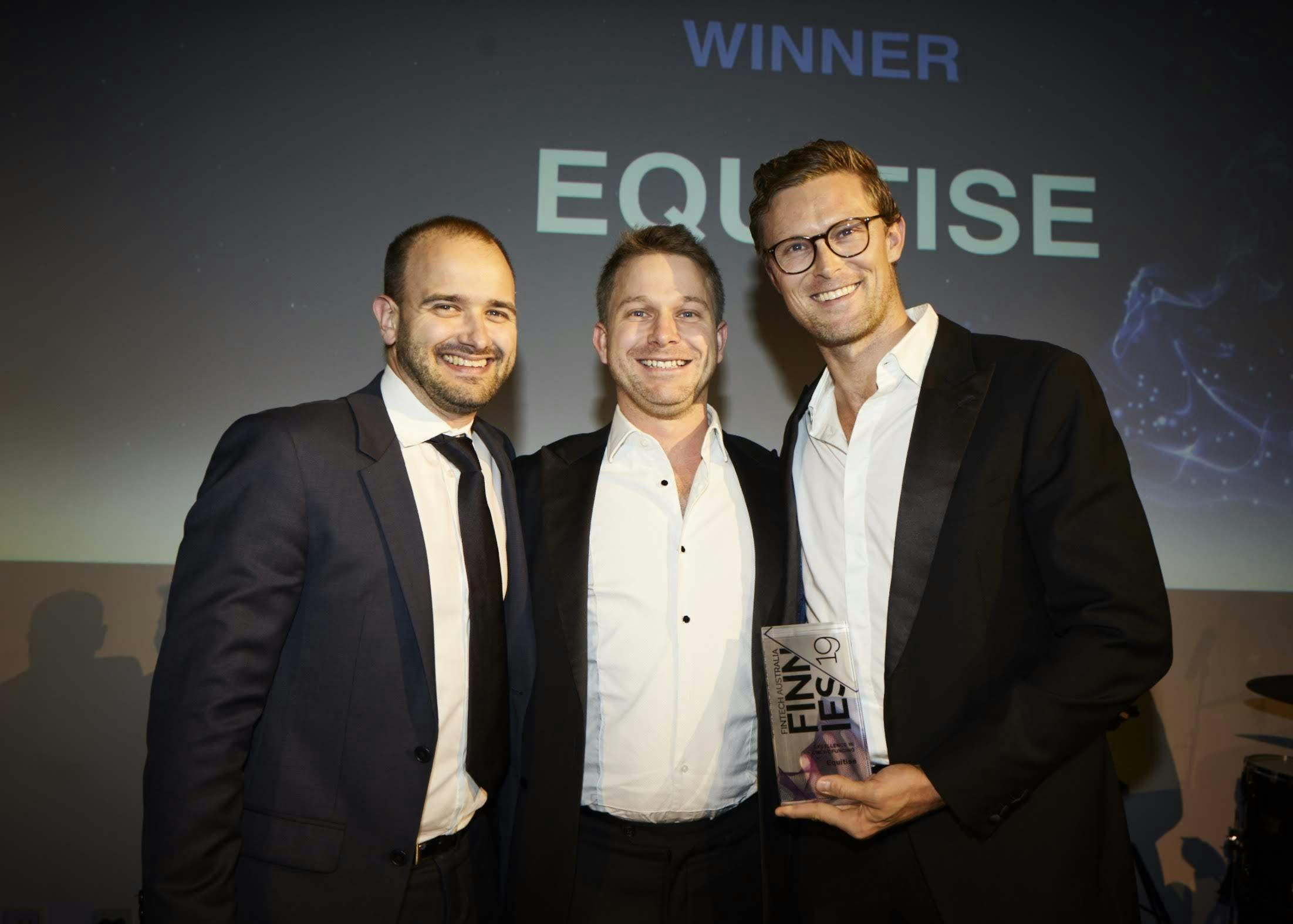
trends-and-insights
Press Release: Equitise named Equity Crowdfunding platform of the year at the 2019 Fintech Australia Awards...
MEDIA RELEASE 7 JUNE 2019 Australia’s leading Equity Crowdfunding platform Equitise is thrilled to receive the Excellence in Crowdfunding award at the 2019 Fintech Australia Awards (Finnies). Pioneers in the space, Jonny Wilkinson and Chris Gilbert founded Equitise in 2014 in Australia and New Zealand. Whilst lobbying the government to change the Australian Equity Crowdfunding laws, they ran IPO’s (Initial Public Offerings) and wholesale offers in Australia and retail equity crowdfunding offers in New Zealand. This meant that when retail equity crowdfunding launched in Australia in January 2018, Equitise was the only platform with direct experience. With combined knowledge across equity capital markets, investment banking and law, the Equitise founders bring diversity and experience to the platform and the companies they support. Equitise has successfully raised the most out of any platform since January 2018. Co-Founder of Equitise, Jonny Wilkinson says he’s thrilled to see Equitise recognised in the FINNIES awards. “As an industry Equity Crowdfunding continues to grow and has come a long way since we founded Equitise. We’re thrilled to be at the top of our game and to be awarded by such a reputable outlet such as the FINNIES,” he said. “Equity Crowdfunding is still a new concept with many Australians still unaware you can invest in exciting early-stage companies. However, the public’s awareness of our industry and our offers continues to grow which makes it both rewarding and a challenge. Equitise is a disruptor and we’re proud to be offering an alternative to traditional means of capital raising giving greater opportunities to both investors and early-stage companies,” says Wilkinson. To date, Equitise has raised the most funds with over $8.4 million raised via the ‘crowd’ and has been behind some of Australia’s most exciting and cutting edge Equity Crowdfunding campaigns. This includes Endeavour Brewing Co., raising more than $550,000, making it the most successful raise for a brewery in Australia. Direct Injection Technologies, an AgTech company from QLD, reached its minimum target within 24 hours raising over $650,000 in total. Lastly, neobank disruptor Xinja - the first company to do a second equity crowdfund - has raised more than $5.3 million. Wilkinson went on to say that more and more promising early-stage companies are looking to equity crowdfunding as a way to raise capital, not only to fuel their growth but as a way for fans and followers to join them on the journey. ‘’We have companies approaching us daily wanting to raise capital which is very exciting. At the moment we have Emperor Champagne live, as well as another twelve businesses signed on to use our services including a sunglasses brand, skin cancer detection app and fintech platform which is working to formalise informal loans.’’ Equitise is Australia's leading and most experienced Equity Crowdfunding platform and helps businesses with a range of services including but not limited to Equity Crowdfunded retail campaigns, wholesale campaigns and IPO offers. Equitise was also a finalist for Fintech Organisation of the Year up against big industry players such as AfterPay, Medipass, Prospa, Wisr and Up.
July 25th 2019
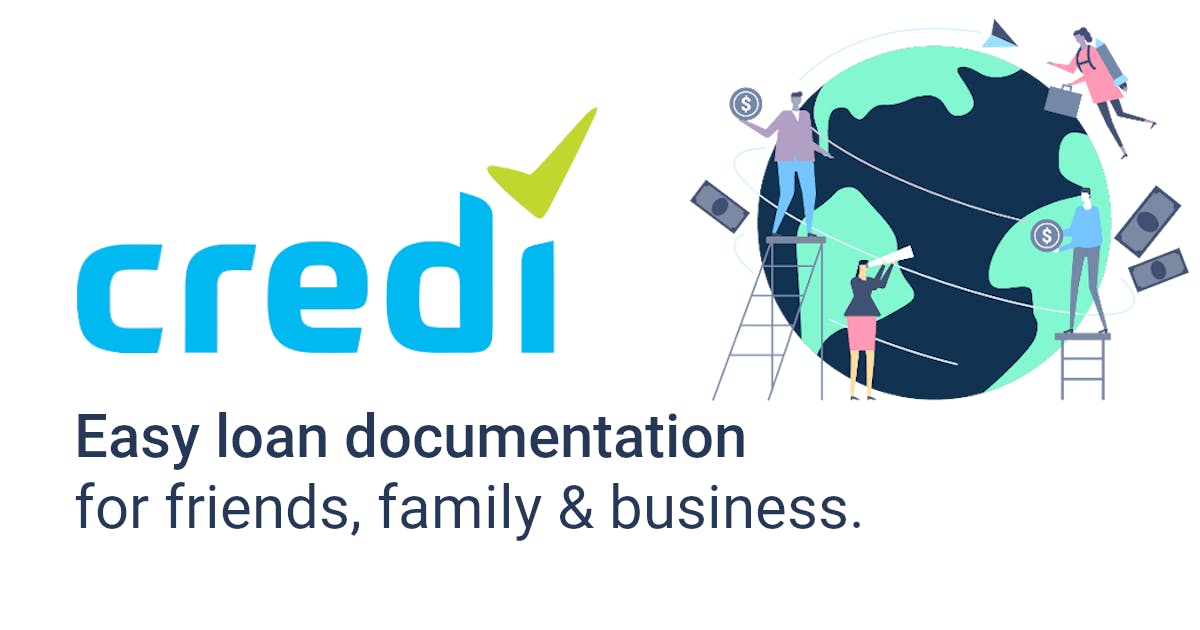
success-stories
Credi Case Study
Credi is the world’s leading relationship lending platform, managing millions of dollars of loans between friends and family at interest rates that are often a fraction of those offered by traditional lenders. It formalises and automates loans and repayments through a simple platform that removes the friction of peer-to-peer lending.
July 18th 2019

offer-news
Credi opens $1 million equity crowdfund on Equitise
Media Release 19th June, 2019 Chance for investors to participate in the ‘bank of mum and dad’ Platform has global potential, with more than 5,000 users in 26 countries Average interest rate for a loan managed through Credi is 3% pa compared with double digit rates charged by traditional lenders The Credi loan management platform today gives everyday Australians the opportunity to buy shares in the company through leading equity crowdfunding platform Equitise. Credi formalises loans between friends and family (often referred to as the 'bank of mum and dad') providing much needed structure to this massive untapped market. It removes common issues and friction associated with informal lending money and with ‘official mates rates’ through known parties, it’s an alternative source of finance to the high interest rates of traditional lenders. With a target raise of $1million, Credi’s first equity crowdfunding campaign will provide funds for marketing & international expansion. The company over the past two years has already been involved in more than $100 million of transactions with the loan's average at $80,000 , made up of transactions ranging from a few hundred dollars to over a million dollars. Founded by Perth-based Tim Dean, Credi is the facilitator for lending between known parties (usually parents and their children, or family and friends), formalising the repayment schedule and interest rate on loans. It now has 5,200 users from 26 countries on its platform. The ‘bank of mum and dad’ (and family and friends) is estimated to be the largest lending institution in Australia after the Big Four banks, lending more than $65 billion in 2017. “We have Credi users eagerly awaiting to invest in Credi. This endorsement confirms that our platform is a much needed disruptor in the fintech space,” Tim Dean said. “With Australians still digesting the findings of the Hayne Royal Commission, the spotlight is on high cost credit and irresponsible lending,” he said. “Credi makes it easy to receive financial support from friends and family as an alternative to traditional and more expensive forms of credit such as bank loans that often carry potentially crippling fees. “Credi was inspired as a result of my own experience and allowed me as a parent to navigate my adult children away from high cost credit and teach them how to repay and manage a loan responsibility and efficiently,” he said. “Australians are already lending millions of dollars to friends and family on Credi, at an average interest rate of three percent compared to the double digit rates charged by many of the majors,” Mr Dean said. Credi will issue ordinary shares valued at 10.5c each on the Equitise platform, with a minimum target of $200,000. With a minimum investment of $210, the offer will be open for just under a month. Equitise co-founder Chris Gilbert says Credi has identified a massive gap in the market that the banks and other financial institutions have failed to act swiftly on. “When we first started Equitise, one of our key motivators was to provide a platform that would accelerate and enable innovation just like Credi,” Mr Gilbert said. “As Credi is a platform formalising loans for everyday Australians, it makes complete sense the company would turn to everyday investors or ‘‘the crowd’’ to raise capital. For this reason, among others, Equitise has become a preferred method of generating funds for early stage ventures and growth companies,” he said.
July 3rd 2019

success-stories
Emperor Champagne Case Study
Emperor Champagne is an e-commerce platform that offers an expertly curated collection of champagne with superior service and knowledge. We were excited to partner with the company as we realised there was a massive gap in the market for a leading online retailer dedicated to champagne. Both companies saw equity crowdfunding as a perfect way to involve customers and lovers of the golden bubbles, inviting them to join Emperor on their global expansion journey.
June 30th 2019

trends-and-insights
Democratising Venture Capital
Democratising Venture Capital Equitise is democratising the venture capital and private equity landscape in Australia and New Zealand through equity crowdfunding. For the first time, everyday people can invest in innovative and high-growth start-ups on the same terms as institutional investors and funds.
June 16th 2019
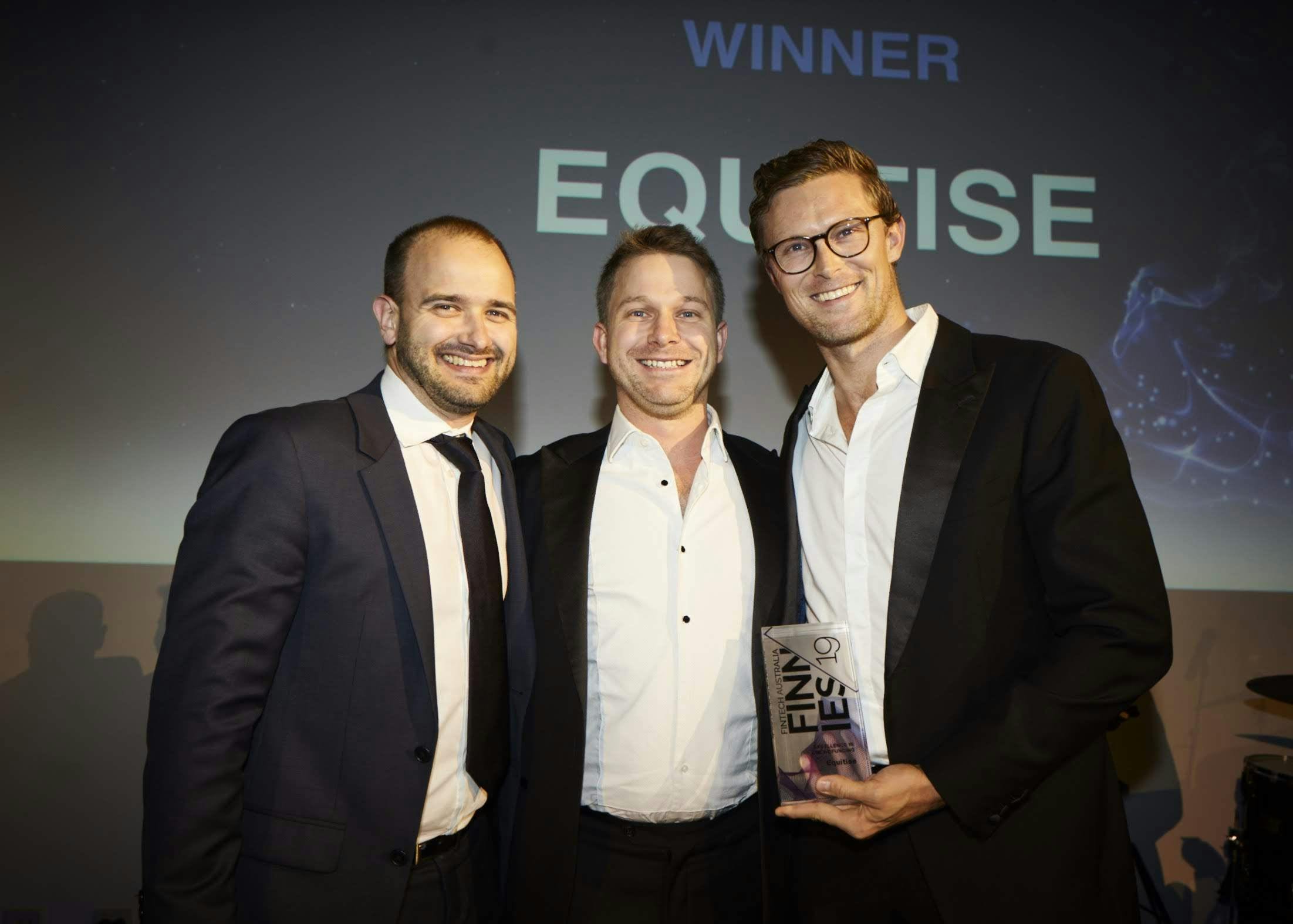
trends-and-insights
Equitise Wins Excellence in Crowdfunding Award in Finnies 2019
The Finnies (run by Fintech Australia) is the leading Australian business awards for achievement in the Fintech industry. In the 2019 Awards, there were more than 200 entries with a record number entered into the Fintech Organisation of the Year. Equitise won the Excellence in Crowdfunding award, as well as being a Finalist for the Fintech Organisation of the Year award, alongside industry giants such as Prospa and AfterPay. It’s a quite a journey for Founders Chris Gilbert and Jonny Wilkinson, starting Equitise in 2014 in Australia and New Zealand. As retail equity crowdfunding wasn’t legal in Australia, the Founders concentrated their effort in New Zealand, only running wholesale and IPO offers in Australia whilst lobbying the government for change. In 2017, the Australian Government legalised retail equity crowdfunding and Equitise was one of the first to be granted a license being the only platform with direct retail equity crowdfunding experience. Jonny Wilkinson said, ‘’Equity Crowdfunding is still a new concept with many Australians still unaware you can invest in exciting early-stage companies. However, the public’s awareness of our industry and our offers continues to grow which makes it both rewarding and a challenge. We have disrupted the traditional sources of capital raising and have given the opportunity to the everyday Australians to invest in early-stage companies. To date, we have successfully managed to raise over $8.4 million via the ‘crowd’. One of the major milestones in our journey was the raise with Endeavour Brewing Co., where we successfully raised more than $550,000, making it the most successful raise for a brewery in Australia. Direct Injection Technologies, an AgTech company from QLD, reached its minimum target within 24 hours raising over $650,000 in total. Lastly, neobank disruptor Xinja - the first company to do a first and then second equity crowdfunding - has raised more than $5.3 million.’’ We are proud of this award as it’s a result of our team’s hard work and dedication. We look forward to working with more exciting early-stage companies, giving alternative capital raising and investment opportunities to Founders and everyday investors respectively.'' Read the B&T article on the awards here
May 26th 2019

success-stories
Successful Crowdfund Case Study: Goodments
Goodments is the world’s first investment platform that matches people to investments based on their environmental, social and ethical values. The business has constructed its model in such a way that it makes money whilst doing good. Equitise was really excited to work with Goodments as it’s a nice alignment that the people who want to invest in stuff they give a stuff about, could also invest and support the company that is giving them the opportunity to do so. Equity crowdfunding is all about giving everyday investors the option to invest in companies they are passionate about and, as evident in the data, people are passionate about investing for good.
March 21st 2019
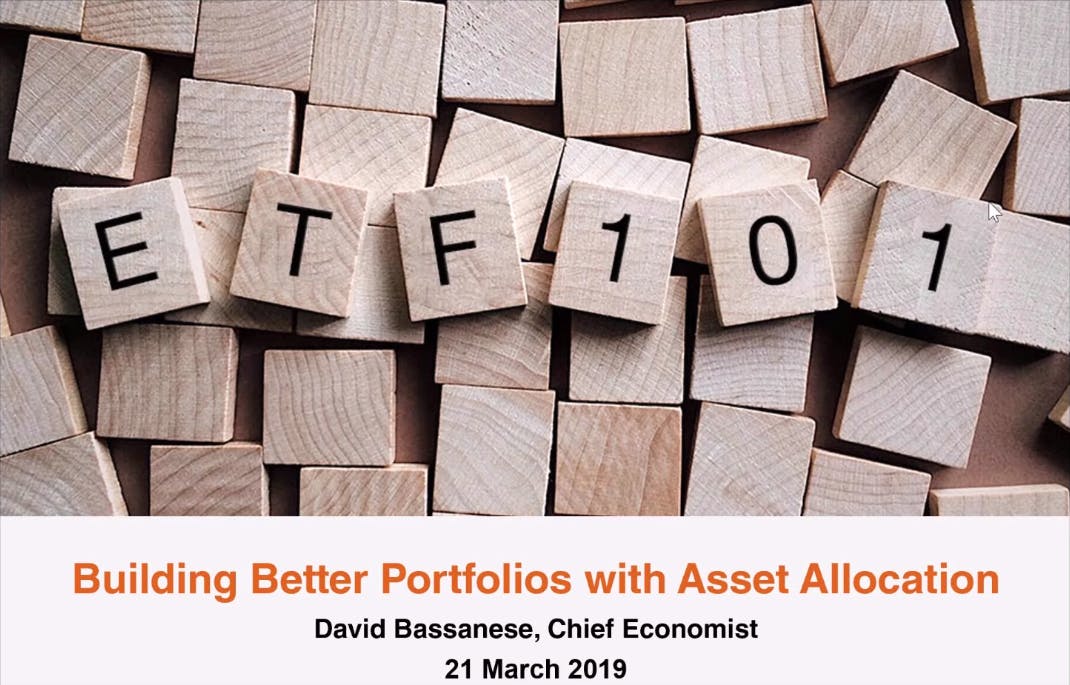
trends-and-insights
BetaShares ETF 101 Webinar: How to build better portfolios with asset allocation
BetaShares' Chief Economist, David Bassanese, recently held a webinar explaining why portfolio diversification is important and how this can be achieved through blending investment exposures to different asset classes. For those unfamiliar with BetaShares, they are a leading Australian fund manager providing a range of exchange traded funds, with over $6.5 billion in funds under management. The key takeaway from this webinar is a story of asset allocation and how smarter asset allocation can lead to better risk-adjusted returns for investors. Before looking at asset allocation, we need to first understand what is meant by an asset class. In general terms, they are a group of investments that have similar characteristics, expected to have similar risk and returns and to perform in a similar manner in a particular market condition. For example, we can think of the big 4 banks as being part of an asset class as Australian equities in the financial sector. More broadly, we can consider equities as a whole as an asset class, against cash, bonds, commodities etc. Each of these asset classes is expected to have a different risk/return profile and to perform differently under the same market conditions when compared with other asset classes. In statistical terms, we can expect that different asset classes will not be perfectly correlated. Where returns of investments are not perfectly correlated, this allows for the creation of portfolios combining different asset classes - providing higher levels of expected return for any given level of risk. This is visualised in the graph below, where there are two assets with different risk and return profiles, asset A and asset B. By varying the proportion invested in A and B, we are able to create a portfolio C, that provides higher levels of return than if A and B were perfectly correlated (the line between A and B). In essence, this is the theory behind diversification, and the age old adage "don't put all your eggs into one basket." Looking at a hypothetical portfolio mixing bonds (lower risk, lower return) and equities (higher risk, higher return) shown in the table below, we can see that the benefits of diversification increase as the returns of the asset classes become more uncorrelated (correlation refers to the degree to which two securities move in relation to each other). The increased risk-adjusted returns are shown by the standard deviation, as a proxy for the risk of an asset, falling from 9.25% to 5.8% (from more risky to less risky) as asset class returns become less closely correlated (moving from +1, or perfect positive correlation, to -1, perfect negative correlation), with expected return stable at 7.5%. This means that by decreasing correlation through diversification, investors can achieve the same rate of return with lower risk. Diversification is a particularly pertinent consideration for Australian investors on the ASX. Looking at a breakdown of the ASX200 by industry, we can see that Financials makes up 32.32% of the market, with materials making up 18.66% and Information Technology a mere 2.27%. If we treat each industry sector as its own asset class with different risk and return characteristics, then it would appear that the Australian stock market has a very large exposure to financials and materials. The result is that investors, despite holding many individual stocks listed on the ASX, may have portfolios skewed towards certain industries and not taking full advantage of the benefits of diversification. With a clear lack of Information Technology sector companies listed on the ASX, Australians have limited options to gain exposure to Australian companies in this space. Equitise is aiming to change this, by providing retail investors access to innovative Australian companies from a broad range of industries, from neobanks to craft breweries. As earlier-stage businesses than those listed on the ASX, the unlisted companies offered on Equitise can be thought of as a separate asset class to ASX listed businesses, with a risk/return profile that is more readily comparable to venture capital investments. Investment in these businesses can therefore form part of a broader asset allocation strategy, achieving higher risk-adjusted returns by creating blended portfolios (as seen in Portfolio C above). In summary, David Bassanese explains that investors can achieve higher risk-adjusted returns through strategic asset allocation, with a portfolio spread across asset classes with lower levels of correlation being more effective. He elaborates by stating that many Australians investing in the ASX alone may not have exposure to a variety of industries in their portfolio due to the concentration of the ASX200 towards Financials and Materials. Investing in unlisted companies as an asset class can be a strategy to alleviate this lack of diversification, due to different risk/return profiles and different performance in similar market conditions.
March 12th 2019
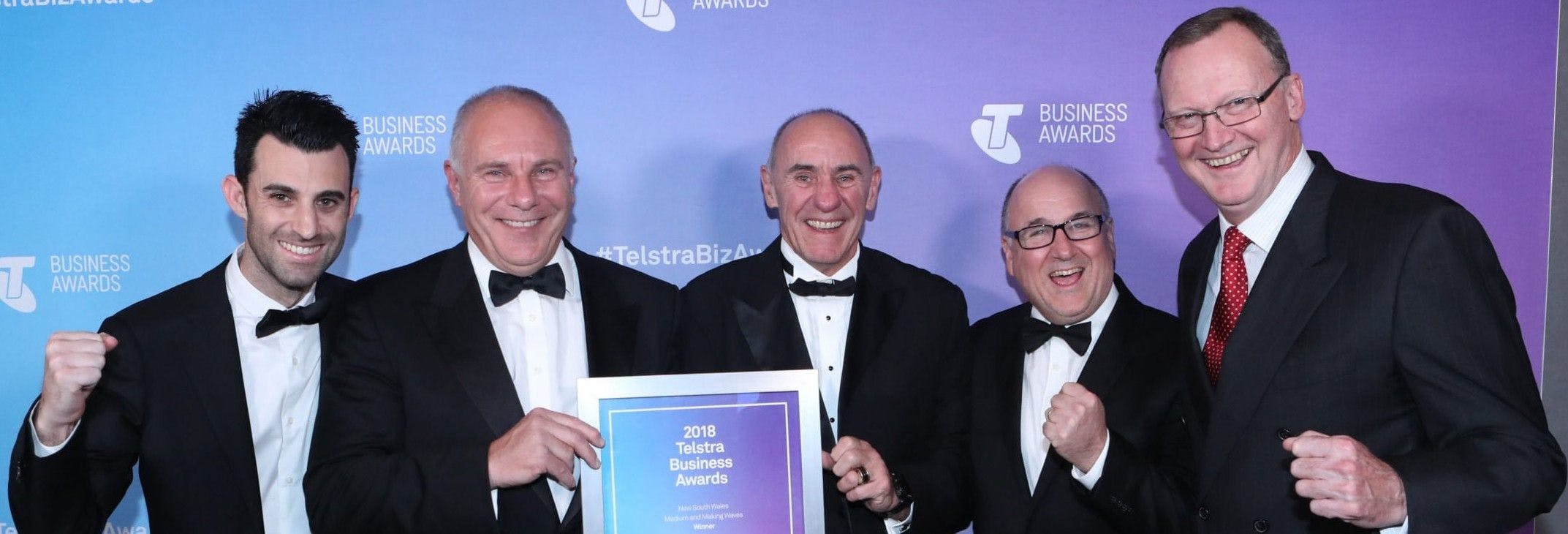
trends-and-insights
Why Booktopia Can Compete with Amazon
It’s been well over a year since Amazon launched into the Australian market. While it may take years for the e-commerce giant to gain a strong foothold, it will take more than just price to compete. Especially in the online book market where Booktopia has steadily carved out their place as Australia’s leading online book retailer since 2004. What Amazon is trying to do in Australia is something that Booktopia has perfected over years of understanding their market and optimising their business model. So, with Booktopia undertaking a capital raise and inviting Aussies to for the first time for only $250, we look at how the local success story stacks up against the global behemoth. You Can't Be Everything To Everyone Whilst Amazon started with books, as of January 2018 the company stocks 562 million products. This rapid expansion into other industries and categories has seen books and e-books diminish to only 4.48% of Amazon’s total revenue. Compare that to Booktopia who has perfected their model over 14 years, selling only books, eBooks, audio books, DVDs, magazines, maps, calendars, journals and stationery. Macquarie Group analyst Andreas Inderst notes that "Amazon is certainly a serious competitor, but it is a generalist with a focus on basics and lots of discounted products." The benefit of concentrating efforts on one or a few product segment/s is that specialist retailers are able to curate and recommend relevant products giving a better customer experience. Booktopia achieves this through its in house team of merchandising and product experts who improve user experience, making browsing and purchasing easier. Third Party Sellers Amazon also uses third party sellers which make up 42.75% of the business. The issue with third party sellers is that the order can be fulfilled directly by that seller who will also handle the customer service. This means that a customer of Amazon might be dealing with different processes and customer service teams with every order. Booktopia sells all its own books and has an in house call centre based in Australia handling any issues a customer might have. The customer-first mentally meant Booktopia won the 2018 People’s Choice Australian Business of the Year at the Telstra Business awards. Where Amazon Has Met its Match There is no denying that Amazon has set the bar high however it’s set it at a level Booktopia is already comfortably hitting. Below are a few examples where Amazon has met its match. Convenience of e-commerce: Amazon is the largest online retailer in the world but that doesn’t mean other companies aren’t also geared towards e-commerce. Booktopia was born online, established by experienced internet entrepreneurs who, prior to 2004, developed and sold live-in chat software and provided digital marketing consulting services. Wide Selection & quick delivery: Booktopia has strategic partnerships with the major publishers and suppliers, who work with them to ensure customers have access to a full range of titles (a total of 148,000 in fact) at competitive prices. In most cases their order will be shipped the same day or next day. Digital Innovation:The website, warehouse systems, content systems, algorithms and automation software have all been purpose built in house by the software development team. There has been heavy investment in customer-first innovation including proprietary technology. Booktopia has experienced high-end double-digit revenue growth of 31.9% each year for the past 10 years, despite Amazon shipping into the Australian market. Over the years, 5.2 million people have bought from Booktopia with 1.8 million repeat customers. Of those 5.2 million, 5 million are Australian meaning 20% of the Australian population is a customer, cementing a strong base. So why do they keep coming back? "We're Australian, we hold a lot of stock, we get it to customers quick, we've got a call centre here, and we sponsor a lot of Australian literacy projects (writers festivals, readers conferences). Everyone has their own reason but most of the time it's because they buy it from us and they get it quick. Most of the time they have a great ordering experience and they tell people. We've got a lot of passionate supporters and fans." - Tony Nash, CEO of Booktopia. Booktopia is undertaking a capital raise through Equitise to scale quicker and sooner. You can become a co-owner of Australia’s leading online book retailer from $250, standing to profit if the company continues to do well. Click to learn more.
March 7th 2019

success-stories
Successful Crowdfund Case Study: Xinja 2019
Xinja is one of Australia's first neobanks, being 100% digital and designed for mobile. As a challenger bank, it's disrupting traditional banking with its customer-first mentality, helping people bank better through AI. The team regularly engaged with the Xinja community, welcoming feedback and ideas, and as result, has already built a loyal customer base of 23,000 subscribers.
March 6th 2019
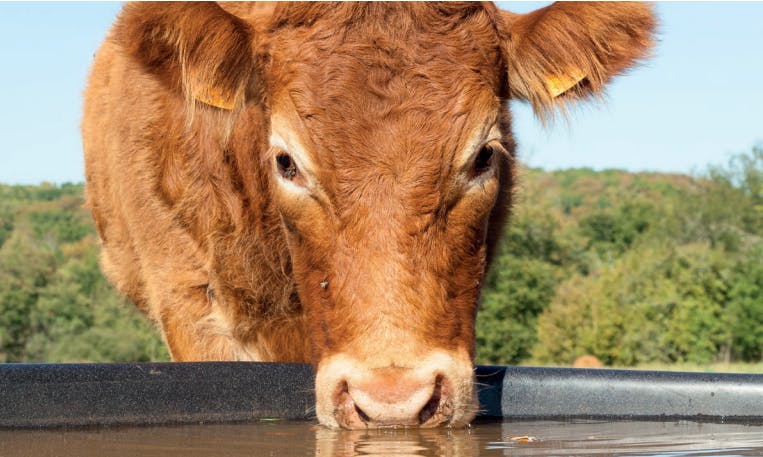
success-stories
Successful Crowdfund Case Study: DIT Technologies
DIT Technologies Case Study Campaign Year: 2018-2019 Campaign Type: AU – Retail Equity Crowdfunding Campaign Duration: 87 Days Amount Invested: $656,500 Investors: 115 Average Investment: $5,708.70 % Funded: 164.1% DIT Technologies (DIT) is an innovative AgTech company, born out of the bush in Queensland and developed over generations by founder Mark Peart and his father and uncle. DIT’s patented technology supplements livestock (an essential practice to ensure adequate nutrients) through their drinking water. The proportional dosing equipment and supplements saves farmers' time and costs and better equips the animals to handle extreme weather like the 2018 drought. In fact, a farmer with 500 cattle can see a return on investment in just 50 days. In the first 4 months of FY2018, DIT generated $408K in revenue – a 38% increase from the full financial year prior. With a robust business model poised for growth, DIT undertook the capital raise to scale quickly, maintain a competitive advantage and expand. Use of funds will go towards opening new factories across Australia to cover key sales areas with access to ports for raw commodities. DIT will continue to grow their sales team, building on their humanised customer service approach, by creating personalised relationships. Prior to the launch of the campaign, DIT opened the first of several ‘microfactories’ in Toowoomba. The story caught the attention of local and national newspapers and news stations alike including SmartCompany. Their merger with Harrington Systems Electronics (HSE) was also announced during the tail end of the campaign. HSE creates remote monitoring technology that withstands rural environments, further complimenting DIT’s value offering. The growing awareness surrounding the extreme drought in certain parts of Australia was key to generating awareness in the equity crowdfund. DIT received press from Smart Company and The Australian where Mark Peart bridged the gap between ‘city folk’ and the bush by noticing the success of campaigns such as “Buy a Bale” and the growing concern for farmers. After raising 85% of their minimum investment target in under 24 hours, it was not only social interest that encouraged investment but also the support from the surrounding community. Local and industry press covered the raise, including Beef Central, Queensland Country Life and The Courier Mail. In fact, 46.6% of investors were from Queensland as you can see from the graph below. DIT is an example of how powerful a community can be for funding the growth of a start-up that benefits a local industry. Quote from Mark Peart, CEO & Founder at DIT Technologies 'DIT Technologies successfully raised over $650,000 from 115 investors which we were extremely happy with. The Equitise team came with a wealth of experience and supported us throughout the campaign. They are passionate about helping early stage companies raise capital - a task which can be very difficult. The process was streamlined with their automated systems and the marketing and PR helped to not only secure funds but raise brand awareness. We've walked away with not only capital but with 115 investors who are brand advocated for DIT.'' The offer successfully closed after an 87-day campaign period, raising a total of $656,500 from 115 investors.
February 28th 2019

success-stories
Successful Crowdfund Case Study: Endeavour Brewing Co.
Campaign Year: 2018-2019 Campaign Type: AU - Retail Equity Crowdfunding Campaign Duration: 76 days Amount Invested: $557,800 Investors: 585 Average Investment: $953.50 % Funded: 182.9% Endeavour Brewing Co is a 100% Australian, 100% independent brewery founded 8 years ago by 3 blokes with the help of 35 mates. What sets Endeavour apart in a market quickly growing with new entrants is their commitment to quality and taste. Their core range uses the best that mother nature has to offer; fresh Australian ingredients. The result is flavoursome, award-winning brews and the company has experienced double-digit growth year-on-year since inception. Their launch into hospitality with Endeavour Tap Rooms in The Rocks, Sydney was a major contributor to this growth. The collaboration with Applejack Hospitality complimented their focus on seasonal ingredients and gave Endeavour a home with a microbrewery onsite. Already sold nationwide (1,100 Dan Murphy and BWS stores) the company sought capital to expand further into hospitality, opening new brew bars in more high-traffic areas, building a world-class production brewery (eliminating the need to outsource production) and expanding into SE Asia and beyond. Endeavour was the first brewery in Australia to launch an equity crowdfund. After the incredible success of breweries around the world, such as the equity crowdfund for BrewDog, more breweries are looking towards the crowd. With 40% of craft beer drinkers being 30-39 (22% between 18-29 and 23% between 40-49), the Endeavour raise is a clear example of turning a loyal following into a community of investors. Press began prior the launch of the campaign, gaining over 600 expressions of interest after they appeared in Brews News, SMH and news.com.au. An event after the launch of the campaign was held at Endeavour Tap Rooms with a strong turnout where attendees received their own Endeavour cap and six-pack of their newest release - Citrus Pale Ale – a crisp summery pale ale with Blood orange and mandarin. The offer successfully closed after a 76-day campaign, raising a total of $557,800 from 585 investors. Every Endeavour investor became a part of the Endeavour Brew Crew, a tiered rewards system, that gives investors exclusives such as the first to receive new releases, discounts, merchandise and investor-only brews.
February 13th 2019
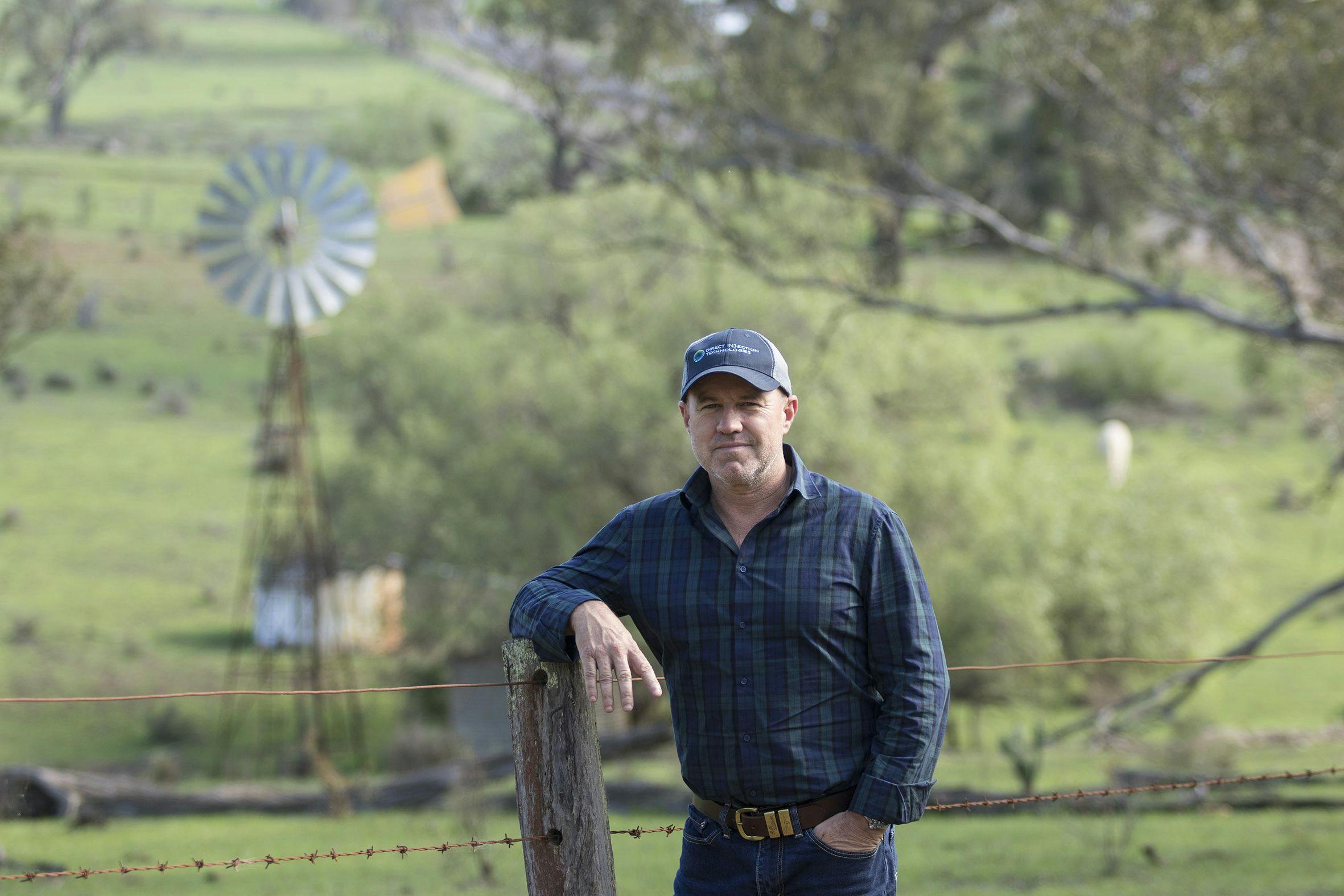
offer-news
Harrington Systems Electronics Merges With DIT Technologies
Media Release: Harrington Systems Electronics Pty Ltd merges with DIT Technologies Ltd to up AgTech game for farmers. Harrington Systems Electronics are pleased to announce the planned merger with DIT Technologies Ltd to offer joint Ag-Tech solutions for farm management and increased productivity through remote monitoring and supplementation through water medication. DIT Technologies Ltd will acquire 100% of Harrington Systems Electronics Pty Ltd, including key people and customers and the merged business will operate under the Direct Injection Technologies brand. Harrington Systems Electronics was created in 2005 by William Harrington and family with the aim of bringing to the agriculture industry practical and hardy technologies made to withstand rural conditions. HSE over the last 14 years have provided the industry with game changing remote monitoring technology (uSee Remote Monitoring) to help producers save time and money with water and stock management. DIT Technologies is an exciting company with a long history of providing water medication products that allow for water supplementation for livestock using patented proportional dosing technology. DIT has plans over the next 12 months to expand operations to multiple locations across Australia and in the longer term, expect to roll out a global expansion. HSE has been working with DIT Technologies Ltd for over 2 years to help develop their water medication systems and integrate them into the uSee Remote Monitoring platform to allow users to see all their camera, tank and water data in one spot. DIT Technologies Ltd is an exciting company paving the way with remote water supplementation so the merger is a natural progression for both companies. This merger will allow the continued development of the uSee platform and designing of practical technologies with rural condition in mind. Moving forward, William Harrington will take on the role of CTO for Direct Injection Technologies to spearhead development of their next generation of water medication systems and develop the next generation of uSee products. William Harrington, managing director of HSE will become DIT’s Chief Technology Officer and will oversee product development for DIT going forward: “I am excited to join the DIT team and to have the opportunity to further the development of the uSee remote monitoring system and on DIT’s other key products, the Nutridose and Promatic. I’ve had an interest in AgTech my entire life and will continue to design products for the industry I am wholly dedicated to.” Mark Peart, CEO and Founder of DIT Technologies Ltd sees the merger as a positive move for the consumer: “The merger with Harrington Systems Electronics will allow us to offer a platform for remote monitoring and in time the ability to provide remote controlling of our proportional dosers. As we move forward we will be able to solve connectivity problems in real time, offer animal tracking and virtual fencing solutions This will give graziers and farmers a ‘one stop shop’ for all of their technology and innovation solutions.” The uSee platform is a very easy to use platform to assist with remote monitoring and Will’s understanding of Technology in the Livestock sector is second to none. His network, connections, passion and ability will add tremendous value to DIT and allow our business to continue to scale and innovate assisting Australian farmers in remaining the best in the world. This is a very exciting day for our company as we scale and grow to build a truly Global Australian Livestock Technology and Animal Health Business from the dust up. This acquisition will allow DIT to integrate the uSee remote monitoring system into their water supplement dosing products and to use DIT’s newly established sales team to further sales and support of the uSee products. To view the DIT investment offer on the platform, click here.
December 16th 2018

trends-and-insights
A Year in Review - An Infographic
2018 was a year of firsts for us, and a really exciting one at that. For the first time ever, everyday Australians over 18 years could invest in early stage companies and we set out to provide the platform to make it happen. As soon as we received our license on 11 January, we launched our first campaign with Xinja which would go on to be the most successful equity crowdfund in Australia. Over the year, equity crowdfunding's place as a new way to invest or raise capital began to take shape as a variety of companies joined our platform including an award-winning gin distillery, an innovative movie app, and a socks and jocks subscription service! In September, the law passed allowing proprietary companies to raise capital through equity crowdfunding, removing the hassle for many early stage companies of converting to publicly unlisted. This opened up equity crowdfunding to a whole host of new investment opportunities and we launched our first campaign (and Australia's first brew raise) under the new laws in December. But it wasn't just about the retail raises. We also successfully completed six wholesale offers including Car Next Door and two IPOs including identitii which raised A$1,672,500 and listed on the ASX later in the year. It's been a strong and exciting inception for a new industry which is only just getting started. Now to 2019... For our upcoming 2019 offers, click here.
December 12th 2018

for-investors
Equitise Platform Tutorials
We've compiled a set of tutorials to guide you through the most frequently asked questions about our platform and the investment process. Click the below links to view the tutorials: How to create an account on the Equitise platform How to verify Sophisticated or Wholesale investor status How to verify your identity on the Equitise platform How to set up an Investment Vehicle How to invest in an Equitise offer What is Equitise? Why invest through Equitise? When can I sell my shares? Also check out our FAQs for more information about Equitise and equity crowdfunding.
December 11th 2018

offer-news
Endeavour Brewing Co: Craft Beer and Equity Crowdfunding
About the Company Endeavour Brewing Co. is the first brewery equity crowdfunding campaign in Australia. Endeavour was founded in 2010 with the backing of 3 blokes and their 35 mates and has grown to sell over 6.7 million serves, generating 4.8 million in revenue in FY18. Their multi-award winning beers (including 2 awards won at the prestigious Beer World Cup) are now stocked in over 1,100 Dan Murphy's and BWS stores, as well as iconic bars and restaurants. A collaboration with Applejack Hospitality saw Endeavour expand to hospitality in 2016 with the opening of the Endeavour Tap Rooms, home to Endeavour's first brewery. With the capital raised, the company hopes to expand on their highly successful launch into hospitality, opening a new Brew Bar each year, as well as building their own world-class production brewery, moving away from outsourcing the bulk of their beer production. Why Equity Crowdfunding? Craft breweries have experienced strong growth in recent years as consumers demand a higher quality and more flavoursome product. This success has triggered a wave of acquisitions locally, with popular brands including Little Creatures, Mountain Goat, 4 Pines, Pirate Life and Feral selling off to the large international players (Kirin, Asahi, ABInbev and Amatil). Valuing their independence and wanting to grow the brand in tandem with their customers, Endeavour is following in footsteps of international craft breweries that have chosen equity crowdfunding to grow the business. The company hopes that its community of shareholders, dubbed the 'Endeavour Brew Crew', will play a role in its future growth and will allow the business to evolve without the constraints of typical 'big beer' boardroom decision making. Case Study: BrewDog Founded in 2007, UK based BrewDog began its journey selling hand-filled bottles at markets out the back of a van. Raising just £750k in their first 'Equity for Punks' equity crowdfund in 2009, BrewDog has just closed their fifth equity crowdfund, 'Equity for Punks V' at a £1 billion valuation. This valuation represents a 2,765% ROI for early investors, who were given the opportunity to participate in a share buyback to realise profits from the uplift in valuation. BrewDog achieved this impressive growth by building a community around its brand with its 90,000 shareholders, offering discounts and first access to limited edition brews to its 'punks'. The company's AGM is an annual highlight for shareholders, being a craft beer filled concert at BrewDog's brewery in Aberdeen, Scotland. BrewDog now operates over 65 bars internationally, 2 breweries, with a third planned, and the world's first crowdfunded craft beer hotel. Craft Brewery Equity Crowdfunding Valuation The craft beer industry is experiencing high growth with Goldstein Research forecasting a CAGR of 5.3% to 2025. As craft breweries are early stage businesses that may not necessarily be generating positive earnings at the time of a capital raise, revenue multiples are commonly used in the industry to provide a relative valuation. A higher revenue multiple represents a relatively more expensive company, while a lower revenue multiple shows a relatively less expensive valuation. However, revenue alone is not a complete picture of a business and differences in multiples may be explained by fundamental differences between the companies. The below table summarises some of the statistics behind brewery equity crowdfunds internationally. The Endeavour equity crowdfunding campaign is live until mid February on the platform. Investors can invest from as little as $100 and gain access to the rewards and benefits of the Endeavour 'Brew Crew'
October 11th 2018

success-stories
Successful Crowdfund Case Study: MANRAGS
Campaign year: 2018 Campaign type: AU – Retail Equity Crowdfunding Campaign duration: 40 days Amount invested: $362,250 Investors: 177 Average investment: $2,046.61 % Funded: 120.8% MANRAGS Holdings Ltd is made up of two brands; MANRAGS and the soon to be launched, MS SOUS. Both brands offer unique, high-quality socks and underwear made using 100% Egyptian cotton through subscription. At the time of MANRAGS’s equity crowdfund on the Equitise platform, it had amassed a 35,000 strong social media following with over 7,000 subscribers, representing an annual growth rate of 109%. As MANRAGS prepared for the imminent launch of its MS SOUS brand, targeting the women’s essentials market, the company sought capital to fund product development, an increased marketing budget and working capital. MANRAGS co-founder Michael Elias saw equity crowdfunding as the obvious choice to raise the required funds, stating that “Our growth has been driven by our community, hence the decision to bring the community on the journey. They can own a piece of it.” The MANRAGS equity crowdfund is perhaps the clearest example of how equity crowdfunding provides businesses the capital they need to expand by bringing their customers on board to grow together with the business. Investors within the 25-34 age group, being MANRAGS’s primary customers, invested 58% of all capital raised. This result is another example of how equity crowdfunding is not only a capital raise, but a focused and targeted marketing activity. The Equitise x MANRAGS offer was featured in SmartCompany and Jumpstart Magazine and social media and email channels were utilised to raise awareness of the offer. Events were held in both Sydney and Melbourne to provide a forum for interested parties to learn more about MANRAGS from co-founder Michael Elias and the equity crowdfunding process from Equitise co-founder Chris Gilbert. Those attending also received their very own pair of MANRAGS socks. The offer successfully closed after a 40 day campaign period, raising a total of $362,250 from 177 investors. MANRAGS’s new shareholders will not only be able to share in the company’s future growth, but will also enjoy up to 36 months of subscriptions to either MANRAGS or MS SOUS or both.
October 8th 2018

success-stories
Successful IPO Case Study: identitii Limited
Campaign Year: 2018 Campaign Type: AU - IPO Campaign Duration: 20 days Amount Invested: A$1,672,500 N° of investors: 289 Average Investment: A$5,787 identitii (ASX: ID8) is an emerging Australian software company providing enterprise software for financial services and banking institutions. Established in 2014, identitii has developed its own proprietary product called Serra, an application that enables the secure and trusted exchange of information (such as “Know Your Transaction” information) over financial networks, powered by a secure private blockchain. identitii developed Serra through a two and a half year in-house research and development program, and has a long term product roadmap for additional features or ‘add-ons’. With Serra, identitii has taken the approach of utilising the benefits of blockchain and tokenisation to complement the established payment networks such as SWIFT, the international messaging network that facilitates the exchange of funds between correspondent banks. Serra aims at mitigating the shortcomings of these existing networks, primarily the way by which they share information, rather than trying to replace them, which is attractive to an industry that is risk averse when it comes to mission critical systems. Equitise's allocation was filled in 20 days, oversubscribing the offer. Demand for shares was high, with over $1m being committed within a week of the offer going live. identitii comes as a time when blockchain technology is gaining mainstream attention, following the highs that cryptocurrencies made in December last year. According to a recent YouGov survey, 79% of people have heard of cryptocurrencies and almost half of millennials believe that there will be widespread adoption of cryptocurrencies in the next decade. The enthusiasm of millenials for blockchain technology and its applications beyond cryptocurrencies is reflected in our investor makeup, with the largest age group being the 25-34 bracket, followed by the 35-44 age group. The offer also gained interest amongst older age groups; a sign of how blockchain is no longer only within the realm of tech-savvy millenials. Low turnout for the 18-24 age group is likely due to lower levels of savings and investment amongst students and those not working full time. The funds raised in this offer will assist with ongoing development and commercialisation, appointing resources in business development, marketing, account management and professional services in key Asia-Pacific markets, costs of the Offer, corporate overheads and working capital. The shares were issued at a price of A$0.75, and listed at $0.95 on the ASX. Quote from Nick Armstrong, Co-founder and Chairman at Identitii Ltd "We engaged Equitise to manage the Chairman's list and also the retail spread requirements for our ASX listing. The process of engagement and running the offer was very slick and we were very happy with the outcome. The Equitise team worked extremely hard on the transaction and I was very impressed with their output. We would happily recommend Equitise to any future prospective client."
October 8th 2018
trends-and-insights
Amendment Extends Equity Crowdfunding
In January this year we received our retail equity crowdfunding license which means for the first time in Australia early stage companies could turn to equity crowdfunding as an alternative for raising capital. One of the biggest concerns for these early stage companies was that they were required to convert from a proprietary company structure to a public unlisted structure. Some concessions were given to those companies that needed to convert to a public unlisted company including exemptions from audits (when raising under $1m) and AGMs. However, the preparatory legal work, along with the ongoing compliance obligations, put off many entrepreneurs. The conversion process also entailed a one month waiting period on the Commonwealth Gazette, which caused substantial delay to the crowdfunding process, putting off any growth activity that could be implemented from the capital raised. Responding to concerns regarding the inefficiencies in the new CSF regime from both early stage companies and equity crowdfunding platforms, the Corporations Amendment (Crowd-sourced funding for proprietary companies) Bill 2017 (Cth) was passed by the Senate on 12 September 2018 and will come into effect 28 days after receiving royal assent, extending equity crowdfunding to proprietary companies. This is great news for early stage companies as this form of capital is now more readily accessible with less regulatory red-tape slowing down the process. Many of the rules that applied to public unlisted companies under the old CSF legislation will continue to apply to proprietary companies, including the $25m asset and turnover caps, the requirement for the business to not be listed on any stock exchange and the company’s principal place of business being in Australia. While the new legislation does require companies to include details of CSF shareholders on the company register, these will not count towards the 50 shareholder cap that applies to proprietary companies. This exemption continues to apply even if shares are transferred to another shareholder later, so long as the shares were originally issued through a CSF offer and that the company’s shares have not been traded on financial markets (in Australia or otherwise). Additionally, proprietary companies utilising equity crowdfunding will be exempt from Chapter 6 of the Corporations Act 2001 (Cth) which deals with takeover rules that usually apply to companies with over 50 shareholders. This exemption means that proprietary companies raising capital through CSF will not have to navigate the complex and onerous rules in Chapter 6, despite having a diverse share register after raising funds through equity crowdfunding. This is a positive given that many early-stage companies will be aiming to position themselves for a sale in the future. However, recognising that proprietary companies undertaking equity crowdfunding will bring on board CSF shareholders that most probably won’t have a personal connection with the business, the new legislation imposes additional requirements on proprietary companies to protect shareholders, including: A minimum of two directors, with at least one ordinarily residing in Australia if there are two, or a majority of directors residing in Australia if there are more. Annual financial reports (prepared to accounting standards) and directors’ reports to be distributed by proprietary companies with at least one CSF shareholder during the financial year. These may be distributed online, and no written communication is required. Audits required where companies raise $3m or more through CSF offers, with an auditor’s declaration to be included in the directors’ report. Where applicable, an auditor should be appointed within one month of the CSF offer closing. Notifying ASIC in certain circumstances, such as when issuing shares that causes a company to have CSF shareholders, or cancelling shares so that a company no longer has any CSF shareholders. Compliance with Chapter 2E of the Corporations Act 2001 (Cth) dealing with related party transactions. Overall, these changes reflect a relaxing of the regulations surrounding the types of companies eligible for CSF in Australia. This is a positive and welcome change for the industry, with more entrepreneurs being able to access this type of capital and more investment opportunities available for investors.
October 2nd 2018

success-stories
Successful Crowdfund Case Study: Choovie
Campaign year: 2018 Campaign type: AU – Retail Equity Crowdfunding Campaign duration: 49 days Amount invested: $294,250 Investors: 116 Average investment: $2,536.64 % Funded: 117.70% Choovie is driving a revolution by changing the way that consumers engage with cinemas. Through their independent digital platform and Choovie’s proprietary dynamic pricing algorithm, moviegoers are matched with empty seats. This creates a win-win scenario as consumers are able to enjoy cheaper movies and cinemas generate additional revenue. Since its launch in April 2017, Choovie has experienced rapid growth, growing to over 20,000 subscribers and having generated over $100,000 in gross revenue across 40 cinemas nationwide. With plenty more cinema partnerships in the pipeline and a highly scalable digital platform, Choovie partnered with Equitise to raise capital to fund their continued growth. When we asked Choovie co-founder Sonya Stephen in our Founder Interview why equity crowdfunding was the right choice for Choovie, Sonya told us: “We really wanted to give our customers the opportunity to become part of the Choovie family and crowdfunding gives us the chance to do this. It also works the other way – we get access to new shareholders who can become Choovie customers. The synergies are perfect for us. You can’t get a more loyal customer than one who is also a shareholder!” The realisation of these synergies was reflected in the data, with 40% of new shareholders coming from Choovie’s target market, millennials. This is a large increase from our previous offer, The West Winds Gin, in which millennial investors made up under 30% of all investors. This speaks immensely to equity crowdfunding as being not only a capital raise, but also a marketing campaign to acquire and convert customers to shareholders and brand ambassadors. The offer was marketed heavily by both Equitise and Choovie, focusing predominantly on social media and PR channels. News of Choovie’s equity crowdfunding campaign was seen in the Sydney Morning Herald, Business Insider and Smart Company, amongst others. Investors also had the chance to learn more about Choovie from our equity crowdfunding masterclass event, which featured Choovie co-founder Shane Thatcher presenting and hosting a Q&A session. Choovie’s equity crowdfunding campaign through Equitise raised a total of $294,250 from a crowd of 116 investors. These funds will allow Choovie to continue to develop its platform, increase its marketing effort and plan for its international expansion. Choovie’s crowdfunding campaign was a great demonstration of how crowdfunding is able to convey a message to a brand’s target market and align their interests with that of the business.
August 27th 2018
trends-and-insights
The Rise of the DNVB
DNVB. Digitally Native Vertical Brands. If we broke it down, you’d likely figure out how their business models work…on the surface. You see, being either digitally native or vertically integrated brings with it their own respective benefits to brands. However, the companies bringing both together are revolutionising everything we knew about e-commerce. On The Surface Digitally native refers to a brand that began online, pure and simple. The key here is that they began online, it doesn't necessarily mean they don't eventually venture out into the physical world. The digital world gives these brands direct access to consumers, plus, they enjoy lower overheads without physical retail presence. A vertically integrated company is one that controls one aspect of their supply chain, such a manufacturing or logistics, and outsources everything else. Just because they only focus in one area doesn’t mean they have less control, they still control everything from specifications of the product to where it is sold. For DNVBs, these companies focus on the digital aspect and outsource everything else. A Recipe for Success The most famous players in this space began around 2007 with the launch of The Dollar Shave Club, Glossier, and Casper who all became successful in a short amount of time. So, what do all these businesses have in common other than the amount of control they have across their value chain and being born online? A commonality across DNVBs are highly differentiated or premium quality products or services with added convenience at a price point that is perceived as good value. Another attractive quality of DNVBs is their ability to offer unique products that connect with niche audiences. As DNVBs are vertical and online, they are able to keep their prices down, making them more affordable for both mass-market or niche audiences. Differentiation and convenience results in an opportunity that DNVBs share and have invested in. They make it nearly impossible to shop from a competitor. How do they do this? In economics, this is comparable to a zero-sum market meaning that by choosing one option, you forgo all others. DNVBs offerings are designed to require no need for repurchasing or no need to go elsewhere. Creating It All With Customers Beyond the price, conveniency, and exceptional quality, consumers are drawn to the unique buying experiences that come with DNVBs. They use the digital world to engage with customers the way they want to be engaged with and thus they have taken on a new type of role in consumers’ lives. DNVBs are understanding, addressing, and approaching their customers like never before. The ability for DNBVs to provide this revolves around their access to data - a by-product of their vertical integration and digital business model. Since they are the sole actor throughout the entire customer journey, they have all the resulting raw data at their fingertips. In every interaction and transaction, valuable data is created. The data allows them to study their customers and follow their wants and needs closer than ever before. This deep learning is at the core of their business model, from creating and improving their products to designing the entire customer experience! Combining the benefits of vertical integration with the digital world is a recipe ripe with potential and the proof is in the numbers. In the US, DNVBs are growing 3x as fast as the average e-commerce retailer. Their dynamic and unparalleled relationship management, customer experience, and value proposition makes these businesses the ones to watch.
August 23rd 2018

trends-and-insights
Subscription Revolution
E-Commerce Subscription Services Flourish As They Offer Consumers More Than Ever Before Subscription services seem to have evolved with us. What started as a way to ensure replenishment, without the hassle, has evolved to meet changing consumer wants and needs. With the dawn of the digital age, and all the data that comes with it, there are always unmet needs and additional value to uncover and explore. With convenience being the classic draw that it is, we seem to have come full circle with the subscription business model. And business is booming. A subscription business model offers consumers access to products or services in exchange for a reoccurring fee. With many subscription services being born online, these services still offer the same convenience as subscriptions always have, but today they are more personalised than ever. With three broad types of subscription services that cover a multitude of needs and wants, it's no wonder why the subscription e-commerce market has grown 100% over the last five years. Types Of Subscription Services Replenishment The reason subscriptions exist in the first place. Replenishment subscriptions automate the purchase of commodity items that we are consistently needing to repurchase. The Dollar Shave Club is a perfect example of this and one of the first to be born digitally. Having launched in 2007, the company now has 3 million subscribers and was acquired by Unilever for $1 billion in 2016. Access In access subscriptions, subscribers gain access to members-only perks or lower prices by paying a monthly fee. A common example of this is through access to content, such Netflix, which currently has 10 million subscribers in Australian alone. Or take for instance the car manufacturers trying on subscription services. Yes, you read that right. Several car manufacturers are adopting a subscription model similar to ride sharing platforms. Mercedes-Benz is piloting a subscription service that gives subscribers access to a different luxury vehicle every month...for monthly fee of $2,995. Curation The newest addition to subscription services, curation subscriptions seek to surprise and delight their customers. These companies do this by providing new products or highly personalised experiences in the form of customised food, apparel, or beauty offerings. Take Birchbox for example, where customers pay a monthly fee to receive an assortment of beauty product samples that meet their needs. Today, the company has 1 million subscribers. What Customers Want But which type of subscription services do consumers tend to gravitate towards more? According to a study by McKinsey, curation is the most popular subscription type, at 55% of the total subscriptions, which suggests a strong desire for personalised services. Replenishment follows closely behind at 32%, followed by access subscriptions at 13%. With curation being a main draw in subscription services, who are the customers gravitating towards these offerings? The same study by McKinsey suggested that men value the automated purchasing that subscription services offer, with 42% of men having two or more subscriptions (compared to only 28% of women). Online apparel subscriptions have grown as more opportunities to offer the convenience and added value of both curation and replenishment are uncovered. While women hold the majority of subscriptions, there are a growing number of apparel subscription services for men that tap into their need for replenishment while offering the variety that comes with curation. On the Equitise platform, we've brought on a subscription service that is experiencing tremendous growth and can be categorised as both a replenishing and curated service. MANRAGS began by delivering high quality men's socks to customers every month with changing styles that reflected their preferences. In April last year, the company began offering the curated boxers to replenish drawers all over the world. And today, they are evolving to bring even more to the table. It All Boils Down To The Experience In the realm of subscription services, no matter what a customer is looking for, there is one element that stays the same: a seamless customer experience from beginning to end that provides customers with the tangible benefits or added value that they're after. Whether it's lower prices or customised personalisation, consumers want it all with convenience. Always remember to read the offer document and CSF general risk warning before investing.
August 23rd 2018

success-stories
Successful Crowdfund Case Study: The West Winds Gin
Campaign Year: 2018 Campaign Type: AU – Retail Equity Crowdfunding Campaign Duration: 78 days Amount Invested: $932,000 Investors: 290 Average Investment: $3,213.79 % Funded: 186.4% Hot on the heels of Xinja, Australia’s first retail equity crowdfund, we launched The West Winds Gin offer, providing retail investors an opportunity to invest in Australia’s champion gin distillery. The West Winds Gin is Australia’s only distillery to hold three Australian Champion Gin awards, in addition to numerous international awards. Its artisanal gins are renowned for combining traditional gin flavours with native Australian botanicals, creating a unique drinking experience. Importantly, the company’s ethos of building its brand together with their customers made it an ideal candidate for retail equity crowdfunding. Widespread marketing of the offer by both Equitise and West Winds ensured that it was quick out of the gates, reaching 100 unique investors within 72 hours with the minimum amount of $500,000 being fully funded within a week. The offer also received a healthy amount of PR from The West Australian and SmartCompany and featured on 9 News Perth. The crowd also got a chance to learn more about the offer from Paul White, founder and CEO, while enjoying G&Ts made with West Wind’s award-winning gins, at our Equity Crowdfunding Masterclass. The West Winds Gins at our Equity Crowdfunding Masterclass Over 78 days, a 290-strong crowd invested over $930,000 in The West Wind’s Gin offer, overfunding the offer by 86%. This capital will allow the company to grow its domestic and international markets together with its long-time customers and new shareholders. This great result demonstrates how equity crowdfunding is both changing the way that companies can access capital, and in turn, the investment opportunities available to retail investors.
August 22nd 2018

success-stories
Successful Crowdfund Case Study: Xinja
After we were one of the first platforms to receive our retail equity crowdfunding license on January 11 2018, we quickly launched our first offer, Xinja, making it the first ever retail equity crowdfund in Australia. It went on to raise over $2.4 million exceeding expectations and acting as a proof of concept for both neobanks and equity crowdfunding.
August 3rd 2018

success-stories
The West Winds Gin: Infographic
The West Wind's Gin equity crowdfund kicked off in May with a minimum investment goal of $500,000. Over the course of the campaign, surprises were rolled out, including a brand new gin and the opening of their first bar and pilot distillery. But what did it take for their raise to be successful? For clues, we broke down the crowdfund below. To explore our current and coming soon offers, click here.
July 12th 2018
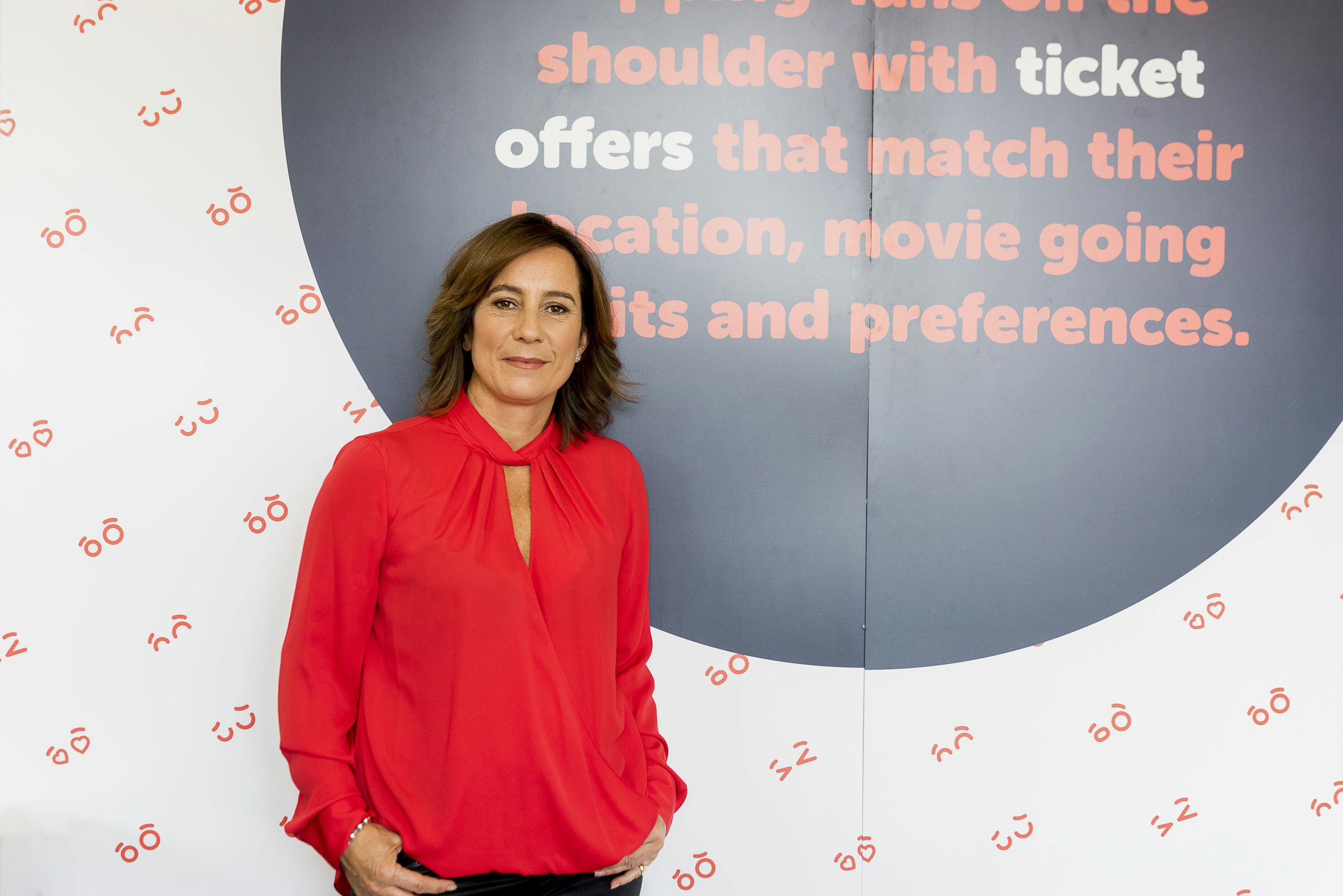
offer-news
Founder Interview: Sonya Stephen of Choovie
In this digital era, it is exciting to watch industries evolve over time as they attempt to reflect our own changing tastes and preferences. This kind of evolution brings immense value to consumers and in a variety of ways. Choovie is a platform that is meeting the changing needs of consumers while bringing more people to the cinema in the process. We sat down with one of Choovie's founders, Sonya Stephen, to find out how one night at the movies turned into a business model that is revolutionising the industry and what we can expect in the future. What is your background? I’m a stockbroker by trade and worked in the UK and Australia for 10 years. After that time I felt I had worked on the ‘dark side’ long enough and moved to a global role at Computershare, in the US and in Australia, in product development. After that, I made a big move and was lucky enough to be the CEO of the Cathy Freeman Foundation for 6 wonderful years supporting Indigenous education. Put all this together and the experience I have gained from each of my roles lead me to Choovie. What is the story of your business? What gave you the idea? Choovie was born in 2014 on a Wednesday night, when [Co-Founder] Shane and I went to our local cinema to see a movie at 6.30 pm. We soon noticed there were only five other people staring at the same screen as us. We turned to each other and said, ‘how does this business make money?’. So, we decided to do a 'reccy' and ran to the other 13 screens to see how many people were watching a movie. We counted another 28, so 33 in total. We were then thrown out by a suspicious bouncer! About 10 minutes later, Shane drew a revenue optimisation graph on a beer coaster and started muttering about high fixed-cost businesses - where the product is perishable. He wondered, if people aren’t buying what cinemas are selling, why don't they drop the price? That way they could sell more tickets. Sell more popcorn. Make more money. It seemed to be simple economics. Over the following months, we discovered that the average cinema sells less than 17% of it's tickets but 71% of Australians still love going to the movies each year. We also saw ticket prices soaring, attendance falling, particularly among Millennials, and an industry that is failing to take advantage of mobile and digital technology. We recognised an opportunity for a genuine win-win-win. An opportunity for movie fans to enjoy more movies, for cinemas make higher profits, and for us to build a business and revolutionise an industry. So, we created the world’s first customer-facing platform that prices cinema tickets according to demand. With Choovie, the lower the demand, the lower the price. In an industry where average occupancy is low, customers have plenty of chances to find a cheaper option. Airlines and hotels have been doing this for years, and their occupancy and revenues have exploded. Where did the name 'Choovie' come from? Honestly, the kitchen bench. Shane and I were still in the stages of researching the industry and investigating whether dynamic pricing or variance pricing would bring more people back to the cinema. We kept calling our idea ‘the movie thing’ and one night we decided to choose a name we could use as a placeholder until some guru advertising person came up with the right name. We are huge believers that the only way to see a movie is on the big screen so we wanted people to CHOOse a MoVIE. Simple as that. Over the next two years we kept telling people that the name could be changed at any time but everyone we met said they loved it so it stuck. What can you tell us about the team behind Choovie? They are phenomenal. Choovie has assembled a team of committed and talented cinephiles who just happen to be top class professionals in data, technology, marketing, and management. Our leadership team is made up of Dr. Vejune Zemaityte who is a soon to be PhD in Cinematic Studies and one of the few people in the world with expertise in cinema related data. Then there's Janhavi Gohill our development manager who has experience in designing and delivering large commercial software solutions. And finally, Will Barber, our Marketing guru who specialises in digital marketing and customer acquisition. Who is your target market? The market is Australia is vast, with 70% of Australians going to the cinema each year. This is good news because Choovie is not “selling” a new service. It is improving a service that most people already use and love, by delivering it at a lower price and in an easier way. However, we want to target those between 18 and 35 – the ‘elusive’ Millennials. To date, this age group makes up 55% of all Chooviegoers. Across the world, Millennials account for approximately one third of all cinema attendance and an even larger portion of revenues - since they generally pay the maximum price for a ticket. However, Millennial attendance over the past few years has steadily declined and cinema operators have found them difficult to engage with through traditional channels. Choovie provides cinemas with a proven way to engage and monetise this critical demographic. How do you expect Choovie to be profitable? Choovie’s base business model is simple, we sell each ticket with a margin or fee over and above the cost of the seat. However, this is just the beginning. There are a few additions to the business model that are either in testing or in development. We want to work with cinemas who do not have a website or have a website but no online sales capability. Then we can create their on-line presence utilising Choovie’s technology and data and take a margin from the cinema’s online sales. Another way we can bring in profits is by supporting movie distributors with our targeted movie promotions and feedback requirements through our unique customer understanding and communications capability. There is an opportunity to increase profits through our real-time candy bar promotions using Choovie's geo-fencing and communications capability, which is supported by the product suppliers. What's been the biggest surprise since starting your own start up? Just how hard it is and how strange it is that people think we came up with an idea that has ‘surely been done already by someone in the US'. The biggest one, though, is how difficult it has been asking people to consider thinking outside the box. It's hard in an industry that has been doing something one way for a hundred years to consider an alternative, even when we can show them the proof at the end of the day – the data – that there is more money in the till. Why should people invest in Choovie? Because they love movies, new technology, or they want to get in on the ground floor of a cinema revolution. Or all of the above! Why have you chosen equity crowdfunding to raise capital? We really wanted to give our customers the opportunity to become part of the Choovie family and crowdfunding gives us the chance to do this. It also works the other way – we get access to new shareholders who can become Choovie customers. The synergies are perfect for us. You can’t get a more loyal customer than one who is also a shareholder! What's next for Choovie? We are busy rolling out across Australia as we speak. As we do this, we are going to experiment with a few new revenue streams and some great new technology. Next year we'll begin our overseas roll-out, starting with the UK, Ireland, and New Zealand. Click here to learn more about the offer and to invest. Always consider the offer document and the general CSF risk warning before investing.
July 9th 2018

success-stories
Successful Crowdfund Case Study: Glamazon
Campaign Year: 2017 Campaign Type: AU - Wholesale Amount Invested: A$350,000 Number of Investors: 3 Average Investment: A$116,666.67 The Australian beauty industry is worth over $4.8b, with over 21,600 salons Australia-wide, but has failed to adapt to current technological trends, still being heavily reliant on phone bookings for appointments. This is the market that Glamazon has started to revolutionise, achieving over 10k app downloads and 17.5k Instagram followers at the time of their capital raise. The Glamazon app brings real-time bookings to the beauty services industry, providing a convenient solution for customers to connect with beauty professionals, either at the salon or in the comfort of their own home. Customers save time by not having to research and liaise with multiple stylists, while freelancers are provided with an efficient means to develop a client base. Backed by Shark Tank advisor Barry Tennant and venture partner Christopher Strauch from Nova Founders Capital, Glamazon raised an additional $350,000 through Equitise’s wholesale distribution network. These funds were used to further develop Glamazon’s technology, hire staff and digital marketing.
June 28th 2018

success-stories
Successful IPO Case Study: PayGroup
Campaign Year: 2018 Campaign Type: AU – IPO Campaign Duration: 18 days Amount Invested: A$82,000 N° of investors: 15 Average Investment: A$5,466.67 PayGroup Limited (ASX: PYG) is a Software as a Service (SaaS) company that provides Payroll and HR outsourcing and Cloud-based Human Capital Management software to multinational companies in Asia-Pacific markets. Their solutions help medium to large businesses with employees across multiple countries reduce their operational and compliance risk. PayGroup successfully listed on the ASX through an IPO, in which A$82,000 was raised through the Equitise platform from 15 investors. Funds raised through the IPO were used to accelerate business growth by adding sales and marketing resources in Australia, Singapore, Hong Kong and other key selling markets, as well as further development of strategic partnerships with US and European providers. The IPO price was $0.50 per share and it reached a price of $0.87 within a day of listing, and $0.94 within a month, representing 74% and 88% returns respectively.
June 4th 2018

success-stories
Successful IPO Case Study: DongFang Modern
Campaign Year: 2015 Campaign Type: AU – IPO Campaign Duration: 7 days Amount Invested: A$95,920 N° of investors: 19 Average Investment: A$5,048 DongFang Modern is the largest harvester of citrus and camellia products in China, with over 8,000 hectares of plantations located within the premier fruit growing region, Jiangxi Province. These products are supplied to tier 1 Chinese cities through established supply chains and logistics channels. Demand for DongFang Modern’s products is anticipated to continue to increase as a growing Chinese middle class becomes more health conscious and fruit consumption increases. With the latest cultivation processes and tree husbandry increasing efficiency and yields, DongFang Modern has the potential to experience sustained growth in the coming years. DongFang Modern successfully listed on the ASX through an IPO, in which A$95,920 was raised through the Equitise platform from 19 investors. Funds raised through the IPO were used to make strategic acquisitions to expand land tenure and to increase working capital as the company wishes to maintain its debt-free status and cash flows are highly seasonal. The IPO price was $1.00 per share and it reached a peak price of $2.47 representing a 147% return for investors. Click here to explore our current and coming soon offers!
May 23rd 2018

success-stories
Successful Crowdfund Case Study: Magnetica
Campaign Year: 2016 Campaign Type: Au - Wholesale Campaign Duration: 37 days Amount Invested: A$1,110,760 invested N° of investors: 21 Average Investment: A$52,893.33 % Funded: 132.2% Magnetica is an Australian biomedical engineering and technology company specialising in next generation Magnetic Resonance Imaging (MRI) technologies. Magnetica has developed and patented lucrative IP and technology that allows smaller, lighter, faster and cheaper MRI systems to be built. Components of the patented technologies have already been utilised under license by global medical systems integrators. Currently there is no very high field (3.0T) compact specialty orthopaedic MRI product available in the commercial market. Magnetica, in collaboration with a global medical systems integrator partner, has started commercialisation of this product. Magnetica is also in the process of developing a proof of concept for a unique asymmetric MRI Head Scanner, including development of a prototype magnet and gradient coils. To complete commercialisation and proof of concept of these projects, fund business development of Magnetica’s RF Coil business and to meet working capital requirements, Magnetica sought a capital raise through the Equitise platform. Over 37 days A$1,110,760 was raised from 21 investors, overfunding by 32.2%. Click here to explore our current and coming soon offers!
May 23rd 2018

success-stories
Successful Crowdfund Case Study: Gather Online
Campaign Year: 2017 Campaign Type: NZ - Equity Crowdfunding Campaign Duration: 48 days Amount Invested: N$898,829 N° of investors: 12 Average Investment: N$82,485.75 % Funded: 213.3% Gather Online is a leading social media platform to gather and share what’s on your mind with people on your wavelength. Traditional social media including Facebook and Twitter have failed to help us sustain meaningful relationships with our friends and followers, with research showing that we never communicate with 89% of our social media connections. Time factors, delay and complacency between connections and within groups lead to stale conversations that eventually fade and communication is lost. Gather Online aims to change the way we interact by providing time-limited ‘Gatherings’ on a topic of interest that disappear after a set amount of time. By time-limiting Gatherings, members are encouraged to participate actively and immediately, keeping conversations fresh. The Gather Connect proprietary advertising technology, utilising an AI algorithm, aids in this process by funnelling like-minded users to the Gather Online platform. Following a successful Beta 2 test in early 2016, Gather Online was steadily gaining traction by generating 30,000 new users over the period, with a significant number of Gatherings achieving over 200 participants. With upcoming launches in the US, UK and Asia in mid-2017, Gather Online approached Equitise to crowdfund capital for scaling the business through hiring additional technology staff (60%) and marketing (33%). High interest in Gather online saw the crowdfund overfunded by 113.3%, raising a total of a$898,829. Click here to explore our current and coming soon offers!
May 23rd 2018

success-stories
Successful IPO Case Study: Powerhouse Ventures
Campaign Year: 2016 Campaign Type: NZ - IPO Campaign Duration: 40 days Amount Invested: N$57,200 N° of investors: 10 Average Investment: N$5,720 Powerhouse Ventures works with research-intensive organisations to identify valuable intellectual property, then commercialises this through start-up companies in which Powerhouse invests. Through capital investment, Powerhouse holds a minority but significant interest in the companies created. Over time, Powerhouse may invest further capital and provides hands-on support to these companies with the intention of growing the value of Powerhouse’s investment in these companies. Powerhouse held an IPO in August 2016. The goal was to raise funds to accelerate the development of the existing portfolio of IP-rich companies, enable investment in new ventures and to accelerate plans to make new investments in Australia. Investors were able to contribute NZ$57,200 to the Powerhouse IPO through Equitise. Click here to explore our current and coming soon offers!
May 23rd 2018

success-stories
Successful Crowdfund Case Study: Aisleworx
Campaign Year: 2015/2016 Campaign type: NZ - Private Campaign Duration: 229 days Amount Invested: N$621,917.00 N° of investors: 49 Average Investment: N$12,692.18 Funded: 207.3% Aisleworx is a digital media company that is building a powerful network of digital billboards mounted on a fleet of electronic shopping carts that also provide the world’s best family shopping experience The shopping cart, called the FunCart, is made for families and provides prime advertising space whilst improving customer satisfaction around the shopping experience. Children love the shopping experience as they take their parents for a ride in their personal car. The FunCart also has an interior screen providing world-class entertainment for moments when parents are busy shopping or waiting in queue. Connection to the cloud allows for advertisements and entertainment to be updated remotely, ensuring fresh and relevant content. The FunCart has already had success in major US retailers including Kroger, Safeway and Walmart, with 89% of families stating that the FunCart was an ‘important’ to ‘very important’ factor in deciding on stores to visit. Through the Equitise platform Aisleworx raised $621,917.00 from 49 investors, reaching 207.3% of their initial target. These funds will help with the development of new projects, including side screens and stackable carts, and the hiring of new personnel to move towards achieving the goal of $100m annual revenue within 6 years. Click here to explore our current and coming soon offers!
May 23rd 2018

success-stories
Successful Crowdfund Case Study: Retirement Income Group (RIG)
Campaign Year: 2015 Campaign Type: NZ-Equity Crowdfunding Campaign Duration: 8 days Amount Invested: N$455,300 N° of investors: 80 Average Investment: NZ$5,691 % Funded: 182.12% ~ Campaign Year: 2016 Campaign Type: NZ-Equity Crowdfunding Campaign Duration: 26 days Amount Invested: N$1,713,490 N° of investors: 57 Average Investment: NZ$30,061 % Funded: 124.3% Retirement Income Group (RIG) is New Zealand's established first mover in helping retirees transition from "saving for retirement" to "generating a sustainable income" in retirement. RIG established a managed Lifetime Income Fund which delivers long term revenue from investment in straightforward ETFs with a conservative balance allocation. Investors retain full ownership and access to their residual capital while receiving a guaranteed level of tax-free income for the remainder of their life. Upon death, all funds are returned to the deceased's estate. The primary benefit that Income Fund offers investors is certainty. Just like when retirees were working, money comes in every fortnight to pay the bills, irrespective of stock market crashes or lower interest rates. To fund regulatory and working capital requirements, including salaries, overheads, sales and marketing costs, RIG raised $455,300 from the crowd in 2015, and a further $1,713,490 in 2016. Click here to explore our current and coming soon offers!
May 23rd 2018
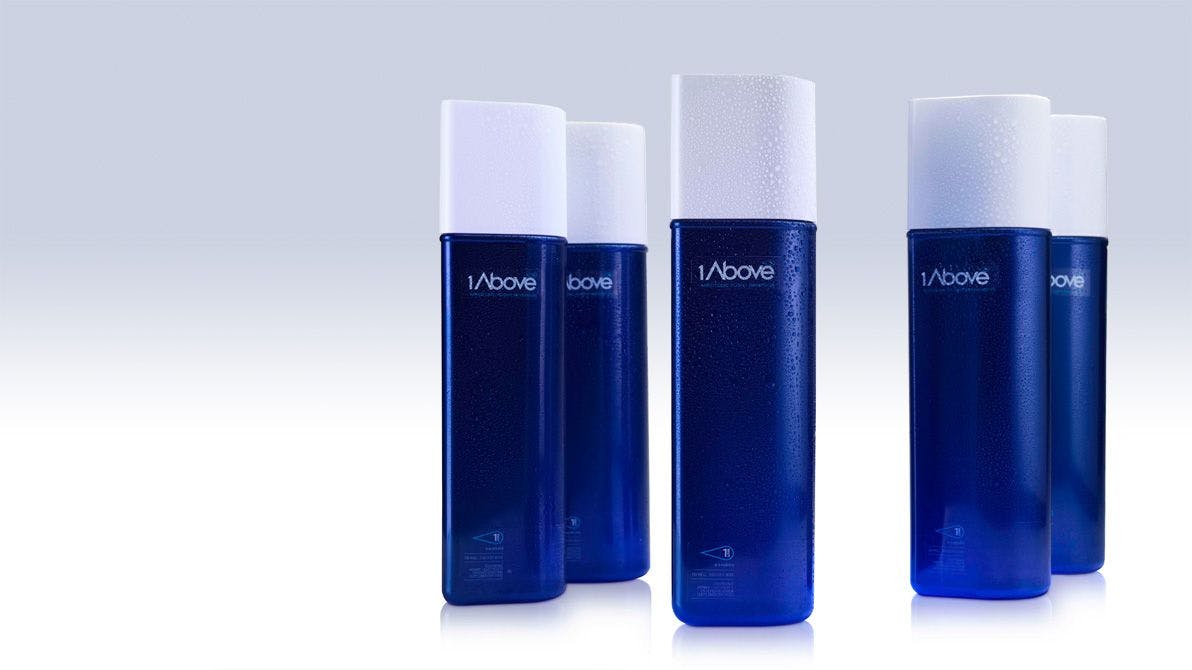
success-stories
Successful Crowdfund Case Study: 1Above
Campaign Year: 2016 Campaign Type: NZ-Private Campaign Duration: 34 days Amount Invested: N$1,856,112 N° of investors: 198 Average Investment: N$9374.30 % Funded: 104.1% Founder, Roger Boyd, launched 1Above in 2010 after years of research and development. It was his mission to create awareness around the health impacts of flying. The key to the product’s effectiveness and outstanding success lies with the power of a natural bark extract - Pycnogenol - which has more than 40 years of clinical support in the areas of travel well-being. With its ability to combat jet lag and travel fatigue through hydration, circulation, and immunity support – 1Above has helped travellers world-wide hit the ground running and beat the effects of flying. Since launch, 1Above has experienced high growth of 124% Compound Annual Growth with a FY16 revenue of NZ$2.4m. The product is available at over 250 distribution points across 32 airports in New Zealand, Australia and North America and the company looks to expand into over 3,700 new locations as well as develop online distribution channels with major online retailers. To help realise this growth which has been estimated to bring in $12.8m in revenue in FY19, Equitise investors joined venture capital funds Movac and K1W1 in a capital raise. 1Above successfully raised N$1,856,112 from 198 investors through the Equitise equity crowdfunding platform. The latest updates on 1Above are strong, delivering $2m revenue at the end of FY18, achieving a 14% revenue growth compared to FY17. They also expanded their product, turning it from a travel recovery to a “Performance Hydration” that can improve not only the travelling experience, but also every day activities. Online sales and kiosk sales grew by 56% and 11% respectively compared to 2017. The company also launched new products into different stores around New Zealand and they increased their awareness and engagement through events, PR and social media campaigns. Some activations included summer campaigns with Uber Eats and Spotify, which helped 1Above grab an 8% share of enhanced water over summertime. Click here to explore our current and coming soon offers!
May 23rd 2018

success-stories
Successful IPO Case Study: Mobilicom
Campaign Year: 2017 Campaign Type: AU - IPO Campaign Duration: 13 days Amount Invested: A$78,650 N° of investors: 19 Average Investment: A$4,139 Mobilicom is an Israeli based, emerging technology company. It has developed and is seeking to further commercialise solutions for mission critical and remote mobile private communications networks without the need to rely upon or utilise any existing infrastructure. Mobilicom’s products and technologies are based on an innovative approach merging 4G communication technology with Mobile Mesh into a unified solution. While Mobilicom’s traditional customer base has comprised largely of government and enterprise customers, there is growth potential to expand to new markets anywhere a standalone private network solution is required, including the commercial drone sector. Existing sales include deployments in maritime facilities, transportation, disaster relief and public safety, unmanned vehicles and robots and security and surveillance. Mobilicom listed on the ASX in May 2017, with funds raised being used to fund R&D, sales, marketing, manufacturing and administration costs. 19 investors contributed A$78,650 to the IPO through the Equitise platform. Click here to explore our current and coming soon offers!
May 23rd 2018

success-stories
Successful Crowdfund Case Study: Photonic Innovations
Campaign Year: 2017 Campaign Type: NZ - Wholesale Campaign Duration: 17 days Amount Invested: N$442,101 N° of investors: 11 Average Investment: N$40,191 % Funded: 270.2% Photonic Innovations Ltd. has designed a patent-protected approach to detecting toxic and hazardous gas leaks using laser technology. Toxic and hazardous gas leaks are a major problem for many industries, resulting in fatalities, plant shut downs, litigation and high insurance costs. Photonic’s technology provides an innovative solution that is highly accurate producing no false alarms, with a response time vastly superior to traditional chemical sensors. Unlike existing technologies that rely on chemicals, laser technology does not require recalibration with time or after exposure to toxic or hazardous gas, all the while being cheaper than existing solutions. While Photonic Innovations’ gas detection platform can be tailored to suit most industrial gases, the company is initially targeting customers working with ammonia. Currently, Australasia’s most trusted cold store, meat processing and dairy operations trusts Photonic Innovations to keep their workers safe. Through Equitise $442,101 was invested from 11 investors to overfund the campaign by 170.2%. These funds were used to expand Photonic’s market presence, hire new staff, to fund research and development and as working capital. Since obtaining funding from Equitise investors, a Methane detector has been developed and launched for applications in mines, power plants and oil and gas. Click here to explore our current and coming soon offers!
May 23rd 2018

success-stories
Successful Crowdfund Case Study: the Next Generation Career Path Software
Campaign Year: 2015 Campaign Type: NZ - Private Campaign Duration: 88 Amount Invested: N$1,185,000 N° of investors: 10 Average Investment: $118,500 % Funded: 118.5% This career path cloud software is used by over 50 enterprise organisations worldwide including Citigroup, Bank of America and Westpac. The company addresses the fact that 70% of employees leave a role because of a lack of career development and visibility of growth opportunities. It matches the talents and aspirations of employees with potential roles within the same organisation. This empowers employees, helping them understand their career drivers, creates engaging career pathways affiliated to their roles and provides goals that are business-aligned to their values and aspirations. Meanwhile, HR departments are provided with a relatively low cost, automated, high reach and high impact technology solution to a previously time-intensive and laborious process. Companies that have implemented the software have experienced a reduction in voluntary attrition of 50% in 3 months and a 30% engagement uplift in 12 months. At the time of the capital raise in 2015, the company had an annual revenue of $775,000, of which $700,000 was recurring annual revenue. The business had also been aggressively expanding in the US market, successfully securing both Mastercard and AMEX. To fund the company's expansion into the US market through broad marketing campaigns and continued product development, 10 syndicates invested NZ$1.185m into the company through the Equitise crowdfunding platform. Click here to explore our current and coming soon offers!
May 23rd 2018

success-stories
Successful Crowdfund Case Study: A Rewarding Platform for Game Players
Campaign Year: 2016 Campaign Type: NZ - Private Campaign Duration: 64 days Amount Invested: N$212,500 N° of investors: 12 Average Investment: $17,708 % Funded: 121.4% This platform allows gamers to win prizes by completing quests and challenges in their favourite games. It works directly with publishers and developers, utilising the in-game API to gather game data. As players complete quests, they earn points which can be spent in the store to acquire rewards, including in game currency and gaming hardware. The platform is completely free for gamers to join and use, although the option to pay a subscription as a supporter is available with perks including the removal of ads and increased energy to complete additional quests per day. The company has partnerships with some big names in the gaming industry, including League of Legends, Dota 2, Destiny and PUBG, with more planned for the future. It also provides a platform to facilitate the formation and maintenance communities of like-minded players, creating engagement within the platform and stickiness of the user base. Click here to explore our current and coming soon offers!
May 23rd 2018

success-stories
Successful Crowdfund Case Study: a Cloud Based Management System to Complement Accounting Systems
Campaign Year: 2016 Campaign Type: NZ - Private Campaign Duration: 27 days Amount Invested: N$601,480 Number of investors: 6 Average Investment: N$100,246 % Funded: 120.2% This cloud-based debtor management system complements accounting systems, including Xero, to provide an easy to use debtor management platform and service to its clients. The platform technology is research-driven by data scientists and receivables experts to provide clients access to the best analysis tools, reporting and optimisation, speeding client invoices to the front of the payment queue. While the software enables a robust receivables process, the human element integral to maintaining customer relationships is not lost, with humanised email reminders and a dedicated receivables specialist team applying the perfect amount of tact and persuasion to encourage the payment of invoices. Click here to explore our current and coming soon offers!
May 23rd 2018

success-stories
Successful Crowdfund Case Study: Revl
Campaign Year: 2017 Campaign Type: AU - Wholesale Campaign Duration: 52 Amount Invested: A$150,250 N° of investors: 8 Average Investment: A$18,781 Revl is making cameras easy to use by integrating stabilisation into the camera and replacing hours of editing with seconds of AI processing via a mobile editing app. The completely waterproof Revl Arc Smart Camera features both physical and electronic stabilisation, working together to keep the camera level and remove camera shake and motion blur. This innovative hardware is combined with an AI powered video editing software to reduce editing times. The applications of this software are planned to transcend beyond just consumer product applications, to be eventually licensed to smartphones and offered as a commercial service. Revl raised A$150,250 in an equity crowdfunding campaign through our platform. These funds were used to facilitate the growth of the Revl team through additional staff, and to meet marketing and R&D costs. Click here to explore our current and coming soon offers!
May 23rd 2018
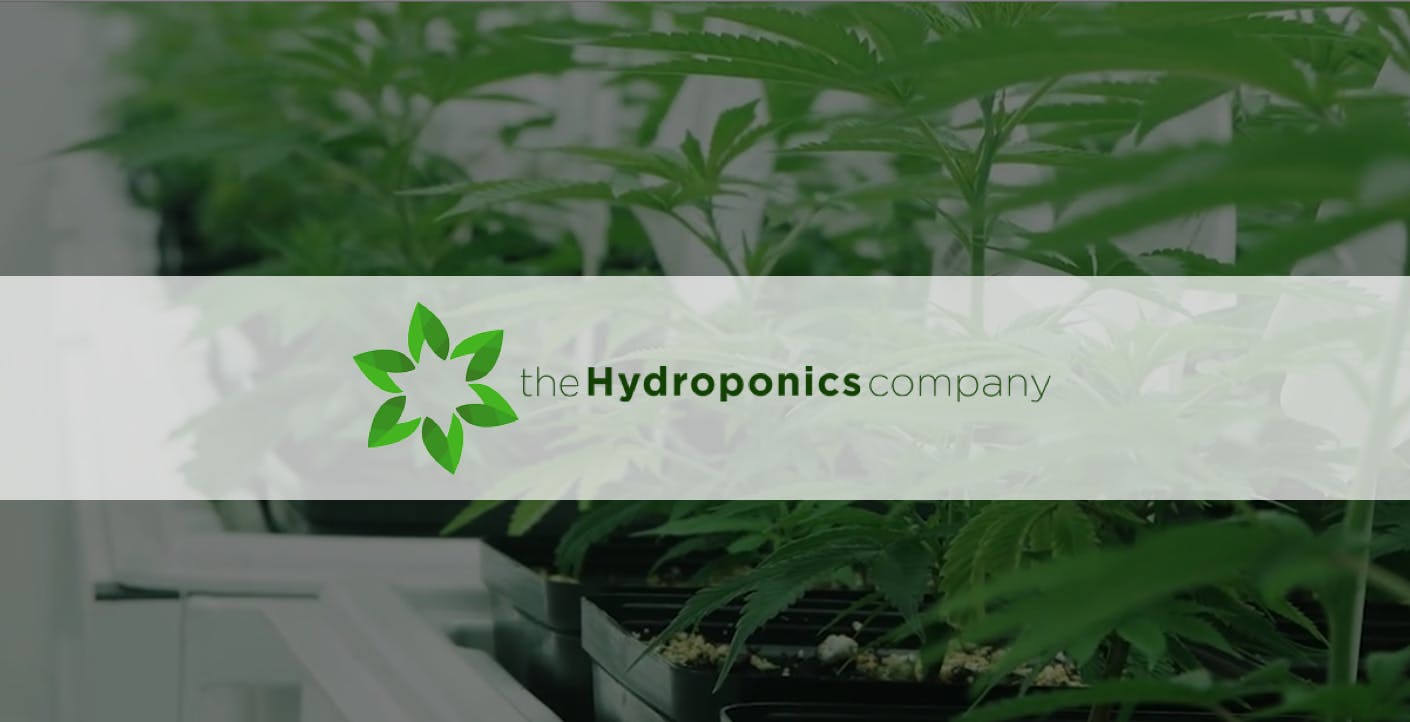
success-stories
Successful Crowdfund Case Study: THC Limited
Campaign Year: 2017 Campaign Type: AU - IPO Campaign Duration: 1 day (Equitise allocation filled within hours!) Amount Invested: A$550,000 Number of investors: 120 Average Investment: A$4,583 % Funded: 100% The Hydroponics Company Limited (THC) plans to be a worldwide manufacturer of hydroponic equipment, materials and nutrients; large-scale hydroponic greenhouse design and construction; and leader in the development and delivery of medicinal cannabis. The burgeoning market in North America and liberalised laws surrounding cannabis production have created a high demand for the company’s hydroponic product line. The sector is experiencing significant growth as laws are passed in Australia, New Zealand, US and Canada permitting the possession and consumption of cannabis either for medicinal or recreational purposes. Investors contributed $550,000 towards the THC IPO through the Equitise crowdfunding platform. These funds, together with THC’s existing cash reserves, were used to complete acquisition and development of the business, provide working capital and to allow for future expansion. The IPO price was /bin/sh.20 per share. Since listing, the stock has reached a high of $1.15 and is currently $0.58 at the time of writing this article. Click here to explore our current and coming soon offers!
May 23rd 2018

success-stories
Successful Crowdfund Case Study: Mosaic
Campaign Year: 2015 Campaign Type: NZ - Equity Crowdfunding Campaign Duration: 65 days Amount Invested: N$105,078 N° of investors: 35 Average Investment: N$3,002 % Funded: 105.1% Mosaic has developed a revolutionary online platform, Volo, which allows insurance products to be sold in the same way Generation Y increasingly wants and expects. Generation Y has the lowest uptake of life insurance of any age group and up to 20% of Generation Y fails to buy travel insurance before departing. Mosaic’s vision is to provide a quick and affordable digital way for Generation Y to buy insurance and incorporate a claims experience which pays out quickly. Mosaic has taken the first step in realising this vision by launching the Volo Lifestyle product, a single insurance product combining many elements of Life, Income Protection, Trauma, TPD and Health insurance, underwritten by Partners Life Limited. To develop and launch additional insurance products, a mobile app that will provide streamlined claiming, alerts and world-wide assistance and to hire more administration staff, Mosaic sought to raise funds from the Equitise. Through the Equitise platform, Mosaic raised NZ$105,078 from 35 investors for 2.52% equity. Since obtaining funding, Mosaic has successfully launched Volo Travel, a travel insurance product with worldwide emergency access 24/7 and online claiming, underwritten by Cover-More Pty Ltd, as well as Volo Lock Box, an electronic encrypted storage for customers to store critical documents while travelling. Mosaic has also launched Volo Heartbeat, which is a free service included with the Volo Travel product that gives access to a secure encrypted copy of customer medical records via a mobile app or a web based dashboard. Click here to explore our current and coming soon offers!
May 23rd 2018

success-stories
Successful Crowdfund Case Study: Invert Robotics
Campaign Year: 2016 Campaign Type: NZ - Equity Crowdfunding Campaign Duration: 68 days Amount Invested: N$740,394 N° of investors: 40 Average Investment: N$18,509 % Funded: 148.1% Invert Robotics designs and manufactures industrial inspection equipment and uses this equipment to provide remote inspection services. A patented robotic inspection platform can climb any stainless steel surface and uses advanced sensors and high definition cameras to feed detailed inspection data instantly to an inspector for immediate analysis. It is safer than traditional methods which utilise scaffolding and rope to place human workers at height within confined spaces to conduct manual inspections. Use of the robotic platform also enhances the accuracy, reliability and credibility of inspections through ultrasonic crack detection, electronic data management and sophisticated reporting systems. Prior to raising capital through the Equitise platform, Invert Robotics had secured numerous inspection contracts within New Zealand. Having a solid proof of concept, the next step for Invert Robotics was to expand to larger international markets in Europe, North America and Australia, while continuing to build on the New Zealand market position. To fund this expansion, Invert Robotics crowdfunded NZ$740,394 through the Equitise, overfunding by 48.1%. By establishing itself in these larger markets, Invert Robotics projects considerable growth leading to revenues of $20-25m by FY2020. Click here to explore our current and coming soon offers!
May 23rd 2018

success-stories
Successful Crowdfund Case Study: TRNZ
Campaign Year: 2015 Campaign Type: NZ - Equity Crowdfunding Campaign Duration: 91 days Amount Invested: N$211,000 N° of investors: 31 Average Investment: N$6,806 % Funded: %105.5 Tourism Radio Travel Guides are a world leader in providing location-based travel information across mobile, web and GPS platforms. The GPS and Travel Guide Apps are programmed in such a way that users are given information about their surroundings as they move from place to place. Point of interest information is played when the user is near them, providing on the go suggestions about what to see and do. Tourism Radio can reach a broad end user base through its established network of distribution partners in the motor home and rental car markets throughout New Zealand. Tourism Radio’s vision for growth is to scale up the sales operation and introduce new revenue generating functionality to the technology, through Wi-Fi hotspot integration into the in-car device. To fuel Tourism Radio’s operations in sales, marketing, content and technology development, investors contributed $211,000 through the Equitise crowdfunding platform. Click here to explore our current and coming soon offers!
May 23rd 2018

success-stories
Successful Crowdfund Case Study: CropLogic
Campaign Year: 2016 Campaign Type: NZ - Equity Crowdfunding Campaign Duration: 70 days Amount Invested: N$512,200 N° of investors: 35 Average Investment: N$14,628 % Funded: 128.1% CropLogic aims to improve crop yields by combining advanced research and technology with an in-field agronomy support team to provide accurate advice to growers. Since its incorporation, CropLogic has steadily grown into an international agronomy services company driven by leading research and technology with highly skilled and trained personnel, specialist knowledge of cropping systems, regional know-how and emerging data analytics and predictive tools platforms. CropLogic has undertaken over 600 field trials in the development of its technology, working with some of the largest potato processors in markets of interest. To gain immediate access to key contract growers, CropLogic intends to strategically acquire agronomy companies in regions of interest, to grow to a targeted $147.2m revenue with 160 agronomists and 3.2m acres by 2020. Through the Equitise equity crowdfunding platform, CropLogic raised NZ$512,200, overfunding the target by 28%. Click here to explore our current and coming soon offers.
May 23rd 2018

success-stories
Successful Crowdfund Case Study: The Birkenhead Brewing Company
Campaign Year: 2016 Campaign Type: NZ - Private Campaign Duration: 4 days Amount Invested: N$210,000 N° of investors: 4 Average Investment: N$52,500 % Funded: 140% The Birkenhead Brewing Company (BBC) is an award-winning craft brewery based in Auckland, New Zealand. The BBC’s beers have a distinct taste that stand out from the competition, with a range of styles to suit everyone’s palette. The brewery and craft beer offering are complemented with a tasting studio in Birkenhead, open daily from 5pm to late, and boasting a 4.5 star rating on TripAdvisor. The BBC also has a nationwide distribution deal with renowned craft beer distributors Beertique, who operate at over 800 outlets across New Zealand and have plans to export its beers to overseas markets in Asia and Europe. Equitise investors invested NZ$210,000 in 2016 as early stage capital to allow for sales and marketing and to fuel their expansion into new markets. Click here to explore our current and coming soon offers!
May 22nd 2018
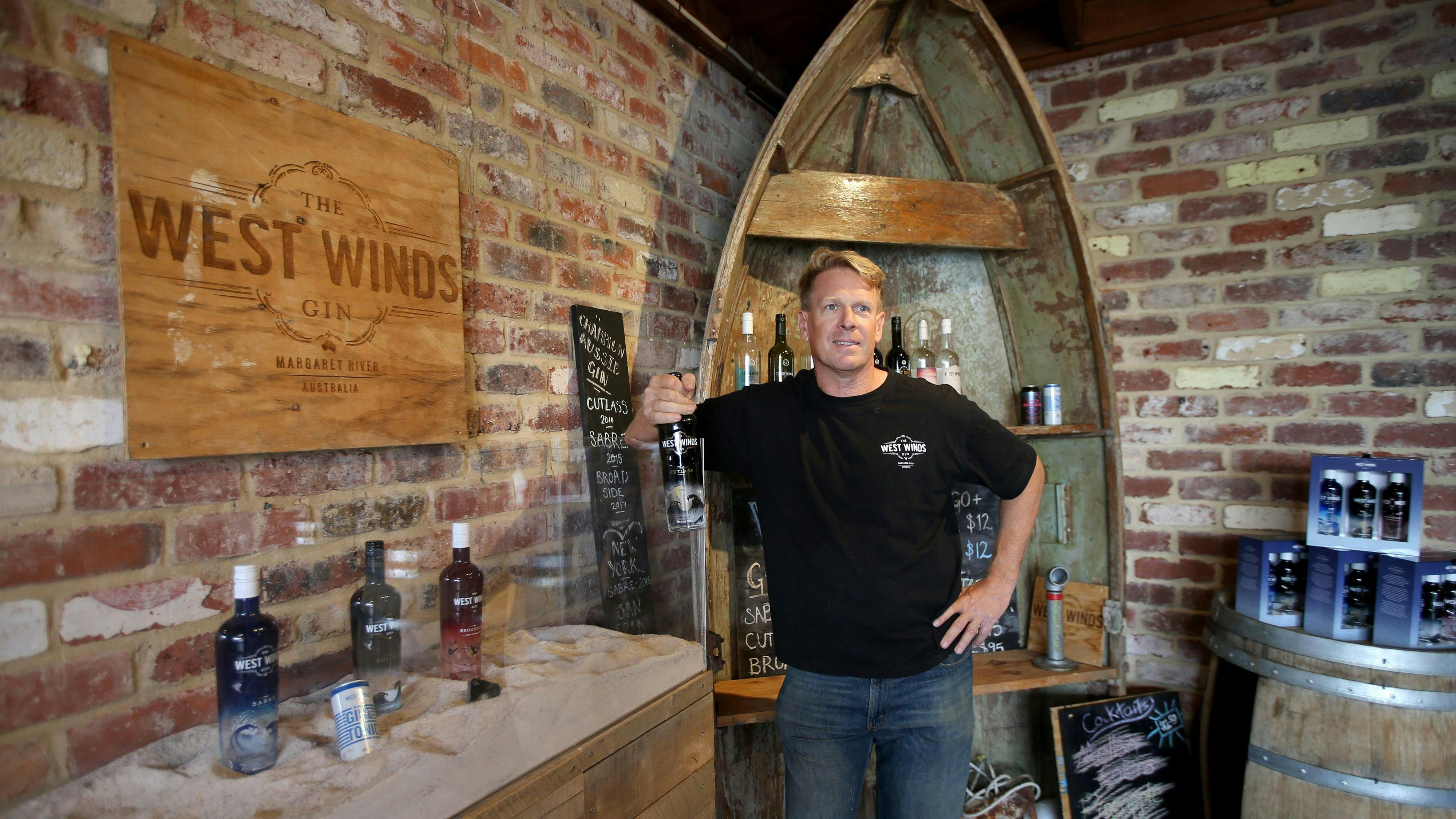
offer-news
Founder Interview: Paul White of The West Winds Gin
Before The West Winds Gin equity crowdfund launched, we sat down with the CEO & Founder Paul White. Since 2010 Paul and his team have been making Australia's most awarded gins, combining the desire to experiment with native Australian botanicals to produce some damn fine gin. The offer is now live on our platform. The capital raised will go towards marketing and expanding the business domestically and internationally and has already hit the minimum funding target. What is the story behind The West Winds Gin? I started a little distillery back in 2006 in Western Australia, as I thought it was an interesting industry to get in to. Being an engineer, I love experimenting and making new things, so I spent a couple of years playing around. I then attended a few training courses and spent time in various distilleries in the US before ordering a very nice 150 litre German still. In 2010, I hooked up with three guys that all had backgrounds in the liquor industry and lived in Melbourne; a barman/chef, a barman/salesman and a wine industry professional. We ended up in a bar in Balaclava, and after an evening tasting a broad range of gins, we started to plan a gin company. Over the course of the next year we developed our first two gins – The Sabre and The Cutlass. The Sabre is made of 40% of alcohol, made with Australian toasted wattle seed, and the Cutlass is made of 50% alcohol, made with Australian bush tomato which grows in the sandy desert. We really started the business for fun, but in April 2011, three weeks after launching the gins in the Australian market, I got a call and we had won a double Gold medal for the Cutlass and a Gold medal for the Sabre at the San Francisco International Spirits Competition. In terms of spirit competitions this is generally considered to be the premier body. At that point, we realised that we really had something and since then we have won a whole raft of awards to become Australia’s most awarded gin company. Where did the name The West Winds Gin come from? Of the four founders, three of us had spent a lot of time in Margaret River, the famous wine region. We also all had ties to the ocean: surfing, sailing, these days also kite surfing. We wanted a name that would pay tribute to that part of the world, and to the ocean breeze, used for centuries by sailors to cross the Indian Ocean from South Africa, in search of the riches of the New World. Creating a gin have become a journey of discovery for us, a discovery of Australian botanicals and of some fantastic tastes. It just made sense to tie all the parts of the story together: the sea, the west winds and the sense of adventure and discovery. Who is your target market? In terms of the consumers that we target, Gin is a wonderful product because it’s not just drunk by the young or old, like your vodkas or brandys. This is especially true now there is a real culture around cocktails. People tend to drink Gin throughout their life. Why Gin? In terms of why gin, gin is a good product for many reasons. Firstly, gin fundamentally is flavoured vodka. So we take a neutral spirit – we use a high quality Australian wheat-based alcohol – and then infuse it with all the flavours that we want to impart into the gin. The majority of the flavours come from the botanicals we use and not from the underlying distillate, so our Gins don’t taste of the alcohol. We love showcasing the Australian elements such as wattle seed, cinnamon myrtle, lemon myrtle, fresh Australian citrus (lemon and lime), fresh coriander root and Australian bush tomato (in the Cutlass). In the Broadside, which is our navy strength gin, we use Australian sea parsley, as well as filtered see water from Margaret River. This is the first global salty gin and it’s nice to see that there are now others trying to copy what we have done. We still think that we have the best salty gin out there though. Secondly, Gin production can be scaled rapidly because it doesn’t need to be aged in barrels. To make a whisky or brandy or rum you must age the product in barrels for at least two years to get the most out of the flavours. This means we are flexible to many market needs and if we identify opportunities we have the chance to grow the business in that new direction. It’s important to us to focus on product development and distillation, outsourcing logistics and distribution, so we can focus on the core of the business and grow from that. Could you talk about your distribution system? In terms of distribution our focus was initially in the on premise trade, working with premium bars and restaurants. From there we grew a following and we reached a fortunate situation where we were approached by Woolworth and Coles rather than us chasing them. We’re now in all major alcohol retailers, duty free outlets across Australia and export to over a dozen countries including the UK, New Zealand, Canada, Europe, Singapore, the UAE, Thailand, Cambodia, China, Langkawi and Malaysia. We have also been on cruise ships for some time. It’s a very solid distribution and in the last few months we have been consolidating it further, so we can focus on growth. What do you think is one of the biggest lesson that you have learnt now that you own your own company? There have been so many lessons to learn. It’s an interesting industry and you learn different parts of it, from production to packaging and logistics. You get an understanding of distribution, how to build relationships on and off premise, working with importers from other countries. An important lesson has been to stay true to our roots and core values, and only release the best gins that we can make. We don’t go out and release gins for every occasion, we work on our products to make sure that we pull together the best ingredients that we want to drink. Another lesson is to have the right people in the business. Our employees are all passionate about growing TWWG and being part of the journey. What we want to do is to extend our crew to include investors who are as passionate. Lastly, we’ve chosen our partners carefully, so they are all exceptional in their own fields: production, distribution and marketing. What motivates you? My personal background is very technology focused and what really satisfies me is that we produce products that we love and that we get to share with the world. More than winning awards, it’s very satisfying to go to festivals or bars and see people with a TWWG drink in their hand really enjoying our product. We’re also excited about building an international brand and we think we are in the right position to do it. Where do you see the company going in the future years? The plan at this point is to continue to grow our Australian market and consolidate our position as one of the leading gins. This means we’ll focus on increasing our distribution internationally, raising the profile of The West Winds Gin and making it more recognisable globally. We want to do this not just as gin in a bottle, but also foray into cocktails in kegs, gin and tonic in a can, and any other new ways we find that make our gins valuable to the world. For example, we worked hard to create distinct flavours amongst our gins including a very citrusy lemon dry style gin, a savoury new world style gin and a salty gin. In addition, we also have several products in the pipeline that complement these three very well. We want to continue to explore the possibilities, but without doing anything for the sake of it, it must make sense to us, it must appeal to us and it has to be something we want to share. Always consider the offer document and the general CSF risk warning before investing
April 19th 2018

trends-and-insights
Equity Crowdfunding: the Top 8 Advantages for Investors
EQUITY CROWDFUNDING IS THE PROCESS WHEREBY PEOPLE, OR 'THE CROWD', CAN FUND START-UP COMPANIES AND SMALL BUSINESSES IN RETURN FOR EQUITY. Technology has completely changed the world of financial services and equity crowdfunding is changing the way companies raise money. In the past, only high net worth investors could invest in early stage companies, but today, equity crowdfunding allows the everyday Australian to invest. Simply put, equity crowdfunding is an investment platform built for these everyday, or retail, investors. Equity crowdfunding is a quick, safe and easy way to seek startup funding and it opens the gate to this new pool of strategic investors. WHAT ARE THE MAIN ADVANTAGES OF EQUITY CROWDFUNDING FOR INVESTORS? LOW BARRIERS TO ENTRY Equity crowdfunding requires only a small amount to be invested as a minimum. For example, a minimum investment on the equity crowdfunding platform Equitise can be as little as $50. This aspect makes equity crowdfunding suitable for new investors who want to start with small investments. INVEST IN AS MANY COMPANIES AS YOU WOULD LIKE There are no limits on the number of companies in which you can invest. In this way, you can create your own diversified portfolio of small investments focusing on startups that you feel are good investment opportunities. INVEST IN EXCITING STARTUPS AND IN BRANDS YOU BELIEVE IN Equity crowdfunding allows investment in early-stage companies that are in line with the investor’s passions and interests. It encourages investments that carry a specific meaning for that investor and consumers can invest in the brands they love and are loyal to. Because of this, investors become brand ambassadors with ownership of the company. THE COMPANIES ARE SELECTED BY THE PLATFORM Before being able to launch an equity crowdfunding campaign, a company has to go through an approval process in order to be accepted by the crowdfunding platform. Equitise assists the companies throughout the whole process. The platforms aim to select companies that have the highest chance of success for the potential investors. HIGH RETURNS IF THE INVESTMENT IS SUCCESSFUL Similar to venture capital, investing in private companies with equity crowdfunding can bring significant risk but it can also bring greater returns if the business is successful, sold or floated on the stock exchange. FUNDS RETURNED Every equity crowdfunding campaign sets a minimum and maximum invested amount. If the minimum amount is not reached, the investors are refunded for their own protection. YOU CAN SHARE YOUR INVESTMENT ACTIVITIES WITH YOUR NETWORK If you have made an investment you are particularly excited about, you can share it with your investors’ network. Equity crowdfunding platforms encourage the sharing of investment opportunities as it helps the startup to reach the needed funds. ANYONE CAN INVEST Equity crowdfunding goes under the idea of enabling “everyday” investors access to great investment opportunities. In the case of Equitise, anyone in NZ and Australia over the age of 18 can invest in the offers of the platform. If you are looking for a new investment opportunity or for a way to diversify your portfolio, equity crowdfunding is an option you should definitely take into consideration.
April 11th 2018

success-stories
An Overview on Xinja: the First Australian Retail Equity Crowdfund
A little more than a week after the close of Xinja, we are happy to share what we learnt from Australia’s first retail equity crowdfunding offer. Having closed with a total investment of A$2,440,250 (488.1% overfunded) the success of the raise underlines the willingness of everyday Australians to gain a foothold in cutting-edge companies. Whilst this was once an opportunity previously open only to wealthy investors, Xinja’s capital raise has kick started the era of investments coming from ‘the crowd’. So, what did this crowd look like and how did they invest? Firstly, they were of all ages with those aged between 25-34 years investing most frequently. The most common amount invested was A$250 accumulating to 26.5% of the total investors and demonstrating that equity crowdfunding really is democratising investing. Looking at the investors’ location, 99% are Australian and are mostly located in the larger states of New South Wales and Victoria. As for gender, 17.6% of investors are female - a figure perhaps to be expected when examining female investment behaviour. They were also older than their male counterpart with the youngest age bracket of 18-24 being almost non-existent. For more insights, have a look at our infographic below:
April 9th 2018
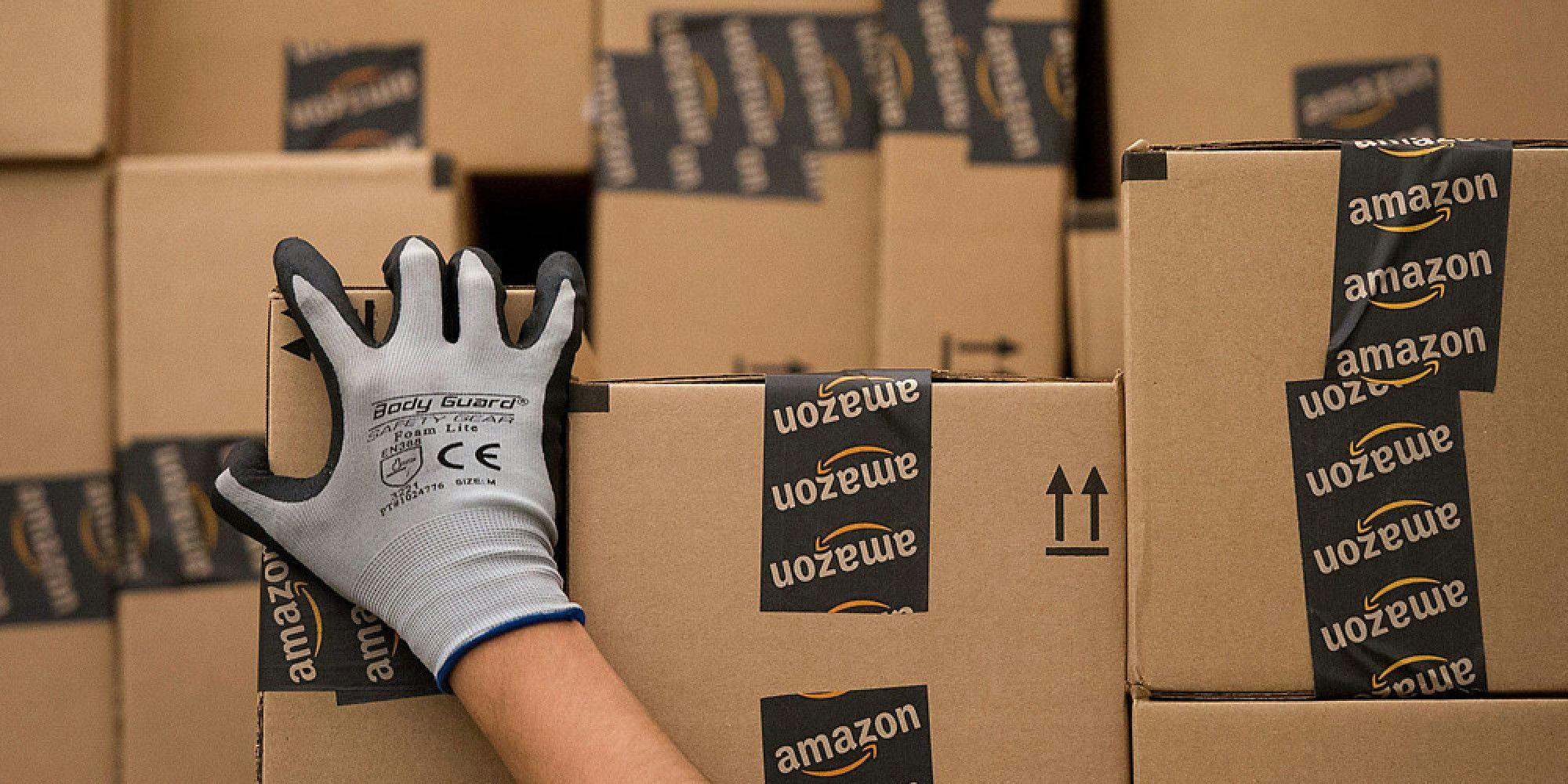
trends-and-insights
Amazon – The World’s Most Disruptive Company
From a tiny idea to a global phenomenon, Amazon is an example on how a startup can become a worldwide success. As an industry, equity crowdfunding embraces the most disruptive ideas and companies – helping early stage businesses get off the ground and become successful and broadly recognised. Amazon is a great example of a disruptive company that continued to innovate and change retail as we know it. Founded in July 1994, Amazon has grown to become what is possibly the internet’s greatest success story due to the advantage it took of the digital boom. Amazon started as an online bookseller, and has grown into a household name, especially after its introduction into Australia in December 2017. In around 25 years, Amazon has grown into the world’s largest company overall by revenue, holding almost 50% of the USA’s ecommerce market. Amazon Found Success By Being Disruptive Amazon’s growth has largely been possible due to how disruptive it has been. Like many other internet giants, it has found success through making large acquisitions and taking over several other major businesses. For example, in June 2017, Amazon took over Whole Food Market for $13.7 billion. All of these acquisitions start to make sense when you look at some of the products and services Amazon have released, which would not have been possible without these acquisitions. Want to learn more about Amazon? Check out 16Best.Net's infographic below.
February 13th 2018
.jpg?ixlib=gatsbyFP&auto=compress%2Cformat&fit=max)
trends-and-insights
Fintech and Finance Trends - 2018
What are the top 5 fintech trends for 2018? The steady rise of Australia's fintech sector is showing how much technologies are impacting the financial world, with the FPA's Fintech Whitepaper last year showing more than 100 technology solutions are now available on the Australian market that have sought to automate some part of the advice process. This revolution is an answer to the financial services industry's need for technological innovation and it is changing the way major financial institutions, licensees and financial businesses operate across different verticals, holding significant implications for Australian investors, startup businesses and end consumers. Equity crowdfunding If recent regulatory developments give us a blueprint of what lies ahead then 2018 will prove to be a turning point for equity crowdfunding in Australia, giving everyday Australians the opportunity to invest like angel investors and venture capitals. This means that mum and dad investors will be able to invest up to $10,000 in companies that are raising up to $5 million, something that was previously open to investment only for high net worth and sophisticated investors. For startups, it means they'll have access to new avenues of funding, as investors become part-owners of the companies they invest in. National Payments Platform (NPP) Coming into effect from Australia Day, this $1 billion payments infrastructure will become one of the most transformative innovations to date for the Australian economy. The NPP will: Enable almost real-time payments to customers of other banks, reducing a lot of the friction with transactions between businesses and their customers, and between individuals. Enable more — and faster — innovation in financial services. The NPP is designed to allow multiple, competing products and services to operate simultaneously, this being the point of difference between its fast-payment predecessors. While the first product developed by BPay and called Osko, will launch with the NPP, more will invariably follow — many of which we can’t even imagine. Make the need for BSB and account number redundant. Payments will be able to be made by just knowing somebody’s email address or mobile phone number, making it much simpler, and less risky, to transfer money. More mobile payments Apple and Android Pay may already be here, but people are still getting used to the fact that physical cards -- and wallets -- are no longer necessary. All that's about to change in 2018. As the Reserve Bank of Australia produces platforms such as the NPP (see above), using digital currencies via phones will become increasingly normalised, and major banks will be forced to increasingly adopt technologies that make everyday shopping more convenient for Australians. Cryptocurrency In 2017, it was all about Bitcoin, the first virtual currency created in 2009, and blockchain, the technology that enabled the creation of Bitcoin. This year will see the proliferation of cryptocurrency, the umbrella term for digital/virtual currency under which Bitcoin falls. As Bitcoin goes mainstream (you can buy it at your local shopping centre from an ATM these days) more Australians will learn, and become comfortable with, investing in cryptocurrency. In fact, cryptocurrencies pose such a threat to mainstream banks (they are decentralised, which means that users can make payments without involving the banks that most economies and government financial models are built on) thanks banks such as the Bank of England and Bank of Israel are now talking about creating their virtual currencies. The rise of digital banks (neobanks) With the Federal Government in support of all deposit-taking industries to call themselves "banks" (as opposed to only those with more than $50 million in capital) fintech's evolution is limitless. Neobanks such as Xinja, Australia's first 100% digital soon-to-be bank, are banks designed to provide all retail banking products such as transaction accounts and mortgages via a smartphone app. This is part of the steady evolution/ disruption of fintechs, which, in the past, were seen as competitors to the banking system. From 2018, we'll see greater partnerships between banks and fintech startups as both see the value of working together to help offer a greater suite of more innovative services to customers.
February 7th 2018

for-investors
The Main Reasons to Start Investing in our 20’s
Investing At A Young Age Allows You Time To Build A More Diversified Portfolio Helping Manage The Risk A lot of young people in their thirties are confronted with the reality that it’s time to ‘settle down’ and start being more responsible with their money. At this age, one really starts to feel the pressure of having a good career, owning a house, and affording a comfortable car that fits strollers, toys and yes, kids! Most of the time, when people realise that the time to ‘settle down’ has arrived, a wave of fear and anxiety overwhelms them. Most of us don’t feel ready, especially from a financial point of view, as often savings are not sufficient enough to cover all the expenses that adult life can demand. That’s why, investing in your 20s can be very wise for the following reasons: Time Horizon If you start to invest early, you will have the time to build your investment and to recover from it if things don’t go as planned. If your time horizon is short, you need to be more cautious as short-term results are less predictable than the longer-term ones as they are more influenced by the concept of ‘volatility’, which is the statistical measure of the dispersion of returns for a given security or market. Having a long-term investment horizon usually brings to more reliable returns: for example, the stock market shows a high level of volatility and it follows the equation greater risks for greater results. In this case, the high level of volatility doesn’t impact much the overall return, as the long-term time frame allows the ups of the stock market to compensate the downs. The best way to reach success is by understanding the risks ahead of time and then plan how best to minimise them. The more data you can collect about an investment trend and market, the more likely your prediction will be accurate. Start with analysing the market, the industry and the sector in which the company that interests you operates. Behavioural finance believes that market movements go in the same direction. It’s a positive loop: usually investors keep their money in stocks that are growing and studies have shown that when people invest the market goes up, encouraging even more people to buy. Pay attention to the companies that are showing a positive level of growth, to the hottest markets and to the investment that are attracting more investors. Moreover, think about a successful exit strategy, that's purpose is to limit losses. An exit strategy can be executed to exit a non-performing investment or an investment that has met its profit objective. If you start investing early you will have the time to carefully think about all this. Dealing With Risks A young person can afford to take on a higher level of risk compared to someone close to retirement. If you have many years of earnings ahead of you, then you can take on more risk and try to build a diversified investment portfolio. Portfolio diversification helps finding the balance between risks and returns, allowing investors to spread their money across different investments and sectors. If something goes wrong you will have the time to redefine your investing activities and learn from your mistakes. Any investment should always be entered into with caution but being agile with investments can help an investor to become less “investment static”. Less Financial Responsibilities Another benefit to investing in your twenties is that you start investing before reaching the age where financial responsibilities become a reality. Don’t wait until when everything appears too complicated. Learning Young investors will face successes and failures and they will learn a lot from both. They have the time to study the markets and to adjust their investment strategies according to the market changes. Tech Savvy A young person has the technical skills to research and invest online. In the last years, technology has met the world of finance and, next to traditional banking channels, automated investing is becoming very important. Technology is democratising finance as it gives consumers easier and broader access to products and services at a lower cost. A fully online environment, together with a single product offering, like equity crowdfunding platforms, create a simple and transparent investing structure. The combination of finance with technology is definitely a field where young techy investors can feel comfortable. Not Only Retirement One of the most common reasons to invest is to save money for retirement however there are other reasons to start investing. For instance, having an income stream throughout your whole investment life means you could reach financial goals quicker. This includes milestones such as buying a house or car, starting your own business or providing your children with education opportunities. Aligning Your Passions Investing also doesn’t have to be all about making a return. Often people invest in companies they are passionate about in order to help them succeed. Equity Crowdfunding can facilitate this as a low cost to entry investment option. From as little as $50, people over 18 can now access exciting investing opportunities that not only have great investment potential but are also aligned to their values. Young people are often not informed about investment opportunities and their potential benefits. Saving from an early age and adopting a long-term investment strategy that is supported by research can really make a difference to someone’s lifetime earnings. Stop waiting and start getting informed, you won’t regret it!
January 23rd 2018

trends-and-insights
Equity Crowdfunding and How it Will Help Change the Global Economy
Equity crowdfunding has opened the doors for innovation and is disrupting the global economy. In a little less than a decade, equity crowdfunding has raised billions of dollars in capital for start-ups and small businesses. It grew at a rate of 84% in 2015, and is set to grow even larger and more influential in the years to come. Fortune Magazine predicts that the global market for equity crowdfunding will reach up to $96 billion by 2025. Indeed, equity crowdfunding has opened doors for numerous opportunities across the globe for innovations, new products, and companies. For instance, smart-watch maker Pebble was able to raise a staggering $10,266,847 in just 37 days, selling more than 400,000 of its crowdfunded smartwatches in 2013 alone. The following year, big data solutions start-up Bitvore closed a $4,500,000 equity crowdfunding round, while virtual-reality headset enterprise Oculus was acquired by Facebook for $2 billion dollars. There is no shortage of stories testifying the power of equity crowdfunding opportunities, and the speed at which entrepreneurs can raise capital can be as impressive as the amount they are able to amass. However, on top of helping entrepreneurs get their ideas off the ground and connecting them to investors who can pitch in for as little as $50, equity crowdfunding also has significant effects on the global economy. The phenomenon of equity crowdfunding is present and regulated in all major cities and continents across the globe, and affects the global economy in several ways. Fuelling Innovation Start-ups are generally novel and innovative by nature, and while this can mean higher risks of loss and failure, it also means that the start-ups that do become successful tend to disrupt industries as we know them. Equity crowdfunding paves the way for these start-ups to find capital when larger banks and venture capitalists shy away, and is, in itself a form of disruption. Rosemont Group founder and CEO Freddie Achom explains that equity crowdfunding has disrupted traditional investment models, and should grow larger and more specialised in the future. Equitise previously discussed how equity crowdfunding makes it possible for more innovative products and services to make it to the market and people’s homes and lives. By connecting good ideas to capital opportunities in the form of multiple investors, equity crowdfunding fuels innovation and disrupts investment and retail markets. Driving Growth By democratising capital and empowering individual and small-time investors to inject money, equity crowdfunding helps move money around. Start-ups offer employment opportunities on top of products and services that people can buy. Equity crowdfunding drives growth in industries where start-ups are most impactful – tech, health, food & beverage, construction, and education. To illustrate, the Chinese crowdfunding market is valued at 100 billion USD (128 billion AUD), while the US industry is estimated to be at 28 billion USD (~36 billion AUD). The younger equity crowdfunding market in the UK is sized at 4.3 billion USD (~5.5 billion AUD), and along with the growth of the trend are the increase of tools that can help investors manage their investments. For instance, details on the FXCM Economic Calendar allow investors to keep track of important events related to the global economy, all of which could impact trading and the value of their investments. Monitoring these events is critical because investments in equity crowdfunding are best done spread out over start-ups of varying stages, industries, and sizes. Provides a Boost for the Developing World Last but not least, equity crowdfunding has lots of potential in contributing to the developing world. Although the phenomenon arose from developed countries in the wake of the 2008 financial crisis, equity crowdfunding has begun in developing countries. The World Bank Group's InfoDev program reveals that for the success of equity crowdfunding in developing countries, government and development organisations, investors, entrepreneurs, and crowdfunding centres must all align their objectives. In this way, developing countries have the potential to leap over, or at least catch up to their more developed neighbours. As the lives of their citizens improve through growth and innovation, so too will their capacity to contribute further to the global economy. Albeit a fairly new investment scheme, equity crowdfunding is poised to grow even more in the next few years, much to the benefit of investors, entrepreneurs, and governments alike.
January 17th 2018
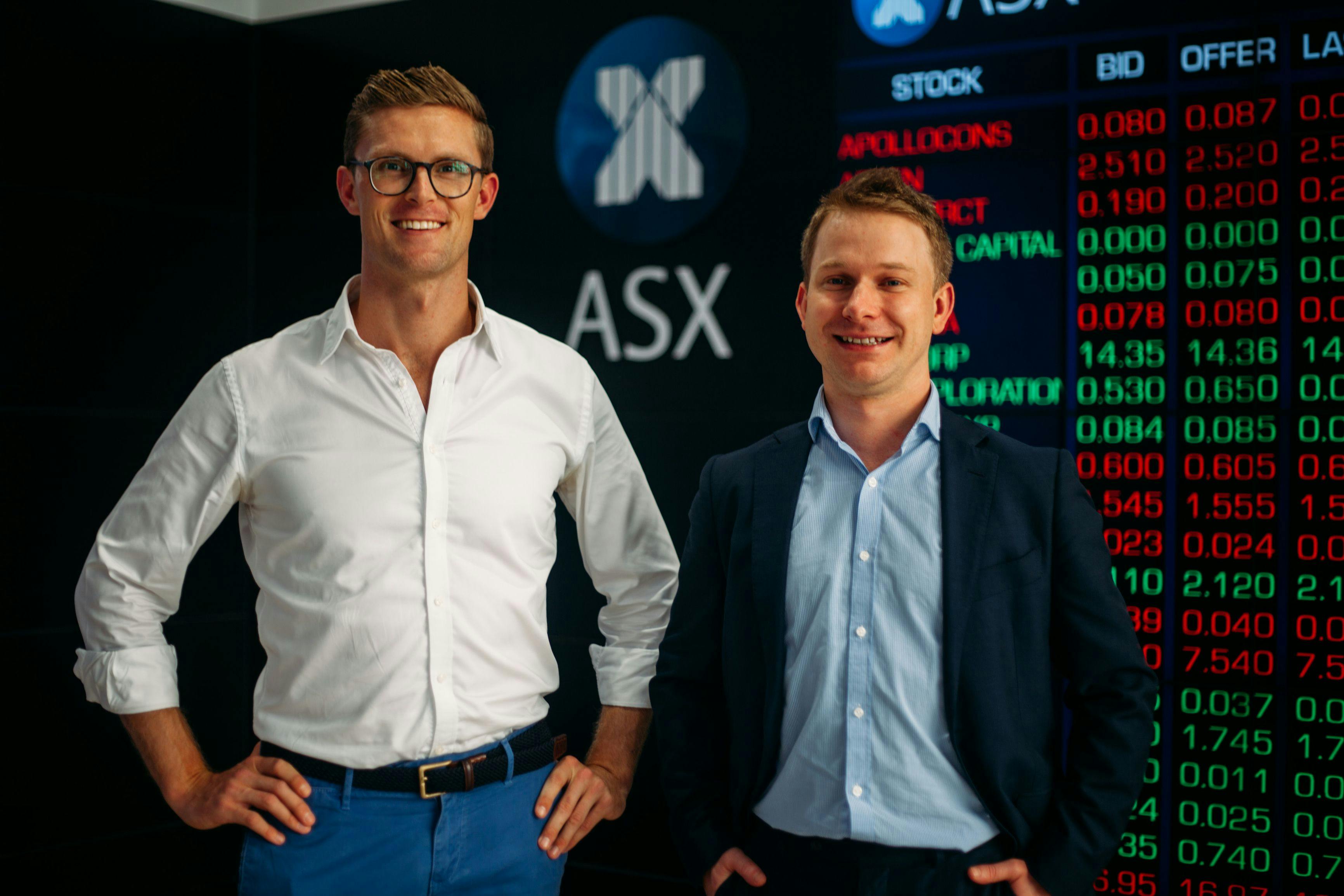
trends-and-insights
In the Press: Equitise is One of the First Australian Retail Equity Crowdfunding Platforms
Last week ASIC awarded Equitise their new crowdsource funding license. Here’s a snapshot of what was in the press: Last week our office was wrapped in a strange atmosphere: we were all very busy and excited as we awaited our new retail equity crowdfunding license. Finally, in the early afternoon of Thursday 11th of January 2018, we received the news from the Australian Securities and Investments Commission (ASIC). We were one of the first online platforms to obtain the license which ushers in a new era for equity crowdfunding by opening investment opportunities to anyone in Australia over the age of 18. Once the license was received we were able to launch Australia’s first retail equity crowdfund - Xinja - the soon-to-be 100% digital bank. Since its launch last Thursday Xinja has almost raised $1 million from nearly 500 investors. To get up to speed with the changes here is an overview on the media coverage featuring Equitise, our new license and our first retail equity crowdfund, Xinja: Online crowd-funding platform Equitise was among the first to secure a license through ASIC. Start-up bank Xinja will use the Equitise platform to raise up to $3 million from retail investors. (…) Mr Gilbert and business partner Jonny Wilkinson have spent almost four years fighting to open up retail equity crowd funding in Australia after turning their backs on careers in investment banking. - The Australian Financial Review – 11 January 2018 After years lobbying with the Government to permit retail equity crowdfunding in Australia, we have finally received the license: "We have led the charge to change this legislation for the past three and a half years to give all Australian investors the opportunity to invest in early stage companies," Mr Gilbert said. - Investor Daily – 11 January 2018 The licenses granted by ASIC allow start-ups and small businesses to finally raise money from the general public, or everyday investors, in exchange for a stake in the company. Equitise co-founder Chris Gilbert said before now, this early stage investment was only available for high net worth investors or venture capitalists. "This groundbreaking change means Australians can now put their money behind what could become the next Atlassian or Canva and support early stage local companies raising up to $5 million." Gilbert says. - Business News Australia – 11 January 2018 Since last week, our first retail equity crowdfund is now live on our platform. Xinja is building the first Australia 100% digital bank, which is following the European and US success of “neobanks”: Equitise, a crowdfunding platform that has been waiting for years to provide services to Australian businesses, was the first site to list a securities offer. Xinja, a 100% digital bank or ‘Neobank’ seeks to challenge traditional banks similar to the UK challenger bank ecosystem. (…) Xinia hopes to raise up to A$3 million in the crowdfunding round. Any Australian over the age of 18 may invest from as little as A$250. The offer is also available for wholesale investors in New Zealand. - Crowdfund Insider- 11 January 2018 With its hard-won license, Equitise has already launched its first offering, for challenger bank Xinja. With the bank looking to raise a minimum of $500,000 through the platform, investors will be able to buy a stake in the company for $250. - Startup Daily.com – 12 January 2018 The first deal has already kicked off with Chris Gilbert, CEO of crowdfunding site Equitise, telling The New Daily: “We’ve raised $550,000 for neobank Xinja in the first 30 hours of a campaign with 300 investors participating.” Those 300 investors have kicked in between $250 and $10,000 and Mr Gilbert expects to complete the $3 million target in a few weeks. - The New Daily – 14 January 2018 Australia’s first digital-only “neobank”, Xinja, has become one of the first local companies to attempt to raise cash through newly licensed crowdfunding intermediaries, which were authorised yesterday by the corporate watchdog to issue shares to online investors. Investors will now be able to invest as little as $250 in Xinja, with a minimum target of $500,000, through Equitise, one of the companies that received ASIC backing yesterday. - The Australian – 12 January 2018 Do you want to be part of this revolution? Check out our new website to discover our live and coming soon deals or to start your own equity crowdfunding campaign.
November 28th 2017

trends-and-insights
Equity Crowdfunding - A New Investment Opportunity for Everyday Investors
The Recent Legislative Changes now allow Retail Investors to Invest in Equity Crowdfunding Offers. Before September of this year (2017), only Sophisticated and Wholesale Investors were allowed to invest in equity crowdfunding deals. However, as a result of the 2017 Crowd-Sourced Funding Act, Retail investors are now able to participate in new and exciting investment opportunities. The new regulation allows unlisted public companies to raise up to $5 million a year from everyday investors who can invest as little as $50. This is positive news for Australian equity crowdfunding platforms such as Equitise, which will soon be able to open offers to everyday investors (pending CSF license). Since 2015 Equitise has been active in New Zealand as a retail equity crowdfunding platform, where public offers are open to all New Zealanders.
November 28th 2017

trends-and-insights
Crowdfunding: A Great Opportunity for the Rise of Neobanks
How crowdfunding is supporting the creation of Australia's first, 100% digital (soon-to-be) bank In the last few years, as part of the fintech revolution, countries like the UK and US have seen the rise of neobanks, which are changing the way banking services are managed and provided to users. Neobanks differ from traditional banks as they offer a 100% digital and mobile-first banking experience. Thanks to the latest fintech technologies, they have no branches, bringing down infrastructure and other banking costs. The result is that neobanks can offer competitive rates and lower fees to their customers. Moreover, from a customer experience point of view, they emphasise online or by phone customer support and they make their services easily accessible and highly interactive. For more information on what neobanks are visit Xinja's blog. What is the growth opportunity for neobanks and what is the role of crowdfunding? From the US's Final to Brazil's Banco Original and over to Germany's Fidor, the proliferation of neobanks is affecting both the European and the global landscape. This is a result of their focus on customer-centric services, helping customers to better understand the banking process and how to manage their money. This is challenging the traditional banks who have been criticised for their stagnant customer service approach. During an interview, Alex Sion, Co-founder of the USA Moven, defines his company as a digital experience platform, differentiating it from traditional banking platforms: "Banks do essential. They construct products, such as checking accounts, saving accounts and credit products. Those products stay the same for some time, in the way they develop and manage them. What's dramatically changing is the digital experience platform, on which banks need to interface and interactively engage with customers, which we believe is a separate and distinct business." London is the heart of this revolution as the UK regulations are working to stimulate greater competition in consumer banking services. This has seen a growing number of startups apply for banking licenses. Since 2013, 15 companies have been granted the license which is now easier to obtain. It was estimated that another 20 companies were going through the process of applying for the license. Looking at the leading neobanks in Britain, we can see how crowdfunding has been instrumental in the growth of these innovative digital banks. Founded in 2015, Monzo, the bank that places smartphones at the centre of the banking experience, achieved the fastest crowdfunding raise in history, raising £1 million in 96 seconds. In total, the company has raised £105,692,840 in 7 funding rounds, two of them through equity crowdfunding for a total value of £3,392,840. The London based Revolut, a platform that aims to manage money all around the world, also raised $86,445,269 through eight funding rounds, two of which were equity crowdfunding, raising respectively £1,000,000 and $5,300,000. These are only a few cases that demonstrate the confidence traditional and everyday investors have in neobanks and how crowdfunding is a real option for aspiring digital-banks who seek capital to grow. If you would like to get a broader overview, Techfoliance, the global platform dedicated to FinTech, offers an interesting mapping of the Global Neobank Landscape. Jumping to our side of the world, Australia is also following this global trend, as the new Australian crowdfunding legislation, passed in September, allows all Australians to invest. Equitise has applied for the new CSF license and are awaiting a decision. When approved, they will launch their first offer with Xinja - Australia's first fully digital (soon to be) bank. As Eric Wilson, Chief Executive of Xinja, said: “Xinja is all about creating a new kind of banking experience - and crowdfunding is part of that. If people want a new kind of bank, this is their opportunity to build their own.” It seems that the year 2018 will bring additional good news for companies like Xinja. The Australian regulator (APRA) is planning to change the way aspiring banks are licensed. Usually a banking license is only acquired if $50 million in capital has been raised. A new APRA “restricted” license will allow fintech start-up banks like Xinja to begin operating with $3 million in capital. If you would like to be part of this revolution and be one of the first to own a piece of Xinja, visit our platform Equitise to get early access to Xinja’s offer! Like any investment, Crowd-Sourced Funding (CSF) is risky. Investors may lose their money and the business may not achieve its objectives. You should consider the CSF offer document and the general CSF risk warning contained in the offer document in deciding whether to apply under the offer. Information about this offer will be set out in our offer document which will be available as soon as the offer opens. You should read this to understand potential risks before deciding to invest.
November 24th 2017

offer-news
Equity Crowdfunding and Shopper 360: the Research Platform that Predicts Shopper Behaviour
Shopper 360 by Lumaten has launched its equity crowdfunding campaign on our platform, Equitise. The aim of the capital raise is to further develop this innovative research platform that predicts shopper behaviour in a very accurate way. The experience of Lumaten co-founders, Paul Fitzgerald and Troy Sugrue combines years of experience in commercial strategy, communications, anthropology and cognitive psychology. Their goal is to provide invaluable guidance on consumer behaviour in the retail environment. The project has also benefited from the expertise of Sean Cunial, an expert in brand marketing and commercial strategy, who has strong knowledge in the Asia-Pacific markets. Driven by the fact that 85%-90% of products launched in Australia and New Zealand in 2017 will not be on sale in 2019 due to product failure, the founders saw a clear lack of consumer research and analysis; a lack which is negatively impacting companies and the fast-moving consumer goods (FMCG) industry. Eager to find a solution to this problem, Fitzgerald and Sugrue have pooled their knowledge to create Shopper 360, a revolutionary marketing technology that will enable FMCG to respond to the industry changes and challenges. There are four platforms within Shopper 360: Virtual Reality: allows Shopper360 to create lifelike 3D digital retail environments to conduct controlled studies within the shopper journey. Artificial Intelligence: allows the analysis and comparison of a huge amount of data, in order to find connections, trends and causes that a human cannot identify. The data is generated through measuring and recording participant’s behaviours. Established research systems: Shopper 360 takes into consideration the theory and technology created by established research industries in regards to shopper space and trends. Cognitive psychology: the platform strongly relies on the understanding of the neurological process that occur during the shopper experience. Shopper 360 provides the revolutionary and accurate technology to test, record and provide metrics on the real shopper experience.
November 17th 2017

for-companies
Monitor your Online Reputation: the Power of Customer Reviews
When you surf the web to find out which company offers you the best service, what is the first thing you look at? For many companies and many people it would be the rating and customer review section. This is because we are more likely to trust the hopefully objective opinion of a person that has used the product or service than the subjective description provided by the company who has created it. Reviews are an important component of the customers’ online experience and they strongly affect a company online reputation. According to an American report released in 2016, “Online Shopping and E-commerce” by PewResearch Center, 82% of Americans consult online ratings and reviews when buying something for the first time, and almost 40% of them always rely on online reviews when buying a new product. Almost half of the respondents expressed the feeling that customer reviews really help consumers to feel confident about their purchases and 45% of them declared that they make companies look more responsible. Below are the main reasons why customer reviews are so important. TO ATTRACT NEW CUSTOMERS Referral marketing is so important! People are four times more likely to buy a product or use a service when recommended it by a friend. IMPACT ON YOUR SEO Reviews are a good example of user-generated content, which strongly influences other potential customers. Google takes into consideration a company’s rating, ranking it in a better position if the ratings are positive. To determine a business’ star rating, Google relies on third-party review sites. It has determined some guidelines for both critic and snippet reviews. “We support reviews and ratings for a wide range of schema.org types, including businesses, products, and different creative works such as books or movies” – Google. AS PART OF YOUR SOCIAL STRATEGY If your product or service is gaining traction from your consistently positive reviews, you should incorporate them into your social strategy to increase credibility and demonstrate customers loyalty. AS A LEARNING TOOL As Richard Branson wrote: “...we know that the best way to drive positive change is to learn from our mistakes and hear what our customers have to say. Our companies thrive off customer feedback. It helps us to innovate and disrupt, and keeps us relevant." Just remember, don’t get angry if you receive a bad review, not everyone will love your product/service! And certainly don’t reply in a cranky way nor ignore the negative feedback. Answer politely and emphatically and try to understand what went wrong. Offer him/her the chance to change his/her mind. Be accommodating and reactive! To check your business’ reputation online, monitor your customer comments and reviews and set up a Google Alert so that you’ll be notified when your brand is mentioned, giving you the option to quickly respond.
November 13th 2017

for-companies
The Main Differences between Angels and Venture Capitalists
All companies start out as an idea – but the path from conception of this idea to IPO and beyond is littered with the corpses of businesses past. Ultimately, the startups that succeed are those that successfully execute their strategy and vision in providing value to their customers. However, this wouldn’t be possible without the support of strategic investors that guide entrepreneurs along each step of the way. Breaking down the types of investors that invest in early stage businesses into angel investors and venture capitalists, this post will focus on what these terms mean, the differences between them and the implication for your business. Angel Investor Profile Angel investors are usually successful business people who use their personal wealth to support an early stage business, bringing their business expertise to steer the business in the right direction. They usually invest in the same industry they are from and they make their own decision about the investment in return for shares in the business. They can be wealthy, well-connected individuals who are personally passionate about a product, or a group of angel investors who club together to fund startups. Venture Capital (VC) Investor Profile Venture capital firms are made of professional investors who provide capital to businesses with high growth potential. Their money comes from a variety of sources, including corporations, high net worth individuals and private and public pension funds. They often have a say in the future of the company and its running, often sitting on the board of directors, and they can provide their industry expertise and business connections. Their goal is usually to bring the business to its initial public offering (IPO) stage so that they can sell their shareholdings to the public at high profit. In particular, "early stage" venture investors focus on taking a company that has successfully proven its concept, and help them to accelerate their sales and marketing efforts. Main Differences Amount invested: as angel investors invest their own capital, the amount invested is quite flexible: it could be a small “seed” amount to get the business off the ground, or be a larger raise to allow the business to scale. By contrast, venture capital funds use other people’s money and typically have an investment mandate, with a more resource consuming deal process resulting in larger raises for it to be worthwhile. Who they invest in: angel investors usually specialise in early stage companies which they help to grow in the hope of lucrative valuation lift ups. On the other hand, VCs typically invest in early stage start-ups only if they have shown high growth potential, if they are well known or if the founder is a well proven entrepreneur, otherwise they usually prefer in “Series A” and later capital raising rounds. Involvement: angel investors often offer advice, experience and contacts related to a specific industry but they don’t expect a direct involvement in the running out of the business. On the other hand, venture capital investors expect a high level of involvement in the decision-making, including directorship, as they want to help the business reach its maximum potential. Timescale: as they work alone and have a personal interest in the business, angel investors make quicker decisions. Meanwhile VCs need more time to evaluate the situation, doing a lot of research and due diligence in order to understand if the business has the potential to bring to big returns. Length of investment: venture capital investors are usually invested for a long period, often longer than ten years; angels are usually involved for 2 to 5 years before exiting the investment. Motivation: even if the main goal of angels is to generate a return on their investment, they certainly feel personally passionate about the business in which they invest. They often want to help less experienced business to take off in the same industry in which they are experts. VC investors are more focused on finding the right businesses, help them improving their value and make a lot of money in the process. Choosing the type of investor to fund your start-up is not an easy decision to make. Both angels and VCs offer their unique advantages and disadvantages, which need to be considered in the context of your individual startup, and the wider industry. The important thing to remember is that these investors are not simply providing you with funds; but they are strategic assets with personal and professional networks and experience that will ensure that your business is heading in the right direction.
November 8th 2017

for-companies
How to Engage with Your Investors During and After Your Equity Crowdfunding Campaign
Communication and engagement are key ingredients to maintain a positive and constructive relationship with investors. From the pre-campaign phase to the post-campaign never stop talking with your investors. Once you decide to start an equity crowdfunding fundraise it is very important that you nurture the relationship that you build with your existent and potential investors. Communication and trust are two main ingredients for a successful relationship and campaign. An investor that believes in you and the offer will understand your objectives and spread positive information about your business. Some companies hesitate from pursuing equity crowdfunding because they think the task of managing all their new investors is complicated and time consuming. However, if you are proactive and regular in your communications with your investors, they will be less likely to contact you with superficial queries. It’s a game that is worth playing. Engage with your investors, foster trust through transparency and make them feel valued. Ensure the company is easily reachable and listen to all the advice given as your investors can provide the right expertise and connections to enhance your startup. When to engage with investors You need to engage with your investors in each step of the crowdfunding campaign so they feel confident that their money is valued. It’s important to continue to engage with them when you are not actively raising money; to relay news about the company to reaffirm that their investment was positive and to show them that you don’t think about them only when you need to raise money. After the campaign, you can relax for a while, but you cannot suddenly stop the communication with who have trusted you with its money. How to engage with your investors Milestones: tell your investors about good news so they can celebrate with you. Send regular updates: send a concise monthly email to provide investors with an update and overview of the company progresses, opportunities and challenges. In this way, you will minimise the amount of work that contacting every single investor would require and if in the future you will need further funds they will understand your reasons. Create an online portal on your website where they can find all the reports they might want to read. Maintain a strong working relationship. Don’t communicate with your investors only by phone or email but try to schedule some in-person meetings in a casual setting. Remember that they want to help and interact with people, not with companies. Prioritise: an unspoken rule is that you should engage more often with the investor who has led the last round of your financing. Share both the good and the bad: if things are not going that well, don’t write a long email full of explanations and promises; you want to transmit transparency, not anxiety. Be honest and frank; this attitude will improve your credibility. Remember that equity investors are aware of the risky nature of startups. Use the right content: creating relevant and valued content will help to keep your investors more engaged with your company, keeping you top of mind and encouraging positive word of mouth. Another bonus of engaging content is that non-investors might see it and be interested in investing in the next round. The result of your crowdfunding campaign should never interrupt the relationship with your investors and constant and consistent communication with your investors is the key to build a strong network around your business.
November 6th 2017

trends-and-insights
The Value of Crowdfunding for Sustainability Entrepreneurs
Crowdfunding is the meeting point between society's insatiable curiosity for innovation and respect for Earth. Sustainability Development And Its Pillars Today’s society has led us to live in a dramatically consumerist world, where we abuse of natural resources in order to support our urban and modern lifestyle and needs. The concept of sustainable development focuses on finding a balance between the needs of the present to move forward, technologically and economically, and the need to protect the environment in which we live, without compromising the ability of future generations to meet their own. Starting from our homes, communities and businesses, it is necessary to embrace this concept through our everyday actions and by supporting eco-friendly projects. Across all sectors of development there are three pillars that need to be carried for a sustainable development: Economic development: is about controlling what we consume, whilst not compromising the quality of life, which is especially challenging in developing worlds. That translates to providing incentives for businesses to adhere to sustainability guidelines. Social development and inclusion: focuses on promoting policies that protects the health and wellbeing of people from pollution and other harmful activities of businesses and organisations. Here stands the importance of educating people about these topics. Environmental protection: the environment needs to be preserved for future generations and this pillar defines how we should study and protect ecosystems. It also involves the development and use of new technologies that can help to create a greener future by innovating upon existing pollution causing processes e.g. renewable energy. Crowdfunding For Sustainability Projects Sustainability is a word that is now part of every corporate agenda, with major global companies now targeting structured sustainability goals, relying on the 17 sustainable development goals set out by the UN. Entrepreneurs are also beginning to tackle this issue, with these entrepreneurs increasingly looking to crowdfunding to help support fund their ideas and solutions. Crowdfunding is a great way to fund projects that are promoting social change, as they are powerful method of harnessing the concerns of the community to provide funding to these businesses. In this sense, crowdfunding is an efficient model to create innovation around the three pillars of sustainable development: people, planet and profit. Crowdfunding is a meeting point between the entrance of the Internet into the private capital formation process and the desire to connect more meaningfully with the things we buy, the things we do and the things we invest in. The Green crowdfunding niche is becoming more and more popular and many eco-friendly platforms are populating the web. The dutch “Greencrowd”, for example, aims to accelerate the realisation of sustainable energy projects, meanwhile the American “GreenUnit” helps funding US-based eco-friendly projects and wants to educate the world about green topics such as global warming. The Australian “The Green Crowd” supports only environmentally-friendly projects, focusing on the three categories of art, community and technology. The collective mission is to create a positive impact on our environment by driving changes in the way we live towards a more sustainable future. In a global society that has myopically exploited our natural resources for short-term profit, crowdfunding can be the space where it is possible to find the balance between respecting the earth and our insatiable curiosity for innovation and progress.
November 2nd 2017

trends-and-insights
Integrity and Credibility for Successful Crowdfunding Stories
The key values for a company seeking support through crowdfunding is to be true and honest. Before thinking about the more technical and financial aspects, you need to think about who you and your business are. Integrity and credibility are two concepts that people, in particular investors, have to connect to you in order to trust in your business. But what do integrity and credibility mean and how can you build them for your company? Integrity means to do the right thing just because it is the right thing to do. It is not something related to a situation, but it is a state of mind. To build it you must be honest and you have to be brave enough to face all kind of truths. Be careful you don’t over promise. And what about credibility? Credibility is something that you build over the time, it is created from the history of your words and actions. Some pillars to build credibility about you and your company are: Be yourself: talk about yourself and about the people that are part of your project. Remember that people relate to people, not to businesses or products. Share your experience, tell your story from your personal perspective. If you are authentic and genuine you will probably engage the people interested in your project. Be honest: as we said before, always be honest and never hide your mistakes. Do not lie about your past, otherwise people will never trust you again. Be consistent: any investor interested in your business will look for you on Google and if there is not coherence between what you say and what he/she finds on the social platforms and in the media, it will impact the likelihood of investment. Check your website, blog and social media to verify your image is professional, consistent and positive. Be knowledgeable: know your product inside-out, master it. An investor expects you to know everything about it, from its production, distribution, cost and market to the future expectations about it. Be supported: like what happens in the restaurants, people follow other people. That is why from the very beginning you should get supporters, testimonials and recommendations that will support you once your campaign will be launched. Tell your story, express your dreams, the motivations that have brought you to believe in your project. Introduce your team, show people, ideas, motivations, not only numbers. Stories define us, give meaning to our actions, justify our choices, and invoke our feelings. Storytelling is effective because it touches the customer’s or investor’s emotions. If the story is well told people are keen to believe it. Part of your story is a credible business plan. In it you should show your past accomplishments, define a credible and relevant market size, clearly define your customer’s needs and showcase realistic financial expectations. After you have read this post, take a few moments to focus about yourself. Think about who you are, what you want and how you want people to see you and your business. All this action will help you building your solid business reputation. And remember: integrity is the essence of everything successful (R. Buckminster Fuller).
November 1st 2017

trends-and-insights
Challenges and Opportunities of the Fintech Industry: The Fourth Annual Fintech Summit 2017 – Sydney
The fintech sector is shaping the national and international financial services world – the 2017 Fourth Annual Fintech Summit discussed fintechs’ new challenges and opportunities. Fintech technologies are changing the financial services world. Many events addressing topics such as blockchain, lending, payments, data, crypto and others, have been organised all around Australia, with the aim of bringing the major fintech companies and entrepreneurs together. The event is organised by Frocomm Australia, an independent association that aims to promote the fintech industry, in partnership with Ashurst, a global law firm with a specialty in fintechs. The summit is sponsored by Bureau Van Dijk, expert in private company information and will include a range of players, from fintech entrepreneurs to finance professionals, investors, bankers, lawyers and other tech professionals. What about the topics? Many issues will be addressed by the eighteen speakers who come from the most influential and innovative technology companies, and will talk about the fintech ecosystem and the way in which financial services are changing. The event will welcome its audience from 9am and it will carry on with interesting discussions about the fintech landscape. In particular, the first conversation will turn around the growth of the fintech industries, with all the challenges and competition they have to face. All these topics will be approached from both a national and international perspective. This first debate will be followed by a panel discussion on the rise of smart contracts and, after the morning break, the ASIC Commissioner John Price will talk about the fintech opportunities. The morning will be closed by Tom Burden, the strategic account manager of Oceania at Bureau van Dick, who will focus on the secret sauce of fintechs. After lunch, the event won’t lose its rhythm, as several founders and CEOs will give their views on the top trends and issues in the global and local fintech sectors. Brad Delamare, CEO at Tank Stream Labs, will be chair of this panel session. The fintech sector is changing the shape of financial services in a fast way and the panel of experts will give their own vision about the future of financial services and how open APIs can benefit fintechs. The event will close around 8.15 pm after a drink function that will take place at the Tyro FinTech Hub. If you don’t want to lose such an interesting event, you are still in time to register, visit the event website to get further information and to register to the event.
October 31st 2017

trends-and-insights
Steven Varga's Final Trip Home: The Social Side of Crowdfunding
Crowdfunding platforms such as “GoFundMe” allow anyone to create and sustain fundraising campaigns aiming to support social causes and people going through a hard time. Crowdfunding, the practice of funding a project by raising many small amounts of money from a large number of people through online crowdfunding platforms, can go further than the financing of a business project and it can be a powerful way to support social causes. In these cases, the aim is to improve someone’s life and help people going through a tough moment. Kate Singleton call for help is an example of how crowdfunding can help a family that is going through a dramatic moment.The last 25th of May 2017, Steven Varga, a 43 years old Australian man who lived in Sydney’s northern suburbs, was found dead under mysterious circumstances in his hotel room in Mexico City. According to his family and friends Steven was a “free-spirited” traveler and he had been travelling for three years before reaching Guatemala several weeks prior, where he had been robbed of his luggage and his passport. Steven’s family sent him some money in order for him to fly to Mexico City, where he was to organise an emergency passport and fly back home, but due to a misunderstanding with the local authorities, he spent more than a week in detention. Once released, his family organised a flight home via the US. However, Steven was found dead in his hotel room on the 25th of May, the day before his departure to Australia. The Mexican authorities suggested it is a case of suicide, but as they did not provide any clear explanation about the death circumstances, it is hard for the family to believe this option. Kate Singleton’s main concern was to bring back her son’s body for a proper autopsy and burial, in order to clarify what happened and to give him a proper goodbye. To cover costs, they could not afford ($18,000 repatriation and $12,000 funeral), the family and asked for help from their friends and all the people that knew Steven. Kate created a crowdfunding campaign through the crowdfunding platform “GoFundMe”, the largest social fundraising platform in the world, founded in 2010. With a community of more than 25 million donors, “GoFundMe” allows anyone to create a fundraising campaign to raise money for themselves, for a friend or somebody they love in order to face some important moments in their lives. The fundraising campaign can cover, for example, a medical expense, an education cost, a volunteer program or a funeral cost. The aim of the campaign “Steven’s Final Trip Home” was to raise $28,000. It raised $20,547 from 211 investors. Steven Vargas’ sad story underlines the social side of crowdfunding, where the main goal is to help someone facing unexpected adversities and obstacles. This story makes us understand the huge potential of crowdfunding, which can connect people together through emotions and the willingness to help each other. Helping someone in need has never been so easy and the possibility to act is in our hands: let’s make the most out of crowdfunding!
October 30th 2017

for-companies
The Secret for a Successful Capital Raising
How many times have you wondered which strategies to apply to attract investors and funders? Whatever your motivation to raise capital is, one of the first aspects to consider is the way you introduce yourself and what your company does. Investors want to get a clear idea about what you are doing, how the company is run and what are the terms of a possible investment. You need to show that you have a clear business plan and strategy. To target the right investors, you can look for those who have already invested in a field similar to your sector. You might meet these people at conferences or industry events, or be introduced to them via mutual connections. Alternatively, you can enlist the help of another business, such as a Venture Capitalist (VC), or a platform, such as an equity crowdfunding platform. Whilst a VC will invest in your business with its own funding, equity crowdfunding will market your offer, introducing you to investors. Attract the investors using a pitch presentation that has to be brief and simple. In it you should include a cover page, a summary, the team, the problem and your solution, an overview of the market and your competitors, your business model and financing. Make it catchy and clear: investors are likely to have listened to many of these presentations. Differentiate what you do. Think about the whole production chain: from the moment in which your customers understand that they need your product until when they will not use it anymore - you need to be different from your competitors. For each step of this chain you have to analyse the customer’s experience and its feelings towards your product. What is your unique selling point? What does your product offer that competitors cannot imitate? It is very important that you understand what your potential investors are interested in and to present what you can offer them in a transparent and quantifiable way. That is why you should not be shy about showing numbers. How many people are using your product or enjoying your services? How many problems has your product solved? Give statistics on past growth, revenue and potential markets. Be clear on what your revenue model is and how that might evolve. Show trends domestically and internationally that impact your company positively. Lastly, think about an exit plan and present it to the possible investors. You need to reassure them that they will have their returns in the future. Remember that investors do not get any money back until the company has an exit or pays dividends. If you keep in mind these tips and remind yourself that the key word to attract new capital is transparency, all you need to do is enjoy your adventure.
October 27th 2017

trends-and-insights
The Venture Capital Effect on the Australian Economy
In today’s post, we would like to share with you the main insights from “The Venture capital effect. A Report on the industry’s Impact on the Australian Economy”. It's very important to analyse these results to learn about the impact of venture capital on the Australian economy. Written by the Australian Private Equity & Venture Capital Association Limited (AVCAL), the report investigates the effect that venture capital has on the Australian economy. Before going deeper into the results of the study, let’s first delve into the concept of venture capital. VC is a type of funding option during which a wealthy investor or a venture capital firm invests in early stage companies that are developing new and innovative technologies. While riskier, given the infancy of the company, this method of investment holds potential for great returns. VC investors provide not only capital, but often also their own expertise in the industry, helping the start-up to carve out their market share more efficiently. The first VC fund in Australia was formed in 1970 and from that moment this kind of investment has faced different scenarios, some negative, such as the stock market crash that occurred in 1987 and some positive, like in 2011, when AVCAL recorded the highest investment amount in VC since 2002. In 2014 the largest Australian VC investment was made, where a US firm invested USD$250m in Campaign Monitor. Venture Capital, in whatever forms it occurs, such as Institutional venture capital, University funds, Corporate venture capital, or Government funds, is driving the Australian tech revolution, providing opportunities to innovative startups to develop their products without losing momentum. New South Wales is the major centre where the Australian VC community is concentrated; the home to names such as Blackbird Ventures, Brandon Capital, Tempus Partners and several more. The actual VC sector in Australia currently has a positive outlook and the numbers from the 2016 financial year can demonstrate that: • VC fundraising: Australian VCs have raised $568m during the financial year. • Australia was the biggest source of VC fundraising in the world. • VC investments: in 2016, $347m have been invested by venture capital firms ($300m by domestic funds), showing an increase of 50% compared to the previous financial year. • From 2007 to 2015 there were only 21 VC firms recording investments, meanwhile in 2016 the number has increased to 33. • Companies backed by VCs: 310 in 2016 (229 in 2013). Venture Capital is an effective method for tech startups to raise early capital while also developing business expertise. Digital innovation needs to be launched quickly in order to stay in line with other discoveries and tech evolutions, but it also requires deep research, an accurate business model and consequently, long-term investment. Venture capital can definitely drive tech innovation, job creation and economic growth.
October 25th 2017

for-companies
Tips and Tricks to Pitch your Startup
The term “pitching” comes from baseball, referring to when one player delivers the ball towards the batter; in finance, it means to deliver your investment story. A strong investment pitch is very important and there are two ways in which you can pitch your early-stage company: the top-down and the bottom up. Top down pitches grab the attention of potential investors by impressing them with the ultimate market size, moving from the opportunity to the product. On the other hand, bottom up pitches move from the story around a product and how they solve someone’s problem, only showing how the product fits into the overall market opportunities at the end. Both models have their uses, but generally the bottom up approach is preferred by investors, who want to understand the core value proposition of the business. Below are some handy guidelines that will help you successfully pitch your startup to potential investors. Know your audience - Investors are your audience: they know about businesses and they are looking for the best opportunities. They have seen hundreds of pitch decks and they typically spend just a couple of minutes on each of them. To grab their attention, you need to highlight all the positive information about your project, whilst removing the clutter, making sure that they will remember the heart of it. Sell yourself - To get noticed, you have to sell yourself. Describe what you are doing and the goals you have accomplished. Mention your previous successes, the most impressive things you have built, or an ambitious project that you have carried out in a short amount of time. Sell your technical ability providing specific evidence to back it up. This will prove that you are not scared about hard work and can deliver results. Storytelling - Storytelling grabs the attention of the audience, and it is the most effective way to engage and establish an emotional connection with it. As an entrepreneur, you should talk about the overall story of your startup: nobody forgets a story and you will add meaning to your company vision and mission. Introduce your team - For a lot of investors, the team is one of the most important factors when deciding whether to invest or not in a business. Include a headshot, title and relevant experience of your team members. Explain how the team was born and how the different skills of each member are complementary. Try to present a cohesive team to convince investors that your team has the skills needed to execute your vision. Define your problem and solution - You have to clearly define the problem that your product or service solves and how it is a game-changer. Usually, it is not the entrepreneur who is better at solving the problem that wins, but the one that is better at explaining and communicating what exactly the problem is. Be specific, clarify who your target market is, define your solution and drive home why it’s better than current solutions and your competitors. Show evidence of your traction - The concept of traction refers to the progress of an early-stage company and the momentum it gains as the business grow. As investors are looking for high-growth businesses, it’s important for a company to highlight the early traction that it has already obtained. To prove that, it’s important to track the business’s results or, if you are not yet able to report metrics, show that you understand their importance and that you will base your future decisions around these. If what drives your business is a deep passion about what you are doing, it won’t be hard to transmit this enthusiasm to prospective investors. Good luck!
October 23rd 2017

for-companies
How to Prepare Your Startup to be Investor Ready
Investors can be approached by several companies in need of capital every day. How can a startup survive this competitive selection process? As the famous Spanish writer Miguel de Cervantes says: “To be prepared is half the victory”. Inspired by this well-known aphorism, we will give you the tools to understand if your business is ready to pitch for funding from new investors. Management/board expertise: having a deep knowledge and understanding of the industry you work in is not enough. It’s also very important to gather together an experienced and stable management team, able to accomplish the business plan and manage the company operations. Demonstrate that the whole team is committed long term to the business. Do your homework: work on a realistic business plan, where you show the strategy that supports your present and future projects. It should show your understanding of the size of the target market, key customer demographics, demand for the product or service and competitors. Be financially realistic: show only the realistic financial forecasts and the achievable returns that investors could have. Start by putting down your expensive first, like legal fees, accounting, salaries, advertising and so on expensive. Then go on forecasting revenues, both conservatively and aggressively through targets and stretch targets, so you will keep your team motivated whilst maintaining a more realistic view. Be inclusive and flexible: even if it is your team and your project, be open-minded and acknowledge you can gain from the expertise of an investor who wants to be part of your board or business management. Know your customer: you must know your customer and target market. This analysis includes the market size, demographics, trends, pricing strategies, accessibility, growth potential, demand for products and services and commitment to the business development. Set your business valuation: this includes the equity available for the investors and the strategy for the exit. Don’t hide behind the curtain: explain how you intend to use the investment funds. Somebody who believes and invests in your dream deserves to know how its money is going to be used. Be different: differentiate from your competitors. You can work on your product, on its distribution, on the location, on the profits and returns, on the technology. You have many ways to establish your Unique Selling Proposition (USP) but ensure it’s valued by customers. Growth projections: provide an easy to follow and manageable business strategy and growth forecast. Combine this with a planned financial manageability over the period. Prepare for the objections: it’s important to be prepared for possible objections from investors, offering either explanations or solutions to objections. Demonstrate that the board has thought about the project from different perspectives. Competitors: do not think only about the ones that compete with your business, but think also about the other promoters who are in the market looking for potential investors. You need to be able to explain different routes that you are taking in comparison to your competitors and how you will mitigate their competition. Some other aspects are connected with the concept of legal certainty. Who and where you are: investors have to be able to easily identify you and know where to find you. That helps creating credibility and trust around your business and building the brand. Always tell the truth: provide investors with only true and verified information. True information is always good information. Show the rights and obligations: the terms of the deal are extremely important for the investor’s decision and are a proof of your company’s honestly. Practical matters: be sure about having an efficient internal accounting and financial system and prepare all the documents the investors would need to sign. Think about all these aspects. Protection: explain how you will protect the investor’s money. The last advice is to be patient. If you want to attract the right investors do not speed things up as usually it takes several months to find them. What can you do in the meantime? Revise and continue to analyse the above points and, even more importantly, keep dreaming the enormous possibilities and goals your business can achieve.
October 20th 2017

trends-and-insights
Australia’s First FinTech Festival: Intersekt 2017
Melbourne will host the First FinTech Festival 2017 – more than 20 events that will cover the main themes connected to the Australian fintech industry The countdown to the beginning of the first Australian FinTech Festival has begun. This incredible new event showcases Australian fintech to the world and will liven up Melbourne from the 27th of October until the 3rd of November 2017. Presented by The Victorian Government, Intersekt was born from the success of the 2016 Collab/Collide Summit, organised by FinTech Australia in partnership with LaunchVic. This year the event will be held in partnership with FinTech Australia and FinTech Victoria, Next Money, and York Butter Factory. There will be more than 1,000 participants from the APAC region and 93 speakers. There is a great balance between female (47%) and males (53%) – a change from past fintech events which tended to be dominated by males. The idea for the festival came from the fact that fintech is the main Australian startup sub-sector targeted by investors, and is predicted to grow to a $4 billion industry by 2020. Fintech is changing the Australian financial and insurance services industry. Over 20 events will keep the participants busy, covering topics such as Artificial Intelligence, Blockchain, cryptocurrency, open data, digital identity, neo banks, payments, policy, RegTech and Women in FinTech. The main Festival events are: Collab/Collide Summit (Thursday, 2 November – Friday, 3 November), will focus on the Australian fintech industry. Below we will dig into the Summit themes and details. FinTech Semi-Final Open Pitch Night (Thursday, 3 November), presented by Next Money and Visa. Fintech startups will compete to be on stage in Hong Kong and be the best at Asia’s biggest fintech pitch fest. Showcase Circuit (Monday, 30 October – Tuesday, 31 October), Melbourne Corporate Venues and co-working Hubs will host multiple events around the city to showcase the future of fintech. Blockchain Day (Wednesday, 1 November), leaders on Blockchain, such as the Blockchain Centre and AgriDigital, will talk about innovation in Blockchain and digital currency. RMIT FinTech Symposium and Masterclass (from Friday, 27 October to Sunday, 29 October). The RMIT University Fintech Symposium will host local and international masters to provide a global perspective on financial services innovation. NAB weekend Hackaton (Friday, 27 October), the winning team will receive $500,000 and the opportunity to pitch at Singapore FinTech Week. During the week, an expo featuring local and international fintechs, corporates and trade delegations will be on and many social events including cocktail parties and VIP dinners have been organised in the city. COLLAB/COLLIDE SUMMIT 2017 The Summit is the key event of the Festival and it will connect all the important actors of the fintech landscape, from startups to Corporates, Government and Regulators. The Summit will be presented by FinTech Australia and Next Money. In these two days, world leading speakers will explore the encounter between technology and the finance sector, both from an Australian and international perspective. The main themes will be: Policy discussion: open data, SME lending, digital advice, crowdfunding, blockchain. Local perspective: Census update, open data, payments, lending standards. International perspective: cryptocurrency, neo banks, APAC FinTech, women in Fintech and future of Fintech. Visit the website to get more information about all the event, speakers and to book your ticket. Don’t miss the opportunity to attend a unique event that gives you the chance to connect with a targeted highly engaged community.
October 19th 2017

trends-and-insights
The Private and Public Phase of the Equity Crowdfunding Offer
From the private to the public phase of the equity crowdfunding offer, Equitise helps innovative startups to prepare for the raise and attract investors. In the past decades, the process of targeting the right investors and the right business partners was a long and time-consuming challenge for startups. The development of the web has simplified and shortened this step, especially with the growth of web-based crowdfunding platforms. Our equity crowdfunding platform Equitise was born in this lively and dynamic context. Our goal is to help the early-stage businesses that onboard on our platform throughout the whole equity crowdfunding campaign, guiding them through the different stages of the campaign. Let’s now have a look at the different phases of the equity crowdfunding offer:
October 18th 2017

trends-and-insights
The Talent Unleashed Awards 2017
Since 2013, this event has annually selected and awarded individuals and businesses whose ideas are bringing innovation and disruption into the digital and technology sector. The aim of these awards is to highlight people and companies seeking to bring about a positive change in the world. The entries opened in June 2017 and closed in August 2017 and the regional finalists will be announced on the 23 of October. On the 7th of December, the EMEA Awards will be revealed in London, while the APAC and USA events will take place in Melbourne. Which Categories Will Be Awarded? This year there have been some changes to the talent Unleashed Awards format as new categories and regions have been introduced and the judging process has been enhanced. Now the prize is guaranteed for winners of each of the three award regions: the Asia-Pacific region (APAC), the United States region (USA) and the Europe, Middle East and Africa region (EMEA). Anyone who meets the category description and judging criteria can participate in one of the following five categories: Best Idea - One to Watch: for early stage businesses with a brave idea or a new technology that has the potential to impact the world. Best Startup - Social or Community Impact: for startups who have brought a big positive change in social, environmental, philanthropic or community issues by using innovative technology. Best Startup – Tech or Digital Innovation: for startups who have achieved great results, growth or industry transformation thanks to the development of innovative technologies or the creation of unique digital products. Most disruptive Technology or Digital Leader: for company leaders who have driven technological change and great results by taking a unique approach to improving their organisation’s technology strategy or digital environment. Most progressive Workplace Leader: for leaders who have empowered their employees, transformed the work environment and culture through innovative staff engagement strategies or by using tools and technologies that inspire others to create an engaging workspace. Judges & Prize The Global Judge Panel will be comprised of Silicon Valley icon; Steve Wozniak, successful entrepreneur; Richard Branson, and Jane Tewson, a world-renowned innovator. The regional judges are recognised technology leaders and global technology entrepreneurs. One of the APAC Judges and Panellists will be Chris Gilbert, co-founder of the online equity crowdfunding platform Equitise, who certainly knows what it’s like to get a startup off the ground. The prize for the seven winners of the Global Grand Prize Category is something extraordinary; certainly, a once-in-a-lifetime opportunity. The winners will attend a VIP lunch with Steve Wozniak, as part of an all-expenses-paid trip to Silicon Valley. Here they will visit leading tech companies and they will meet some of the brightest minds in the digital and tech space. The Talent Unleashed is a movement; a wave of innovation and optimism that wants to celebrate the most inspirational and passionate people of the technological and digital sectors. Learn more about the event on the Talent Unleashed Awards 2017 website and do not miss our next article about the finalists!
October 16th 2017

for-companies
The 8 “Ways-To-Be” on Instagram: How to Make the Most out of Your Strategy
With 600 million users in 2016, Instagram seems to be what Facebook was a few years ago: a promising social networking that users started to use with curiosity, resulting in one of the most powerful tool to promote a brand and its products. Why does the future of Instagram appear so promising? We all know the saying ‘a picture says a thousand words’. Well this makes sense when you consider that 90% of the information transmitted to the brain is visual and that 40% of people respond better to an image than to 1,000 words. Images are interesting and instantaneous and are more easily digestible in our busy lives. When you start your Instagram strategy you first need to establish your goals and marketing objectives, identify your ideal target market and analyse your competitors. Then you can start thinking about the content and its calendar, the style choices and the timeline. The main goals are to increase your brand awareness, expand your reach and engage your audience around the idea of a “community”. Here the 8 aspects you need to think about for an effective Instagram strategy: Be real: show the real essence of your brand through every aspect of your profile, from the bio and images to the captions and style choices. Show the human side of your brand posting behind the scenes moments of your team and come up with the right caption. Taking inspiration from your brand value propositions can be a good way to start. Be present: you are certainly not on Instagram just to post images, so do not hesitate to follow, share, like and comment on a post that you like. Start conversations to engage your followers and be the follower of a brand or person that inspires you and from whom you can learn. Be different: Instagram is not the place where to be rigorous and monotonous: diversify your content! Mix professional and formal posts to inform your customer with informal and funny ones that will make him/her laugh and feel closer to you. Be original: choose a style coherent with your business personality and try to stick to it in order to maintain the balance of your page. Don’t play to much with filters and fonts but definitely create something original from time to time to surprise the follower’s eyes. Be dynamic: Instagram is not only about pictures. Upload videos showing your product or special events, create Instagram Stories and Carousels. Not only you will have a more dynamic profile but you will also enjoy doing that. Be attractive: you just need to follow some tricks to take some nice shots. Think about a nice background, the perfect light, location and subject. Consider the quality and design of your post and use the right size of the image for Instagram. Be engaging: create a post series in order to turn your follower into a loyal visitor of your page and run contests that are aligned with the interest and behaviour of your target audience. Hashtag user-generated content contests are the way to encourage your customers to create content using your branded hashtags. Be hashtag (#) wise: the right use of hashtags puts your content in front of people searching for keywords and phrases associated with your brand or business. Choose them carefully and mix branded and community hashtags. Participate to both trendy and low competition hashtags and match them with the right photo. Definitely employ keywords that you use for SEO and paid advertising. In conclusion, measure your results, like the increase in the number of followers, likes and comments and remember that the Instagram activities have to be coherent with your ongoing marketing actions. It’s now time to unleash your creativity: get your camera and start enjoying!
October 13th 2017

trends-and-insights
The Rise of Impact Investing in Australia: a New Option for Investors
What Is Impact Investing? The term “impact investing” was first coined in 2007 in the context of a global discussion about how to drive more capital towards social change solutions. The concept indicates an investment approach that aims to achieve both financial and positive social or environmental impact, which needs to be measurable. Current focus impact investment areas of focus include renewable energy, sustainable agriculture and “cleantech”. Impact Investing In The Australian Landscape: “Impact Investing Australia” Survey 2016 Nowadays there are hundreds of impact funds which focuses on different areas of interest and investment philosophies. But what is the role of impact investing in the Australian investing context? According to the results of a survey conducted in 2016 by “Impact Investing Australia”, this kind of investment is growing interest in among the investor community. The survey has surveyed 123 Australian investors who account for more than A$333 billion of Australia’s funds under management. Respondents included both participants and non-participants of impact investing, and consisted of institutional investors, trusts, foundations, not-for-profit organisations and individual investors. The first insight that emerged is that 41% of the investors interviewed are already active impact investors. Most of them (52%) have less than 10% of their total assets under management allocated to impact investments and they usually invest in only a couple of businesses, although a smaller amount have a greater spread of 3 to 5 investments. The funds that have allocated more than 50% of their portfolio in impact investments were all institutional investors. The primary motivation that brings them to invest in these kinds of deals is the mission alignment, followed by other reasons such as client demand, financial returns, diversification benefits and corporate social responsibility. The impact areas that they are aiming to bring a positive impact towards include child and youth issues, clean energy and housing and homelessness. The measurement of the social impact of their investments is a very important factor and 50% of them expect well-documented and reported information about their social impact. Another important trend shown in the report is that investors that do not currently have an asset allocation in social impact investment are getting more interested in the topic. Two thirds of the non-active impact investors show a certain level of awareness about the topic, with 82% of this group being particularly curious and interested about impact investment. They also showed a primary interest in child and youth issues, followed by indigenous Australian related issues, education and health. A Growing Future For Impact Investing The growing importance and interest in impact investments is clear from the above data, with over 70% of respondents believing that impact investment will continue to increase in prevalence and importance over the next five years within Australia. Active impact investors also expressed a will to increase their allocation in impact investments by three times over the next five years. The factors that they identified that would lead them to invest more in these projects would be a higher availability of investable deals, the greater measurability of social impact and financial performance. As for those that have not yet made impact investments, 78% of them stated that their organisations are highly likely to consider social, cultural and environmental impact as a metric for their investments in the next five years. What has held them back is a lack of reliable research, information and benchmarking about these types of investments, a lack of a well-recognised investment framework and, for 33% of them, the fact that there are not enough deals to invest in. Conclusion Impact investing was born as a way to utilise private sector capital towards social and environmental problems, issues that international governments have failed to address. Investors are increasingly interested in projects which are aligned with their mission and values. This new approach is changing the way capital can be used and, if the issues of a lack of reliable information, research and accepted investment framework can be effectively solved, impact investment may gain mainstream recognition as a valuable way to bring social and environmental benefits to the global economy while generating profits for investors.
October 11th 2017

trends-and-insights
The Importance of Good Leadership for a Successful Startup
To successfully lead a business, startup founders must show certain qualities, such as strong communication skills, empathy and work ethic, that identify them as leaders. There are some common traits that identify successful startups, and one of the secret ingredients is the positive and strong leadership that underlies a business. A charismatic, confident and creative leader definitely makes the difference in the success of a company. What is leadership? Let’s start saying that not all managers are leaders. In the business dictionary the term “leadership” refers to the activity and ability of leading a group of people or organisation. Being a leader means having the ability to communicate, provide support, inspire, encourage and motivate all team members to work towards the company’s goals. A leader knows how to communicate in the right way and shows a high level of empathy. Leaders develop skills, direct behaviours and influence attitudes. According to the “Bankwest Future of Business Leadership Report 2017", inspirational leaders act with integrity, are trustworthy and they know how to communicate effectively. The report also lists some tips to becoming an effective startup leader: Communicate with employees openly and frequently. Seek and acknowledge feedback from all stakeholders. Demonstrate a strong work ethic. Maintain the employee well-being. Forward planning. Moreover, leaders: have a clear vision: they know in what they believe and where they want to go with their ideas. They involve the team in the company's journey definition and direction; are driven by a big passion: as Steve Jobs said, following a dream is hard, often exhausting and if not driven by a strong passion it’s impossible to succeed; are honest: they are transparent and people follow them because they believe and trust their opinion; inspire people: with ambitious goals and they help team members to find their right place in the project; have good communication skills: they inform the team about all what happens and, even more important, they are able to listen. are unique: they think and face problems in a peculiar way, that’s what makes them so special. The “2016 McQuaig Global Talent Recruitment Report” from The McQuaig Institute, found out that for Australians and New Zealanders, good leaders have the ability to empower others, build trust and they are strategic thinkers. In an interview for Forbes, Richard Branson reveals the three activities that characterise successful leaders: Listening, to learn from the others. Learning, from the most inspiring and inspired people. Laughing, to enjoy what you are doing. If you don’t enjoy what you are doing, you will probably fail. Everyone has a different way to define what a good leader is; however, empathy, passion and good communication skills are essential features to drive a company towards greater success.
October 10th 2017

trends-and-insights
"Future of Fintech": Fintech Innovation is Changing the Financial World
The rise of the fintech sector is one example of how technology is impacting the financial world. This revolution is an answer to the financial industry’s need for technological innovation and it is changing the way financial businesses operate. As a young industry that is constantly changing, it is hard to define what ‘fintech’ is. What we can say is that the term describes an emerging financial services industry that is disrupting traditional sectors such as banking, mobile payments, money transfers, investment and asset management. No longer can the financial industry be considered as the slowest industry to embrace innovation as the rapid rise of fintech is changing the rules. An event that focuses on this topic, “Future of Fintech", was held in New York between the 26th and the 28th of June 2017. Many speakers were involved and addressed themes such as the world’s largest financial institutions, the best fintech startups and the most active venture investors. CB Insights, the platform that analyses data to predict technology trends, has created The Fintech 250, a list that identifies the top emerging private companies that will change the world of financial services. To select the companies CB Insight used a data-driven/algorithmic process that took into consideration factors such as: Momentum: non-traditional signals such as news mentions, sentiment, jobs data/hiring, social media, web traffic and usage, partnerships, and more. Market: health of the sector and industry in which the company operates, including funding, deals, exit activity, and hiring. Money: financial signals including funding recency and total raised. Investor quality: based on exits, returns, and portfolio quality, it analyses the quality of the investors participating at the company’s deal. The list included brands such as AngelList, GoFundMe, Indiegogo and Kickstarter. The Benefits of Fintechs The fintech industry provides benefits both for businesses and consumers, focusing on the accessibility and speed of its services. On one hand, businesses now have access to fast internet connections, big data computing and mobile connectivity. They can buy financial software and realise business insights that ten years ago were not accessible. On the other hand, customers can enjoy improved software design and user experience, as well as faster internet and real-time information and transactions accessible by smartphones. It is needless to say that these innovations have simplified crowdfunding fuelling growth in the industry and boosting the proliferation of fintech crowdfunding platform such as the above-mentioned Kickstarter, Indiegogo, GoFundMe and many more.
October 9th 2017

for-companies
The Top 6 Questions on Equity Crowdfunding
Equity crowdfunding platform Equitise, which recently launched the first retail equity crowdfund in Australia, connects early-stage and high-growth businesses with a broad range of investors. To better understand how a company can list on the platform and how investors can access exciting investment opportunities, Equitise answers the main questions on how equity crowdfunding works.
October 6th 2017

for-companies
How to Manage Social Media to Make your Business Easily "Findable"on the Web
The concept of “findability” refers to how a business is findable on the web thanks to its presence and activity in social media. Social media is a great way to promote your business, improve your brand reputation and reach your ideal customers. To make the most out of the channels you need to build a strong social media strategy that is aligned to your brand image and vision and is coherent with other marketing activities. The primary objective of your strategy should focus on how to be “social media findable”. The concept of “findability” is used by the American search engine speaker Heather Lutze, whose passion is to connect businesses with their ideal customers online. The term refers to how a business is findable on the web thanks to its presence and activity in social media, which are considered as a new form of search engines. As we know, a business needs to emphasise what makes it unique compared to its competitors. However, in social media the more unique you are, the less findable you are. You must be part of the mainstream conversation. The first thing you need to do is to improve all your social media profiles. Use a recognisable background image and logo, write a short but meaningful description about your business and lead people back to your website with a trackable link. Your profile is the first thing users will see. While you do that, monitor your web presence in order to know what has been said about you; set Google Alerts up for your company and use tools such as “Mention”, which lets you track social mentions. Write good content in order to attract new readers and engage your existent followers. Good content that ranks on search engines will bring your web presence at the top of the search results. To find new content ideas you need to read, read... and read. Follow other people’s blogs and social media profiles related to your industry or think about the questions that your ideal customer might have and look for similar questions on the Google search. If that is not enough, “Answer the public” is a search query data visualisation tool that provides content ideas and inspiration. Enter a keyword and a map of keywords will appear on your screen. Vary the length of your posts and write about different topics: 1/3 of them should focus on the promotion of your brand, 1/3 on the sharing of ideas or stories related to your industry and 1/3 should focus on personal interactions. Post at the right day and at the right time of the day, which are different for each social media platform. It’s now time to talk about keywords. If you don’t use the right keywords, you won’t rank well on search engines and nobody will find you. To identify the right keywords, you need to think about the traffic, that is the number of people who search for that keyword each day, and about the competition, which refers to the number of other sites trying to rank well for that keyword. Keeping in mind that is quite hard to rank for keywords that are highly competitive, the best way to go is to use long-tail keywords. Long-tail keywords have lower search traffic but they are easier to rank for and they still generate a significant amount of traffic. A useful tool to find keywords ideas is “SEMrush”. Hashtags are also very important as they are used by people to search on platforms such as Instagram, Twitter, Facebook and YouTube. They can be an effective way for people to search for content and it enables website developers to see what is trending on social networking websites. If you are not sure about which hashtags to use around a concept, a tool like “Hashtagify” can definitely help you. Select the right media, images or videos to add a catchy visual element to your content. Images must be coherent with the content, the keywords and the hashtags used. Use free stock images websites like “Pixabay” to find useful images, or create your own design with “Canva”. In order to reach a wide and varied audience, you should cross promote your content through all your social media. Start from a blog post, where you have used the right keywords and image, then share it in all your social media. Use the same image, add the right hashtags and provide the link that links back to the original post. In this way, your content will be much more visible. As managing multiple social media accounts takes a lot of time and resources, you can prioritise the social networks that matters the most for your business and you might use a social media management tool to organise, schedule and post your content. Some examples are “Hootsuite” and “meetedgar”, but there are many others available. There is a lot more you should know about social media, but you can start from these tips. Never stop posting, liking, commenting and sharing and your social media visibility will take plenty of advantage from that.
October 3rd 2017

trends-and-insights
Investing and Disruption: Why Investing in Innovative Companies is the Way to Go
Investing in innovative and emerging companies can be an exciting and rewarding experience. Like with any form of investing, the potential for higher returns also means higher risk but with equity crowdfunding this risk can be mitigated somewhat as the minimum investment can be as low as $50. Let’s understand more about equity crowdfunding and investing in early-stage innovative businesses. When you invest in equity crowdfunding you receive shares in that business. You can do your own company valuation, analysing the market, the industry and the sector in which it operates and looking at its business model and team. If the market is hot, if the firm shows a positive level of growth and offers successful exits, it has the potential to be a good investment. Moreover, if an investment is listed on a funding platform, the team behind that platform would have also conducted a level of due diligence, helping to filter out the riskier investments. Another important aspect of equity crowdfunding is that you can invest in businesses that you have an interest in. What is more fulfilling than seeing an idea or product that you believe in growing and becoming successful? Research has also shown that strategically investing in early-stage, high-growth companies can be a good option in diversifying your portfolio. This improves the chance of a better return as through portfolio diversification you can find the balance between risks and returns, spreading your money across different investments and sectors. Another benefit to investing in startups is that their performance is less likely to be influenced by the general market. Lastly, equity crowdfunding offers you a way to get more involved in your investment, acting as an advisor or mentor helping with connections and strategic management. Getting in early gives you a higher proportion of voting shares and influence over the direction. Early-stage and high-growth companies are increasing across Australia and New Zealand. Have a look at the Equitise platform to see which exciting opportunities you could access.
September 27th 2017

for-companies
8 Funding Options to Boost Your Startup
At the beginning of every business there is always a dream, a creative idea that an entrepreneur wants to bring to reality. But how is it possible to find the capital to make it happen? Are there several options? Yes, there are. The eight most common approaches are listed below. 1. Self-funding A personal investment is the most common way to fund a business and is where the owner invests his/her personal finances in their own firm. This is very risky and requires that person to have an initial amount of funds to start the activity. 2. Loans and debt financing A loan is a way of borrowing funds from a financial institution such as a bank. More specifically, a loan is the act of giving money, property or other material goods to another party in exchange for future repayment of the initial amount, along with interests. There is a slight difference between the concept of loan and the concept of debt, words that are usually considered as synonyms. What changes is the perspective: a debt is something owed to a lender and a loan is something borrowed from a lender. In regards to startups, credit institutions can be reluctant to lend money to start-ups. 3. Crowdfunding Crowdfunding is a relatively new form of financing that could not exist without the support of internet and social media. Using online platforms, small businesses can gather small investments from a large number of investors instead of having to focus only on a single investment. The leading countries or regions for crowdfunding are the US, UK and Europe with countries such as Australia, New Zealand and Asia also following this trend. “The future of Finance. The Socialisation of Finance” outlines that crowdfunding is potentially the most disruptive of all the new models in finance. Being one of the most social categories of alternative financing, crowdfunding can create a viral growth for specific campaigns when investors share the campaign across the social media, producing a strong network effect. 4. Equity crowdfunding Equity crowdfunding is where an investor receives equity in exchange for their investment, thereby becoming a shareholder in the company. This means that when the company becomes liquid (is bought by another company or floats on the stock exchange), there is a chance of a return on that investment, unlike traditional crowdfunding. There is also a chance that the company will pay shareholders dividends before it becomes liquid. 5. Rewards crowdfunding With this type of crowdfunding, investors do not receive a share of the company they invest in, but an incentive or a tangible item in return for their participation. This model goes hand-to-hand with the idea of community. The secret is to create a community around your idea: if the backers can impact the creative process, they will feel emotionally invested in its outcome and they will engage the community talking about it. The returns on this kind of fundings have a more creative, experiential, sentimental value. 6. Government grants In order to encourage innovation and to support businesses with new ideas, the Australian government provides some grants for start-ups, depending on the nature of the business. Some of these are the “Entrepreneur’s Programme”, the “Public Sector Innovation Fund”, the “Research and Development Tax Incentive” and the “Export Market Development Grant”. 7. Venture capital A startup that needs a large amount of money to support an expected rapid initial growth, can aim to attract venture capitalists. A venture capitalist is an investor who provides capital to startup ventures or small companies that do not have access to “equity markets”. Why do they want to invest in this kind of high-risk companies? Because the return could be huge if the business becomes successful. 8. Angel investors An Angel is an entrepreneur or professional who invests capital in promising ventures, acting in an indirect role as an advisor. They usually operate alone or in small groups and what makes them different from venture capitalists is that usually their main motivation is the pleasure of helping a new business, together with the profit they can make out of it. CONCLUSION Even if there are various ways to fund a startup, it is important to find the right financial partner and to understand which path suits a specific business better.
February 14th 2017

for-companies
How to Create a Perfect Crowdfunding Video
While developing your crowdfunding campaign, it’s easy to assume the rest of the world is as intimately familiar with the project as you are. After all, crowdfunding projects are passion projects, and many fail to realise that they have to convey this passion to would-be investors. The crowdfunding video is an essential part of this. They should not be underestimated either – Digital Media surveyed 7000 Kickstarter projects, finding that those with videos had an 85% higher chance of achieving their funding goal. Kickstarter too agrees that videos increase the rate of a pitch’s success. Therefore, you need to consider how to maximise the appeal of your video, and Equitise’s below tips are sure to help. Length Keeping it simple is the best rule to follow for any pitch, and it applies also to your crowdfunding video pitch – any overlong, overly complicated spiel risks losing the audience’s attention. In the saturated marketplace, it’s ideal to keep your pitch pithy, with a length that doesn’t exceed 3 minutes. You have plenty of documentation to supplement your video, so don’t be overly concerned about fitting all the fine print into those two minutes. The short attention spans and business of your prospective investors means they don’t have time to waste. Script and flow A good maxim to follow for the crowdfunding video, is that it should be your elevator pitch, only better directed. Fitting in your background, vision, and milestones so far are all key points to target, and are the signifiers your audience will be looking out for. Leave the viewer wanting to know more, but include the “ask”, aka, the call to action – whether that’s donations, or asking them to share the video via social media. Sample a range of successful crowdfunding videos – learn the lingo, understand your audience, and make sure you don’t overcomplicate your pitch. Tone Music choices, text options and graphics all have an impact on the tone of your video, which will alter depending on your audience. Consider the target demographic investor you believe your company is pitching toward, and imagine/research the kinds of media that they digest. Maybe you need to dazzle them with visual effects, or maybe it’s best to let the message do the talking. The most important thing to remember with tone is to set yourself apart – there are thousands of crowdfunding videos out there, and your story and tone need to be distinctive enough to stand out from the crowd. Call to action Your CTA, or “hook”, is essential to closing the deal. Don’t be afraid to be imaginative, as well as authentic, when pitching your company and making that final call to action. Telling the audience about your company isn’t sufficient, you need to let them know how they can become a part of it, and give them simple instructions to achieve this. This should come last, so that the viewer has already fully understood your project, your vision, and the benefits to them, before you’re asking anything of them. There are endless examples of successful crowdfunding videos out there, (try here and here to see a few). Remember to keep it short, simple and straightforward, and you’re on track to appealing to the widest and best audience for your pitch.
February 14th 2017

for-companies
Crowdfunding and Momentum – the Winning Couple
In order to maintain momentum and traction, each crowdfunding campaign requires preparation and constant commitment. Executing a successful crowdfunding campaign is a gradual, deliberate and all-consuming process. Your audience will be swayed by appealing calls-to-action and your pitch video, but crowdfunding campaigns are usually a long-game. For this reason, maintaining momentum throughout is essential. Entrepreneurs and more established businesses alike can struggle to grip investors’ interests during the pre-campaign stage and following campaign launch. Likewise, the strategies to pursue during these different phases are entirely different. Today, the equity crowdfunding platform Equitise looks at how you can keep momentum going throughout the length of your crowdfunding campaign. Pre-Campaign Momentum This is where your crowdfunding campaign is born, and momentum is easier, at first, to pick up. Building up your social feeds is essential – teasing these out with consistent, high quality content throughout the raise delivers real time and unfiltered news to your investors. During the pre-campaign phase your social media strategy should be established and ready to go – reach out to influencers, have your press releases ready, and communicate with blogs/websites in the relevant industry. Expanding your circle of influence and preparing as much content as possible in the pre-campaign phase raising awareness of the brand and starts to build a relationship. Don’t reveal the full deal of your crowdfunding campaign – create anticipation and excitement with snippets from your campaign video, or endorsements/teases from influential figures. This will evoke early interest and have people checking your feed for additional news when you’re ready to go to launch. Media contacts, press drafts, email lists and a crowdfunding video should all already be in place so that you can hit the ground running when you launch – after all, 42% of funds are raised during the first and last three days of crowdfunding campaigns. Post-Launch Momentum Crowdfunding raises are marathons, rather than sprints, and at this stage pre-campaign interest ideally converts into tangible contacts and investment. Here, you must use your website and engage a strong media strategy to validate your product/business, and assess its market proof. Testimonials from experts, entrepreneurs and established businesses are the most surefire means of doing this. It’s easy for investors’ interest to lapse during the latter stage of a launch. Ensure your call to actions and hooks convert their interest into actual investment – personal messages, video content, and campaign page updates will communicate your dedication, presence and appreciation of those who have already supported you. Perks, too, can incentivise investors. During the highly important final push, be sure to double down on those tactics that have been the most effective during the campaign – whether it’s Facebook ads or external media announcement - and capitalise on any final interest. Combine this with genuine messages of appreciation to your audience, and acknowledge how important the “crowd” aspect is to your company – after all, you chose it for a reason. Momentum does not come naturally to crowdfunding campaigns. You will require a calendar with a checklist of the above actions in order to sustain momentum throughout your run. Don’t be content to rest on your laurels, or assume your last paid post did everything you needed it to do – take the above advice on pre and post-launch momentum and your raise will be able to reach its full potential.
February 2nd 2017

trends-and-insights
CB Insights and PwC MoneyTree Report
Of all the studies and reports outlining developments and setbacks from the startup sphere, the CB Insights and PwC MoneyTree Report is among the best. They have recently released the report for 2016, which contains helpful insights into investment figures for US-based startups, indicating the trajectory away from VC-backed investment over the course of the past 12 months. The patterns for VC-backed funding in 2016 were strikingly different to the preceding year, and speak to the economically volatile state of the economy. Read on for the Equitise summary of the 2016 Report. CEO and co-founder of CB Insights, Anand Sanwal, said in relation to the 2016 report - “2016 served as a nice reset to 2015's exuberant funding environment, but for those who predicted 2016 would be the popping of the venture bubble, it was not.” Sanwal phrases 2016 as a ‘reset’ owing to the fact that, in the US, deals and dollars dropped 16% and 20% on the previous year – a trend that was mimicked worldwide, where deals and dollars declined 10% and 23% respectively in 2016, on full-year 2015. However, Sanwal attributes this to the fact that 2015 was an exceptional period – these figures, when compared with those from 2014 instead, translate far more favourably. Additionally, Sanwal hints towards what he considers the key tropes of 2017 investment could be – “in 2017, unicorns and mega-rounds could see some of the same headwinds as in 2016, but interestingly, the introduction of new big money investors from the likes of Asia and increasingly the Middle East may serve to offset that. An expected healthy IPO and M&A market should also serve to help the VC market as well.” To put it in dollar terms, Q4 2014 saw $11.7 billion invested in US VC-backed startups across 982 deals, down 17% in dollars and 14% in deals from Q3 2016. Deal activity fell consistently during 2016, hitting a multi—year low, with the quarterly count failing to surpass 1000 deals for the first time since 2011. US Venture Capital Leader at PwC, Tom Ciccolella, explains it accordingly: “Despite continued deceleration in venture capital investment activity, the startup ecosystem remains flush with quality deals.” Indeed, 2016 witnessed four new unicorns (private companies valued at over $1 billion), equal to Q3 2016. While 2015 holds the record for number of unicorns, peaking at 16 in Q3, this figure is nonetheless impressive, and testament to the industry’s power. Regarding what will continue to motivate investors in 2017, perhaps more than the disappointing results from 2016, Ciccolella claims that “as industries continue to be disrupted by technology and Internet capabilities, new opportunities are emerging. It’s these opportunities, despite the decline, that continue to drive venture capital momentum.” The swirling financial instability and situations from 2016 were not necessarily conducive to startup investment. However, as the authors of this report state, the high quality of deals, resetting of the market, and less volatile economy predicted for 2017 should bolster numbers. Whatever the case may be, Equitise will be here during the year to provide you with the most relevant reports on the startup sphere.
January 24th 2017

for-investors
What Type of Investor are You?
Before making investment decisions, it’s important for investors to self-assess, and employ the same level of scrutiny and reflections for themselves as for their chosen investment vehicle. Just like the companies seeking your investment, you should consider your investment goals, strategies and long-term prospects. Similar to your investment targets, the more informed and aware of the market you are, the more likely your investment prospects are to succeed. Today, Equitise has compiled the different investor terms to allow you to consider – what type of investor are you? Traditionally speaking, there are three different investor types. Firstly, high-risk investors are prepared to risk substantial sums of their capital in exchange for the possibility of much higher returns. The type of investments they target should be avoided by new investors. They also represent a much longer commitment – expect to see returns beyond ten years or so. Actively managed funds by this sort of investor target emerging areas that offer high returns, but an equally high risk. Their investments reward investors’ patience and investors’ willingness to gamble, but the rocky course that they chart is not for the faint of heart or financial novice. By contrast, medium-risk investors reduce their investment risks by investing in a wide range of shares through investment funds, often using tracker funds. This is vital as with an actively managed fund there is always risk that a fund manager or an investment team will leave, whereas a tracker fund can be a true buy-and–hold option. It means novice investors don’t have to determine whether a one fund manager is a stronger performer than the other. Low-risk investors are a newer investment class, who prefer secure returns that will shield them from as much risk as possible, but are higher than cash deposits. This class of investors will shore up against fluctuations in the stock market by opting to invest in asset classes such as fixed interest and property, together with global funds that hold shares. However, this does not mean that all low-risk investors should avoid shares of all varieties. Indeed, if low-risk investors look to a long-term perspective, they must recognise that it is difficult to obtain increased revenue without having some exposure in shares. In their financial advisory section, the Telegraph recently apportioned these three investor types three alternate descriptions – ‘the left-lane driver’, ‘the overtaker’, and ‘the fast-lane’. The first represents a low-risk investor – preferring to settle for the prospect of modest returns, more concerned with losing money than making massive gain. The second refers to the medium-risk investor, willing to take advantage of opportunities to get ahead, holding a mix of growth and defensive assets in a combination of risk and stability. Finally the fast-lane concerns the high-risk investor, those willing to face big losses on small companies or emerging markets. This analogy is helpful as investment is much similar to a motorway – you should not consider yourself fixed in your lane, as with the right timing and movement it’s possible for you to adjust and progress – even if this seems risky at the outset. Long-term goals, appropriate financial advice, and a diversified portfolio, all often combine to help investors occupy the appropriate bracket.
January 18th 2017

for-investors
How to Spot an Investment Opportunity
Whether you’re targeting a newborn startup or looking to invest through a network of private investors, knowing how to spot the next profit opportunity is a key consideration for aspiring entrepreneurs. Amid the sea of possibility in the startup sphere, the number of possible avenues can at times be overwhelming – and how do you decide which ones have the best chance of success? Of all the companies pitching their prospectuses to a liquid body of investors, the latter need tools to allow them to assess, a set of criteria. Even experienced investors understand this is a complicated task. We have narrowed it down to the main criteria which can help you spot a profit opportunity. These may be your tools for uncovering the next big thing. A foremost consideration is the market need of an industry – whether the product or service solves a problem. CB Insights partnered with KPMG to research the reasons of failure for over one hundred startups – the number one reason for their failure (42% of the companies surveyed) was lack of market need. Regardless of how savvy or well-presented the prospectus may appear, you’ll need to independently research the sector in which the company is looking to operate – is this a product that people genuinely want? If so, you can invest with more confidence that the company has what it takes to succeed. Furthermore, you must carefully assess the company’s strategy; its exit plan, its approach to management, and its ownership. If the company has failed to consider its stance on these issues prior to launch, then they’re not fully equipped and will not likely succeed. When it comes to their exit strategy, ask whether there is a clear plan in place, whether there is a definitive timetable or pathway – these are important questions from the outset. Also, if you’re looking to be a hands-on investor, you may demand more information on the experience of the team. Startups demand a combination of both bold vision and administrative talents – one without the other is less powerful. Finally, ensure the company has established clearly its ownership structure – withhold your investment until any controversy over ownership, whether copyright or otherwise, has been determined. This a key threat to stable investment, and your investment could be worthless if you fail to consider this point. Finally, look at the inherent risks involved in relation to the company’s product, services, and industry. There are several main ‘buckets’ of risk that can affect a company’s livelihood. The first one is the company bucket, requiring you to look at any risks associated with the company’s founders themselves, their backgrounds, and their expertise. Then, look at the industry’s risk – is this company sustainable within the context of the industry? Consider any barriers to change, whether through regulation or technology. Next, consider the inherent financial risks – look at when the company will be able to raise money, at what valuation they can achieve this, and whether the company would look to an IPO. At the outset, it can be near impossible to predict the state of the industry in the five to seven years time when your investment may be able to be liquid. These criteria are powerful tools to assess profit opportunities. Looking to the market need, to the company’s strategy, and to the inherent risk attached to the sector and the individual product/service, will help you make the most informed investment possible. Ultimately, remember to seek independent financial advice and always thoroughly read the materials provided to you by the company.
January 15th 2017

trends-and-insights
How Good are Returns from Equity Crowdfunding?
Equity crowdfunding, as a disruptive alternative to traditional investment, has had to defend its viability as an industry since the outset. Investment in startup companies is typically risky territory – this notion, combined with the initial scepticism, depicted an industry that supposedly only catered to the risk-embracing investor. However, since its inception, there has amassed sufficient research to assess the liquidity of the equity crowdfunding domain, and to address the question on the lips of financial commentators and investors alike – just how good are the returns from equity crowdfunding? Industry state of play The industry state of play can be revealed through a mass of surveys conducted in the wake of the 2014 boom for equity crowdfunding across the globe. While it’s now conventional wisdom that 90% of startups fail, 50% of all businesses fail in the first five years, and 40% lack the market need for their product, there has only just emerged new research for the equity crowdfunding industry alone. The AlfFi report on companies that raised finance through equity crowdfunding is definitive, offering a counterpoint to industry scepticism, showing that of those companies who funded since 2013, 80% were still trading. Similarly, 2016 saw the highest first quarter for dollars invested since 2000. For equally enlightening reading, research firm Beauhurst has likewise compiled research on issuers raising capital via equity crowdfunding, stating within the report that “according to the data at least – crowdfunding may be turning into a form of fundraising far less risky than anyone could have predicted.” The crowdfunding victors Statistics aside, recent years have seen some successful exits from equity crowdfunding platforms. Following Stackpath’s acquisition of cyber-security firm Fireblade for $20 million, the crowdfunding platform behind the raise created the role of Chief Exit Officer, the first of its kind in the world. Notably, in 2015 we saw the very first successful crowdfunding exist, with E-Car Club’s acquisition by Europcar. Subsequent to this, European governments saw fit to regulate more liberally on the equity crowdfunding landscape, with the UK accepting submissions on its FCA amendments, and Sweden forming a committee for equity crowdfunding. The Finance Minister has said it will improve conditions for emerging companies and crowdfunding platforms in the country. Most notably in America, we have witnessed equity crowdfunding’s first billion-dollar exit, with General Motors acquiring Cruise Automation, the San Francisco automated car development company. Fortune.com likened the deal to “the transportation version of Facebook’s deal for Instagram”. AngelList has been celebrating the announcement as evidence of the exciting possibilities for disruptive tech companies who opt for equity crowdfunding platforms for Series A and B funding. Evidently, the equity crowdfunding sector has entered into a new chapter, where it has cemented its status as a viable alternative and offers tangible returns to steadfast investors. For this reason, the industry grew 84% in 2015, to £1.74 billion in funds raised across Europe alone. When the figures are announced for the sector’s growth in 2016, Equitise will be there for its yearly assessment. For the time being, the success of the above companies and platforms indicates the continued ascent of the industry.
January 12th 2017

trends-and-insights
What Lies Ahead for Equity Crowdfunding in 2017?
2016 has been an unpredictable year in many respects, with the worlds of politics, finance and media colliding in unforeseen ways. As alternative finance continues to offer a democratic and transparent option to existing investment vehicles, the equity crowdfunding industry has expanded more than ever. The World Bank has estimated that the global equity crowdfunding sector will be worth more than $93 billion by 2020. With this in mind, Equitise assesses the outlook for global equity crowdfunding market trends in 2017. In our previous post, Equitise looked at the first successful equity crowdfunded exits, a boon for the industry and investors alike. Success stories like these played into the narrative put forward by Massolution’s 2015 report, that crowdfunding would surpass VC investment in 2016. 2017 is set to be a watershed year for the equity crowdfunding sector, as 2016 has finally seen countries with significant impact on the global economy regulate the industry. With the enactment of the JOBS Act Title III in 2016, the US allowed for a new generation of early stage companies to use crowdfunded equities, to a limit of $1 million. Following this announcement, rewards-based equity crowdfunding platform Indigegogo has announced it will delve into the equity sector – having already raised over US $1 billion for its rewards-based projects. With 20 platforms currently operating on the ECF marketplace in America, the expansion of Indiegogo’s activities is immense news, and signifies a shift for the US. While the UK and European countries with liberal and comprehensive regulations have previously led the way for the sector, now the US is seeking to compete, and this will both broaden the exposure of the industry and contribute to its expansion, as predicated by the World Bank. The industry has shifted too in its creation of investment aggregators, such as AccessInvest, which organises and personalises equity crowdfunding deals across the array of platforms. The development of platforms like this signals the innovative ways the industry is reaching out to prospective investors, particularly retail investors. There are platforms even more specialised than Access Invest, such as Connected Investors, which highlights real-estate based deals, offering an ‘aggregated crowdfunding marketplace’. Equity crowdfunding has long prided itself on an ability to expose the financial market to investors, but with the help and proliferation of platforms like these, this task will become more efficient. The aggregation model has been typified by CrowdRabbit too, which does not charge restrictive fees for use, instead earning revenues through other services on its site. Convenient opportunities like these that embody the crowdfunding attitude of democratic investment are essential to the industry’s continued growth, and should play a large part in the 2017 landscape. With a minimum period of five years before investors see returns, 2017 and beyond will showcase more successful crowdfunding exits, which are essential to proving the viability of equity crowdfunding platforms. Following Anheuser-Beusch In Bev’s (the world’s biggest drinks company) acquisition of Camden Town Brewery, via Crowdcube, after the latter raised £2.75 million, more pundits are witnessing how crowdfunding deals span industries, and can bring sizeable returns. When the industry’s final assessments of 2016 growth are released, we will be able to accurately assess the likely returns for 2017 and beyond. Ultimately, the increase of crowdfunding services, crowdfunded exits, and crowdfunding service platforms indicates a sector that is more robust than ever.
December 22nd 2016

trends-and-insights
The Year in Equity Crowdfunding - 2016
What a difference a year makes. The year was full with incredible headlines across the spectrum of politics and international affairs – and the equity crowdfunding industry was no exception. From dramatic shakeups by established companies to surprising decisions from government regulators, 2016 has been a dynamic year for the sector. Below, we take a look at the most significant events from 2016 on the equity crowdfunding industry, both at home and abroad. Australian Government Stance on Equity Crowdfunding Unquestionably, Australian politics have had an eventful few years, with the last 12 months alone seeing a bitterly-contested election, reshuffling in the Cabinet, and hundreds of new policy decisions. Turnbull has previously stressed how essential he considers innovation, and his innovation agenda announced last December hoped to spotlight startups as key to powering the economic future of Australia. Among the proposals were the proposal of new equity crowdfunding legislation. However, the bill, which allows unlisted companies with less than $25 million in assets to raise capital via an equity crowdfunding platform, has been stalled by the Labour Party, prompting fury from key commentators within the Fintech industry. Our co-founder, Chris Gilbert, was quoted by AFR as saying: "With the current state and the six months after royal ascent for the legislation to take effect, it is likely we might not have an operating equity crowdfunding market until 2018. This is an absolute disgrace." With flourishing equity crowdfunding markets already in place in New Zealand and Singapore thanks to innovative and liberal regulations that favoured a prosperous economy over any partisan concerns, Australia now lags behind as an alternative finance marketplace. As other countries continue to lead the way, Australia is unfortunately failing to keep apace with the rapidly developing startup sphere that other governments are positively encouraging. Time will tell how the politics surrounding this controversial decision will play out, but its hoped by many within the industry that politicians look to the thriving startup sectors of the UK and US for positive encouragement. Shifting Landscape in Europe While Brexit occupied the headlines in Europe for much of late 2016, there have been interesting developments in equity crowdfunding across the continent also. Platforms have been buoyed by the European Commission’s recent revision of crowdfunding minus prospectus to €8 million. According to Crowdfund Insider; “Taking into account the different sizes of financial markets across the EU, member states would also have an option to exempt from the prospectus obligation offers of securities of a larger size; negotiators agreed to set the threshold for such an exemption between €1 million and €8 million over a period of 12 months.” With the threshold currently at €5 million, this would provide an enormous boost for companies looking to raise online. Furthermore, in the wake of Brexit, crowdfunding platforms in the UK have seen their fortunes dip somewhat in 2016 – between October and December 2015, there was more than £22m a month being invested, compared with £16.6 million a month this year. However, as noted by TheMemo.com; “Early data from October indicates that this lift has already started in earnest with Seedrs announcing a record breaking month with over £20m committed on the platform last month.” American Developments For those not too preoccupied with the US election this year, the exciting developments in their equity crowdfunding landscape have provided gripping news. With Title III of the JOBS Act, essentially its equity crowdfunding provision, now regulating various US platforms, crowdfunding giant Indiegogo has decided to expand its activities into the equity crowdfunding domain. It has linked with MicroVentures, an equity crowdfunding leader that has helped companies raise over $100M through 200+ deals since 2010, to form a joint venture. This is hugely significant, as it represents a transition of one of the world’s largest rewards-based crowdfunding platforms into the equity domain, and will help bring the sector further into the public consciousness and the financial mainstream. We haven’t forgotten New Zealand in the midst! According to research conducted by Crowd Ready, 2016 saw “an increased level of diversification and sophistication”, with $10.8 million raised successfully, and an increase in the average investment amount from $4,300 to $7,100. These are interesting developments year on year. After an exciting and diverse 2016, Equitise is confident and positive about an increasingly diversified and sophisticated equity crowdfunding sphere for the year to come.
December 22nd 2016

trends-and-insights
Tech Singularity Post – Digitised Platforms
In recent history, we have seen an advent of digitised technologies, shedding light on a different means of providing traditional services. The most distinguished examples of this movement have meant that the world’s largest taxi company owns no cars and the world’s largest accommodation provider owns no real estate. This was a dominant theme throughout the Singularity University conference held in Christchurch last month, indicating that these profound industry changes are likely to continue into the future. This blog will briefly describe how we can apply some of the learnings from the SingularityU conference to the capital raising process and where equity crowdfunding fits into this paradigm shift. A common theme at the SingularityU was the application of the “Six Ds” of exponential technologies. This described the transition from becoming a digitised technology to a democratised service which we have articulated below: Digitisation – once a technology can be represented digitally (ie. in binary code), the speed at which the technology grows becomes exponential due to improved accessibility and distribution Deception – once this technology is digitised, its growth rate is deceptive given that exponential growth appears negligible at first. 3D printing is an example of this, having been around for some 35 years before it was popularised amongst the general public Disruption – once the new technology begins to outperform the existing market on cost and effectiveness, consumers are incentivised to use the new market that the exponential technology has created Demonetisation – as the cost of making the exponential technology available to consumers approaches zero, money is gradually removed from the equation Dematerialisation – once the software improves and becomes readily available, the consumer is not required to use particular pieces of hardware (for instance, music devices such as the iPod have since been transitioned to the iPhone, a cellular phone) Democratisation – the service is made readily available to all at a significantly reduced price as both the services’ software and hardware costs move closer to zero Traditionally, the capital raising process has required significant processing cost and time commitments, in large part due to the execution and distribution of legal documents with potential investors. Equity crowdfunding creates a digital platform to organise the logistics of these documents, which we hope will have a significant impact in reducing these costs for the investing public and entrepreneurs globally. Equity crowdfunding is only one example of the many global platforms exploring the digital potential of the internet. Equitise has been part of the journey in creating a digitised platform for equity financing and we will continue to drive down the costs of raising capital for New Zealand and Australian economies into the future.
December 5th 2016

for-companies
The Due Diligence Process in a Crowdfunding Raise
The international expansion and increased successes of the equity crowdfunding have owed, in part, to its removal of traditional barriers to investment. By allowing companies to more easily source investors, and by democratising investment for new investor types, it has become an appealing fund-sourcing alternative. The issue of due diligence (DD) is still at the front of many investors’ minds, however. Who conducts the DD in an equity crowdfunding raise? How am I protected? Should I stay away from raises and leave them to more experienced VCs if I am unable to conduct my own DD? The answers are not what many expect, and this DD is misunderstood by both retail investors and their more experienced counterparts. Typically, there are two key considerations for any investor – performing due diligence and profits. Equity crowdfunding does not guarantee these, and the industry’s detractors initially rang the alarm bell in relation to this approach. What these naysayers fail to acknowledge is that maintaining a high quality investment platform is essential to the survival and image of equity crowdfunding. While equity crowdfunding platforms are not under obligation to conduct due diligence on behalf of investors, there is an innate motivation to promote and assist viable companies. These are the ones more likely to go on to have subsequent funding rounds, and gain traction with investors. Investors opt for their equity crowdfunding platform on this basis, that the platform will curate businesses of a high quality, that are financially viable prospects. Although this is true, individuals nonetheless need to appreciate the inherent risks of early stage investment. To encourage this, many governments have enacted regulation that demands company prospectuses. These are incredibly valuable and recommended reading for any investors, whether angels, VCs, or retail, before proceeding with investment via an equity crowdfunding platform. Such regulations have been put in place to limit fraud and reduce risk for investors, and have helped quell initial concerns of ‘platform fraud’ within the industry. Indeed, having such intermediaries as equity crowdfunding platforms have proven to be successful deterrents for blue collar fraud, and added hoops like the prospectus requirement further prevents fraud. Likewise, investors are able to examine the marketing materials of a company, which offer another view. If this is insufficient, there is always the option of contacting the company’s existent customers and investors to ascertain their experience with the business. With the highly transparent nature of an equity crowdfunding raise, fraudulent behaviour would be an absurdity, given the deals are so public and visible to both the financial sector and mum and dad investors. Nonetheless, by assessing a company’s prospectus alongside an independent advisor, investors have full security and piece of mind. The above preliminary checks are the minimum expected, but go a long way to revealing essential information about a company. Individuals have the power to go further through assessing financial statements, doing a corporate registry check or carrying out marketing assessments. However, the democratic nature of equity crowdfunding – i.e. knowing you’re investing alongside more experienced investors – often provides the requisite faith and encouragement needed for some investors. Nonetheless, the above advice demonstrates why a combination of existing measures and individual research can make sure you feel assured when making your investment – without the need for a costly and lengthy due diligence process.
December 5th 2016

trends-and-insights
Valuation - Valuing Early Stage Companies
The question of startup valuation is at the forefront of both investors' and business owners’ minds, and can be a difficult and imperfect science. Revenue projections are difficult to obtain, and without precise tools by which to measure them, it’s difficult to furnish a stable financial forecast. Valuing early stage companies, however, is such a common task for many that there are more foundations on which to base an accurate forecast, without the obvious distraction of personal bias playing too large a role in the calculation. The relative science of early stage valuation is becoming clearer. First, it must be acknowledged that the biggest factor determining value is the market forces at play – the industry, and sector, in which the company is operating. The tools out there to assess early stage companies – such as discounted cash flow, the First Chicago Method, Market & Transaction comparables, and asset-based valuations – should be considered in conjunction with this key point. The difficulty with measurements such as DCF is that they require financial histories for the assessment – for early stage companies this may not be possible. Instead, there are simple calculations that are used – such as a basic valuation calculation. It’s important to understand the basic valuation calculation will depend on whether the company in question is (this blogpost is an effective summary of the maths). For the bulk of investors who are looking at the broader market picture, this has a huge bearing on their investment. For example, a startup, no matter how innovative, that is operating within a depressed market, will attract a correspondingly low valuation, as it’s difficult to increase equity without prior knowledge of a forthcoming market or paradigm shift. The assessment is based on the state of the industry today, not at any future time. The investor must, apart from this, look at the likely maximum value of the company upon exit. This demands a mixture of both instinctual and qualitative assessment. The sector, the management team, the functioning product, and traction, are all signs that will be used. By contrast with companies operating in depressed sectors, those in a “hot” market may attract higher valuation, especially as there may be more evidence of successful exits – investors frequently look to these as a gauge. This is then assessed in conjunction with the company’s stage of development – demonstrating a high growth rate, establishing good unit economics, and beating the industry average will be positive factors. Angel Bill Payne, founder of four angel groups, and instructor of angel-investment courses, has stated “it really is an art…. There is no perfect methodology to establish the pre-money valuation of pre-revenue ventures, making it even more important for investors and entrepreneurs to know how the number is derived”. Remember to keep all these valuation trends in mind, and not to favour a single factor – the market or the team – in isolation, only by considering them in conjunction, and by consulting experts of the sector in which the company operates, will you come close to an accurate financial forecast.
December 2nd 2016
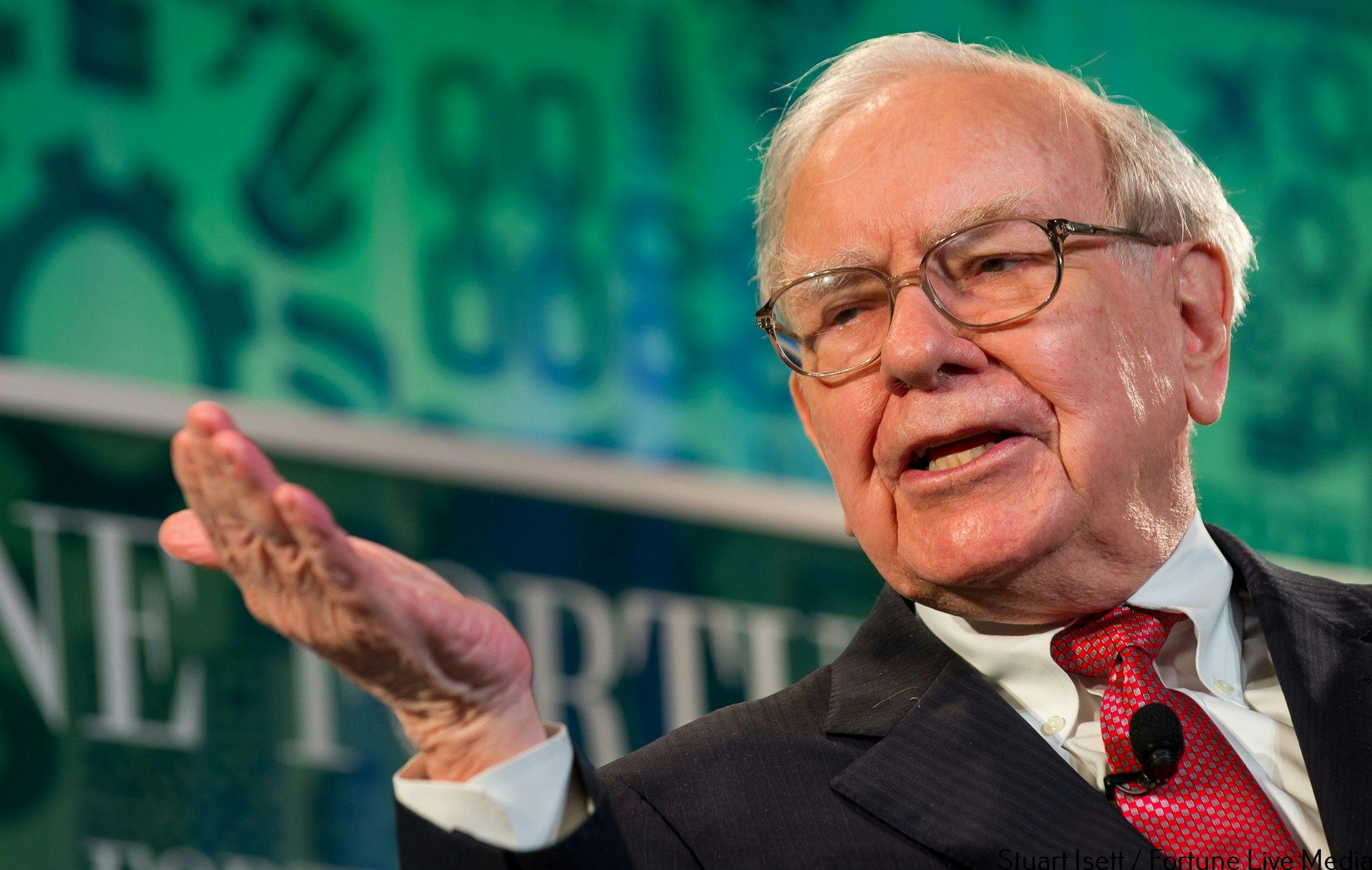
for-investors
10 Lessons we Can Learn from Warren Buffet
Few financial icons have the same clout and renown surrounding them as Warren Buffet does. At 86, the Nebraskan billionaire (estimated net wealth US$66.4 billion) has written bestsellers, wielded an enormous influence over public policy through his support of the Democratic Party, and signed the Gates-Buffet pledge, to which other billionaires like Mark Zuckerberg now belong, which includes a promise to give away at least half their wealth. His philanthropy, style, politics and business career are the subject of enormous fascination in America, and his acute business acumen makes him an inspiring and aspirational figure. Today, Equitise looks at ten lessons we can learn from Warren Buffett. 1. “Choose companies that are run so well, even an idiot could run them” There’s a deceptively large amount to unpick in this statement that reveals a lot about Buffett’s investment philosophy. He is famously a supporter of ideas rather than simply backing a company based on an entrepreneur. 2. Reinvest your profits Looking for reinvestment opportunities has been a habit of Buffett’s from the outset – during college he and a friend bought one pinball machine putting it into a barbershop. They continued to buy more machines with the profits. The profits from the clusters of machines were reinvested into Buffett’s first business – and he was worth $174,000 by age 26, about 1.4 million in 2016 3. Mistakes happen Buffet has said two interesting statements on the nature of mistakes in the investment game. First, that ‘you only have to do a few things right in this life so long as you don’t do too many things wrong’. Likewise “I’ve made lots of dumb decisions. That’s part of the game.” One such decision involved giving $400 million of his Berkshire stock to a company in the 90’s called Dexter Shoe, which went under. That sum would be equivalent to $400 billion today. But, walking away from a loss is as important as knowing when to pick a winner. 4. A unique attitude to risk While many entrepreneurs confuse success like Buffett’s with a bold, daring investment approach, this is not always necessarily the case. On this point, Buffett claimed “ I don’t look to jump over seven-foot bars, I look around for one-foot bars I can step over.” 5. Share results are important When he sends his shareholders letters, Buffett emphasises the importance of share results, comparing the growth in Berkshire’s book value per share to the performance of the S&P 500. Buffett opts to grow earnings in aggregate, not opting to reduce them through dilution on a per share basis. 6. Buffett does not play the market Buffett does not invest in stocks, but in businesses – while most investors play the market, without an understanding of the underlying business. He is not obsessed with market quotations, stating that initially “with two small investments I thought only of what the properties would produce and cared not at all about their daily valuations.” 7. Reputation is key The oft-quoted statement “It takes 20 years to build a reputation and 5 minutes to ruin it. If you think about that, you’ll do things differently”, comes from Buffett himself. He prides himself on personal relationships – he plays bridge four times a week with the same group, which includes Bill Gates sometimes, and started as a paperboy for the Washington Post (he is now on the board of directors), and initiated the aforementioned giving pledge. These individual characteristics combine to make reputation – and it’s something Buffett clearly cultivates. 8. Develop your own tone of voice A fear of public speaking is not the first trait that comes to mind when you think of an entrepreneur, but Buffett suffered strongly from this affliction at the beginning of his career. Knowing he would have to surmount it to succeed, he enrolled in a public speaking course taught by Dale Carnegie – today he has become renowned for his inspirational and witty speeches that he gives to young entrepreneurs. 9. Know the specifics As a cautionary tale about doing your background research, Buffett tells of how, as a child, he agreed to dig out the family grocery store for his grandfather, spending hours in a blizzard doing so – upon completion, his grandfather paid him 90 cents for each hour. From then he has always understood the importance of understanding the specifics of a deal, bargaining leverage, stating: "I am a better investor because I am a businessman, and a better businessman because I am an investor." 10. Be frugal Evidently Buffett does not need to be ‘frugal’ in the strictest sense of the word owing to his stature as one of the wealthiest men in the world, but this does not prevent him from maintaining a certain kind of lifestyle and abiding by a less excessive mindset than many of his billionaire counterparts. He has said “if you buy the things you do not need, you will have to sell the things you need’, and this morsel of advice extends to investments also. Buffett lives in the same house he bought when he was 28, and has always aimed to avoid waste and instead concentrate on building on what he needs for the future.
November 25th 2016

trends-and-insights
The Post-Election Markets Update
Donald Trump’s upset victory has sent aftershocks across the world, as the US elected the real estate billionaire over Hillary Clinton. Political and economic pundits are scrambling to predict what effects a Trump presidency might have in store for both the local US economy and countries around the world. Given the unpredictable nature of his campaign, this has meant that obtaining a view of this is a difficult task. Nonetheless, the markets have responded to the election, and the results are worth interpreting, as America moves in a new direction. Promising that his victory would be a similar upset to this year’s Brexit, Trump’s victory this saw a similar plummeting in the value of the American dollar and the stock markets worldwide. The peso plunged 13%. The yen fell 4% overnight. The FTSE 100 fell 2% on opening.. Collectively, the world’s wealthiest individuals lost bn. A Trump presidency was interpreted positively by groups most likely to profit, pharmaceutical companies, coal companies and the Corrections of America operator all witnessed soaring gains. Healthcare firms plunged, as Congress will look to repeal the Affordable Care Act. However, many investors were buoyed by Trump’s announcement of plans for infrastructure plans, translating to huge gains for manufacturing firms. Following these overnight losses, and calls from world leaders, including Trump, for stability, the US dollar subsequently rose. The S&P and Nasdaq then opened up 1.1%. History shows that transfers of power have been known to trigger these positive rises. What does this mean for the American economy? One can look to the likely appointments to his government as an indication of the policy directions for the next four years. A likely appointment for treasury secretary is former Goldman Sachs banker Steven Mnuchin. Trump has spoken publicly on the topic of repealing the Dodd Frank Act, regulation that sought to limit the financial institutions following the Global Financial Crisis of ‘07-‘08. Markets doubt, however, that he will follow through with proposed trade tariffs on China and Mexico. Credit rating agencies have nonetheless been warning that any of Trump’s proposed tax cuts would have a negative effect. Such immense cuts would likely be met with a filibuster of Democrats in the Senate, being their sole recourse now that the Republicans have effective one party control of the government. What does this mean for alternative finance? Crowdfunding emerged as an alternative to traditional finance – it represented a new wave of democratic financial institutions, by the people, for the people, wholly independent of governmental or institutional restrictions. Alarmingly, technology shares slumped, as many tech companies in Silicon Valley hire skilled migrants from abroad. What’s more, the democratisation of finance is a concept and practice that extends beyond political upheaval – born from an economy in flux, it has thrived owing to its cross-border appeal and rejection of conventional norms. As it continues to provide access to a typically private end of the market, equity crowdfunding marries diverse investor types to restore the power of the economy and our startup sphere into the hands of mum and dad investors. Skepticism of the existing financial framework may push entrepreneurs and investors to look to alternatives, and that alternative may be equity crowdfunding.
November 18th 2016

trends-and-insights
Equitise and Australasia's First SingularityU Conference
Uesi Unasa, Equitise’s Investment Associate, attended Australasia’s inaugural Singularity University Conference held at the Hornscastle Arena in Christchurch from the 14th -16th of November. This was part of Equitise’s ongoing initiative to be involved in providing market-leading technology to our companies and investors. The Singularity University summit is a gathering of some of the world’s leading minds to speak on the exponential innovations occurring in the technology industry and the impact that it will have on the future of New Zealand and Australia. The speakers were wide-ranging, from ground-breaking technologists in the field of self-driving cars and digital biology to speakers operating in traditional fields such as education. Key members from the field of Policy and Government also spoke about the implications that these advancements would have on New Zealand’s regulatory environment in a world utilising Artificial Intelligence. Equally as impressive were the technologies that were on display outside the arena, including Baxter the AI robot and ThoughtWired who were showing off a mind controlled toy car. The demonstrations served to reveal that the gap between sci-fi movie and real-world technology is not as far apart as many assume. Kaila Colbin, NZ Ambassador for Singularity University, drove this point home with the conference’s opening talk on exponential technologies and what the implications of Moore’s Law might look like to New Zealand in 5, 10 and 20 years. In what was perhaps the most well-received speech on the first day, the audience was challenged to reassess the industry in which they operated. David Roberts, HaloDrop and 1Qbit Chairman, gave a talk on the history of disruption, paying close attention to the history of the spice trade. In his analysis, Roberts revealed one of the biggest drivers of the purchase of spices was the myth that spices preserve food. At first, this appeared absurd to the audience, but Roberts went on to describe the man who disrupted the entire spice industry - Frederick Tudor. The talk covered Tudor’s entrepreneurial endeavours of transporting Boston ice around the world in insulated ships, amassing a fortune at the expense of global spice traders. Continuing with this trend, the talk moved from Tudor’s enterprise to the disruptive icebox and eventually moved to the modern-day fridge. Technology had rendered the spice trade a shell of what it once was. So what could displace the modern-day fridge? Genetic modification and effective drone delivery are two potentially disruptive technologies in this space. These are already being developed by thought leaders around the world. Robert’s talk was a microcosm of the Singularity University conference and implored the audience to revisit the assumptions that we make in our everyday lives. Equitise is eager to apply these philosophies to the capital raising process and hopes to partner with innovative companies who are on the same journey in their respective fields. Overall, SingularityU was a great event to be a part of – watch this space for more commentary on the Singularity University conference in the next series of blogs.
November 15th 2016

trends-and-insights
Private Placements and IPOs: Equitise’s Model
Equity crowdfunding is evolving. Having first established itself as the model through which new investor types could participate, it has since extended to fund various modes of investment. Equitise has led this expansion with its syndicated investment platform, and its funding of the DongFang IPO last year, one of the world’s first crowdfunded IPOs. We are evolving further, excitingly, with the inclusion of a private placement deal room as a new aspect to our platform. Today, we assess the differences between IPOs and private placement deals, and why the inclusion of these two new investment types is a pioneering move. It’s important to assess the differences between these two new deal rooms. Private placements are otherwise known as a ‘non-public offering’; that is, funding companies through a private offering to select investors. Typically, the types of investors who partake in private placements are banks, insurance companies and mutual or pension funds. The underwriting process is usually quite quick, with sophisticated investors mainly being the ones who fund such transactions. Equitise facilitates these types of transactions by allowing companies to use an Equitise private deal room with a close network of investors. By contrast, IPOs, initial public offerings, refers to the stock of privately traded company being first offered to the public. Both young companies and large privately owned ones perform IPOs, as has been evinced by companies such as Google and Apple. By enlarging and diversifying their equity basis, having cheaper capital access, and attracting employees through liquid equity participation, IPOs fundamentally transform companies. From employment to structure, the new opportunities (convertible debt, cheaper bank loans, etc.) are varied and exciting. Follow-on offerings mean that the process is not a simple, one-off trick and can be done repeatedly to effect. The association of IPOs with equity crowdfunding platforms is somewhat new, but Equitise’s feedback from its investment base suggested it was popular, owing to the inherent decreased risk (often more mature companies with further compliance obligations) and increased liquidity (due to trading on a registered stock exchange). As such, Equitise is open to collaborating with diverse companies to open up their shareholder, thus ensuring that their IPO is reaching the broadest and most involved array of investors. Our new IPO launch, Crazy Domains, typifies the breed of innovative company and ambitious management that Equitise looks to target, and that our investors have a demonstrable appetite for. The company is Australia’s fastest growing hosting platform, with a distinct competitive advantage within its industry already, that it is looking to capitalise upon. As always, if you have any questions on the above, feel free to get in touch with a member of Equitise.
November 14th 2016

trends-and-insights
Update: New ASX Listing Rules
The ASX recently released revised rule changes that will take effect from 19 December 2016. The key listing admission rule changes are: Market cap: minimum increased from $10 million to $15 million Free float: a minimum of 20% market capitalisation must be free float Spread: at least 300 security holders each holding at least $2,000 of securities The following admission rules relate to the business: NTA: minimum net tangible assets increased from $3 million to $4 million Profit: Increasing the requirement for profit test entities to have consolidated profits for the 12 months to admission from $400,000 to $500,000 Financials: two full financial years of audited accounts for the company as well as and any significant entity or business acquired in the 12 months prior to applying for admission to the ASX or that the company proposes to acquire in connection with its listing Working Capital: $1.5 million minimum for those admitted under the assets test
October 28th 2016

trends-and-insights
Equity Crowdfunding: A Three-Way Hybrid
The content of this article has been adapted from Equity Crowdfunding: The Complete Guide For Startups And Growing Companies, launching on Amazon on November 1. Equitise subscribers can download the entire book for FREE, this week only. Click here to download. There are numerous ways to fund the growth of business – a company can get money through product sales, through investment from friends and family, borrowing money from a bank, gaining a government grant or through seed money provided by a startup accelerator. Each of these ways will suit different businesses at different stages of their development. Equity crowdfunding has arrived on the scene in the last few years as another alternative, with its own advantages and disadvantages. It can be quite accurately described as a three-way hybrid between venture capital, the ‘rewards’ crowdfunding offered by sites like Kickstarter, and initial public offerings. Let’s look at some of the key similarities and differences between equity crowdfunding and its three closest cousins. Equity crowdfunding vs. venture capital Venture capital investors can be a valuable partner as a business grows. They take an active interest in helping the company expand, providing expertise in addition to their money. This active role is one reason why some companies prefer venture capital to equity crowdfunding; they get to deal with a small number of large investors, who are highly incentivised to drive the company forward. Equity crowdfunding has its own advantages, though. Notably, it is much better for publicity. Customers can be gained through the exposure generated by a campaign, as can new suppliers, board members, and other partnerships. When you put your company out there in such a public forum, people will notice and be attracted to your company in many ways. Conversely, a deal with venture capital is done behind closed doors. Another advantage of equity crowdfunding is the ability to more strongly retain a company’s culture. The venture capital industry is still mostly male, and tend to come from similar backgrounds – elite universities and the corporate world. Among the melting pot of diversity that entrepreneurs represent, naturally some won’t gel with this “VC culture” – these entrepreneurs are not necessarily less worthy of being funded, but submitting themselves to a culture they don’t identify with is anathema to some of them. The ability to retain full control of their company culture, by having more small investors is attractive to many startups. Equity crowdfunding vs. rewards crowdfunding Rewards crowdfunding and equity crowdfunding campaigns look and feel similar to each other – they have video, a public Q&A forum, and payments done through an online platform. But rewards crowdfunding offers people the chance to back you in exchange for a reward (such as a product or experience), while equity crowdfunding investors get shares in the company in exchange for the cash. The biggest advantage of rewards crowdfunding is that the founders get to raise money without giving up any shares in their company. They gain customers, not investors. Therefore, if they go on to sell their company, the founders will not need to share the proceeds with the crowd. There are also fewer barriers to launching a rewards crowdfunding offer. A company will not be subject to such intensive checks from the platform, and there are fewer regulations involved. This means rewards crowdfunding can be used to raise money with less time and expense involved. Still, there are reasons to go through with an equity crowdfunding campaign. For one thing, equity crowdfunding typically raises a lot more money. Yes, rewards crowdfunding campaigns have raised hundreds of thousands and even millions of dollars. But this level of uptake is very uncommon. Anyone can launch a Kickstarter campaign, but not anyone can close one with a meaningful amount of money raised. You might be the one to beat the odds, but when it comes to raises in the six figures and up, the success rate with equity crowdfunding is much higher. Equity crowdfunding is also suitable for more types of businesses. Rewards crowdfunding can work great for B2C products, but what if you are in the business of something very expensive (like industrial equipment) or difficult to understand (like software)? Equity crowdfunding enables B2B businesses, more-established businesses, and businesses which aren’t naturally public-facing to raise funds. Equity crowdfunding vs. initial public offerings Both equity crowdfunding and initial public offerings are offers of shares in a company to the general public. However, equity crowdfunding is handled through an online platform, without the need for brokers. Another difference is that raising money through the stock market requires preparing a prospectus, which is a very long and prescribed document, requiring lots of input from expensive lawyers and investment bankers. Equity crowdfunding is therefore simpler and less expensive than an initial public offering, and within reach of companies at an earlier stage. Even though funding startups and growing companies is what equity crowdfunding is best known for, it is not limited to this. Companies at later stages of development can still use an equity crowdfunding. For example, in 2015, Equitise partially crowdfunded the initial public offering of Chinese agricultural giant Dongfang Modern. At the time, Dongfang had annual revenue of AU$133 million — hardly a startup. Offers like this point to the possibilities of equity crowdfunding: new options for a whole new audience of investors who prefer yield, diversification, more-established businesses, and immediate liquidity. One great thing about equity crowdfunding is its ability to work together with these other methods. Venture capital firms and angel investors can invest in equity crowdfunding campaigns alongside the public. Many companies have done both a rewards crowdfunding campaign and an equity crowdfunding campaign to take advantage of the benefits of both. And as we saw with Dongfang Modern, initial public offerings can included a crowdfunded component. So think of equity crowdfunding as not being “instead of” these other methods, but instead, as being complimentary to them. If you enjoyed this article, you can read a comprehensive overview of equity crowdfunding by downloading Nathan Rose’s new book, FREE on Amazon for this week only, featuring even more insights from Equitise and many other platforms from around the world. Click here to get your copy.
October 21st 2016

for-investors
Understanding Growth Investing
The online sphere has examined at length the impacts of equity crowdfunding on the financial industry and startup economies. It’s equally important to consider the effects it has had on investors, and opening up new avenues of investment to an array of types. Undoubtedly, equity crowdfunding by its very nature proposes a new dawn for growth investing, and a reassessment of the companies and investors who are attracted by this investment type. Today, Equitise delves into growth investments, how it compares to value investing, and why equity crowdfunding ushers in a new era for this strand of business investment. Firstly, some definitions may be helpful for the uninitiated. Growth investing refers to a capital appreciation-focused investment strategy, investing in companies that exhibit signs of above average growth. Even if the share price is expensive in terms of metrics, growth investors look to the aforementioned signs, rather than price-to-earnings or price-to-book ratios. Conversely, value investing targets stocks that trade for less than their intrinsic values. Value investors will target stocks they consider to have been undervalued by the market. Equitise has spoken previously of the benefits to equity crowdfunding for both retail and experienced investors – potentially higher returns than traditional finance, spreading risk through a diversified portfolio, and removing administrative costs among them. Nonetheless, successful exits take time. Despite the nascent popularity and soaring success of the industry in areas with liberal regulation, such as the UK and the New Zealand, time will still reveal the returns to investors, and this may take between three to ten years. Angel investors and syndicated investment platforms have been attracted to equity crowdfunding by the relatively high returns offered after a certain period. The relative lack of data available to analyse when it comes to startup businesses, however, means that individuals looking to become growth investors must understand the underlying principle of return. Recent success stories such as the exit of E-Car by Europcar demonstrate the potentially enormous and exciting benefits for investors, but the majority of equity crowdfunding projects remain at the seed stage, which investors with either short attention spans or seeking immediate rewards must be conscious of. “I think it’s massively helpful that companies now have better access to equity finance from an earlier stage” Marcus Stuttard, Head of AIM and UK Primary Markets at London Stock Exchange Group. The startup financing cycle has hugely benefited from the proliferation of equity crowdfunding, as have the investment portfolios of those investors whose projects have successfully exited. Startup financing at growth stage will always be a nebulous and difficult to predict business, but for investors who are spreading the risk with a diversified crowdfunded equities, it is always worth assessing your growth investment strategy.
October 18th 2016

for-investors
The Main Things to Look For in a Startup
Early-stage companies jostle in a highly competitive and saturated marketplace, with intermediary platforms and the online blogosphere highlighting this saturation. As such, it can be difficult for investors, whether experienced or native to the industry, to discern which startups are worthy of growth investment attention. It’s important to siphon the cavalcade of information and PR that cloud these companies, and understand the main things to look for in a successful startup. Today, Equitise assesses the common characteristics of startup companies worthy of your time and investment. One of the primary factors is the market in which it operates, and the corresponding size and need. This has been assessed as the key factor behind startup failure, with 42% of startups failing owing to ‘a lack of market need’. CBS Insights gained this after studying over 100 startups, who clearly failed to consider the feedback and validation necessary before taking ideas to investors. A brilliant solution or product requires a corresponding market need – the most successful pitch is meaningless without significant research and convincing statistics that can assure potential investors. Likewise, investors should assess the individual team behind the startup, which can be a valuable performance indicator. Interestingly, startups formed by more than one founder have been assessed as 160% more successful than their individual counterparts, further proof investors should conduct background work. People are as worthy and important as ideas. While equity crowdfunding doesn’t demand the same level of personal interaction as some other investment types, it’s nonetheless assuring that your funds will be in the hands of qualified and experienced individuals. The idea and team must be assessed in conjunction. Whether it’s the history of the co-founders working together, their track record of companies or their industry connections, there are many things to look for in a successful startup team. Similarly, it’s vital your startup has a detailed and ambitious business plan that withholds scrutiny and demonstrates an understanding of the marketplace. This should include the examination of the market need, competitors and the distinct advantages of committing to this startup. Market research and surveys should have been incorporated into this assessment to provide feedback to prospective investors that the business has reached out to its clients and the community. This should be provided in conjunction with a pitch deck, and the business should have an open approach to the provision of information. The business model may already be in action, and this demonstrates a real commitment and enthusiasm for the company that other startups may not be able to equal. If you’re able to assess what seed costs have been apportioned towards, whether it was marketing strategy or product development, this is especially valuable. The above criteria provide simply an initial list of factors to consider when assessing the startup worthy of your growth investment. Crowdfunding platforms work as intermediaries, and are not able to offer the full gamut of information on the company, this should be assessed and determined by the individual investor. Nonetheless, always keep in mind these factors when determining which hopeful startup could benefit from your investment, and could benefit your investment portfolio.
October 14th 2016
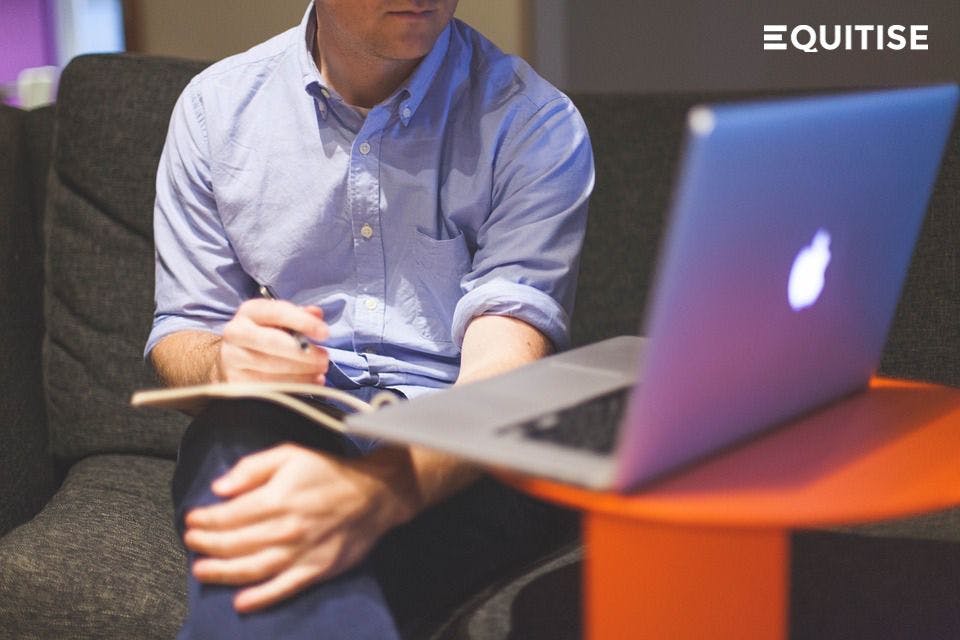
trends-and-insights
The Importance of Portfolio Diversification in Startups
A new variety of investor types has been attracted by the prospect of varied investment portfolios owing to the soaring success of equity crowdfunding. Equity crowdfunding has now begun to provide tangible returns for its early supporters. Although individual appeal is behind these investments – entrepreneurs wanting to support a particular company or admiring their individual products, all kinds of investors have become attuned to the benefits of a diversified portfolio. Equitise examines the main perks of how investing in startups through equity crowdfunding can enhance your portfolio, no matter how experienced an investor you may be. Equitise has examined how investing through crowdfunding platforms can, despite initial industry detractors, provide liquidity. ‘Mum and dad’ investors become inured to the essential notion that there is a high risk-high reward component to investing in unlisted businesses. For a first-time investor, startups may prove to be a riskier prospect, despite being a healthy aspect of any investment portfolio. Before the time of equity crowdfunding, diversification required extensive advisory services, time and nuance. Experienced investors like business angels could diversify easily, so too could wealthy individuals investing via EIS or SEIS funds. Today, those seeking long-term investments can adopt crowdfunded equities into their portfolio. These investors can typically expect to wait a minimum of five years before seeing returns. It pulls them towards a broader arrange of sectors and industries than hitherto imagined, but this can be off-putting for retail investors. Allocating your divided investment amount towards an array of industries allows for true diversification. Indeed, investors who have wisened up to this save on the typically costly due diligence and fund management fees. Accordingly, larger sums of capital can be apportioned for investment purposes. This additional capital is necessary for the extra fundraising rounds that can occur when your company decides to expand. Ultimately, equity crowdfunding employs a new array of investor types, the full range from VCs to Angel investors, who legitimise companies and deals in a democratic fashion for which the sector has become renowned. As equity crowdfunding raises offer reduced capital requirements, retail investors can diversify more easily than ever before, spreading small investments through different businesses, in different industries, at different stages of maturity. Savvy investors understand that diversification is key to responsible investment, and this is now easier than before thanks to equity crowdfunding.
October 11th 2016

trends-and-insights
State of Play: USA Market
America is not shy to innovation, as its Silicon Valley haven and communities of tech giants look to capitalise on all the latest Fintech trends. Surprising, then, that the implementation of crowdfunding regulation has been relatively slow to advance in the USA. Following Obama’s signing of the JOBS Act (Jumpstart Our Business Startups) in 2012, many assumed that the way in which it eased securities regulations would immediately usher in a new regime for crowdfunding companies, and others from the alternative finance market. Not so. Today, Equitise looks at the gradual progressions of crowdfunding the USA market, and where equity crowdfunding platforms see themselves in 2016 America. The crux of the Act, for the crowdfunding community, are Titles II and III, which impact crowdfunding and startups more directly. Title III was finally passed into law at the end of last year, becoming active in May 2016, a few years after the SEC had dictated it wished the law to become live. Nonetheless, it has been welcomed by both politicians and members of the financial community for incorporating their respective concerns. The question of balancing investor protection against competitive legislation and the need to create a sound American marketplace for crowdfunding have been carefully considered. In a move that reduces the cost significantly for many startups looking to raise via a crowdfunding platform, they have eschewed the need for audited financial statements. Moreover, the SEC had pleas for an alternative disclosure form – hence a simpler Question and Answer disclosure format was preferred. Initially, however, the SEC had insisted that no crowdfunding intermediary would be able to accept equity compensation. This position has changed. As this ruling would have fundamentally impacted the ability of platforms to turn profits, and goes against the liberal format being favoured by international sectors. Nonetheless, an essential piece of Title III still hinders platforms – by prohibiting them from advertising. Obviously, traction is essential to any campaign, and whether by word of mouth or other campaign, it is key to generating the necessary funding. The ‘general solicitation’ disallowed by Title III, is an egregious amendment to the overall legislation. “The bottom line? Most equity crowdfunding raises cannot effectively use the Internet or social media to promote their equity crowdfunding raise.” – Samuel Guzik, Senior Contributor to Crowdfund Insider. The JOBS Act does propose alternatives, however, for different kinds of startups. Title IV, or Regulation A+, allows solicitation – but it requires a detailed disclosure document with audited financial statements, which is a deterrent for many smaller scale startups who cannot afford such costs. Coming soon, however, is the Fix Crowdfunding Act – which will hopefully amend Title III to make it more workable (if it is enacted). By raising the funding cap from $1 million to $5 million, assessing funding platform liability, and removing future public registration, huge changes may be afoot. The gradual changes witnessed under the JOBS Act by the American crowdfunding scene make one thankful for New Zealand’s liberal crowdfunding legislation. The proposed amendments are hopeful, but it’s clear countries still seek to emulate a more liberal model like our own.
October 6th 2016

for-companies
How Equity Crowdfunding Works with Listed Companies
The discussion over equity crowdfunding laws and its marketplace commonly focuses on its benefits to startup companies and emerging businesses. The access to capital and removal of traditional investment barriers for this sector has been well-documented and trumpeted by Equitise. Less understood, but still equally exciting, is the potential of equity crowdfunding for listed companies. As the alternative finance sector seeks to democratise finance in new and varied ways, listed companies should harness its new capacities. The quick evolution of equity crowdfunding has supplanted traditional investment sources for startups, providing real competition or VCs and angels. 2014 saw the first instance of a public company raising via equity crowdfunding. Instead of contacting a financial institution or looking to traditional means, English winemaker Chapel Down raised £1.6 million via Seedrs. This marks the next stage of crowdfunding’s evolution. Aside from the obvious advantage to retail investors who hitherto didn’t have access to this brand of deal, there are many benefits to companies like ‘Chapel Down’. First and foremost, traditional methods of investment take time. The number of meetings required, connections to set up, and funding to acquire demands resources. The online nature of equity crowdfunding avoids this burdensome routine, and is also a cheap manner of amassing multiple investors at the same time. The implications of this newfound shareholder diversity is twofold. Firstly, certain stock markets necessitate a minimum number of stockholders – a crowdfunded company will be more easily able to meet this requirement. Secondly, you have a range of investors and a diversified amount. This offers an easy marketing pool for the company who can attest to the democratic and widespread appeal of their product simply by addressing the number of investors they have. Likewise, if there are follow-on offerings, as is common for companies who have used equity crowdfunding, there is an established base of potential investors, and the same VC or angel process doesn’t need to be done all over. Brand awareness can be achieved in the same breath as funding, the same cannot be said for traditional modes of investment. Following the footsteps of trailblazing startups, listed companies now want to sample the ease and online maelstrom of action. Filling the funding gap for companies of all sorts has always been at the core of equity crowdfunding’s concept and appeal, and now they have alternative means to fill these gaps while distributing their offers. Equitise’s current offers are testament to this, and we are committed to expanding the scope of innovation and competition within the alternative finance community. If you have any questions about our current deals, don’t hesitate to get in touch.
September 30th 2016

trends-and-insights
Syndicated Investment
Being the Trans-Tasman equity crowdfunding platform demands constant innovation and adjustment to keep apace with, and ahead of, various industry changes. To do this, Equitise has maximised the ‘democratic’ nature of equity crowdfunding – having an array of various investor types consolidating on a single investment project – with its recent syndicated investment platform. Today, we set out the introduction of syndicates on Equitise’s platform, and its primary benefits for investors, and leads. Background to Syndicated Investment Opening up access to financial deals to retail investors has long been acknowledged as the key facet behind equity crowdfunding’s appeal. As “mum and dad” investors jostle alongside more experienced and financially savvy accredited investors, Venture Capitalists or angels, the results can be fascinating. The former receive access to industries or deals they’re eager to support, and the latter are able to obtain a sort of market validation from the crowd. Recently, Equitise has launched its syndicated investment platform to a closed network of sophisticated investors to bolster the relationship between these investors and the trusted syndicate leads we have chosen. Equitise has curated a collection of eight trusted syndicate leads, including H2 Ventures, Reinventure and Tank Stream Ventures. These syndicates will allow investors access to investment opportunities sourced and vetted by an experienced cornerstone investor. Currently, there are two live syndicated transactions, with six already completed. For the time being, the platform will be proceeding with Venture Capitalists, followed by notable Angel Syndicates and Family Offices eventually. Benefits for Investors The effect of the syndicated model is to democratise the traditionally closed-off world of Venture Capital investment. Selected investors will be able to tap into opportunities sourced by reputable investors who curate the best and most exciting deals. It therefore functions as an appropriate introduction to early-stage investments – a safer and exciting extension of traditional equity crowdfunding. For this reason, Equitise undertakes a thorough vetting process of its Syndicates before allowing them to launch transactions. While there will be lower minimums that the standard VC fund commitment, without an obligation to invest in each deal, syndicate leads will nonetheless be able to Venture Capital set their own terms. Investors are thus offered deal-by-deal access, rather than being obligated to invest when called, as is typically the case with Venture Capital funds. This empowers the investors more, enabling them to make their own decisions on the amount to invest in each transaction. This likewise alleviates initial industry concerns and misgivings that crowdfunding opportunities are not properly assessed by investment professionals. Moreover, there is a gravitational effect to having several high-quality investors in one platform. Ultimately, syndicated investment also exemplifies the main benefits of crowdfunding – automating the investment process in a democratic manner to raise capital in a more efficient way. Benefits for Leads As for the “leads” in the syndicated process, it offers them a means of monetising the co-investment opportunities they put out there for other investors. As an efficient tool for sourcing investors and deal-flow, it is unique. As such, it’s a cost-effective way of leads accessing the crowd, taking their offers public, and building a following easily. Indeed, it’s a valuable marketing tool for any b2c business that investment professionals are looking to fund. As for the leads, there is no requirement to raise a large fund, and they can raise capital on a deal-by-deal basis. They’re able to set their own terms for their syndicates, balancing a fair deal for investors as well as satisfying their return. By strategically sourcing sophisticated investors to partner with your chosen businesses, you’re tapping into a more fertile network. Equitise will independently verify each investor through automated identity, AML/KYC and sophisticated investor certification. We hope this clears up any questions raised by the release of syndicated investment. Please contact us if you’d like any more questions on the process and Equitise’s exciting launch of syndicated investment deals.
September 22nd 2016

trends-and-insights
Global Fintech Financing Trends
The past five years have seen seismic changes in trends for alternative finance. The concentration of funds and investment into the likes of equity crowdfunding has altered the existing trends and forged a new investment landscape. Today, we assess the annual global financing trends, from Venture Capital (VC) backed tech companies and more, to paint an accurate picture of what the market will look like going forward. There has been a steady rise since 2011 in funding for venture capital backed Fintech companies, with an especially significant increase from 2013 onwards. Between 2011 and 2013, aggregate investment increased by ~36% to US$3.0 billion, and the number of completed deals increased by 73% to 553 deals. Following this, there was an enormous increase in aggregated investment. From 2013 to 2015, it increased by ~380% to US$14.4 billion, with the number of completed deals increasing by 40% to 775 deals. Together with the increase in deal value and volume since 2011, there’s also been an enormous increase in large financings, in excess of US $50 million, for VC-backed Fintech companies. 2015 witnessed 40 deals across North America alone that included financing in excess of US $50 million. This means that global Fintech financing to VC-backed companies saw its strongest ever first quarter, raising $4.9 billion across 218 deals. If this current run rate were to continue, 2016 will top 2015’s investment totals, both in terms of total investment and deal number (At$19.6 billion and 870 respectively). The Massolution Crowdfunding Industry report noted exciting raises and developments across the sector in 2015. It estimated the fundraising volume at $34 billion. P2P/Marketplace figures tend to inflate these statistics. Nonetheless, the figure is double the previous year, boding well for the 2016 report. 2015 calculated the real estate crowdfunding industry at over $2 billion in itself, and it’s one industry in particular, as attested by Equitise’s previous blog post, that has continued to soar. The World Bank has buttressed these figures with its estimate that the industry will be valued at $96 billion worldwide by 2020. “We’re expecting 75-100% growth in US equity crowdfunding volume of capital raised in 2016, approximately $3.5 to $4 billion.” Editor at CrowdExpert These figures do not occur in a vacuum, with many crowdfunding trends backing up these financing trends. The proliferation of online platforms continues to fuel the growth in angel investing, just as increased transparency by issuing companies will spur more equity offerings under Title 2 of the Jumpstart Our Business Startups (JOBS) Act in America. As crowdfunding continues to fill the traditional gap in funding for local businesses, and as more investors tap into the deal flow with fewer administrative burdens, we’re excited to read Massolution’s 2016 report that summarises the seismic changes of the industry in 2016. Cheers, the Equitise team
September 19th 2016

trends-and-insights
State of Play: Equity Crowdfunding in Singapore
Financial pundits around the world are beginning to view Singapore as the pre-eminent financial hub of the future. Pre-Brexit reporting suggests that Singapore sits behind only London as the world’s leading financial hub, citing “superior technology, low taxes and efficient transport and infrastructure systems” as key levers for Singapore’s ascension. At the core of this emergence has been Singapore’s strong SME ecosystem and a regulatory willingness to support an environment of sustained growth. In particular, Singapore’s stance on Equity Crowdfunding (ECF) offers insight into how regulators believe it will catalyse this economic growth. In this blog, we explore the Singaporean SME environment, its ECF regulatory framework and compare our observations to several of its neighbours within the Asia region. The Singaporean SME Environment SMEs form a significant segment of the Singaporean economy. According to recently issued statistics from the Singaporean government, SME entities account for 99% of all its registered enterprises. These SMEs account for 48% of the country’s economic output and employ more than 65% of the Singaporean population. The Singaporean Minister of State for Trade and Industry, Teo Ser Luck, has enforced this reliance on SMEs. In several speeches to the Singaporean government, it has been urged that policies catch up with the challenges that SMEs in Singapore face now and in the foreseeable future. Singaporean Equity Crowdfunding Regulatory Environment MAS has demonstrated a keen commitment to providing support to SMEs through initiatives such as the Fintech Office and the International Technology Advisory Panel which provides advice to fintech companies on government grant applications and funding schemes. Furthermore, the Panel provides a forum for reputable and experienced business leaders to give commercial advice to start-up fintech companies. MAS has recently committed $225m over the next 5 years to growing the fintech segment of the start-up and SME ecosystem. Internationally, MAS has formed bridges between both the UK and Australia. On 11 May 2016, MAS announced its first ever FinTech Bridge with the UK - an agreement to help co-source regulatory information between regions, allowing Singaporean regulators to refer fintech firms to their UK counterparts. Additionally, MAS has signalled interest in bilateral arrangements between Australia. On 16 June 2016, the MAS announced the Innovation Functions Cooperation Agreement which was set up to enable fintech companies in Singapore and Australia to seek initial advice on licensing in each other’s markets. In response to the requests of the equity crowdfunding (ECF) and SME community, MAS has issued a consultation paper which prescribes several key legislative changes, conducive to the ECF environment in Singapore. The Regulatory Framework From the SME’s perspective, prospectus requirements have traditionally been a time-consuming and cost-intensive barrier within the capital raising process. Under the regulatory changes issued by MAS, these requirements have been lifted for SME capital raises which meet one of the specific sets of criteria: a. Small Offers Exemption - Under section 274A, an offeror or a specified delegate may make personal offers of securities, up to $5 million within any 12-month period, without a prospectus. Such offers must be made to a pre-identified individual or entity. b. Private Placement Exemption - Under section 274B, offers of securities to no more than 50 persons within a 12-month period may also be exempted from the prospectus requirement. Exempted Offer Requirements Offers which are exempted from the prospectus requirements are required to comply with the under Sections 272A, 272B and 275. These requirements are significantly reduced in comparison to the requirements associated with a prospectus. a. Communication to qualified persons – Communications containing only factual information may only be issued to qualified persons. b. Platform design - Offers of securities must be made through a platform which is access-restricted to qualified persons. c. Publicising a platform - A platform operator may publicise its platform by providing information about its services and past offers. However, the operator is unable to call attention to any open offer or to any intended future offer. Further to these exemptions, MAS has eased financial requirements for intermediaries that deal in securities, by lowering the base capital requirement from $250,000 to $50,000 and removing the requirement to maintain a security deposit of $100,000 with MAS. The lowered requirements only apply where the Dealing Licensees serve accredited and institutional investors, do not handle or hold customer funds, assets or positions, and do not act as principal against customers. Requirements for servicing retail investors is comparatively restricting, given ECF platforms are required to maintain a $500,000 deposit to operate in this market. Guidance on adhering to these requirements is publicly available online. Equity Crowdfunding Environment in Neighbouring Jurisdictions Across East Asia, the volume in alternative finance came to $412 million in 2015, representing a 334% increase since 2014. This popularity of alternative finance highlights the continent’s funding gap, with only 18% of all bank lending going to SMEs in the continent. In order to appreciate Singapore’s regulatory framework, it is worth briefly analysing the regulatory and investment landscapes across a few Asian developed countries with similar regulatory/investment landscapes. Hong Kong Hong Kong is a major international financial centre, comprising of effective and transparent regulations, low taxation and a strong emphasis on the rule of law and free market. With a population of just over 7m and an SME ecosystem that accounts for 98% of total business units and employs 46% of the population, the lure for an ECF provider appears to be inevitable in Hong Kong. However, ECF regulations have not yet been clarified to the market and this may be part of why there are no ECF platforms operating in Hong Kong. Observers of regulatory activity are no clearer as to when ECF legal clarity will be announced despite discussions on the topic taking place. Recently, the Financial Services Development Council has called for a research report in order to better understand international ECF frameworks. Japan Japan has adopted an ECF friendly framework much earlier than its neighbours. As of 30 May 2014, Japan amended the Financial Instruments and Exchange Act (FIEA) with the objective of enhancing the overall attractiveness of Japan’s financial and capital markets. However, similar to Singapore, restricting protections have been given to retail investors, preventing ECF platforms from entering the Japanese marketplace. South Korea In mid-2015, the Korean National Assembly announced regulatory changes which would legalise ECF. This move was to recognise a need to facilitate funding for SMEs and start-ups. Over the past year, the ECF industry has gained momentum. While there is room for more regulatory changes, the Financial Services Commission of Korea has hinted at the possibility of raising the investment ceiling for retail investors in an attempt to widen the investor pool and grow the ECF industry. Conclusion As described above, Singapore regulators have shown a willingness to facilitate ECF as an alternative financing method. Its unique and complementary regulatory framework is expected to have a catalytic effect on the significant SME segment of their economy. As has been the case in many of the Asia regions, ECF providers have been restricted by the measures its regulators have taken to protect retail investors from these alternative securities. Despite these restrictions to date, ECF providers are beginning to open opportunities for investors into markets which were only available to a select few. If the trends continue (and there is evidence to suggest that they will) these investment opportunities will become completely and globally democratised.
September 16th 2016

trends-and-insights
Why should Investors Care about the Legislation around Equity Crowdfunding Investments?
The popularity of equity crowdfunding among retail investors has required international legislation to keep apace with their rapidly-evolving involvement. It’s this active involvement of ‘mum and dad’ investors that contributed to the World Bank’s valuation of the global crowdfunding industry nearing $90 billion by 2020. Nonetheless, not all governments have been quick to assist in the active collaboration of different investor types within the crowdfunding industry. Today, Equitise addresses why investors should take a look at changes in crowdfunding regulation, and why governments sometimes lag behind the financial community in terms of new legislation. Global Snapshot The passage of the US JOBS Act in 2012 was supposed to build the way for you, your mum, your neighbour or your high-school teacher to be able to add ‘startup investor’ to your CV. Startups could tap into a potentially endless pool of entrepreneurs, and retail investors needn’t be part of any existing financial institution to have some skin in the game. Nonetheless, it took 3 years of additional regulations and SEC discussion to create a version of the JOBS Act they considered to protect investors. Finally, the modern superpower has crafted legislation allowing investors of all types to contribute in a truly democratic manner. Restricting equity crowdfunding to accredited investors in 2012/13 hindered what has been a stratospheric rise for the industry – in the US, it went from $6.1 billion in 2013 to $34.4 billion in 2015, when it had been expanded to include retail investors. The appetite of these investors is demonstrable, lending to the suggestion the industry could surpass Venture Capital investment from 2016 onwards. There is a fine line, however, between wanting to protect retail investors, and unnecessarily limiting the industry as a whole. The US seeks to protect retail investors by regulations – individuals with an annual income/net worth of <$100,000 can only invest $2,000 maximum/5% of the lesser of their annual income or net worth. Individuals with an income of minimum $100,000 can invest the 10% of either annual income or net worth. In Canada, however, the limit is $2,500 per offer. In the UK, where equity crowdfunding is the most active investment type, the limit is 10% of net assets total. The legislation of these countries stands in stark contrast to New Zealand – where there is no limit. See below for a chart which demonstrates the differing limits and regulations (thanks to Crowdfund Insider). Why Investors Should Care “By simply broadening the gender and racial makeup of potential investors, which crowdfunding does, opportunities for women and minority-owned business will increase.” - Georgia Quinn, CEO of iDisclose Equity crowdfunding rose to prominence by offering access to the hitherto private world of financial investment to investors from all industries and walks of life. This benefits diverse startups also – as evidence by the above quote, in an industry where only 7% of venture capital principals are women, equity crowdfunding helps create a more diverse and inclusive financial marketplace. Moreover, the global investor response to the GFC has been one calling for innovation and rehaul of our existing financial structures - a key tenet of political platforms this election year has been the economy, and shoring up our financial system to prevent further failings. While every equity crowdfunding platform would be quick to remind its potential investors that there are risks involved, putting the financial power and decision-making back into the hands of retail investors - whose funds can be used to sponsor more innovative banks, like Mondo, and other Fintech companies, is an innately appealing concept. Ultimately, we've seen regulations gradually keep pace with equity crowdfunding platforms the globe over - in 2010, the level of growth in the UK, let alone in NZ, was unprecedented and completely unpredictable. To ensure we retain this open marketplace, where companies can source funds from the crowd and retail investors can be engaged in the financial sector more than ever before, it's important to keep apace yourself with changes in equity crowdfunding regulation.
September 14th 2016

for-investors
Equity Crowdfunding - A Guide to Start Investing in High Growth Companies
The proliferation of high-growth companies across Australia and New Zealand requires crowdfunding platforms through which investors can access exciting startup investment opportunities. High-growth companies are proliferating across Australia and New Zealand and this growth requires platforms through which investors can access these exciting opportunities. As a method of alternative finance, equity crowdfunding is a sphere which has seen enormous growth across the two countries and it’s a valid option for investors who want to help startups getting their innovative ideas off the ground. According to the 2017 Startup Master Annual Report, in 2017 the number of startups in Australia kept growing, in particular the ones that operate in the fintech (19.7%), education (15.1%), internet (14.7%), artificial intelligence (14.5%), content/media (13.1%) and marketing (13.1%) sectors. The majority of the newest Australian startups are located in the Sydney area (39.4%), in Brisbane (15.2%) and in Melbourne (%13.4%). The startup ecosystem is flourishing also in New Zealand, where 400-600 startups have been estimated in the country. The year 2017 has been the most successful year for equity crowdfunding in the country, where $13.4m have been raised. Looking at the past three years, almost two-thirds of all equity crowdfunding campaigns have reached the minimum, with a 64% success rate in 2017. The number of companies raising capital has remained stable, but the average capital raise has increased from $590,000 in 2015 to $750,000 in 2017. In this context, through a syndicated investment and equity crowdfunding platform, Equitise brings together the Australian and New Zealand investment network. Moreover, thanks to the latest changes on the legislation, anyone can now invest in exciting startups that show the potential to grow through the equity crowdfunding website. But what opportunities do startup companies offer to investors? Today, Equitise examines how tapping into these companies alters the entrepreneurial landscape, and how they can offer higher returns. Why equity crowdfunding and high-growth companies are the way to go Whilst investing in startups can be risky, research in this domain has demonstrated that high-growth businesses offer higher returns, being an internal rate of return of 27%, based on the average hold time of 3.5 years. This, in addition to the appeal of a diversified portfolio, means that for some investors investing in startups can generate higher returns and effectively minimise risks. Moreover, investing in equity crowdfunding means receiving ownership of a small piece of the business and, in some cases, the investor might play an active role as an advisor for the startup team, which surely needs some more connections, mentorship and help with the management. Investors decide in which company to invest, making their own company valuation, analysing the market and industry in which the company operates or looking to the ones tuned with their personal values and passions. The Hon Craig Laundy MP, the Assistant Minister for Industry, Innovation and Science, underlined another reason to invest in startups: “Startups play a critically important role in Australia’s innovation ecosystem. They punch well above their weight in terms of the contribution they make to growth in jobs, sales and exports compared with other types of firms. In fact, they add about double what they would be expected, given share of total employment.” Let’s know have a look at the main benefits about investing through the main equity crowdfunding platform in the Equitise, the Australasian investment platform that connects innovative companies with investors who believe in them. About Equitise As the Trans-Tasman’s leading equity crowdfunding platform, Equitise has over 20,000 users across Australia and New Zealand. There are various benefits for investors who decide to invest on Equitise: Anyone can invest from as little as $50 and choose how much to buy in shares in the business. The chance to access different investment opportunities, from innovative startups to IPOs. The platform handles all documentation admin and payment in a secure and trusted platform. After the investment, Equitise assists and provides its investors with update information about the business growth and throughout the investment lifecycle investors will be able to easily communicate with the company. The platform ensures that all offers are clear, undertaking an extensive preliminary check before each equity crowdfunding campaign goes live on the website. Registering on Equitise and making an investment through the platform is free. There are no administration or legal fees, nor hidden costs or charges.Only if an issuer chooses to use the Equitise Nominee service, investors might be charged carry. Becoming a registered investor Equitise allows registered investors to browse equity crowdfunding investment campaigns, learn about early stage businesses looking for funding, invest in the ones that spark interest, and watch the businesses growth – all directly through the Equitise crowdfunding website. Whenever there is a return on the investment the money is paid directly to the investor. In the last years, different innovative tech companies in the agricultural and medical spheres, as well as robotic design companies raised capital through Equitise. To have first access to the most innovative and high-return investments across the Trans-Tasman, becoming a registered investor is the first and essential step to take. Invest in startups for equity and help exciting businesses taking off. Join the Equitise platform and become a registered investor with Equitise today.
September 9th 2016
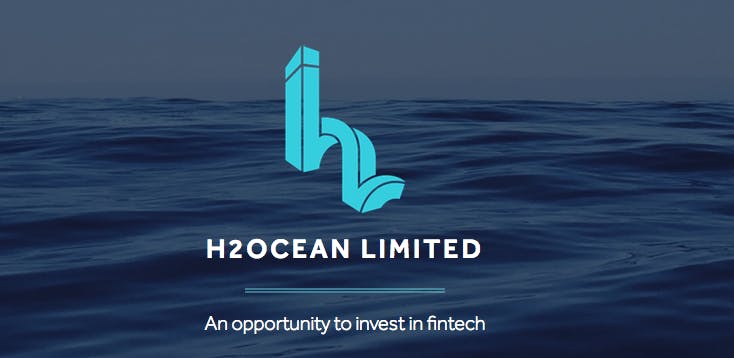
offer-news
H2Ocean Crowdfund
The first listed Fintech investment fund in Australia, H20cean, is crowdfunding through Equitise to assist its support of Fintech startups. The raise, which is aimed at attracting between $27 and $55 million, will also assist investors in diversifying their portfolios, as it provides a solid foundation for long-term investment opportunities. H2Ocean seeks to maximise the potential of Fintech investment, as Fintech companies commonly experience difficulty in proving viability and obtaining market traction. This is largely owing to a regulatory framework that justifiably values the consumer but can deter small startups owing to its complex nature. H2Ocean therefore provides the necessary expertise and services that must be at hand for any Fintech looking to navigate the complex waters of regulation, obtaining the approval that is the green light for any successful Fintech company. Equitise is excited to be hosting this raise for an innovative Trans-Tasman company that boasts a similar ethos and appeal as Equitise itself. Another essential element of the H2Ocean model that Equitise considers unique and valuable, is how the shareholder that invest in the Company at the IPO are invited to participate in the H2Ocean Private Syndicate. They will be offered opportunities for co-investment in companies that H2Ocean has invested in. These shareholders may from time to time be offered opportunities for co-investment in companies, that the Company or the Manager have invested in, which are raising money on the Equitise platform. As such, H2Ocean aims to provide capital growth along a mid-to-long term period, together with a diversified portfolio separate from the traditionally private Fintech sphere. H2Ocean’s prospectus is lodged with ASIC and the raise looks to close on October 11. H2Ocean hopes this will signal a changing landscape to Fintech potential in Australia. As one of the few Fintech companies supporting entrepreneurs who are behind the most innovating models and services in the country. Companies like H2Ocean shape the financial sector by providing the necessary platform for founders and entrepreneurs, who otherwise may not have the requisite resources to meet regulatory standards. Founding partners Ben and Toby Heap have over 30 years of expertise in the financial services industry. The prospectus denotes the trends of the global Fintech sphere, stating that 2016 is set to top investment totals of 2015 for global Fintech financing to VC-backed companies, at $US 19.6 billion worldwide. Australia and New Zealand have witnessed a 343% jump in Fintech investment from 2010 to 2015. View the offer in our deal room. As always, remember to seek independent financial advice.
September 6th 2016

success-stories
RIG raises $1.7 million through Equitise!
Equitise is delighted to announce that our raise for Retirement Income Group, New Zealand’s first and only licensed variable annuity provider, has closed at $1.7 million. The raise was 117% overfunded, soliciting an enormous amount of interest from both New Zealand and Australian investors. The incredible amount of interest no doubt owed to the inherent appeal of the opportunity, which allowed investors to tap into the financial services industry’s most significant market opportunity – the transition from saving for retirement to the generation of a sustainable income in retirement. RIG has already assembled a world class board and team, and the raise will permit the company to capitalise on its early success and expand the business further. We wish Ralph, Rhys and Casey all the best for the future of their product, the Lifetime Income Fund. We are proud to allow Kiwis a chance to participate in their future success. Check our website for other exciting new offers from the Equitise team!
September 6th 2016

offer-news
1Above: “The Global Leaders in Travel Well Being”
Equitise is happy to announce its forthcoming raise for 1Above – the global leaders in travel well being. 1Above has chosen Equitise as its equity crowdfunding platform in order to access an Australasian investment network to assist in positioning its global rollout. Roger Boyd founded 1Above in 2010, launching the company subsequent to years of research and development on the health impacts of flying. At the core of 1Above’s effectiveness and singularity is its essential ingredient, Pycnogenol, a natural bark extract with a clinical track record dating back 40 years of assisting in travel well-being. In targeting the underlying causes of jet lag and travel fatigue through its hydration, circulation and immunity support, the product has changed the game for travel medication and long helped travellers beat the effects of flying. Its customer success is mirrored in its exponential 124% (CAGR) growth since its launch, priming the company for a global expansion through wider distribution and innovation. 1Above has in its sights to be a $150m travel wellness brand. If you’d like to register for this transaction going private next week, please click on this link here - https://equitise.com/invest/comingsoon. As always, please consider your own financial circumstances before making an investment and if you are at all uncertain that anything on the Equitise platform fits into your investment criteria, please consult an authorised financial advisor.
September 3rd 2016

trends-and-insights
September News Roundup
It’s that time of the month again, where Equitise brings you the latest and greatest from the equity crowdfunding scene worldwide. As the year is swiftly rounding up itself, we examine how governments, platforms and individuals are shaping the industry to varying degrees of success. Today’s roundup features big news from international pockets of the Fintech scene, from Finland’s launch of new equity crowdfunding regulation to Nesta’s bold crowdfunding challenge, read on for more! Fintech in Finland Equity crowdfunding launched in Finland in 2012, with two successful portals operating since then, and enjoying one of the clearer and more liberal pieces of crowdfunding legislation in Europe. The Crowdfunding Act came into force on 1 September, with the Ministry of Finance stating the new legislation would ease investment-based crowdfunding regulation and clarify the rules of loan-based crowdfunding. As a result of the new law, Invesdor, Finland’s premier equity crowdfunding platform, stated that the crowdfunding volume should double within a year. With easier registration now available for incumbent platforms, and a framework that functions both nationally and internationally, the Finnish model will serve as a positive template for other European countries to emulate. Nesta’s Challenge Nesta, whose helpful industry surveys and insights have featured on this blog numerous times, has planned a Fintech challenge to boost UK competition and innovation. The competition, which asks Fintech startups to develop data-driven tools that assist with the selection process of financial services for small business, adds to the already advanced UL Fintech scene. Nesta stated that “When launched, the prize will build upon a rapidly evolving technological landscape in banking (i.e. the introduction of an Open Data and Banking APIs), as well as regulatory backing for comparison tools aimed at SMEs.” What’s the ECN? No, equity crowdfunding hasn’t established its own CNN, 24/7 news service. ECN, the European Crowdfunding Network, is an annual convention taking place in Paris, functioning as a meeting point for industry professionals and insiders. Seminars will be reviewing the industry’s current position in Europe’s alternative finance market, especially in light of the Brexit fallout and the rapid growth of blockchain. Given that the alternative finance market in Europe approached 7 billion in 2015, the ECN aims to encourage even stronger pan-European partnerships to assist in continued growth, with high-level stakeholders from all levels of the industry coming together. Charitable Crowdfunding We know already that the UK have a vibrant equity crowdfunding scene, accounting for 84% of Europe’s industry in 2015 alone. Now, the nation’s leading Fintech bodies are teaming together for a good cause. Nesta, Crowdfund UK, the Heritage Lottery Fund and Arts Council England have formed a new crowdfunding programme to channel £250,000 into the arts. The platform will dedicate a certain amount of its next crowdfunding projects to the arts and heritage crowdfunding projects around the UK, to be matched pound for pound by the government bodies. That’s all from this month’s crowdfunding update, stay tuned for all the latest industry insights.
August 24th 2016

trends-and-insights
The Fintech Fivesome: the Unlikely Alliance of Google, Amazon and more
In what appears to be the “Avengers” of the world’s largest tech companies, the most well-known names in tech have united to form a lobbying entity pitching Capitol Hill on Fintech and financial regulations. The origin story of this collective dates back to November 2015, and is reflective of the enormous power wielded by these companies separately and especially as a united front. Today, Equitise wants to alleviate the mystery surrounding the reasons behind this collective, and assess the regulation agendas of its members – what brings together the world’s biggest tech giants? The Backstory Apple, Google, Amazon, PayPal and Intuit have joined under the banner of ‘Financial Innovation Now’, setting aside the deeply entrenched and self-evident competition between one another for a common goal. They want to educate policy makers on their industry. The group has published a white paper, containing some striking advice for their Capitol Hill counterparts. It stated that the present overreach by regulatory bodies works as a hindrance to innovation and investment. The amount of time, money and resources required to match regulatory standards prevents startups or innovative companies from entering the fray. The input of some of these big names is thus somewhat surprising, given these barriers to innovation would be seen to benefit the status quo. The Reason For The Fintech Fivesome’s Regulatory Standpoint ‘Financial Innovation Now’ put forward the case in its white paper that the regulatory agencies were dysfunctional, with the Capitol Hill process ultimately disappointing the consumer who must bear the costs of compliance and poor service. Competition is not prospering in the market but, ironically, amongst the various agencies and bureaucracies who must pitch in to assist the compliance burdens. Although the companies do not vilify regulation as a whole, they do suggest the present framework lags behind the practical realities of being a tech company in 2016. What Does Their White Paper Say? They discuss two key topics: payments and lending as they relate to the Fintech industry. The vision of PayPal and similarly innovative payment companies is stymied by current legislation that prevents competition from alternative payment providers, despite widespread industry recognition that they are the way of the future. The legislation impacting these industries, however, stems from the pre-digital era, incapable of keeping apace with the enormous leaps made by the aforementioned companies, let alone the emerging ones into the market. The convenience and security that is offered by new payment methods is supported by consumers and the industry alike, yet these companies have not been able to truly capture the market owing to the barriers of compliance costs and the regulatory burdens in place. Going Forward Any user of Apple Pay or Google Wallet can attest that mobile payments are here to stay, mirrored by the fact they are already widely accepted. Both PayPal and Amazon now work as credit lenders, and while the likes of these companies are well-equipped to handle the necessary compliance costs to gain the lending status, startups, for the present, are not. When the rules are reviewed and 21st century legislation is enacted to boost emerging startups, we will truly be able to see the capabilities of the new technology. In the meantime, these tech giants merit praise for the endeavours to push innovation and call for regulatory change.
August 21st 2016

trends-and-insights
Why our Startup Culture is Good for NZ’s Economy
Innovation requires support from the industry, and New Zealand is fortunate to have produced several companies dedicated to supporting innovative companies regularly. Today, Equitise examines the positive impact of companies like the New Zealand Venture Investment Fund and Icehouse NZ on our startup economy. Conventional wisdom dictates that New Zealand has long been a country ‘punching above its weight’, this remains true in its continued commitment to supporting startups that proceed to have an international impact. How Does The Present Environment Support Startups? NZVIF manages a $300 million fund uniting Venture Capital and Angel partners to support NZ tech and innovative companies. Last year, the government extended its underwrite to NZVIF until 2018, although the NZVIF has not yet had to rely upon this 4100 million underwrite. The NZVIF has also voiced its desire to shift away from governmental support as it continues to function as a cornerstone investor in the early stage market, which has invested $147 million in early stage investment since 2002, breaking even or profiting from 21 percent of investments (standard for early-stage investment expectations). The NZVIF is also predominantly geared towards developing market activity, meeting international best practice in this regard and earning praise for doing so. Its support of the entrepreneurial ecosystem focuses not only in Auckland, but across the country, with the goal of establishing a healthy early-stage investment market after 25 years (it’s been 14 since its inception). Companies like NZVIF, dedicated to healthy entrepreneurship and supporting young companies, are vital. Why Are Startups Important For The New Zealand Economy? New Zealand has a positive image internationally as a vibrant startup scene, with many factors in place, like its status as the least corrupt country and advanced regulation. For these reasons we’ve witnessed recent injections from the big leagues of Silicon Valley royalty into our startup economy. Recently, Sequoia Capital held a $10 million funding round for 90 seconds, the video ad agency. Likewise Pay-Pal co-founder Peter Thiel, who has described the country as a utopia, placed major investments in Xero, which currently has a valuation of $2.1 billion. But how have startups been shown to assist economies? The University of Maryland in conjunction with the Federal Reserve and US Census Bureau performed a study that found “a small share of fast growing young firms disproportionately accounting for job creation and productivity growth”. Similarly, the Global Entrepreneurship Monitor found that startups contribute to the promotion of the research and innovation system and introduce values of proactivity into the society. Undoubtedly, it’s the quality of startups that is important, but innovation-driven enterprises exert significant economic benefits through job creation. In the US, MIT surveyed the geography of startups’ potential and how they impacted cities’ growth, finding that “a doubling of entrepreneurial quality predicts an increase of 6.8% in GDP 11 years in the future.” It’s possible startups are a symptom of a city’s growth, rather than a cause, nonetheless, the correlation is striking. Going Forward It’s not all about chasing startup unicorns – the elusive startups that obtain $1 billion valuation. Cultivating a healthy startup sector allows the founding of companies like Xero that transform our reputation and entail further investment from renowned entrepreneurs with large followings. As our entrepreneurs are able to catch the eyes of international investors, as well as support from local bodies like NZVIF and the IceHouse, we’ll maintain our healthy startup economy.
August 18th 2016

trends-and-insights
Tax Avoidance: A Snapshot of a Global Problem
The Panama Papers recently sparked Wikileaks-level of scandal, revealing the (not entirely unexpected) cached accounts of major corporations, and the legal partnerships assisting in their widespread and unaccountable tax avoidance. Financial systems in the UK, US and more have done little to cap this practice, which many view as socialism for the rich. Equitise today examines how tax avoidance became a global hot-button issue and how countries are tackling this issue, which elicits questions of social justice as well as financial reform, in differing manners. How Did We Get Here? Moody’s recently reported that the biggest US companies hold approximately $1.1 trillion in cash, with over two-thirds of this amount held overseas. Similarly, almost 400 LSE listed companies are registered in offshore territories, their market capitalisation of £225 billion outside the UK’s purview, not subject to tax. This year, Columbia University found that over $12 trillion has been siphoned out of emerging countries owing to the prevalence of offshore tax havens. $1.3 trillion from Russia alone remains offshore. The transparency offered by these studies and the details recently released by the Panama Papers do little to combat the inaction of government officials, as in the EU where calls to clamp down on tax avoidance have been vetoed. What Are The Impacts? LSE listed companies and tech giants like Google are not the only companies using offshore havens for gargantuan sums – criminals and kleptocrats count among those are able to money launder and protect their empires through the present, corrupt system. James Henry, former chief economist at consultancy McKinsey states that countries like Nigeria accept poor financial returns in exchange for the services, secrecy being more valuable than capital investment. Yet the impact of the increased transparency of the internationally practiced tax avoidance by major companies is being steadily felt – Iceland’s Prime Minister resigned in the wake of the Panama Papers scandal, with the polls suggesting the Party supporting major financial reform ill assume government in their snap election. “The opacity tax havens create is the enemy of good decision-making. If the City regulator and the London Stock Exchange really believe in effective markets, they would not list companies registered in such places” – Richard Murphy, International Political Economy Professor, City University London Prominent figures from the international political community are calling for reform, suggesting that proper tax regulation could assist in the austerity measures that have marked EU member states in recent years. Predecessor to David Cameron, called for countries to to ensure there are “no treasure islands for the money launderers”. How Are Countries Tackling The Issue Of Tax Avoidance? Henceforth, UK resident countries will have to disclose their owners on a public register, but this regulation will not apply to the existing 389 companies whose billions in market capitalisation remain offshore. The Treasury has recently demanded by country-by-country reporting “to stop businesses using gaps in international tax rules to get out of paying their fair share”. Twenty countries supported George Osborne’s international black list of tax havens, and spotlight has swivelled to the US to address their issue of tax avoidance, given America has been resisting reciprocal tax arrangements. ‘There is no doubt that the problem of global tax avoidance generally is a huge problem.’ - Barack Obama Obama has issued executive orders to close tax loopholes exploited in the US. He has acknowledged that the major issue with the tax avoidance scandal at present is that the activities of the major companies is legal – not illegal. It’s clear from the global state of affairs that conjoint international government action is necessary to reform the tax system that enables the mass tax avoidance systemic in corporate practice. Although governments have condemned and called for reform, more decisive action must be taken to establish a fairer financial system.
August 16th 2016

trends-and-insights
Equity Crowdfunding and Real Estate: A Match Made in Heaven
Equity crowdfunding has demonstrated its ability to impact any number of industries. From restaurant chains to rental car companies to the mobile banking sphere, its capacity to transform startups is well-documented, and we’ve examined some of the biggest crowdfunding raises of recent years on this blog. One of the industries on which equity crowdfunding has had the largest impact is real estate – transforming the possibilities of the industry in more ways than one. Today, we examine the marriage of the real estate and equity crowdfunding spheres, and how they will evolve in the rapidly changing economic landscape. “The real estate crowdfunding market is only a few years old, but it has taken off” – University of Pennsylvania The Context The real estate sphere has been as renowned for high yields as it has for a lack of innovation. But the mingling of equity crowdfunding in its domain has affected different levels, from sales, to deal-making, in order to ultimately improve the user experience. The investing appeal lies in the asset class seeming less risky than other early-stage investments but still offering risk-adjusted returns. The UK and the US have witnessed continued growth in the real estate crowdfunding domain. Previously, real estate investment was a private realm, with access limited to a personal network – no longer. The restrictive thresholds imposed by the pre-crowdfunding real estate industry excluded retail investors from the expansive market, and the inefficiency of this model has since been felt. In the US, the enacting of Title 2 of the JOBS Act, eliminating the restriction on general solicitation, enabled companies to publicly advertise offerings – it was no longer a matter of ‘who you know’, as a new domain of investors could access deals via mobile platforms. Even veterans from real estate adopted the platform, recognising the potentials of this different category of investor finally tapping into the industry. Allowing millions of investors access to real estate has disrupted the game, in the best sense of the over-used term. The transparency that has resulted benefits all, as investors have access to a much broader array of information and material, and investment decisions are more informed than before. Marketing deals to a wide section of the public makes access to capital far simpler for operators and real estate companies alike. “The advent of crowdfunding has definitively changed real estate investing in more ways than one and the effects have been largely positive.” - Forbes Magazine The Success Stories Crowdfunding real estate platforms have cropped up to unite a broad range of investors in this exciting industry. New Zealand has now seen its first real estate equity crowdfunding platform emerge in 2016, in Property Mogul. This followed a successful raise of £843,100 in 10 minutes by UK-based crowdfunding platform Property Partner, equaling £1311 a second. CrowdFund Insider claimed real estate crowdfunding may be “the hottest sector within the crowdfunding industry”. In New York, platforms like Money360, The Carlton Group, RealCrowd, and Patch of Land have all closed at least $3 million in funded rounds. The big class of potential investors who have long wanted to tap into this industry can finally have their say, and these results demonstrate how active they can be. Going Forward As ever, critics have said that the inclusion of different investment classes could potentially have negative results for smaller investors, who don’t have the buffer of higher net income to protect against the risks traditionally associated with real estate investment. But this does a disservice to the investment nous of smaller investors, as it does to the benefits of having better access to material and information from an open raise. The inclusion of real estate crowdfunding at present goes a long way to the projections of the crowdfunding industry to hit $3.5 billion in 2016.
August 12th 2016

for-companies
The Equitise Model – the Deal Room
Being a member of an innovative industry requires constant innovation of our own platform. For this reason, Equitise is consistently assessing its internal processes – how to be a better marketplace for investors and companies alike, and how to unite the two in a mutually beneficial way. We’ve created a deal room, where private wholesale transactions take place over initially private rounds, before later going public. This, in conjunction, with our syndicated investment model (which you can read more about on our blog), typifies the kind of innovation that Equitise values in its partners and clients. Our Model The efficiency of Equitise providing private wholesale transactions before eventually going public reflects the democratic nature of the industry. More than just a retail equity crowdfunding platform, we’ve partnered with the best financial backers in Australia and New Zealand to dominate the early stage investment ecosystem. We’ve appointed a Head of Syndicates, Blake Young, to oversee our partners, who include BlackCitrus, Tank Stream Ventures and Flying Kiwi Angels. “Crowdfunding platforms are starting to broaden their company focus beyond startups” - Claire Madden, Managing Partner at Connection Capital Private Deals Offering private deals on our platforms, which later go public, negates plenty of the misconceptions that naysayers held about equity crowdfunding at the outset. By first offering some deals to an exclusive network of investors, we provide the later-stage companies with the institutional guidance that they need. This also opens up the traditionally closed world of investing. International Viewpoint In the UK, a Financial Conduct Authority report into IPOs ignited debate surrounding the transparency of investment banks offering “mates rates” to preferred customers. This brings into reflection how retail investors and accredited investors are meant to operate together within the same financial sphere. The FCA stated that the market needs to be competitive, well-run and cost-effective. This sentiment was supported by Tom Hinton, of SyndicateRoom, who welcomed the debate. On the topic he has said: “The public markets are part of the lifeblood of the UK economy and making the process fairer and more accessible will enable investors to make confident investment decisions. The public is vital in improving liquidity for companies so providing a simple, clear and transparent way to access these offers, on the same terms as institutions is clearly beneficial. The often closed world of institutional investing is being opened up by alternative finance and this will play a key role in energising retail investment and finding new ways to connect the public with investments." Crowdfunding In NZ These measures that aid smaller investors receive their fair share of large deals assist in a healthy, competitive economy. New Zealand has led the way in crowdfunding regulation, with $12.4 million raised in its first year. Equitise wants to ensure the NZ crowdfunding sphere continues to engage all active investor types and remain competitive – our process of offering private wholesale transactions that go public is one means of ensuring this.
August 8th 2016

trends-and-insights
Fintech and the Future of Investing
2016 has seen political pundits assess the future of their landscape in the face of seismic changes – it’s time for the financial sector to examine itself too. The pace of innovation across the Fintech sphere, amounting to $13.7 billion invested in 2015, has reached new heights. It’s conventional wisdom that Fintech companies prize innovation, transform business practice and affect national regulations. But how substantial is the future of Fintech investment? Equitise weighs in on how the Fintech sphere is set to shape traditional finance in 2016 and beyond. The Figures 2015 produced figures that negate the recent scepticism surrounding the so-called Fintech “bubble”. From 2011 to 2015, global investment in Fintech companies grew from $2.4 billion to over $19 billion. North America saw $10 billion lent by Fintech companies in 2014, which may not reach levels set by traditional lending, but is nonetheless significant. Decline of consumer confidence in traditional lenders matched with 3x growth in Fintech venture investment since 2014 means the Fintech sphere is gradually shaping financial services and more. The Bank of New York Mellon issued an e-book entitled “The Future is Fintech”, in which it stated “Without a doubt, the “era of Fintech” is upon us and banks can’t merely be mindful of this; they must also have a clear plan in place in order to adapt to and benefit from Fintech-fuelled changes.” Innovation is the keyword, exemplified in the disruptive products Fintech companies put forward – such as the first mobile bank, Mondo, also the world’s fastest crowdfund raise ($1 million in 96 seconds); trading marketplace eToro; peer-to-peer transfer service TransferWise. In the age of transparent finance, digital services that appease the crowd drive innovation and equal the 30 or more ‘unicorns’ (Fintech startups that have been valued at $1 billion or higher) the industry has recently celebrated. “The new Fintech technology startups are now mostly selling their solutions directly to consumers and businesses instead of selling to the traditional FI channel.” - Bruce Wallace, CEO of Silicon Valley Bank Why is Fintech the Future? The Financial Times has recently announced its “Future of Fintech” awards, indicating the groundswell of good faith around the disruptive industry, matched by worldwide regulation encouraging innovative startups. Whether it’s the evolution of equity crowdfunding legislation or the UK’s ‘startup sandbox’ in which the FCA allows them to thrive, innovative legislation demonstrates governmental awareness of the capabilities of Fintech. Equally, leaders from traditional finance, such as former Barclays CEO Antony Jenkins, have launched Fintech startups as they weld their knowledge into the alternative finance sphere. “Change will come from a combination of new entrants and traditional players who have the necessary funds to make a difference” – Jeff Schumacher, CEO at BCG Digital Ventures Going Forward Emerging Fintech companies are capturing an increasingly large portion of the multi-trillion dollar global financial services industry. While the cycle of Fintech companies is in an early-stage, the pace of regulation and investment from an array of investor types demonstrates the faith in, and changing landscape for, the future of investment. As the Trans-Tasman's leading equity crowdfunding platform, Equitise is proud to be at the forefront of the Fintech scene in the Southern Hemisphere. Our platform encourages innovation, as seen in our syndicated investment scheme, as well as our consultation to the Australian government on crowdfunding legislation. Like any Fintech company, we embrace the exciting potential and swift evolution of the industry.
August 5th 2016

trends-and-insights
August News Roundup
It’s important for Equitise, as the Trans-Tasman crowdfunding platform, to keep abreast of the latest international developments in the equity crowdfunding realm. The industry boom of 2016 means there has been no shortage of headlines covering equity crowdfunding news, and we’ve curated the main ones from the last month for your reading pleasure. From government panels on crowdfunding to another crowdfunding exit, read on to discover the most important industry news. Big Brother knows best: government panels on Fintech From Sweden to Singapore, governments are appointing panels to analyse the status of the Fintech industry in their respective countries. The Swedish Commission for investigating the equity crowdfunding industry was announced by by Finance Minister Per Bolund as essential to finding innovative solutions to fund emerging companies. In Singapore, the Monetary Authority of Singapore has developed a panel to monitor global Fintech developments. A broad array of leaders from within the Fintech industry have combined to engage in panel discussions, under their moniker of the International Technology Advisory Panel. Another Crowdfunded Exit As successful exits become a recurring trend for crowdfunding companies, OurCrowd has just announced its seventh successful exit. Cyber-security company Fireblade was acquired by Stackpath for around $20 million, in exciting news for the Tel Aviv based firm. To assist in the number of exits OurCrowd is witnessing, they have created the position of Chief Exit Officer, which is a first for the crowdfunding industry. This is evidence of the possibilities of liquidity for investors with skin in the crowdfunding game. Crowdfunding Regulation update – the state of play in Taiwan As New Zealand represents something of a model for liberal crowdfunding regulation, it’s always interesting to see how other countries model their own legislation. Taiwan, which has three operational equity crowdfunding platforms, amended its regulations in January this year. The amendments affected three key operational areas – the annual fundraising amount, the type of security and the limitation of advertisement. Their annual fundraising amount has doubled, the securities offered are no longer limited to the company’s common stock (allowing preferred stock without debt) and platforms may now advertise to promote companies conducting raises on their platforms. Beauhurst Report – key takeaways Industry watchdog Beauhurst has unveiled its latest report on the equity crowdfunding market, surveying the impact of the Brexit on the alternative finance industry. Although it notes that the UK’s EU split may affect its status as a beneficiary of the European Investment Fund’s £2.3 billion which is dedicated to SMEs, it noted that the deal size in the last 6 months has increased. Notably, Scotland experienced a 220% increase in growth owing to large deals, although deals in London dropped by 28%. VC and PE was the number one active investor type with equity crowdfunding coming in second. For H1 2016, our friends at Seedrs were ranked the number one in the UK for funded deals – the company has funded 380 deals since 2012. As ever, the report offers valuable and up-to-date insights into the industry. That’s all for this month’s news roundup, be sure to check in every few days for the state-of-play from the equity crowdfunding industry.
August 2nd 2016

trends-and-insights
The Trans-Tasman Relationship of VCs and Equity Crowdfunding
The previous blogpost from Equitise addressed the state-of-play of equity crowdfunding and VCs in the UK. Today, we’re taking a closer look at how VCs work alongside the equity crowdfunding industry across Australia and New Zealand. If you haven’t already read Equitise’s coverage on how Syndicated Investment operates, do so first! Today’s update addresses how the two industries are consolidating in 2016. The Challenge At its core, equity crowdfunding represents a challenge to traditional means of finance, and has been described as “disruptive” finance. Recent figures found that 75% of startups funded by venture capital alone failed, suggesting that consolidation between equity crowdfunding and VC firms may assist the latter. Generally, VCs and crowdfunding platforms target companies at different stages – the later-stage companies with a lower risk and high-value investment for the former, and seed-stage and startup companies for the latter. However, crowdfunding is no longer limited to targeting startup companies, and is increasingly used to supplement funds provided by angels and VC firms. This helps to validate the market for the company that VCs are targeting. Recently, the Kiwi drug development company Breathe Easy raised raised over $1 million through a combination of VC and crowdfunded sources. “Syndication [or Participation] refers to the type of funding relationship between the funded and its funders, including the relationship between multiple funders. Crowdfunding, by contrast, is a method of finding funders, who are generally unknown or outside of one’s personal network.” (Jor Law, VerifyInvestor.com) Working Relationship Crowdfund Insider effectively encapsulated the working relationship of syndicated investment and equity crowdfunding in its recent post “Syndication is the What, Crowdfunding is the How”. It offers a clear definition of the kind of syndicated investment model, already offered by Equitise (remember to read our blogposts on Syndicated Investment). Generally speaking, as VCs are not attracted to early-stage companies, syndicated investment exposes them to a new array of companies. As Australian venture capital firms are experiencing record growth, announcing $900 million in new funds since August, tripling their 2015 raising, there is a large mass of capital potentially available for syndicated investment. 2016 research found that 30% of VC funding in Australia is targeted towards the Fintech industry. Now, syndicated investment will help companies close the capital gap by bringing VC and crowdfunded funds together. “The lines between the concept of syndication and crowdfunding have always been blurred”, Amy Wan, Crowdfund Insider The liberal equity crowdfunding regulations in New Zealand and positive climate for the industry here has produced many benefits. A key emerging benefit is the promotion of syndicated investment – bringing together diverse investor types to reflect the democratic ethos of platforms and diversify portfolios. Equitise’s recent offerings 1Above and RIG are brilliant examples of this – high growth, seed-stage companies looking to close the gap in capital through a broad array of investors. Likewise, Venture Capital companies in Australia, like Fat Hen, have been crowdfunded, and in turn VC firms are contributing to crowdfunding campaigns. It’s an exciting period for the industry and Equitise is hopeful about the future collaborations between VCs and the equity crowdfunding industry.
July 30th 2016

trends-and-insights
How do VCs Work Alongside the Rapid Growth of Equity Crowdfunding Platforms?
The expansion of equity crowdfunding platforms across Europe and the US requires constant tracking, unsurprising as the industry raised over $30 billion worldwide last year, with the sector growing 84% from 2014 in the UK alone. As a result, the manner in which equity crowdfunding works alongside traditional modes of investment has had to adapt. Today, Equitise examines the role of VCs as they continue to work alongside the equity crowdfunding industry in the UK. ECF “crowding out” other modes of investment A recent study published by the University of St Andrews and the University of Stirling found that equity crowdfunding is “crowding out” the likes of Venture Capital firms, banks and angel investors in the UK. It suggests that the equity crowdfunding industry now represents a £146 million economy, which is largely attributes to the enormous success of Crowdcube (who have just opened a licensed office in Spain), though this would serve to under-appreciate the enormous raises of Seedrs and SyndicateRoom. The document classifies the UK equity crowdfunding market as the fastest-growing one worldwide, a reflection of the fact that 69% of British entrepreneurs surveyed singled out its success as owing to the lack of alternative available. These participants found that equity crowdfunding platforms “offered relatively favourable valuations of their companies, in contrast to business angels, who tend to be tougher on price.” “While some organisations have labeled crowdfunding ‘alternative’ finance, our work suggests that ‘disruptive’ finance would be a more appropriate term.” Ross Brown of the Centre for Responsible Banking & Finance at the University of St Andrews Going Forward In a recent post by industry watchdog Crowdfund Insider, Ron Miller posited whether equity crowdfunding and Venture Capital were able to coexist. It suggests that the initial misgivings held by some venture capital firms at the inception of the equity crowdfunding industry must be set aside given its nascent success worldwide, which is tantamount to proof that the broad shareholder base is a benefit rather than a hindrance. Miller concludes that the democratic nature of crowdfunding largely benefits VCs, as they can tap into the feedback offered by retail investors and view which companies are gaining traction. As 75% of startups funded by venture capital fail, this proves timely for the industry, and consolidation between the two sectors can be mutually beneficial. The level of feedback offered and the validation that can be weighed by VC firms is valuable – hence why companies that have crowdfunded by Kickstarter and Indiegogo have proceeded to be funded by venture capital firms. The combination of the VC skill set and industry expertise combined with the array of ambitious companies accessible from an equity crowdfunding platform is an exciting one. This marriage of industries in the interest of mutual benefits has been seen in the UK, states Laith Khalaf, senior analyst at Hargreaves Lansdown. Mr Khalaf claimed that High quality global journalism requires investment. “There is overlap in the kind of companies sought out by venture capital and crowdfunders, while at the same time there is a limited amount of retail money which will be invested in this sort of company, which lends weight to the idea that there may be some consolidation.” Equity crowdfunding should no longer be viewed as the “alternative” industry though – figures released by Massolution state the industry in 2015 represented $34bn in comparison to the $30bn venture capital industry. As the World Bank states that equity crowdfunding industry could approach a $90bn by 2020, partnerships like that between VC firms and crowdfunding platforms will become more frequent and necessary.
July 25th 2016
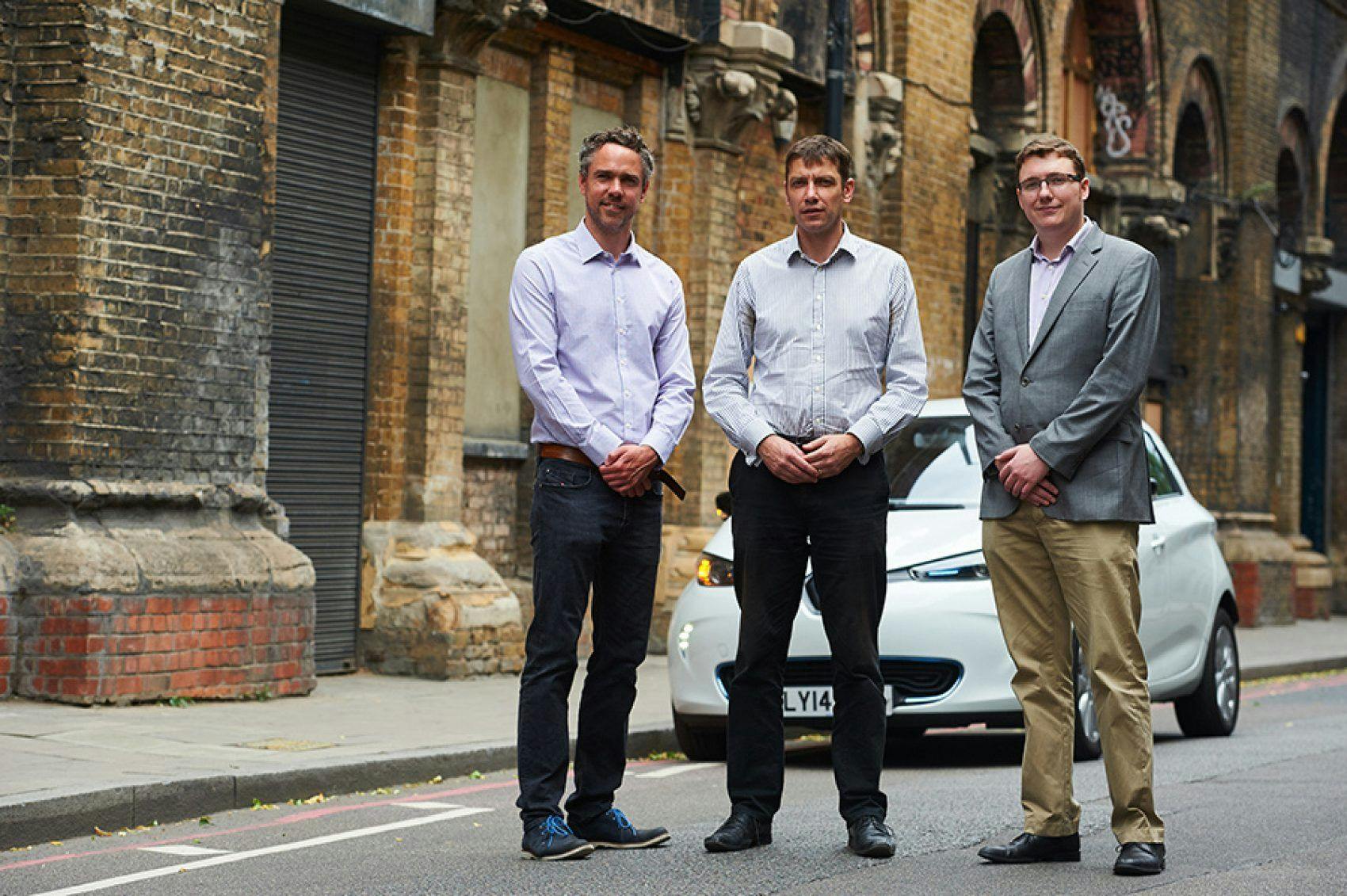
success-stories
Largest Crowdfunded Companies: Where are They Now?
Crowdfunding success stories continue to feature in headlines worldwide, as UK and US regulations have eased to attract wider and broader investment in high growth companies. The AltFi Data Report released at the end of 2015 offered valuable industry insights, assessing the status of UK companies who raised finance using equity crowdfunding. It concluded 80% of companies funded between 2011 and 2013 were still trading, as the size of crowdfunding campaigns continued to increase in 2015. This drove Equitise to reassess some of the largest crowdfunding campaigns – we take at some of the industry’s success stories and pose the question, where are they now? E Car Club Founded in 2011, the company generated £311,000 in working capital from a closed seed investment round via Crowdcube in 2013. This boosted the company to form partnerships with Renault and Nissan, and in July last year, they were acquired by Europcar as the world’s first successful crowdfunding exit. Since, E Car Club have teamed with Pentland Road Windfarm, who power certain fleets, making them the greenest car-sharing option worldwide. New partners include social housing providers and universities, who were attracted by E-Car’s low cost, environmentally friendly engineering to launch schemes across the UK. E Car Club’s founder, Andrew Wordsworth, MD of Sustainable Ventures Development Partners, likewise funded Powervault, a domestic electricity storage device, on Crowdcube. Righteous Salad Dressings Entrepreneurs such as Andrew Wordsworth, who value crowdfunding as a favoured means of raising finance, are numerous – take Gem Misa. Crowdfunding two businesses, Righteous and Cauli Rice, via Crowdcube, with the former valued at £3.5 million recently, Misa has validated her decision to raise funds from the crowd. Denied her initial request of a bank loan, she instead raised £75,000 back in 2012 for the first Righteous campaign, raising an additional £150,000 to take it international. Another Crowdcube success story, an evidence of the possibilities of alternative finance in lieu of traditional loan-based funding. Monzo £1 million in 96 seconds. The fastest crowdfund ever was brilliant self-marketing for the smartphone banking company, launching a thousand think pieces as well as awareness for neobanks everywhere. Subsequently, the bank, despite having neither a banking licence nor a public launch, was valued at £30 million. 20,000 people are now using the app worldwide, as their campaign of ethical banking and ease takes off, accessible in 132 countries – with the most transactions, 900,000, taking place in the UK. An Android app is on its way as Monzo seeks to dominate the online-banking industry. Sugru Sugru, the high-tech, multi-purpose glue that can be moulded for any use, raised 3 times its initial £1m goal last year on Crowdcube. Backers from 64 countries numbering over 2600 overfunded by 350% to send the East London manufacturer into overdrive, shipping five million packs worldwide since. Last month, the company announced its intentions to crowdfund in the US – an incredibly popular market for the fix-all product, where 50% of its revenue is gained. With sales of £5 m forecast and a 50% to 100% growth projected in the next three years, the putty’s crowdfunding round to take place later this year will be one of the hottest crowdfunding raises in 2016. The epilogues to these crowdfunding success stories demonstrate the varied means entrepreneurs use to capitalise on their initial crowdfunding victories. Some focus on expansion while others look to use the platforms quickly after, given their positive experiences. What’s consistent between the companies is the sense of innovation and appeal to a public interest that generates mass attention, and demonstrates the enormous power of funding from the crowd.
July 20th 2016

trends-and-insights
Crowdfunding Regulation Worldwide: A Snapshot
2016 has seen startling headlines on an almost daily basis, and in the midst of a politically and financially hectic year, it’s easy to lose sight of the news that matters – crowdfunding updates. Crowdfunding regulation continues to evolve this year, as governments adapt to the burgeoning crowdfunding sector, and engage with different bodies to reach a more liberal, modern vision of the equity crowdfunding landscape. Equitise is here to bring you the latest snapshot of the global community’s approach to crowdfunding, and how this regulation is affecting crowdfunding platforms worldwide. Crowdfunding regulation in the US: The US has been busy this year with its reality TV show of an election, but significant strides have nonetheless been made in crowdfunding regulation. After initial reluctance from the SEC (Securities and Exchange Commission) to get on board with opening up investment beyond accredited investors, the introduction of crowdfunding finally took place in May of this year. Already, rewards-based crowdfunding platform has announced its plans to expand as a major player into the equity crowdfunding game also. Similarly, up on Capitol Hill, measures are taken place to expand the legislation some currently see as limited. The Vice-Chairman of the House financial services committee, Patrick McHenry, has put forward a bill that would increase the $1m cap in the original legislation to $5m. Already though, the filing requirements of crowdfunding platforms are less demanding than those of security issuers, and entrepreneurs may conduct an an equity offering of up to US$1 million within a 12-month period through an intermediary, without filing a registration statement to the SEC. Only SEC approved portals may be used by entrepreneurs and investment alike, but as the marketplace becomes more diversified and larger, the consumer will be able to select the platform that best meets their needs. The UK: Similar to its friends across the Atlantic, the UK’s ever-shifting political landscape has affected the alternative finance market, but still seen some change in regulation specifically for equity crowdfunding too. After this year’s Beauhurst report marked equity crowdfunding as the most active investor type in UK high-growth company funding, the government has taken active measures to bring the industry from the fringes into the mainstream. Given the UK represents 75% of all crowdfunding activity across Europe, with alternative finance having increased by 84% (£1.74 billion) last year, it’s unsurprising their regulatory framework is more advanced than their (presently) EU counterparts. In the absence of an umbrella approach to equity crowdfunding regulation across the EU, with member states favouring national regulation at present, the UK is free to amend the legislation put in place in 2014. The periodic review by the FCA (Financial Conducts Authority) is currently occurring, with P2P platforms of all shapes and sizes providing feedback to the FCA to assist in improving the regulatory environment surrounding debt and investment-based crowdfunding. Interestingly, those instruments traded within investment-based crowdfunding are defined by the FCA as “non-readily realisable securities” aka, they’re not listed on stock markets, and instead sold online. This definition was captured by extant FCA regulation, so the addition of new rules by the FCA are more centred around consumer protection – how crowdfunding platforms can market and make offers to clients. Australia: Equitise has covered the rocky, controversial path to equity crowdfunding legislation in Australia previously on this blog, as the country has been unfortunately slow-moving in its attempts to regulate the market. A report, issued by the Corporations and Market Advisory Committee, focused on the crowd sourced equity funding market, encouraged legislators to amend the environment by drawing on influence from international models. It suggests a new regime similar to the UK, US and NZ should be adopted. The framework for companies to raise up to $5 million via crowdfunding per year is encouraging, but the government needs to take industry debate on board to ensure it has competitive, relevant legislation in place. New Zealand: There’s the old adage that being born in New Zealand is like winning the lottery of life – but does this extend to the equity crowdfunding scene? The answer is – to some extent. When, in 2014, our liberal crowdfunding regulation led the world in its policy, with little in the way of existing regulation or platform advice to govern it, there was some concern about how it would play out. Consequently, international regulation has followed the NZ example, over $25 million has been raised across platforms and both institutional and cross-platform investment has taken place. Nonetheless, as the UK and US continue to debate the merits of raising the cap beyond initial limits, so too should New Zealand. This hasn’t yet occurred, and the $2m cap requires revisions so as to keep apace with regulation worldwide. Companies looking to raise $2-10 million are not satisfied by the present limits, and in the interests of regulation that serves the broadest number of entrepreneurs and investors alike, this should be reassessed. Alternative finance is a burgeoning industry, and, as our monthly news roundups suggests, one which has no shortage of challenges and evolutions. This summary offers a small insight into the shifting landscape of crowdfunding regulation, where governments worldwide are increasingly listening to the crowdfunding industry to discuss the likes of investor caps and consumer protection to ensure entrepreneurs and investors are both protected. Check in with Equitise as your port of call for further exciting changes from the crowdfunding industry.
July 15th 2016
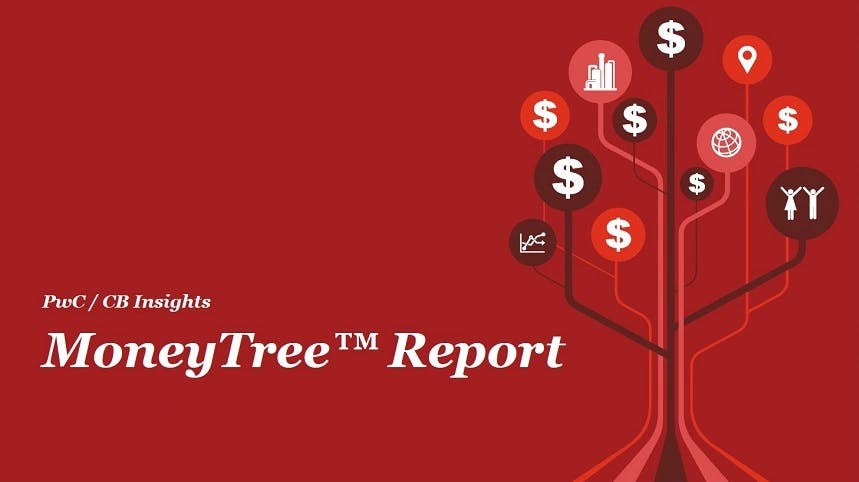
trends-and-insights
The MoneyTree Report: Insights into the Startup Sphere
As a collaboration between two powerhouses, PWC and the National Venture Capital Association, the MoneyTree Report is one of the most anticipated studies on capital investment. Released quarterly, this summary of the US state of affairs, based on data from Thomson Reuters, paints a definitive picture on the sphere emerging companies operate within. The most recent report is no exception, offering interesting insights into the startup ecosystem. What’s the good news? “The venture ecosystem surpassed the $10 billion mark for the fifth consecutive quarter, setting the stage for what we expect to be another busy year for startup investing” Bobby Franklin, President and CEO of the National Venture Capital Association NVCA. In 2016 so far, according to the report, we’ve seen the highest first quarter for dollars invested since 2000. As testified by the NVCA CEO above, the report found positive trends for the startup sphere, and isolated Software as the industry receiving the highest amount of funding of all. This was then followed by Biotechnology, and the Industrial/Energy Industries. Additionally, internet-specific companies saw a 4 per cent increase of investment dollars, which is small but significant. What stages of development saw increased investment? The report also tracks investment trends across the spectrum of development, looking at where investors are directing their funds. For example, there was a 50% rise in investments in later-stage companies, hitting $4.2 billion going into 207 deals, and accounting for 20% of total deal volume, up from the prior quarter. Topping this, however, was the soaring of expansion stage investment, up 112% in dollars, at $8.5 billion. What other developments have taken place? In another interesting increase for startup dollars, the top 10 deals this quarter accounted for 39% of total dollars invested. This is owing to the impressive fact there were three deals valued at one billion dollars or more. To put this in comparison with previous years, 2015 saw a total of three deals, and 2014 had only two deals at one billion dollars or greater. “We continue to see things we have never seen before, including megadeals, investments of $100 million or more” – Bobby Franklin Overall, with a 20% increase in total venture dollars deployed to startup companies during the quarter, there was healthy investment in startup companies. The reports findings of what industries are continuing to attract the healthiest investment, as well as which stage captures more venture capital, provides prudent insight into investment activity. Expansive crowdfunding regulation is necessary to ensure the industry is able to keep apace with the large sums, including the megadeals mentioned by NVCA CEO Bobby Franklin, are able to be captured by crowdfunding platforms. With such a healthy ecosystem in place for startup companies, this is good timing for the crowdfunding industry to strike.
July 10th 2016

trends-and-insights
July's Crowdfunding News Roundup
It’s an exciting time to be alive in the world of equity crowdfunding, as regulation worldwide seeks to expand its possibilities, and as companies achieve new goals through their platforms. From platforms advising governments, to the world’s first crowdfunding exit, we’re here to bring you the biggest headlines from the crowdfunding market. Plans to defy Brexit woes via crowdfunding In order to circumvent the gloomy UK market resulting from their shock decision to leave the EU, Crowdcube have been doubling down on the positive windfall from this for the alternative finance market. In their recent blogpost, the UK platform announced plans to launch a £5 million self-funding round, inviting the UK public to register for early access for their latest round of funding. Crowdcube are raising under a prospectus, which is a first for them, allowing them to surpass the current £5 million limit of funding from the crowd. US Government taking advice from UK on crowdfunding regulation In a move that should please crowdfunding platforms in the UK, the Financial Conducts Authority (FCA) is accepting input on rules regarding the regulatory environment surrounding debt and investment-based crowdfunding. The body periodically reviews the rules, that were implemented in 2014. This call for feedback from interested bodies was welcomed by Kevin Caley, CEO of P2P lender ThinCats, as “important [in giving] people clear benchmarks and guidance from which to make financial decisions…while debunking some of the common misunderstandings around the industry.” Crowdcube expands to Spain Crowdcube has received approval from the regulatory body of the Spanish stock market to launch its Crowdcube Spain. As the first Spanish platform to receive this validation from the body, Crowdcube has a unique advantage, and this is a tactical win for Crowdcube following the recent anxiety surrounding UK financial bodies in Europe. From one kind of crowdfunding to another In an exciting move for the wildly popular crowdfunding platform, Indiegogo is looking to take the plunge into the equity crowdfunding domain later this year, as it attempts to convert its loyal customers to an altogether new crowdfunding service. Indiegogo will be taking advantage of Title III of the Jumpstart our Business Startups (JOBS) Act in the US, which made equity crowdfunding accessible to the public in May. Subsequent to the JOBS Act, US startups will be able to raise up to $1 million from small-time investors. This represents a noteworthy move from the company, who previously only offered ‘perks’ or other services for customers who offered sums to startup companies. Indiegogo has already functioned as a platform for 7 million backers, and will provide a jolt to equity crowdfunding activity in the US, which has seen about three-dozen companies use the regulated platforms since May. The world’s first crowdfunding exit? E-Car Club has made headlines as the world’s first successful crowdfunding exit. The electric car business’ crowdfunding campaign launched in October 2012, and has subsequently been acquired by Europcar, offering investors significant returns on their investment. E-Car Club has been a brilliant example of how to grow a brilliant idea from concept to angel investment to the sale of a majority stake to a major multinational corporation. That’s the latest roundup of the biggest crowdfunding headlines, stay tuned for more news from the wonderful world of crowdfunding.
July 7th 2016

trends-and-insights
Brexit and Alternative Finance
Last month, the unpredictable outcome of Britain’s EU referendum was felt, throwing the country’s political, financial and social systems into disarray, as the pound plummeted to a 31-year low. The unforeseen victory of the Leave campaign has led to anti-Britain sentiment across the EU, which added to the political volatility already extant in the country, as the frontrunners of the Leave and Remain campaigns resigned in haste. But how does this new era for the EU and the British economy affect the alternative finance market? Equitise is here to run you through the short and long-term impact on the markets of Britain’s decision to leave the EU. The Fallout The headlines swirling last week read were staggering, reflecting the skepticism from the global community on Britain’s ability to retain its trading might outside of the single market, and its absence of a tangible post-Brexit financial plan. The stock markets fell, the Reserve Bank announced cuts to the interest rate, and major financial offices voiced the possibility of outsourcing industry. Already, industry commentators have been speculating as to which European capital will be poised to take over London’s status as the financial hub. Many lenders announced cuts on fixed-rate mortgages, with the lowest ever deal being 2.39%. Everyone from the property market to Richard Branson (whose Virgin shares dropped by a third following the referendum) were hit by the volatility of the Brexit outcome. The OECD issued warnings about the UK’s ability to create new jobs going forward, as postings several hundred thousand job postings were removed over the course of a week. New reports suggest approximately £5bn of commercial property may be sold as the turmoil has forced managers to revalue portfolios. The Consequences for Alternative Finance The borderless nature of equity crowdfunding is an advantage here - commentators from inside and out the Fintech industry have speculated that this could be a moment of opportunity for alternative capital providers. Traditionally, alternative providers function where banks do not - as they are not bolstered by deposits or short term wholesale funding tools. Similarly, the downgrading in credit ratings that has occurred does not affect alternative finance lenders in the same way - for securing short term finance, the increased demand from businesses at this time can be met via the alternative finance market. Likewise, the regulatory impacts of the UK’s departure from the EU have similar repercussions, as it remains to be seen how easily UK-regulated financial bodies will be able to invest and raise from EU members. As alternative finance lenders operate without the constraints of regulation, or with less regulation, than traditional financial institutions, whose current situation is mired in uncertainty, these bodies will not be spending as much time and money assessing the new regulations imposed on them when this occurs. This fosters opportunities for alternative finance as other lenders are more perturbed by political interference. While the markets contract, as they did following the GFC in 2008, which similarly saw an upshot for the alternative finance industry and has fostered it into its position today, small businesses may still be boosted by alternative lenders. Naysayers will suggest that a lack of liquidity and the recalcitrance of investors given the current scene of economic volatility will result in less P2P lending. However, as valuations plummet, this may bring investors back into the market with the prospect of possible returns being more gainful. Likewise, in the absence of EU regulations relating to state aid, the UK government going forward may be willing to proffer more tax-breaks, and protection of SEIS and EIS will be more straightforward. Going Forward The uncertainty clouding the market following the UK’s shock decision has mired many lenders in a volatile situation. Nonetheless, the above regulatory and financial impacts of the Brexit on the alternative finance industry means that, for these platforms, it’s not all doom and gloom. As one of the most culturally, politically and financially seismic events to occur in our generation, the UK’s decision to leave the European Union will have far-reaching consequences across every sector.
July 4th 2016

trends-and-insights
From Tech Sector to Digital Nation
The New Zealand Technology Industry Association (NZTech) recently released its report on the impact of technology on the country’s economy. Titled ‘From Tech Sector to Digital Nation’, NZTech touched on how the 300 tech organisations they represent are shaping and enriching New Zealand’s economy. Here are our highlights. Key Details New Zealand’s technology industry comprises nearly 29,000 firms, collectively employing almost 100,000 people – or 5% of the workforce - with a further 20,000 tech jobs in other sectors. It’s now the economy’s third largest export sector, contributing $6.3 billion of goods and services, equating to 9% of all exports. In total, it makes up 8% of New Zealand’s gross domestic product (GDP), contributing just over $16 billion. "We are a highly skilled nation, we have an international reputation as innovators, and our small but rapidly growing digital technologies sector shows that we can disrupt and compete in the global digital market." - David Smol, Chief Executive, Ministry of Business, Innovation and Employment Jobs The New Zealand Institute of Economic Research is predicting that a staggering 46% of kiwi jobs will be automated within the next 20 years. However, the report warns against assuming half of all workers will be unemployed. A number of auxiliary jobs will be created to support the new, automated roles. The report states that each new tech job creates 5 new service jobs around it. NZTech gives the example of ATMs, which threatened the jobs of bank tellers when they were rolled out in the 90s. Rather than reducing the number of bank teller jobs, they allowed branches to be operated at a lower cost and prompted banks to open more branches. Consequently, the number of bank teller jobs rose faster than the entire labour force in the period from 2000. "There is no doubt that we are all seeing and feeling the ever growing importance and impact of digital technologies in the lives of New Zealanders." - Barrie Sheers, Chief Executive, Microsoft New Zealand. NZTech’s report also delved into the topic of salaries. In New Zealand, 2015’s median annual income before taxes was $45,864. A report released in January this year states that the tech sector’s median annual income before taxes was nearly $40,000 higher at $82,000 last year. The employees in the tech sector tended to be more highly qualified than average, and even less educated tech workers were paid well above national average. Exports Since 1990, New Zealand exports from the high tech manufacturing sector have grown from $100 million to $4.4 billion, and exports from the ICT sector have grown to $1.9 billion. "Our stable political and regulatory environments, along with our extensive investment in digital infrastructure, make us one of the best places in the world to do business and develop new technologies." - David Smol, Chief Executive, Ministry of Business, Innovation and Employment The trouble with measuring exports is that a significant amount of tech activity is being routed through offshore subsidiaries of kiwi tech companies. It’s nothing to do with shady tax havens; companies establish offshore entities to be closer to their markets and customers, and for regulatory reasons. Tech export figures are understated because the sales of these goods and services are not captured in exports, and the money is often not repatriated. All in all, NZTech’s report paints a positive story about the NZ tech industry. The sector is experiencing solid growth, contributing a considerable chunk of exports and providing a healthy stream of well-payer jobs. That’s it from us, stay tuned for more updates on this exciting sector.
July 1st 2016

for-companies
Tax Incentives for Startups - Part 1: Overview
Today is the start of the new financial year, and investing in Australian startups is now more tax efficient. The latest limb of the Government’s National Innovation and Science Agenda (NISA) is now in effect. This new tax scheme – the Tax Laws Amendment (Tax Incentives for Innovation) Bill 2016 – is designed to drive a more innovative, entrepreneurial culture in Australia. Over a series of blog posts we’ll run through the tax changes and how they affect you. In this first post, we’ll give an overview of the headline changes to existing legislation. We’ll follow this post with two more in the series on the impacts and details of the changes as they affect the key stakeholders. Our second post will focus on startups and our third post will focus on investors. For this overview, we’ll keep to the key points. In the following posts we’ll expand on these key points in simple terms and include some case studies to illustrate how the new changes work. For Startups Startup founders in Australia face a funding gap between pre-concept financing (through self-funding, family, friends and Government grants) and financing through venture capital at a later stage of their development. The objective of the new tax changes is to incentivise private investors to bridge this funding gap through beneficial tax treatment for equity investments. For founders, it’s crucial that new investors can access these tax incentives, and the key to this is ensuring the startup is classified as an Early Stage Innovation Company (ESIC). What Is An ESIC? To be an ESIC under the new rules, companies must be classed as both ‘Early Stage’ and ‘Innovative’. It’s much easier to identify whether or not a company as early in its development than it is to determine whether a company is developing innovative products, services or processes. To reflect this distinction, the ‘Early Stage’ test regime is objective whereas the ‘Innovation’ test regime is more flexible, with dual objective and subjective pathways. Early Stage companies are classified through an objective, four-part testing regime: 1. Incorporation or Registration of the business in the last three years 2. Total Expenses reported by the company must be < $1.0m for the previous income years 3. Total Income reported by the company must be < $200k for the previous income year 4. Not listed on any stock exchange in Australia or overseas Innovation is measured through a dual process whereby startups must satisfy either a principle-based (subjective) regime or an activity-based (objective) regime: 1. Subjective Regime – the following principles must be demonstrated: • New or significantly improved good, service or process • Commercialisation • High growth potential • Scalability • Broader than local market capability • Competitive advantages 2. Objective Regime - the following activities count toward a 100-point goal: • Significant R&D claims (up to 75 points) • Receiving an Accelerating Commercialisation Grant (75 points) • Completing an eligible accelerator program (50 points) • Third party investment of more than K (50 points) • Enforceable IP (up to 50 points) • Research or university commercialisation collaboration (25 points) It’s worth noting that startups need only satisfy one of the above innovation test regimes. If an early stage company can’t meet the Subjective Regime, they are still able to be classified as 'Innovative' by tallying 100 points in the Objective Regime. If you're interested in more detail on how the changes affect startups, check out our second post in this blog series. For Investors The legislation changes introduced for investments in ESICs are available to all types of investors, regardless of their preferred investment method. The two key incentives are a tax offset of 20% and a capital gains tax (CGT) exemption for investments of between 1 and 10 years. We’ll step through the key headline terms you need to know about each incentive. Who Is Eligible? All investors are able to access these tax incentives, but there are some restrictions to encourage the right behaviour from investors qualified to receive the benefits: • Investor Entity - investors are able to invest through their preferred investor entity • Individual Investors - non-sophisticated investors get a benefit of up to $50,000 p.a. • Residency - an investor entity’s residency won’t affect the tax benefit What Are The Limitations? The tax offset is designed to encourage new investment in ESICs rather than merely subsidise existing investment. Eligibility for the tax offset is based on income year when the shares were issued and is based on the following criteria: • Newly issued • Equity only • Convertible securities • Not a part of an Employee Share Scheme • No related relationships • Less than 30 percent equity interest Investments satisfying the above are likely to be able to be offset by eligible investors. What’s Changed? Under the old regime investors in early stage innovative companies received no direct benefit via an offset and would only receive a CGT discount if shares were held for greater than one year. However, the recent changes provide qualifying investors funding such companies with a tax offset and a capital gains tax (CGT) exemption for their investments. The tax offset has the following characteristics: • 20% offset amount • Investment limit of $1.0m • No affiliates • Non-refundable • Able to carry forward The CGT exemption has the following characteristics: • Shares held for less than 12 months are not included in the regime • Shares held for 1-10 years get the CGT exemption • Shares held for more than 10 years receive the exemption for only the first 10 years That’s all for the first post in our series on the new tax legislation for startup investment. If you’re interested to learn more, stay tuned for the second post in the series covering the details as they apply to startups. Our third and final blog post in the series will focus on the implications and details of the new legislation as they apply to investors. The above is based upon the views of Equitise and does not represent formal tax advice.
July 1st 2016

for-investors
Tax Incentives for Startups – Part 3: Investors
This is the third post in our blog series on the new tax incentives for investment in Australian Early Stage Innovation Companies (ESICs). In our first post we gave a general overview of the key features and objectives of the tax changes. For the second post of our series we took a deep dive into startups, exploring the implications of the new legislation for founders. Check out these posts first if you’re interested. The legislation changes introduced for investments in ESICs are available to all types of investors, regardless of their preferred investment method. The two key incentives are a tax offset of 20% and a capital gains tax (CGT) exemption for investments of between 1 and 10 years. In this post, we’ll step through these two incentives in the detail. Who is eligible? All investors are able to access these tax incentives, but there are some restrictions to encourage the right behaviour from investors qualified to receive the benefits: Investor Entity - investors are able to invest through their preferred investor entity a) Corporate Entities but not widely held companies (or their subsidiaries) b) The tax benefits will pass through Trust and Partnerships (including SMSF) c) Individuals receive the benefit to claim against taxable income with some restrictions Individual Investors - non-sophisticated investors get a benefit of up to $50,000 p.a. a) Sophisticated Investors can claim a 20% offset on up to $1m of investment in ESICs b) Non-Sophisticated Investors are entitled to the offset but can only invest up to $50k p.a. c) Non-Sophisticated Investors investing more than $50,000 in a year lose the entire benefit Residency - an investor entity’s residency won’t affect the tax benefit What are the limitations? The tax offset is designed to encourage new investment in ESICs rather than merely subsidise existing investment. Eligibility for the tax offset is based on income year when the shares were issued and is based on the following criteria: • Newly issued – only investment in recently issued equity is entitled to the offset • Equity only – any funding with a debt nature is not entitled to the benefit • Convertible securities - eligible only when converted to equity • Not a part of an Employee Share Scheme • No related relationships or affiliate of the ESIC • Less than 30 percent equity interest Investments satisfying the above are likely to be able to be offset by eligible investors. What’s Changed? Under the old regime investors in ESICs received no direct benefit via an offset and would only receive only a 50% CGT discount if their shares were held for greater than one year. The current legislation amends the Income Tax Assessment Act 1997 (ITAA 1997) to encourage investment in the newly defined ESICs by providing qualifying investors funding such companies with a tax offset and a capital gains tax (CGT) exemption for their investments. These amendments introduce a non-refundable carry-forward tax offset for qualifying investor entities equal to 20 per cent of the amount they paid for qualifying shares: • 20% of the investment in an year can offset tax liabilities • Investment limit of $1.0m (i.e. the offset is capped at $200k) • No affiliates of the ESIC are permitted to use the offset • Non-refundable with no benefit for an entity without any tax liability • Able to carry forward any unused benefits to subsequent years The CGT exemption has the following characteristics: • Shares held for less than 12 months are not included in the regime • Shares held for 1-10 years get the CGT exemption • Shares held for more than 10 years receive the exemption for only the first 10 years There are also roll-overs that may apply under certain circumstances. Examples To round out this post, we’ve put together a few examples to show the difference investment return between the old and new tax regimes. Example 1: Medium-Term ESIC Investment Example 2: Failed ESIC Investment Example 3: Long-Term ESIC Investment That’s all from us on the new tax rules for startup investment. Feel free to give us a shout if you have any queries or thoughts you would like to share on the new legislation. The above is based upon the views of Equitise and does not represent formal tax advice.
July 1st 2016

for-companies
Tax Incentives for Startups – Part 2: Startups
This is the second post in our blog series on the new tax incentives for investment in Australian Early Stage Innovation Companies (ESICs). In our first post we gave a general overview of the key features and objectives of the tax changes. In this post, we'll take a deep dive into startups, exploring the implications of the new legislation for founders. The Problem Founders face a high-risk period between initial funding and initial revenue in which it is difficult to attract investors or obtain finance to develop their concept to commercialisation. When startups fail, it typically happens in this period. And typically it happens simply because the startup does not have the capital to support ongoing operations. The Solution The new rules attempt to encourage investors to provide capital to startups in this crucial stage by putting in place tax incentives for investment in early stage startups. But these startups also need to be the type of high growth, scalable, innovative businesses for which such an investment conveys an ability to generate substantial economic value.The upshot is startups need to make sure their business is classified as an Early Stage Innovation Company (ESIC) to ensure that new investors can access the new tax changes. What is an ESIC? To be an ESIC under the new rules, companies must be classed as both ‘Early Stage’ and ‘Innovative’. It’s much easier to identify whether or not a company as early in its development than it is to determine whether a company is developing innovative products, services or processes. To reflect this distinction, the ‘Early Stage’ test regime is objective whereas the ‘Innovation’ test regime is more flexible, with dual objective and subjective pathways. A) Early Stage Test Startups are classified as Early Stage through an objective, four-part testing regime: 1. Incorporation or Registration of the business in the last three years, via either: Incorporation in Australia in the last three financial years Registration in the Australian Business Register in the last three financial year Incorporation in Australia in the last six income years and < $1.0m of total expenses 2. Total Expenses reported by the company: Must be < $1.0m for the previous income years Included any wholly-owned subsidiaries of the company Is calculated per ATO definition 3. Total Income reported by the company: Must be < $200k for the previous income years Included any wholly-owned subsidiaries of the company Is calculated per ATO definition 4. Not listed on any stock exchange in Australia or overseasWhere ‘financial year’ refer to taxable income periods and include the current year. B) Innovation Test Startups are classified as Innovative through a dual process whereby either a principle-based (subjective) regime or an activity-based (objective) regime must be satisfied: Subjective Regime – the following principles must be demonstrated: New or significantly improved good, service or process An objective and realistic applicable addressable market Commercialisation whereby the innovation leads to the generation of economic value High growth potential (not SMEs serving a single local market or geographic area) Scalability / operating leverage where increases in revenue cost relatively little Ability or propensity to adapt to a national, multinational or global scale Competitive advantages that drive value for customers, are rare or unable to be imitated Objective Regime - the following activities count toward a 100-point goal: R&D claims granted cover >50% total expenses (75 points) R&D claims granted cover 15-50% total expenses (50 points) Receiving an Accelerating Commercialisation Grant (75 points) Completing an eligible accelerator program (50 points) Third party investment of more than $50K (50 points) Enforceable standard patent or equivalent offshore (50 points) Enforceable innovation/design patent or equivalent offshore (25 points) Research or university commercialisation collaboration (25 points) Eligible accelerator programs have the following characteristics: Time-limited support for startups Open, independent and competitive application-based entry process The accelerator entity has operated for more than six months The accelerator entity has graduated at least one cohort The accelerator entity can provide value-add support It’s worth noting that startups need only satisfy one of the above innovation test regimes. If an early stage company can’t meet the Subjective Regime, they are still able to be classified as 'Innovative' by tallying 100 points in the Objective Regime. Examples To round out the article, we’ve put together some fictional case studies to illustrate how the new ESIC assessment process will function. Example 1: AltFi Online AltFi Online is an innovative Fintech platform that is just over two years old and went through an eligible accelerator. They received a round of seed investment and have also received an R&D grant for the development of a novel platform to bring lenders and borrowers together. In this case, AltFi would be likely to qualify as an Early Stage Innovation Company as it passes both tests. Its future investors would be able to reap the benefit from the recent tax changes. Example 2: Seranos Biosystems Seranos Biosystems is a company that is just over a year old who has a new medical diagnostics test with some strong early sales. They have worked on the technology with the CSIRO and have several patents, which has allowed them to attract a substantial investment from a MedTech Fund. In this case, Seranos would be likely to not qualify as an Early Stage Innovation Company. The reason for this is that although it passes the Objective regime Innovation test, it does not also pass the Early Stage test. The level of taxable income Seranos has generated in the last financial year indicates that it is not in the early stage space targeted by that the recent tax changes. That’s it from the us on the implications of the new tax rules for startups. In the next blog post we’ll walk through the key impacts and details of the tax changes for investors interested in funding innovate early stage companies. The above is based upon the views of Equitise and does not represent formal tax advice.
June 28th 2016
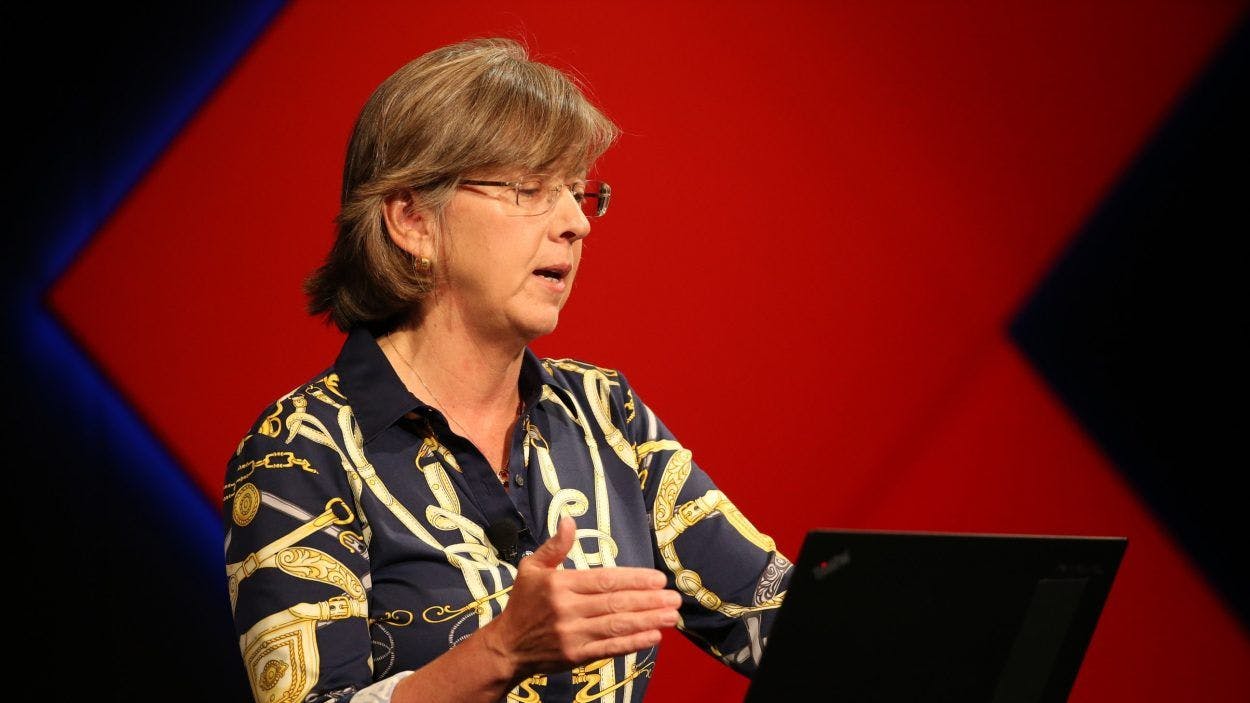
trends-and-insights
2016 Internet Trends Report
We’ve set out our highlights from this year’s internet trends report from Mary Meeker, partner at the Silicon Valley venture capital firm Kleiner, Perkins, Caufield and Byers. Internet Users New internet users are going to be harder to target. Emerging markets are less developed and less affluent, limiting the ease of access to internet. A key factor is smartphone access - in many developing countries, smartphones are a material cost. In Ethiopia, for example, the cost of a smartphone is 47.6% of a person’s income (measured as gross national income per capital), according to management consultants, McKinsey. India’s Growth India’s internet usage is growing at a staggering 33% year on year. Global internet growth rate is actually decelerating if you exclude India. It’s now surpassed the US as the second largest market for internet users behind China. Economic Growth GDP growth in 6 of the last 8 years has been lower than the 20-year average. Commodity prices are down 14% since mid-2014, echoing slowing global growth. The geographic shifts are also significant: in 1985, North America, Europe and Japan accounted for two thirds of global GDP growth, however by 2015, China and emerging Asia accounted for two thirds of global GDP growth. This was mainly due to the significant increase in Chinese spending. Internet Advertisements Growth is accelerating, mainly driven by a mobile advertising boom – the desktop computer ad industry is growing by 5% year on year, whereas mobile ads are growing by 66% in the US. Google and Facebook account for the vast majority of online ads. Do They Work? They’re lucrative for the ad companies, however, are they effective? 81% of users mute their ads, 62% of users are annoyed with or put off by brands with auto-playing videos and 93% of users consider ad-blocking software, according to adtech company, Unruly. China, India and Indonesia are particularly prone to using ad-blocking software. In total, there are 420 million users of ad-blocking software. If there has ever been a time to create better, more effective ads, it’s now. What is a Good Online Ad? Video is becoming increasingly the best form of advertising, as it plays to millennials’ and generation Z’s preferences. Those with the best engagement include Snapchat, Facebook and Instagram. Snapchat is Mary Meeker’s exemplar. Snapchat’s advertising strength is its combination of a camera, storytelling, creativity and messaging/sharing. Brands are able to engage with users through branded filters - the Gatorade Super Bowl lens garnered more views than the Super Bowl itself. Messaging Apps on Home Screens The best way to contact millennials is through social media and chat, the worst way is through calling. Smartphone home screens and internet browsers used to be the mobile “power alleys”. Home pages on smartphones are increasingly becoming messaging apps such as WhatsApp and Facebook Messenger. Businesses in Messaging Apps Businesses are increasingly using messaging apps to engage with customers. The hotel brand Hyatt uses Facebook Messenger to communicate with customers about reservations, and even room service. Termed “conversational commerce”, retailers are beginning to use messaging apps to sell products. An example is in Thailand where customers browse over Instagram and complete their purchases through a messaging app. WeChat is the messaging app that dominates in China – around a third of users have made a purchase over the platform. That’s our round up. Have a watch of Mary Meeker’s address that summarises all of her internet trends for the year.
June 22nd 2016

trends-and-insights
Court Affirms Internet a Utility
Back in April, we published an article about net neutrality, the Federal Communications Commission’s (FCC) Open Internet Order, and the debate and looming court case threatening the internet’s open model. Fast-forward to last Tuesday where we saw a turning point in the debate with the Court of Appeal affirmation that the internet is a utility and must be kept open. Rewind: the basics What is net neutrality? At its core, net neutrality is the principle that Internet Service Providers (ISPs) should provide equal and open access to all websites, without favouring those that pay for higher speeds, or discriminating on the basis of content. This notion governs the way we operate online, and the content we view, at its core ensuring the guarantee of free speech. Why is it important? If ISPs were to pander to companies paying more for better access, content and opinions showcased on other websites unable to pay would be redistributed onto a slower strand of internet. This segregation of the internet is what net neutrality aims to avoid. Legislation of the internet is essential to maintaining net neutrality, otherwise ISPs may reject content they dislike, block apps that are competitive, and relegate unpaying content providers to a slower band of internet. The internet as we know it wouldn’t exist if ISPs charged for content and allowed corporations to have priority treatment. “IT’S LIKE FEDEX. YOU PAY A CERTAIN AMOUNT FOR OVERNIGHT DELIVERY AND A CERTAIN AMOUNT FOR TWO-DAY DELIVERY. YOU COULD END UP WITH SOMETHING LIKE THAT FOR THE INTERNET.” — Philip Weiser, Dean, University of Colorado Law School Lead-up to the court case In early 2015, the FCC passed regulations prohibiting ISPs from blocking or slowing the delivery of internet content to customers. A key aspect of the rules was the declaration that broadband is a utility, like water and electricity, and not a luxury. The FCC’s intentions were to ensure the internet remains an open platform where ISPs do not control access, benefitting themselves and weakening competitors. The rules prompted significant debate and a subsequent legal battle as cable, telecom and wireless internet providers attempted to overturn what they said was a set of unfair and damaging regulations that went beyond the FCC’s mandate. The decision Last Tuesday, the 2-to-1 ruling from a panel of three judges at the United States Court of Appeals for the District of Columbia Circuit, upheld the FCC’s regulations, defining the internet as a utility. The decision affirmed the government’s position that the internet is as crucial and fundamental as power and water. “This is an enormous win for consumers. It ensures the right to an open internet with no gatekeepers.” - Gene Kimmelman, president of the public interest group Public Knowledge What does it all mean? The court’s ruling clears the way for further, more rigorous policing of ISPs - it means greater protections for consumers. Proponents of net neutrality are lauding the latest decision, stressing that this was necessary to protect consumers from overbearing corporates. Critics are worried that it arms the FCC with far too much power. The FCC has categorised ISPs under different rules, and will now begin determining how to regulate them. It has the authority to police the internet market, shaping IPSs’ behaviour and stamping out unfair treatment. Although this court case has put much of the debate to rest, certain ISPs such as AT&T have vowed to fight the decision vigorously. The saga is certainly not over.
June 18th 2016

trends-and-insights
Marriage of Venture Capital and Equity Crowdfunding
The recent ascent of equity crowdfunding (ECF) in the last few years has lured many companies away from traditional forms of investment channels. As this ascent continues, so too does the market share of crowdfunding platforms, who are encroaching on the traditional venture capital (VC) market. By disrupting the industry so heavily, venture capital firms have had to forgive their initial misgivings about the state and promise of the equity crowdfunding industry, and address its new status as a game-changer, and even be prepared to consolidate with them. Where does ECF stand in relation to VC? The democratisation of finance has led to a wealth of options, and a healthy competition amid sectors, which looks set to intensify as the popularity of equity crowdfunding grows. The question of coexistence between venture capital firms alongside equity crowdfunding has arisen in light of statistics suggesting the two modes of investment are on par in terms of popularity. In 2015, the Dutch crowdfunding industry doubled to €128 million from €63 million the year before. Worldwide, equity crowdfunding has already surpassed venture capital firms. Massolution states that $34 billion was raised through crowdfunding platforms, compared to $30 billion via venture capital firms. Consolidation between VCs and ECF The public appeal and ambassadors provided by an equity crowdfunding raise differs to the strategy offered by a venture capital raise. The concerns expressed by venture capital firms from the origins of equity crowdfunding, moreover, have proven to be baseless, as public companies show it’s possible to manage a large shareholder base, and as guidelines become clear to assist startups in complying with rules and regulations. Equity crowdfunding validates ideas in a democratic manner, minimising risk and offering a high amount of feedback. What does the future hold for the two industries? Resistance to equity crowdfunding on behalf of venture capital firms was to be expected, but as the digital marketplace becomes an increasingly valid, democratic means of investment, it allows the public to discern what are valid products and concepts. This validation could help the longevity of startups funded via venture capital firms, which at present fail 75% of the time. How does syndicated investment fit in? We’ve recently published a series of articles on Equitise’s new syndicated investment platform we’re pioneering in the trans-Tasman market. Syndicated investment allows large groups of investors to invest as a single unit. Experienced investors can lead syndicates that are made up of less experienced investors. They forfeit a portion of their profits in exchange for lead investors’ expertise and deal flow – it’s called carried interest. Where ECF succeeds is its ability to harness the crowd, allowing everyday investors to discover, research and select investments based on their investment knowledge and appetite. Where syndicated investment succeeds is that it allows investors who lack knowledge of certain industries or investments to tap into the expertise and business acumen of experienced investors, ‘leads’. It solves the problem of the knowledge gap that retail investors can have when pursuing opportunities in unfamiliar industries. Syndicated investment may be the middle ground between ECF and VC. Everyday retail investors can participate in investment alongside established players like VCs and angel networks. Using the same online model ECF introduced, it provides a mutually beneficial platform for seasoned investors and novices.
June 15th 2016

trends-and-insights
Syndicated Investment: Our Take
Our final post on syndicated investment will take you through the ins and outs of Equitise’s model – how we’ve established it and how investors and companies can get involved. Take a look at our earlier posts on the evolution of syndicate investment, its importance and its all-important feature, carried interest. What Is A Syndicate? For those who haven’t tuned into our previous posts, here’s a quick round-up: syndicates are groups of investors, ‘backers’, brought together by lead investors, ‘leads’. They invest in businesses jointly, as a single unit. Leads are typically experienced, seasoned investors with access to investment opportunities. Syndicate members benefit from leads’ expertise and deal flow, ‘piggy-backing’ on their deals. In exchange, leads receive carried interest: a larger share of the investment’s profit than the other syndicate members. Why Participate In Syndicated Investment Through Equitise? For leads, we provide an easy and convenient platform to execute investments, gather investors, and discover new investment opportunities. We remove the hassle of investing by taking care of the administration, and supplying our online platform for simplicity and transparency. For backers, we allow you to connect with experienced investors and access deals that are usually reserved for private or wholesale investors. We provide a solution to the knowledge gap that exists for retail investors; you can partner with investors who are well versed in industries unfamiliar to you. What Is The Minimum Investment? Typically, the minimum set on investment within the Equitise platform is around $2,000 for syndicated deals. Is It Restricted To Wholesale & Sophisticated Investors? As you may know, Australian laws require investors to meet certain income and asset requirements to qualify to invest on our platform, however in New Zealand anyone may participate. Typically, investors who gain access to private syndicated deal flow on Equitise are either wholesale or sophisticated investors. However, any platform member has the ability to request access to private syndicated deals and it is up to the lead within the syndicate to accept or reject them as a syndicate group member. Why Aren’t All Syndicate Deals Public? There are several factors in deciding whether a deal will go public or remain private. This decision may rest with the lead Investor’s investment strategy or the business receiving the capital. A lead may choose to keep the deal private if they are targeting specific investors, or if information is sensitive and inappropriate for the wider platform membership base. How Are The Shares Held? Shares are held with the Equitise nominee. We use and manage this structure to benefit both the investor and the issuer. For the issuer, this structure provides the benefit of a large investor and a single name on the shareholder register, but avoids giving up rights to a large shareholder base. Who Handles The Documentation? Equitise will handle all investment documentation for syndicated deals. Equitise automates all administrative tasks regarding the closing of deals through our investment platform. On-going reporting is handled by the Equitise nominee and our internal investor relations team. This is a streamlined process and is beneficial for investors and issuers raising capital. Can Syndicate Members Participate In Other Syndicates? Equitise is building an open and inclusive investment ecosystem. We provide a solution to the fragmented nature of investing in Australia and New Zealand. For this reason, we encourage investors to explore our investment platform and interact with other syndicates. We strongly believe that leads will not see their investor base diminish, as they will receive interest from investors from other syndicates. We are building a sustainable network of investors to expand members’ private investment networks within our platform. What Are The Fees To Invest In Syndicated Deals? To get the benefit of accessing high quality syndicated deal flow from VC funds, family offices and angel groups, Equitise charges a nominal 5% fee to manage the nominee on behalf of the investee business until exit. Leads will also take a portion of profits, in the form of carried interest, as an incentive to share their deal flow and expertise with a wider range of investors. Carried interest usually ranges from 5% to 20%. That ends our overview of Equitise’s syndicated investment platform. If you’d like more information, check out our website or get in touch – we’d love to hear from you.
June 12th 2016

for-companies
SAFEs: Investment Vehicles of Choice
SAFEs - Simple Agreements for Future Equity - are a type of security designed for raising funds under Regulation Crowdfunding, a new law introduced last month in the US. In our previous post we outlined the crowdfunding legislation in the US introduced over the past two years, including Reg Crowdfunding. Platforms registered with the Securities and Exchange Commission and the Financial Industry Regulatory Authority - 10 have registered thus far - are able to raise capital, on behalf of businesses, under Reg Crowdfunding. A mix of startups and seed-stage companies are making use of the ability to raise up to $1 million by issuing convertible notes, common equity, preferred equity, profit sharing agreements, and SAFEs. SAFEs are becoming the investment vehicles of choice. What Are SAFEs? Since the early-2000s, convertible debt was the most common structure for pre-seed and seed capital raises. It provides a debt-like instrument with the ability to morph into an equity stake. It allows companies to avoid valuing their companies and affords flexibility, however it can be burdensome for early-stage companies. SAFEs are providing an attractive alternative. SAFEs are intended to replace convertible notes - debt that can covert to equity - in many cases, addressing a number of the problems with convertible notes while preserving their flexibility. Unlike a convertible note, SAFEs are not debt instruments. Debt securities have maturity dates, accrue interest, can be subject to heavy regulatory requirements and can create the threat of insolvency. SAFEs remove the need revise agreements in the future, such as extending maturity dates. SAFEs also better align with the preferences of most shareholders, who had no intention of being lenders. What Are Their Benefits? Cost-Efficiency: Investors are not providing funds via a SAFE in the form of debt. Accordingly, funds do not accrue interest, removing this burden for cash-poor startups and early-stage companies. Cost benefits also come from removing the need to renegotiate terms such as maturity dates, interest rates and expiration periods. Furthermore, SAFEs are one-document securities, saving on legal fees and reducing the time spent negotiating the terms of the investment. Businesses and their investors usually only have to decide on one thing: the valuation cap. Convenience: Another major advantage - thanks to the absence of interest and maturity dates - are their ability to be amended by only one lead investor. Investors agree to give one person authority to sign for amendments, removing the need for businesses to gather hundreds of signatures. SAFEs also include repurchase rights, allowing businesses can repurchase SAFEs at any time prior to conversion into equity. This provides two key benefits: mitigating holdups when raising further funds, and providing an easy exit route for investors wanting to avoid a conflict of interest that may arise. A distinct advantage for companies is the power of attorney granted to CEOs for minor shareholders. This comes in after the SAFEs have been converted into equity. This makes future financing a simple affair, as well as other situations requiring shareholder permission. Adaptability: They are highly customisable. Valuation caps, the discount rate, major shareholder thresholds, pro-rata rights and the timing of when the security coverts to equity can all be determined when establishing the SAFE. That's it from us. Stay tuned for our blogpost outlining Equitise's new syndicated investment platform.
June 11th 2016

trends-and-insights
Crowdfunding “In The U.S.A.”
In the US, new amendments to the Securities Act 1933 have been introduced over the past two years as part of a package of new laws encouraging small-business funding, collectively known as the Jumpstart Our Business Startups (JOBS) Act. We’ll step you through what you need to know about the crowdfunding regulatory landscape in the Land of the Free. The recent laws have meant that for the first time in 80 years, the public - not just the rich - can make investments in private companies. Businesses can pool funds from their friends and local communities rather than rely on the whim of banks and venture capitalists. Regulation D Regulation D has been around since the inception of the Securities Act, and allows for unlimited amounts to be raised from accredited, wealthy investors. We're talking those with a net worth of at least $1 million - not including their home – or those who’ve earned north of $200,000 per year ($300k with spouse) in each of the past 2 years. It also includes institutions such as banks and venture capitalists. Two key new regulatory developments have facilitated the rise of the US crowdfunding industry: Regulation A+ Reg A+ is like a mini-IPO and allows for raises between $20 million and $50 million on a tiered system. It became active in late 2015, and was designed for later-stage companies to raise funds publicly, without a full-blown IPO. Advantages You can raise up to $50 million a year from the general public, advertise your fundraising to solicit investors and “test the waters” to gauge market interest before filing with the SEC. Disadvantages It is an expensive option, with costs ranging from $50,000 to $100,000. Prior to raising funds, the US’ Securities and Exchange Commission (SEC) requires an offering placement memorandum – a stringent businesses plan - to be filed, costing up to $50,000 in legal fees. Regulation Crowdfunding Reg Crowdfunding - recently rolled out on 16th May 2016 - allows for smaller $1 million raises, and affords reduced disclosure requirements and costs. Advantages You can solicit investments as little as $100 from anyone - not just the wealthy. You can also advertise your campaign to raise funds from existing customers, and through social media and press channels. It provides a time and cost-effective means for friends, family and the general public to back your business. Disadvantages Curtail details are required by the SEC: two years of financials, and key details such as number of employees, shareholders who holds 20%+ voting rights, previous funding rounds, and how the funds will be used. There’s an annual $1 million limit for Reg Crowdfunding which can limit its use. To get around this, many platforms offer Reg Crowdfunding raises targeted at the general public, in combination with Reg D raises targeted at accredited investors. Investors in a Regulation Crowdfunding offering have individual investor caps their investments to between 5% to 10% of their income or net worth each year. Furthermore, companies with more than 2000 shareholders or 500 unaccredited shareholders, and more than $25 million in assets, can be subject to burdensome SEC reporting requirements. Lastly, there is a requirement to file annual financial statements to update investors. Failure to do so renders companies ineligible to fundraise with Regulation Crowdfunding again until the annual report is successfully filed. That’s it on US crowdfunding laws. Next up, we’ll look at SAFEs (standing for Simple Agreement for Future Equity), the investment vehicles of choice in Reg Crowdfunding raises.
June 10th 2016

for-investors
How Emotions Dictate Investments
Our emotions affect our investments and financial decision-making. From startup funding to savings management, it’s all about our believes and risk perception. Investing is certainly an exciting activity, but what about that uncomfortable sensation about a risky business investment and the fear of losing our hard-earned savings? Studies have shown that we suffer almost double losing $1 as we would feel pleasure gaining $1. Investing should be a rational act but emotions are what characterise us as human beings. Emotions lead us to invest in startups in which we believe or towards investments we think could help us to diversify our portfolio. However, we cannot ignore that startup funding can be risky and that portfolios can be volatile as financial markets and the global economy are influenced by different variables. Recently, several political changes and security issues, such as Brexit and the twentieth century refugees’ crisis concerning Syria and Iraq, have increased economic insecurity. Aside from market uncertainty and the risk that every investment carries with it, there are other factors that affect human behaviour when talking about investments and financial decision-making. New Zealand’s Financial Market Authority (FMA) has released a white paper that provides insights into how consumers make choices, which can be used to shape regulation and inform market participants on how to develop and distribute their offerings. “Around the world and in New Zealand, those involved in building financial capability are recognising the importance of understanding what drives consumers’ decision-making processes.” - Rob Everett, FMA Chief Executive What are the main biases that affect our financial capability? A) PREFERENCES We tend to focus on what’s happening now, procrastinating and postponing tasks such as swapping to cheaper credit cards – this is known as present or status quo bias. People are reference dependent, meaning they assess the value of something according to a reference point. For example, we're reluctant to sell our homes for less than what we bought them for even if it was above the current market price. Loss aversion is another reason why people make poor financial decisions, due to our hard-wired fear of losses. We make irrational calls such as selling shares - simply because they’ve decreased in value – when we should be holding on to them. B) BELIEFS We are often overconfident of our own abilities and have unrealistic optimism. We also over extrapolate, making investments based on a small number of successful past experiences. Projection bias also exists due to our preference for focusing on the present and disregarding the future. It causes us to misjudge our future needs, leading to inadequate saving. C) DECISION-MAKING Our narrow-framing bias causes us to make financial decisions in isolation, rather than as inter-related pieces of a puzzle. This means that when we construct an investment portfolio, for example, we tend to assess each new investment on its own merits rather than as part of the whole portfolio. We also adhere to rules-of-thumb, making us stick to familiar and simple strategies. For retirement planning, it might mean that we’d split our money equally between Kiwisaver accounts, which is a voluntary based savings scheme set up by the NZ government to help its citizens to save for their retirement, rather than choosing the most optimum balance. D) SOCIAL FACTORS The final aspect is to do with social factors: we often make decisions according to what those around are doing – our friends and family - and whether the salesperson is likeable. This makes objective, rational decision-making difficult. How can we combat these biases? It’s difficult and complex, however there are some examples of government and private-sector initiatives. “By sharing our experience of using behavioural insights, we hope to be more effective in improving New Zealanders’ financial capability.” - FMA In summary, we can use behavioural insights to give us an understanding of why people save inadequately, make uninformed decisions and find it difficult to choose financial products. Being aware of the natural biases that exist, and the strategies used to address them, may help you overcome the behavioural factors influencing your financial decision-making.
June 6th 2016

trends-and-insights
Crowdfunding News Roundup
From crowdfunded airlines to disgraced CEOs, we’ve summarised the biggest crowdfunding developments and new stories of late. Santander to pioneer blockchain The Eurozone’s largest bank by market capitalisation, Santander, has announce it’s launching an app to enable live international transfers using block chain technology. For the Luddites, block chain is a type of database that consists of a continuously-growing list of records that cannot be tampered with or revised - it’s the technical innovation behind bitcoin, serving as a ledger for all bitcoin transactions. This announcement is another example of a wider trend of institutional involvement in the fintech industry. Santander is actively engaging in innovative technology, after its launch of a $100 million fintech fund. Nordea to enter equity crowdfunding Nordea, the largest bank in the Nordics, announced its entry into the equity crowdfunding industry. It plans to have an equity crowdfunding platform developed within a few months to rival the existing platforms in the region. The Scandinavian region was an early adopter of crowdfunding regulations and an established industry exists. Invesdor, the region’s largest player, was the first platform to receive a Europe-wide crowdfunding license, and has a string foothold in the area with an institutional partnership with Denmark’s Danske Bank. Legislation in Australia Back on our home turf, crowdfunding legislation continues to be stalled as the federal elections loom. Expectation of an enactment were high earlier in the year, however the bill failed to pass through the Senate. Crowdfunding legislation is toted as being high on the agenda with bipartisan support, and it is hoped that we’ll see a crowdfunding-friendly Australia by the end of the year. A crowdfunded airline A new airline called POP, short for People Over Profit, has launched a crowdfunding campaign to raise £5 million in seed capital. It aims to launch low-cost, direct flights between the UK and key cities in India later this year. It’s seeking capital from the people, and aims to give back to the people once established by donating 51% of its profits to charitable projects in India and the UK. Lending Club and its woes News was flying earlier in the year of a partnership between banking giants, Citi, Goldman Sachs and others, and the US’ largest lending platform, Lending Club. The plan was to purchase low-grade debt from Lending Club to satisfy banks’ obligations under the Community Reinvestment Act (an Act requiring a portion of a bank’s lending to be in deprived areas). Since this announcement in April, Lending Club’s CEO Renaud Laplanche has stood down amongst controversy regarding $22 million worth of loans that were provided contrary to an investor’s explicit instructions. Relations have reportedly soured between Lending Club and its institutional partners, and attention will be on how Lending Club will deal with these low-performing, risky loans they hoped to offload. That’s all from us. Be sure to check back in to keep abreast with the latest.
June 5th 2016

trends-and-insights
Crowdfunding in the EU
The European Commission recently released its report on the state of the crowdfunding industry in the EU, underscoring that startups are “crucial to the future of jobs and economic growth in Europe”. To foster the financing of these innovative companies that the Commission considers crucial to a healthy European economy, it has created the Capital Markets Union Action Plan. The “Plan” at its core aims to broaden access to sources of alternative finance, given countries, even those whose economies remained stable following the global financial crisis, nonetheless struggle to finance young and innovative firms. We’ll step you through the key tenets of the Plan’s process to promote equity crowdfunding, as well its findings on the crowdfunding industry in the EU today. How does the European Commission describe crowdfunding? The positive terms used to outline the benefits of crowdfunding are distinctive, recognising its importance as a non-bank financier supporting job creation, growth and competition. The report acknowledges that in 2015, over €4 billion was raised using these platforms, and owing to the relative youth of the industry, a great deal of innovation is matching these projects, as the fintech sector continues to attract increased regulatory attention. The Capital Markets Union Green Paper was followed by calls from many member nations for some form of intervention at an EU level, to introduce a harmonised regime for the industry within member states. “By providing an online marketplace to match investors and investees or lenders and borrowers, investment-based and lending-based crowdfunding can bring more competition into retail and capital markets” – The EUC Report on Crowdfunding in the EU Capital Markets Union. What has the EU done to foster access to crowdfunding platforms? On 19 January 2016, the European Parliament passed a resolution, to promote equity crowdfunding platforms, “giving priority to their cross-border dimension and ensuring the reduction of market entry barriers”. It endorses the Commission’s ability to recognise crowdfunding as one of the latest technological innovations with the ability to transform the financial markets. Such resolutions are geared towards educating governments, and the Commission itself, on the broad capabilities of the fintech sector. In addition, the Commission has established the European Crowdfunding Stakeholder Forum, an expert group of representatives of stakeholder groups and national authorities. The group is aimed at raising awareness of best practice crowdfunding, and the key methods of allowing the industry to flourish. The Forum held that there were three key tenets to allowing crowdfunding to succeed within the EU: clarify the applicability of existing EU law, encourage self-regulation at a national and EU level, and create a voluntary transparency label. The Commission has also launched a study by Ernst and Young to map the crowdfunding market over a two-year period, analysing market trends before and after national legislative interventions. This, and similar studies funded by the Commission, are indicative of the goodwill and faith its behalf to establish guiding principles and best practice for the industry that will ensure its proliferation and success. It has also published a guide on Crowdfunding for SMEs, in 23 different languages. What are the barriers to equity crowdfunding platforms in the EU? Despite the amount of goodwill and promotion of crowdfunding on behalf of a collaborative EU Parliament, domestic governments nonetheless continue to pass bespoke legislation that stymies the proliferation and improvement of market access in their respective countries. In some instances, this regulation is positive, and aimed at reducing the risks involved with equity crowdfunding platforms by issuing licences or Markets in Financial Instruments Directives (MiFIDs) to platforms wishing to practice. These platforms are then able to operate in a cross-border context under a good faith basis. Nonetheless, certain countries do not allow this, irrespective of whether the platform has an MiFID or not, and such divergences in the approaches of Member States is unhelpful to the function of crowdfunding platforms. Looking forward, however, the Plan notes that increased institutionalisation of the industry will occur, together with a more stringent regulatory framework, the combination of which will eliminate present concerns around the industry and boost its stature. Ultimately, the EU Commission’s focus on crowdfunding is heartening, as it supports its growing, but nonetheless complication, position within its financial markets. Described as “one of the many technological innovations that have the potential to transform the financial system”, continued research by the EU Commission, combined with broad-base, cohesive regulation, will assist in the continued growth and success of the industry.
June 2nd 2016

trends-and-insights
Syndicated Investment: US State of Play
This instalment in our series of blogposts on syndicated investment will focus on the US – the regulatory environment, investor participation and what it all means. Take a look at our first post outlining the evolution of syndicated investment and our recent post on its significance. US Regulation The phasing-in of crowdfunding regulation in the US was completed last year. The final rules, often referred to as Regulation A+ (reg. A+), are an update and expansion of the previous Regulation A (reg. A) of the Securities Act 1933 that allowed for small capital raises of $5 million. This last development allows for raises of up to $50 million, and is part of a package of new laws encouraging small business-funding, collectively known as the Jumpstart Our Business Startups (JOBS) Act. For syndicated investment, the key development facilitated by reg. A+ is the inclusion of ‘unaccredited’ investors. Previously, only 'accredited' investors - people earning over $200,000 annually, or those with $1 million in assets (excluding their primary residence) – were able to invest in startups in the US. Now - subject to certain investor caps - investment in early-stage businesses is open to everyone. This has allowed fledgling syndicated investment platforms to flourish, expanding their investor network with the new wave of participants. How does it work? Investors in a syndicate invest as one unit by establishing a special purpose entity to execute the transaction. In the US, the maximum number of shareholders for a limited liability company, the business structure of choice, is 99. Therefore, syndicates of 99 or fewer individuals are formed from an angel network for each investment. What does it mean? Previously in the US, such investments were served only for rich, 'accredited' investors. It meant that the 97% were excluded from early-stage investment. Why? The rules were designed to protect the vulnerable (poor) from making damaging losses. 'Accredited' investors were allowed to take higher risks as they were seen to have a larger ‘buffer zone’ to absorb losses. With the alternative finance revolution, investment in all asset classes is opening up, democratising finance. But does that translate to higher investment participation? Recently the US’s Federal Reserve Board released a study concluding that 47% of Americans would struggle to come up with $400 if an emergency were to occur requiring it. This may mean participation in early-stage investment remains with the richer segment of society. What else should be considered? Cultural Factors Since the deregulation, tax cuts and spending increases of the Reagan administration in the 80s, the US has been a heavy borrower and consumed above its national income. Individuals and families felt richer, and many argue that this was the beginning of a cultural shift in the way Americans saved and consumed. The flow-on effects have created a spending culture, financed by shrewd savers abroad. US household savings rate is now at about 5% compared to 12% in France. For that reason, broadening of investment opportunities may go unnoticed in a culture that prioritises short-term consumption over savings and investment. On the other hand, US participation in equity capital markets is at around 26% of the population. This means that although savings are low, those savings would be allocated to higher risk asset classes - shares in this case. It suggests a happy relationship between Americans and equity investment in early-stage companies. What about on Equitise’s home turf? New Zealanders and Australians save at a slightly higher rate than Americans but are still heavy consumers. However, in positive news for equity crowdfunding and syndicated investment, our participation rate in domestic stock markets is amongst the highest in the world - 40.4% of Australians and 31% of New Zealanders. It’s early days for syndicated investment, however there are positive signs that it is revolutionising early-stage investment in the US. Time will tell whether the new regulations expanding access to investment opportunities will increase the participation of retail investors. Stay tuned for our next post on how Equitise is pioneering a trans-Tasman syndicated investment platform.
June 2nd 2016

trends-and-insights
NZ’s 2016 Budget: Winners and Losers
New Zealand Finance Minister Bill English presented this year’s budget last week. Sticking to a similar theme to the previous years’ budgets, the focus was on infrastructure, healthcare, social investment, the environment and a welcome increase to science and innovation funding. “Responsible fiscal management has been the hallmark of this Government’s previous seven Budgets. Budget 2016 continues this approach." - Finance Minister Bill English Spending is set to increase significantly from $1 billion to $1.6 billion, helped by a heavy decrease in allowances from $2.5 billion to $1.5 billion. Winners “A strong economy allows us to invest more in priority public services such as increased access to next-generation medicines, more elective surgeries and schools, and vital social services such as emergency housing...” - Prime Minister John Key Infrastructure Inland Revenue gets a $1 billion funding injection to revamp their online platform over the next 4 years. Healthcare District Health Boards receive $400 million per year for the next four years to support their growing operations. Pharmac, the state pharmaceutical subsidiser, receives $124 million over 4 years to compensate for the expanding list of publicly-funded treatments. In total, around NZ$2.2 billion has been earmarked for extra health spending over the next three years, including a national bowel screening program. Social Investment $652 million has been earmarked for social investment targeted at disadvantaged children and youth at risk of long-term welfare dependency. Vulnerable children at risk of under-achieving will see $6 million per year be put towards improving their access and quality of education. Innovation and Technology New science and technology initiatives have $411 million allocated for investment. A $761 million innovation package to encourage entrepreneurship, skills and economic growth, boosting investment in science and innovation, tertiary education and apprenticeship programs. Environment The big news is that the Emissions Trading Scheme (ETS), brought about to reduce costs for businesses during the financial crisis, is being phased out by the beginning of 2017. Losers Carbon-emitters Due to the phasing out of the ETS, business costs are set to rise for those with large amounts of carbon emissions. Smokers Furthering the government’s commitment to curbing smoking, cigarette tax will rise 40% over 4 years, bringing the cost of a packet to $30, amongst the highest in the world. Urbanites The budget addresses little of the traffic problems in major cities: funding for roading will be focused on rural areas. Overall the budget paints a positive picture of the New Zealand economy with a decrease in unemployment, a strong export sector and an increase to forecasted incomes. “The outlook for the economy is positive. Businesses are investing, job growth is solid and wages are rising faster than inflation.” - Finance Minister Bill English With an election looming, attention will be on whether this year’s budget provides the incumbent National-led government room for tax cuts in 2017 to tempt the voters, pre-election.
May 28th 2016

trends-and-insights
Syndicated Investment: A Game-Changer
Investment in private companies is becoming easier and more accessible as regulation continues to develop across the globe. Equitise has been at the forefront of these changes, providing individuals the chance to access investment opportunities previously reserved for institutional investors via equity crowdfunding. Now Equitise is doing the same thing with syndicated investment. In our previous two posts on Syndicated Investment, we’ve taken you through the evolution of this economic framework, and the importance of carried interest. Today we want to step you through the key benefits of having sophisticated lead investors allocating their funds in tandem with less experienced backers. How does it benefit investors? The phenomenon of syndicated investment has garnered a reputation for benefitting companies and investors in equal measure. Syndicates have, to an extent, codified the sort of investment angels already conduct – it’s just that they can do so under syndicates formed on Equitise’s platform. By aligning themselves with experienced Angels as their investment leaders, backers acquire improved deal flow – investments that might not have been accessible become so. The other key benefit is the decreased risk and paperwork – Angels’ expertise eliminates the traditional risks and discern the most viable startups and deals. Following the Angels’ lead makes sense – their investment credentials and background allow you to hijack this experience for your own portfolio’s benefit, with a common interest. The investor leading the syndicate, the ‘lead’, is allocated a larger share of profits. This is in recognition of their expertise and experience, and provides incentives for individuals to create syndicates. See our earlier post on carried interest for more information. What are the benefits for companies? Syndicated investment platforms collate groups of investors who wish to pool resources to back a business – a key advantage of this process is that these syndicates develop quickly. Not only does the startup have access to higher sums of capital, but the packaging of syndicated investment means it can be obtained at a faster rate than pitching to individual investors. This saves key resources as syndicated investment alleviates the requirement to dealing with multiple different investors. In all, the company taps into the syndicate’s connections, but does not vest them each a direct interest in the company, instead the startup acquires the syndicate as a single item. Moreover, business angels don’t just furnish capital – they provide the aforementioned network, as well as their financial guidance and experience. It’s also down to the leaders to navigate the relationship with the backers, simplifying the investment dynamic further for the recipient company. How does equity crowdfunding fit in? Equity crowdfunding is a tremendous boon for businesses and investors alike. Where it succeeds is its ability to harness the crowd, allowing everyday investors to discover, research and select investments based on their investment knowledge and appetite. Where syndicated investment triumphs is that it allows investors who lack knowledge of certain industries or investments to tap into the expertise and business acumen of experienced investors, ‘leads’. It solves the problem of the knowledge gap that retail investors can have when pursuing opportunities in unfamiliar industries. It also removes inefficiencies by having only one trusted party carry out the necessary due diligence. The disruption caused by syndicated investment has attracted attention across the financial sector. By accelerating the capital raising process through platforms that tap into the ‘crowd’ mentality, syndicate investment not only achieves the aims of early-stage companies, but their leaders and backers alike.
May 26th 2016
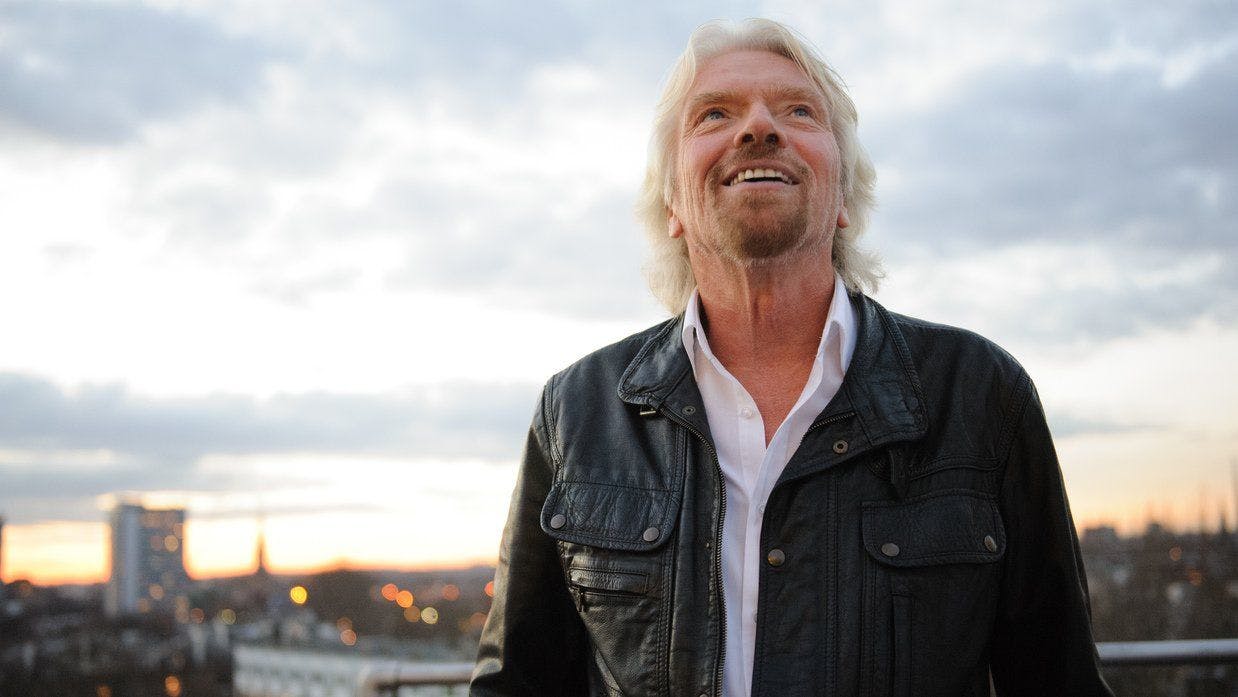
for-investors
Investor Series: 5 Tips to Backing the Right Company
Equity crowdfunding gives investors the opportunity to back companies early on, providing access previously reserved for venture capitalist firms and angel networks. Early stage companies offer the possibility of high returns, however this can come with high risk. Knowing which companies to back is key. “It’s fine to celebrate success but it is more important to heed the lessons of failure.” - Bill Gates The final part in our investor series aims to equip you with the tools to select the best from the crowd. According to the Wall Street Journal, about a third of startups fail to make it to year 3, so how can you ensure you’re backing the two thirds? Ask yourself these questions. Is there sufficient capital? For companies, working capital refers to the amount of cash they have at their disposal to execute their goals and pay the bills. Lack of funds is consistently cited as a major cause of business failure. Companies raising capital on Equitise’s platform must disclose their financial standing in the offer documents, providing investors with a clear understanding of their current capacity to meet obligations. Furthermore, companies must outline the amount of capital being raised and, crucially, their intentions – how the money will be distributed and what they hope to achieve with it. Investors have the chance to assess whether these goals are feasible, realistic and valuable. Is management capable? Along with a sturdy balance sheet, the people behind the company are key drivers of success. Even with abundant capital, knowledge and planning is vital. Included in offer documents is a section where managers will introduce themselves to potential investors. Look for an experienced team with a mix of enthusiasm and know-how. The management team is often supported by a panel of advisors made up of industry experts and seed investors. The process of assessing a company’s personnel is a crucial part of any investor’s due diligence, allowing them to assess the capability of key players in a business. Is there a need? Businesses are started with the best of intentions, but often without an appreciation of the marketplace. The service or product a company offers (or wants to bring to the market) needs to satisfy a need, otherwise customers won’t be interested. Coined as “pain points”, businesses should be addressing problems consumers have, providing solutions in the form of products or services. This addresses the fundamental question: why would someone buy your product. The more acute the “pain”, the more compelled customers will be to seek a solution. Do they understand their customers? A business can have the finest product but this is redundant if their customers don’t know about it. Businesses need to clearly define their market and customers, and have a deep understanding of their customers’ buying habits. The business must be able to market their products and services effectively, price them correctly and have a running dialogue with their clients to remain in tune and relevant. Furthermore, ask who their clients are – are they too reliant on a small number of customers? Are they responsive? Technology and trends continue to evolve and change, altering the environment businesses operate in. Investors need to understand how responsive and open a business is to changing market demands and ways of operating. Failure to anticipate or react to competition, technology, or other changes in the marketplace can render a business’ offerings obsolete and irrelevant. Backing businesses who embrace innovation and technology, and who are open to new ideas, is key. Risk-taking is an important part of investing, however it’s the educated risk-takers who are most likely to succeed. As always, ask questions, read all available information carefully, and seek independent financial advice before committing yourself.
May 19th 2016

trends-and-insights
Off3r and the Business of Crowdfunding
As the equity crowdfunding market continues to evolve and improve, it requires a new wave of apps to keep apace with its rapid market expansion. Off3r, the newest tool for the savvy investor who requires a breadth of investment choices at their fingertips, provides this. As the world’s leading mobile crowdfunding aggregator, it showcases startups across all industries to put investors in touch with the freshest, most disruptive companies Off3r has curated partnerships with premier crowdfunding platforms, such as Equitise, to ensure investors have a filtered access to only quality investment opportunities. As a free-to-use, real-time mobile platform, Off3r gives investors the most up-to-date information available before making a decision. The equity crowdfunding industry continues to develop rapidly as investors, companies and governments across the globe recognise its tremendous benefits and capabilities beyond the realm of traditional investment and capital raising. The industry’s significance and growth is difficult to overstate: 2015’s industry report from the University of Cambridge and Nesta showed a staggering 295% growth in funds raised on equity crowdfunding platforms in the UK to £332 million – up from £84 million raised in 2014. The same report found that 15.6% of the total seed and venture-stage investment in the UK was conducted through equity crowdfunding platforms, highlighting their importance to the early-stage investment landscape. As this development occurs, offshoot industries are beginning to appear. OFF3R is part of a wave of companies that have come into existence to support the crowdfunding industry. Entire branches of support industries have appeared, specifically targeting the alternative finance industry – specialist legal services, financial advisors, publications, and more unique services such as OFF3R. We think OFF3R’s unique aggregation of global equity crowdfunding offers is a vital part of the growing ecosystem. It allows investors to track the market from anywhere in the world on their phones – we like it. The proliferation of equity crowdfunding platforms requires tools for investors to search and analyse the large amount investment opportunities presented. Investors of today are not bound by domestic borders or by the traditional constraints of the traditional investment marketplace. OFF3R plays a significant role in an investment decision-making by presenting investors with a global pool of opportunities. Equity crowdfunding has the potential to be a huge boon to cross-border flows of investment, allowing capital to seek out attractive opportunities regardless of their location. OFF3R furthers the global aspirations of equity crowdfunding, breaking down artificial borders by giving individuals access to investment opportunities across the globe, and company’s access to a global pool of capital.
May 15th 2016

trends-and-insights
Syndicated Investment: The Tale of Carried Interest
Our first post in our Syndicate Investment series, The Evolution of Syndicated Investment, defined a syndicate as a group of investors who pool their resources to invest in various ventures as a unit. Carried interest affects the way in which profits from investments are allocated among members of a syndicate, and is a crucial aspect of syndicate investment. Let us take you through the ins and outs! Syndicates: Leads and Backers Syndicates provide an informed marketplace where investors, or leads, share their deals with other accredited investors, or backers. Besides capital, leads lend their expertise and business acumen to fledgling businesses, and facilitate pools of capital. In return, leads are rewarded with a higher share of the profits compared with the other investors, the backers, in the syndicate. What is Carry? Carry, short for ‘carried interest’, is a share of the profit of an investment that is paid to the leads of the investment. The investors in a syndicate will forfeit an agreed portion of their collective profits to the lead investor. Carry is the mechanism that allows leads to be rewarded for their efforts. AngelList provides an example of how carry works: Sara decides to invest in a startup and asks for a $250k allocation in the company. She personally takes $50K of the allocation and decides to syndicate the rest. She shares the deal with investors and specifies that she is charging a 20% carry on the remaining $200k of her allocation. Sara’s capital and her co-investor’s capital is pooled into a $250K fund which invests in the startup. Sara’s co-investors pay carry for her access, governance and value-add. She sourced the deal and used her judgment to select the investment. She manages the fund and provides oversight for her co-investors’ capital. And she provides ongoing value-add to the startup. Carried interest has garnered significant attention in the past few years due to the tax loophole it’s afforded. Managers of hedge funds, and private equity and venture capitalist firms usually earn a “2-and-20” fee structure: 2% of the investments, and an additional 20% incentive fee of whatever additional gains they realise over benchmarks, deemed “carried interest”. Through a quirk in the tax code, the carried interest is allowed to be taxed at a rate around 20% less than income. Proponents of the system argue that it provides incentives for investment, which ultimately translates into a thriving early-stage business sector, innovation and job creation. It also creates responsible investment by aligning the interests of lead investors with those of the companies. How Much Carry? AngelList’s model allows leads to choose the percentage of profits for the investment prior to gathering backers. Carry of 0% might suit leads who are new, and don’t have a proven track record, whereas those with a strong reputation, and impressive business knowledge and network could ask for a carry of 40%. Why is Carry Important? Syndicates are part of a wave of new tools for capital-hungry companies, contributing to innovation, economic growth and job creation. Carry provides the incentives for investors to become leads and form syndicates, providing powerful avenues for early-stage companies to access capital. Carry aligns leads’ interests with those of the companies’. Once a syndicate is established, carry motivates leads to actively engage with and help companies by extending their expertise and leveraging their network.
May 13th 2016

trends-and-insights
The Evolution of Syndicated Investment
What is a syndicate? A syndicate is a group of investors who pool their resources to invest in various ventures as a unit. Typically, syndicate investors won't invest directly in a company. They invest in a special purpose fund that is created specifically to make the joint investment in a company. Angel investors have turned to syndicates as their new forum of investment. Syndicate platforms such as AngelList and Syndicate Room provide an informed marketplace where investors, or leads, share their deals with other accredited investors, or backers. As they locate the investment and support it, leads provide more capital and acquire a portion of the profit generated by the company. All the makings of a sound investor stay the same, however, the rigmarole involved in creating a venture capital (VC) fund is simplified by the syndicate process. A good Angel needs capital access, proprietary deal flow, and judgement. They must have a believable investment thesis to buttress their track record of sound judgement. Creating a sound investment thesis is more difficult than it sounds – the idea must be unique but easily relatable to prospective backers. “AngelList offers a bunch of channels that help surface information about great deals — the social network dynamic on the site means that when someone invests in a company, follow them, or like their progress, any investor following that person sees the activity.”– AngelList Just as the syndicate system easily synthesises the dynamic between leaders and backers, so too does it eliminate much of the difficulty of startups approaching VCs for early-stage investment. Syndicates' Evolution Syndicates have evolved in recent years to match the proliferation of startups owing to three key reasons. Firstly, by linking themselves to an experienced investor, investors tap into his/her sound choice of investment. They can also invest from amounts beginning at $1,000. Secondly, the leads in syndicates receive the carry from their investments. Carry, short for ‘carried interest’, is a share of the profit of an investment that is paid to the managers of the investment. By investing 5 or so times more than their typical investment, they gain major investment rights and access to more deals. Thirdly, startups are able to more easily zero in on capital without the cyclical, perpetual need for pitches – they tap into a network of investors, and have a pool of small investments they can possess easily. The absence of bureaucracy on all sides is appealing, and represents the new model for this kind of investment. As the market is dominated by startups hungry for venture-sized cash, and angels are ambitious to uncover noteworthy startups, the model provides a needed connection between the two. “As a SyndicateRoom member you have access to everything from private seed rounds to Initial Public Offerings (IPOs), with SEIS, EIS, growth and pre-IPO rounds available on the private side of things, and share placings on the public – all through a single open and transparent platform.”– SyndicateRoom AngelList posits itself as “the world’s largest marketplace for startup investing”, having raised million in two years, with 650 startups funded, by a total of 4,400 investors. As online venture funds, populated by experienced angel investors often close to the startup community, syndicates cover exciting new territory for startups and investors alike.
May 13th 2016

trends-and-insights
Federal Budget: SME-Friendly Tax Proposals
The Federal government has launched a growth-friendly, 10-year enterprise tax plan aimed at boosting investment, creating jobs, and increasing wages beginning with tax cuts and incentives for SMEs. “We need a tax system that supports enterprise by backing businesses to invest.” – Scott Morrison, Australian Treasurer Small businesses are the foundation of an innovative and thriving economy, creating jobs and driving growth. In recognition of the significance of small business, a new regime for taxes has been presented in this year’s budget. “Australian small businesses contribute significantly to our economy. To make it easier for these businesses to invest and expand to create more growth and jobs, the company tax rate will be cut, with small businesses benefitting first.” – Scott Morrison, Australian Treasurer Key Details There will be a boost to companies with a turnover of less than $10 million from July this year with a reduced tax rate of 27.5%. This change will capture around 870,000 companies who employ around 3.4 million workers. In addition, the Plan contains the proposal that the turnover threshold to access the reduced tax rate will be incrementally raised until 2023-24. “This will mean by 2020, more than half of all employees of companies in Australia will be in companies paying a lower tax rate of 27.5 per cent” – Scott Morrison, Australian Treasurer By 2026-27, the corporate tax rate will be reduced to 25% for all companies. The Federal government will also increase the unincorporated small business tax discount to 8% and raise it to 16% by 2026, and extend the turnover threshold from $2 million to less than $5 million. “This will significantly increase the attractiveness of investment into Australia and make Australian companies more internationally competitive in a tough global marketplace.” – Scott Morrison, Australian Treasurer UK Tax Incentives The UK already has an alternative regime in place, supporting investment in innovation-based businesses. Two successful initiatives are the Enterprise Investment Scheme (EIS) and Seed Enterprise Investment Scheme (SEIS). EIS and SEIS provide incentives for individual investors to support small business by reducing risk for the investor. Losses arising from investments in SEIS/EIS-approved companies are eligible to be offset against investors’ tax bills, allowing taxes on other gains to be reduced. “EIS is a vitally important part of the company funding cycle that is enabling thousands of smaller companies to take the next step in their development with the help of financing provided by the British investing public.” - John Glencross, acting Director General EIS Association Australia’s new scheme addresses tax incentives from the business’ point of view, rather than the investor’s. Both sets of initiatives display a keen willingness by governments to support the startup sector, and further underline its tremendous importance. Equitise welcomes these exciting changes in Australia’s fiscal landscape as part of a wider effort to strengthen this vital sector.
May 10th 2016

for-investors
The Art of Valuing Startup Companies: the Quantitative and Qualitative Approaches
The quantitative and qualitative approaches that help value startups and early-stage businesses When it comes to making investment decisions it can be a difficult and overwhelming task to choose which businesses to back. Compared to mature, established businesses, startups and early-stage businesses are difficult to value due to their limited track-record and often unproved model. We have put together a guide to give you the tools to determine whether an investment is fundamentally good, and whether the price you are paying is fair. Pre-Money And Post-Money Valuation The first step to take if you want to invest in startups is to understand the concepts of pre-money and post-money valuation: Pre-money: is the value of the company at the beginning of the investment round, before any additional funds have been added. Post-money: is the value of the startup after receiving financing. The value is the sum of the pre-money valuation and the amount of new equity. For example, if a company is valued at $600,000 pre-money and receives an additional $600,000 of funding during the first round, its post-money valuation is $1,200,000. Moreover, it’s necessary to keep in mind the different stages of a startup lifecycle, as each startup stage means a different valuation: The Idea Stage: at this point a lot of excitement surrounds the innovative project and usually family members and friends invest in it. The Early Stage: investments at this stage are called seed investments and funding typically ranges from $250,000 to $1 million from Angel investors, if the startup has credential and a good business plan and financial model. Otherwise on the startup might rely on friends and family members. Funding/Rollout Stage: usually called “A-round” with funding amounts of roughly $1-$10 million. It’s the right stage for venture capital professional investors and Angels. The startup should be selling a commercial offering, have price and cost validation and show consistent customer sales and a real revenue stream. Growth Stage: additional funding rounds are usually called “B-round” and “C-round”. Venture Capital investors are the usual investors and investments can range from $5 million to more than $50 million. At this stage companies must have a large market, good traction and high revenue. Exit Stage: where investors expect to see the returns from their original investment. At this point the business either negotiates a merger or acquisition (M&A), turns private or is listed on the stock exchange as an Initial Public Offering (IPO). But how is it possible to understand what the right valuation is and if you are getting a good or bad deal for your money? There are different business valuation approaches and we will go through the quantitative and qualitative methods. Quantitative: Is It A Good Business? What makes a business good? This is a complex question to answer and requires a broad perspective of a company’s industry, competitive advantages, management team, product offering and track record. "Know what you own, and know why you own it." - Peter Lynch Key Considerations: Assess the likelihood of new entrants in the market – how likely and easily could a competitor enter the market? Similarly, assess to what extent substitute products or services could compromise the business. Additionally, consider the bargaining power of customers and suppliers. High bargaining powers means businesses have little control over their costs and therefore margins. Another consideration is the degree of competitive rivalry in the industry. Costs tend to be higher, and margins slimmer, the more competitive an industry. Be wary of key risks that could fundamentally change the way a business operates, such as changes in regulation, exchange rates and interest rates. Making a broad judgement of a company’s strategy and managerial competency, and identifying competitive advantages will help you gauge the future potential. Identifying drivers, such as industry trends, is a way of assessing whether a business is aware of, and responsive to, the conditions in which they operate. Qualitative: Is The Price Fair? "The stock market is filled with individuals who know the price of everything, but the value of nothing." - Philip FisherWhen it comes to valuing a company, you can be sure of only one thing: your valuation will often be wrong - either too high, or too low. Each of following simple startup valuation methods will give you a rough idea of a price: Value Invested To Date This very simple approach values the business as the amount of cash invested thus far, plus an allowance for ‘sweat equity’ - the time and energy invested. Adjustments can be made using the qualitative techniques described above. For example, you may wish to decrease your valuation if competitors can easily enter the market. Previous Founding Rounds If the business has previously sought funding, this can provide a historic valuation to use as a benchmark. For example, if a company has sold 10% of their equity to a venture capitalist firm for $100,000, it would imply a $1,000,000 valuation at that time. This can be used as a starting point to predict the current value of the firm. Comparable Transactions This approach looks at similar transactions that have occurred recently to provide a basis for comparison. It can be difficult to find similar transactions in the start-up and early stage arena. The New Zealand Venture Investment Fund releases details on their investments and details on previous equity crowdfunding rounds are publicly available. The Final Word "An investment in knowledge pays the best interest."- Benjamin Franklin When it comes to investing, nothing gives higher returns than educating yourself. Always undertake in thorough research, educate yourself of the risks, and seek independent financial advice before making any investment decisions.
May 6th 2016

for-investors
Investor Series: Why Go Public?
In our last post, What is an IPO?, we outlined the basics of a public listing, however the first question you may ask is why a company would want to go public. Many private companies succeed remarkably well as privately owned enterprises. Some of the most well-known businesses in the world, such as Dell Computers and Mars Confectionery, are privately held. Firms have to weigh up the benefits and drawbacks of a public listing before deciding to undertake an IPO. What are the advantages? The primary reason for going through the rigours of an IPO is to raise capital to fund the growth of a company, however, it is not the only reason. Often, existing stakeholders of a company may simply wish to cash out, either partially or entirely, by selling their ownership in the firm. Thus, as a means of exiting, they will sell shares in the IPO and get cash for their equity in the firm. “When a company decides to go public, it takes a giant leap toward growing its enterprise. You stimulate innovation, entrepreneurship and job creation.” - Tom Farley, President NYSE Group ‘Going public’ gives firms the ability to easily raise further capital through the public markets. Once public, subsequent issues of shares can be done in a fast and cost effective manner. Furthermore, due to the higher requirements for disclosure and transparency, firms can often obtain far more favourable terms when accessing loans. A public listing increases the company’s ability to make acquisitions by providing a liquid ‘currency’ - the company’s shares. Going through the IPO process can also heighten a company’s prestige, brand image and credibility. What are the pitfalls? The IPO process is a costly, and time-consuming procedure due to the many parties involved including legal and financial advisors. In addition to the costs of the IPO, there are ongoing costs of maintaining a listing such as NZX annual fees, which can be over $60,000, as well as the increased costs of meeting the higher compliance and disclosure requirements. Another concern is when a public listing causes short-termism, whereby managers hold their share price and short-term financial results as their highest concern. Short-termism can have highly detrimental effects when it causes irrational and irresponsible conduct that disregards the long-term impact of decisions. The pursuit of short-term gains can come at the expense of long-term sustainability. “Significant pressure exists to increase profits each period and to meet analysts’ expectations and this pressure may cause management to emphasise near-term strategies instead of longer-term goals” - Garner, Owen and Conway, 1994 The IPO procedure itself is highly distracting for the management of the company, and means they are not focusing on the ongoing running of the business. Being public can also limit their freedom to act, as they require board and shareholder approval on many major matters, and are heavily influenced my shareholder pressure and market sentiment. Next up in our investor series, we’ll outline the basics of valuing a business, stepping you through the tools expert investors would use in deciding whether to part with their cash. Catch you next time.
May 4th 2016

for-investors
The IPO Series: What is an IPO on a Share Market and How Does it All Work?
In this first post of the IPO Series we will go through the basics of what an IPO is and how it all works. Why should a company go public? What is an IPO? IPO stands for initial public offering, the process by which a company first lists on a stock exchange, becoming a public listed company. The company offers, for the first time, shares of its equity to the investing public. These shares subsequently trade on a public share market, like the NZX in New Zealand, and on larger markets such as the ASX in Australia and the New York Stock Exchange. What’s the origin of IPOs? The origin of the concept dates back to 1602, when the Dutch East India Company sold shares on its own Amsterdam Stock Exchange, which is the first stock market, becoming the first publicity traded company, the first one to issue stock to the public, representing an opportunity for the general public to own shares in a company. Why do companies decide to go public? The first question you may ask is why a company would want to go public. Many private companies succeed remarkably well as privately owned enterprises. Some of the most well know businesses in the world such as Dell Computers and Mars Confectionery are privately held. Firms have to weigh up the benefits and drawbacks of a public listing before deciding to undertake an IPO. What are the pitfalls? The IPO process is a costly, and time-consuming procedure due to the many parties involved including legal and financial advisors. In addition to the costs of the IPO, there are ongoing costs of maintaining a listing such as NZX annual fees, which can be over $60,000, as well as the increased costs of meeting the higher compliance and disclosure requirements. The IPO procedure itself is highly distracting for the management of the company, which can’t be completely focused on the ongoing running of the business. Being public can also limit the management freedom to act, as the board and shareholder require approval on many major matters, and are heavily influenced by shareholders pressure and market sentiment. So, how does it all work? A number of advisors are chosen by the listing company and then processes of due diligence and marketing are carried out before the final listing occurs. An investment bank typically manages the IPO process, providing a valuation of the company and drumming up interest in the offering. Legal advisors manage the due diligence, verify the offer documents and oversee the regulatory compliance processes. On completion of the due diligence and marketing phases, the placement and final pricing of the shares occurs, which results in a new security trading in the market. Next up in our IPO Series, we’ll outline the main differences between IPOs and equity crowdfunding. Catch you next time.
April 25th 2016
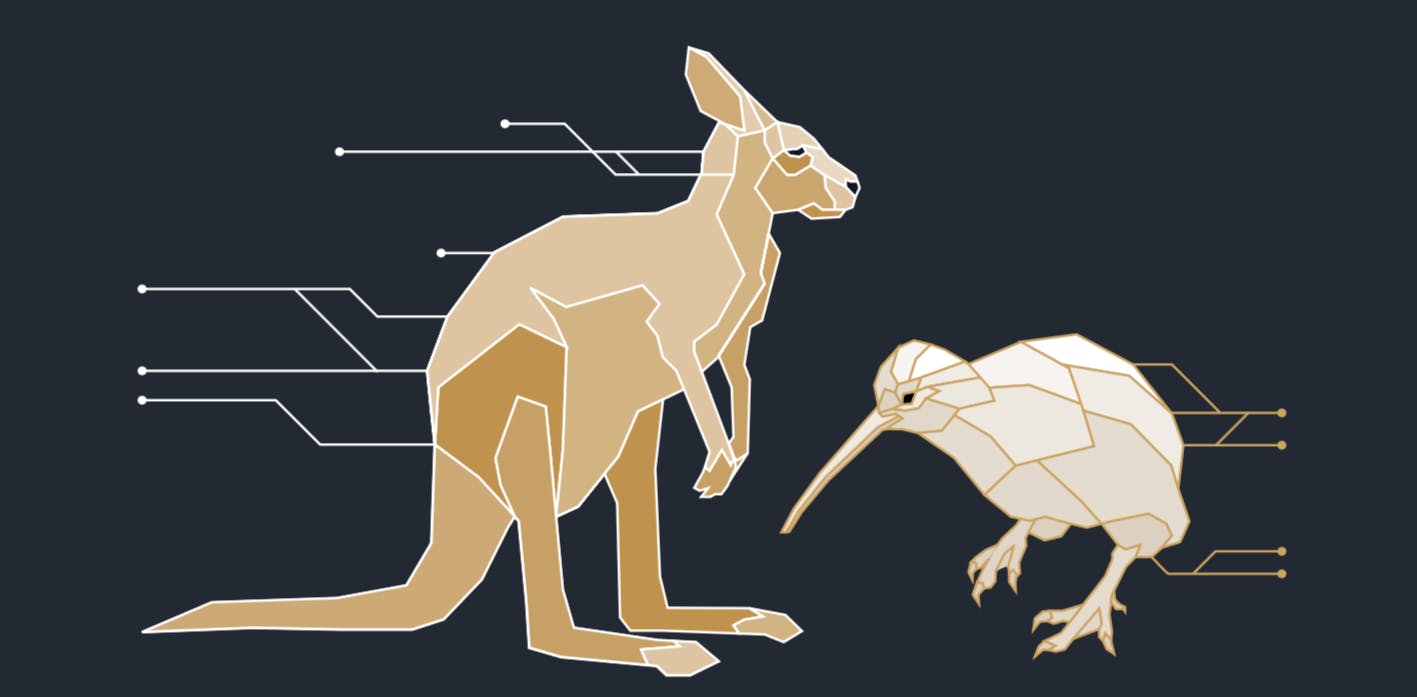
trends-and-insights
Equitise Placed in Top 50 Tech Pioneers Report
The 2016 Tech Pioneers report, has named Equitise as one of the top 50 pioneering startups across Australia and New Zealand. The report aims to showcase companies at the forefront of an ‘ideas boom’, and who will drive their respective industries and the Australian economy in the near future. Equitise’s placement on the list marks its position as one of the most exciting startups across Australia and New Zealand. “Each demonstrates the power of technology to disrupt the status quo and are helping position our region as a leading innovation hub.” - Malcolm Turnbull, Prime Minister of Australia How is the report judged? The report, produced by H2 Ventures and Investec Australia, selects the list of 50 pioneering startups by judging them against five criteria: total capital raised, rate of capital raising, location and degree of sub industry disruption, and the subjective rating of the degree of product, service, customer experience and business model innovation. In his introduction to the report, Prime Minister of Australia Malcolm Turnbull congratulated the top 50 companies, claiming they “highlight the importance of early stage capital for startups to be able to invest and grow.” He also states that the Government’s new National Innovation and Science Agenda, offering a 20% tax offset and capital gains exemption, makes early stage investment more accessible for startups. “Technology is breaking down barriers, making it easier for local businesses to access new and increasingly wealthy markets across Asia.” - Malcolm Turnbull, Prime Minister of Australia What do these companies offer? The list, which features many genres of startups, demonstrates the innovation and technological advancement that increasingly drives the Australian economy. Equitise’s place on the list marks it as a leader in the Fintech marketplace, with its offer of “capital from the crowd” enabling Australia and and New Zealand startups to raise capital in an intuitive, simple and social way. Digital disruption via companies like Equitise is driving the Australian economy, and the Tech Pioneers Report acknowledges those companies leading the charge. Want to see the other Tech Pioneers? To find out more about the 2016 Tech Pioneers report, and to read its profile on Equitise, visit the Tech Pioneers website. Equitise is proud to be placed among the most exciting and pioneering startups across Australia and New Zealand, and looks forward to being a part of the new generation of digital disruptors.
April 15th 2016

trends-and-insights
New Zealand Early-Stage Investment: a Record Year
The New Zealand Venture Investment Fund (NZVIF) has released their latest figures on early-stage investment in New Zealand, highlighting a flourishing industry. 2015 saw a record year in terms of investment volume and international interest in Kiwi companies. At $61.2 million, 2015 saw the highest level of investment in early-stage companies on record. Up from $56.4 million the year earlier, New Zealand is now demonstrating a strong base of angel investors and venture funds. Last year’s level of investment is three times the amount in 2006, clearly illustrating the significant growth the industry has seen. International interest on the rise A highly encouraging sign is the increased level of foreign investment in New Zealand enterprises. Four companies raised a total of $7.2 million from overseas venture capital firms and a further three companies secured $7 million from overseas angel networks. Equity crowdfunding is also playing a part, attracting significant investment from across ‘the ditch’. “…New Zealand is increasingly on the radar for international investors looking for opportunities. Offshore investment brings capital and access to networks and markets, and widens the shareholder base for companies.” - Chris Twiss, Director, NZVIF Internationally investors are savvy and discerning, this level of international interest demonstrates the reputable and coveted position New Zealand companies enjoy. Offshore investment provides our market with extra liquidity and expertise, and brings breadth to our investor base. “The market for capital is global and these results illustrate that New Zealand companies are internationally competitive.” - Marcel van den Assum, Chair, NZ Angel Association Equity crowdfunding's role Equity crowdfunding’s arrival in 2014 has been welcomed by companies and investors alike, and has been responsible for significant levels of investment in the industry. In 2015, four companies raised $3.1 million in funding through equity crowdfunding platforms, from New Zealand and abroad. The two years with the highest levels of early-stage investment over the last decade, directly correspond to period where equity crowdfunding’s been in existence in New Zealand. As the fintech market matures and equity crowdfunding becomes more mainstream, we believe this area will begin to dominate angel investment and venture capitalism. Where was it invested? Of the $61.2 million worth of investment in 2015, 60% went to the software and services sector. This figure was lower over the period of 2006 to 2015, with software companies receiving only 39% of total early-stage investment. 2015’s increase illustrates New Zealand’s increasingly active and growing technology industry. The next largest sectors were pharmaceuticals, technology hardware and equipment, and food and beverage. Unsurprisingly, Auckland dominated the investment landscape, scooping up 54% of the total funds; Christchurch and Wellington received 11% each. What is NZVIF? The NZVIF was a government initiative, established in 2002 to encourage early-stage investment in New Zealand. The $300 million under management are invested through venture capital funds and angel investors. That’s it from us, stay tuned for further updates on developments and trends in the industry.
April 13th 2016

trends-and-insights
Equity Crowdfunding and Net Neutrality: A Love Story
Net neutrality. This once foreign concept that sounds straight from the Matrix, is now defining the way we work, play, and absorb the internet. The striking thing is that many of the internet’s current users don’t understand how. The concept? At its core, net neutrality is the principle that Internet Service Providers (ISPs) should provide equal and open access to all websites, without favouring those that pay for higher speeds, or discriminating on the basis of content. This notion governs the way we operate online, and the content we view, at its core ensuring the guarantee of free speech If ISPs were to pander to companies paying more for better access, content and opinions showcased on other websites unable to pay would be redistributed onto a slower strand of internet. This segregation of the internet is what net neutrality aims to avoid. Legislation of the internet is essential to maintaining net neutrality, otherwise ISPs may reject content they dislike, block apps that are competitive, and relegate unpaying content providers to a slower band of internet. The internet as we know it wouldn’t exist if ISPS charged for content and allowed corporations to have priority treatment. "It’s like FedEx. You pay a certain amount for overnight delivery and a certain amount for two-day delivery. You could end up with something like that for the Internet." — Philip Weiser, Dean, University of Colorado Law School on a the subject of losing net neutrality How is it implemented? Last year in the US, the FCC voted in favour of strong net neutrality rules geared towards maintaining a free and open internet. Having received a staggering 4 million submissions in relation to the FCC’s net neutrality proposal, the Open Internet Order was passed which was designed to prevent Internet service providers from blocking or slowing users’ connections to online content Governments face opposition to such legislation from corporations with obvious vested interests. Some find ways to circumvent this – for example, Facebook’s recent provision of internet to many parts in India has been skeptically interpreted as a method of asserting online dominance there. To avoid this, or other instances of a singularity of internet content, governments are increasingly regulating internet in the same fashion as utilities. Why is this good? A neutral net will creates democratic participation on the internet and upholds freedom of speech. It also ensures that media power is not concentrated in the hands of a wealthy few, allowing small players equal opportunity. By keeping the internet free and open technology, we avoid losing diversity and innovation and instead foster democratic communication. Equity crowdfunding was built with the aim of assisting small and medium-sized businesses with gaining access to capital. In the same way equity crowdfunding has democratised finance, net neutrality is democratising the internet. Net neutrality shares equity crowdfunding's ethos: to create a level playing field for all participants.
April 3rd 2016

trends-and-insights
The First Crowdfunded Unicorn?
90% of startups fail. 50% of all businesses fail in the first five years. 40% lack the market need for their product. With a seemingly ceaseless flow of statistics out there which could have the potential effect of discouraging entrepreneurs, it’s no wonder more hopeful stories of success catch on. The notion of the ‘Unicorn’ – the $1 billion startup, is therefore an appealing one to start-up founders, repositioning the idea of billion-dollar idea technology from the realm of fantasy into a realistic prospect. We all know the Unicorn List of billion dollar startups, Uber, Pinterest, Snapchat, etc. and how their fortuitous alignment of timing, concept and demand resulted in unprecedented success. General Motors' acquisition of Cruise Automation Joining the ranks of these businesses comes the first Unicorn with a crowdfunding history, providing further proof, if needed, of the new horizons of equity crowdfunding. General Motor’s acquisition last month of self-driving tech startup Cruise Automation, from start-up capital San Francisco, means a crowdfunded company has joined the list of Unicorns. The deal, valued at north of $1 billion, had VC funding from a variety of firms. However, the developer of autonomous vehicle technology also gained investment from AngelList, a crowdfunding platform. GM has already demonstrated its increasingly innovative investment ethos through its $500 million investment in ride-sharing startup Lyft. With institutional investment, VC funding, and investment from its pair of AngelList syndicates, the deal has garnered much attention and discussion. With the appearance of being the first $1 billion exit for a startup using crowdfunded equity, in the form of two $100k injections from Zach Coelius and Tikhon Bernstam, the capabilities of AngelList investment are highlighted. Crowdfunding's rise in influence The ascent of the equity crowdfunding market since its inception has been well-documented, and no statistic better illustrates its success as Massolution’s valuation of the market of $34 billion in 2015. Its disruption of the market is clear. Interestingly, last year saw the Fintech sector experience its own unicorn, with Funding Circle achieving a $1 billion + valuation, with a $150 million funding round. The ‘crowdfunding effect’, the generalised moniker given to this type of disruption caused by large equity crowdfunding deals, demands a response from VCs and other traditional investments. Entrepreneurs have access to a new breed of deals, channelling their funds through an array of high-growth oriented platforms, as equity crowdfunding disrupts the investment chain. The final word With crowdfunded equity bringing ambitious entrepreneurs to the deal table for companies like Cruise, which tap into a distinct technological zeitgeist, the next crowdfunded unicorn may not be so far off. As the rise of crowdfunding continues to account for more and more investment, looking to one day usurp venture capital and angel investing, the likelihood of more crowdfunded unicorns is great.
March 25th 2016

trends-and-insights
Crowdfunded IPOs: Bringing the “Public” Back into IPOs
With the first public listing of the Dutch East India Company on Amsterdam’s stock exchange, an initial public offering (IPO) presented an opportunity for the general public to own shares in a company (see our post on IPOs). Nowadays, the vast majority of shares being offered in IPOs are sold to institutional investors and banks, however things may be beginning to change. Australia’s First Crowdfunded IPO Last year, Equitise successfully closed the first crowdfunded IPO on the Australian security exchange (ASX). In tandem with the traditional roadshow, the IPO of the Chinese agricultural giant, Dongfang Modern, was partially crowdfunded on Equitise’s platform. This demonstrated to the market something that was until last year only theoretical for equity crowdfunding. Why Crowdfund an IPO? Investor Spread One of the requirements a company must meet to list on the ASX is obtaining a minimum number of shareholders. This is known as investor spread, and is necessary to ensure the company has sufficient liquidity and trading activity, allowing the market to operate efficiently. For companies such as Dongfang Modern that have a very concentrated shareholder structure, obtaining the required spread can be a hurdle. To achieve this in the past, complicated structures such as back end listings have been required. Opening IPOs to the crowd is an innovative way to obtain this required number of shareholders. Mum-and-Dad Investors In New Zealand, a number of state-owned enterprises were partially privatised through IPOs between 2012 and 2014. There was a strong push to encourage everyday, mum-and-dad investors to participate; the government allowed investors to bypass brokers and invest directly. We see equity crowdfunding as a tool to bring this benefit to all IPOs. Everyday consumers aren’t usually inclined to seek out brokers and therefore miss out on opportunities to become retail investors in this way. Equity crowdfunding’s online model provides easy and transparent access to investment opportunities, avoiding the costs and inaccessibility of traditional brokerages. In addition, some countries require minimum portions of an IPO to be available to the general public. Both Hong Kong and Singapore require all IPOs to have 10% of shares reserved for the general public. In the future, equity crowdfunding could prove to be a boon for companies to achieve these minimum public ownership requirements. Democratising Finance In Australia, around 33% of the general public directly own shares; in New Zealand, this figure is around 26%. Compare this to the United States where around 55% of the general public invest in the share market. We see this as a clear need for greater access and ease in the Australian and New Zealand markets. Partially crowdfunding IPOs is in the spirit of equity crowdfunding’s roots: the democratisation of finance. In the UK, two key finance bodies, the Financial Conduct Authority (FCA) and the London Stock Exchange (LSE), have made important moves to facilitate crowdfunded IPOs. The FCA has approved a crowdfunding platform to act as an IPO intermediary and the LSE welcomed another platform as an official intermediary. Both moves are strong signals from authorities recognising alternative finance’s important role in the capital markets. Including crowdfunding in IPO campaigns highlights the breadth of equity crowdfunding’s capabilities and a significant step in its journey towards becoming a mainstream finance option. With a healthy pipeline of IPOs in our key markets of Australia and New Zealand, Equitise predicts that equity crowdfunding’s involvement in capital markets will only deepen over the coming years and prove integral.
March 18th 2016

trends-and-insights
Asia-Pacific Alternative Finance Report
KPMG has released the Asia-Pacific Alternative Finance Benchmarking Report, encompassing 500 platforms in the Asia-Pacific region – and it’s good news for Equitise. The report underscores the nascent popularity and potential of equity crowdfunding in the ASEAN area, with the Australian market in particular developing rapidly. The key details The rapid growth and reach of the alternative finance industry is spelled out in the report’s figures – US$101.7 billion in online alternative finance transactions registering in China over 2015 alone. 2015 also marked a banner year for Australia, with the market growing over 320% to US$348 million. Australia is the third largest market in the region, indicating its abundant potential. New Zealand's position The Report’s outline of the New Zealand market in 2015 also informs our assessment of these Australian figures. As one of the smallest countries in the Report, New Zealand nonetheless has a large industry on a per capita basis, and with growth of 1117%, is one of the fastest growing markets in the region. If equity crowdfunding platforms had the capacity to mirror this success in a newly-regulated Australian market, the growth would be stratospheric. Australia's regulation still lagging Unfortunately, as the Report also states, such regulation is still sorely lacking. According to the report, 30% surveyed viewed the proposed regulations as too restrictive and excessive. Only 48% considered them adequate and appropriate. Until platforms in Australia are able to operate under a similar framework as exists in New Zealand or Malaysia, the Australian market’s potential cannot be harnessed. Equitise has delivered submissions to the Australian government in that regard. The Report, too, acknowledges that in New Zealand the “national regulators have taken a more proactive stance by formulating bespoke regulation to accommodate alternative finance activity”. The same is not said of Australia. The ratio of total funding in New Zealand is approximately 5 times that of Australia, which, according to the Report, demonstrates the level of market penetration in New Zealand. Once the Australian market has been fully harnessed, these figures can be expected to change. How is Equitise positioned? As the first trans-Tasman equity crowdfunding platform, Equitise seeks to encourage an innovative and competitive regulatory framework that balances financial innovation alongside consumer interests. When this has been achieved, Equitise can assist in the expansion of Australia’s $348 million alternative finance market. As the alternative finance market continues to expand across these territories, Equitise will be able to offer Australia and New Zealand-wide offers. Equitise will broaden investment opportunities across the untapped potential of the Australian market, and increase the investor pool for Asia-Pacific companies. Since inception, Equitise has been a though-leader in the industry, providing market commentary and advising on the proposed Australian regulatory framework. This has given us a unique position in the industry and firsthand understanding of its impact and reach. This knowledge, coupled with a track record of trust and confidence from New Zealand transactions, demonstrates its capacity as the leading equity crowdfunding platform in the region. With institutional investment arriving, such as that from Investec, Equitise is ready to shake up the alternative finance market in Australia and beyond in 2016.
March 14th 2016

trends-and-insights
2016 Wintec Innes48 Business Startup Competition
Our friends over at SODA Inc have commandeered our blog to announce this year's Wintec Innes48 Business Startup Competition. NZ's largest of its kind, the 48-hour event offers a platform to connect with like-minded entrepreneurs, mentors and industry experts. SODA Inc is a business incubator doing great things for Kiwi entrepreneurs and innovators. We're excited to see the businesses and ideas that are showcased at this year's event. The 2016 Wintec Innes48 Business Startup Competition is fast approaching. This weekend's event sees 15 teams and over 80 participants from across New Zealand compete, create and execute business propositions in just 48 hours. “Just one weekend can have a lifetime of impact. If people choose a career in entrepreneurship because of an event like this, then the impact is astronomical. We are talking about multiple businesses, many jobs, and significant value creation. The energy you get from this event, the optimism and the excitement, you go back to your work station and you are flying.” Mick Liubinskas - 2015 Innes48 Speaker & Co-founder of Pollenizer “Innes48 was literally a life changing experience for me. It exposed me to more business experience within one weekend than i’ve had over years. Competing with so many like minded entrepreneurs and having such smart mentors that were so willing to help you out was amazing. I left the innes48 with so much knowledge, many connections and feeling more empowered than ever to one day start my own successful company.” Abbie Naylor - 2015 Innes48 Participant Reflecting on last year’s event we had some key learnings: Flearn Fail + Learn = Flearn During the opening ceremony, the teams, judges, mentors and guests were entertained and inspired by a stellar line up of guest speakers, including Australian Startup Guru, Mick Liubinskas. He and his colleagues at the Sydney based incubator Pollenizer created the term Flearn. The buzzword describes the process of embracing the learning’s during failure to ultimately achieve success. In simple terms, the key steps for flearning are Experiment, Fail, Learn and Repeat. Mick believes every failure is valuable and the more times we fail, the more opportunities we have to do things better, as long as we learn from each failure! He also emphasised the need to flearn smarter and faster. By creating ways to fail faster and more efficiently, we save valuable time and money, and figure out how to earn more. A great tool to accompany this process is the Experiment Board (a by product of the Validation Board). This is a useful video to step you through how it works. Focus “Focus is the biggest differentiator between startup companies who get big and ones that die.” Shortly after Mick’s talk on Flearning and before the 48-hour challenge officially kicked into gear, the participants were treated to more of his handy tips in a Find Your Focus workshop. Mick has gained the title of ‘Mr Focus’ due to his strong drive for starting small and fast, embracing failure on the road to success and avoiding entrepreneurial distractions. Speaking of distractions, this was a key topic in Mick’s workshop. As entrepreneurs, we are ideas people unafraid to take on the world. Sometimes our enthusiasm for wanting to do more (/everything) does more harm than good and takes us further away from success. Mick encourages people who are starting up their new business to narrow their scope to avoid being “a mile wide and an inch deep”. Focus means to pick one thing and do it well, Mick says. Mick admitted that “Focus is Hard” and that the gap between the starting point and reaching the big vision is the challenge, but focus will help you get there. “Lack of success relates to a lack of focus,” so channeling this ultimately leads to better productivity and success. Business With Purpose One of the highlights of the 2015 Innes48 was an inspiring speech from lifestyle entrepreneur Robett Hollis. His bio generated a lot of social media attention and in it, Robett tells us that while he was growing up on the dole in Aranui, Christchurch, he failed high school and got grades so bad that he couldn’t get into any universities. He has no degrees and pretty much zero qualifications, except for a Diploma at Chicago’s Hot Dog University where he passed with flying colours…. seriously. Despite this, Robett is now a successful entrepreneur who owns several media interests including FRONTSIDE, a Video Production Partner for clients like Air NZ, Veuve Clicquot, Heineken, and an App development arm and NZ’s Largest Action Sports Network complete with its own half hour TV show. During Robett’s speech, he touched on a topic that really hit home. In an emotional reference to how much he admired his wife who works as a paediatric nurse, he stressed that no matter how successful we may get, if there is nothing in our lives with real purpose, then life can be a bit meaningless. "Always be passion driven and $$$ will be a by-product. If you chase $$$ first, you may get rich but I can guarantee you won’t be totally happy. Pursue the passion - not the by-product” - Robett Hollis He also talked about keeping things in perspective and not letting stress get the better of you. “At the end of the day, if you don’t get that piece of work to the client, no one is going to die (only, doctors, nurses & surgeons have that problem), so think about that” he told participants. Serial entrepreneur and professional company director Melissa Clark-Reynolds was the third keynote speaker at this years event. One of Melissa’s most successful companies Fusion, a health and safety consultancy, became New Zealand’s largest private accident compensation insurer. So business success is no stranger to her. Successes aside, Melissa also reminded us in her speech that business with purpose is important. She encouraged the participants to think about ‘business with purpose’ when starting or growing their companies and highlighted the idea that a business with purpose can lead to a personal sense of contentment as well as entrepreneurial success. Business with purpose often means the end business goal extends to something larger than your own success, but a success that can improve the lives of others. To build a company with a powerful commitment to social impact often helps maintain motivation, momentum and growth within a team. A great example of a successful business with purpose is TOMS, a US shoe store whose business model features a ‘one for one’ process where for every pair of shoes purchased, an extra pair of shoes is sent to a person in need. In Summary The team at SODA Inc. (a founder focused incubator) have worked hard to build a neutral platform for participants to connect with likeminded individuals, learn business fundamentals, execute rapidly, win cash & meet experienced mentors. Applications are open to all ages & experience levels. To give you an example, last year 42 teams applied and in those teams we had; Mums, Dads, Grandparents, Experienced business owners, Tertiary students, High school students and Internationals (applications came as far away as India). The process to apply happens like this: 1. Get a team together (min 2, max 8)* 2. Submit your online application with a 60sec video (deadline is 3 April) 3. 20 teams will have an interview (4 April) 4. 15 teams will receive the Wintec Innes48 Grant and will be able to compete 5. Team Orientation (7 April) 6. Compete in Innes48 2016 at the Wintec Atrium, Hamilton (8-10 April) *if you can't pull a team together but still want to compete please email [email protected]. We might be able to help you form a team. For more info: http://www.innes48.com To apply: http://www.innes48.com/apply-now
March 13th 2016

trends-and-insights
The Most Successful Crowdfunding Campaigns
From crowdfunded parking lots to banking institutions and a German coffee brewing system, the last three years have revealed the galaxy of possibilities afforded by crowdfunding. The Beauhurst report “The Deal – Equity investment in the UK year 2016” states that crowdfunding platforms continue to dominate the investor ranking, with Seedrs and Crowdcube taking the first and second place on the podium. The two crowdfunding platforms are responsible for 86% of all crowdfunding activity and for 21% of all equity investments in the UK. Seedrs stated that during 2016 more than £85m was invested in 159 campaigns by investors from 65 countries. Below are some examples of the most successful crowdfunding campaigns of the last three year, hosted by some of the major crowdfunding platforms. BONAVERDE In June 2017, German coffee startup Bonaverde has successfully completed its equity crowdfunding round on Seedrs. The company was seeking £750.000 but within the first month it had already exceeded its target and concluded the round with more than £1.3m. PERKBOX AND WESWAP In October 2016, a record of £20m was raised on Seedrs. £4.35m of the amount was invested into employee and customer engagement provider Perkbox, becoming the biggest fundraise on the platform since launch. In the same month, investors backed peer-to-peer travel money platform WeSwap, raising over £2.4m, setting the record for the most investors in a single campaign. MONDO Mondo, a UK neobank, took the record for the world’s fastest equity raise not just on a crowdfunding platform – but ever - £1 million was raised in just 96 seconds on Crowdcube. Changing the name to “Monzo”, in 2017 the digital bank has raised an additional £2.46m, from more than 6,800 investors – the highest number on Crowdcube. Mondo’s model, a 100% digital bank that uses modern technologies and AI to learn from its customers, has obvious popular appeal which has prompted its promising success. According to a report published by Allied Market Research, neobanks are believed to progressively and significantly grow in coming years. This new type of banking services is developing globally. In Australia one of the first 100% digital (soon-to-be) bank, Xinja, will start a capital raise on the equity crowdfunding platform Equitise. As soon as the platform acquires its license to operate as a retail equity crowdfunding platform, anyone in Australia, from as little as $250, will be able to access this exciting investment opportunity. [Like all investing, there is risk involved so make sure you consider the offer document and the general risk warning.] JUSTPARK Manifesting just what can happen when users’ interests align, JustPark is the soaring startup allowing individuals to rent their parking spaces to those nearby. As the largest equity crowdfunding raise in UK startup history, JustPark walked away from their 2015 round with £3.7 million raised by 2,919 investors. ASSETZ CAPITAL Equity crowdfunding platform Seedrs saw its largest raise of 2015 with the peer-to-peer lending platform Assetz Capital. Assetz Capital, which provides loans to SMES and property developers in the UK, raised £3.2 million, enabling it to double employees and launch international ventures. Less than two and a half years after this success, Assetz ran another round on Seeds to raise more growth funds, raising a total of £1.6 million in October 2017. Seedrs by Seedrs Beating itself at its own game, Seedrs joined in on the action and raised £1 million through its own platform in 2015. Achieved in a single morning, this meta-funded raise provided the necessary working capital for our pioneering friends at Seedrs, who continue to set the rules of the crowdfunding game. Chilango At a staggering £3.4 million from 1,500 investors, this raise for the Mexican fast food chain was the second biggest raise of 2015. From Costa Coffee executives to venture capitalists’, Chilango launched an impressive campaign which was of interest to many different investors. Camden Town Brewery What’s better than raising almost £3 million (£2,750,860 to be exact) from 2,173 Crowdcube users? It could be that just after the raise, Camden Town Brewery was then bought out by beer giant Anheuser-Busch InBev. The company and its investors certainly had a good 2015. eMoov Proving that real estate software and crowdfunding go together like lawns and white picket fences, eMoov raised £2.6 million through in October 2015. One zealous investor was so moved he put £575,000 into the project. This overview of the top crowdfunded capital raises from the last few years shows the developments in the fintech industry as the market continues to push the boundaries of innovation, redefining its capabilities and giving eager investors the platform to invest in exciting businesses they believe in.
March 9th 2016

trends-and-insights
Equity Crowdfunding in 2016
As an early Easter present, Beauhurst has released ‘The Deal’, its 2015 report on UK high growth companies and their investors. In good news for crowdfunding platforms everywhere, the report clearly states that “crowdfunding’s impact is now really being felt”. Analysing and breaking-down announced and unannounced deals in the equity crowdfunding market, Beauhurst outlines the elevation of this market as it continues to sideline private equity and private investment vehicles. We have summarised the key findings from the Beauhurst report. Another Record Year The report, which monitors equity fundraising transactions across the UK, compiles trends across the industry, as 2015 represented “another record year for equity investment into the UK’s fast-growth companies”. One of the most striking statistics to be drawn from the report pertains to equity crowdfunding platforms as a whole. The number of deals for such platforms increased 45% across 2014 and 2015. This bodes well for 2016, as entrenched faith within this mechanism of fundraising should lead to another record number of deals. Consequently, the report anticipates that “crowdfunding platforms’ deal sizes will also grow.” Ultimately, Beauhurst concludes that Private Equity and Private Investment vehicles have taken a hit as crowdfunding platforms’ growth continues its vertical climb. Three Key Trends 1. The mobile app market is not what it used to be (but that’s not a bad thing): The drop-off in equity investment for mobile app companies demonstrates not that the market is slowing, but that it’s evolving. In 2015, payment processing, health apps and education apps secured the most successful investment in this crowded market. 2. Seedrs continues its march towards crowdfunding/world domination: Crowdfunding dominates seed-stage investment, with Seedrs topping the list of top investors. This reflected a successful year for an increasingly ubiquitous Seedrs, who also marked second place in venture-stage investment, occupied the top place for technology investment, conducted the most transactions in London and were declared the most active investor in the Business & Professional Services Market. 3. Technology doesn’t just rule our lives, but also the equity crowdfunding sector: Technology remains the number one sector for equity crowdfunding, occupying 35% of all activity – however leisure and entertainment saw an impressive 27% climb in deal numbers, the largest of any sector. What else should we be aware of? Also notable amongst the report’s findings is that the average fundraising amount for seed-stage companies rose to £650,000. This is an impressive amount, and a gesture of faith, as venture capitalists inject increasingly high sums of cash. The formula for success is set out clearly by Beauhurst, as the report delineates that this new confidence in equity crowdfunding is vital: “larger investments earlier on can mean a new business is less likely to run out of runway and will therefore be more likely to succeed, thereby encouraging new investors”. In other words, everybody wins. All in all, Beauhurst predicts a total amount of £4.8bn in announced investment for 2016. Interestingly, this sum shows only the tip of the proverbial iceberg, with unannounced deals in high-growth companies comprising an altogether larger figure. As a result, Beauhurst states, the proliferation of equity crowdfunding among these companies is “approximately 127% larger than previously estimated.” This figure of unannounced investment ranges not only across new fast-growth companies, but more established and aged businesses. This demonstrates market-wide confidence and growth. 2015 showcased the defining trends of equity crowdfunding expansion, permitting insights into the industry’s future. As equity crowdfunding continues to jostle with private equity as a leading player, reports such as Beauhurst’s allow us to handle the reins of the platforms as they continue to change the game.
February 27th 2016

trends-and-insights
Alternative Finance Industry Update
Earlier this month, the University of Cambridge Centre for Alternative Finance in conjunction with Nesta released their 2015 report on the development of alternative finance. With a focus on the UK, the report, entitled “Pushing Boundaries”, highlights the enormous growth the industry experienced last year. Let us step you through the important trends and movements in the industry. Highlights: UK alternative finance reaches £3.2 billion Overall, the UK online alternative finance industry grew 84% to £3.2 billion in 2015. Zoom in and we see a staggering 295% growth in funds raised on equity crowdfunding platforms, up from £84 million raised in 2014 to £332 million in 2015. Equity crowdfunding contributes 16% of UK venture financing Of the total £332 million raised on equity crowdfunding platforms, £245 million went towards venture financing, estimated as representing 15.6% of the total seed and venture-stage investment in the UK. This is a powerful statistic, highlighting the importance and growing reliance of equity crowdfunding in early-stage investment. Key movements in the industry: Real estate is hot The most popular niche of alternative finance in 2015 was online real estate financing. The combined debt and equity used to finance investments and loans for real estate amounted to £700 million. Peer-to-peer real estate lending for businesses now represents 41% of total volume of peer-to-peer business lending, the average size of which was £522,333. Interestingly, the equity-based real estate financing model saw a larger average loan size of £820,042. See our post on real estate crowdfunding for more information regarding this model. Small businesses are winning 20,000 SMEs raised alternative finance through online channels, receiving £2.2 billion in business funding. Taking a closer look, small business peer-to-peer lending represented approximately 13.9% of total new bank loans to small businesses in 2015. Total online business funding rose by 120% and, even more encouraging, total number of SMEs being served increased by 186%. The total alternative business lending to SMEs reached £1.82 billion and represents an area where institutional lenders' market share could be challenged - as it stands, this represents only 3.4% of SME lending by UK banks, up from 0.3% in 2012. Speaking of institutional investment: Big movements have been seen in this space over 2015 - institutional investors have ramped up their involvement in the online finance market and now represent a significant presence. No area shows this significance more than in the peer-to-peer lending market: 32% of consumer peer-to-peer lending and 26% of business peer-to-peer lending in 2015 was funded by institutional investors. Investment came from private institutions such as mutual funds, hedge funds and traditional banks, as well public institutions such as local authorities and the British Business Bank. What are the biggest issues facing the industry? The largest risk to the future growth of the market, according to UK alternative finance platforms, is platform fraud or malpractice. The report noted, however, that to date systematic fraud or malpractice has been extremely rare at the platform level. The likelihood of this occurring is dependent on platforms' own efforts to reduce it and transparency for investors, backers and donors. The online alternative finance industry continues to develop in an encouraging and exciting manner, "pushing boundaries" of market growth and innovation. The tremendous power of the industry in democratising finance is clearly shown through the positive developments in small business and real estate financing. We expect 2016 to be another big year echoing the UK's success, as regulators, investors and businesses around the globe continue to embrace alternative means of finance.
February 24th 2016

trends-and-insights
Are the Proposed Tax Incentives for Early Stage Investors Really That Attractive?
Australia has made a step in the right direction into becoming an “ideas and innovation ecosystem”, however, the reliefs offered to investors and backers of early stage businesses are fairly unfavourable compared to the SEIS and EIS relief offered in the UK. It is well documented that the Australian government has used the UK approach as a case study, but has inserted some conditions that potentially drive more investment towards the riskiest of businesses (of which more are likely to fail) rather than incentivise smaller/fast growing existing businesses which have a lot more potential and proven records. TAX RELIEFS ARE WELCOME, BUT COULD BE BETTER The 20% tax relief level offered (in the form of a refund) is generous compared to a historic 0% relief, but unfavourable compared to the 50% Seed Enterprise Investment Scheme (SEIS) relief offered in the UK (on the first £150k raised by a company) and the 30% Enterprise Investment Scheme (EIS) relief offered (on the first £12-20m). The 20% is also capped to a max claim of $200k per year in Australia, compared to £100k SEIS and £300k EIS (c. total $800k pa) in the UK. It is unclear on how losses on these investments would be treated in Australia, but they do have significant favourable treatment within the UK. THE UK IS FLEXIBLE AND NON-DISCRIMINATORY A concern around what makes an investment eligible for tax relief is around the assessable income of the previous year being less than $200k, and expenditure of less than $1m in the previous income year. In the UK, companies can continue to raise successive SEIS and EIS rounds for as long as they stay within the limits, which enables a company to entice new investors with favourable incentives across multiple rounds, with the assumption that as the business gets bigger and the valuation goes up, the chances of failure reduce. Investors within the UK normally have different risk appetites, with some not entering a company prior to it having a non-insignificant amount of revenue to those who will invest just in an idea. These smaller and medium sized businesses (SME) are still the bedrock of the British economy, creating jobs and profitable companies, and the UK government rewards investors who invest in these SME businesses with generous incentives. WHAT ABOUT AUSTRALIA? The conditions set out by the Australian government (especially the assessable income in the previous year being below $200k) is only providing incentives and concessions for the earliest stage businesses – of all companies, these are the most likely to fail. By offering the reliefs to only on these very early stage businesses, the government is essentially encouraging investors to invest in businesses that are very likely to fail, rather than encouraging them to invest in small businesses, which have a significant proof of concept, a small number of sales (but over $200k) with huge growth potential, which are much more likely to create a stronger Australian economy in the future through job creation and higher tax revenue. It is not to say investors won’t invest in these businesses anyway, but offering a 20% tax relief on the earlier stage ones will certainly give them something to think about. I believe that following the UK model/guidelines here would be much more effective in attracting investment toward more successful earlier stage businesses. WILL INNOVATION FUNDS HELP DRIVE AUSTRALIAN INNOVATION? Innovation funds are a clever wrapper which can be used to invest in early stage businesses, benefit from the tax relief where the company qualifies, and pass this on to the fund investor. The concern I have with this, is that these funds can be expensive to manage (require staff to run, find qualifying companies and make investment decisions etc) and need to be making sizeable investments to get sizeable returns, relative to the costs of running these funds. The criteria for qualifying companies suggests this will be applicable to very early stage companies with lower valuations – even raising $1m might be near the top of what the majority of companies who meet these criteria could raise. Due to such funding round sizes, the innovation funds will need to make a large number of investments to deploy all their investible proceeds, putting pressure on them to deploy their funds in a large number of investments, which may dilute the quality of their investments. This, of course, assumes funds are set up specifically to only invest in companies where this concession is available (see MMC and Octopus Ventures in the UK for example). I am also speaking generally here, as not all companies will struggle to raise $1m – some will raise more, many less, but the numbers involved are likely to be smaller compared to EIS eligible rounds in the UK, thus making it difficult for innovation funds that are set up specifically to invest in these types of qualifying companies, to deploy their proceeds if they are of a significant size ($20m+ etc). CAN ALL AUSTRALIANS PARTICIPATE IN INNOVATION? There are concerns around the citing that this could potentially be only available to sophisticated investors. On the one hand, I accept these are the riskiest of investments, however, I believe the average person is fed up with not being able to access investments which can generate supernormal returns. To exclude someone based on their assets or salary level implies that you are unable to understand the investment, potential and risks if you are not sophisticated. This is an exclusion policy which will likely be unpopular. These investments are inherently risky, and education around the risk of them should be communicated when a company is raising any funds (regardless of concessions/tax relief). However, I do believe that people should be able to invest what they are able to lose, without expecting a return as given. This could be performed by way of a cap on investments (say $10,000) for an unsophisticated (retail) investor, which will allow wider investment participation. Within the UK, there are no restrictions on who can invest in an EIS and SEIS company. Crowdfunding within the UK would likely be many times smaller and less successful than it currently is, were it not for the generous tax reliefs and inclusive environment in which any investor can access a new opportunity. For a more detailed analyses and comparisons between Australia's Innovation Statement proposals and the UK's SEIS/EIS, click here: Comparisons Table ~ Anthony is the former COO of ActivInstinct (formerly Millet Sport), helping to transform the online business with online sales of £2m with heavy losses, into a business with £35m in annual turnover. Prior to his involvement with ActivInstinct, Anthony was an Associate Director at the international investment bank, UBS. Anthony has now relocated to Sydney, Australia and is currently on sabbatical, following his passion for advising, mentoring and investing in small to medium sized businesses. If you'd like to connect with Anthony, please refer to his Linkedin profile at https://au.linkedin.com/in/anthony-millet-9327713
February 18th 2016

trends-and-insights
Equity Crowdfunding and your Super
Equitise’s home-turf, Australia, offers an interesting alternative to a standard superannuation scheme: the possibility of self-managing your retirement fund. Rather than placing your savings in a professionally managed fund, a self-managed superannuation fund (SMSF) provides greater control and discretion over your retirement savings. SMSFs have risen in popularity over the past decade and are now the single largest superannuation sector by dollar value, surpassing the retail fund sector. How does equity crowdfunding play a role? Having access to a broader range of investments is often a reason for starting an SMSF. Through an SMSF you can invest in the usual investments such as shares, term deposits, managed funds and property. Beyond these investments, an SMSF can also hold alternative assets such as antiques and artwork, and, crucially, shares purchased through equity crowdfunding. “About 40 per cent of the money going through our transactions is Australian SMSF and high net worth-type investors” – Equitise’s Co-Founder and Managing Director Chris Gilbert Equitise has experienced a high amount of investment from Australian SMSFs. This, we expect, is due to the slow response of Australian regulators to the global surge in popularity of equity crowdfunding. In Equitise’s second market, New Zealand, regulation has allowed “mum and dad” investors to invest through equity crowdfunding platforms, however Australia restricts this to ”sophisticated”, high-net-worth individuals. Consequently, SMSFs present an exciting opportunity for Australian investors who do not satisfy the criteria of a “sophisticated” investor. Until Australian regulations catch up with their counterparts around the globe, SMSFs are providing Australian investors with an avenue into equity crowdfunding. How does it work? If you set up an SMSF, you're in charge – you make the investment decisions for the fund and you are ultimately responsible for the running and administration of the fund. It's a major financial decision and you need to have the time and skills to do it. The difference between an SMSF and other types of retirement funds is that the members of an SMSF are usually also the trustees. Accordingly, SMSFs are run for the members’ own benefit; members are responsible for complying with the super and tax laws. Consequently, SMSFs are best-suited to people with a large amounts of retirement savings, and extensive skills in financial and legal matters. How is Equitise accommodating SMSFs? Already, investors with SMSFs contribute a significant proportion of the investment through Equitise’s platform. We will continue to provide a broad range of investment opportunities – from seed-stage investments to established, mature companies – to bring portfolio diversity and drive private-company investment in Australia and New Zealand. Equitise is extending this, establishing a syndicate investment platform that would allow groups of like-minded investors to create their own investor club for new investment opportunities. This will allow groups of investors, including those self-managing their super funds, to make angel investments online, through an easy and transparent process. Furthermore, Equitise is planning to hold an Australia-wide roadshow to inform investment advisers and accountants of the symbiotic relationship between SMSFs and equity crowdfunding. Keep an eye out for further discussion on the Australian regulatory crowdfunding environment over the coming weeks.
February 6th 2016

for-investors
Risks of Private-Company Investment
Equity crowdfunding, like any investment, bears a certain amount of risk. Being aware of these potential risks can help you be more of an astute investor, less of a blind risk-taker. Are all companies on Equitise’s platform built the same? Gone are the days when crowdfunding was a tool used only by early-stage companies. Traditionally, equity crowdfunding was associated with young businesses, those generally carrying higher risk. Equity crowdfunding is evolving, however, and companies worldwide are beginning to view it as mainstream finance. Over the past year, Equitise has offered investors access to companies in the seed stage of development, right through to mature, established players. What does that mean for you? The wide range of investment opportunities now afforded by equity crowdfunding platforms is great for the investor in terms of choice and variety, but requires deeper understanding of the investment opportunities. As a general principle, the inherent risks associated with any investment tend to correlate to the returns they can generate; high risk ventures can see high returns, however they can also face high losses. Let’s break down the main risks you might like to consider before parting with your cash. Liquidity For the investor, liquidity refers to how easily you can “cash-out” of your investment. A “liquidity event” – not to be confused with liquidation - describes an exit strategy for investors to monetise their investment, for example an IPO (see our IPO post). The key consideration influencing liquidity is the company’s stage of development. Early-stage investments require investors to be in for the long-run, whereas investments in more mature companies, in a pre-IPO stage, are likely to see a liquidity event sooner. For the time being, there is no recognised secondary market for the sale of shares purchased through equity crowdfunding, however watch this space. Developments by authorities are seeing a greater focus being placed on the smaller, high-growth area of business. In New Zealand, the new NXT market (see our NXT post) provides SMEs, which cannot otherwise list on the main board due to their size, earlier liquidity for shareholders. Dilution This refers to the proportion of a company your investment represents. Dilution risk exists because a company may require further funds to be raised, diluting your stake. The risk exists in two ways: Overfunding of the equity crowdfunding capital raise: Often a facility will exist allowing the funding round to enter “overfunding” when an offer receives more interest than anticipated. This causes the stakes of investors already ‘on board’ to be diluted, however this is always capped at a certain level. The details of this will usually be disclosed in the offer documents. Future capital raises: A company may require further funds to be raised down the track. This may involve the issuance of more shares, which will dilute the stakes of existing shareholders. This concern is mitigated somewhat by the fact that future raises are usually done on a higher valuation than earlier ones. Uncertainty over returns Equity crowdfunding provides part-ownership of the company, bringing potential financial reward for investors. Returns can flow in the same way as any other equity investment, such as the purchase of shares on a stock exchange. As shareholders in the company, investors have access to possible returns in two ways: dividends company may choose to distribute, and capital gains in their stake. These returns are far from certain - issuers using equity crowdfunding platforms include new or rapidly growing ventures. Investment in these types of businesses is very speculative and carries high risks. However, even the largest, most-established companies, face events outside of the control and foresight of investors, companies and regulators. Returns have the potential to be high if investors are diligent and diversify. Including equity crowdfunding in a balanced and diversified portfolio can be part of sensible and prudent investing. We hope this has given you a useful run-down of the educated risks investors can take. As always, ask questions, read all available information carefully, and seek independent financial advice before committing yourself.
January 27th 2016

trends-and-insights
Equity Crowdfunding: Update on the Global State of Play
Equity crowdfunding regulation continues to develop rapidly as governments across the globe recognise the economic benefits it delivers. This surge in regulatory response to equity crowdfunding worldwide reflects a growing demand from businesses for readily-accessible capital. We’ll step you through the latest movements you need to be aware of. USA: SEC REG A+ Last update, we touched upon the new U.S. regulations that came into play last year affecting crowdfunding. The final rules, often referred to as Regulation A+ (reg. A+), are an update and expansion of the previous Regulation A (reg. A) of the Securities Act 1933 that allowed for small capital raises of $5 million. This last development is part of a package of new laws encouraging small business-funding, collectively known as the Jumpstart Our Business Startups (JOBS) Act. Reg. A+ provides for two tiers of offerings: Tier 1, for offerings of securities of up to $20 million in a 12-month period, with not more than $6 million in offers by selling security-holders that are affiliates of the issuer; and Tier 2, for offerings of securities of up to $50 million in a 12-month period, with not more than $15 million in offers by selling security-holders that are affiliates of the issuer. Both tiers are subject to certain basic requirements, while Tier 2 offerings are also subject to additional disclosure and ongoing reporting requirements. Another key development facilitated by reg. A+ is the inclusion of ‘unaccredited’ investors. Previously, only accredited investors - people earning over $200,000 annually, or those with $1 million in assets (excluding their primary residence) - have been able to invest in startups in the U.S. Now - subject to certain investor caps - investment in early-stage businesses is open to everyone. The Securities Act of 1933 required a company offering securities to potential investors to either register the offer and sale, or rely on an exemption from registration. Reg. A was a longstanding exemption from registration that allowed unregistered public offerings of up to $5 million per year. In recent years, reg. A offerings have been relatively rare, with the Securities and Exchange Commission (SEC) estimating that only 26 of these offers were conducted annually. The new reg. A+ removed many of the inefficiencies that hindered the success of reg. A. FURTHER MOVEMENTS IN ASEAN REGION Equity crowdfunding remains in a nascent stage of adoption in the ASEAN region. However, strong signals have been sent by authorities in the region’s strongest economies. Malaysia, Thailand, Singapore and Indonesia have made the most progress in the region. Malaysia was the first mover in the region, endorsing six licensed crowdfunding platforms in June last year. Singapore continues to explore the potential role of equity crowdfunding in its economy, since releasing a consultation paper last year. Besides Singapore and Malaysia, Thailand and Indonesia have also made progress to accommodate the arrival of equity crowdfunding. Thailand has taken a similar approach to Malaysia, allowing retail investors to access early-stage investment in businesses, subject to a cap of c. $1,500 per issue. Professional investors, however, are not subject to any investment caps. Indonesia, slower to regulate, announced in October last year that the introduction of domestic crowdfunding regulation is imminent. BACK ON OUR HOME TURF Australia’s equity crowdfunding legislation, far behind its economic counterparts, is steadily progressing in its development. On 3 December 2015, the Corporations Amendment (Crowd-sourced Funding) Bill 2015 was introduced into Parliament. The Bill aims to promote equity crowdfunding by removing existing barriers under the Corporations Act, and provide greater investment opportunities for retail investors. The Senate Economics Legislation Committee is due to release a report regarding the Bill at the end of February – stay tuned for an update from us.
November 1st 2015

trends-and-insights
NZ's Equity Crowdfunding Experts
At Equitise we love to see the development of the equity crowdfunding space in New Zealand and Australia. We've seen some great operators set up shop, and thought we would make a few quick recommendations. The below post is written by the business analyst guru himself, Nathan Rose from Value My Venture. WHO? Getting ready for an equity crowdfunding campaign is an exciting and challenging time, but there’s also a lot to do, and chances are you won’t be able to do it alone. Four of the foremost experts in New Zealand equity crowdfunding have got together to make it easier for you to get onboard all the experts you need to maximise the chance of a successful / oversubscribed offer. Multitude can project manage your campaign and give you a cohesive strategy to bring your crowd on board to invest. With Kat Jenkins on your team, you’ll know that everybody is on the same page and will deliver on time – give her a shout on [email protected] Value My Venture can dive in and efficiently get the commercial sections of your offer document ready for launch, and can also make sure your financial model is clear and coherent. Nathan Rose is always keen to chat, email him at [email protected] Lean Communications is an innovative communication agency, specialising in getting the word out to customers, shareholders, investors and the media. Joe Stockman is the man with all the right connections – fire him a message on [email protected] Cygnus Law is the place to go for sound, understandable and relevant legal advice. Your legal obligations in relation to an equity crowdfunding offer, legal reviews of your documents, and help with company resolutions are all available under one roof. Simon Papa can be reached on [email protected] WHAT NOW? Between us, we have experience in pretty much every aspect of equity crowdfunding across the entire market. You don’t need to use all of us to use one of us, but we like to work together. Just get in touch with any of the above experts to discuss how we might be able to help! (Each professional will engage with you under a separate contract and will invoice you separately. The services of each professional will be subject to relevant legal restrictions, including those that protect the lawyer/client relationship.)
October 21st 2015

trends-and-insights
Real Estate Crowdfunding 101
Crowdfunding is becoming increasingly fragmented with different forms ranging from donations through to alternative finance channels, like equity and debt crowdfunding. Press coverage and debate surround the benefits of such modes of finance, but there is a sector in crowdfunding that has gone largely unnoticed: Real Estate Crowdfunding. Earlier this year, crowdfunding researcher, Massolution, released a report hinting at a 250% increase in the Real Estate Crowdfunding (RECF) market in 2015, to US$2.5 billion – based on its actual 2014 growth of 156%. With such textbook, hockey-stick growth, you may be asking: “how does RECF work”? What Are You Investing In? There are two categories of RECF investments: Development Projects Property The first allows investors to pool their money together to fund a vetted development project such as the development of an apartment complex, or a renovation. The second is what many initially think of when “Real Estate Crowdfunding” is mentioned: multiple people purchasing ownership in a single property. Do I Have Direct Ownership of the Property? No – but that’s not a bad thing! When you invest through RECF, you’re buying a proportional stake (shares) in a company that directly owns the property. While some may prefer to own the property directly, they would have to register as “Tenants in Common” (TICs), which brings with it a whole host of legal issues. Without going into the laundry list of legal problems that a TIC legal structure brings, it can be simply said that ownership via a company structure is simpler and less prone to legal disputes. Where Do My Returns Come From? As with any investment in property, there are two sources of return: Rental Income Capital Gains If, however, your investment is in the first category of RECF (development projects) your income stream will likely be fully weighted on capital gains, as renovations and development do not generally allow for tenancy. With reports of rising property markets around the world, investors are beginning to pull their money from their low-interest, bank deposits and invest them in higher-yield property. Both rental income and capital gains will be apportioned to each investor, relative to his or her proportional stake in the property. So, while you may not experience the entirety of the benefits, you also do not experience all the risk, and this is a trade-off one will have to consider prior to investment. Where are These RECF Platforms and How Do I Invest? Since you invest in a company, as opposed to the property directly, RECF platforms can be found in many different places. However, where it has found the greatest efficacy is in jurisdictions where equity crowdfunding regulations for retail investors have been set in motion. Allowing retail investors to participate has truly opened up property investment to the masses and with some platforms offering $100 entry points, property investment no longer looks to be the domain of the rich and well-capitalised.
October 20th 2015

success-stories
Dongfang Modern Lists on the Australian Stock Exchange (ASX) after raising capital through Equitise
Equity crowdfunding is a modern form of raising capital, and the listing of Dongfang Modern Agricultural Holding Group (Dongfang) under code DFM.AX yesterday has proven the many ways it can be used to help companies raise capital and investors access deals they would have missed before. Trading opened at 11am with a Bell Ringing ceremony at the ASX. The first trade was at A$1.06 and the stock has traded up to $1.20, some 20% up from the IPO price of A$1.00. The raising is among the largest amounts ever raised in an ASX listing by a company with operations in China. Dongfang becomes one of the largest such companies listed on the ASX at a market capitalisation of A$390m with an IPO price base of A$1.00 per share. Operating within the world's largest agribusiness market, Dongfang's underlying business is primarily the growing and harvesting of citrus produce, particularly tangerines, pomelos and navel oranges and also camellia fruit. In 2014, the company produced and sold over 200,000 tonnes of fruit produce, generating revenues in excess of A$133 million and delivering net profit of A$67 million. Donfang expects output to increase to around 230,000 tonnes in calendar 2015, benefitting through subsequent acquisitions of new plantations.
October 19th 2015

trends-and-insights
Equity Crowdfunding: The Global State of Play
With the recent surge of legislative reforms and demand for alternative finance on the rise, Equity Crowdfunding (ECF) is starting to gain global momentum. Interests are piqued, and appetites for capital are unsatiated, putting pressure on governments to legalise and regulate ECF markets. So, what does the world of ECF look like now? Here's a quick snapshot of the global ECF environment. CANADA ENTERS THE MIX Following the footsteps of the U.K., New Zealand, and the United States, Canada has now implemented regulations for ECF, allowing private solicitations to retail investors. Unlike in New Zealand, where we have a blanket set of rules, it is up to the securities regulators in each respective Canadian province to implement ECF regulations. Six early-adopters – British Columbia, Saskatchewan, Manitoba, Québec, New Brunswick, and Nova Scotia – stepped forward to implement “a substantially harmonised” set of regulations, with regulations in provinces such as Ontario still in the works. SELF-SATISFACTION UK crowdfunding company, Seedrs, announced a self-crowdfunding round for £2.5m. With the average rate of investment amounting to £7,227/minute, the self-crowdfunding offer far exceeded expectations. This is Seedr’s second successful crack at self-crowdfunding, with the previous offer’s goal being reached in a matter of hours. Fellow UK-based ECF, Crowdcube, has also had a number of successful self-crowdfunding rounds, raising £319k, £1.5m, and £5m in three rounds, spaced roughly a year apart. The United States have also refused to shy away from self-promotion, with New York based ECF, OneVest, raising nearly $2m in July this year through its first self-crowdfunding effort. ASEAN’s CROWDFUNDING GENESIS Earlier this year, Malaysia became the first country in the ASEAN region to have a defined regulatory environment for the crowdfunding sector. Thailand is also well on track to having a fully functioning legal environment for ECF platforms. They have outlined the sections of the legal playbook, stating the disclosure requirements and investment limitations for retail investors, among other regulations. Singapore has lagged behind its counterparts, however, it has taken the first step into regulations with the Monetary Authority of Singapore (MAS) releasing a consultation paper of proposed regulations to facilitate ECF in Singapore. While it is no firm commitment, the expectation is that there will be a full regulatory framework in the near future. As in Australia, Singapore is seeing significant momentum building in favour of Equity Crowdfunding. The Singapore Exchange (SGX) vividly demonstrated this keenness for alternative finance when it partnered with Venture Capital firm Clearbridge Accelerator (CBA) to set up an ECF platform. We expect that other countries in the AESAN region – especially those who are experiencing growing SME sectors – will follow suit, providing opportunities for new ECF platforms to establish themselves in the market, as well as allowing for existing platforms to expand their reach. WHAT ABOUT CHINA? Equity crowdfunding is possible in China but has been largely self-regulated. Regulators have been vague on their stance on ECFs; the lack of visible development in ECF regulation since the draft release in December 2014 is evidence of such ambiguity. However, in June 2015, Ant Financial Services Group, a company with close ties to the e-commerce giant, Alibaba, was recently granted a business licence by the Shanghai authorities to open an ECF platform. The grant appears to be the most recent indication that regulatory affirmation by the China Securities Regulatory Commission is on the books and due to be providing guidance sooner, rather than later. USA: SEC REGULATION A+ If you’ve been keeping up with crowdfunding news, you may have heard of Regulation A+, but what is it exactly? Regulation A+ (reg. A+) refers to modifications made earlier this year to SEC Regulation A (reg. A), which is an approved exemption for companies having to register raises with the SEC. Despite the good intentions, it was poorly executed and the SEC itself estimated that only 26 offerings were made through reg. A. The significant differences between reg. A and reg. A+, but that is the subject of another post.
October 13th 2015

trends-and-insights
A Take on Bitcoin
The below is a post on the Blockchain and how it affects business, it's written by our fantastic legal team at PiperAlderman. The original copy can be found here. What is Blockchain? Blockchain is a peer-to-peer operated public digital ledger that records all transactions executed for a particular asset. Currently, Blockchain only covers Bitcoin (an online currency). However, Blockchain is evolving to be applied to a broader range of crypto-currencies and other asset classes. The Blockchain maintains this record across a network of computers, and anyone on the network can access the ledger. Blockchain is ‘decentralised’ meaning people on the network maintain the ledger, requiring no central or third party intermediary involvement. Each time a Bitcoin transaction is executed, that information is recorded on a ‘block’ through a kind of time-stamp. Users known as ‘miners’ use specialised software to look for these time stamped ‘blocks’, verify their accuracy using a special algorithm, and add the block to the chain. The chain maintains chronological order for all blocks added because of these time-stamps. It, therefore, becomes a chronological record of all transactions executed over Bitcoin. However, as discussed below, this type of technology as it evolves could be applicable to other types of assets as long as the asset is capable of being recorded. What are its implications for business? The evolution of Blockchain technology will cause significant disruption, as well as present significant opportunities. For example: Financial Services Disruption: Banks maintain ledgers that record assets and each transaction adjusts these ledgers, keeping everyone’s bank balance up to date as payments and transfers occur. Blockchain can perform this intermediating function in a cheaper and more secure way, and disrupt the role of Banks. Financial Services Opportunity: Leading banks are experimenting with Blockchain technology as an alternative way of transferring money, particularly internationally. Currently, leading banks including the Commonwealth Bank of Australia, National Australia Bank, Barclays, Bank of America and JP Morgan are working on a Blockchain project with financial innovation firm, R3. It is hoped that the project will deliver a more efficient and cost-effective international settlement network and possibly eliminate the need to rely on central banks. Keeping Track of Property: Businesses including car leasing companies are looking into using Blockchain as a tool to keep track of their leased assets as they move from lessee to lessee. Unbreakable Contracts: Blockchain has the ability to self-execute ‘smart-contracts’. Smart contracts are agreements written in code and enforced by software through pre-programmed conditions. When the conditions are met, Blockchain can execute the contract and perform the transaction. Smart contracts could cover simple transactions such as online shopping through to more complicated equity issues and other typically manually intensive agreements. What is the status of its development? At this point, applications of Blockchain beyond Bitcoin are at an “experimental stage”. The financial services companies are leading the way in developing applications of Blockchain to their businesses. Major international banks such as UBS, Citi, Deustche and Bank of America are all researching new applications of Blockchain through the creation of “innovation labs”. CIO of UBS, Oliver Bussmann, predicts “a trusted Blockchain solution could emerge as soon as the middle of 2016”. Other applications, like “unbreakable contracts” and ownership records, are a few more years away. What are the evolving legal issues? Blockchain presents a significant opportunity to carry out banking transactions, maintain property registers, and enter into contracts in cheaper and more secure ways. These new applications present significant legal disruptions in the areas of banking and finance, intellectual property, and general commercial contracts. The existing regulatory frameworks will also evolve to accommodate Blockchain. For example: Banking and Finance: Blockchain has the potential to replace banks as financial intermediaries for transfers and exchanges of money. Existing regulation may need to adjust classifications of currencies, property and commodities. Existing regulatory frameworks will also need to evolve to address issues of taxation, national security, and money laundering since Blockchain can seamlessly facilitate cross-border transfers. Real Property and Intellectual Property: Blockchain has the potential to track changes in ownership of an asset. This has the potential to replace domestic title registries like property title registries. It may also apply to track ownership and licensing of intellectual property. However, existing intellectual property laws may need to focus more on the in rem title rights rather than in personam contractual rights between the creator and licensee. Contract Law: Self-executing ‘smart’ contracts created using Blockchain technology would create significant challenges to existing contract law. Since the contracts self-execute, it would be hard to void these contracts on existing grounds of duress, mistake or misrepresentation. Self-executing contracts might also make specific enforcement remedies obsolete. Furthermore, lawyers will need to become familiar with creating and advising on Blockchain contracts and might need to learn coding. Privacy: Blockchain is a public ledger that anyone can view, although the identities of the transactors are anonymous. However, if people can use transactions to guess a party’s identity, there may be privacy concerns for contracts and property ownership. Decentralised Organisations: Blockchain can be used to create new entities called ‘decentralised organisations’ that are like corporations without legal personality, made of autonomous individuals given discrete tasks and rewards. Existing corporations law does not facilitate and regulate these new entities. What is next? Many applications of Blockchain are still in their infancy and may take some time before they are advanced enough to take on real-world use rather than experimental trials. However, the fintech space is moving at a rapid pace as innovation takes centre place in the financial industry. Given the level of interest from major banks, it is likely that in time Blockchain will gain wide-spread acknowledgement and use. We will continue to remain well-informed of developments in the area and its possible application to our clients.
October 12th 2015

trends-and-insights
The Australian State of Play
As you’re probably aware a lot has been happening in Australia as of late. We’ve had a change in government, and few controversial statements, all that juicy political stuff! What Does This Mean For Equity Crowdfunding? Well, actually, it’s got bipartisan support, and it’s still on the government’s agenda, at the top of the agenda in fact. Previously ex-Minister for Small Business Bruce Billson, as seen in this post, spearheaded the equity crowdfunding legislation. However, the Small Business portfolio is now lead by Victorian MP Kelly O'Dwyer. What Does It All Mean? Alright, we’re getting there, as noted in the Australian Financial Review last week “[t]he Turnbull government is working on a major innovation agenda with crowdfunding for start-ups and tax breaks for “angel investors” in fledgling tech companies as top priorities.” Innovation Minister Christopher Pyne is now leading the charge, and developments are expected in the next months. Mr Pyne has even gone so far as to note that the government has dragged the chain on the legislation. Equitise is already the Trans-Tasman Investment Platform, offering investment to retail and angel investors in New Zealand as well as sophisticated Australian investors. In Q1 2016 Equitise will be offering full retail equity crowdfunding solutions on both sides of the Tasman.
August 25th 2015

trends-and-insights
The NXT: A Further Breakdown
The recent launch of the nascent NXT market is an exciting addition to New Zealand’s capital markets. It provides a platform for small and medium sized businesses to access the benefits of ‘going public’ without attracting the large fees and rigorous disclosure requirements of the NZX’s main board. Why Would People Use This Market? More sophisticated investors, attuned to the higher risk attached to fast-growing SMEs, are likely to be attracted to the new market. To encourage activity, promote liquidity and provide investor confidence, the brokerage First NZ Capital will perform market making functions, posting buy and sell prices, and Edison Research will provide analyst coverage. Why Do Businesses Go Public? Finally we are getting somewhere. Businesses going public on the NXT will benefit from the ability to raise capital from the public on demand, accessing new sources of long-term capital that can be reinvested into the business. Due to the increased scrutiny of a public listing, companies can often obtain more favourable borrowing conditions. Investors will benefit from the transparency, liquidity and enhanced corporate governance of a public listing. How Does The NXT Interact With Equity Crowdfunding? The NXT market has the potential to assume a bridging role between equity crowdfunding and a full public listing on the NZX main board. Rather than acting in competition with seed funding, it has a complementary and symbiotic relationship. Wait, Don’t You Do Equity Crowdfunding? Yes! Companies who have previously raised capital through Equitise may seek exit or liquidity options for their shareholders. The NXT provides the first step for businesses that, after a period of growth, want to list their equity on the public market. This allows their existing stakeholders to ‘monetise’ their investment and creates a viable exit strategy. Exit Strategies? The NXT is just as important an addition to New Zealand’s public markets. The NXT allows SME’s and high growth companies, which otherwise could not list on the main board, immediate liquidity for all existing shareholders; and provides, in conjunction with seed funders and equity crowdfunders, a full stock exchange continuum from start-up to genesis. Additionally, it is a positive signal from regulators and markets that a strong focus is being placed on the smaller, high-growth area of business in New Zealand. This article follows on from our earlier introductory blogpost, 'What is the NXT?'.
August 14th 2015

trends-and-insights
What is the NXT?
Is that another name for Netflix? No, but good try. The NXT board, targeting companies in the $10 million to $100 million market capitalisation range, was launched in June by the NZX with the listing of business mail firm G3 Group. Okay, so what’s new? Previously, the NZX operated only two equity markets: the NZX main board, and the NZAX alternative board. The addition, the NXT, provides a market tailored towards small, fast-growing businesses; and an avenue for those businesses to price their equity, and enter the public market. Oh, fast growing and small, I’ve got a friend like that! What makes it unique? Right thanks, well, the NXT has a less onerous disclosure regime, which is simpler and less costly for companies and investors to comply with compared to the more rigorous continuous disclosure requirements of the NZX main board. Strict governance rules will remain however, requiring those listed to provide quarterly performance updates, disclose important news, and publish forecasts on Key Operating Milestones, instead of the full financial forecasts of the NZX. This sounds great, who is using it? The market’s launch company, G3 Group, operates three businesses: a domestic business mail operation, a UK tourist mail business and document management in New Zealand. It was brought public through a compliance listing whereby no capital is raised; the existing shares are simply shifted onto the public markets. Why didn’t these G3 guys go straight to the mainboard? NXT issuers need at least 50 shareholders, compared with 500 for the main board, and the minimum capital raising for an initial public offering is $5 million. Although there are no minimum requirements for amount of capital raised in a NZX listing, there are higher listing and annual fees limiting participation to only large enterprises and established businesses. I think I’m getting this, so what’s going to happen to that NZAX one? The NZAX is likely to be phased out with future listings having been ruled out. Those listed will either delist, move to the NXT or, if large enough, switch to the main board. A fivefold increase of the annual listing fee is likely to encourage those transitions. Hey why are you telling me all of this? At Equitise we believe in investor education alongside investment decisions, we want people to invest aware. Our aim is to not just provide investment opportunities, but for people to educate themselves about those opportunities. The discussion on the NXT market continues in our article, 'The NXT: A further breakdown'.
August 7th 2015

for-investors
The IPO Series: What's the difference between IPOs and Equity Crowdfunding?
INVESTING IN EQUITY CROWDFUNDING DEALS AND IN IPO STOCKS IS A GOOD WAY TO DIVERSIFY AN INVESTMENT PORTFOLIO AND MITIGATE THE RISKS CONNECTED TO ALL TYPE OF INVESTMENTS. Who can invest in an IPO? The latest changes on the Australian legislation have helped filling the gap between an increasing demand for startup capital and people’s desire to invest in exciting early stage businesses, and not only. The Australian investments world has become more inclusive and now retail, or everyday investors can take into consideration different investment options such as equity crowdfunding investments and IPO stocks, which were usually accessible only to sophisticated investors. Both IPOs and equity crowdfunding deals are available in equity crowdfunding platforms such as Equitise. The differences between these two types of investments are related to when the investor gets the money back, the stage the companies are at, and the minimum investment amount. How is an IPO different from equity crowdfunding? The process of raising capital through equity crowdfunding is similar to an initial public offering in that companies which issue shares to the investing public. However, with equity crowdfunding, companies do not list on a stock exchange and consequently are not subject to costly, ongoing reporting requirements. Equity crowdfunding, therefore, allows companies to raise money from the public while not having to through a large amount of time and costs associated with being listed on a stock exchange. Keeping in mind that all kind of investments are risky, equity crowdfunding allows to invest smaller amounts across a range of companies and build a portfolio of investments, which enables investors to diversify their investments and mitigate some of the risk.
August 5th 2015

trends-and-insights
A $5m Cap Proposed for Australian Equity Crowdfunding Framework
Yesterday the Australian Government released a consultation paper outlining the key elements of the Government’s proposed crowd-sourced equity funding (CSEF) framework for public and proprietary companies. Equitise has been collaborating with the Australian government to bring about measures removing the obstacles to CSEF, ensuring small businesses can access the capital they need to grow and improve. Key Details The consultation paper sets out the Government’s intended approach to a CSEF framework for public companies and a proposal to extend CSEF to proprietary companies. The paper also asks if there are unnecessary compliance costs and fundraising constraints under the Corporations Act for proprietary companies. For proprietary companies, the key restrictive aspects of the Corporation Act are its constraints on public share issuances and the 50 shareholder cap. These limitations would make it difficult for proprietary companies to effectively use CSEF to raise funds from a large number of small shareholders. Without change to those key aspects, the need to convert from a proprietary to public company structure would be likely to continue to pose a barrier for startups and small businesses. The paper suggests a A$5 million limit on capital raised in 12 month period for a company, compared to the NZ$2 million cap currently in place in New Zealand. Furthermore, investment caps for retail investors of A$10,000 per offer per 12-month period; and A$25,000 in aggregate CSEF investment per 12-month period are proposed. Going Forward Further details in the CSEF framework will be available in draft legislation due to be released for public comment later in the year. Equitise will continue to be heavily involved with the consultation phase for these exciting legislative changes with the expectation they will be introduced to Parliament in the Spring sittings. "We've relished the opportunity to work with Minister Billson and his office in putting together such an important policy for businesses to access the capital they need to grow. Having launched in New Zealand earlier this year, we are excited about launching retail equity crowdfunding offers in the Australian market later this year." - Jonny Wilkinson, Co-Founder, Equitise. Key Elements of the CSEF Framework
August 4th 2015
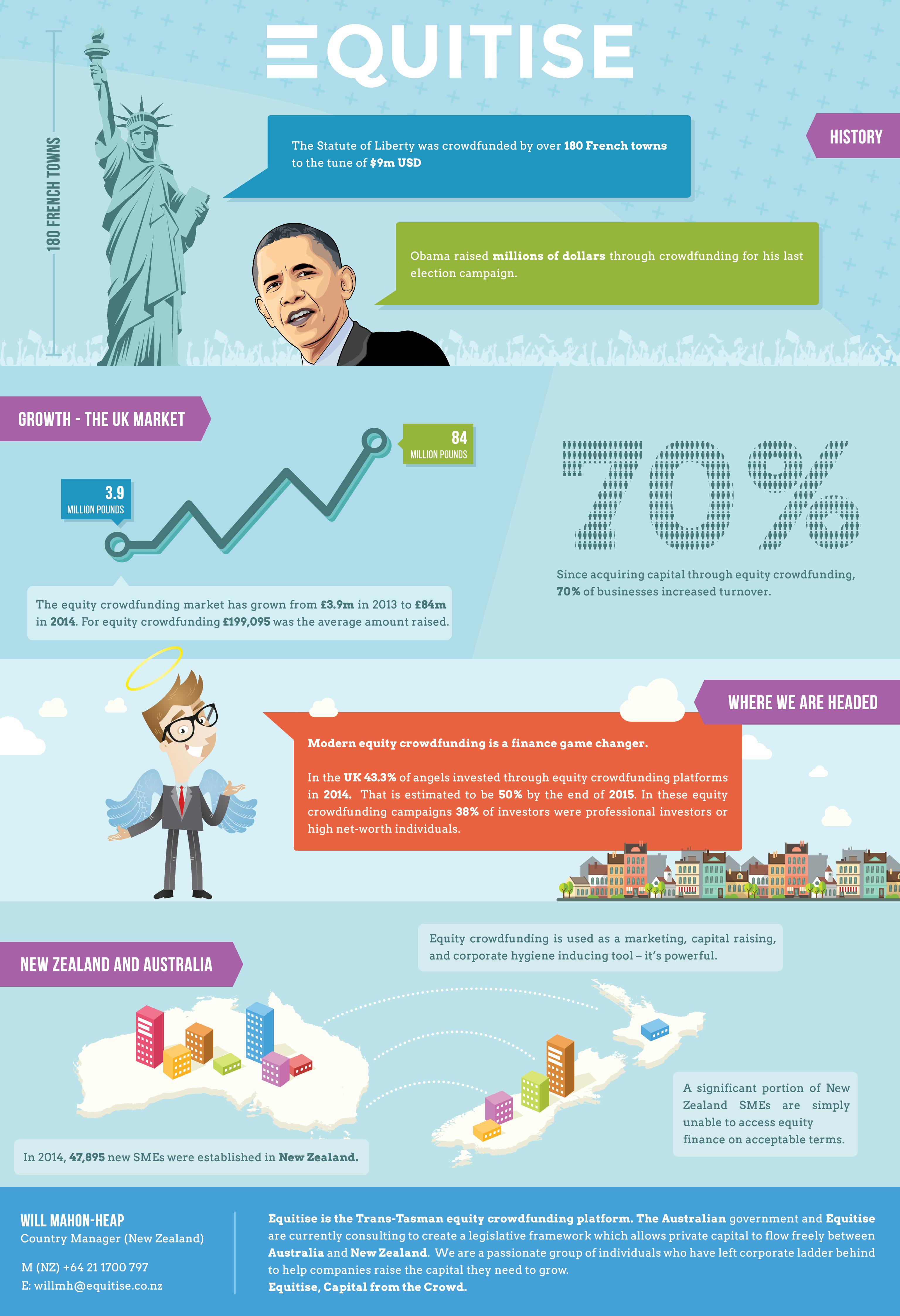
trends-and-insights
Equity Crowdfunding is a Finance Game Changer
Modern equity crowdfunding is a finance game changer. Previously, small and medium-sized businesses struggled to access capital under traditional funding models. New Zealand, along with UK and the Netherlands, were first movers to bring in legislation unlocking the potential of sourcing funds from the crowd. Equity crowdfunding, is experiencing the highest industry growth in the UK at 410% between 2012 and 2014. The most striking revelation coming out of the UK is the effect equity crowdfunding is having on angel investment. In 2014, 43.3% of angels made their investments on an equity crowdfunding platform, this likely to increase to 50% this year. Back on our home turf, equity crowdfunding platforms such as Equitise are helping Kiwi and Australian businesses access the capital they require to grow and improve, and providing investors access to the early stage business arena. In a recent Business Operation Survey, Statistics New Zealand found that the single largest hurdle to innovate for New Zealand businesses remains meeting the costs of development and market entry. Furthermore, the study found that c.15% of small businesses were unable to access equity capital on acceptable terms. This, coupled with almost 50,000 new SMEs established in 2014, is providing great demand for alternative finance streams such as equity crowdfunding.
August 3rd 2015
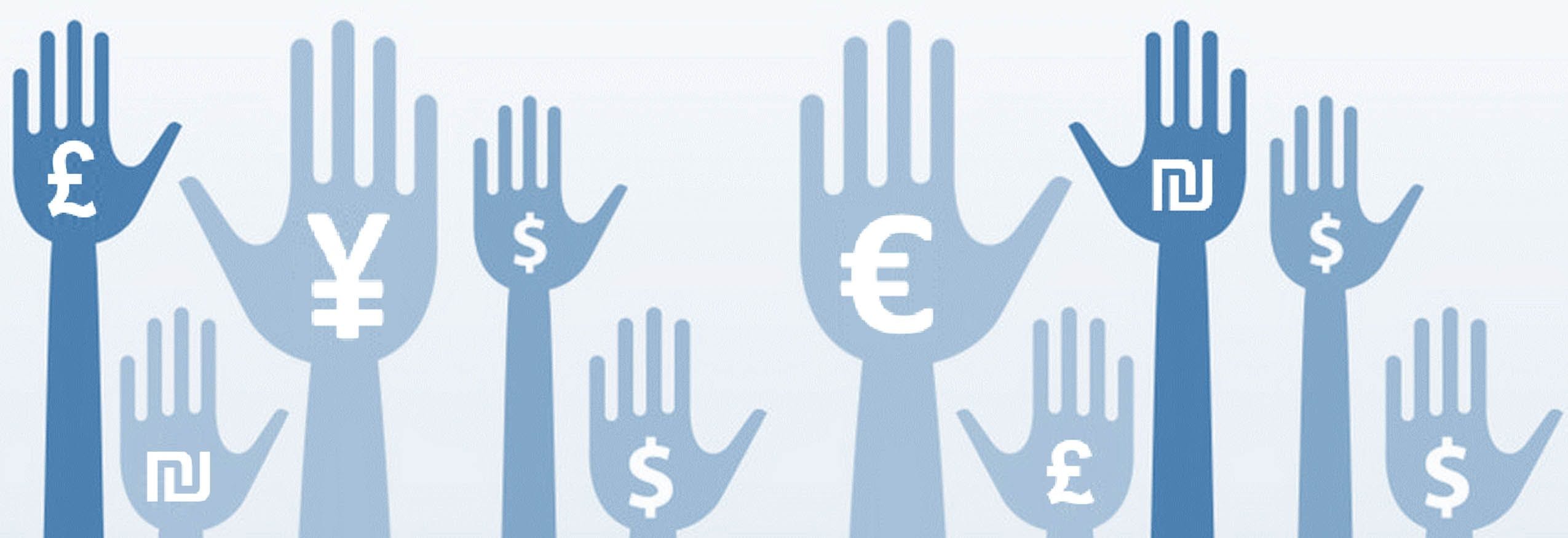
trends-and-insights
The 22 Biggest Crowdfunding Deals of All Time: Part 1
The digital age brought with it a wave of brilliant innovation and projects, and with these came a new platform for entrepreneurs to showcase their ideas to the world. Enter rewards crowdfunding, a fundraising method that looks at raising small amounts of money from large numbers of people, giving innovators a chance to turn their concepts into a reality. Rewards crowdfunding differs from equity crowdfunding in that backers of a project simply donate money as a form of support, without earning equity in the company. Occasionally, some rewards crowdfunded projects offer a gift or prototype in return for the money donated. What makes crowdfunding so successful is that people tend to fund projects that resonate with them and their interests. As long as your concept is something people believe in, you will find success in crowdfunding. This two part series will take a closer look at the world’s biggest rewards crowdfunding campaigns. This month we will check out the 20 biggest rewards crowdfunding campaigns of all time; next month seeing how they compare with the largest equity crowdfunding deals. Both have had some pretty impressive results, and it will be interesting to see how both forms of funding continue to gain traction over the next few years. 1. Pebble Time $20,338,986 by 78,471 funders May 2015 on Kickstarter Pebble Time is a colour e-paper smartwatch that connects you with the features of your smartphone faster. It’s been described as the most effective Kickstarter campaign of all time. Thanks to $20 million worth of investment, this company is now able to employ over 130 staff and partner with huge companies like Mercedes Benz and eBay. 2. Coolest Cooler $13,285,226 by 62,642 funders August 2014 on Kickstarter This product makes your standard esky look both boring and outdated. With all the ridiculous features you never knew you needed, camping and picnics just got way more fun. Think a blender, Bluetooth speakers, charger, and cutting board. It would also probably help you live comfortably out of your car. 3. Ubuntu Edge $12,814,216 by 27,635 funders August 2013 on Indiegogo A smartphone with the capabilities of a PC, there is such a huge market for this that it was always bound to succeed. The Ubuntu mobile and Android OS phone converts into a full desktop PC. Perhaps one of the reasons for the enormous amount of funding received after just a month is that the Ubuntu Edge will only be exclusively available to Indiegogo backers. 4. Flow Hive $12,250,066+ by 36,605+ backers April 2015 on Indiegogo Hailed as the greatest innovation in beekeeping since 1852, this Byron Bay based company has invented a beehive that gives you honey on tap. It comes with everything you need (except the bees) to start your own hive, so you can enjoy fresh honey with minimal disturbance to the bees inside. 5. Pebble Watch $10,266,845 by 68,929 funders May 2012 on Kickstarter Basically the Pebble Time with a soft silicone strap, the Pebble Watch is an affordable Android smartwatch. It gives you notifications at a glance, hosts convenient apps, and can run for up to 7 days on one charge. 6. Exploding Kittens $8,782,571 by 219,382 funders February 2015 on Kickstarter “This is a card game for people who are into kittens and explosions and laser beams and sometimes goats”. Well, no wonder Exploding Kittens reached its Kickstarter goal and then some! It sounds a lot more exciting than Solitaire. 7. OUYA $8,596,474 by 63,416 funders August 2012 on Kickstarter This gaming console allows game creators to publish their games, created with the intent to allow bedroom game designers to flourish. Affordable at $99 per console, OUYA lets you download and stream entertainment content in 1080p HD. You can also try lots of games for free with this system. 8. Weissenhaus $8,195,550 by 1,679 funders July 2014 on Companisto Weissenhaus bucks the trend of this tech-heavy list by being a crowdfunded luxury resort. Guests can experience fancypants decadence by the Baltic Sea, including Michelin restaurants, deluxe spa treatments, and even a castle. 9. Pono Music $6,225,354 by 18,220 backers April 2013 on KickstarterStarted by folk musician Neil Young, the Pono music player allows you to play high quality MP3 files. In an age of tinny streaming services that reduce the richness of MP3 sound, this prism-shaped player may be the audiophile’s antidote to how modern music is consumed. 10. Sondors Electric Bike $5,845,116 by 14,610 funders April 2014 on Indiegogo This affordable electric bike is lightweight and able to tackle a range of terrains; it’s no wonder it has found high levels of demand. The bike can go up to 32 kilometres per hour with a tap of the accelerator, and effective hydraulic disc brakes will bring it to a stop. 11. Veronica Mars Movie $5,702,153 by 91,585 backers April 2013 on Kickstarter The US series Veronica Mars crowdfunded its transition to the silver screen. The cult teen noir drama only aired for three seasons, but obviously made quite an impression on its fans, who went on to fund the film just to they could enjoy more of Veronica Mars. 12. Bring Reading Rainbow Back $5,408,916 by 105,857 backers July 2014 on Kickstarter This educational initiative was created with the aim to offer online resources for children in under-served classrooms. This library of interactive books and video field trips is currently being formatted for more platforms in order to become even more widely accessible for kids who need it. 13. Restore King Chapel $5,048,213 by 282 backers May 2015 on Indiegogo King Chapel has a rich history. Sitting on the grounds of Martin Luther King’s alma mater, this chapel has hosted interesting events such as awards ceremonies for Nelson Mandela and Spike Lee film premiers. It also hosts classes at the University. With only 282 backers, there must have been a few very generous donations. 14. An Hour of Code for Every Student $5,022,911 by 2,827 backers December 2014 on Indiegogo This creators of this startup want everyone to be able to have access to code lessons, including those from underprivileged backgrounds. If you head to the site, you can have access to an hour of free coding lessons right now. Most are aimed at children (including some for kids as young as kindergarten age), but they are still lots of fun for adults! 15. Bitvore Corp. $4,500,000 March 2014 on Fundable This organisation processes swathes of data into information that is easily processable by the average business owner. Corporations and small businesses alike can use their services to make decisions backed by data. 16. Super Troopers 2 $4,487,229 by 52,380 funders April 2015 on Indiegogo More than 50,000 people thought the world needed another movie that makes light of incompetent idiots with guns being in charge of people’s lives. There are also apparently jokes that involve sexual relations with bears. 17. Torment: Tides of Numenera $4,188,927 by 84,405 April 2015 on Kickstarter In 1999, Planedcape: Torment became an iconic role-playing game that set the scene for excellence in RPGs at the time. Torment: Tides of Numenera is aiming to be an excellent sequel some 16 years later. Set in a dilapidated advanced civilisation, one person has discovered how to use the ancient power of the numenera to achieve super-human ends. 18. Pillars of Eternity (formerly Project Eternity) $3,986,929 from 73,986 backers October 2012 from Kickstarter Obsidian Entertainment raised about triple their target to develop this RPG. With popular games like Fallout 1 & 2, Arcanum and under their belt, fans were excited for the new game. 19. Mighty No. 9 $3,845,170 from 67,226 October 2013 on Kickstarter Another over-achieving game start-up, fans raised more than 4 times the requested amount for this game. Mighty No. 9 is an action-platform video game produced by Keiji Inafune and being developed by Comcept. 20. ZANO $3,550,781 by 12,075 backers January 2015 on Kickstarter ZANO is a nano-drone with HD video and photo capabilities. Set for delivery in July 2015, this tiny drone connects to your smart device via Wi-Fi. It is possible to stream HD video from this palm-sized device. In other words, your selfie stick is old news. 21. Reaper Miniatures $3,429,235 from 17,744 August 2012 on Kickstarter This company creates detailed miniatures of characters from games. Yet another company created and supported by the love of gaming in the world! 22. The Micro $3,401,261 from 11,855 May 2014 from Kickstarter This 3D printer promises an intuitive user experience with quality results. It’s also affordable at just $349, and in 2015 who doesn’t want a 3D printer?
August 3rd 2015

for-companies
12 Habits of the Most Successful Entrepreneurs
It’s not all about long office hours and hard work, to become a successful entrepreneur it’s important to balance work with a personal life. Habits affect who we are as well as our performance in life. They are the foundation on which we build our professional success and personal happiness. Success is something that most career-driven individuals seek, but not everyone manages to reach. So, what makes some people successful? The answer is passion, beliefs, flexibility, attitude, and habits... Taking a look at some of the more interesting and inspirational habits of successful entrepreneurs might positively influence your mindset and morning routine. 1. Wake up early That’s right - successful entrepreneurs are morning people, with most rising not much later than 5:30am, even on weekends. The CEO of Disney wakes up every morning at 4:30am, while PepsiCo’s CEO rises at 4:00am to be in the office no later than 7:00am. Why? Because time is an invaluable asset, and it’s no secret that your brain works better during the first few hours of the day. So, the earlier you wake, the more productive hours you’ll have. It also means you’ll have more time to do things that matter to you, such as exercising or having breakfast with the kids before work. 2. Exercise If you take care of yourself you’ll have what it takes to take care of your business. Exercising keeps you fit, healthy, strong, happier, and energised for the new day ahead, and this is something entrepreneurs seem to know very well. Even on their busiest days they manage to make time for exercise, and even meditation, usually in the morning right after they wake. Richard Branson swims laps every morning on his private island, followed by a kitesurf (if the wind is appropriate), and finishes it off with a tennis match. Jack Dorsey, CEO and co-founder of Twitter, wakes up early to meditate before jogging 10km, while fashion designer Tory Burch walks for 45 minutes a day. 3. Have consistent morning routines Starting your day calm and relaxed, with a plan, is the best way to get things done. Avoid having the first hours of your day in a pace of constant change. This is key to avoiding all the stresses life throws your way, and allows you to enjoy those first few hours. This is why routines are helpful. They can be extremely effective in keeping you focused and feeling in control, while keeping life’s stresses at bay. Whatever your routine is - meditation, exercise, reading - make sure you maintain it. Arianna Huffington meditates for 30 minutes a day after waking, and Mark Zuckerberg wakes up at 8:00am and wears the same t-shirt every day so as to not lose time deciding on what to wear. 4. Doing the harder task first As our brains are sharper in the morning, it’s the best time to try and do that dreadful task we don’t really want to do. Do it in the morning, and get it out of the way as quickly as possible so as to carry on a sense of success for the rest of the day. This will help you feel more motivated as you tick off the other, easier tasks on your list. 5. Schedule family time A lot of effective entrepreneurs start their business as a way to provide for their families. Family time is an important way of maintaining focus on what’s really important to you. President Obama, for example, sits down for dinner with his family every night. Other business people decide to leave their phone at the door when they enter the house after work, or religiously drive their kids to school every morning and make them breakfast. 6. Encourage feedback Successful people know they may not always be right, and that’s why to them any feedback is valuable. You may have a good idea, but perhaps someone has a way to improve on it. It’s not about who comes up with the idea, but what’s actually better for your business. Improving communications with partners and having casual conversations where you can ask for feedback can also be beneficial in keeping the other party involved and interested in the project. Remember, you’re all working for the same goal. 7. Write a to-do list the night before Some highly successful people write their to-do list every evening before going to bed, after reviewing what they have achieved throughout the day. This leaves them prepared and ready for new tasks, always prioritising what’s more important. Some entrepreneurs write actions that their team needs to achieve in order to go through the to-do list more efficiently. 8. Turn obstacles into power It’s hard to see the silver lining of an obstacle, but the truth is that something positive can come out of any experience if we fight hard enough to find it. After all, many of the bestselling novels, movies, and songs come from places of pain and sadness, and entrepreneurs know this too. You will face setbacks and tough times, but you need to keep going and remind yourself that what doesn’t kill you only makes you stronger. 9. Write a journal Keeping a journal helps high achievers to track their progress, set goals, and learn from past experiences. You’ll find how writing the activities you did on a particular day, and what you wanted to do (but couldn’t) will help you to be better next time. It also makes it easier to reflect and capture what’s important, and allows you to take a break from technology writing with a notebook and pen. If Oprah, Eminem, and JK Rowling do it, it may be worth a try. 10. Eat healthy Simon Cowell, creator and judge of X Factor, has papaya juice, tea, oatmeal, and three smoothies every morning for breakfast. Richard Branson wakes up to a fruit salad and muesli, while Justin Timberlake has protein and eggs. We all know that eating healthy doesn’t mean starving yourself. It just means eating well, choosing more protein over high carb foods, and having a hearty breakfast that will give you energy for the day ahead. 11. Walk/work How about a little change from the boardroom scenario? Being successful is all about efficiency and concentration, no matter what’s going on around you. To achieve that, some entrepreneurs take on ‘walking meetings’, or even ditch their comfortable chairs and work on a treadmill desk. Former Google CIO and current ZestFinance CEO, Douglas Merrill, practices this religiously, walking roughly 13km a day. 12. Have a rest If you end up working 16 hour days, 7 days a week, your body will shut down. Successful people know that the key for a prosperous week is a prosperous weekend. Jack Dorsey, co-founder and CEO of Twitter, religiously takes Saturday off, often to hike, and dedicates Sundays to reflecting, getting feedback, and planning for the new week ahead.
July 30th 2015

for-companies
Crowdfunding Chronicle: What do Investors Want to See?
An equity crowdfunding campaign, like any offering of shares to the public, requires disclosure. Set out below are some things business owners should think about before they launch the campaign. Usually an equity crowdfunding platform will suggest that you prepare a short form information memorandum (IM), essentially a more comprehensive business plan. In the interests of helping Kiwi entrepreneurs prepare for an equity crowdfunding campaign we’ve set out some things to keep in mind when contemplating the campaign. This is by no means exhaustive! The upfront summary More often than not it is the Executive Summary that an investor will read first therefore it is your opportunity to capture the reader. The Executive Summary is a section which allows an investor to digest some of the company’s most important highlights and details of the raise. It’s often where an investor will decide whether to keep reading or not - it’s important. The Executive Summary provides an overview of the business, stakeholders and industry, highlighting the most important aspects and opportunities. Crucially, it addresses the reasons for attracting investment and future growth potential. It is a good idea to write the executive summary last as it usually only contains the most relevant and significant points made in the IM. How do I talk about my business? The first thing to think about is clearly outlining what your business does, and a description of the activities it undertakes as part of its operations. This could include a breakdown of sales, customers, and your perceived development potential. It’s also helpful to breakdown your corporate structure, i.e. are you a subsidiary (owned by another company), and who are your key stakeholders? This is salient information for investors, as they will obviously sit next to your current investor base. As with financials, your history is important. This is the development of the company over time - did you go through a beta phase? How many customers did you acquire? If you’re still in beta why? Finally, don’t forget the team. As you know with early stage ventures it’s about management. If you’re a proven entrepreneur with a previous exit, highlight this experience. It’s all about credibility for your vision. Key metrics Metrics are quantifiable measures to track the performance of a business or industry. They are helpful for comparing your business with competitors and they are a good way of understanding where the trends are heading in the industry. Not all metrics are useful, relevance is critical. Good ones to include would be indicators financial performance such as profit margins, and industry drivers. The industry outline Competition is key - do you have any? Why is your business unique? Often you’ll want to put together a competition table showing your business, like companies, and why you are much better! As part of this don’t forget to highlight the regulatory nature of your industry if relevant, and any important historical milestones. This section should also include the risks associated with the business and industry. OK, so what about the numbers? The financials are the first place to start as assumptions made here will underpin projections in many of the other areas. Financial statements allow investors to see how you will make money and what potential your business has. If possible, historical financials are important as they help validate the business model, and give credibility to your growth projections. Of particular importance are the assumptions used to the forecasted financial statements. Investors will sanity check these assumptions knowing that most early stage businesses are overly optimistic and forecast revenue that is too high and costs that are too low. What are you going to achieve? If you’re raising capital, it’s usually for a defined purpose. State these purposes clearly - do you need capital to enter a new market? Is it to increase sales or develop a new product? Obviously you’ll need to explain how much you are raising and at what reasonable valuation. Looking at similar businesses at your stage and in your sector will give you a good starting point to gauge valuation. It is important to demonstrate that your business has a well thought out exit strategy for investors to “cash-out”. Generally investors look to exit investments in early stage businesses through an IPO or acquisition after a period of growth. Conclusion Crowdfunding providers are here to educate entrepreneurs and guide them through the capital raising process. It is ultimately the responsibility of the company raising capital to ensure these comply with the necessary requirements, however we are happy to assist companies as much as we can. The Crowdfunding Chronicle: What do investors want to see? by Will Mahon-Heap. NZ Country Manager, Equitise. Originally published in Issue 32 NZ Entrepreneur Magazine.
July 17th 2015

trends-and-insights
Exit Options
When investing in a business at an early stage, many people have concerns over the liquidity of their investment. This guide provides an overview of some of the options available to investors to ‘cash out’ when the time is right. Initial Public Offering An Initial Public Offering (IPO) is the process by which a private company transforms into a public company. The company offers, for the first time, shares of its equity to the investing public. These shares subsequently trade on a public share market. In New Zealand there is the main NZX board, targeting large, established companies with market capitalisations in excess of $100m, and we have the smaller NXT board that deals with businesses in the $10m to $100m range. An IPO is an exit option for a firm that has previously sold equity through a crowdfunding platform and has subsequently gone through a period of growth. It may not suit all firms due to the market capitalisation requirements. There has been talk from the NZX and other interested parties of starting an additional exchange specifically for the trading of shares in equity crowdfunded firms[1]. It is not clear yet how such an exchange would operate. Either the firm would transition to a listing on the exchange having previously been through a round of equity crowdfunding or, the equity crowdfunding round would act as a listing in itself with shares immediately being tradable – much like an IPO. Mergers and Acquisitions These liquidity events refer to the consolidation of companies where one company buys or combines with another to expand their business, eliminate competitors and gain synergistic advantages. It can often be more cost effective and efficient to acquire or merge with another company rather than expand organically. Usually, when a larger company buys or merges with another company, existing shareholders are ‘bought out’ at a premium. This is the business model private equity firms employ whereby they seek undervalued, private firms hoping to profit from a sale at a later date. This is an exit option for shareholders in equity crowdfunded firms that are not yet large enough to list on a stock exchange. Management buyouts are a variant on an M&A transaction that occur when the management of a firm buys out the owners. Although less likely to occur in the realm of equity crowdfunding, management buyouts are a viable exit opportunity for investors not involved with the management of the business. Private Sale of Shares Equitise has partnerships with Computershare that enable us to offer an exit option that is not contingent on management deciding to undertake in large transactions such as the ones listed above. Computershare acts as an intermediary, matching shareholders with potential buyers. As this is a private transaction and is not of the scale of an IPO or M&A, the process is far more streamlined. Stay tuned for a more a detailed post on the process of a private sale through our partnership deal with Computershare. [1] http://www.nzherald.co.nz/business/news/article.cfm?c_id=3&objectid=11447852
July 16th 2015

trends-and-insights
Know Your Investors
Startups as their name implies are in a critical stage in their business life. They need a great team and most importantly funding. However, obtaining funds for the business is not an easy process. It requires preparing documents, liaising with lawyers and approaching investors etc. Throughout the fund raising process it is good to keep in mind the different kind of investors a startup needs. Often a startup will attract Financial Investors or Strategic investors. Both of these investors have different characteristics, and can play a crucial role in helping startups to succeed. Financial Investors Financial investors are attracted to a startup’s possible financial returns. For the most part these investors are not involved in formulating the strategic vision of the business nor in the operations of the business. Financial investors can be family, friends, angel investors or venture capital firms (VCs). Family and friends usually invest in what’s called a “pre-seed round” or, in other words, at the early stage of startups. Pre-seed rounds do not often entail a large funding round. Subsequent funding rounds such as “Series A” are categorised as bigger funding rounds. These later rounds often involve sophisticated investors. Sophisticated investors include “angels” and VCs. An angel investor is an individual that provides capital for startups in exchange for a stake in the business. They can play an important role in helping the business succeed, attracting more investors, and solidify the business’ reputation. They are often heavily motivated by the individuals who started the business. On the other hand, VCs are motivated by the financial gain on their investment. Often they are not concerned with how a businesses is operating day to day, or with providing strategic advice. Every VC has a different business model, meaning some VCs can be a good fit with a particular startup and some are not. Strategic Investors Any investor, whether an individual or corporate, which is not purely interested in the financial gains can be described as a strategic investor. Strategic investors are often those that have particular knowledge in a niche sector and seek to work with the startup they have bought a stake in. They are known for working with companies to further both the company’s and their own vision of a certain sector. Strategic investors can also be useful when seeking to break into the sector they have knowledge in. There are clearly benefits of having strategic investors on board. However in some cases they can also hinder the progress of the business. To remedy this there has to be an alignment in vision, priorities, and goals. Conclusion It is not easy to be a startup. A lot of work needs to be done, and there is not enough time in the day. Juggling building a company, networking, meetings and among other tasks can be daunting. Thus, business owners need to be mindful in choosing their investors as these investors will be their partners.
July 13th 2015

for-companies
Show Me The Money
Why Equity Crowdfund? Before we continue down the track of exploring the more complex interactions of equity crowdfunding we thought it best to first address why a business would equity crowdfund. As part of this evaluation we will dismiss some of the common misconceptions about the process. Show me the money The most obvious reason to crowdfund is access to capital! Often entrepreneurs and even more established businesses suffer from the incorrect belief that they cannot raise beyond their network. This is not the case, for instance in our last offer we had a substantial amount of interest from wholesale (high net worth individuals) and retail (‘mum and dad’) investors in both Australia and New Zealand, investors which had previously not been across the company involved. Is it efficient? Traditional rounds of capital involve much paperwork and meetings, with of course no guarantee that investors will sign. An equity crowdfunding platform allows you to legally advertise an offer of shares in your company to the entire country. The simplicity is staggering, investors then need only go through the platform’s registration process, consider the offer material and warning statements, before investing in the offer. No more back and forth with documents, or waiting on settlement, it’s all streamlined. Who is involved? The offer is open to retail and wholesale in New Zealand. One common myth here is that you are going to end up with a huge share register of retail investors, that looks unattractive to a buyer. Interestingly, crowdfunding campaigns are increasingly generating wholesale interest. Statistically speaking the average investment for our platform has so far been around $5000, and nationally $4000. A large share register can be further limited by structuring your offer appropriately, the subject of another NZ Entrepreneur post. What’s the catch? The upfront costs of equity crowdfunding are low, for most platforms it is literally the costs of the legals and production of a video, the latter most companies already have as a promotional tool. Assistance is on hand, equity crowdfunding platforms should have specialists as part of the company who can help draft offer material (i.e. a structured information memorandum detailing the company and the offer). Again, this may even be something the company has prepared before! It could be as simple as repackaging the company’s current material and putting it into the platform. Have you validated? This is the dreaded question of have you proved your concept, are you growing, and what are you worth! A successful crowdfunding campaign demonstrates to the market that your product is on point, and that your valuation has credibility. It allows the crowd, your customers, and more sophisticated investors to expressly back you, and valuable thing. Speaking of the crowd… The crowd doesn’t just validate your company, it also becomes your most steadfast advocate and loudest voice. It leads to national, and often international, advertising. This can often result in further investment. Conclusion These are some of the benefits of the evolving industry that is equity crowdfunding. I look forward to traversing the landscape further with you in the next issue! Stay tuned for the next chronicle. The article was previously published on the NZ Entrepreneur Magazine issue 31. http://nzentrepreneur.co.nz/
July 13th 2015

trends-and-insights
Serious Social Investment
The rise of alternative finance for Kiwi entrepreneurs opens a lot more doors for business growth in New Zealand. Will Mahon-Heap from Equitise shares some encouraging global stats and local insights on equity crowdfunding. The Global Space Crowdfunding is an exciting new space in the New Zealand spectrum of finance, and is referred to globally as alternative finance. Alternative finance is often associated with its brother term ‘fintech’ or financial technology. The evolving definition of alternative finance is fintech which is revolutionising banking and investing. Nomenclature aside, alternative finance is no longer a storm in a teacup, but a worldwide flood. In 2014 lending based crowdfunding grew by 223% to reach a contribution of total worldwide crowdfunding of USD$11.1 billion, representing 68% market share when compared to 57% in 2013. Over the same period equity based crowdfunding volume nearly tripled, with an annual growth rate of 182% to reach USD$1.1 billion. Equity Crowdfunding Traditional rewards based crowdfunding involves a donation en masse with no economic return, and has distinguished if somewhat forgotten roots. For instance, in the 1870s Joseph Pulitzer asked for donations to help complete the pedestal of the Statue of Liberty. Popular brands like Kickstarter modernised this concept allowing individuals to donate to their favourite causes. Equity crowdfunding on the other hand has a primary focus of raising equity capital for companies. It allows companies, which are usually high-growth, to raise capital through offering shares via an equity crowdfunding platform. The general public, and often sophisticated/ wholesale investors, then subscribe for the shares through the platform. Unlike traditional crowdfunding, equity crowdfunding should be associated with solid economic returns. Successful equity crowdfunding campaigns draw on the company’s own networks, but also have to appeal to the general public by demonstrating a genuine and compelling investment opportunity. It is having a demonstrable effect on businesses worldwide. In the UK for instance since raising capital through equity crowdfunding 70% of businesses have increased turnover, and 60% have increased employment (Nesta, The UK Alternative Finance Industry Report 2014). Equity Crowdfunding in NZ In line with our number eight wire roots, New Zealand is a leading figure in the equity crowdfunding space, being one of the first countries in the world to regulate equity crowdfunding last year (through a once in a generation reform of New Zealand’s financial regulations – sounds exciting doesn’t it?). The new Financial Markets Conduct Act removes traditional cost and compliance barriers of small-scale public raisings by allowing companies offering shares through crowdfunding platforms to raise up to NZD$2 million from the public in a 12 month period. This is an area that the government is enthusiastic and committed to growing, to use their own words “internet-based markets facilitate innovative ways for small businesses and individuals to raise money more efficiently” (MBIE, 2014 Business Growth Agenda). In other words, equity crowdfunding is here to stay, nurture NZ business, and grow alongside them (it’s a start-up industry in itself!). So Why Equity Crowdfund? Briefly, the first obvious answer is capital. There is a global trend of smaller businesses struggling to gain access to the cash they need to grow. Equity crowdfunding can help solve this by providing a lower cost way to raise capital from a large pool of potential investors. Secondly, if you’re early stage, equity crowdfunding can provide market validation. And, finally engagement. You don’t just gain investors, you gain advocates, advisers and marketers for your brand. Where To From Here? We’ll provide some ongoing commentary in the equity crowdfunding space. We look forward to addressing some of the following key queries, such as; how does equity crowdfunding interact with venture capital, and other traditional funding rounds? Complementary we think! Stay tuned for further information.The article was previously published on the NZ Entrepreneur Magazine issue 30. http://nzentrepreneur.co.nz/
June 30th 2015
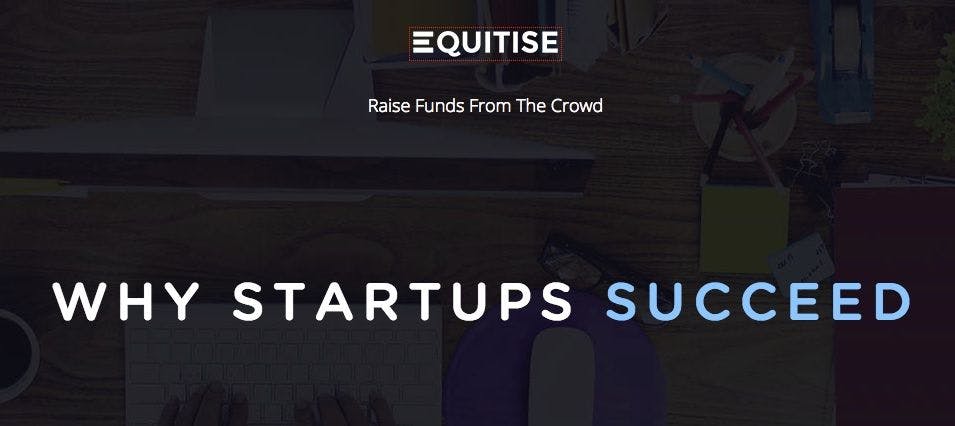
trends-and-insights
Why Startups Succeed
If you’ve noticed that there seems to be an abundance of startup businesses launching recently, you’re not mistaken. We’re currently experiencing a startup revolution - a trend that some are comparing to the dot-com boom of the nineties, but with a greater chance of longevity. Whether it’s amazing new apps, innovative technologies, or gadgets that simply make life easier, entrepreneurs from all walks of life are suddenly creating, inventing, and setting out on their own like never below. Read More
June 4th 2015

trends-and-insights
Last Month’s Equity Crowdfunding Highlights
What to say when you hear the word “fintech” Luxembourg’s finance minister, Pierre Gramegna, has told Luxumburger Wort of his desire for Luxembourg to become the world centre of fintech (financial technology). The Luxembourg government strongly supports startups and entrepreneurs, and provides high levels of technological infrastructure, both of which are crucial for fintech. The nation boasts a stable, secure, business environment and excellent living standards, which Gramegna hopes will make Luxembourg a fintech destination. What to say about craft brewing BrewDog is still on the up. BrewDog, Scottish Independent brewery, is looking to raise a world-record setting £25m from the crowd to fund its expansion plans. Previously the company has generated £4.25m from offering its shares online, with a minimum investment of £95. There has been some controversy surrounding the offering, with commentators suggesting that the business was highly overvalued. Can I equity crowdfund in China? Taiwan’s Financial Supervisory Commission has proposed new equity crowdfunding regulations to the Taiwanese government. If passed, this would make Taiwan the second Asian market to adopt specific crowdfunding rules. Platforms may raise to a cap of NT$15 million (around NZD$675,000). Individual investors would be permitted to invest up to NT$50,000 (c. NZD$2250) in a single business. OK, so how is the rest of Asia doing? Thailand is another market on its way to establishing equity crowdfunding as a regulated method of raising capital for entrepreneurs and SMEs. The Securities and Exchange Commission plans to implement new regulations by the end of 2015. And what about North America? Six provinces in Canada have adopted equity-crowdfunding this month. Securities regulators have permitted online capital raising, with new prospectus and registration exemptions for qualifying businesses. Nova Scotia and New Brunswick now allow crowdfunding investments of up to $1,500 per investor per firm. The provinces allow businesses to raise up to $500,000 and $250,000 respectively on the online platforms. Meanwhile, in our own backyard The Australian government has announced new tax incentives for start-ups in the 2015-16 Federal Budget. Part of the AU$7.8 million allocated to this area will be used to develop a regulatory framework to facilitate online crowdfunding. This forms part of an AU$5.5 billion package aimed at supporting businesses, especially SMEs, with the government recognising equity crowdfunding as an emerging method for businesses to raise capital. Some stats worldwide – equity crowdfunding is on the up Equity crowdfunding investment in Germany is up 50% on last quarter, according to statistics released by the German Crowdfunding Network. Debt and lending crowdfunding was also on the rise, with a 70% increase. And a final note from us Equitise’s second equity crowfunding campaign, the Retirement Income Group, was oversubscribed, raising capital of $455,300 for the annuities provider. This raise took place concurrent to a wholesale round. Check back soon for our latest offer and more news!
June 1st 2015

success-stories
Retirement Income Group "Overfunded"!
We are pleased to announce that Ralph Stewart’s Retirement Income Group has successfully closed 182% overfunded! The offer lasted only about a week, with an incredible amount of interest. The phone at Equitise HQ was ringing off the hook, with interested sophisticated New Zealand and Australian investors. The “golden gate bridge” theory (that there is a peak at the beginning and end of each crowdfunding campaign) was proven correct with 39 investors tipping in on the final day, and a total of 79 investors all up. The average investment for the offer was $5,763, dispelling the myth that equity crowdfunding is mostly comprised of individuals subscribing for the minimum amount ($500). We wish Ralph, Rhys and Casey all the best for the future of their product, the Lifetime Income Fund. We are proud to allow Kiwis a chance to participate in their future success. Check back soon for our next offer!
May 29th 2015

for-companies
Three Common Crowdfunding Myths
Companies Using Equity Crowdfunding Are Unable To Access Venture Capital Many commentators have mistakenly thought venture capital funding and crowdfunding are opposed. This is not the case, crowdfunding and VC networks have a productive relationship. Often venture capitalists and other institutional investors will be contributing capital in conjunction with a crowdfunding platform. High quality companies are beginning to include equity crowdfunding in their capital raising strategy due to the ease and speed of the process, as well in recognition of the cost benefits and efficiencies it provides. The collaborative nature of equity crowdfunding enables the company to gauge the market reaction to their product or service, providing validation for their idea. Crowdfunding has the additional benefit of transparency, which lends credibility to the traditional angel investor network. Furthermore, equity crowdfunding allows companies to directly engage with an invested audience through non-traditional avenues such as social media, potentially raising their brand awareness. For investors, this demonstrates that these businesses are those which seek to be more in tune with their stakeholders, and strive for efficiency, transparency, and prudence. Crowdfunding Does Not Provide Returns Equity crowdfunding is a subset of crowdfunding. Crowdfunding is often associated with raising funds for individuals and charities, sometimes with no monetary benefit for the donor. However, equity crowdfunding platforms like Equitise provide investors with the opportunity to purchase shares in a business. As equity crowdfunding provides part-ownership of the company, there is the potential for financial reward for the investor. Although equity crowdfunding, and often the companies crowdfunded, are still in their infancy, the product supplied can provide returns in the same way as any other equity investment. As shareholders in a company, investors have access to possible returns from dividends company management may choose to distribute, and any capital gain in their stake. Equitise believes that equity crowdfunding should not just be a “feel good” emotional investment, but rather an investment which provides a solid financial return. Our main priority as a platform is economic return for an investor, followed by emotional attachment, not the other way around. Businesses Listing On Equity Crowdfunding Platforms Are Too Risky To Get Involved With Equity crowdfunding is associated with early stage businesses, which do generally carry a higher risk. However it is evolving, and companies worldwide are beginning to view it as part of the general funding track of a company. Interestingly, recent global equity crowdfunded companies include those immediately pre-IPO. The inherent risks associated with any investment correlate to the possible returns they can generate. Equitise allows investors access to returns previously reserved only for wholesale investors or institutions such as venture capitalists. Returns have the potential to be high if investors are diligent and diversify, but it isn’t without risk. Including these investments in a balanced and diversified portfolio can be part of sensible and prudent investing. Equitise encourages investors to seek investment advice, and to only ever invest amounts they can afford to lose. No investment, even those in listed companies on the NZX or ASX, is without risk.
May 25th 2015

trends-and-insights
An Upsurge in the Australian P2P Lending Market
P2P Lending in Australia Morgan Stanley recently published a blue paper titled Global marketplace lending: Disruptive innovation in financials where it highlighted the impressive growth in the peer-to-peer lending (P2P) in Australia. Our reaction can be hardly expressed as surprised. We have highlighted in a previous article the momentum that this industry has been experiencing globally. It is estimated that the value of loans will reach $22 billion in 2020 with consumer lending amounting to $10.4 billion. The total consumer lending market in Australia is approximately $173.33 billion. It would not be an exaggeration if the estimation is perhaps humble and P2P could compromise more than 6% in 5 years. What is holding back the industry, perhaps, not the quality of service or other competitive products but the lack of a wide spread awareness of such technology. The report also estimated that the growth rate for P2P lending to SMEs would be slightly higher than that of consumer lending. The white paper that we, Equitise, have recently published, Alternative Finance in Australia, pointed out that SMEs are not receiving the necessary finances to grow and establish their businesses. Equity crowdfunding and P2P lending are to fulfil that gap. SocietyOne, the Australian P2P lender, has recently reported that it had received loan demand of $100 million, and have loan balances around $25 million. Carsales.com.au and Stratton Finance bought 20 per cent stake in RateSetter Australia. MYOB took 30% stake and distribution agreement in OnDeck which has recently launched in Australia. The Big Banks' Reaction The report also noted that the big banks have the strength and the infrastructure to compete with such technology, however the report noted: "At this stage, we doubt that the response will be particularly quick or aggressive." Commonwealth Bank of Australia chief executive Ian Narev said recently: "Unlike the US and UK, there is no real-life scenario that can be used to 'stress test' potential credit losses." RFI has recently conducted a research on global retail banking and one of the findings is that Australia has the worst score in improving the customer experience. Furthermore, Morgan Stanley proposed different business models that the banks can use to compete or embrace P2P. The banks could outsource different services to the market place lenders including credit underwriting and customer prospecting. With the current service quality of the big banks, that can be a bit difficult to achieve. The big banks relies on key performances indicators (KPIs) for credit worthiness analysis. Using only KPIs can hurt customers and SMEs to obtain loans as it does not provide a comprehensive picture on the credit worthiness of the applicant. On the other hand, P2P lending platforms, such as OnDeck, conduct more comprehensive analysis to provide more accurate credit scores by using innovative ways. P2P are improving the finance accessibility by providing more loans. The major banks are underestimating the threat of P2P. Especially when a recent survey reported that 71% of the millennials, one of the banks major customer base, would rather go to the dentist than listen to what banks are saying.
May 24th 2015

for-companies
Crowdfunding Tips for a Successful Campaign
Crowdfunding for startups is a valid method to raise initial capital; however, in order to attract investors, it’s necessary to develop an accurate crowdfunding campaign strategy. In this blog post, we will talk about the basics on how to build a successful crowdfunding campaign. There are many other resources available on this topic and we encourage every ‘crowdfunder’ to do the required research before embarking on such a journey. The crowdfunding industry is still in its infancy stage and there will be numerous changes in the future. Keeping up with the recent research on the crowdfunding do’s and don’ts for a successful campaign is pivotal. Each crowdfunding campaign needs to be optimised and carefully planned in order to take off; timeline and planning are two of the key factors in determining the level of preparation of the crowdfunding offer. We had a look at past successful campaigns to identify some of the factors and crowdfunding secrets that will help you to be ready when meeting potential investors. Business Plan The first element when preparing for a crowdfunding campaign is setting up a business plan. “The most important ingredient in your business plan is making sure to plan for the plan not going according to plan.” - David Feldman What is a business plan? A complete and concise business plan includes several equally important sections. This is what investors first read. It is crucial to convey your message in this section as clearly as possible as most investors do not get past this point. In other words: How would you describe your business in a small paragraph in plain English? Describe your market size, the target market, the geographic market, the demographics of the local population, the market density (crowded or fragmented) and key competitors. Marketing and Sales complement each other and they are at the core of business operations. You should be able to answer questions such as what market needs is the business going to satisfy? What is unique about your product/service? How is it different than your competitors? Include stages of development, key business events and milestones achieved to date. Here is where you describe different risks that can affect the business negatively. As a matter of fact, this is your insurance policy against future claims by angry investors. Financial Information Financial information is definitely important for an investor who is thinking of whether to invest in startups or not. This section should cover information and discussion regarding the business liquidity, capital resources, revenues and expenses including: Use of Funds and Valuation State the intended use of the raised funds through the crowdfunding sites as specifically as possible. This will help investors to understand the forward vision of the company in the near future. Other information should include the target offering amount, the deadline of the campaign, share price, equity offered, the minimum number of shares offered and the type of shares. The valuation determines the share price. Here is where inflated valuation can have a negative impact on the business. Try to limit the funds raised to a minimum or to what you need. Investors must feel comfortable with your valuation and financial projections. COMMUNICATING WITH YOUR INVESTORS “The most important item on any prospective fundraiser’s list is to start building relationships with new people that could potentially fund them some day.” Joy Schoffler Conclusion What has been detailed above is just the tip of the iceberg. When preparing your crowdfunding campaign, you can include as much information as you want. However, it is not about the quantity rather it is the quality that matters. Clear and concise information will help to deliver the message intended effectively. Most importantly, do not forget to thank the investors and keep a good relationship with them.
May 15th 2015

trends-and-insights
The Market Conundrum
The current market conditions are making it hard for investors to invest in reasonably priced assets that can generate adequate yield. The fixed income markets are expensive, the equity markets are at all time high, with the exception of the recent drop in the big four banks’ shares, and the commodity markets has been recovering slowly with the boost from oil recovery. There are important drivers that affects these markets and influence their prices in a way that we are currently observing. One of the key factors is simply Central Banks. Central Banks control the interest rates through monetary policies to control or stimulate the economy through money supply. As an investor, the benchmark for what you can get in the future for a dollar paid today is the risk-free rate. The risk-free rate has a major influence on other investments. In an effort to stimulate the economy, Central Banks around the world including Europe, Japan, US and China are cutting the cash rate to increase the money supply. As such, the yield on treasury bonds declines and the bond prices go up. Bonds are currently expensive and do not represent an attractive investment vehicle. Equity markets has the same story. Housing prices are increasing as well. The commodity markets have been suffering from negative returns and the list goes on. The situation might seems gloomy, however, since the Global Financial Crisis the markets did not experience much volatility except for instances here and there. And hence traders and investors are looking for new avenues to chase yield. Global hedge funds and money managers are cautious on where to invest as it is easy to buy but not as easy to get out. Investments seem risky especially with the anticipation of when the central banks will start to hike up interest rates. Some are hoarding cash, in anticipation and to avoid risk; others are looking at the emerging markets such as Brazil for opportunities. Goldman Sachs, for example, have been investing heavily in tech-startups. Will there be a market correction where the overpriced equities and bonds get cheaper? Sure. Simply put, mean reversion where everything goes up must come down will take place and overpriced assets will revert to the mean as history shows. In my opinion, the best application for the current market conundrum is to apply fundamental analysis when choosing to invest and to ignore the market noises. Perhaps one of the options for the lay investor is investing in start-ups through equity crowdfunding platforms. Choosing a project to invest in relies on different factors including one’s understanding of the industry and the product. Ideally one should choose investments that are related to one’s expertise to identify the appropriate investment risks and avoid having a negative returns.
May 13th 2015
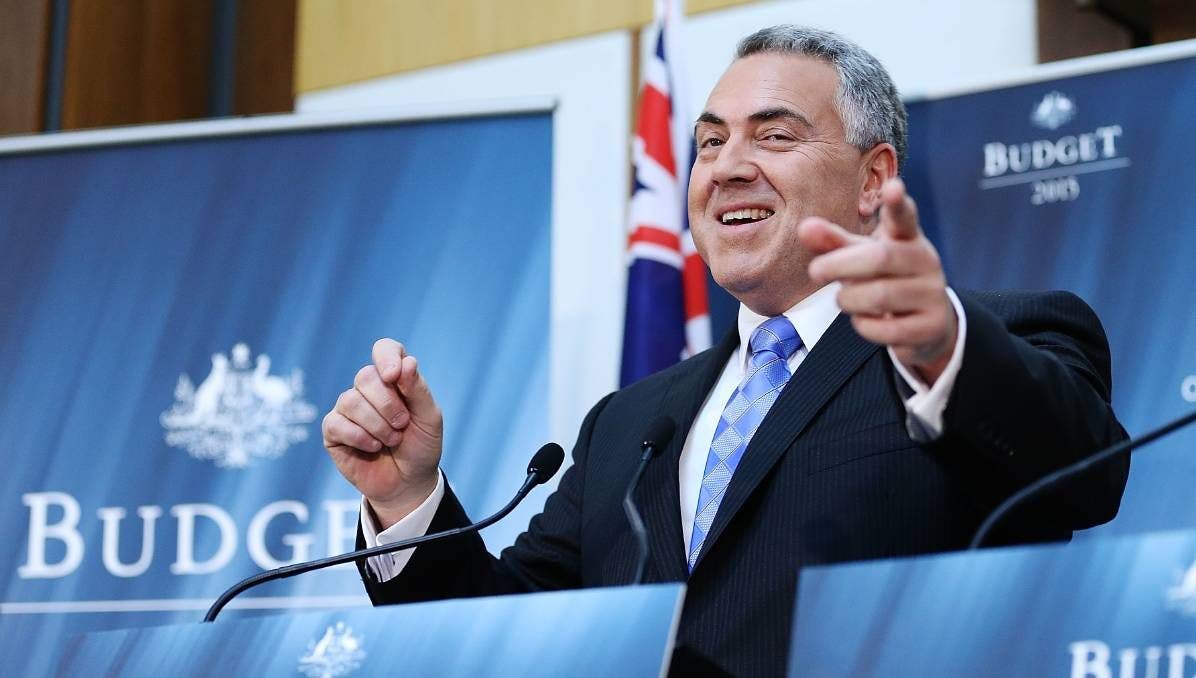
trends-and-insights
What Yesterday’s Budget Announcement Means for Equity Crowdfunding
Current legislation in Australia means equity crowdfunding platforms have significant regulatory barriers which include: Limitations around the involvement of ‘retail/unsophisticated’ investors; and The classification of what constitutes a public company (limitation of private company shareholders); and Marketing of private placement deals to the market (i.e. socialisation which is the pure essence of how crowdfunding works). These barriers have all but stopped anyone but high net-worth individuals taking advantage of equity crowdfunding opportunities and in a CAMAC report written to provide advice to the government last year there was very strong support for the implantation of Crowd Sourced Equity Funding (CSEF) legislation. The federal budget was announced yesterday, and had much anticipation for what the government would be hiding under its sleeve regarding the CSEF legislation. Overall, the government has delivered on promises and the budget has revealed a positive step towards following the global trend and legalising equity crowdfunding. No definitive time was given as to when the legislation changes are to be implemented, however it’s estimated to be sometime in 2016. Here’s a brief summary of what has changed within the budget The government has included $7.8 million in the budget to facilitate the introduction of Crowd Sourced Equity Funding. The $7.8 million in capital will be allocated to the Australian Securities and Investments Commission to implement and monitor a regulatory framework to facilitate the use of CSEF, including simplified reporting and disclosure requirements according to the provisions in the budget paper. The total funding for the FY2015-2016 will amount to $2.6 million in support for CSEF. According to the Treasury, this will help small business invest more, grow, and employ more Australians. This allocation of capital has set in motion the pathway for equity crowdfunding and we are confident of and are closely watching developments on this front. Other Budgetary Changes There were also a number of changes in the budget that affected not just CSEF platforms but the startups and small businesses that these platforms rely on including: Tax benefits for startups and small business The official budget document for Growing Jobs and Small Business states that from 1 July 2015, expanded tax concessions for Employee Share Schemes will enable employees to share in, and benefit from, the future growth and success of the business. It will also allow business owners to invest more of the company’s cash into growing the business. This $200 million investment will generate rewards for our entire economy. Jobs and Small Business Package The Jobs and Small Business package will total $5.5 billion worth of strategies. This is a major step towards establishing the CSEF industry and building the Fintech in Australia. As such, this crucial moment is an important step in building a competitive local economy in the Asia Pacific region and establishing leadership in the Fintech industry. What these changes mean for business growth and investment? Equitise equity crowdfunding platform was formed with one main goal, to connect businesses that want to grow with likeminded investors. We’re convinced that this platform and these government changes are good for the economy and will help stimulate and grow Australian startups and established businesses alike. These changes may be some time away but in the meantime signup to our platform and ensure you keep following this blog for the latest in equity crowdfunding.
May 4th 2015

success-stories
TRNZ Digital Travel Guides Campaign is Officially Closed
We are delighted to announce that TRNZ Digital Travel Guides funding campaign was successful. The funding campaign lasted for three months with 30 investors on board. The minimum investment sought was $200,000. The campaign attracted more than the required funding with 105.5% funds reached, $211,000. The majority of the funding started to pour in within the last three days of the campaign. The campaign attracted investors from Australia and New Zealand (11 Aussie/19 Kiwi) with an average investment amount of $7,000. Our first equity raising campaign is officially closed and got an overfunding status! Happy Equity Crowdfunding.
May 4th 2015

trends-and-insights
The Power of Sports Tech
Techcrunch recently posted an article by Christine Magee, editor for CrunchBase, about the recent surge in investing activities in the sports tech scene. The funding rounds for sports tech companies reached its peak at $927 million in 2014. In comparison to other industries such as e-commerce and SasS, perhaps sports tech does not attract as many investments. However, data shows that it has been increasing in the past couple of years with 30% YOY, mimicking the overall trend in venture funding. Recent trends has been evolving lately. Giant sports brands are taking advantage of sports tech startups with acquisitions and investing. For example, the LA Dodgers, the baseball team, has created the Dodgers accelerator program which is a 12-week program. Under Armour (UA), most notably, has been more aggressive. The American sports clothing and accessories company had made two acquisitions in the technology sector in 2014, Edomondo and MyFitnessPal. On the other hand, Nike had made investments in two companies and one seed fund. UA recent actions caught our attention and we found them quite interesting. Remember, UA came into market to cover a specific niche and that is to manufacture t-shirts using moisture-wicking synthetic fabric. And since then it expanded to cover shoes and accessories. With that in mind, we decided to look further to identify the reasons behind its recent acquisitions. UA Acquisitions: Endomondo ($85 MM) Endomondo is a social fitness network and mobile app allowing users to track their workouts, challenge friends, and analyse their training. 200 million users MyFitnessPal ($475 MM) MyFitnessPal tracks food habits and calorie intake. 80 million users MapMyFitness ($150 MM) MapMyFitness uses built-in GPS technology to provide users worldwide with the ability to map, record and share their exercise routes and workouts in an online database. 30 million users According to Kevin Plank, CEO of UA, the apps now have 130 million unique users combined, more than 60% of whom are women. As UA recently claimed it is the largest digital health & fitness community. It is apparent that UA is trying to establish their brand name through social media. If successful, perhaps it already has, UA could reach a status of brand name that is synonymous with health and fitness- quite a powerful asset. Think of Kleenex, Q-tips or Google (for searching). Also, these acquisitions enables UA to target their customers directly. These are hidden assets that can create a powerful defence against new entrants and that can protect future revenues. This approach not only can create brand defence mechanisms but can also give invaluable data regarding consumer behaviour. The data can give insights on users’ interactions, consumption, and lifestyles. Price Tag = Priceless For the numbers, since the acquisitions, cash and cash equivalents increased 71% to $593 million at December 31, 2014 compared with $347 million at December 31, 2013. Total debt increased to $284 million at December 31, 2014 compared with $153 million at December 31, 2013. Fourth Quarter Net Revenues Increased 31% to $895 Million; Full Year Net Revenues Increased 32% to $3.08 Billion. Apparel sales rose 30 percent in the fourth quarter. Footwear sales surged 55 percent in the three months ended Dec. 31. Sports tech is opening the door for major companies to capitalise on traffic and create new doors for innovation and brand awareness.
April 29th 2015
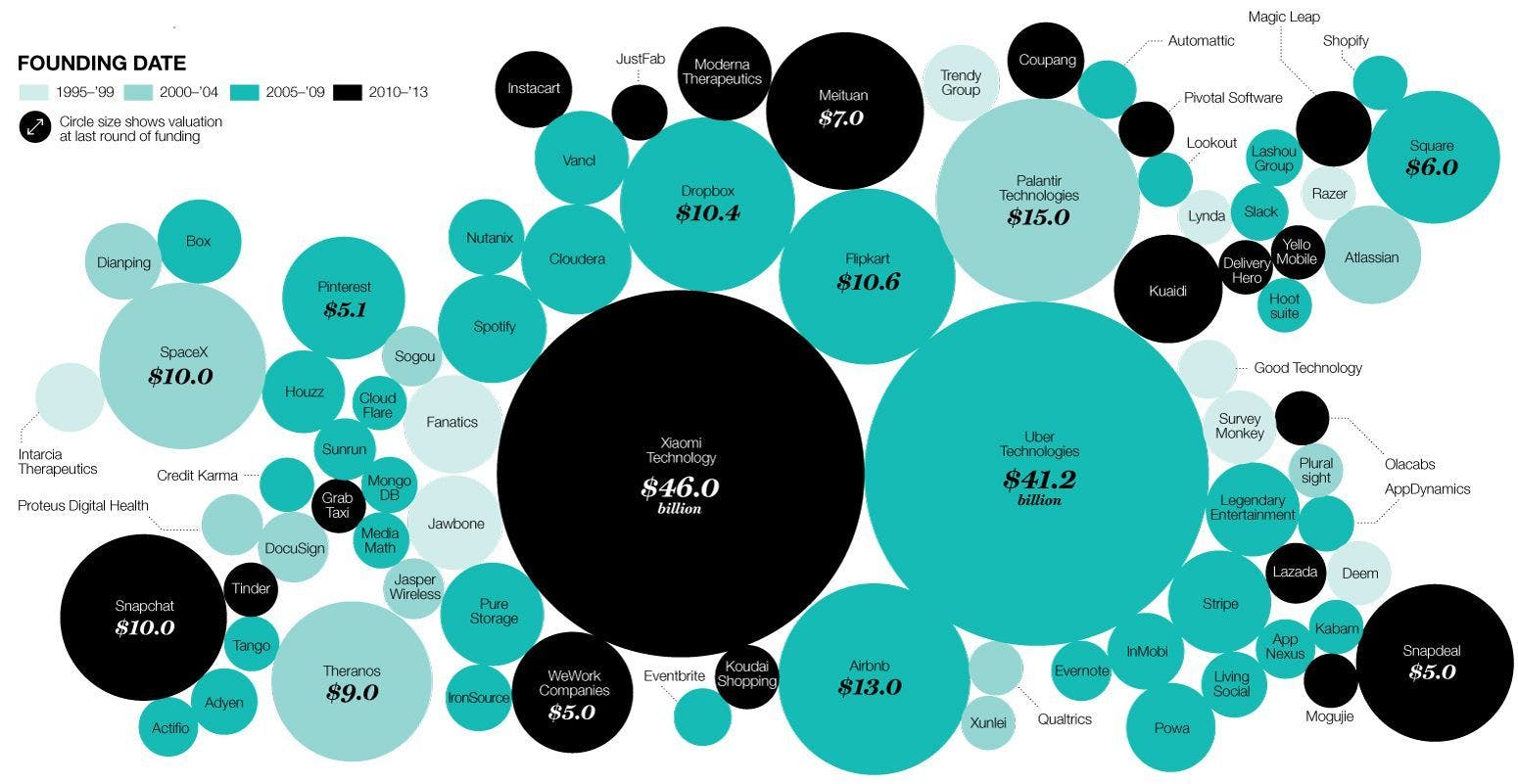
trends-and-insights
Startup Unicorns and Bubbles
The Tech media has been going a crazy regarding the high valuation for Tech companies in the private sector. These companies with high valuations are ironically called unicorns. Unicorns are companies with at least a $1 billion valuation. As unicorns represent mythical creatures, startup companies tagged with such a label are hard to find, as hard as it would be to spot the legendary creature. The valuation for these companies are however not based on their impressive historical performance. They are labelled and valued purely on expectations. Investor simply decide to believe in their “story”. To take it even a further, it has been reported that venture capitalists are on the lookout for startups with as much as a $10 billion valuation labelled as “Decacorns”. Some examples are Uber ($68 billion), Airbnb ($31 billion), Palantir ($20 billion), WeWork ($18 billion), SpaceX ($12 billion), Pinterest ($11 billion) and Dropbox ($10 billions) or “Super-unicorn” Facebook (£122 billion). Looking back, it can be deduced that Facebook started the hyper valuation trend. Before Facebook went public, valuations were conservative, however when the share sale opened it was valued at $104 billion. Since then, venture capital firms and investors are on the hunt for the next Facebook. The Features Of A Unicorn If we take the time to think about the common characteristics that these amazing companies have in common we can easily identify the following three aspects: 1. They function within a potentially huge market: the product has to have the chance of reaching a big audience or it has to be highly valuable for its users. 2. They offer something original: usually the product encloses an innovative feature or a new utility. It adds something new to similar existing products. 3. They provide an advantage: something that differentiate them from their competitors, from a community or technological point of view. A Global Overview From an historical point of view, the investment industry loves those unique labels, names or however one might call it, as they spice up the industry. In 2013, 15 companies joined the unicorn club, 38 in 2014, American tech platform CB Insights has created “The Global Unicorn Club”, which identifies 216 Unicorn companies, most of them tech companies, for a total cumulative valuation of US$751 billion. The top 5 global unicorn companies are: Uber ($68 billion), Didi Chuxing ($50 billion), Xiaomi ($46 billion), China Internet Plus Holding ($30 billion) and Airbnb ($29.3 billion). From a survey conducted by GP Bullhound, 47 unicorns have been identified in Europe in 2016, with a combined value of $130 billion, averaging a valuation of $2.8 billion each. The top 5 European unicorn companies are: Spotify ($8.5 billion), Skype ($8.5 billion), Zalando ($8.1 billion), Markit Group ($6.2 billion) and King Digital ($5.6 billion). The countries that host the majority of unicorns are the UK, Sweden, Germany and France. Silicon Valley is no longer the only big epicentre of tech unicorns. Even if American unicorns raise almost twice the amount of capital compared their European counterparts, the average revenue generation for a European unicorn ($355.3m) is almost three times higher than in the US ($128.8m). Even if the majority of unicorn companies are based in China or in the US, Australia and New Zealand are showing an increasing growth of startups that reach high valuations and are successfully funded. The Aussie and Kiwi tech ecosystems appear to be strong and healthy and companies such as the software company “Atlassian” and the email marketing firm “Campaign monitor” are an example of successfully tech companies, valued at $8 billion and $1 billion respectively. Risks Of Having A High Valuation Having a high valuation is dangerous and there can be some consequences. Usually early stage companies and startups go through several funding rounds. Before starting the second or third round, it’s important that the investors’ expectations have been met during the first round. What if the startup did not raise what was expected during round A and didn’t performed accordingly to the determined valuation? This scenario would make raising funds in the subsequent rounds a very hard task. For example, Fab, the design-focused e-commerce, was expected to generate $250 million in revenue in 2013 with a valuation of almost $1 billion, but in 2014, it generated only $100 million. Open-source software company Hortonworks was valued at $1 billion, and when it went public, it reached a market cap of $666 million. It could also cause stress or pressure on the founders or have unnecessary working capital. Stewart Butterfield, co-founder of Slack, admitted that they have spent only 1% of the money raised. He was also quoted saying “If you allow yourself to believe you’re worth $1 billion after two to three years of being in business, you’re going to get yourself caught up in trouble”. Why Are There So Many Unicorns? 1. The reason why there are so many unicorn companies worth billions is that, compared to the past, companies are taking longer to get to a liquid event, such as going public (IPO). A study conducted by Cowboy Ventures found out that it took seven years on average to go public. In 1994 it took an average of 5 years for a company to IPO, in 2014 the average grew to 8. The more a company stays private and continues to grows, the more the valuation increases. 2. Moreover, a wave of innovation is penetrating different sectors and countries around the world. Previously almost all venture-backed unicorn companies were concentrated in the United States and were connected in the software industry, now the location and the industry in which these companies operate are much more diverse. For example, more than a quarter of the unicorns identified in 2015 were founded outside the U.S. and, even if the software industry is still in first place, many new unicorns operate in different areas such as e-commerce, transportation, lodging and travelling. Some suspect that we are in a bubble similar to the dot-com bubble in 1997-2000, where there was a surge in the number of funds, number of deals and the total value of funding. Perhaps the media is exaggerating the number of unicorns that are popping up but, according to a study from the National Bureau of Economic Research, on average, unicorns are approximately 50% overvalued. The probability of investing in a unicorn is still quite slim - one would have similar chances in having twins - so keep in mind the risk that every investment carries with it and try not to get too excited about a companies’ story and high expectations.
April 23rd 2015

trends-and-insights
Dropbox and Evernote Locking Horns
In the near future Dropbox and Evernote might go toe to toe especially with Dropbox currently developing Composer. Composer allows users to share and edit files simultaneously. It can also be described as online collaborative note editing tool, pretty similar to Evernote. The two software companies by no means should be classified as close competitors as the two vary greatly in funding obtained and company size. Dropbox employs around 1200 employees and the number is still growing. On the other hand Evernote, some might estimate, employs around 70 people. Dropbox to date has accumulated US$1.11 billion of funding since 2007 and generated revenue between $300M-$400M in 2014, nothing short of impressive. Coming from humble beginnings of just $20K seed round in 2007, to $250M raised in 2011 and to $500M line of credit in 2014, Dropbox is surely cannot be classified as a Tech start-up. It is too big to be acquired, especially with the outstanding line of investors backing the firm (take a look below); an IPO is definitely on the to do list in the near future. There is a big momentum behind Dropbox with no obvious explanation as to why it has such an inflated valuation multiple. In general valuation multiples could be misleading and misrepresenting the true value of a business (a topic for another post) but it could provide a benchmark where one can compare similar companies for investing purposes. According to CB Insights, Dropbox was valued at $10B in 2013, 50x 2013 revenue of $200M (rumoured)- perhaps a bloated valuation. One of its main competitors, Box, that has similar product is valued at $2.19 billion as of 24/04/2015. (source: Yahoo Finance) A private company with a higher valuation than a similar public company is something to think about. Box has generated $212 million of revenue in 2014 (CB Insights), and that revenue corresponds to a 10.3x valuation multiple. As for Evernote, it has raised $203.8M of total raised funds to date (it could be higher due to undisclosed investment amounts) and a valuation of $1 billion in 2012. Also it has an 85 million user base compared to Dropbox of 300 million user base. According to Evernote, 4.5 million users are paying subscribers ($45 per user on an annual basis). However Evernote is creating a new stream of revenue through its Evernote Market which generated $4M in 2014. The total revenue for 2013 is estimated to be $206.5M. Suffice to say it will be a hard endeavour for Evernote to compete with Dropbox at this stage. It is worth noting that Evernote is more effective in generating revenue per user than Dropbox. The graphic below shows the different backers that are supporting Evernote and Dropbox. Both companies have Sequoia Capital, T. Rowe Price, Salesforce Ventures and Valiant Capital Partners as common investors. Time will reveal what implications of having common investors could have (perhaps a merger) and what the future is storing for both companies.
April 21st 2015

trends-and-insights
Investing in Alternatives – What is it?
In the world of investing, alternative assets or alternatives are your non-traditional asset classes (stocks, bonds and cash). So quite an open definition and a lot of scope for what is an alternative asset, and for the purposes of this discussion we’ll include property as a traditional asset class. Why do people invest in alternatives? Think about the old adage of not putting all of your eggs in one basket. The main reasons to invest in alternatives is to diversify your portfolio – a risk management technique that mixes a wide variety of investments. By not having all of eggs in one or two baskets you actually reduce the risk and correlation of your investments. This means when there’s a crash in one stock or the entire market the loss is likely to be lessened by the other assets in your portfolio. There are many different types of alternative assets that people can and should invest in. Some of the more traditional alternatives are gold, hedge funds, venture capital investments and infrastructure assets. Some of the less “investable” but more common alternative investments people hold quite often are not for investment reasons. These are art, antiques, coins, stamps and other collectibles, even fine wine. So you might already have some and not realise it. Keep in mind that the 10yr old case of Oyster Bay Merlot probably doesn’t quite cut it and is probably over the hill! The problem with this is these tend to be the domain of the wealthy and are difficult investments to make and hold so you need to be careful in investing in them. A recent example is the record sale of a Paul Gaugin painting that sold for US$300m or the 1962 Ferrari 250 GTO that sold last year for US$38m. While these are the extremes they are reflective of the staggering cost and investment required when investing in collectables. The new world of alternative assets includes alternative finance such as peer-to-peer (P2P) and equity crowdfunding. Two simple concepts that utilise the reach and efficiency of the internet to allow many investors to contribute a small amount to fund a loan or to buy shares in business. People are investing in P2P loans and Equity Crowdfunding not purely for the returns but the passion and motivation from helping fund people in their local community or with great ideas and businesses they really believe in. It’s a chance to bring passion back to investing! What are some of the issues in investing in Alternatives? The greatest problem with alternative assets is their liquidity, most are extremely illiquid meaning you cannot sell them quickly and easily if you need to convert them to cash. Another issue relating to this is they can be very difficult to value, so it can be hard to know the value of your portfolio. For this reason it is smart to have alternatives as a fraction of your portfolio. How much should I invest in Alternatives? This is the difficult part, some US brokers like Merrill Lynch and Morgan Stanley suggest that you can have up to 30-40% of your portfolio in alternatives. However, this is not practical or appropriate for retail investors and the general assertion is that retail investors should have anywhere from 5-15% of their portfolio invest in these assets and importantly not all in gold or art or venture capital, you should have a mix. So with a new world of opportunity in NZ, you can invest in P2P via Harmoney and obviously you can invest in Equity Crowdfunding via Equitise!
April 13th 2015
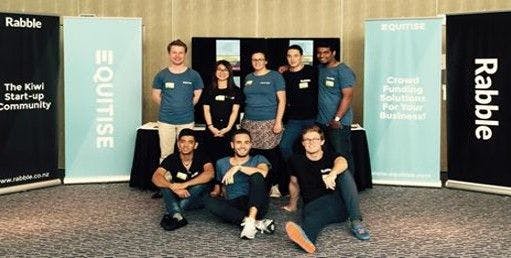
trends-and-insights
The Entourage: The Inaugural Kiwi Unconvention Kicked Arse!
Kiwi entrepreneurs came out in force for this year’s Unconvention – the largest event for New Zealand and Australian entrepreneurs. Not only was it a fantastic occasion to hear from a diverse group of successful entrepreneurs and investors, the setting also provided an excellent opportunity to network with likeminded business people. The collective experience in the room made it difficult to not come away with a new insight or connection. Listening to Peter Davison (Paypal investor) and Justine Flynn (Thankyou.) was certainly a highlight of the event. Peter was refreshingly straight-shooting with his advice for early stage entrepreneurs and bootstrapping. Justine shared her experiences with early supply hiccups when founding ‘Thankyou.’, and how social entrepreneurship can make a huge impact worldwide. It will be interesting to see what surprises the Entourage Unconvention team has for Kiwis this September.
April 6th 2015

trends-and-insights
Is Australia's VC Landscape Choking?
Australia’s level of venture capital (VC) activity is significantly lower than other developed countries, hindering our innovation ecosystem. This is illustrated below, where between 2003 and 2013 the United States (US) invested US$285 billion in VC funding, equal to four times more than Australia (per capita) which invested US$4.5 billion over the same period of time (MoneyTree, 2013). This puts the Australian VC landscape in the bottom half of OECD (OECD Publishing (Paris), 2013). Australia vs United States VC Spend (2003 - 2013) There are currently very few Series A deals funded by Australian VCs and even fewer Series B/C investments. The driving catalyst of this situation is the sheer lack of scale in our local investment funds, resulting in successful Australian high growth businesses relocating their larger cornerstone funding rounds overseas. A recent example of this is Campaign Monitor which received $US250m investment from US-based Insight Venture Partners in April 2014. This is the largest ever single VC investment in an Australian tech company (The Australian Business Review, 2014). The level of local VC investment in Australia can be seen in figure below where it is evident that spending from both local and international (note: a large portion of this was from Insight Venture Partners – above) VC funds has increased significantly. VC Spend in Australia (FY10 - FY14) (AVCAL, 2014 Year Book, 2014) When considering the amount of funds being raised by VC funds, it is evident that this increased spending cannot be sustained. An overview of the number of new funds in Australia and the corresponding amount of capital they have raised is shown in the figure below. What is immediately evident from looking at these figures is the large decline in total funds raised by VCs since 2012 from $240m to $120m in FY14. In addition to this, the average amount raised by individual funds had also decreased from $60m in FY12, to 51m in FY13 and $30m in FY14. VC fundraising (FY10 - FY14) (AVCAL, 2014 Year Book, 2014) To improve the local VC space, Australian VC funds need to have enough capital committed to support both initial Series A investments and also “follow on” in later funding rounds. Through increasing the capacity of funds, investment activity in this sector of the economy will also subsequently flourish, increasing the likelihood of investors achieving big VC wins as experienced in other global markets. Australia’s small sophisticated angel investor population (when compared to the larger markets around the world) means that we require the commitment of institutional capital to support the evolution of a sustainable VC industry. However, until recently Australian institutions have failed to get involved in VC funding space. Institutional investors (such as superannuation funds) will typically need to see a track record before investing in VC funds. The catch is, by the time this validation presents itself these larger institutions will have missed the boat and local businesses (such as Atlassian and Campaign Monitor) will have completed funding rounds offshore. It appears as though this vicious cycle of “suffocating the VC industry” may now be on a gradual mend with two new institutionally backed venture funds (Reinventure Group and Oxygen Ventures) launched in 2014, giving hope to the beginnings of a changing local early stage funding landscape. Reinventure Group is backed by Westpac with a $50 million VC fund, to date they have made 3 investments totalling $10m (Sydney Morning Herald, n.d.). Oxygen Ventures, a $50 million fund, is led by internet entrepreneur Larry Kestelman (AVCAL, 2014 Year Book, 2014), this fund has made 5 investments (one of which based in Silicon Valley) to date for an undisclosed consideration. A strong VC environment isn’t just imperative for supporting the local early stage funding ecosystem, it is also hugely important and beneficial to the Australian innovation, employment and research and development spectrums (AVCAL, The Economic Impact of VC in Australia, 2013). Research from AVCAL suggests that: For every dollar of assets owned, VC backed companies innovate at a much greater rate than other companies; VC-backed firms make up only 0.01% of GDP but 10% of all business R&D expenditure in Australia; In Australia, VC-backed companies spend on average 200x more on R&D per employee than other businesses; Successful VC-backed companies have strong job creation rates and attract highly skilled staff; Top VC-backed companies Cochlear, ResMed and SEEK alone employ nearly 7,000 people; VC-backed companies are IPO-ready in half the time needed by non-VC-backed companies.
April 4th 2015

trends-and-insights
Regulatory Considerations for Equity Crowdfunding
Overview Government policies are an integral tool in shaping the digital landscape and promoting the growth of the digital economy. This is particularly relevant when considering the financial services industry in Australia which is paralysed by “tired” regulation, dated security processes and cumbersome protocols which in some cases haven’t been changed in decade. The issue that Australia is currently facing is how to design and implement strategies that will optimally support economic growth, productivity, innovation and employment, while also ensuring balance by mitigating core risks (Deloitte Access Economics, 2015). "A strong policy framework will facilitate the growth of the digital economy and ensure it plays a role in providing employment, adding to productivity growth and generating consumer benefits." (Deloitte Access Economics, 2015) Currently, there are significant regulatory constraints on private companies that wish to participate in public fundraising. The options are tightly regulated, costly and burdensome. A regulatory framework that accommodates equity crowdfunding within the Australian corporate landscape will have positive effects on the entrepreneurial industry and more broadly, the SME landscape by increasing the flow of funds from investors not currently available or easily able to invest in private companies. Current barriers in the Australian framework: Proprietary companies are capped at 50 non-employee shareholders: With average shareholder numbers in international equity crowdfunding campaigns equaling 96 (CrowdValley, 2015) in the US and 104 (Crowdcube, 2015) in the UK, the current cap of 50 non-employee shareholders is a material restriction in the ability to encourage meaningful amounts of capital (CAMAC, 2014). Especially as this is from limited historical data that is skewed towards sophisticated deals, we anticipate the average number will be much higher over time. Disclosure to Investors: The current disclosure requirements imposed on private companies are costly, cumbersome and time consuming. Proprietary companies are prohibited under the Corporations Act from engaging in any activity that would require disclosure unless the offer is being only made to existing shareholders of the company and employees. Proprietary companies are able to make offers which do not require disclosure under the s708 exemption for small scale offerings. This restricts the issuer of making a transfer of securities to a maximum of 20 retail persons, raising no more than A$2million in any 12-month period. A private company could also make an offer of securities for sale or issue to a sophisticated investor, which does not require disclosure. However, investors must meet high financial thresholds to be considered sophisticated. These types of exemptions do not accommodate the type of fundraising facilitated by crowd-sourced equity funding models which typically involve a retail class of investors. So…. What is happening to change this? Following the release of a report from the Corporations and Markets Advisory Committee (CAMAC) summarising the current state of play and their suggestions to government in 2014[1] the Australian Government has made significant progress in working towards a proposed system that will work for all key stakeholders, without being overly restrictive to limit innovation and growth. Milestones since the CAMAC report release include: October 2014: The Government announced that it would consult on a potential regulatory framework for equity crowdfunding in Australia its Industry Innovation and Competitiveness Agenda.[2] December 2014: The Government releases a discussion paper, inviting core stakeholders to respond to a series of questions pertaining to the rollout of equity crowdfunding legislation.[3] December 2014: Special mention of the need to accommodate equity crowdfunding in The Financial System Inquiry, chaired by David Murray (Financial Systems Inquiry, 2014). February 2015: A series of round table discussions directly relating to the core elements of the proposed legislative changes. This was hosted by Bruce Bilson the Minister for Small Business. February 2015: The Minister for Small Business announces the Federal Government will be releasing the new model for equity crowdfunding in the Spring Session of Parliament.[4] If executed properly in line with overseas market practice the legislation will assist private businesses in having the best chance to utilise the opportunities that CSEF can offer without dramatically increasing their costs or regulatory burdens. This will bring Australia up to date with other developed economies. Considerations of crowdfunding and potential risks: There are risks for investors in crowdfunding. However, its open and transparent nature when combined with the efficiencies of early stage markets equate to an effective and safe medium for pooling funds to achieve collective goals. Here are some of the risks: Risky investments: The inherent nature of investing in private companies, it is risky; the securities are illiquid; the significant reliance on founders and the potential loss of all funds. Fraud: however the director laws in both Australia and New Zealand provide significant protection and recourse for investors. Along with the fact that the crowd have proven to be effective at weeding out fraudulent companies. Lack of education: Both investors and entrepreneurs might not know exactly what they are getting involved in and the expectations of the other parties. Equitise has built into its platform many measures and structures to mitigate as much risk as we can throughout the process. Remember risk = reward! [1] Corporations and Markets Advisory Committee, Parliament of Australia, Crowd sourced Equity Funding Report (2014) [2] The Treasury, see: http://www.treasury.gov.au/ConsultationsandReviews/Consultations/2014/Crowd-sourced-Equity-Funding [3] http://www.treasury.gov.au/ConsultationsandReviews/Consultations/2014/Crowd-sourced-Equity-Funding [4] Smart Company, see: http://www.smartcompany.com.au/finance/45508-bruce-billson-equity-crowdfunding-framework-will-be-on-the-table-by-spring.html
March 31st 2015

trends-and-insights
Technology and Crowdfunding are Democratising Access to Finance
Crowdfunding is one of the most disruptive new alternative financial model, which is changing the way capital is raised and invested. Technology, social media and the Internet are challenging traditional financial models as they give rise to a new type of financial services company. These new startups offer compelling new services, at a lower cost and with higher returns compared to the former ones. Social media, big data analysis and mobile accessibility all provide the opportunity to raise funds in an easier and quicker way, reaching a wider audience and gaining greater exposure. This easier process leans itself to the times with people nowadays demanding convenience and instant gratification. This comes in the form of online payments services, cloud security and electronic identity verification which provide simplicity and speed in the alternative finance space. With the growth in internet access and smart phones globally, the opportunity for alternative finance to grow will continue. One area of alternative finance that is taking advantage of this landscape is crowdfunding. Alternative finance in the Web 2.0 The creation of social websites such as Linkedin, My Space and Facebook has led to build the foundation of the social web or WEB 2.0, where it has become the norm for people to communicate, interact and share interests with friends through the internet. This landscape enables sharing, transparency and communication, giving more people access to financial services and providing customers with more transparent and quick services. Here are the factors that characterise the WEB 2.0 financial services world: SOCIAL PLATFORMS: they facilitate word of mouth and the creation of communities, decreasing customer acquisition costs. Through socials, companies can create a community specifically connected to their platform. Consumers are demanding more FLUENT AND EASY PAYMENT OPTIONS, and investment and lending processes as a result of more readily available information, the desire to share experiences and the proliferation of online and mobile-first user experiences. TECHNOLOGIES AND DATA: technologies and data are boosting innovation and are improving the services provided to customers, providing faster, more transparent and affordable services compared to traditional processes. A good example are neobanks, 100% digital banks which by cutting down infrastructure and other banking costs, are able to offer competitive rates and fees to their customers. Crowdfunding and the WEB 3.0 That same social web has now built the foundation of crowdfunding for WEB 3.0, the evolution of the internet and social web applications that meet capital formation (Dresner, 2014). Jason Best and Sherwood Neiss, Crowdfund Capital Advisors, co-authored the crowdfunding investing framework used in the JOBS Act to legalise securities-based crowdfunding in the United States and defined the term crowdfunding in its various formats as: The pooling of the financial resources of many individuals to convert an idea into a project or business. Instead of relying on a few large donors, it requires many small ones. (Dresner, 2014) Crowdfunding has old origins - in 1876, the Statue of Liberty was financed through Crowdfunding. The citizens of France paid for the statue and the citizens of the United States paid for the pedestal. In essence, crowdfunding converts everyday people, rich or poor, into micro angel investors to power ideas and business growth. (Dresner, 2014). As mentioned above, technologies and social media are impacting finance and are changing consumers financial behaviour, defining what nowadays is called the socialisation of finance. Financial services are moving online, they are becoming more and more automated, empowering customers, disrupting traditional banking systems and creating alternative markets. Different sub-sectors are benefiting from this evolution that is democratising the access to financial services, such as wealth management, lending, payments and ultimately, crowdfunding. Crowdfunding, in all its forms such as debt, equity, rewards and donations, is one of the most disruptive new financial model. It’s changing the way capital is raised, new products are developed and capital is invested. Crowdfunding has evolved from being a donation and charity fundraising platform, such as GoFundMe, to a reward platform like Kickstarter and Indiegogo and to an equity platform such as AngelList or Crowdfunder. The following trends are shaping crowdfunding as an alternative funding model: Investors are attracted by crowdfunding projects as they feel involved in the creative process and they can see a transparent way to contribute or invest in companies aligned with their values. Moreover, crowdfunding is one of the most social categories of alternative financing, where campaigns can benefit from significant viral growth. Groups of people passionate about a project can share the campaign across their social networks and encourage friends to join the campaign. Crowdfunding platforms can rely on a strong network effect in proportion with the increase in the number of campaigns hosted. The first step of the network effect is the entrepreneur starting the campaign, then, once investors discover the offer, they start sharing it across social media. Social networks drive traffic towards the crowdfunding platform, helping the campaign to turn out successful and positively impacting future campaigns.
March 30th 2015

trends-and-insights
Activist Investing - Contrarians Knocking on the Door
Activist investor aims (or activist alternative investors) to identify a publicly traded company that is trading below its intrinsic value and buy a stake in the company. The company could be traded at a discount for a variety of reasons. However, activist investors enter the deal with a vision to improve the financials of the company by changing the capital structure, changing the management, declaring dividends or buying back stocks among other tactics. Previously activist investing had a negative image in the corporate industry. Active investors such as Carl Icahn were labeled as corporate raiders and corporates shunned the idea of having such an investor as a shareholder. However, the stigma has changed recently to a more or less positive image. Mary Jo white, Chair of the Securities and Exchange Commission, noted that companies have been increasing their engagement with their shareholders including activist ones, a positive trend. The targeted companies most likely would have a) good operating performance but undervalued, and b) the activist perceives that there are hidden capital with the potential to increase the shareholder’s value through some changes. A report by Citi on activism investing found that the targeted companies trading at low multiples than their industry peers, more than 33% of companies targeted by activist investors experienced stock price appreciation. The process usually is followed by a proxy contest where activist investors try to bring the majority of the shareholders to their side and vote on the competing proposals. A recent whitepaper published by Alternative Investment Management Association on alternative activist investments to investigate the impact of such activism found the following interesting observations including: Activist Insight defines “follower return” as provides investors with an idea of the potential gains if they jump in after an activist. The following table shows the annualised follower return for the top activist investor for 2014. Source: SRZ Activist Investing Annual Review 2014 Activist hedge funds experienced 269% growth, almost $120 billion, from 2009 to 2014.[4] 237 publicly traded companies targeted by investors worldwide in 2013. US companies accounted for 71% of all companies publicly targeted by activists in 2013. European companies rose from 14% of the total to 19%. Canada was accounted for around 6%. In Australia, Goldman Sachs’ local head of investment banking, Christian Johnson, recently wrote of shareholder activism, “It’s in its early stages and we don’t know how it will evolve, but we definitely anticipate it will impact Australia; the only question is what form it takes... As such, we are recommending that our clients prepare to respond to potential activism.” On a final note, Warren Buffet avoided this kind of investing for most of his career as he likes to invest differently and I quote "Charlie and I have found that making silk purses out of silk is the best that we can do"
March 30th 2015

trends-and-insights
Fintech Disruption in Australia
Innovation is a key driver of economic prosperity. More than 80% of Australian business leaders believe innovation is the main driver to creating a competitive economy and the best way to improve our country’s productivity. The emergence of new technologies and the change of consumer behaviour have put pressure on traditional business models, demanding a rapid change from stakeholders to accommodate the new landscape. An example of this in the financial services space is “fintech” (financial technology), which merges ICT with financial services. International financial hubs are leveraging the proximity between these two industry sectors to promote partnerships, producing efficient and tailored services to their customers. There has been a global movement towards fintech investment. Examples of this include: The UK government has been one of the world leaders in embracing fintech by producing different investment schemes, regulations reforms and overall collaborative support between innovative startups and the private sector; Banks such as Wells Fargo in New York have been also accelerating collaborative efforts to partner up with fintech startups and companies in Silicon Valley; Investment Banks and investment management corporations, such as BlackRock, have been benefiting from the new technology by securitizing P2P loans. This movement has resulted in large amounts of capital being invested in this area by some of the largest financial markets in the world: Silicon Valley has an annual fintech investment of USD $1.5 billion; New York USD $600 million; and London USD $66 million. It is imperative for Australia to expedite its efforts in supporting new financial technologies to ensure it continues to remain a leader in the international financial hubs. Sydney has been experiencing modest growth in the fintech industry and is the capital of Australia in tech start-up activity with 950 businesses. There are three funds that invest directly in Fintech (AWI, Reinventure and Oxygen Venture), with limited support from established firms (KPMG, 2014). The main elements to facilitate the creation of Sydney as the dominant fintech hub in the Asia Pacific region are available: Sydney is the capital of financial services in Australia, representing 42% of total national workforce in financial and insurance services. Sydney’s financial services industry contributes $57 billion to the State’s economy and has the highest concentration of financial professionals throughout Australia (KPMG, 2014). NSW has the highest concentration of Information and Communication Technology (ICT) workers with almost 32% of total workforce, and has the highest ICT annual university enrolments among the States (Australian Computer Science Society, 2013). In May 2015, fintech start-up hub Stone and Chalk will be launched in Sydney. The hub came into being through a collaborative effort by the New South Wales government and other major players in the financial industry (22 in total) such as AMP, Westpac, ANZ, Intel and KPMG. Stone and Chalk is a not-for-profit fintech hub with the goal to establish a world leading fintech Industry (Stone & Chalk, n.d.). When combining these factors and developments in the Sydney fintech environment, there is a strong indication of the momentum that is gathering and the opportunity that Sydney should capitalise on to become the dominant force in Asia-Pac for the growth and progression of financial services.
March 24th 2015
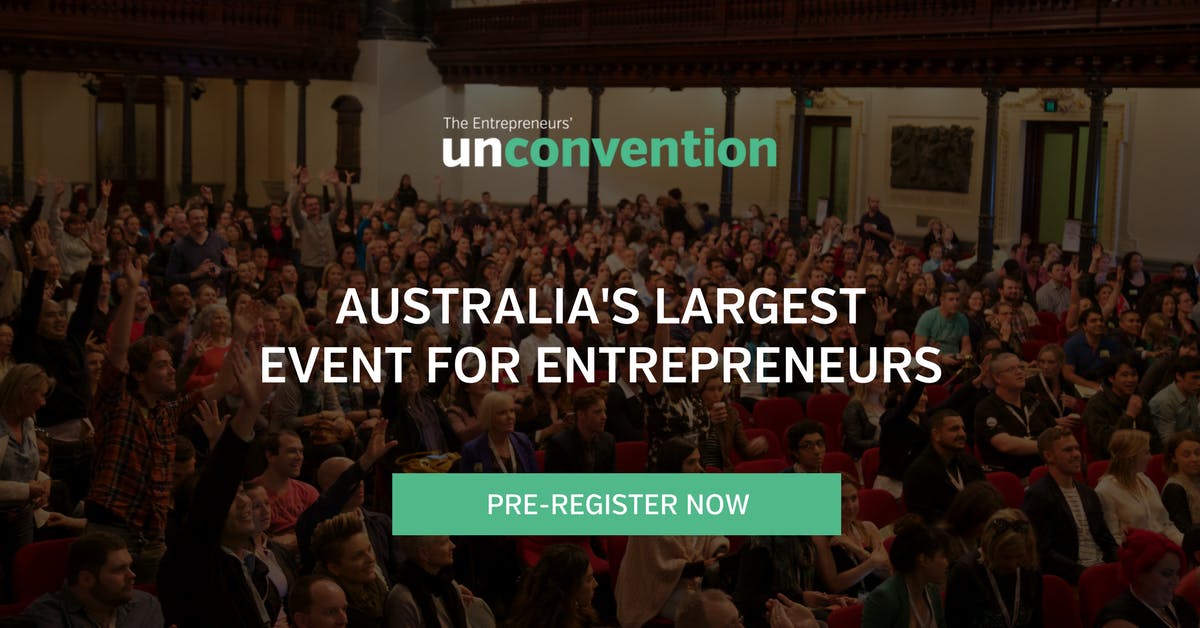
trends-and-insights
Equitise is Partnering Up with The Entourage in Auckland!
The Entourage’s largest event for entrepreneurs, Entrepreneurs’ Unconvention, is taking place in Auckland on this coming Saturday, 28th March, 2015 at 9.00 am. With over 60,000 members around the world, The Entourage is Australia’s largest educator and community of entrepreneurs. Jack Delosa founded The Entourage in 2010 and launched the Scalable and Saleable program, creating a tailored program for early stage entrepreneurs around Australia and adding $47.5 million in business value. Please do yourself a favour and follow this link to watch success stories videos. Here is what to expect from the convention: The Entrepreneurs’ Unconvention gives you the exact steps to win more business, make more money and manage your business better, so you can spend more time doing the things you love. The Equitise team, along with Rabble, is one of the main sponsors for this event. Together with The Entourage team, Equitise will provide the following tools to help entrepreneurs to bring their businesses to the next level Learn: How top entrepreneurs disrupt traditional markets through innovative products & services Creative strategies to leverage your marketing budget to reach more people for less money How to build a business that can scale and ultimately works without you! Raising capital through equity crowdfunding How to participate in our newly launched competition Register your details on Rabble platform to gain more exposure Experience: Insights from Australia’s most successful entrepreneurs An incredible day of pure inspiration and learning Being part of a growing community of amazing entrepreneurs And remember to……….. DREAM OUT LOUD!
March 24th 2015

trends-and-insights
Acquisition completed: Rabble is the Newest Member of the Equitise Family
What happened? Equitise has recently acquired Rabble. Rabble is a Kiwi online business/community directory founded by Southgate Labs in 2013. The Directory includes established businesses and start-ups. The goal of establishing Rabble is to raise businesses/start-ups profiles, recruit, and attract investment and advice. Why? The acquisition brings 600+ Rabble tech companies, investors and advisors to the Equitise platform. As the first trans-Tasman crowd-equity platform, we intend to run Rabble in parallel with our Australasian-focused product, providing members with easy access to crowd-funding opportunities. This acquisition will boost our competitive durability and our brand. Our mission is to enable Aussie & Kiwi startups to raise capital in an intuitive, simple and social way. As such, this acquisition supports our belief that removing traditional barriers to investing and sourcing capital is crucial to help businesses grow and ultimately enhance the overall economy. What are the benefits? Easy access to online business/start-ups directory 600+ of New Zealand companies including hi-tech, e-commerce and life sciences. Simplifying the process to access investors, advisors, start-ups and businesses Collaborating with highly skilled professionals Marketing Campaign? To celebrate this milestone, we are launching a competition for both established companies and early-stage businesses with prizes amounting to +$20,000. The prize in the established business category includes a package of business services valued at over $10,000 to help the winners raise capital for expansion. The early-stage category prize includes $10,000 web development and additional business growth support including mentoring from Suse Reynolds, an angel investor and Executive Director of the NZ Angel Association, who will also be helping Equitise with the judging. Companies are encouraged to enter at www.equitise.com/competition - entry takes just 2 minutes and entries close on 1st May 2015. Concluding remarks: Rabble creator Rowan Simpson: “We originally built Rabble because we thought it was an important resource for early-stage companies in New Zealand who wanted to raise their profile, build their team and attract investors and advisors.” “We’re excited the team at Equitise share this view and look forward to seeing it continue to flourish in the future as part of their platform.” Equitise Co-founder Chris Gilbert: “We are excited by the strategic benefits Rabble is going to provide to Equitise and look forward to giving members of both platforms a fantastic and integrated service in the coming months” Equitise Co-founder Jonathon Wilkinson: “We see Rabble as a tremendous resource to benefit the private company ecosystem. We are dedicated to growing it and having the community grow along with it!” Happy Crowdfunding!
October 12th 2014

for-companies
Startups: Habits of Angel Investors
Being a successful angel investor requires a lot more than just luck. It is the combined result of experience, great dedication, understanding of core business drivers, the ability to assess potential risks and good old fashioned gut feel. Angels (either consciously or subconsciously) conform to a list of "habits" in order to achieve investment success. Equitise recently interviewed a series of angel investors in Australia and New Zealand to provide some insight to fledgling startup’s as to what is going through their minds when assessing your businesses. Have a read below to see what they said. When considering an investment to add to their portfolios: Due diligence: Angel investors not only have an extensive understanding the core risks associated with startup investment, they also conduct due diligence to mitigate many of them. Despite differing approaches to conducting due diligence, angel investors perform thorough due diligence to increase the likelihood of a profitable investment. Diversification: A diversified portfolio is one of the greatest tools of angel investors. As the majority of startups fail, portfolio diversification acts as an insulator against the total loss of capital. Consequently, spreading your risk is the most effective way to achieve a higher overall return. Investment criteria: Angels (and early stage VC’s), typically have particular investment criteria they consider when making an investment. If it doesn’t fit, many will walk away. This approach is a great way to mitigate investment risk as it enables investors to assess based on industries and business models they understand. Characteristics they look for in an investment: Kick arse people: You could have the best idea in the world, however without the right team execution can be near impossible. Angels look at the skills and traits of a company’s founders. Having the right team determines the path and outcome of a new venture more than any decision in the lifecycle of a company. A scalable business model: Scalability refers to the increase in sales growth attained by a business without adding much in the way of direct costs – for example: does gross margin increase as your business grows? Simply speaking, this is important as it means profit can be amplified when an angel invests capital into top line revenue growth. Disruption: Are you changing an industry? Are you making peoples lives easier? Are you saving people time and money? These are all questions that angel investors want to know. If you can answer yes to these questions and provide an intelligent explanation as to why you are going to be making the world a better place, then you will be one step closer to closing that investment! The biggest deal breakers for angel investors: Valuation: Valuations need to be realistic so valuing a startup with no track record, no market penetration and no experience at $10m isn’t going to work. You need to be realistic; if you overprice your business you will lose your credibility. The devil is in the detail: If your financials and/or business plan are lacking in detail then chances are you wont get a chance to nut out the specifics of a term sheet. This includes credible references to any claims and references you make in your presentation. Original idea: Investors want to see ideas that are innovative. If they can find examples of similar products, you’ll need to have a clear plan for differentiating yourself. Being a startup in need of cash is not an easy place to be. Try and put yourself in the angel’s shoes, put your best foot forward, and do everything you can to get them believe in your company as much as you do. If you get the basics right (see above), you are well on the way to securing investment to grow your business. Good luck!
September 29th 2014
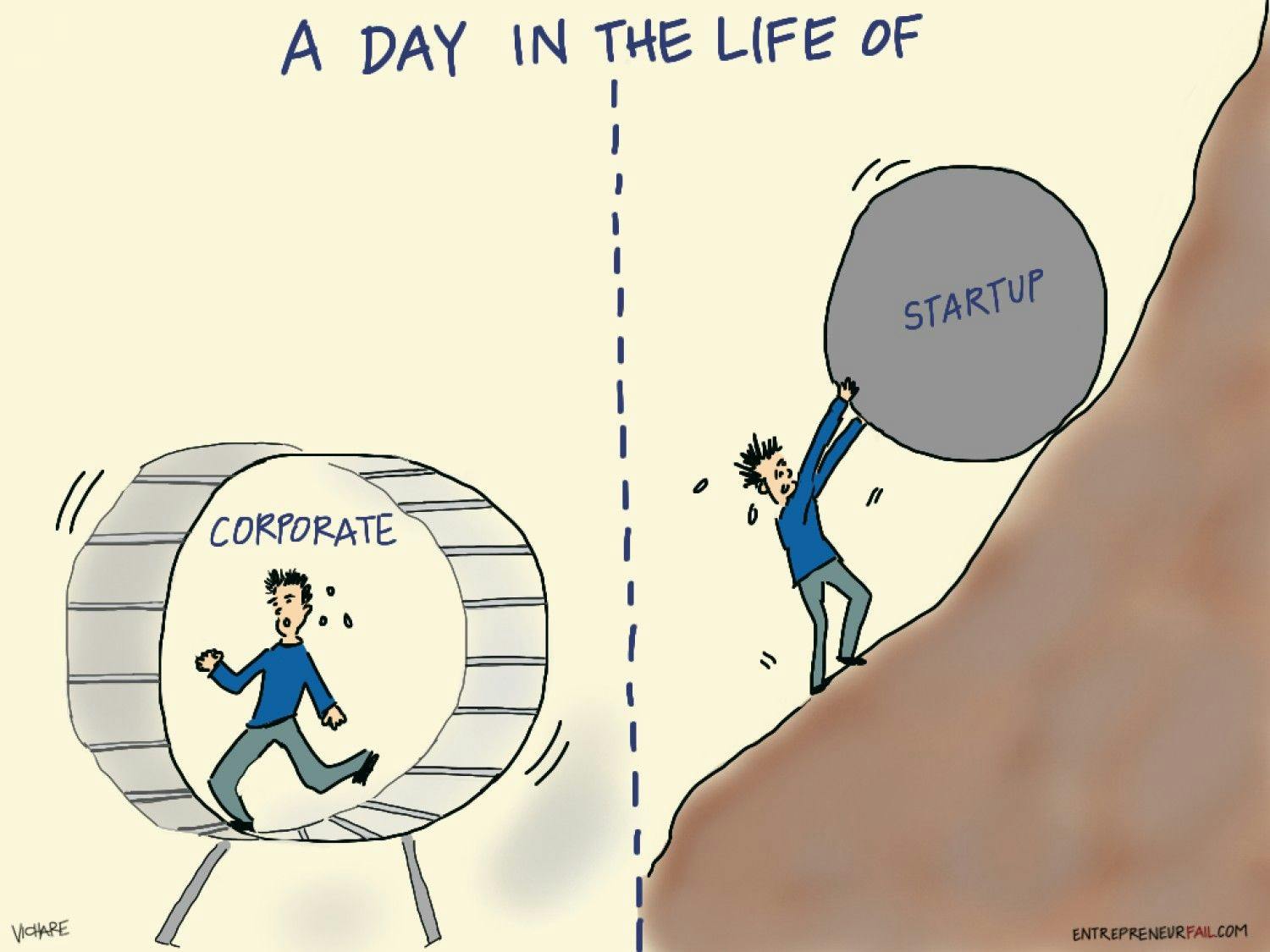
for-companies
Top 10 Hurdles of Start-ups
Developing a start-up can be extremely rewarding. For entrepreneurs it's a dream come true fuelled by passion and constant learning. Despite the start-up journey being often a positive one, we rarely hear about the harsh realities of what this journey entails and what hurdles entrepreneurs face.The following top 10 hurdles should not be viewed as pessimistic and downbeat, but quite the opposite. By being aware of and knowing these hurdles entrepreneurs can not only be more prepared but also more enthused to soldier on. 1. Getting the idea right Coming up with an idea for your start-up is hard enough. Coming up with the right idea is even harder. The first implementation of your idea will often be wrong. It can take entrepreneurs years to develop a start-up concept, with the best problems to solve often being the ones that affect them personally. Never the less, getting your start-up idea wrong is actually a good sign. It means you idea is evolving, you’re receiving feedback and your start-up is progressing! 2. Building the team Very few successful start-ups are founded by one person. It takes a team of passionate and knowledgeable people, who offer support and contribute the their knowledge, to turn a start-up into a success. Building a team is difficult, as it takes a long time, requires an understanding of the type of skills you need and the acceptance that not everything cannot be done single handily. 3. Getting business exposure Once you have your start-up idea, the time comes to share it with the world. Entrepreneurs often encounter difficulties in reaching their audience. Getting exposure is hard, as not all entrepreneurs have channels that allow them to excess, and let alone target, their audience. The development of business exposure strategies requires time, social engagement and creative thinking. 4. There is no such thing as overnight success Building a business takes time, a lot of time. Entrepreneurs should be prepared to work on their start-up for numerous years, before it reaches a point of success. When developing a start-up things will (quite) often take longer than you expect. Real achievements in the start-up world are often a result of a marathon, not a 1km sprint. 5. Running out of cash Start-ups commonly do not generate revenue until the later stages in their lifecycle. For this reason, entrepreneurs often face cash flow difficulties. Developing a start-up can be an extremely costly process that requires a vast amount of resources ranging from technology to human capital. 6. Financing your business Following from cash flow difficulties, start-ups often face issues in financing their business. It is often difficult for entrepreneurs to find investors and costly to acquire business loans. Crowdfunding platforms are, however, beginning to ease start-up financing. The costs associated with acquiring capital and the difficulties in the actual execution of financial planning are one of the most tricky obstacles start-ups face. 7. Getting the right customers and hitting the right market The focal point of start-ups are their customers. Due to this, it is important for start-ups to be confident in their target market and to have a deep understanding of their customer. Entrepreneurs are often too optimistic in assuming they have found their customers. However, this process is often difficult, lengthy and dynamic. It requires constant effort in learning who your customers are, what they want and what suggestions they have towards your business. 8. Getting the business model right The business model is the heart of a start-up. It requires a deep understanding not only of the start-up concept, but also the financials and the planning behind it. When developing the right business model entrepreneurs commonly find it difficult to ground their business concept and develop appropriate forecasts for the future. 9. Dealing with forces out of your control As the world is constantly changing, so is the environment of a start-up. Facing unforeseen circumstances, such as government interventions and market collapses, is part of the business world. Dealing with such roadblocks is often a challenging task for entrepreneurs. However, what doesn’t kill you only makes you stronger and the difference between an entrepreneur and a “want to be” entrepreneur is the drive and ability to find a path forward. 10. Belief and persistence Last, but not least, after facing all the aforementioned hurdles, it is difficult for start-ups to not lose faith and continue to be persistent. After falling numerous times and encountering hardships, entrepreneurs may find it difficult to get back on their feet. For this reason, it is important to acknowledge that adversity and hurdles are ok. They make us stronger and more motivated to work towards our goals and our success!
September 27th 2014

trends-and-insights
Equity Crowdfunding: Equitise Meets with Government
Support in numbers is something I have learnt a great deal about this week when I reflect on my trip to Canberra to meet with various government officials to discuss the current execution timeline of Crowd Sourced Equity Funding (CSEF) in Australia. All in all it was a very positive day for the development of the industry and Equitise looks forward to continuing to work with government officials into the future to expedite the process of CSEF in Australia. The day kicked off with a 5.30am alarm ringing in my ear, I was on the dual prop flying Kangaroo by 7.40am and landing in Canberra by 8.40am with fellow industry stakeholders by my side James Bond (Chief Economist of the Financial Services Council) and Ben Heap (CEO of AWI Limited) Treasury: The first meeting was with Treasury at 9.30am where we met with the team that is driving the review process of researching, analysing and assessing CSEF globally. These guys have also been pulling apart the CAMAC paper over the past 4 months and considering its recommendations. After meeting with Treasury it was obvious that they are advocates for the rollout of CSEF in Australia. For those that are wondering, the role Treasury play in the process (apart from forming a position on the current state of play globally) is to essentially draft the Regulation Impact Statement when the Government decides to take a stance and press forward with expediting the legislation. It really was a pleasure meeting with the team driving this in Treasury and sharing our collective thoughts as key Stakeholders in the process from both an Intermediary (Equitise), an Investor (Ben Heap/AWI Limited) and an Industry Representative’s perspective (James Bond). The great news is that it seems the Stakeholders and Treasury are very much on the same page with thoughts on the CAMAC proposal and potential paths forward for this exciting new asset class that I am very confident will be developing in Australia sometime next year. We left Treasury at 10.30am and made our way through the perfectly planned streets of Canberra to the front doors of Parliament House, which due to the recent terrorism threats was crawling with SWAT police and hugely tightened security. Industry: Our next meeting was with the Senior Advisors to Minister of Industry (Ian Macfarlane) where we discussed the “potential” release of an Innovation Paper, the same paper I was chatting to Malcolm Turnbull about just a couple of weeks ago that summarises a variety of things to improve/innovate our digital economy (including the issues with Employee Share Options – ESOP). I got the strong impression that this will be released any day now and am guessing it has been held up due to other important breaking news – completely fair enough. It was hugely productive chatting with Minister Macfarlane’s Senior Advisors and hearing the Governments positive position on CSEF. Without being able to divulge much information about the exact position of Industry, it was obvious that CSEF is being embraced internally and is 100% supported by Industry. Small Business: We wondered across the hallways of Parliament house to meet with the Minister of Small Business (Minister Billson) and one of his Senior Advisors to discuss his thoughts on CSEF and its importance to the Australian small and medium sized enterprise (SME) community. Minister Billson is (understandably) a huge advocate for this method of alternative financing for businesses across Australia. With more than 30% of the 2 million SME’s currently operating across our country not having access to expansion financing for their businesses last financial year, Minister Billson certainly understands first hand the difficulties faced by fledgling Australian enterprise. After meeting with Minister Billson it quickly became apparent the support for CSEF was strong in a number of facets of Parliament House. I guess the question on everyone’s mind is, if there is huge support, why isn’t it moving faster? Essentially, it is in retrospect. Just not as fast as key stakeholders would hope for. What we need to understand is that this is a new asset class, it is risky for investors and the government just wants to ensure that they do it properly the first time around. As opposed to having a quick and dirty shot at it, not getting it right and then having to disrupt an emerging industry with another change in policy one year down the track. A word of advice though, key stakeholders in the CSEF space need to band together to grow the number of voices in this space. As you will likely take away from this blog post, government is well aware and very supportive of CSEF; however what we are lacking is absolute urgency to get it pushed along faster (but in a positive way).
September 26th 2014

for-investors
Risks: Private Company Investment
Investing in private companies, particularly start-ups, can be very rewarding, however comes with a number of risks. For this reason, the knowledge and understanding of the potential risks is significant when choosing to go ahead with this type of investment. Familiarising yourself with the risks embedded in private company investment will not only help you in choosing what companies to invest in, but also in seeing the red flags when they appear. The top risks of private company investment include: Loss of capital. Many start-ups fail. In fact just about 90% of them do. Due to this, it is more likely that you will lose the capital you invested, rather than receive a return from it. Investors should, hence, be extremely conscious of how much capital they invest in private companies and whether the amount of risk posed by private companies matches their risk profile. Investors should ensure they do not invest more capital than they can afford to lose or that would put them in financial hardship. Potential for fraud. Private company investment is less stringently regulated than other financial market transactions. For this reason, not all the information may be given to investors that is usually required for public equity transactions. Fraudulent activity can occur in the form of company providing misleading and deceptive information to investors. Dilution. Any investment in private companies is subject to dilution, meaning the decline of your percentage ownership of the business. Dilution may occur if the business decides to raise additional capital in the future, issue new shares to investors and give the option of grants to employees. This often means that the value of your shares in the company will decline, as dilution decreases the initial value of your investment. Illiquidity. Investment in private companies is highly illiquid. As there is no secondary market for private company shares, it is unlikely that you will be able to sell. Shares can only be sold if the business is bought by another company or floats its shares on the securities exchange. Rarity of dividends. Dividends are rarely payed by private companies. If you invest in a private company, even if the business is successful, it is unlikely you will receive profits or return until you are able to sell your shares of the business. The awareness of the potential risks in private company investments is key to an investment process that is safe in nature. Avenues that facilitate private company investment, such as equity crowdfunding platforms, do not offer a guarantee that investors will be protected from the risks. For this reason, diligence on the behalf of the investor is vital in order to ensure the investment choice was an informative one. Despite the numerous risks listed above, investors should not disregard private companies as an investment avenue. All investments are characterised by different risk-return characteristics and like any investment, private companies have their benefits. Private company investment is definitely not for everyone, but for those who choose it, knowledge is undeniably an essential ingredient to success.
September 25th 2014

trends-and-insights
Why Crowdfunding Matters
Posted on behalf of author and local New Zealand Fintech guru, Andy McLean. My take on the benefits for small businesses and their fans wanting to back them with cash. While I have been back in my homeland of New Zealand, there had been a wave of publicity about the country’s first equity crowd funding platforms being granted licences and opening for business. I was asked by one of the exciting new entrants on why this news matters, so here goes. The financial crisis showed regulation does not always favour the consumer. Having worked in a city bank since 2005, often in regulatory compliance roles, I have had time to form a view on whether regulations have the effect intended by regulatory bodies. In the case of the deposit protection scheme, it has worked — depositors have had a clear benefit in the form of being able to deposit more funds in a bank without fear of losing them. However, my view is that banks and other financial services firms are often forced to treat consumers with kid gloves, due to the fear of fines from the regulator. It is less about the intent, which is good, and more about the costs of implementation and the mindset adopted by compliance teams. When one considers the breadth of products covered by the regulation, an unintended (significant) consequence is a lack of choice for the consumer. This has been highlighted over the last five years while the Bank of England base rate of interest has remained at 0.5% since March 2009, where the safe place (a bank) has offered close to negative returned when inflation is considered. The alternatives for investors have been stark. It is ironic to think that the European investment business rules (MiFID) came in on 1 November 2007 to protect consumers by extending the scope of ‘retail client’ to cover a wider group of individuals and small businesses. This change became a disincentive for financial services firms to offer equity products to their customers due to the cost of compliance of re-classifying a client base and developing new client sign-up processes (amongst other things). As mentioned above, the fear of fines was also a factor. And this was in listed, liquid markets! The downside for cash-rich individuals was clear — they would have to look offshore for investment opportunities as there would be situations where his or her banker would not be able to deem as ‘suitable’ (a regulatory term) for the client. This is because to be considered as a ‘professional client’ where suitability is easier to prove, even a seasoned investor needed to provide evidence on matters such as trading history and types of previous investment. There was no ability to self-certify and if this was the case where there was the ability for an investor to sell shares on the secondary market, imagine how it has been for the investor wanting to support his or her country and economy by investing in small, unlisted businesses? Here I mean those where the banks have been hoarding consumer deposits and have not been lending those funds to small businesses, despite the desperate need for funding. I have not been one of those individuals with extra cash during the these austere times but, almost as fate would have it, at the exact time I am looking to invest some money into an exciting kiwi business (of which there are loads coming out of places like Lightning Lab), it is now possible to do so in a regulation + consumer friendly way. This is thanks for New Zealand establishing crowd funding rules which came into effect at the same time as in the UK, earlier this year. Recently the Financial Markets Authority has issued licences to Pledgeme and Snowball Effect to enable them to raise funds from the crowd (the Kiwi public) on behalf of Kiwi businesses. Crowdcube from the UK is not far behind and the likeable lads from Equitise in Sydney are also setting up in New Zealand. So, as a Kiwi that has lived abroad for the last nine years, it is incredibly pleasing to see my homeland so well positioned to raise funds to support the next wave of local business, including my passion, Fintech. Best of all, this is no arbitrary limit per investor under the maximum for a single investor of $2 million. In my view, this is a good thing, so those that have the cash that they are willing to risk can back businesses they are excited and passionate about.
September 15th 2014

trends-and-insights
Life in a Hostel/Life as a Startup
After packing my bags, with less than 24hrs notice and boarding a flight to my new home – NZ, I have learnt a great deal about how living life in a hostel and life as a startup are much the same... First of all you are beholden to the whims of others as to whether or not you will have a place to sleep/work, this is the same for a hostel or a shared workplace (borrowed office). If you don’t get in first a big group or someone who has camped out for months will take your place! Even worse you might end up sharing with a smelly Czech/serial pitcher of ideas! You are always hungry/lean, which by the modern measure makes for the most effective and efficient way to run (a startup). Trying to source the best and cheapest option or deal so that you can make your small amount of money stretch that little further…you might get some quizzical looks, as I did, trying to explain to a Frenchman the multiplier of you stretching your (business’) cash further. However, the Germans took this to be very sound and logical, naturlich even! This then moves into the next point, you are always leveraging whatever free or shared resources you can get. That great delight of someone leaving a half bottle of extra virgin olive oil in the free food section is akin to a large corporate offering you access to their labs for a week, something you’d love to have but probably can’t afford. Just make sure you use it effectively and don’t share it with some perpetual free-riders! There are some definite positives too. The social side is vibrant and you can always find a like-minded person(s) to go out to a bar with/talk about the next big idea. Harness this as it can be most rewarding and a great way to meet new people you can share your experience and views with. Overdo it and you will spend a day hungover watching old DVDs and not seeing the sights/you’ll talk a whole lot and not execute on anything! The ability to pool resources is of significant value too, it makes everything go that little bit further. Whether it be cooking up a big batch of Bolognese (if you can afford meat) that you share with 3-4 people or all using the same login for that essential service that costs $250/month. If you can use this well it makes everything stretch further and allows you the variety you need to make things work, so don’t be afraid to ask someone if they want to share, it’ll work well for all parties…unless you’re dealing with a vegan/biotech! Finally, life in a hostel/startup is tough, someone is always going to try and steal your food/idea/customers! Don’t worry this is a good thing, embrace it as it keeps you hungry and it keeps you on guard.
September 13th 2014

for-companies
What the Introduction of Equity Crowdfunding Means for Your Business
Crowdfunding is far different from traditional business funding avenues. It is unconventional, fun and fuelled by passionate people. For many years, small businesses and entrepreneurs have faced great odds, with difficulty in both acquiring capital and an audience for their business idea. Crowdfunding is able to offer individuals a chance at success by addressing both of those pitfalls. For the past couple of decades, venture capitalists and banks have had the advantage of holding the most power in the start-up ecosystem. However, many entrepreneurs have started to look for alternative, less rigid and cheaper methods to finance their small business. Crowdfunding plays a vital role in shifting the power from the institutional venture capitalist to the entrepreneur. It places the power to finance in the hands of the small business and allows for a more flexible and efficient approach to finance. Crowdfunding platforms are becoming significant to the small business environment. They disrupt the traditional way of funding and give entrepreneurs the ability to seek capital without burdensome costs and regulatory controls. Whilst crowdfunding can fuel the start-up capital space, it can also provide a vast opportunity to established companies looking to expand or introduce their idea to the public. The nature of crowdfunding also has a great social aspect, which traditional financing avenues lack. As a small business, crowdfunding is able to provide you with exposure to the mass audience and an ability to showcase your business idea to the world. By presenting their business ideas to the audience, entrepreneurs are able to validate their concept through the wisdom of the market. Crowdfunding has proven to be a powerful asset in growing an audience and sourcing potential customers. It is able to expose entrepreneurs to investors who are truly interested in their business. Opposed to traditional financing channels, crowdfunding focuses on what makes your business unique, and the people and story behind your business. It allows, entrepreneurs, to control their communication with the audience, provide them with information and allow them to become a part of their business and your story. By both enabling and prompting entrepreneurs to utilise the online crowdfunding platform and social media as a powerful marketing tool, crowdfunding provides start-ups with much needed traction to succeed. By placing the entrepreneur at the centre of the process, crowdfunding succeeds at filling in the gaps in the traditional financing space. The growth of crowdfunding platforms in New Zealand will flood the start-up market with capital and will be the catalyst for growth and development within the small-medium business sector and the economy as a whole.
September 12th 2014
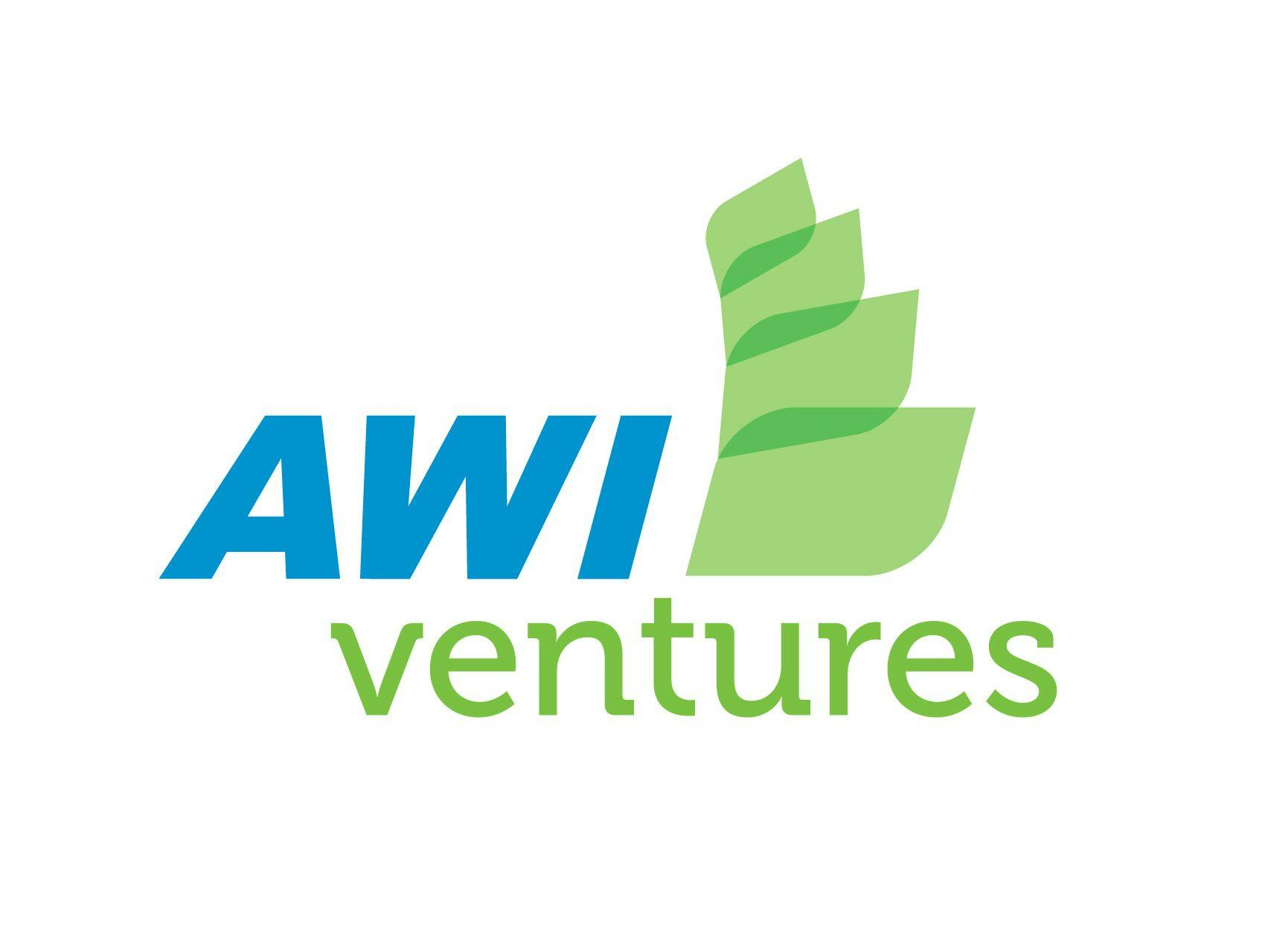
trends-and-insights
INTERVIEW: Equitise Intern & AWI Ventures Boss
We asked one of our valued interns (Joe Doyle), to put the CEO of the AWI accelerator program in the hot seat today. Check it out below. JOE: Can you give me an overview of the AWI accelerators program and what you provide to the start-ups? TOBY: The program is all about helping Fintech specific start-ups go from early stage, in the current intake it’s the idea stage, and getting them (in a period of 6 months) to be at a point where they can raise a decent amount of equity in order to scale up and enter the market properly. We give them $100,000, $50,000 is cash and $50,000 is a service agreement for operating in our CBD office space and the other is for support/legal services, in return we take a 10% equity stake in their business. It’s a structured program, where at the start of each week we go over their goals for the next week and how they performed against the goals the previous week. Each Wednesday or Thursday night we have a dinner for the start-ups around the boardroom table and have an external guest come in so start-ups have the opportunity to have an informal discussion with someone who is an expert in some area of the financial services industry or the start-up industry. This also gives the start-ups an opportunity to present their pitches to the guests and to get valuable feedback. JOE: In light of the Global Financial Crisis, bringing with it new capital constraints and regulations, how do you think this has affected the Fintech space in recent years? What will be the implications on the consumer due to this? TOBY: I think Fintech is exploding around the world despite what is going on in Global Capital Markets. With the internet a lot of disruption came to certain industries quite quickly, such as travel and real estate which are mainly classified type businesses. Retail type businesses have also been disrupted, but it has happened a lot slower. The financial services industry, for a number of reasons, has been much slower to be disrupted. The most important reasons are because it is highly regulated and often dominated by large multinational businesses, which can take time to adjust their business model, particularly in the wealth management side. However, an array of interesting start-ups are directly targeting the end user and trying to provide them access directly to funds without having to go through traditional methods, such as via large multinational businesses. In addition, start-ups are able to provide services in a way that is approachable to an investor, giving them the feeling that they don’t have to go through a financial advisor. This change is coming more rapidly than some large institutions would like to admit. When they have too, the large institutions will be looking to get in the Fintech space very aggressively. JOE: How do you think the growth of Fintech companies will most notably affect the financial services industry in the future? Globally and in Australia. TOBY: It’s going to affect it in a number of ways. Most importantly, it’s going to swing the balance of power to the consumer. The balance of power is currently in the court of large financial services institutions. Initially, when these new players come into the market they will take a small amount of market share but over time they will develop a sizeable amount. When that happens large financial institutions will all have to follow suit. This will completely change the dynamic between the consumer purchasing financial products and the institutions providing them. In the short term, there will probably be a fragmentation of the market but in the longer term there will be a series of acquisitions, but it will be a consolidation back to a healthier balance between the consumers and the financial organisations. JOE: Investment in Fintech companies has been increasingly noticeable in places such as London, is this the same in Australia? What are the differences if any? TOBY: A lot of disruptive businesses are raising large amounts of venture investment which gives them a chance of making an impact overseas. Australia is a few years behind and it is exciting to see what it coming for us. The Australian market is a bit different in that we have very powerful and profitable banks at the top of the market which means that things will probably move a little slower here. There is a lot of Fintech activity going on at the moment and we are seeing it really building up month-to-month. In the US, the Silicon Valley was mainly built around the fact that Stanford University was close by, which came a number of hardware start-ups. Out of those early successful companies, a breeding ground was developed for great people who then branched out and started their own businesses. In Australia, we have globally significant financial services companies, all of which are fantastic breeding grounds for talented young people who could all be branching out to start their own Fintech start-ups. Combine that with the fact that we are the fourth largest savings pool in the world means that we’ve got an incredible opportunity for wealth focused Fintech start-ups in this market, without having to target other international markets. JOE: What other challenges do see facing the financial industry as a whole in the future in light of the rise of Fintech start-ups? How will companies seek to overcome these challenges? TOBY: The more innovative Australia can be come around financial services, the better the industry will become because the big institutions will always have the capital to buy out successful start-ups. The start-ups that are putting pressure on the big institutions ensures that they stay as global leaders. If they didn’t have that kind of pressure you could see a situation where the US financial market gets completely disrupted and then those big disruptors could come and disrupt Australia. It is much healthier for Australian institutions to have pressure on them along the way so they don’t become targets for international takeover or disruption. JOE: What are the challenges to entrepreneurs attempting to develop Fintech businesses that might not apply to start-ups in other industries? TOBY: I’ll start broad and work into financial services. Broadly, entrepreneurial businesses don’t start in a vacuums they start in an ecosystem. The key elements of these ecosystems, are that you need to have great universities training great people. That’s not to say that all entrepreneurs have to have gone through university, but it’s an important piece of the puzzle for an ecosystem as a whole. In addition, you need investors and Australia has got a healthy pool of early stage investors, particularly VC funds who are focusing on the series A and B end of the market. Finally, you need the large institutions to provide experienced people, potential partnerships to let that start-up have channels to market and also potential buy-out opportunities to give exits. Australia has progressed a lot in the last five years in a lot of those respects. With the large number of investors and the number of accelerators there is so much opportunity for start-ups at the moment. We believe that the financial services start-up space is a lot different to other start-up spaces in that it is highly regulated, making it very different for a start up to get into this space in terms of cost and navigating through that regulation. Financial services business models are often harder to understand and value for those who don’t understand. This means that it can be harder for start-ups in this space to raise capital because some might not understand how their business model works and therefore might be harder to get people to invest their money. That’s why we saw an opportunity for a financial services accelerator, where we can provide a mentoring network and provide enough seed funding in order to absorb a lot of the upfront costs along with the ability to provide guidance and assistance around financial services. To learn more about the AWI Ventures FinTech Accelerator check out the following link: http://awiventures.com/
September 12th 2014

trends-and-insights
INTERVIEW: Startup Tips from a Pro. Founder of Betfair, Early Investor in RateSetters
Equitise recently interviewed Betfair founder Mark Davies (non-exec director at RateSetter, entrepreneur, strategist and early stage startup investor). We have included a slice of this interview below. Give us a 40,000-foot overview of your biggest business achievements over the past 10 years? I’m not sure I can lay claim to any huge achievements! In terms of involvement in a project, we delivered 132x return for our seed investors at Betfair over the period from 2000 to 2006. In terms of my own investments, my biggest was a payments processor called Envoy, which delivered 70x in three years. As I put my own money into Betfair only at the second round stage (66x), it even topped that! Of course, there have been some horrors on the way as well: there always are with early stage companies! You need luck as well as a good idea. And a lot of hard work helps. What are your top tips of advice for youngsters wanting to build and execute disruptive technology business? I always tell people to consider what the landscape will look like if they succeed, rather than focusing on what it looks like today, because if you gain traction as a disruptive business, then incumbent players will try to block you – often through legislation. So you have to strategise for the future landscape, not the current one – or there’s a danger that you just become part of the status quo ante. I have just written a dissertation about it, in fact, using Betfair’s first five years as a case study. At 16,500 words it’s a bit long to blog, though! What would you say are the best ways to reach that level of critical mass with a growing user base of customers? I think it is important to know who you are trying to target. It sounds silly, but so often people don’t tailor their message to their audience, and as often a not that’s because they haven’t actually decided exactly what audience they are looking for. If you’re in a market place with buyers and sellers, one category might be more important than the other to get things up and running: you won’t have any buyers if you don’t have any product to offer them, for example. So you need to decide what your answer is to the chicken and egg question. You can’t market to a chegg – not until you are big enough to be recognised by your brand rather than your product, anyway. Who are your mentors? And what advice would you give to a budding entrepreneur when selecting his/her mentor(s)? I don’t have any, strangely enough. I don’t have any heroes either, which people find very odd. There are plenty of people I admire, learn from, and go to for advice, but I have never had a mentor as such.
August 12th 2014

trends-and-insights
Understanding Angel Investing
The existence of angel investors and the ability to reach them is critical to entrepreneurs. They are a principal source of seed capital at the start-up stages of companies. At a macro level, entrepreneurs are fundamental to the economy. They fuel, develop and introduce new technologies, products and services leading to the creation of the majority of new jobs. Angel investments have tripled the amount of employment within the European small business sector between 2004 and 2013 (Eban). Studies regarding the innovation process have established that in no case has the market leader led a radical innovation (Preston, 2001). Small companies are continuously more effective in producing innovations that are able to create new markets, change old ones and create value. Hence, it comes at no surprise that most revolutionary breakthrough have come from companies that have fewer than 500 employees (Baumol, 2004). With innovation becoming a topic at the centre of the 21st century, the need for angel investors has been rising in both recognition and significance. The study by Roach (2010) of the Kieretsu Forum, the world’s largest angel investor network, illustrates that the availability of angel investments is tightly linked to the success of early-stage businesses and investment capital. Furthermore, the understanding of the dynamics, risks and returns of angel investing will encourage greater participation in the early-stage investing ecosystem. Roach (2010) notes the angel investing environment is defined by the following theories: Diversification and portfolio theories. Describe the tradeoffs between risk and return in constructing an investment portfolio, where investors generally dislike risk and favour return. The core of this theory is the notion of “not putting all one’s eggs in a single basket” and spreading out angel investment in multiple companies in order to reduce risk. Capital asset pricing model (CAPM). Dictates that return from an asset should be proportional to the risk. The basic assumptions of CAPM, do not hold for angel investors. They are not viewed as ‘rational investors’ as they willingly accept specific (non-systematic) risk by betting on the success of the company. This shows that angel investors are investing not only to gain returns, but also for reasons such as the desire to help entrepreneurs and be part of a social community. Agency theory. Denotes the responsibility of the entrepreneurs and the company to act in the best interests of angel investors. Agency issues occur when there is a discrepancy between the interests of the owners (angel investors) and managers (entrepreneurs). Roach (2010) notes that angels commonly rely on relationships, not legal contracts, to monitor their investments, hence making them exposed to issues such as potential misrepresentation and asymmetries of information. In order to monitor these risks, angel investors should assume active roles and continue to show interest in the start-up company. As entrepreneurs are oriented as innovative, proactive and willing to accept risk, angel investors need to possess a like-minded outlook - an outlook much unlike traditional banks and venture capitalists. The diverse knowledge, experience and background of angel investors can play a key role in helping entrepreneurs cultivate the seeds of innovation. Equity crowdfunding platforms now bridge the gap between angel investors and entrepreneurs. They facilitate a space that allows to connect the interests of the two, consequently contributing to the growth of business and innovation. The rising importance of angel investors should, hence, continue to not only prompt the need for better understanding, but also the greater recognition of angel investing and equity crowdfunding platforms by entrepreneurs and the government.
August 9th 2014

trends-and-insights
How the Lawyers See it in Aus!
On Friday 25th July, we attended a seminar “Crowd Sourced Equity Funding – A new source of finance for start-ups and SMEs.” Held by the Commercial Law Association and Chaired by Dr Terry Cutler (Chairman of CSIRO Chile and ex-Deputy Chairman of the CSIRO) it was a most informative assessment of where the CAMAC report stands and how the government should go about implementing the legislation. His opening point was that seed and early stage capital has always been one of the biggest problems in Australia, especially with regard to competitiveness and that equity funding needs to have all the building blocks in place for all of it to work properly. He believes the law can either be a facilitator or inhibitor and how we can facilitate productive activity rather than put roadblocks in the way. First to speak was Paul Niederer (CEO of Australian Small Scale Offerings Board (ASSOB)), the most experienced man in Australia in using an online business matching service to raise money for businesses, a pioneer in the space. His experience over the last 7 years helping over 300 companies raise capital is impressive and some of the info gleaned and lessons learnt even more so. He asserts that roughly two thirds of each raising comes from friends, family and followers, however the current legislation is letting it down as the approximately $30k average investment and with 20 retail shareholders it is limiting the funds to be raised. He has noted that there is a big psychological difference between reward and equity crowdfunding. Instant gratification versus delayed “potential” return on your money, they’ve found it is about 3yrs when people come looking to find out what is happening with their investment and that ultimately investors want to be involved with things meaningfully, with an emotional connection. Next up was Andrew Macpherson (Principal Macpherson Greenleaf) one of the organisers of the event, who discussed regulatory arbitrage between Australia and New Zealand. He believes that given over 80 existing bilateral agreements, particularly the Free Trade ‘09 and Financial Adviser ‘12 agreements, the government could be creating problems by departing too much from what NZ have legislated and it may encourage Australian companies to go to NZ to access funding. His asserted that we should adopt the NZ model with some tweaks per the CAMAC report. Adding some international flavour to the seminar was New Zealand lawyer Bradley Kidd (Partner of Chapman Tripp), who “doesn’t think we should be too hard on ourselves (being the impending Australian legislation)!” He gave us the macroeconomic background as to the New Zealand’s government GDP growth targets and the realisation that roughly $20bn in capital is needed to get there in the next 11 years, which has in part driven their equity crowdfunding legislation. From his perspective it’s great to see NZ launch in this direction, given the confluence of booming social networks, the booming internet economy and potential future ways of raising money. He thinks if they get a march on other countries than it will make them attractive for innovative companies (which may indeed help get them reach their aggressive growth targets)! Finally John Kluver (Head of CAMAC)who wrote the Crowd Sourced Equity Funding Report finished of the speakers. The report is “the best reference source in the world, as it’s up to date on what is happening not only in NZ but globally.” This then goes on to reflect that his focus was to ensure all of the three parties involved, Issuers, Intermediaries and Investors were represented in a balance manner to ensure there is appropriate legislation for an active and efficient market. One of the points he made that I didn’t agree with was around due diligence and what the Intermediary will need to do, he suggested that the crowd won’t be able to do it effectively. I believe that the platform will need to do basic due diligence as to ASIC checks and the backgrounds of people associated with the company, however there is no better source these days than a crowd accessing the internet and doing their own research! The whole benefit of crowdfunding is the wisdom of the crowd and that is something we will need to rely upon for the industry to succeed. Overall it was a very interesting morning with some varied opinions but what was clear is that all believe Equity Crowdfunding is the new paradigm for funding businesses and the government and ASIC need to implement a reasonable legislation and framework!
August 9th 2014

trends-and-insights
Doing Business in New Zealand
Both Chris and I have been both heartened and extremely thankful of how easy it is to do business in New Zealand *touch wood*! Lending from Dave Moskovitz, a well-respected and active Angel in NZ, presenting to US Angels: “…the World Bank rated NZ the 3rd easiest place to do business, and the easiest place in the world to start a business. Oh, and there’s no capital gains tax. The Angel community is close-knit and very friendly, even between nominally competing groups, and if you come for a visit we’ll all roll out the red carpet for you.” Now despite the fact that we haven’t seen any red carpet (it’d probably get too wet in Wellington), this has all been true and they are all so friendly, helpful and polite. I think Chris may have even been at fault and bumped into a guy the other day who then proceeded to apologise profusely! In all seriousness, yesterday we had lunch with the ED of the New Zealand Angel Association – Suse Reynolds and the Head of AngelHQ - Dave Allison and they were genuinely enthused and excited about the space and what NZ has to offer. Over a selection of the local seafood (don’t worry not high-end but lean startup-esque) we discussed the ecosystem and some of the success the Angel Association has achieved in programs it’s involved with and some of the investments made. It was great to meet some people who are excited about the future of funding innovative companies in NZ and how Equitise might be able to help! Having started our trip a week ago in Auckland, we got a sense of how things might be and as we’ve met more people and lined up meetings with people we’re looking to forge some sort of relationship with, it’d become apparent how willing people are to help. New Zealanders seem to see the merit in an idea and look for positives, which is ultimately very refreshing and empowering to Startups. As someone said yesterday, it’s probably related to being on a small isolated island that is a long way from anywhere else! Even prior to coming over to NZ, we had spoken with the Financial Markets Authority about our Equity Crowdfunding licence and they were most helpful and willing to interact with us. The process in getting our licence required us to apply for a couple of government ID’s as well as registering our business as an Overseas Registered Company (the trick is only Aussie companies can get this classification) as well as a Financial Registration Number, all of which have been very quick and painless and any issues have been quickly resolved by attentive and friendly staff. Not only dairy and world class rugby to offer, New Zealand is full of smart, friendly and positive people, who both Chris and I are truly enjoying meeting and interacting with. All of this combined with a can do attitude, no wonder they have such a vibrant startup community!
August 9th 2014

trends-and-insights
Early Stage VC market: Kiwi versus Aussie
New Zealand is a hidden gem when it comes to the relative opportunity for early stage businesses to receive investment when compared to the much larger (and one would assume much more efficient...?) Australian angel and early stage venture capital (VC) market. In 2013 the New Zealand Angel Network invested $53.2 million into locally based "young companies", which was a record high for the industry and an 80% increase on the $29.9 million invested in 2012 (this is compared to a circa 20% increase in the Australian market). The Chair of the Angel Association of New Zealand Marcel van den Assum recently stated "The Substantial increase in investment last year shows the enthusiasm angels have for supporting entrepreneurial endeavour and the economic value it generates". What gets interesting is when you compare this to the Australian early stage VC market which had circa $150.0 million invested over the same period. This may seem like a vast difference (and to be fair it is pretty material), however when compared to the local GDP figures, it becomes obvious that New Zealand is leading the way with early stage investment, which bagged approximately 3 times more investment than Australia for every dollar of relative GDP in 2013. Some interesting statistics on early stage angel investing in the New Zealand market: A whopping 55% occurred in Auckland and just 10% in Wellington 32% of investment was in “software and related services”, with “pharmaceuticals, biotechnology and life sciences” coming in second at 19% The average deal size was $497,486 in 2013, up from $298,968 in 2012 Of the $53.2 million invested in 2013, 80% ($42.8 million) was follow-on investment and 20% ($10.5 million) was new investments 51% of shares issued were ordinary shares, 22% were preference shares and 26% were convertible notes Equitise is excited to be working with some of New Zealand's leading Angel groups, accelerators and early stage VC business to collaborate and contribute to further improving the local investment landscape for early stage businesses. We are grateful for the use of the insightful statistics provided by the New Zealand Venture Investment Fund and The Angel Association New Zealand.
August 9th 2014

trends-and-insights
What is Crowdfunding all About?
Digital Innovation and the Crowd: Crowdfunding is Democratising the Access to Investment Opportunities Crowdfunding is a relatively new phenomenon that employs a concept known as “The Wisdom of Crowds,” where the general populous are used to validate an idea. In the case of crowdfunding, that idea is to provide funding to innovative and disruptive projects. The online crowdfunding model is pioneering; however the idea of crowd-sourcing funding is not new. In 1876 the Statue of Liberty was financed by everyday people. The citizens of France paid for the statue and the citizens of the United States paid for the pedestal. The concept of crowdfunding has also been used to finance the printing of books in 17th Century Europe and nowadays it has become an incredible option for businesses all around the world. The US, UK and Europe lead the way, however countries such as Australia, New Zealand and Asia are following the trend keenly. Crowdfunding supports the democratisation of investments: on one side, entrepreneurs, start-up founders, artists, non-profits and other groups can raise capital through crowdfunding and, on the other side, it converts everyday people, rich or poor, into micro angel investors to power ideas and business growth. Crowdfunding could not exist without the development of the Internet and it has been likened to a social media version of fundraising. As the 2015 research “The future of Finance. The socialisation of Finance” outlines, crowdfunding is potentially the most disruptive of all the new models in finance. Being one of the most social categories of alternative financing, crowdfunding can create 'virality' for a company if investors share the campaign across social platforms, producing a strong network effect. What is Crowdfunding and How Does it Work? Traditionally, financing a business meant asking a few people to invest big sums of money, but crowdfunding is turning the process upside down. Crowdfunding is a mechanism whereby a large number of people contribute a relatively small amount of money to fund start-up ideas and projects that they feel strongly about. According to the author Steven Dresner, crowdfunding is: “The pooling of the financial resources of many individuals to convert an idea into a project or business. Instead of relying on a few large donors, it requires many small ones.” The essential elements of a crowdfunding campaign are: An innovative idea, a social cause or business project that needs to be funded. An online platform that coordinates and administers the fundraising. A structured marketing activity to promote the offer to create momentum and reach potential investors. The Types of Crowdfunding: Crowdfunding is a blanket term for the many niches, from debt and rewards-based crowdfunding to equity crowdfunding. Donation: Where you donate money to help fund a charitable or community focused project. E.g. on a recent trip to the Congo Sarah has found an orphanage that needs money for a school, so she comes home to Sydney and begins a campaign to raise $20,000 to help build the school. Reward: People contribute to get the first run of a company’s new gadget. E.g. Tim has come up with a great new watch that synchs with your iPhone and integrates sensors to help track certain health measures, he puts a project up and for $150 you will get the first batch made of the product. Debt: Also known as peer-to-peer lending, where multiple people lend money and get a return much like a bond or bank deposit. E.g. James wants to borrow $10,000 to buy a new car, however the bank won’t lend to him as he is a sole trader, he can borrow this money from the crowd repaying it over the next 2years with 8% interest. Equity: Where businesses can raise money by issuing equity so the crowd become shareholders. E.g. Sophia has an app she has developed that allows business owners to better access deals and manage their cash flow, she wants to raise $50,000 for 20% of her business to help her grow and expand. If someone were to invest $5,000 they would get 2% of the overall company (with an implied valuation of $250,000). Crowdfunding Examples and the Success of Crowdfunding Websites While a relatively new phenomenon, crowdfunding has quickly achieved great success through sites such as Indiegogo and Kickstarter, that operate donation and reward based platforms, as well as Lending Club which operates through their debt lending platform. Since 2008, Indiegogo has brought more than 800,000 innovative ideas into reality and at the present time, its group of backers is 9 million strong, representing 235 countries and territories. More than $800m has been raised on Indiegogo to date for creative, entrepreneurial and cause-related projects. Some of the most successful campaigns? Flow Hive, a community of beekeepers, raised more than $12m from 37,000 backers in more than 150 countries. Social Impact campaign Nepal Earthquake Relief, that send fundings to Nepal after the 7.9 magnitude earthquake that hit the country in 2000, raised USD $476,045 by 5,075 people in 4 months. The Kickstarter campaign for Pebble, the colour e-paper smartwatch, is another example of a successful crowdfunding campaign for startups, where the company has raised $A20,338,986 from 78,471 backers. The Future of Crowdfunding The above mentioned examples prove the success of crowdfunding for startup funding. However, there is a new type of crowdfunding which is changing the way people and companies are accessing funds: equity crowdfunding. This new method has been described as the future of crowdfunding and we will talk about it in next article.
July 30th 2014

trends-and-insights
Women in Crowdfunding
Crowdfunding is democratising finance by allowing women to access the same opportunities as men. As the world of finance has been, for a long time, seen as an ‘all boys club’, women have been marginalised in traditional forms of finance, venture capital and business angel investing. On average, women-owned firms start and grow their businesses with considerably less external financing compared to men (Department of Commerce US). In New Zealand women aged 18-24 are found to be more entrepreneurial than young men however they have a higher rate of failure (Unitec). A reason for this is female entrepreneurs have experienced undercapitalisation as a core issue. This is despite New Zealand offering a favourable environment for entrepreneurial activity, being ranked 5th on the Index of Economic Freedom, and boasting a high percentage of female entrepreneurs (37.7% of all New Zealand’s entrepreneurs). According to the "NAB Special Report – The Lure of Entrepreneurship – Australia’s Start Up Culture", in Australia men (35%) are keener to start a business than women (29%) and 1 in 2 women declared that they would prefer to work for someone else, compared to just 36% of men. This data might reflect their concern in having continuity of employment post childbirth and the need to give more options and support for women that would like to access capital to start an entrepreneurial activity. Crowdfunding platforms, however, now offer female entrepreneurs the chance to promote and grow their business by providing access to capital. By providing such opportunity, crowdfunding democratises finance by placing women on a level playing field with men. One positive example is American crowdfunding platform iFundWomen, that focuses on women-led startups and small businesses. The main goal of the platform is to close the gender funding gap so female entrepreneurs can get their businesses off the ground. History has shown that women are almost four times more successful when they raise capital through crowdfunding rather than traditional means. The number of female-owned businesses that receive venture funding in the US is only 13%. Crowdfunding campaigns run by women meet their funding target at a rate of around 47% (Forbes) so if this route is undertaken it is often successful. Despite the lower number of women on crowdfunding platforms, women entrepreneurs are generally more successful in their campaigns. They are shown to be more energetic than men, receive more investors per campaign and have a higher average donation value, raising 10.75% more money than male run campaigns. Women are also noted to be able to grow their business faster after receiving funds. Furthermore, female entrepreneurs tend to engage with their investors more effectively, as they are often better communicators, are more emotive in their cause and are seen to be trustworthy. Women are turning to crowdfunding because it is: Simple - doesn’t require a large loan or venture capitalist backing. Fast - the average crowdfunding campaign runs for just over a month. Able to attract vast numbers of investors. Friendly - the platform is supportive and creates a community around the offer. Connecting - entrepreneurs are able to reach investors and communities that are usually out of their reach and make friends along the crowdfunding process. Able to create business traction by exposing crowdfunding campaigns to media, communities, investors and consumers. On the investing side, the number of women investors has also been rising. As women have the majority of purchasing power in families, they are the most powerful consumers and consequently have the potential to become affluent investors in the crowdfunding marketplace. A benefit of this is risk aversion, which is more commonly associated with women, can prove to be a strength in crowdfunding as it will enable conscientious decision making, exercising the wisdom of the crowd. Moreover, as people are noted to commonly fund people like them, men fund men and women fund women (Forbes) which, as women investors are increasing, will lead to more and more female-led startups receiving funding. As this will reduce the number of women who have to pitch to a room full of male investors, we’ll see a decrease in gender bias as a result of crowdfunding platforms. As crowdfunding changes the landscape of how capital is raised, it can also become a game changer for women. Female entrepreneurs will be given the chance to reach their full potential and succeed within the world of business, resulting in more competition, quality and choice. As gender, education, race and age are removed from the pitch, the entrepreneur behind the crowdfunding campaign is left to rely on the will of the audience. Consequently, crowdfunding platforms are able to eliminate misconceptions and bias. With the number of both female entrepreneurs and investors rising in countries such as the US, it is now our job to provide a platform for New Zealand and Australian women to access the opportunities which will help their business ideas succeed.
July 30th 2014

trends-and-insights
Equity Crowdfunding: A Global Snapshot
Crowdfunding platforms are growing in their size and sophistication exponentially throughout the globe. Their benefit transpires through the growth in the collaborative economy, where investors are able to support budding entrepreneurs. With over $60,000 raised hourly through crowdfunding to support business start-ups in 2014 (TheCrowdDataCenter) and the number of small business loans dropping 32% since 2008 (TABB Group), countries are increasingly recognising the need for and importance of alternative business funding. As a fast growing, multi-billion dollar industry, crowdfunding enables the simultaneous independence and interconnection with traditional funding sources. With $2.7 billion raised in 2012, $5.1 billion in 2013 (The Crowdfunding Industry Report) and a projected amount of $17 billion in 2015, crowdfunding is reinventing the way companies are able to create investor interest and business traction. Crowdfunding platforms facilitate this by generating exposure to the broader market and investor base. The key crowdfunding platforms include (by amount of capital raised, sourced from The Crowd Cafe): FundingCircle (Debt funding, based in GBR, raised $58,100,000) Fundrise (Debt & equity funding, based in USA, raised $31,000,000) OurCrowd (Equity funding, based in ISR, raised $25,000,000) Angellist (Equity funding, based in USA, raised $24,000,000) CircleUp (Equity funding, based in USA, raised $23,000,000) Mosaic (Debt funding, based in USA, raised $11,000,000) RealtyMogul (Debt & equity funding, based in USA, raised $9,500,000) FundersClub (Equity funding, based in USA, raised $6,463,000) SeedInvest (Equity funding, based in USA, raised $5,230,000) Seedrs (Equity funding, based in GBR, raised $4,568,000) Despite the leaders of the market being located in the US, UK and Europe, countries such as Canada, New Zealand and Australia, as well as Asia are slowly starting to pave their way into the crowdfunding market. As legislation continues to be passed and advocated by the EU, platforms are rapidly expanding throughout Europe. A support for crowdfunding activity is also evident in Asia, with SeedAsia being launched in China, CrowdBaron in Hong Kong and a Eureeca platform in the Middle-East. In spite of the growing nature of crowdfunding worldwide, regulatory frameworks slowly trail behind. In order for crowdfunding to gain momentum and enable to open a new realm of global opportunities, supportive legislation is vital in order to facilitate the growth of investment-based crowdfunding platforms. However, keeping the balance in regulatory frameworks is vital, as too much burdensome regulation can limit the growth and profitability of crowdfunding platforms. The current regulatory environments are: Development of the Jumpstart our Business Start-ups (JOBS) Act 2013 allowed the “general solicitation” of private placement share offerings and encouragement of small business funding by easing regulations. The JOBS Act permit’s non-accredited investors to participate in crowdfunding markets, however limits their exposure. UK: Crowdfunding is currently regulated by the Financial Services and Markets Act (2000). Equity crowdfunding providers require the approval of UK’s Financial Conduct Authority (FCA). However, the FCA has been consulting on new regulation to prompt a better understanding of crowdfunding risk and allow investment-based crowdfunding to be accessible to a wider audience. Europe: Crowdfunding laws depend on national regimes. Nevertheless, the European Commission is urging countries to update the laws in order to facilitate the opportunity for SMEs to raise capital and create job opportunities. Australia: Current laws make equity-based crowdfunding illegal and require burdensome disclosure and compliance requirements, making crowdfunding unfeasible. In March 2014 CAMAC has released a report, which prompted a legislative initiative to facilitate crowd sourced equity funding (CSEF). New Zealand: The crowdfunding market is currently regulated by The Financial Markets Conduct Act 2013. New Zealand companies are able to raise up to $2 million worth of capital through a licensed equity platform within a 12 month period. As the crowdfunding market is projected to reach $17 billion globally by 2015, it comes at no surprise that countries and regulators are beginning to recognise the importance of facilitating an environment that supports, and not confines, crowdfunding activity. The future for crowdfunding is bright, but it is in our hands to understand what defines crowdfunding, how the current laws shape crowdfunding potential and what works best for entrepreneurs, investors and our communities.